
Publication of TriQuarterly is made possible in part by the donors of gifts and grants to the magazine. For their recent and continuing support, we are very pleased to thank the Illinois Arts Council, the John D. and Catherine T. MacArthur Foundation, the Sara Lee Foundation, and individual donors. Major new marketing initiatives at TriQuarterly have been made possible by the Lila Wallace Reader's Digest Literary Publishers Marketing Development Program, funded through a grant to the Council of Literary Magazines and Presses.
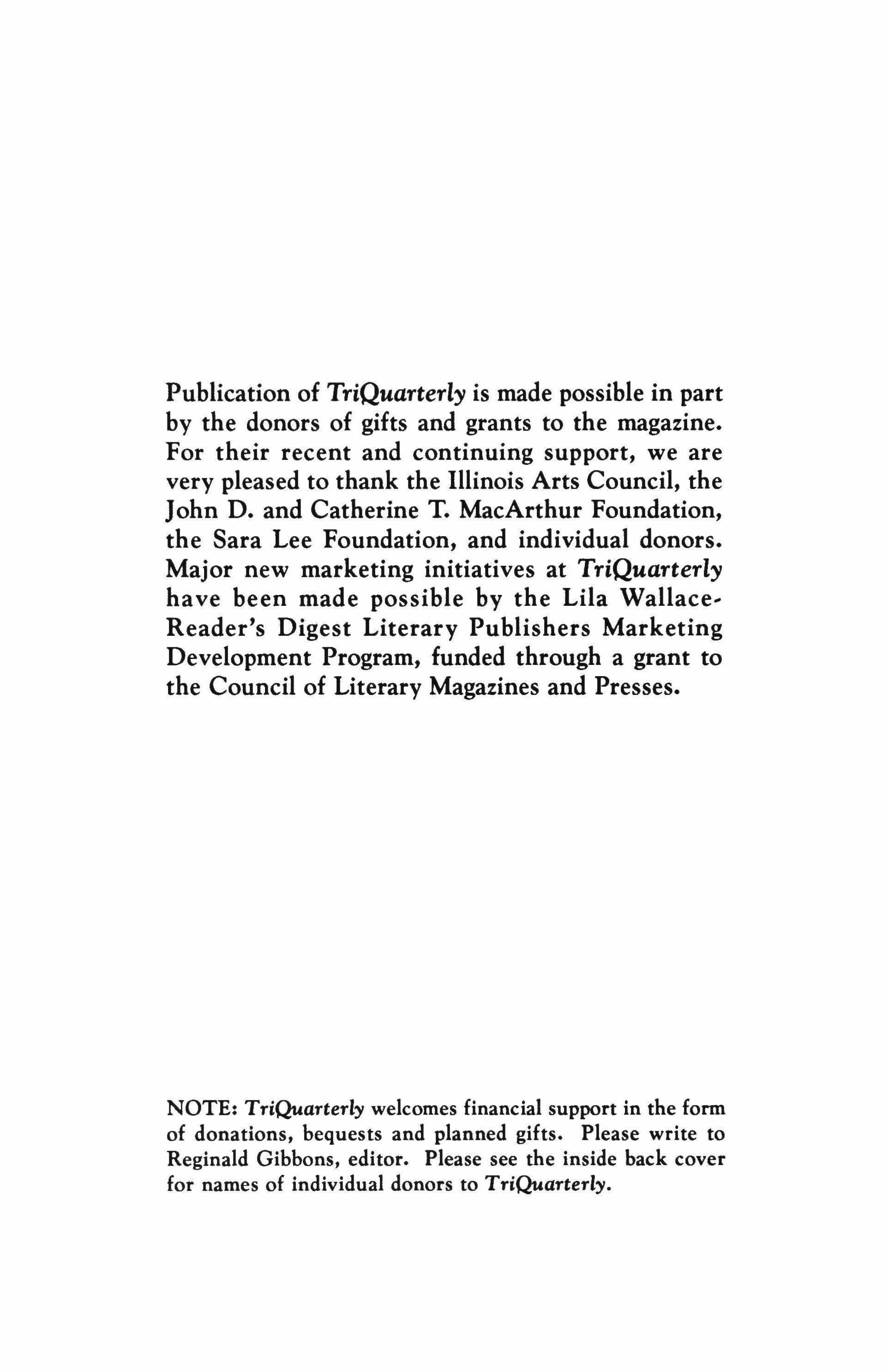
NOTE: TriQuarterly welcomes financial support in the form of donations, bequests and planned gifts. Please write to Reginald Gibbons, editor. Please see the inside back cover for names of individual donors to TriQuarterly.
Please sign me up for:
o a two-year subscription for $36.
o a one-year subscription for $20.
Foreign subscribers please add $5peryear.

Please begin my subscription with issue#
SUBSCRIBE TO TRIQUARTERLY!
Please sign me up for:
Foreign
Please
SUBSCRIBE TO TRIQUARTERLY!
life
Name Address Or call US toll-free at 800-832-3615 to charge it! BI87
o a
subscription for $500. o $_____ enclosed. 0 This is a renewal.
subscription for
o a two-year
$36.
one-year
for
o a
subscription
$20.
subscribers please add $5peryear.
my subscription
issue# o
life
$ enclosed.
Name Address Or call US toll-free at 800-832-3615 to charge it! BI87 GIVE TRIQUARTERLY! o $ enclosed. Buy your first TriQuarlerly gift subscription for $20, and each additional gift subscription costs only $18!! 1st gift subscription ($20) Name Address Gift-card message Add $5/year forforeign subscriptions. Name Address 2nd gift subscription ($18) Name Address Gift-card message BG87
begin
with
a
subscription for $500. o
0 This is a renewal.
TriQuarterly
NORTHWESTERN UNIVERSITY
2020 RIDGE AVE.
EVANSTON, IL 60208-4302

TriQuarterly
NORTHWESTERN UNIVERSITY
2020 RIDGE AVE.
EVANSTON, IL 60208-4302
TriQuarterly
NORTHWESTERN UNIVERSITY
2020 RIDGE AVE.
EVANSTON, IL 60208-4302

1993 BOOKS and selected backlist
Coming in Fall 1993
The new TriQuarterly Books imprintof Northwestern University Press will presentfour new titles in the fall of1993. We are pleased to be able to offer readers ofTriQuarterly magazine this excitingpreview ofthings to come
ANGELA JACKSON
Dark Legs and Silk Kisses: The Beatitudes of the Spinners
A unique perfomance of mythmaking and song by a quintessential Chicago poet.
Angela Jackson was born in Greenville, Mississippi, raised on Chicago's South Side, and educated at Northwestern University and the University of Chicago. She is the author of four earlier, smaller collections: Voo Doollote Magic, The Greenville Club I Solo in the Boxcar Third Floor E and The Man with the White Liver. She lives in Chicago and is at work on a novel.
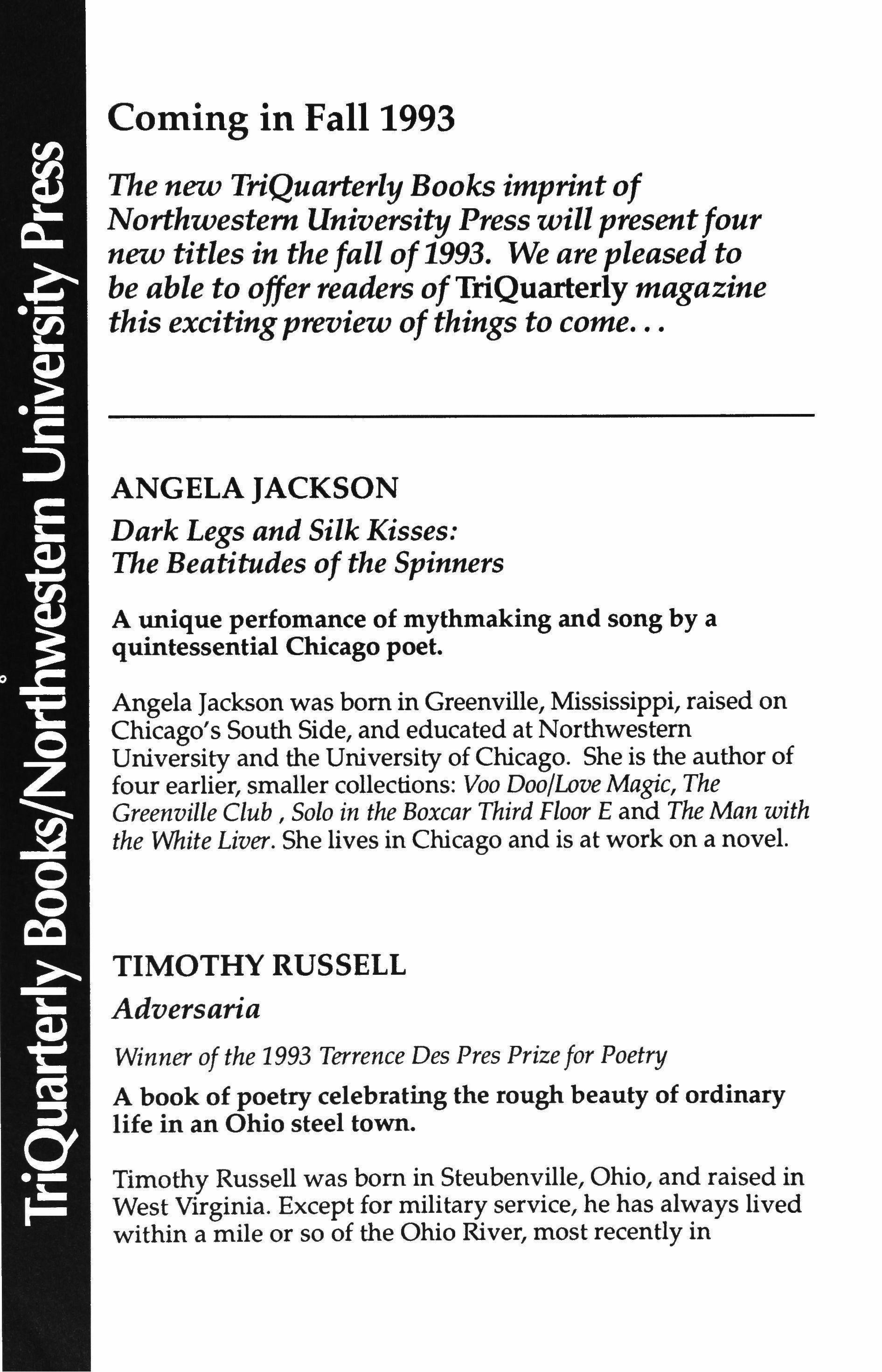
TIMOTHY RUSSELL
Adversaria
Winner of the 1993 Terrence Des Pres Prizefor Poetry
A book of poetry celebrating the rough beauty of ordinary life in an Ohio steel town.
Timothy Russell was born in Steubenville, Ohio, and raised in West Virginia. Except for military service, he has always lived within a mile or so of the Ohio River, most recently in

Toronto, Ohio, with his wife and children. Educated at West Liberty State College and the University of Pittsburgh, he has been employed at Weirton Steel for twenty years, presently as a boiler repairman. Adversaria is his first fulllength book.
ANNE CALCAGNO
Prayfor Yourself
A powerful first collection of stories by an author with an abiding understanding of the fragile yet enduring nature of human relationships.
Anne Calcagno was raised in Rome and lives in Chicago. She teaches writing at DePaul University and the School of the Art Institute. For stories in Prayfor Yourself, she received fellowships from the National Endowment for the Arts and the Illinois Arts Council. Her fiction has appeared in TriQuarterly, North American Review, Denver Quarterly and other literary magazines, as well as the anthologies, Fiction of the Eighties and American Fiction.
ALAN SHAPIRO
In Praise of the Impure: Poetry and the Ethical Imagination
An exciting exploration of the passions and problems of writing, and of the state of contemporary American poetry.
Alan Shapiro is the author of four books of poetry, including Happy Hour, which won the William Carlos Williams Award of the Poetry Society of America, and Covenant. He teaches at the University of North Carolina, Greensboro, and is a 1991 recipient of a Lila Wallace-Reader's Digest Writer's Award.
EVAN ZIMROTH
Dead, Dinner, or Naked
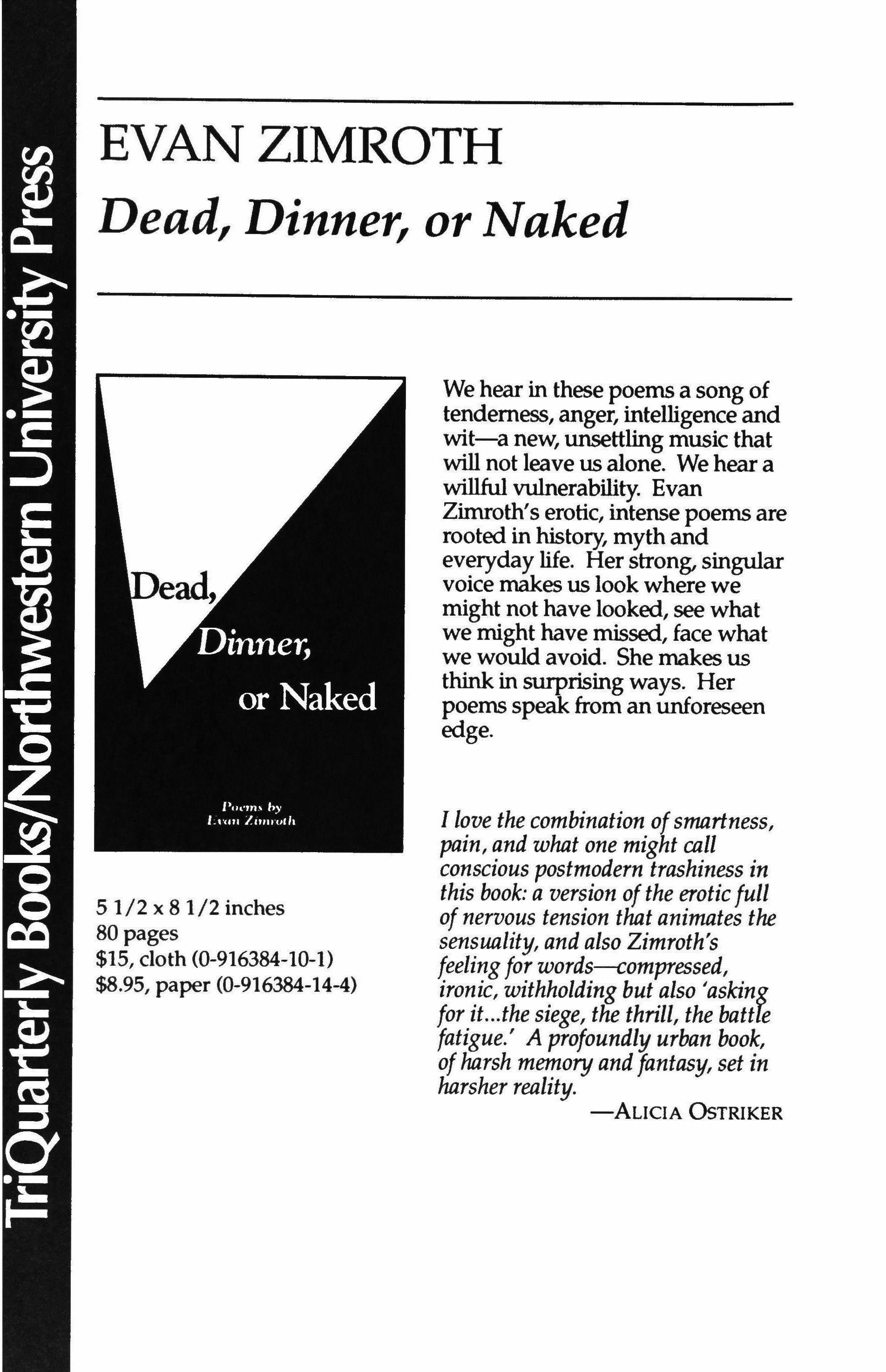
51/2 x 81/2 inches
80 pages
$15, cloth (0-916384-10-1)
$8.95, paper (0-916384-14-4)
We hear in these poems a song of tenderness, anger, intelligence and wit-a new, unsettling music that will not leave us alone. We hear a willful vulnerability. Evan Zimroth's erotic, intense poems are rooted in history, myth and everyday life. Her strong, singular voice makes us look where we might not have looked, see what we might have missed, face what we would avoid. She makes us think in surprising ways. Her poems speak from an unforeseen edge.
I love the combination ofsmartness, pain, and what one might call conscious postmodern trashiness in this book: a version of the eroticfull of nervous tension that animates the sensuality, and also Zimroth's feelingforwords-compressed, ironic, withholding but also 'asking for it...the siege, the thrill, the battle fatigue.' A profoundly urban book, ofharsh memory andfantasy, set in harsher reality.
-ALICIA OsTRIKER
On Hearing That Childbirth Is Like Orgasm
So, maybe it's not a maiming altogether but some weird daylong fairy-tale
as the door opens into a new chateau and the moat closes over behind you. It's magic: like pricking your finger, the pin just some new animal, for your pleasure; a kind of tickle, you don't feel it anyway having gone somewhere beyond pain, your body limp and blooming as an anemone, 0 the lush stories to tell! the extravagance! the irresistible rules! to be strapped to stirrups, your wrists chained Classier even than The Story cfO it's what the good fairy promised and the good girls get: the kiss in the turret, the happy-ever-after.
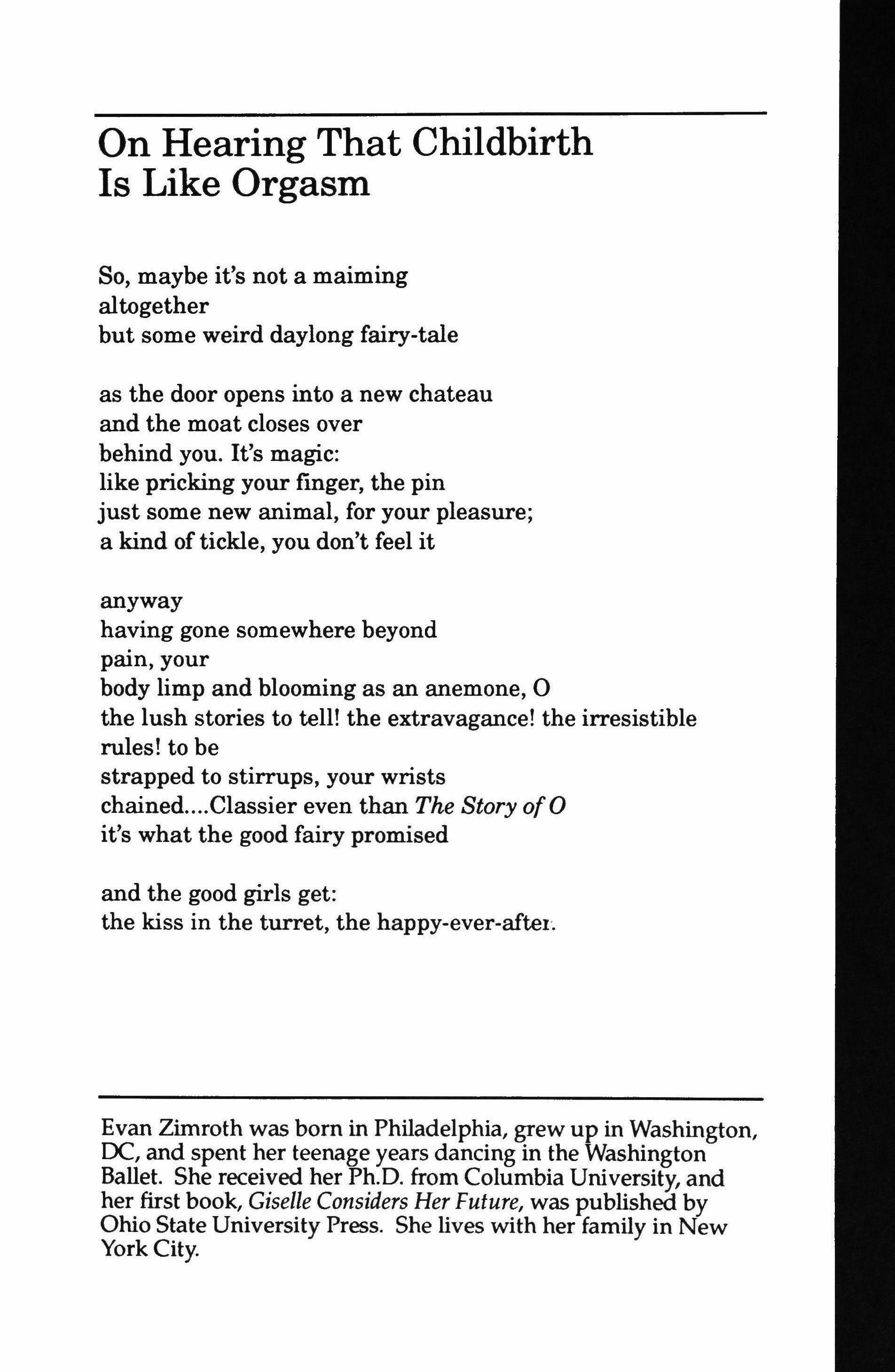
Evan Zimroth was born in Philadelphia, grew up in Washington, IX, and spent her teenage years dancing in the Washington Ballet. She received her Ph.D. from Columbia University, and her first book, Giselle Considers Her Future, was published by Ohio State University Press. She lives with her family in New York City.
New Writingfrom Mexico
Edited by Reginald Gibbons

Beginning in the 1960's, there has been a remarkable flowering of new writing in Mexico. A new generation of writers has come of age. Those writers, born around 1945 and after, have lived through the most dramatic political, social and artistic changes in Mexico's history; they have opened up fiction to new subjects, new places, new techniques; their poetry evokes and meditates on the Mexican reality more fully and more vividly than ever before. Notable among these new writers are the voices of women and the voices speaking from the provinces about their rich sense of place-away from the powerful cultural center of Mexico City. This large anthology is not a documentary representation or a survey, but a carefully chosen and scrupulously translated sampling of the most vigorous and exciting new short fiction, poetry and essays being written in Mexico today
a wonderful and timelyanthology. Gibbons has gathered 58 of Mexico's most talented writers, and they are as diverse as their nation ln asking the question "What is Mexican?" and with the talented help of many translators, Gibbons has contributed a great deal to the understanding ofMexico. -BOOKLIST
6 x 91/4 inches
448 pages
$27, cloth (0-916384-12-8), $15, paper (0-916384-13-6)
MURIEL RUKEYSER
Out of Silence: Selected Poems
Edited by Kate Daniels
In a recent article, someone defined the deplorable state of publishing (and the Republic) by a singlefact: Muriel Rukeyser's poetry was out ofprint. So this is not just another book: it is a restitution. Muriel Rukeyser held her ground at the bloody crossroads ofpolitics and art; she gave the word "witness" poetic weight. The first of our women poets to enter and engage the Western tradition ofprophetic outrage, she warmed it with the living voices of the injured. And in her activism and generosity, Rukeyser was as good as her word. She said it best: "It is a great thing to hear the words of those who are worthy to speak them. II
-ELEANOR WILNER
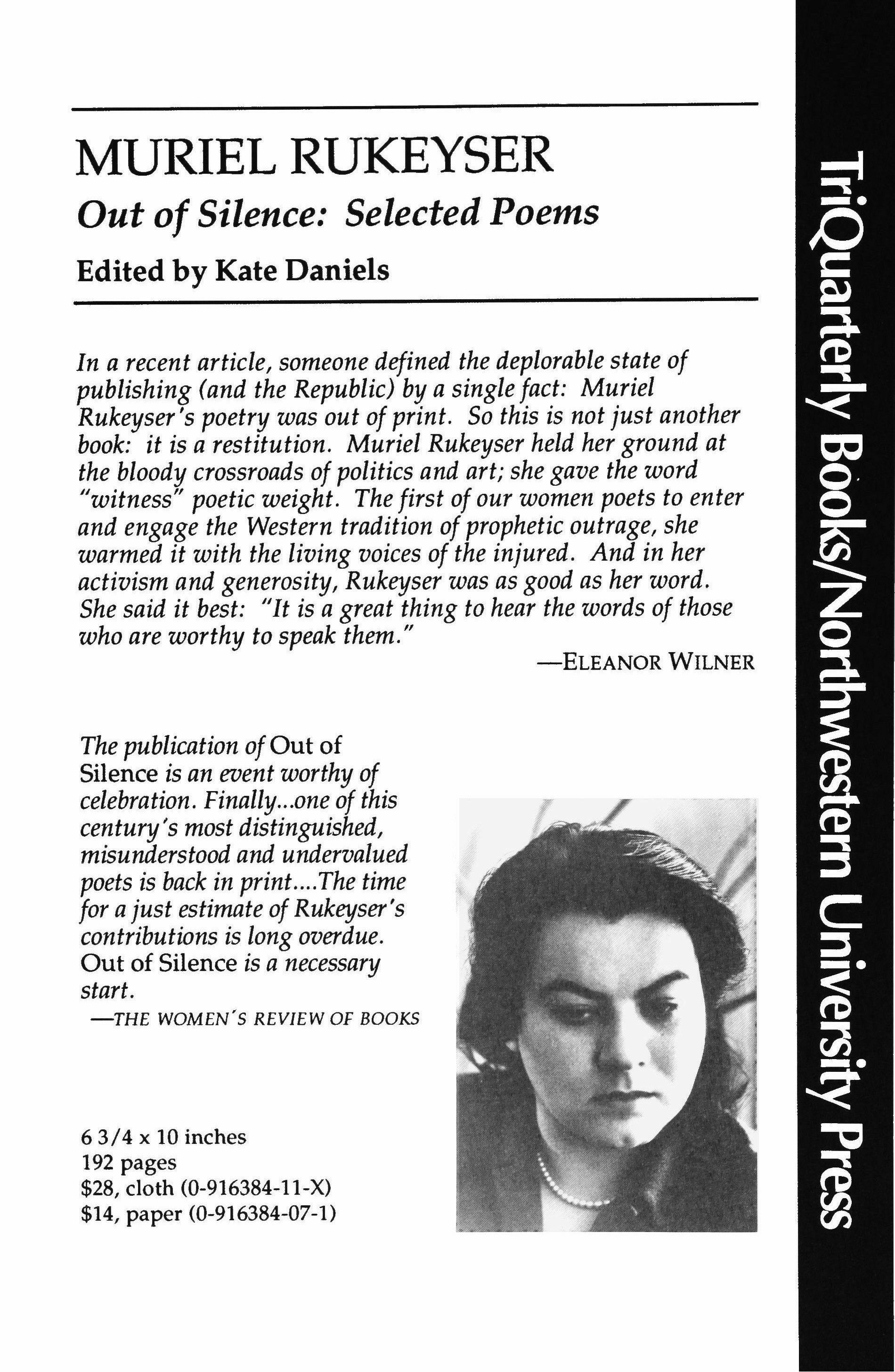
The publication of Out of Silence is an event worthy of celebration. Finally one of this century's most distinguished, misunderstood and undervalued poets is back in print.. The time for a just estimate ofRukeyser's contributions is long overdue. Out of Silence is a necessary start.
-THE WOMEN'S REVIEW OF BOOKS
63/4 x 10 inches
192 pages
$28, cloth (0-916384-11-X)
$14, paper (0-916384-07-1)
BRUCE WEIGL
What Saves Us
In these wrenching, elegant poems Bruce Weigl writes out of uncompromising memory and vision. His subject is both the transport and the anguish of being open to the lived and living moment. He writes of love, sex, violence, and the inhuman crossfire of historical forces. From bars and bedrooms, in Ohio and Nicaragua and Vietnam, his voice rises through the noise of history and habit to reach us with impeccable grace and remarkable invention. The images he discovers do not fade from our minds, and we are grateful for "what saves us" no matter who we are or where we have been.

Song of Napalm made almost everything else that has been written about the Vietnam War seem irrelevant. What Saves Us moves right along from that achievement. Bruce Weigl has become one of the best poets now writing in America.
-DENISE LEVERTOV
51/2 x 81/2, 80 pages $17, cloth (0-916384-08-X); $10.95, paper (0-916384-09-8)
LINDA McCARRISTON Eva-Mary
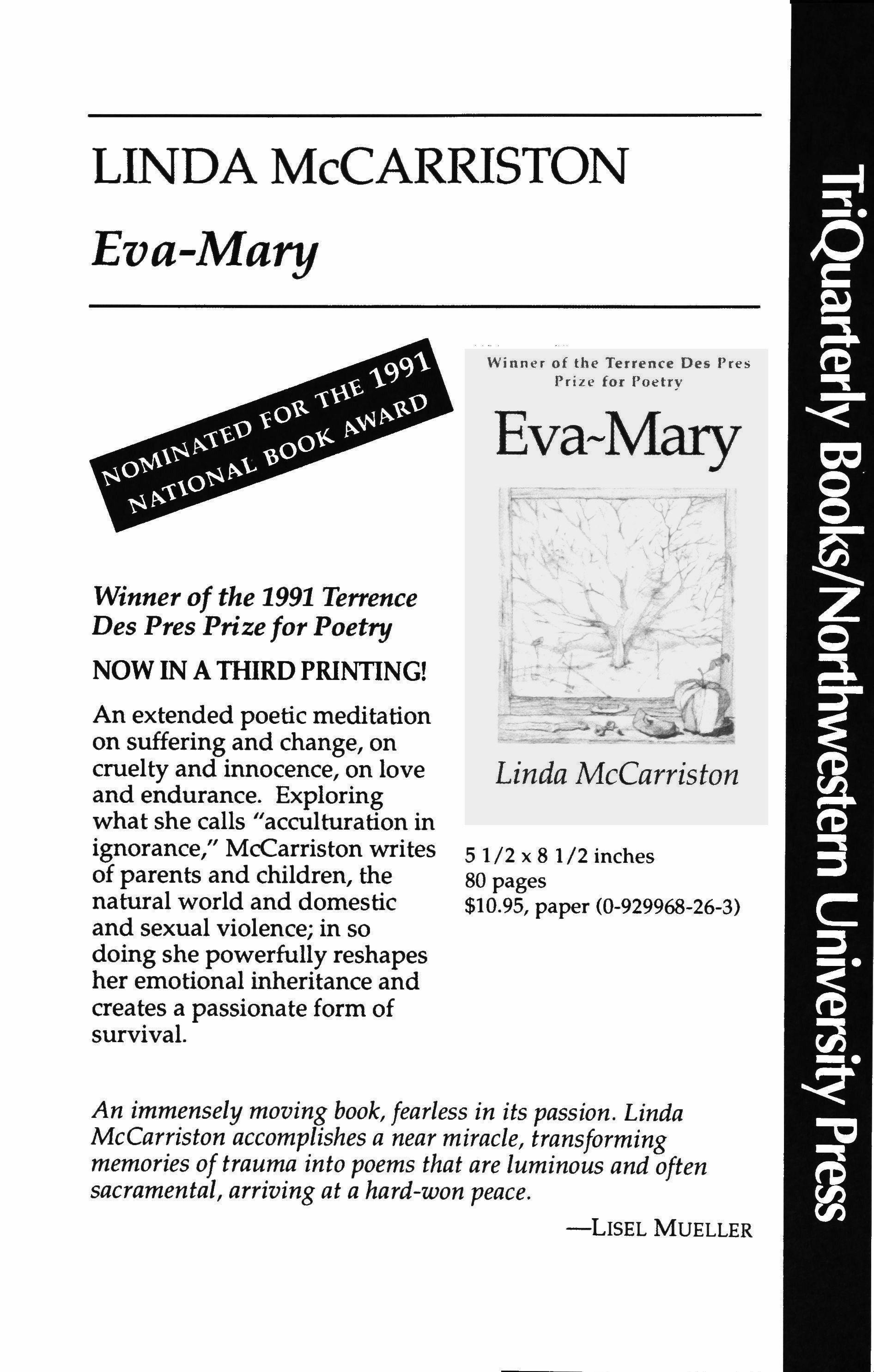
Eva-Mary
Winner of the 1991 Terrence Des Pres Prize forPoetry
NOW IN A THIRD PRINTING!
An extended poetic meditation on suffering and change, on cruelty and innocence, on love and endurance. Exploring what she calls "acculturation in ignorance," McCarriston writes of parents and children, the natural world and domestic and sexual violence; in so doing she powerfully reshapes her emotional inheritance and creates a passionate form of survival.
51/2 x 8 1/2 inches 80 pages $10.95, paper (0-929968-26-3)
An immensely moving book, fearless in its passion. Linda McCarriston accomplishes a near miracle, transforming memories of trauma into poems that are luminous and often sacramental, arriving at a hard-won peace.
-LISEL MUELLER
Winner of the Terrence Des Pres Prize for Poetry
Linda McCarriston
Fiction of the Eighties
Edited by Reginald Gibbons and Susan Hahn
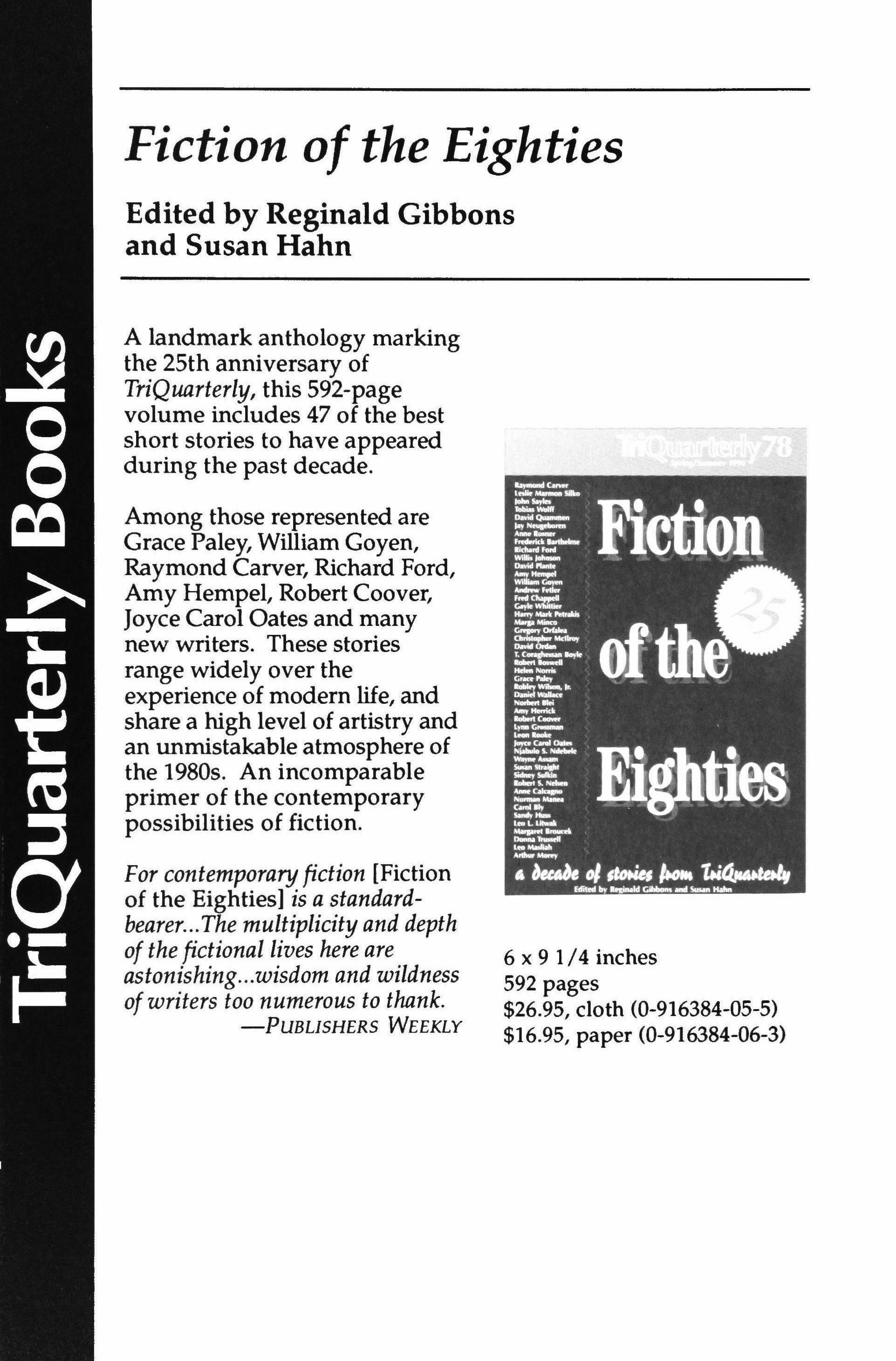
A landmark anthology marking the 25th anniversary of TriQuarterly, this 592-page volume includes 47 of the best short stories to have appeared during the past decade.
Among those represented are Grace Paley, William Goyen, Raymond Carver, Richard Ford, Amy Hempel, Robert Coover, Joyce Carol Oates and many new writers. These stories range widely over the experience of modern life, and share a high level of artistry and an unmistakable atmosphere of the 1980s. An incomparable primer of the contemporary possibilities of fiction.
For contemporaryfiction [Fiction of the Eighties] is a standardbearer The multiplicity and depth of the fictional lives here are astonishing wisdom and wildness of writers too numerous to thank.
-PUBLISHERS WEEKLY
6 x 9 1 /4 inches
592 pages
$26.95, cloth (0-916384-05-5) $16.95, paper (0-916384-06-3)
Stephen Deutch,
Photographer: From Paris to Chicago, 1932-1989
The gift book-with stunning photos of Chicago over decades of change, including Deutch's Pulitzernominated photos from the Daily News. This collection and analysis of Deutch's work, with plates both in duotone and in color, is the first full record of Deutch's achievement to be published.
SteJ Del Ph
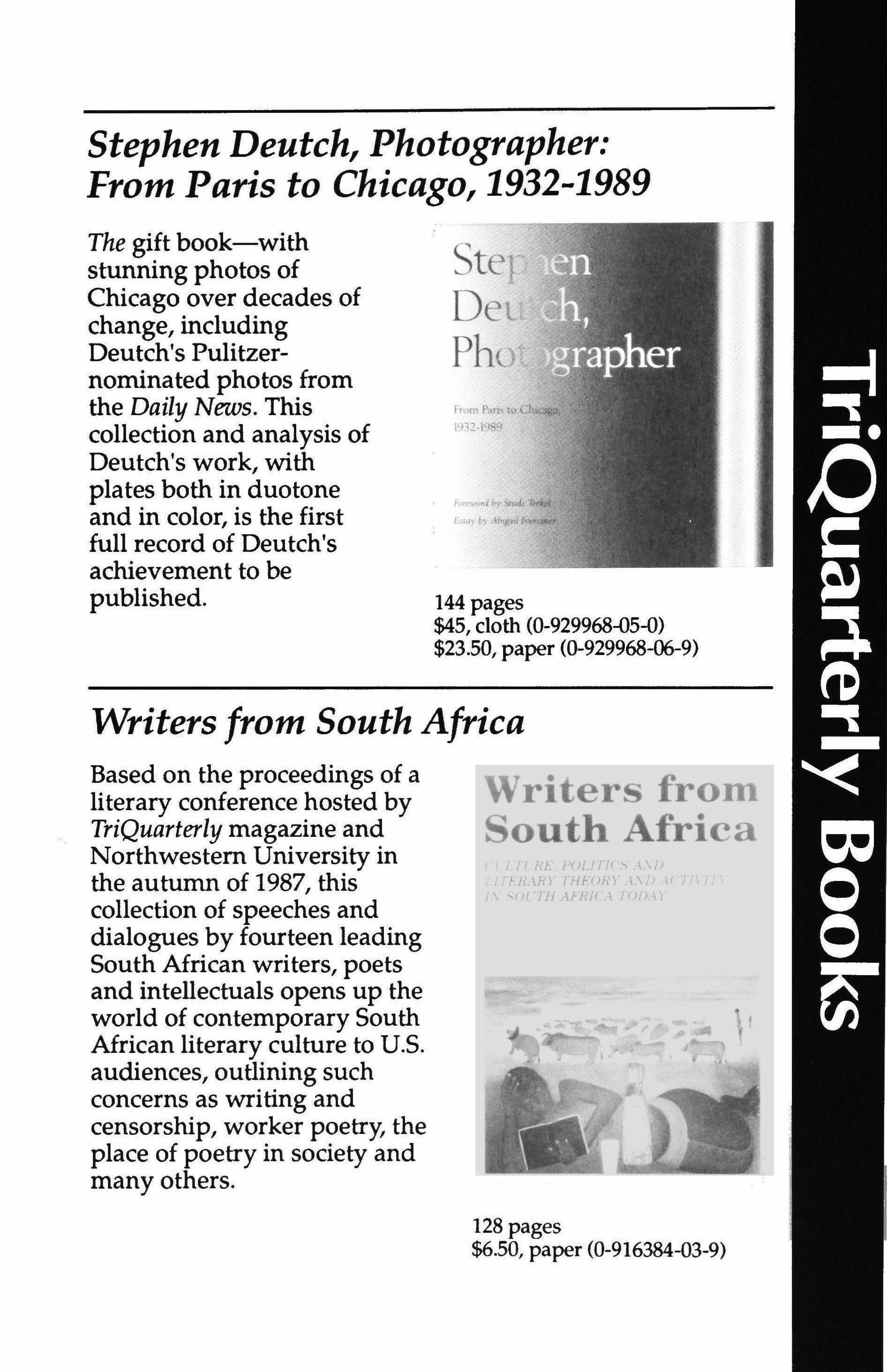
144 pages
$45, cloth (0-929968-05-0)
$23.50, paper (0-929968-06-9)
Writers from South Africa
Based on the proceedings of a literary conference hosted by TriQuarterly magazine and Northwestern University in the autumn of 1987, this collection of speeches and dialogues by fourteen leading South African writers, poets and intellectuals opens up the world of contemporary South African literary culture to U.S. audiences, outlining such concerns as writing and censorship, worker poetry, the place of poetry in society and many others.
Writers from South Africa
128 pages
$6.50, paper (0-916384-03-9)
hI-. "iJI' / ( \ \/) 'I.\/-;) I {HJi' \ '\ I ,(If TlI Iff. '( I II/I) \ 1
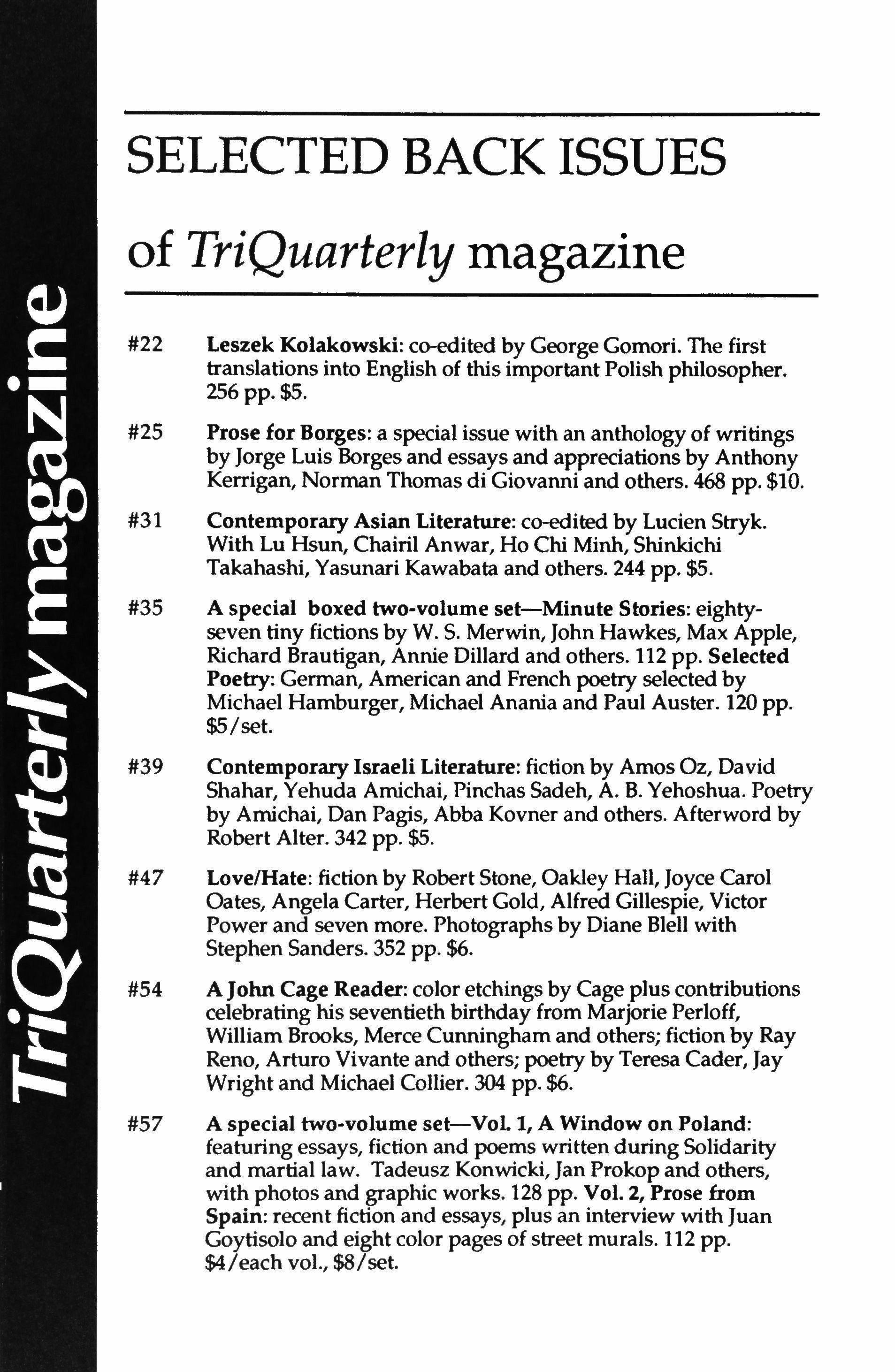
SELECTED BACK ISSUES of TriQuarterly magazine
#22 Leszek Kolakowski: co-edited by George Gomori. The first translations into English of this important Polish philosopher. 256pp.$5.
#25 Prose for Borges: a special issue with an anthology of writings byJorge Luis Borges and essays and appreciations by Anthony Kerrigan, Norman Thomas di Giovanni and others. 468 pp. $10.
#31 Contemporary Asian Literature: co-edited by Lucien Stryk. With Lu Hsun, Chairil Anwar, Ho Chi Minh, Shinkichi Takahashi, Yasunari Kawabata and others. 244 pp. $5.
#35 A special boxed two-volume set-Minute Stories: eightyseven tiny fictions by W. S. Merwin, John Hawkes, Max Apple, Richard Brautigan, Annie Dillard and others. 112 pp. Selected Poetry: German, American and French poetry selected by Michael Hamburger, Michael Anania and Paul Auster. 120 pp. $5Iset.
#39 Contemporary Israeli Literature: fiction by Amos Oz. David Shahar, Yehuda Amichai, Pinchas Sadeh, A. B. Yehoshua. Poetry by Amichai, Dan Pagis, Abba Kovner and others. Afterword by Robert Alter. 342 pp. $5.
#47 Love/Hate: fiction by Robert Stone, Oakley Hall, Joyce Carol Oates, Angela Carter, Herbert Gold, Alfred Gillespie, Victor Power and seven more. Photographs by Diane Blell with Stephen Sanders. 352 pp. $6.
#54 A John Cage Reader: color etchings by Cage plus contributions celebrating his seventieth birthday from Marjorie Perloff, William Brooks, Merce Cunningham and others; fiction by Ray Reno, Arturo Vivante and others; poetry by Teresa Cader, Jay Wright and Michael Collier. 304 pp. $6.
#57 A special two-volume set-Vol. 1, A Window on Poland: featuring essays, fiction and poems written during Solidarity and martial law. Tadeusz Konwicki, Jan Prokop and others, with photos and graphic works. 128 pp. Vol. 2, Prose from Spain: recent fiction and essays, plus an interview with Juan Goytisolo and eight color pages of street murals. 112 pp. $4/each vol., $Blset.
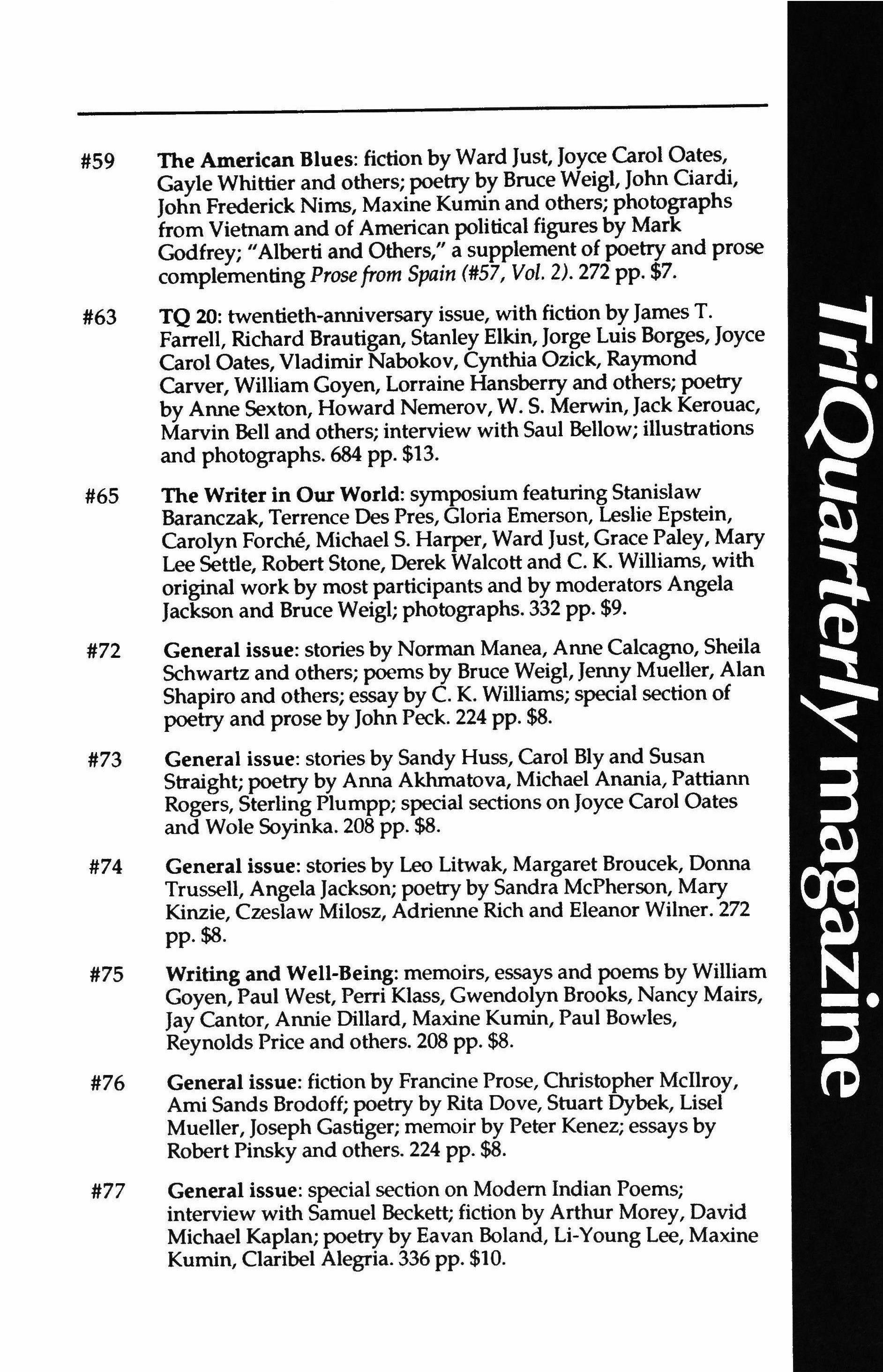
#59 The American Blues: fiction by Ward Just, Joyce Carol Oates, Gayle Whittier and others; poetry by Bruce Weigl, John Ciardi, John Frederick Nims, Maxine Kumin and others; photographs from Vietnam and of American political figures by Mark Godfrey; "Alberti and Others," a supplement of poetry and prose complementing Prosefrom Spain (#57, Vol. 2). 272 pp. $7.
#63 TQ 20: twentieth-anniversary issue, with fiction by James T. Farrell, Richard Brautigan, Stanley Elkin, Jorge Luis Borges, Joyce Carol Oates, Vladimir Nabokov, Cynthia Ozick, Raymond Carver, William Goyen, Lorraine Hansberry and others; poetry by Anne Sexton, Howard Nemerov, W. S. Merwin, Jack Kerouac, Marvin Bell and others; interview with Saul Bellow; illustrations and photographs. 684 pp. $13.
#65 The Writer in Our World: symposium featuring Stanislaw Baranczak, Terrence Des Pres, Gloria Emerson, Leslie Epstein, Carolyn Forche, Michael S. Harper, Ward Just, Grace Paley, Mary Lee Settle, Robert Stone, Derek Walcott and C. K. Williams, with original work by most participants and by moderators Angela Jackson and Bruce Weigl; photographs. 332 pp. $9.
#72 General issue: stories by Norman Manea, Anne Calcagno, Sheila Schwartz and others; poems by Bruce Weigl, Jenny Mueller, Alan Shapiro and others; essay by C. K. Williams; special section of poetry and prose by John Peck. 224 pp. $8.
#73 General issue: stories by Sandy Huss, Carol Blyand Susan Straight; poetry by Anna Akhrnatova, Michael Anania, Pattiann Rogers, Sterling Plumpp; special sections on Joyce Carol Oates and Wole Soyinka. 208 pp. $8.
#74 General issue: stories by Leo Litwak, Margaret Broucek, Donna Trussell, Angela Jackson; poetry by Sandra McPherson, Mary Kinzie, Czeslaw Milosz, Adrienne Rich and Eleanor Wilner. 272 pp.$8.
#75 Writing and Well-Being: memoirs, essays and poems by William Goyen, Paul West, Perri Klass, Gwendolyn Brooks, Nancy Mairs, Jay Cantor, Annie Dillard, Maxine Kumin, Paul Bowles, Reynolds Price and others. 208 pp. $8.
#76 General issue: fiction by Francine Prose, Christopher McIlroy, Ami Sands Brodoff; poetry by Rita Dove, Stuart Dybek, Lisel Mueller, Joseph Gastiger; memoir by Peter Kenez; essays by Robert Pinsky and others. 224 pp. $8.
#77 General issue: special section on Modem Indian Poems; interview with Samuel Beckett; fiction by Arthur Morey, David Michael Kaplan; poetry by Eavan Boland, Li-Young Lee, Maxine Kumin, Claribel Alegria. 336 pp. $10.
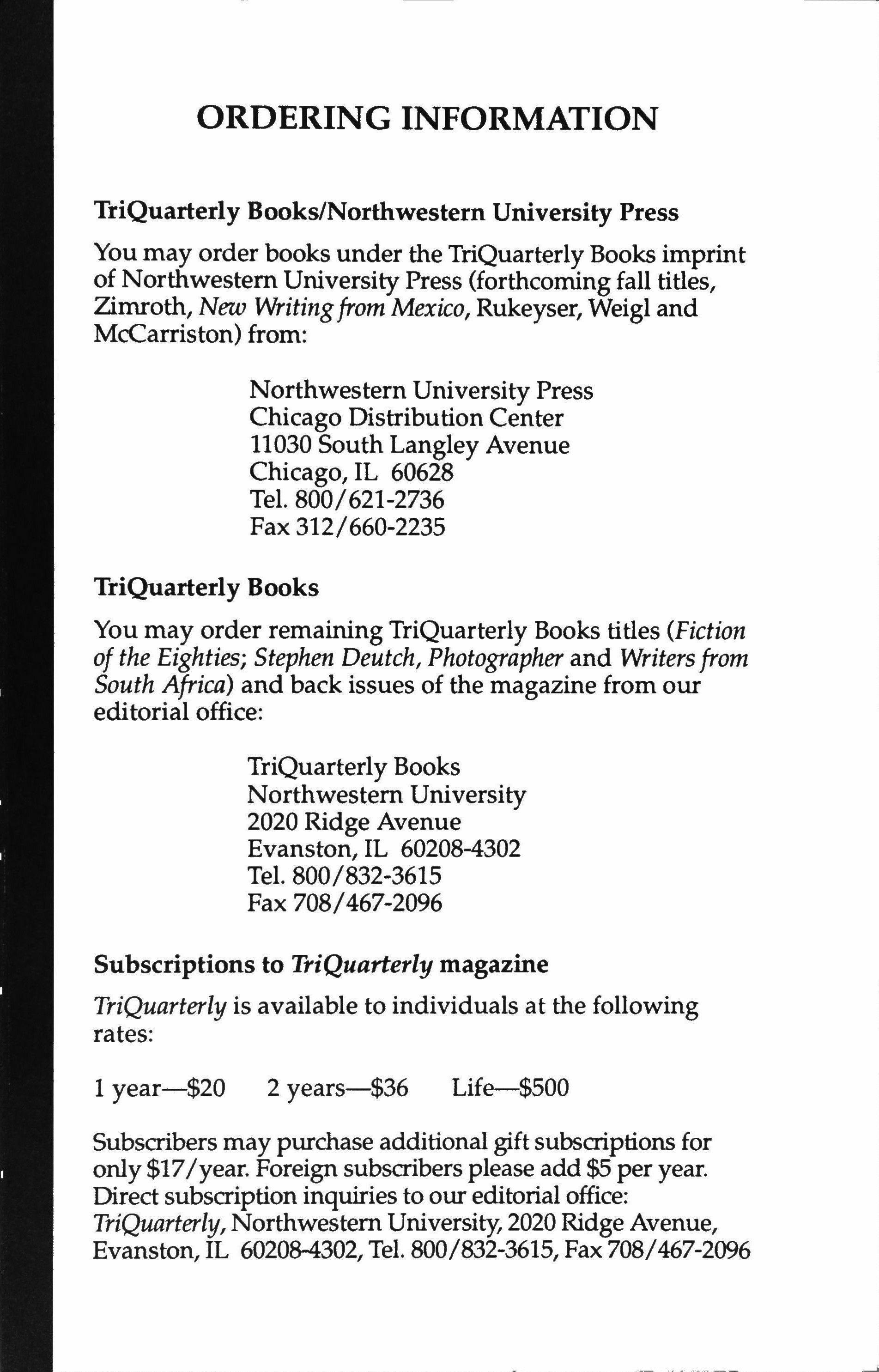
ORDERING INFORMATION
TriQuarterly Books/Northwestern University Press
You may order books under the TriQuarterly Books imprint of Northwestern University Press (forthcoming fall titles, Zimroth, New Writingfrom Mexico, Rukeyser, Weigl and McCarriston) from:
Northwestern University Press Chicago Distribution Center 11030 South Langley Avenue Chicago,IL 60628
Tel. 800/621-2736
Fax 312/660-2235
TriQuarterly Books
You may order remaining TriQuarterly Books titles (Fiction of the Eighties; Stephen Deutch, Photographer and Writers from South Africa) and back issues of the magazine from our editorial office:
TriQuarterly Books
Northwestern University 2020 Ridge Avenue Evanston, IL 60208-4302
Tel. 800/832-3615
Fax 708/467-2096
Subscriptions to TriQuarterly magazine
TriQuarterly is available to individuals at the following rates:
1 year-$20 2 years-$36 Life-$500
Subscribers may purchase additional giftsubscriptions for only$17/year. Foreign subscribers please add $5 per year. Direct subscription inquiries to our editorial office: TriQuarterly, Northwestern University, 2020 Ridge Avenue, Evanston,IL 60208-4302, Tel. 800/832-3615, Fax 708/467-2096
Editor
Reginald Gibbons
Managing Editor Kirstie Felland
Executive Editor Bob Perlongo
Special Projects Editor Fred Shafer
Readers
Co-Editor Susan Hahn
Assistant Editor Gwenan Wilbur
Design Director Gini Kondziolka
Timothy Dekin, Campbell McGrath, Charles Wasserburg
TriQuarterly Fellow Deanna Kreisel
Advisory Editors
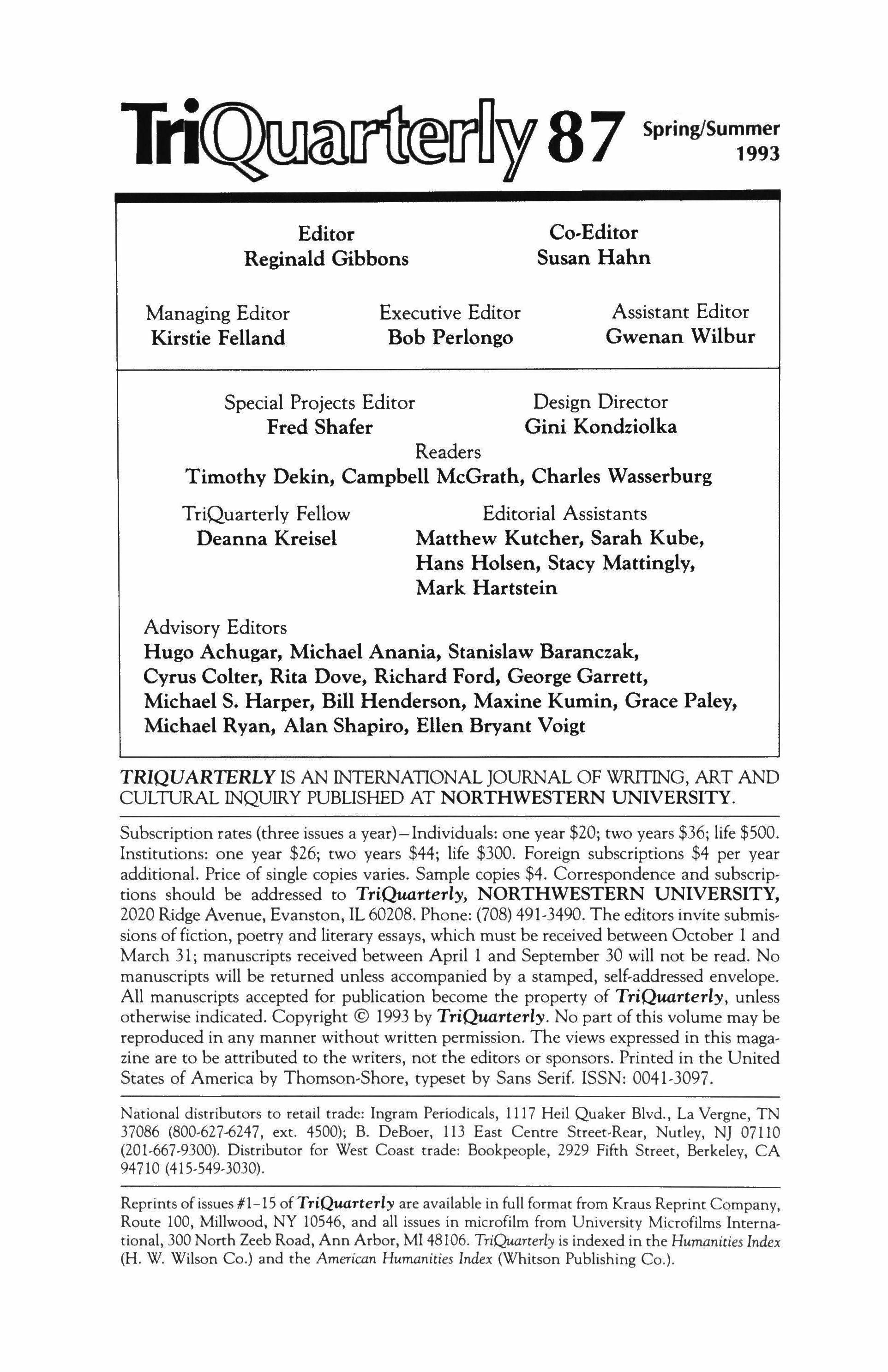
Editorial Assistants Matthew Kutcher, Sarah Kube, Hans Holsen, Stacy Mattingly, Mark Hartstein
Hugo Achugar, Michael Anania, Stanislaw Baranczak, Cyrus Colter, Rita Dove, Richard Ford, George Garrett, Michael S. Harper, Bill Henderson, Maxine Kumin, Grace Paley, Michael Ryan, Alan Shapiro, Ellen Bryant Voigt
TRIQUARTERLY IS AN INTERNATIONAL JOURNAL OF WRITING, ART AND CULTURAL INQUIRY PUBLISHED AT NORTHWESTERN UNIVERSITY.
Subscription rates (three issues a year)-Individuals: one year $20; two years $36; life $500. Institutions: one year $26; two years $44; life $300. Foreign subscriptions $4 per year additional. Price of single copies varies. Sample copies $4. Correspondence and subscriptions should be addressed to TriQuarterly, NORTHWESTERN UNIVERSITY, 2020 Ridge Avenue, Evanston, IL 60208. Phone: (708) 491-3490. The editors invite submissions of fiction, poetry and literary essays, which must be received between October 1 and March 31; manuscripts received between April 1 and September 30 will not be read. No manuscripts will be returned unless accompanied by a stamped, self-addressed envelope. All manuscripts accepted for publication become the property of TriQuarterly, unless otherwise indicated. Copyright © 1993 by TriQuarterly. No part of this volume may be reproduced in any manner without written permission. The views expressed in this magazine are to be attributed to the writers, not the editors or sponsors. Printed in the United States of America by Thomson-Shore, typeset by Sans Serif. ISSN: 0041-3097.
National distributors to retail trade: Ingram Periodicals, 1117 Heil Quaker Blvd., La Vergne, TN 37086 (800-627-6247, ext. 4500); B. DeBoer, 113 East Centre Street-Rear, Nutley, NJ 07110 (201-667-9300). Distributor for West Coast trade: Bookpeople, 2929 Fifth Street, Berkeley, CA 94710 (415-549-3030).
Reprints of issues # 1-15 of TriQuarterly are available in full format from Kraus Reprint Company, Route 100, Millwood, NY 10546, and all issues in microfilm from University Microfilms International, 300 North Zeeb Road, Ann Arbor, MI 48106. TriQuarterly is indexed in the Humanities Index (H. W. Wilson Co.) and the American Humanities Index (Whitson Publishing Co.).
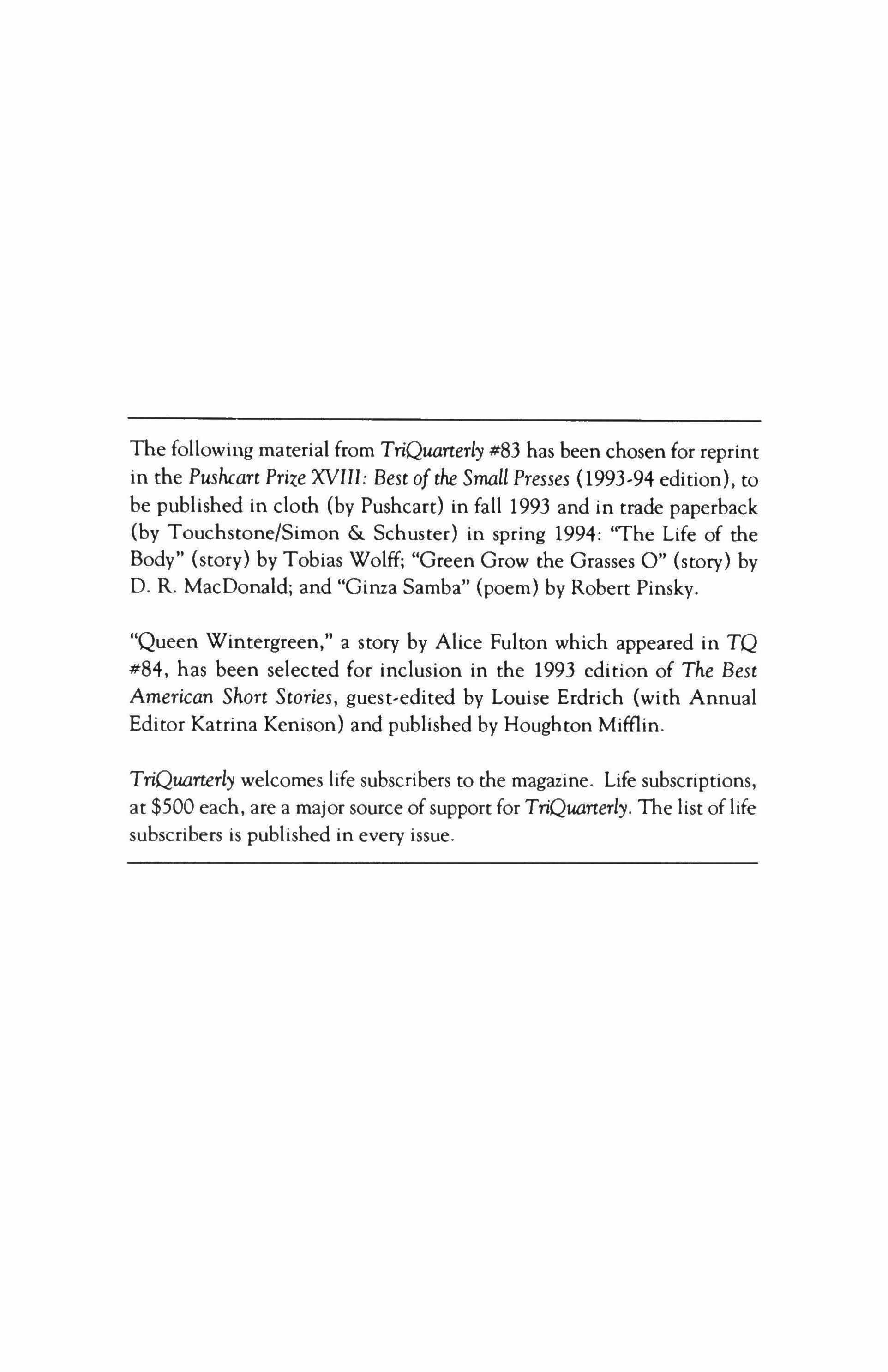
The following material from TriQuarterly #83 has been chosen for reprint in the Pushcart Prize XVIII: Best ofthe Small Presses (1993-94 edition), to be published in cloth (by Pushcart) in fall 1993 and in trade paperback (by Touchstone/Simon & Schuster) in spring 1994: "The Life of the Body" (story) by Tobias Wolff; "Green Grow the Grasses 0" (story) by D. R. MacDonald; and "Ginza Samba" (poem) by Robert Pinsky.
"Queen Wintergreen," a story by Alice Fulton which appeared in TQ #84, has been selected for inclusion in the 1993 edition of The Best American Short Stories, guest-edited by Louise Erdrich (with Annual Editor Katrina Kenison) and published by Houghton Mifflin.
TriQuarterly welcomes life subscribers to the magazine. Life subscriptions, at $500 each, are a major source of support for TriQuarterly. The list of life subscribers is published in every issue.
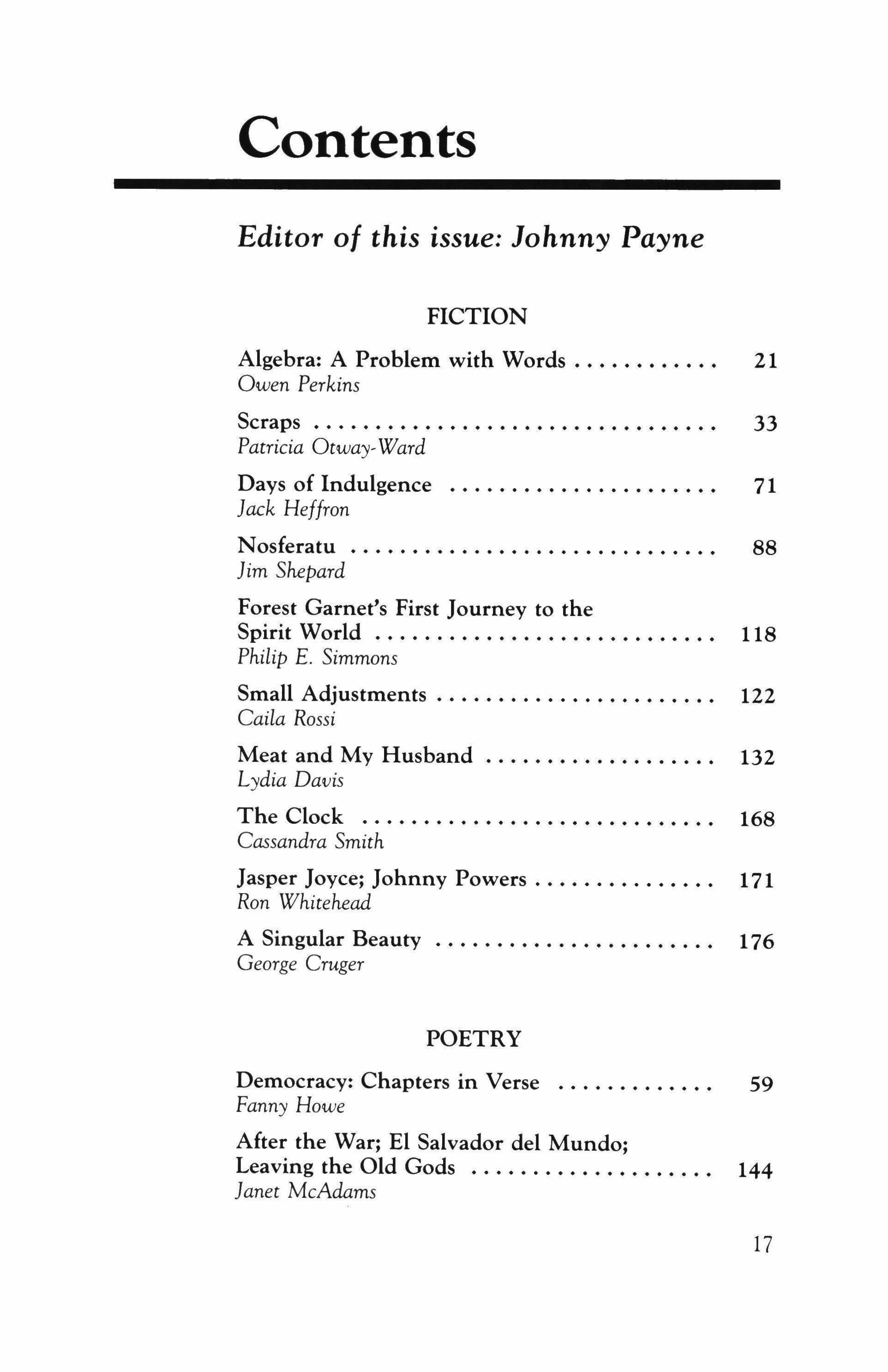
Contents Editor of this issue: Johnny Payne FICTION Algebra: A Problem with Words. 21 Owen Perkins Scraps 33 Patricia Otway-Ward Days of Indulgence ................•..... 71 Jack Heffron Nosferatu 88 Jim Shepard Forest Garnet's First Journey to the Spirit World ......................•..... 118 Philip E. Simmons Small Adjustments. 122 Caila Rossi Meat and My Husband Lydia Davis The Clock ................•....•.....•. 168 132 Cassandra Smith Jasper Joyce; Johnny Powers. 171 Ron Whitehead A Singular Beauty George Cruger 176 POETRY Democracy: Chapters in Verse 59 Fanny Howe After the War; El Salvador del Mundo; Leaving the Old Gods ..............•..... 144 Janet McAdams 17
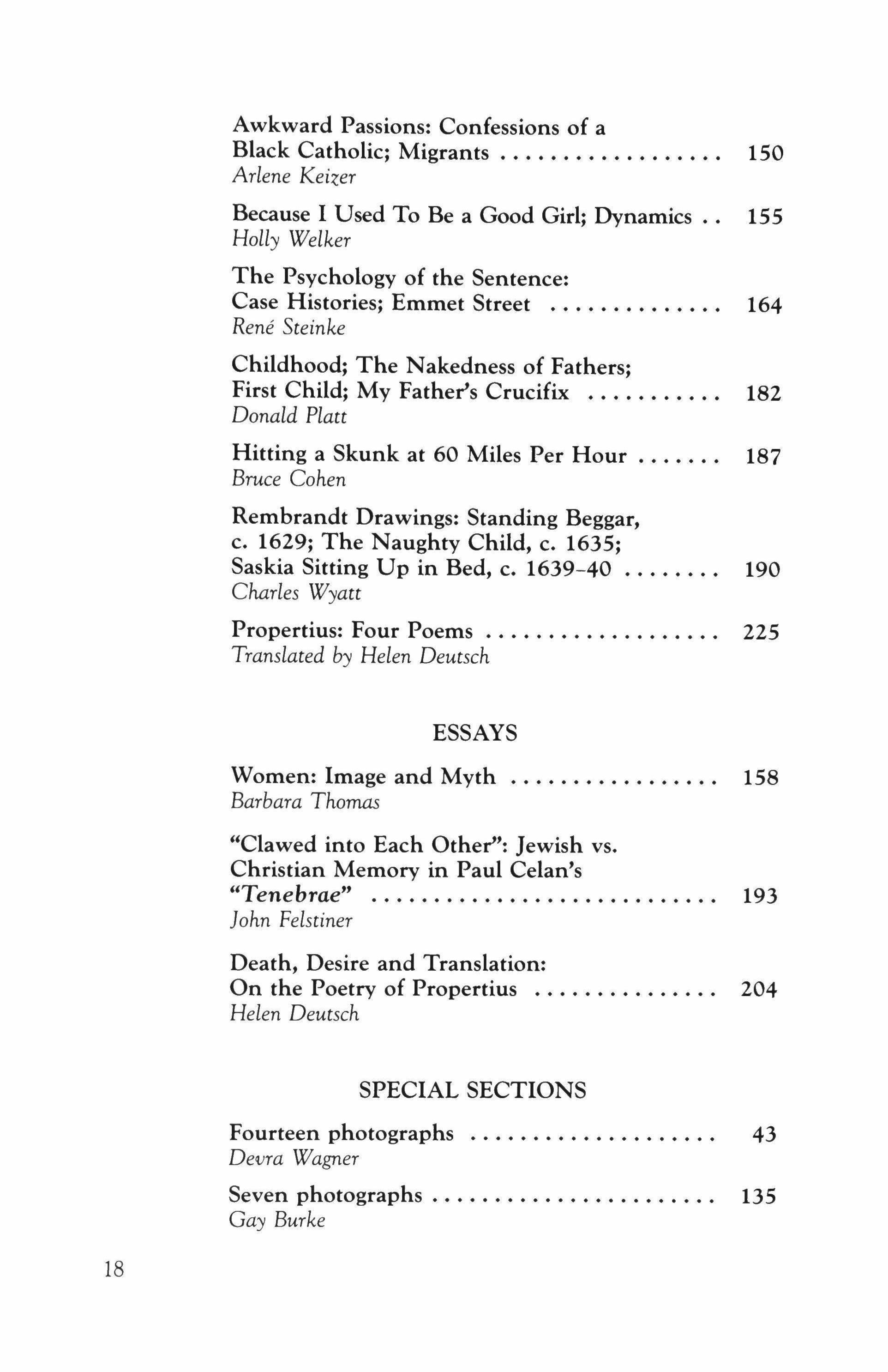
Awkward Passions: Confessions of a Black Catholic; Migrants 150
Arlene Keizer
Because I Used To Be a Good Girl; Dynamics.. 155
Holly Welker
The Psychology of the Sentence: Case Histories; Emmet Street ......•••..... 164
Rene Steinke
Childhood; The Nakedness of Fathers; First Child; My Father's Crucifix ..•........
Donald Platt
Hitting a Skunk at 60 Miles Per Hour.
Bruce Cohen
Rembrandt Drawings: Standing Beggar, c. 1629; The Naughty Child, c. 1635; Saskia Sitting Up in Bed, c. 1639-40
Charles Wyatt
Propertius: Four Poems
Translated by Helen Deutsch
ESSAYS
Women: Image and Myth
Barbara Thomas
"Clawed into Each Other": Jewish vs. Christian Memory in Paul Celan's "Tenebrae"
John Felstiner
Death, Desire and Translation: On the Poetry of Propertius
Helen Deutsch
182
187
190
225
158
193
204
SPECIAL SECTIONS
43
Fourteen photographs
135
18
Devra Wagner Seven photographs.
Gay Burke
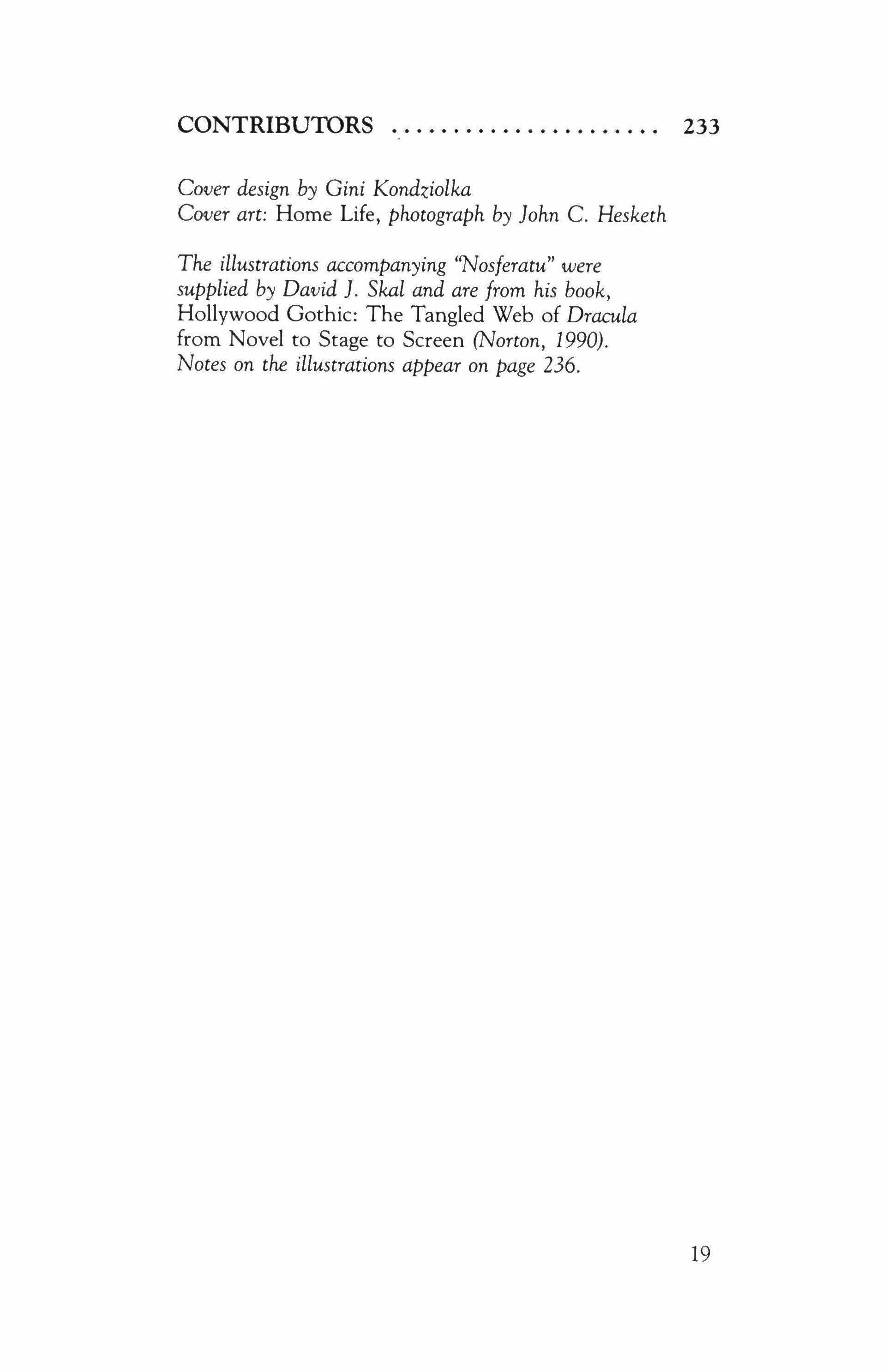
CONTRIBUTORS 233
Cover design by Gini Kondziolka
Cover art: Home Life, photograph by John C. Hesketh
The illustrations accompanying "Nosferatu" were supplied by David J. Skal and are from his book, Hollywood Gothic: The Tangled Web of Dracula from Novel to Stage to Screen (Norton, 1990). Notes on the illustrations appear on page 236.
19

Algebra: A Problem with Words
Owen Perkins
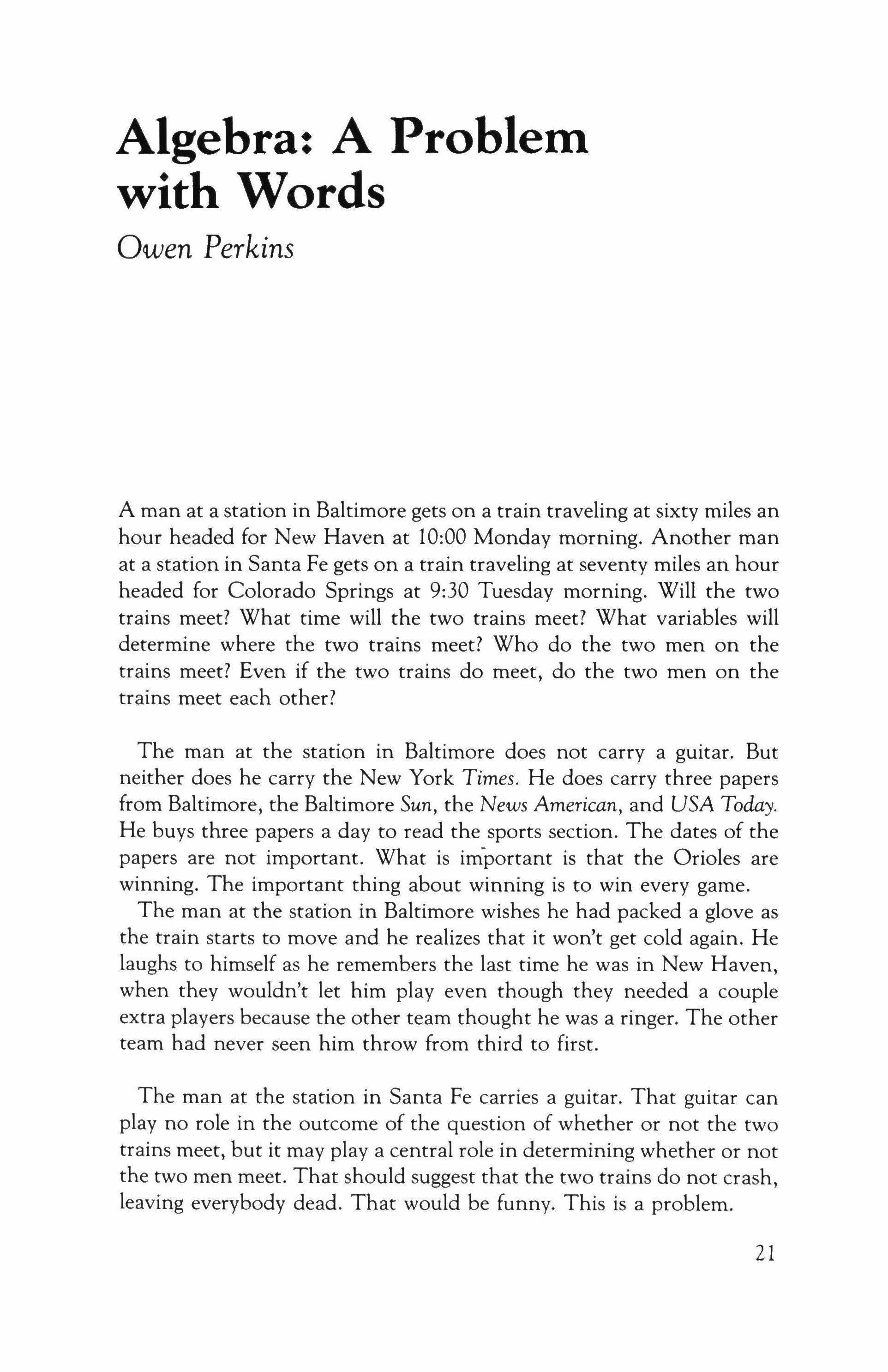
A man at a station in Baltimore gets on a train traveling at sixty miles an hour headed for New Haven at 10:00 Monday morning. Another man at a station in Santa Fe gets on a train traveling at seventy miles an hour headed for Colorado Springs at 9:30 Tuesday morning. Will the two trains meet? What time will the two trains meet? What variables will determine where the two trains meet? Who do the two men on the trains meet? Even if the two trains do meet, do the two men on the trains meet each other?
The man at the station in Baltimore does not carry a guitar. But neither does he carry the New York Times. He does carry three papers from Baltimore, the Baltimore Sun, the News American, and USA Today. He buys three papers a day to read the sports section. The dates of the papers are not important. What is important is that the Orioles are winning. The important thing about winning is to win every game.
The man at the station in Baltimore wishes he had packed a glove as the train starts to move and he realizes that it won't get cold again. He laughs to himself as he remembers the last time he was in New Haven, when they wouldn't let him play even though they needed a couple extra players because the other team thought he was a ringer. The other team had never seen him throw from third to first.
The man at the station in Santa Fe carries a guitar. That guitar can play no role in the outcome of the question of whether or not the two trains meet, but it may playa central role in determining whether or not the two men meet. That should suggest that the two trains do not crash, leaving everybody dead. That would be funny. This is a problem.
21
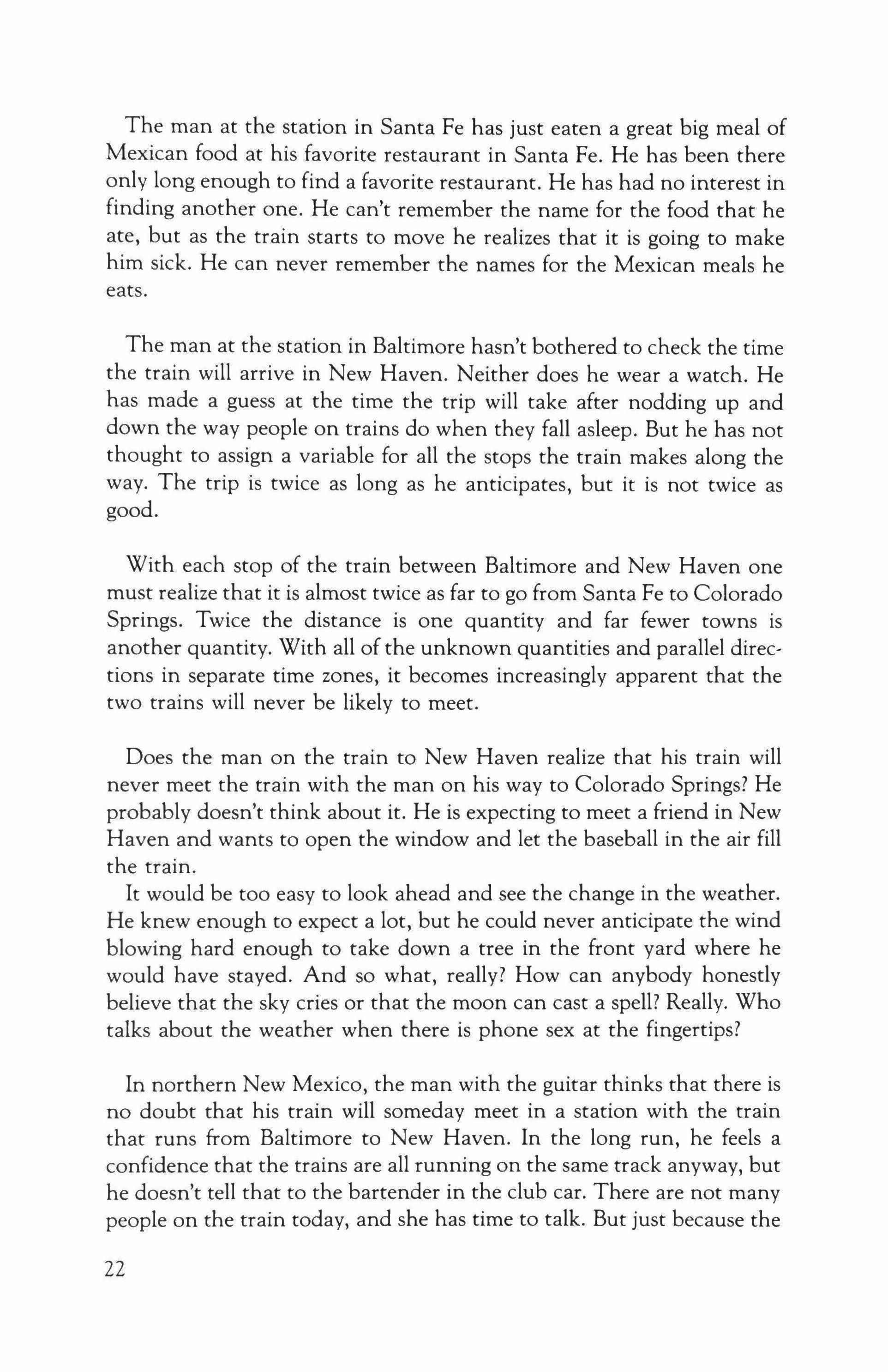
The man at the station in Santa Fe has just eaten a great big meal of Mexican food at his favorite restaurant in Santa Fe. He has been there only long enough to find a favorite restaurant. He has had no interest in finding another one. He can't remember the name for the food that he ate, but as the train starts to move he realizes that it is going to make him sick. He can never remember the names for the Mexican meals he eats.
The man at the station in Baltimore hasn't bothered to check the time the train will arrive in New Haven. Neither does he wear a watch. He has made a guess at the time the trip will take after nodding up and down the way people on trains do when they fall asleep. But he has not thought to assign a variable for all the stops the train makes along the way. The trip is twice as long as he anticipates, but it is not twice as good.
With each stop of the train between Baltimore and New Haven one must realize that it is almost twice as far to go from Santa Fe to Colorado Springs. Twice the distance is one quantity and far fewer towns is another quantity. With all of the unknown quantities and parallel directions in separate time zones, it becomes increasingly apparent that the two trains will never be likely to meet.
Does the man on the train to New Haven realize that his train will never meet the train with the man on his way to Colorado Springs? He probably doesn't think about it. He is expecting to meet a friend in New Haven and wants to open the window and let the baseball in the air fill the train.
It would be too easy to look ahead and see the change in the weather. He knew enough to expect a lot, but he could never anticipate the wind blowing hard enough to take down a tree in the front yard where he would have stayed. And so what, really? How can anybody honestly believe that the sky cries or that the moon can cast a spell? Really. Who talks about the weather when there is phone sex at the fingertips?
In northern New Mexico, the man with the guitar thinks that there is no doubt that his train will someday meet in a station with the train that runs from Baltimore to New Haven. In the long run, he feels a confidence that the trains are all running on the same track anyway, but he doesn't tell that to the bartender in the club car. There are not many people on the train today, and she has time to talk. But just because the
22
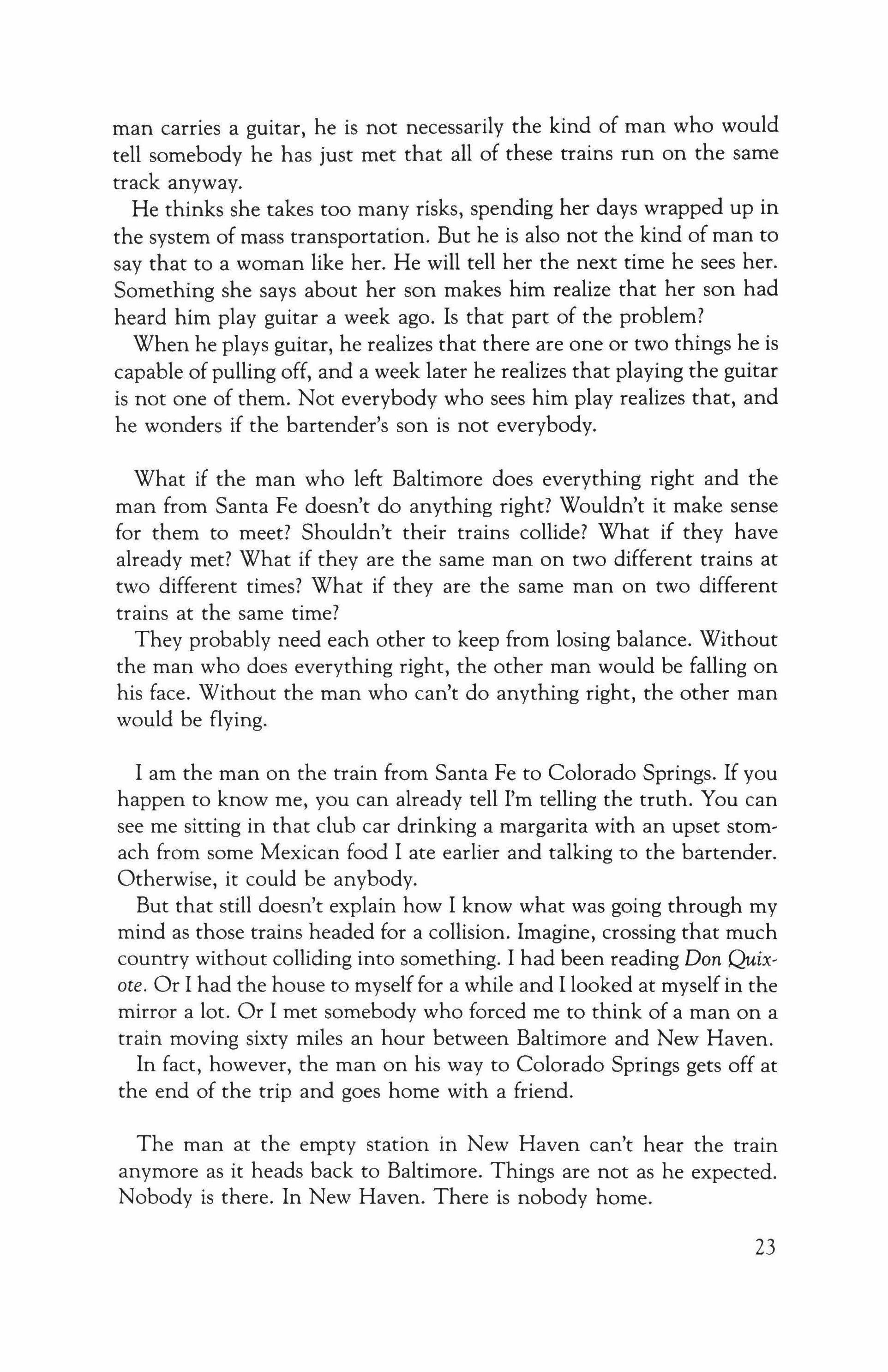
man carries a guitar, he is not necessarily the kind of man who would tell somebody he has just met that all of these trains run on the same track anyway.
He thinks she takes too many risks, spending her days wrapped up in the system of mass transportation. But he is also not the kind of man to say that to a woman like her. He will tell her the next time he sees her. Something she says about her son makes him realize that her son had heard him play guitar a week ago. Is that part of the problem?
When he plays guitar, he realizes that there are one or two things he is capable of pulling off, and a week later he realizes that playing the guitar is not one of them. Not everybody who sees him play realizes that, and he wonders if the bartender's son is not everybody.
What if the man who left Baltimore does everything right and the man from Santa Fe doesn't do anything right? Wouldn't it make sense for them to meet? Shouldn't their trains collide? What if they have already met? What if they are the same man on two different trains at two different times? What if they are the same man on two different trains at the same time?
They probably need each other to keep from losing balance. Without the man who does everything right, the other man would be falling on his face. Without the man who can't do anything right, the other man would be flying.
I am the man on the train from Santa Fe to Colorado Springs. If you happen to know me, you can already tell I'm telling the truth. You can see me sitting in that club car drinking a margarita with an upset stomach from some Mexican food I ate earlier and talking to the bartender. Otherwise, it could be anybody.
But that still doesn't explain how I know what was going through my mind as those trains headed for a collision. Imagine, crossing that much country without colliding into something. I had been reading Don Quixote. Or I had the house to myselffor a while and I looked at myself in the mirror a lot. Or I met somebody who forced me to think of a man on a train moving sixty miles an hour between Baltimore and New Haven.
In fact, however, the man on his way to Colorado Springs gets off at the end of the trip and goes home with a friend.
The man at the empty station in New Haven can't hear the train anymore as it heads back to Baltimore. Things are not as he expected. Nobody is there. In New Haven. There is nobody home.
23
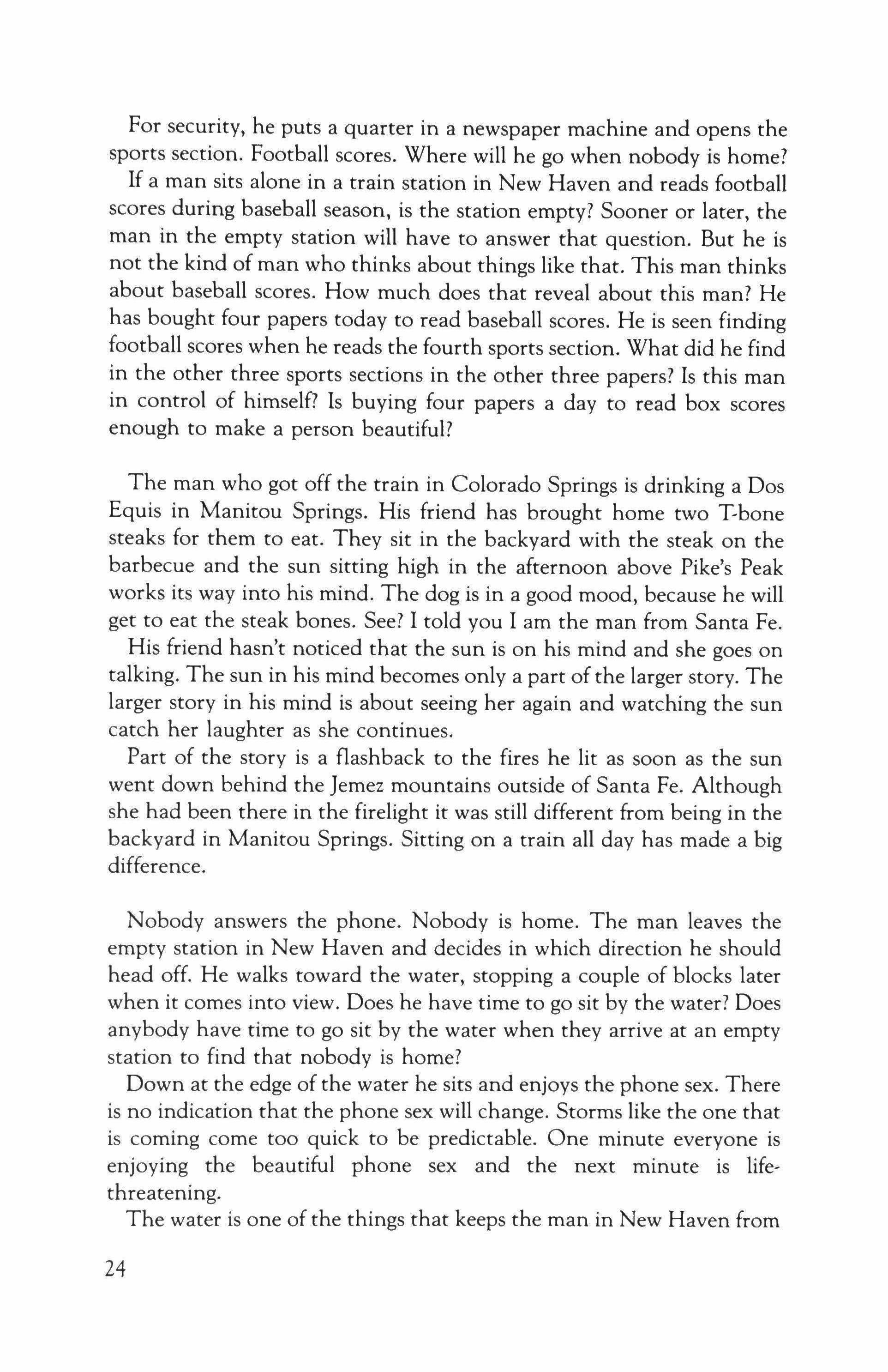
For security, he puts a quarter in a newspaper machine and opens the sports section. Football scores. Where will he go when nobody is home?
If a man sits alone in a train station in New Haven and reads football scores during baseball season, is the station empty? Sooner or later, the man in the empty station will have to answer that question. But he is not the kind of man who thinks about things like that. This man thinks about baseball scores. How much does that reveal about this man? He has bought four papers today to read baseball scores. He is seen finding football scores when he reads the fourth sports section. What did he find in the other three sports sections in the other three papers? Is this man in control of himself? Is buying four papers a day to read box scores enough to make a person beautiful?
The man who got off the train in Colorado Springs is drinking a Dos Equis in Manitou Springs. His friend has brought home two T-bone steaks for them to eat. They sit in the backyard with the steak on the barbecue and the sun sitting high in the afternoon above Pike's Peak works its way into his mind. The dog is in a good mood, because he will get to eat the steak bones. See? I told you I am the man from Santa Fe. His friend hasn't noticed that the sun is on his mind and she goes on talking. The sun in his mind becomes only a part of the larger story. The larger story in his mind is about seeing her again and watching the sun catch her laughter as she continues.
Part of the story is a flashback to the fires he lit as soon as the sun went down behind the Jemez mountains outside of Santa Fe. Although she had been there in the firelight it was still different from being in the backyard in Manitou Springs. Sitting on a train all day has made a big difference.
Nobody answers the phone. Nobody is home. The man leaves the empty station in New Haven and decides in which direction he should head off. He walks toward the water, stopping a couple of blocks later when it comes into view. Does he have time to go sit by the water? Does anybody have time to go sit by the water when they arrive at an empty station to find that nobody is home?
Down at the edge of the water he sits and enjoys the phone sex. There is no indication that the phone sex will change. Storms like the one that is coming come too quick to be predictable. One minute everyone is enjoying the beautiful phone sex and the next minute is lifethreatening.
The water is one of the things that keeps the man in New Haven from
24
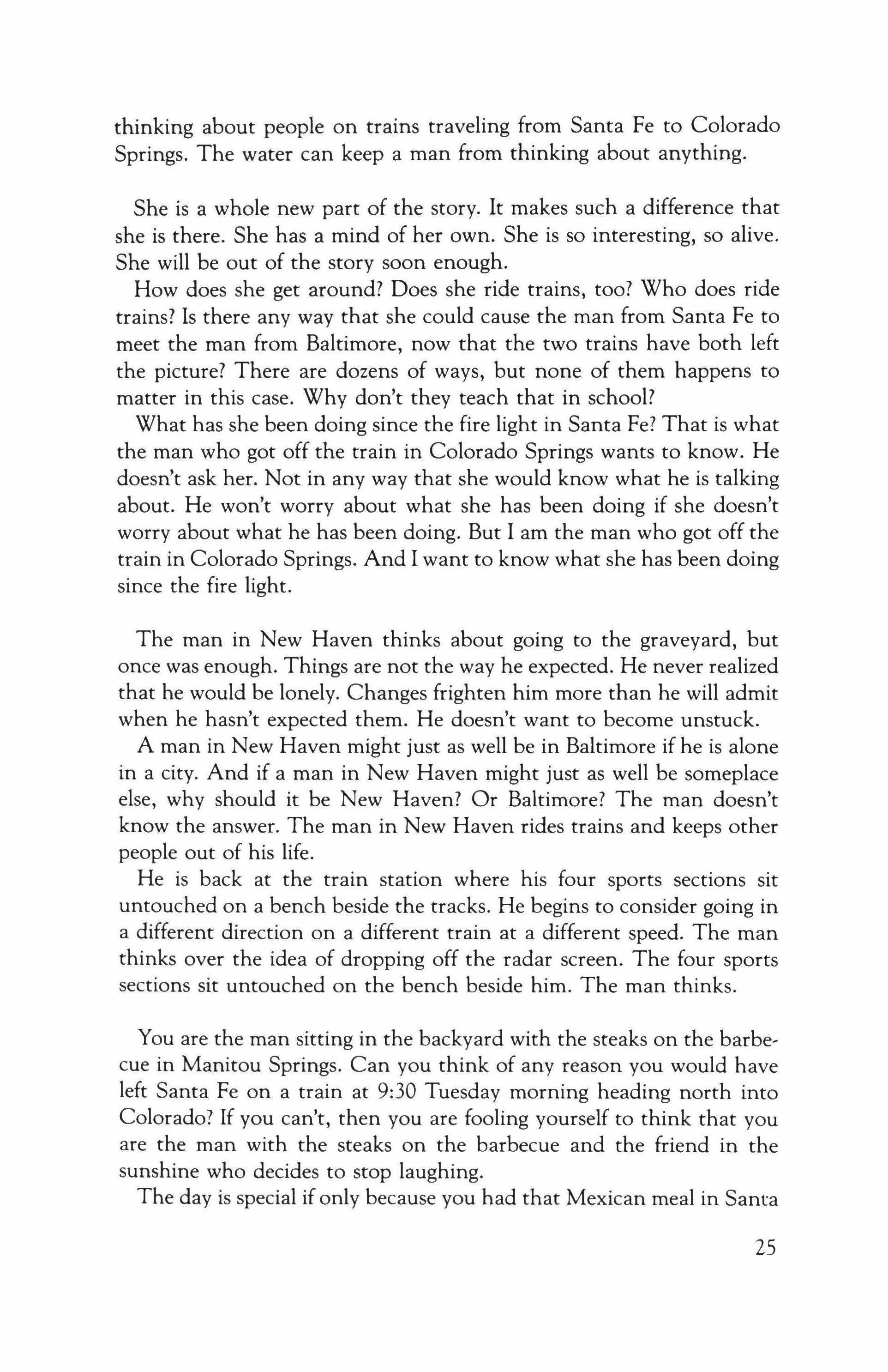
thinking about people on trains traveling from Santa Fe to Colorado Springs. The water can keep a man from thinking about anything.
She is a whole new part of the story. It makes such a difference that she is there. She has a mind of her own. She is so interesting, so alive. She will be out of the story soon enough.
How does she get around? Does she ride trains, too? Who does ride trains? Is there any way that she could cause the man from Santa Fe to meet the man from Baltimore, now that the two trains have both left the picture? There are dozens of ways, but none of them happens to matter in this case. Why don't they teach that in school?
What has she been doing since the fire light in Santa Fe? That is what the man who got off the train in Colorado Springs wants to know. He doesn't ask her. Not in any way that she would know what he is talking about. He won't worry about what she has been doing if she doesn't worry about what he has been doing. But I am the man who got off the train in Colorado Springs. And I want to know what she has been doing since the fire light.
The man in New Haven thinks about going to the graveyard, but once was enough. Things are not the way he expected. He never realized that he would be lonely. Changes frighten him more than he will admit when he hasn't expected them. He doesn't want to become unstuck.
A man in New Haven might just as well be in Baltimore if he is alone in a city. And if a man in New Haven might just as well be someplace else, why should it be New Haven? Or Baltimore? The man doesn't know the answer. The man in New Haven rides trains and keeps other people out of his life.
He is back at the train station where his four sports sections sit untouched on a bench beside the tracks. He begins to consider going in a different direction on a different train at a different speed. The man thinks over the idea of dropping off the radar screen. The four sports sections sit untouched on the bench beside him. The man thinks.
You are the man sitting in the backyard with the steaks on the barbecue in Manitou Springs. Can you think of any reason you would have left Santa Fe on a train at 9:30 Tuesday morning heading north into Colorado? If you can't, then you are fooling yourself to think that you are the man with the steaks on the barbecue and the friend in the sunshine who decides to stop laughing.
The day is special if only because you had that Mexican meal in Santa
25
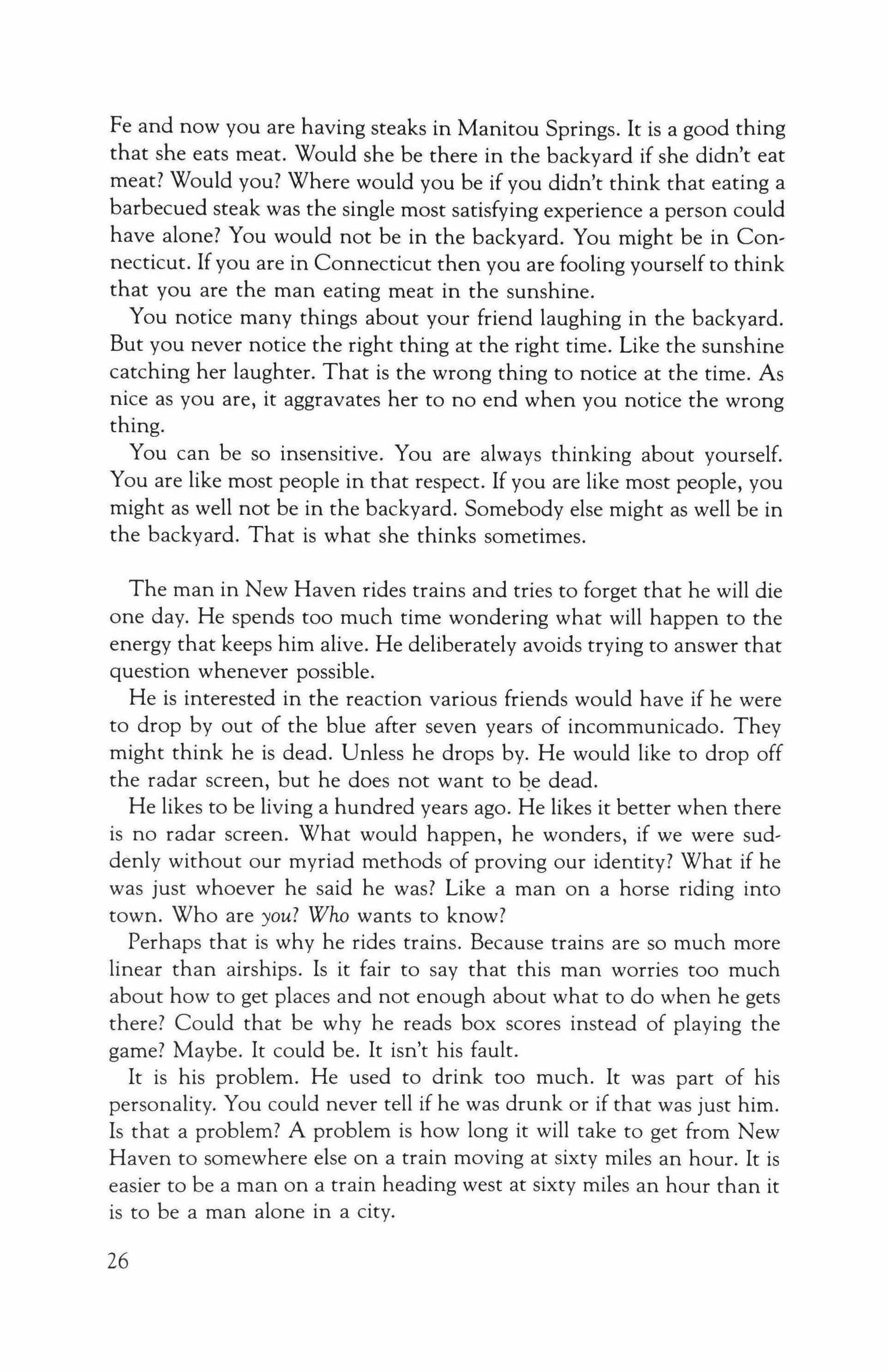
Fe and now you are having steaks in Manitou Springs. It is a good thing that she eats meat. Would she be there in the backyard if she didn't eat meat? Would you? Where would you be if you didn't think that eating a barbecued steak was the single most satisfying experience a person could have alone? You would not be in the backyard. You might be in Connecticut. If you are in Connecticut then you are fooling yourself to think that you are the man eating meat in the sunshine.
You notice many things about your friend laughing in the backyard. But you never notice the right thing at the right time. Like the sunshine catching her laughter. That is the wrong thing to notice at the time. As nice as you are, it aggravates her to no end when you notice the wrong thing.
You can be so insensitive. You are always thinking about yourself. You are like most people in that respect. If you are like most people, you might as well not be in the backyard. Somebody else might as well be in the backyard. That is what she thinks sometimes.
The man in New Haven rides trains and tries to forget that he will die one day. He spends too much time wondering what will happen to the energy that keeps him alive. He deliberately avoids trying to answer that question whenever possible.
He is interested in the reaction various friends would have if he were to drop by out of the blue after seven years of incommunicado. They might think he is dead. Unless he drops by. He would like to drop off the radar screen, but he does not want to be dead.
He likes to be living a hundred years ago. He likes it better when there is no radar screen. What would happen, he wonders, if we were suddenly without our myriad methods of proving our identity? What if he was just whoever he said he was? Like a man on a horse riding into town. Who are you? Who wants to know?
Perhaps that is why he rides trains. Because trains are so much more linear than airships. Is it fair to say that this man worries too much about how to get places and not enough about what to do when he gets there? Could that be why he reads box scores instead of playing the game? Maybe. It could be. It isn't his fault.
It is his problem. He used to drink too much. It was part of his personality. You could never tell if he was drunk or if that was just him. Is that a problem? A problem is how long it will take to get from New Haven to somewhere else on a train moving at sixty miles an hour. It is easier to be a man on a train heading west at sixty miles an hour than it is to be a man alone in a city.
26
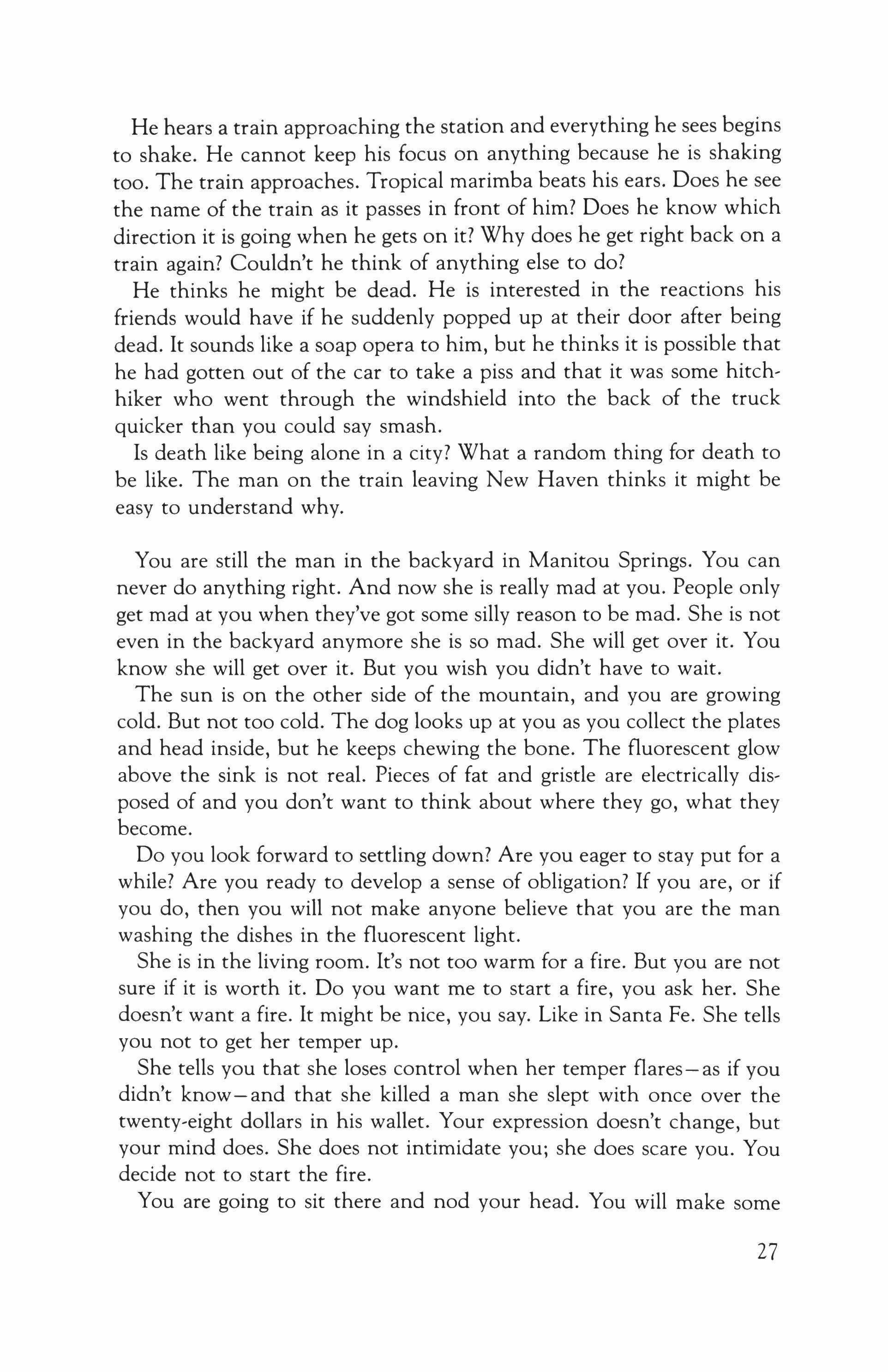
He hears a train approaching the station and everything he sees begins to shake. He cannot keep his focus on anything because he is shaking too. The train approaches. Tropical marimba beats his ears. Does he see the name of the train as it passes in front of him? Does he know which direction it is going when he gets on it? Why does he get right back on a train again? Couldn't he think of anything else to do?
He thinks he might be dead. He is interested in the reactions his friends would have if he suddenly popped up at their door after being dead. It sounds like a soap opera to him, but he thinks it is possible that he had gotten out of the car to take a piss and that it was some hitchhiker who went through the windshield into the back of the truck quicker than you could say smash.
Is death like being alone in a city? What a random thing for death to be like. The man on the train leaving New Haven thinks it might be easy to understand why.
You are still the man in the backyard in Manitou Springs. You can never do anything right. And now she is really mad at you. People only get mad at you when they've got some silly reason to be mad. She is not even in the backyard anymore she is so mad. She will get over it. You know she will get over it. But you wish you didn't have to wait.
The sun is on the other side of the mountain, and you are growing cold. But not too cold. The dog looks up at you as you collect the plates and head inside, but he keeps chewing the bone. The fluorescent glow above the sink is not real. Pieces of fat and gristle are electrically disposed of and you don't want to think about where they go, what they become.
Do you look forward to settling down? Are you eager to stay put for a while? Are you ready to develop a sense of obligation? If you are, or if you do, then you will not make anyone believe that you are the man washing the dishes in the fluorescent light.
She is in the living room. It's not too warm for a fire. But you are not sure if it is worth it. Do you want me to start a fire, you ask her. She doesn't want a fire. It might be nice, you say. Like in Santa Fe. She tells you not to get her temper up.
She tells you that she loses control when her temper flares-as if you didn't know-and that she killed a man she slept with once over the twenty-eight dollars in his wallet. Your expression doesn't change, but your mind does. She does not intimidate you; she does scare you. You decide not to start the fire.
You are going to sit there and nod your head. You will make some
27
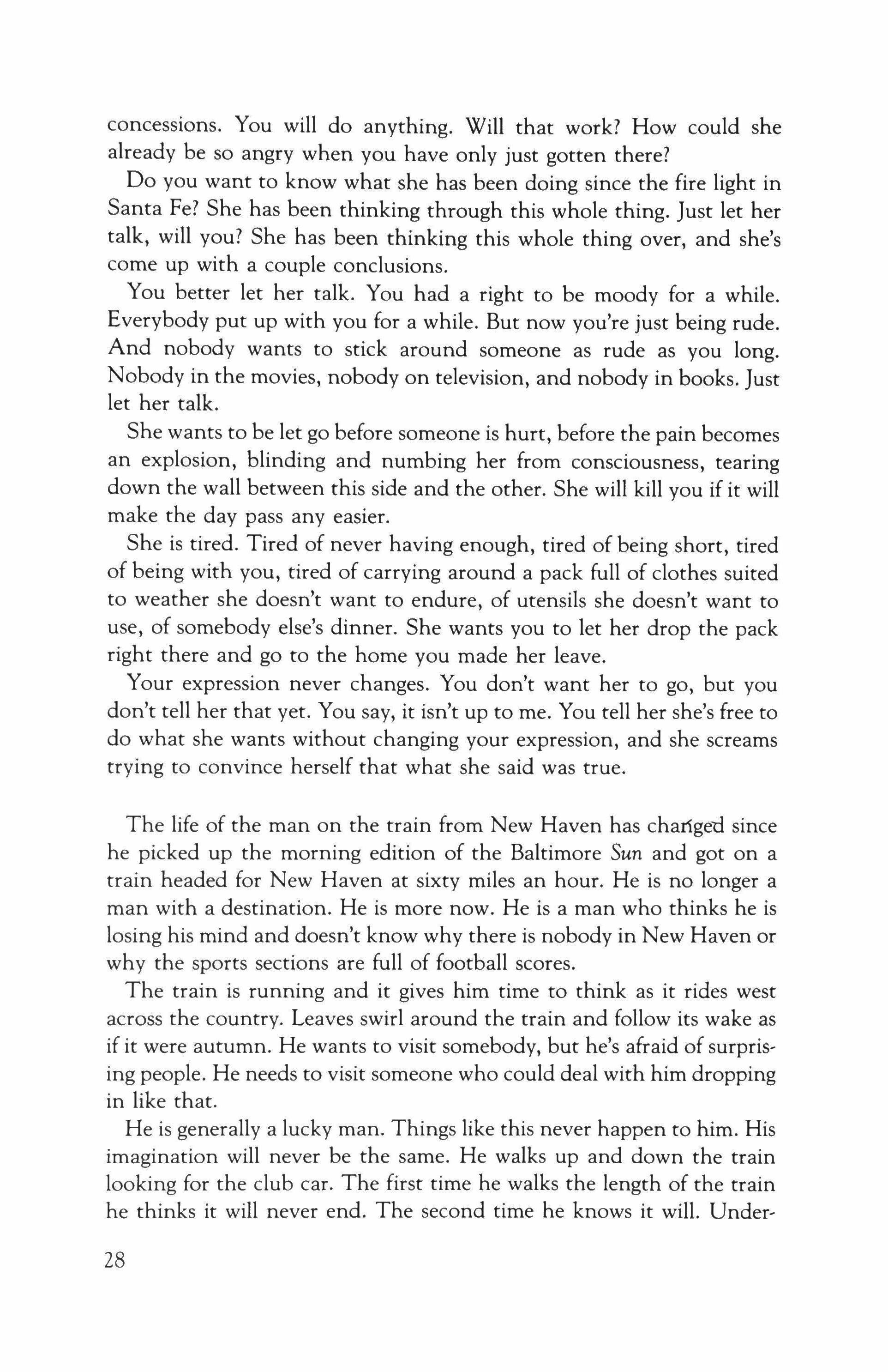
concessions. You will do anything. Will that work? How could she already be so angry when you have only just gotten there?
Do you want to know what she has been doing since the fire light in Santa Fe? She has been thinking through this whole thing. Just let her talk, will you? She has been thinking this whole thing over, and she's come up with a couple conclusions.
You better let her talk. You had a right to be moody for a while. Everybody put up with you for a while. But now you're just being rude. And nobody wants to stick around someone as rude as you long. Nobody in the movies, nobody on television, and nobody in books. Just let her talk.
She wants to be let go before someone is hurt, before the pain becomes an explosion, blinding and numbing her from consciousness, tearing down the wall between this side and the other. She will kill you if it will make the day pass any easier.
She is tired. Tired of never having enough, tired of being short, tired of being with you, tired of carrying around a pack full of clothes suited to weather she doesn't want to endure, of utensils she doesn't want to use, of somebody else's dinner. She wants you to let her drop the pack right there and go to the horne you made her leave.
Your expression never changes. You don't want her to go, but you don't tell her that yet. You say, it isn't up to me. You tell her she's free to do what she wants without changing your expression, and she screams trying to convince herself that what she said was true.
The life of the man on the train from New Haven has changed since he picked up the morning edition of the Baltimore Sun and got on a train headed for New Haven at sixty miles an hour. He is no longer a man with a destination. He is more now. He is a man who thinks he is losing his mind and doesn't know why there is nobody in New Haven or why the sports sections are full of football scores.
The train is running and it gives him time to think as it rides west across the country. Leaves swirl around the train and follow its wake as if it were autumn. He wants to visit somebody, but he's afraid of surprising people. He needs to visit someone who could deal with him dropping in like that.
He is generally a lucky man. Things like this never happen to him. His imagination will never be the same. He walks up and down the train looking for the club car. The first time he walks the length of the train he thinks it will never end. The second time he knows it will. Under-
28
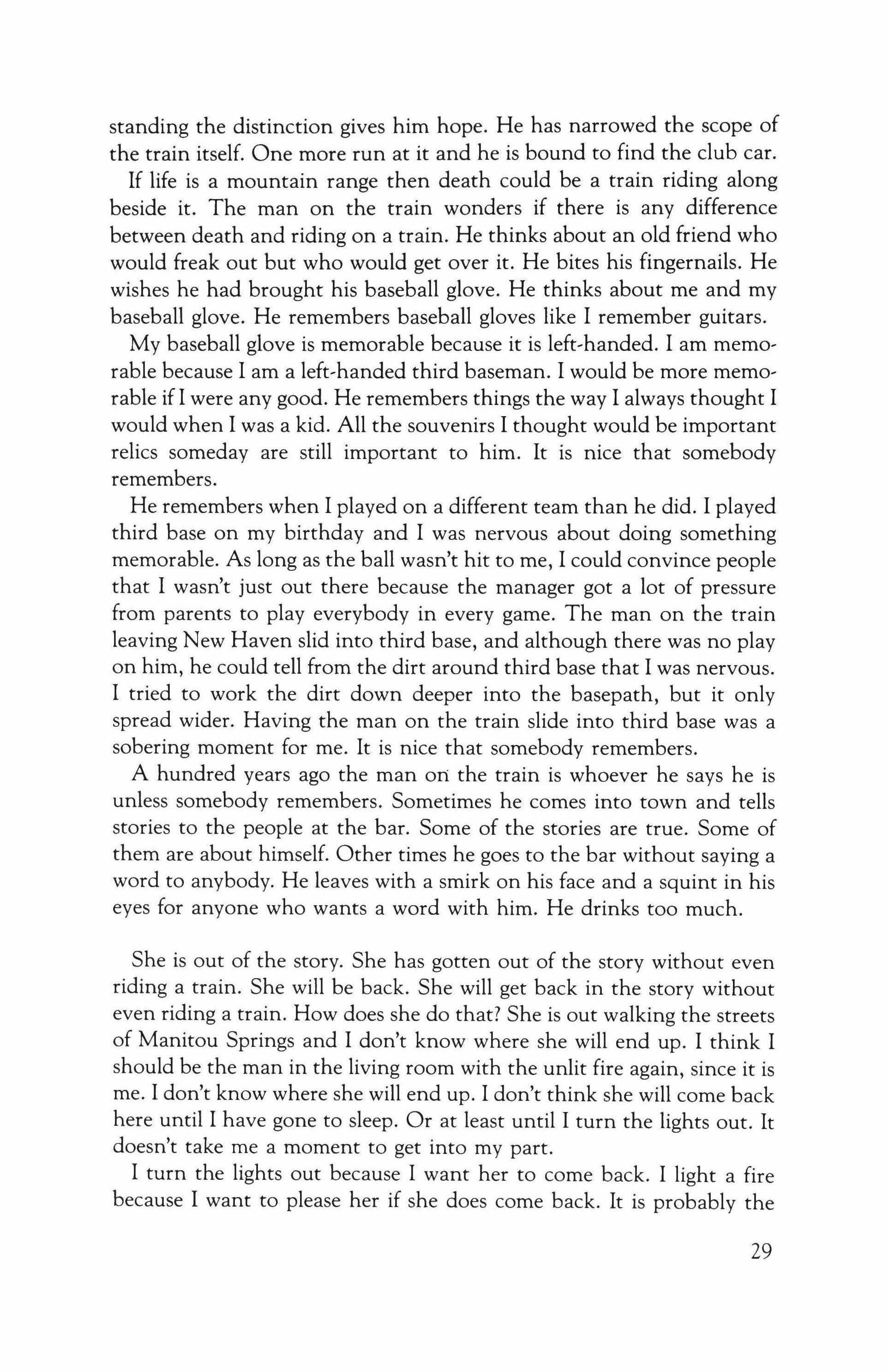
standing the distinction gives him hope. He has narrowed the scope of the train itself. One more run at it and he is bound to find the club car.
If life is a mountain range then death could be a train riding along beside it. The man on the train wonders if there is any difference between death and riding on a train. He thinks about an old friend who would freak out but who would get over it. He bites his fingernails. He wishes he had brought his baseball glove. He thinks about me and my baseball glove. He remembers baseball gloves like I remember guitars.
My baseball glove is memorable because it is left-handed. I am memorable because I am a left-handed third baseman. I would be more memorable if I were any good. He remembers things the way I always thought I would when I was a kid. All the souvenirs I thought would be important relics someday are still important to him. It is nice that somebody remembers.
He remembers when I played on a different team than he did. I played third base on my birthday and I was nervous about doing something memorable. As long as the ball wasn't hit to me, I could convince people that I wasn't just out there because the manager got a lot of pressure from parents to play everybody in every game. The man on the train leaving New Haven slid into third base, and although there was no play on him, he could tell from the dirt around third base that I was nervous. I tried to work the dirt down deeper into the basepath, but it only spread wider. Having the man on the train slide into third base was a sobering moment for me. It is nice that somebody remembers.
A hundred years ago the man on the train is whoever he says he is unless somebody remembers. Sometimes he comes into town and tells stories to the people at the bar. Some of the stories are true. Some of them are about himself. Other times he goes to the bar without saying a word to anybody. He leaves with a smirk on his face and a squint in his eyes for anyone who wants a word with him. He drinks too much.
She is out of the story. She has gotten out of the story without even riding a train. She will be back. She will get back in the story without even riding a train. How does she do that? She is out walking the streets of Manitou Springs and I don't know where she will end up. I think I should be the man in the living room with the unlit fire again, since it is me. I don't know where she will end up. I don't think she will come back here until I have gone to sleep. Or at least until I turn the lights out. It doesn't take me a moment to get into my part.
I turn the lights out because I want her to come back. I light a fire because I want to please her if she does come back. It is probably the
29

wrong thing to do. I always do the wrong thing. I am not generally very lucky. I am lucky that she is angry with me. She is not angry with you. I prefer fires to almost anything. I am good at making fires. She doesn't even try anymore. I am so smug when she needs me to start the fire. It comes from not doing anything right. I think she will understand when I make a big deal about one or two things that work out for me. She doesn't. She says it's just me and my macho male-ego bullshit.
The dog comes inside when I turn out the lights. Turning out the lights doesn't impress him. Starting a fire doesn't even impress him. He knows there are things I can do that he cannot. He knows it is usually a slow night when I light a fire. I sit on the couch and stare at the fire. The television has begun to make sense to him, but he doesn't understand the hours in front of a fire.
The Mexican food from earlier in the day is still with me. The silver buckles on my guitar case shine in the fire light. The dog follows my eyes to its shine. The dog doesn't care much for my music. Sometimes I think he only really understands me when I speak French.
It is embarrassing to play the guitar. I am not good enough to make a living at it, but not enough people realize that. She could make a living singing while I play the guitar, but she is out walking the streets of Manitou Springs. She is out of the story.
Sometimes I sat in the dark in Santa Fe and listened to a tape of a song I had written. I had taped some of my friends singing the song over the telephone. She wouldn't sing on the tape. She is out of the story. Another friend sang and told some jokes. He is dead now, but he is on tape. He always tells the same jokes.
I think you should be the man on the train. You are part of this. You are laughing at an old joke that comes to your mind. You are thinking about when we were in school together. You were a good student. I never did anything right. The train you are riding on is going to blow up, but you have no way of knowing that.
It is always a long ride through Kansas. There was only one newspaper, and the sports section must have fallen out. If you can find your way to Manitou Springs, you know that I am always following the Orioles. I am not expecting you. You will be dropping in out of nowhere. I will be surprised to find that I am not freaked out. That will come later.
I want to see this through your eyes. You are on a train coming out of Kansas, finally, you say. What do you think when you first see the mountain? It must feel different from when you first saw the water a
30
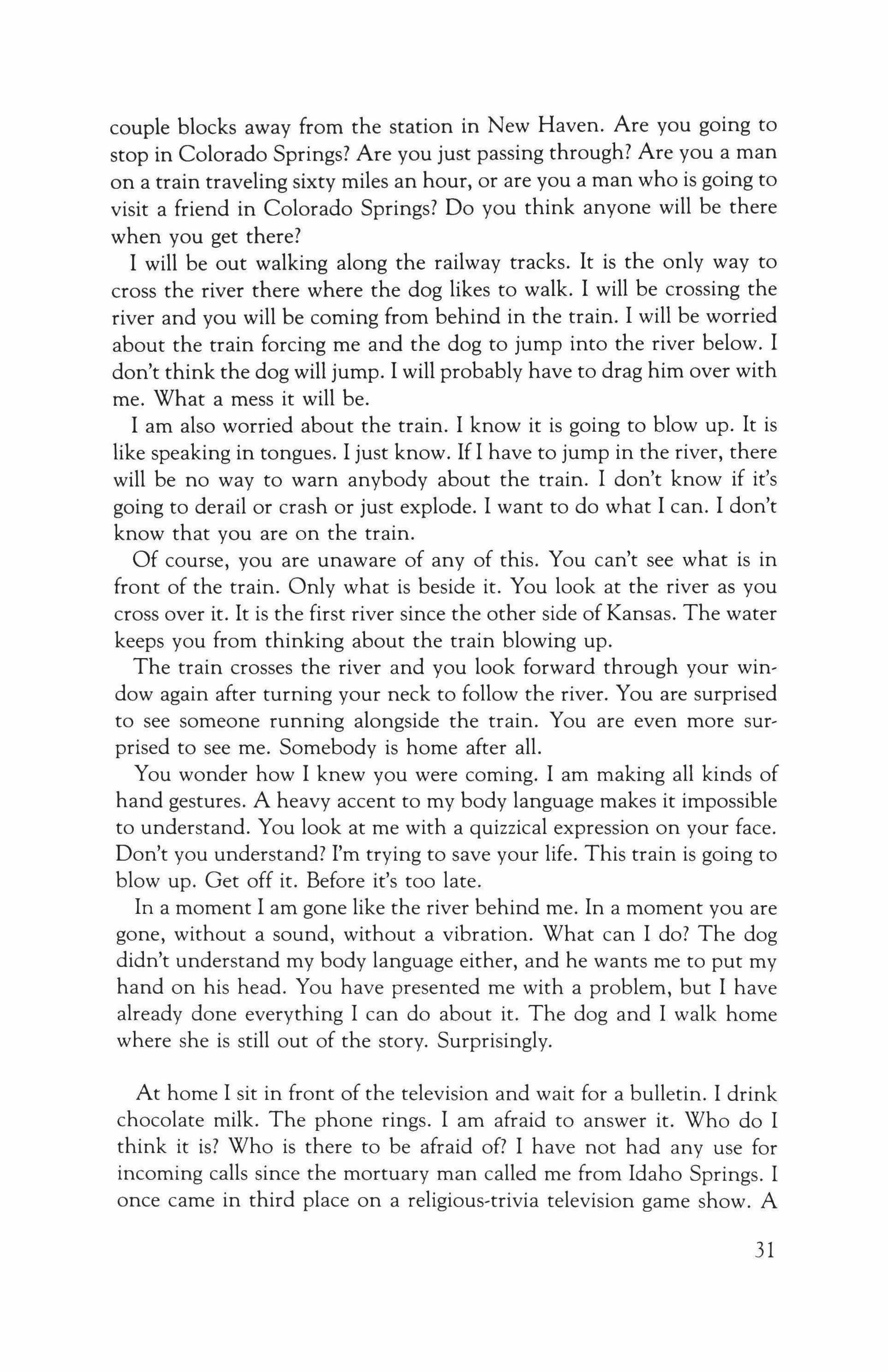
couple blocks away from the station in New Haven. Are you going to stop in Colorado Springs? Are you just passing through? Are you a man on a train traveling sixty miles an hour, or are you a man who is going to visit a friend in Colorado Springs? Do you think anyone will be there when you get there?
I will be out walking along the railway tracks. It is the only way to cross the river there where the dog likes to walk. I will be crossing the river and you will be coming from behind in the train. I will be worried about the train forcing me and the dog to jump into the river below. I don't think the dog will jump. I will probably have to drag him over with me. What a mess it will be.
I am also worried about the train. I know it is going to blow up. It is like speaking in tongues. I just know. If I have to jump in the river, there will be no way to warn anybody about the train. I don't know if it's going to derail or crash or just explode. I want to do what I can. I don't know that you are on the train.
Of course, you are unaware of any of this. You can't see what is in front of the train. Only what is beside it. You look at the river as you cross over it. It is the first river since the other side of Kansas. The water keeps you from thinking about the train blowing up.
The train crosses the river and you look forward through your window again after turning your neck to follow the river. You are surprised to see someone running alongside the train. You are even more surprised to see me. Somebody is home after all.
You wonder how I knew you were coming. I am making all kinds of hand gestures. A heavy accent to my body language makes it impossible to understand. You look at me with a quizzical expression on your face. Don't you understand? I'm trying to save your life. This train is going to blow up. Get off it. Before it's too late.
In a moment I am gone like the river behind me. In a moment you are gone, without a sound, without a vibration. What can I do? The dog didn't understand my body language either, and he wants me to put my hand on his head. You have presented me with a problem, but I have already done everything I can do about it. The dog and I walk home where she is still out of the story. Surprisingly.
At home I sit in front of the television and wait for a bulletin. I drink chocolate milk. The phone rings. I am afraid to answer it. Who do I think it is? Who is there to be afraid of? I have not had any use for incoming calls since the mortuary man called me from Idaho Springs. I once came in third place on a religious-trivia television game show. A
31
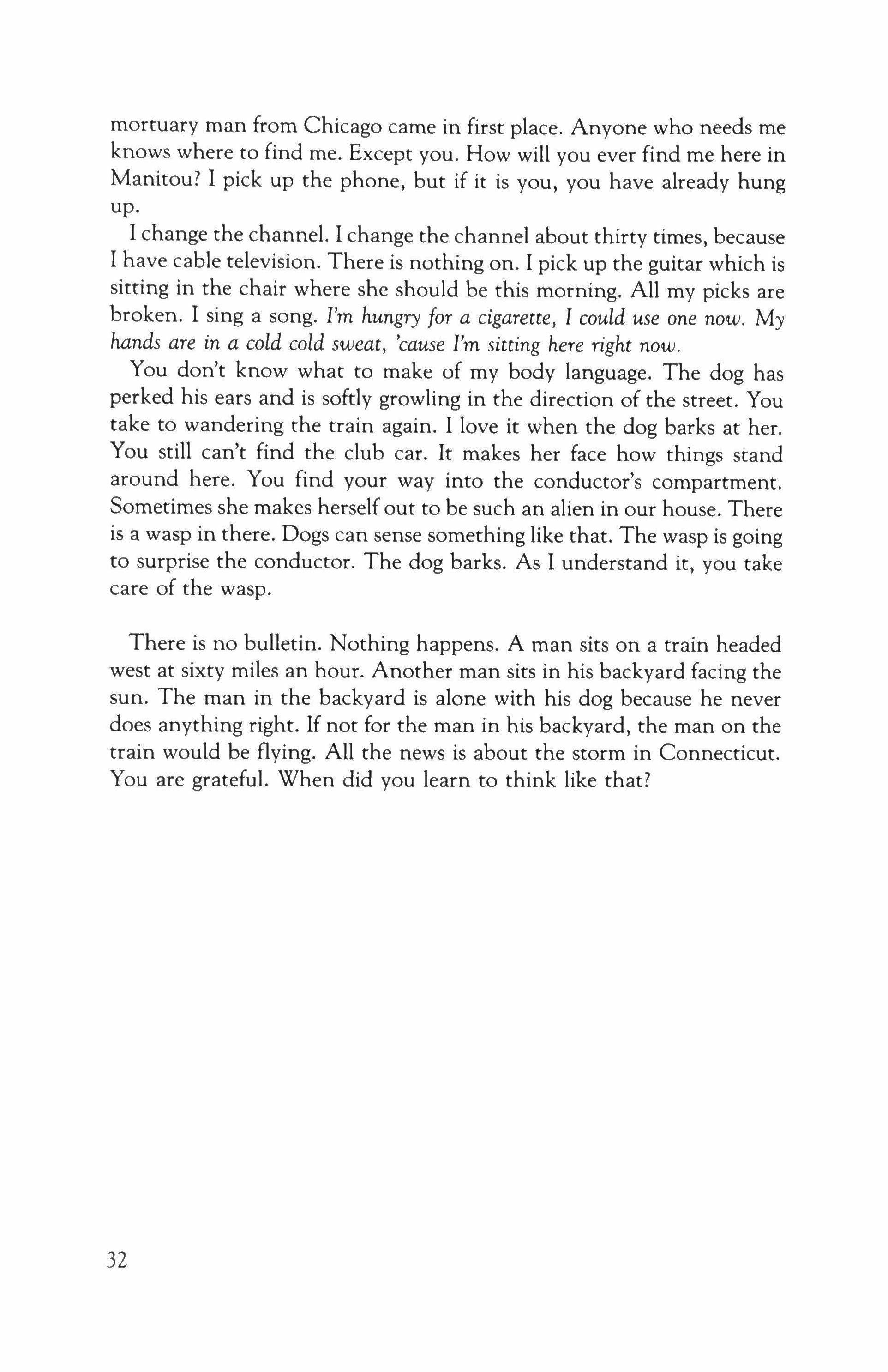
mortuary man from Chicago came in first place. Anyone who needs me knows where to find me. Except you. How will you ever find me here in Manitou? I pick up the phone, but if it is you, you have already hung up.
I change the channel. I change the channel about thirty times, because I have cable television. There is nothing on. I pick up the guitar which is sitting in the chair where she should be this morning. All my picks are broken. I sing a song. I'm hungry for a cigarette, I could use one now. My hands are in a cold cold sweat, 'cause I'm sitting here right now.
You don't know what to make of my body language. The dog has perked his ears and is softly growling in the direction of the street. You take to wandering the train again. I love it when the dog barks at her. You still can't find the club car. It makes her face how things stand around here. You find your way into the conductor's compartment. Sometimes she makes herself out to be such an alien in our house. There is a wasp in there. Dogs can sense something like that. The wasp is going to surprise the conductor. The dog barks. As I understand it, you take care of the wasp.
There is no bulletin. Nothing happens. A man sits on a train headed west at sixty miles an hour. Another man sits in his backyard facing the sun. The man in the backyard is alone with his dog because he never does anything right. If not for the man in his backyard, the man on the train would be flying. All the news is about the storm in Connecticut. You are grateful. When did you learn to think like that?
32
Scraps
Patricia Orway-Ward
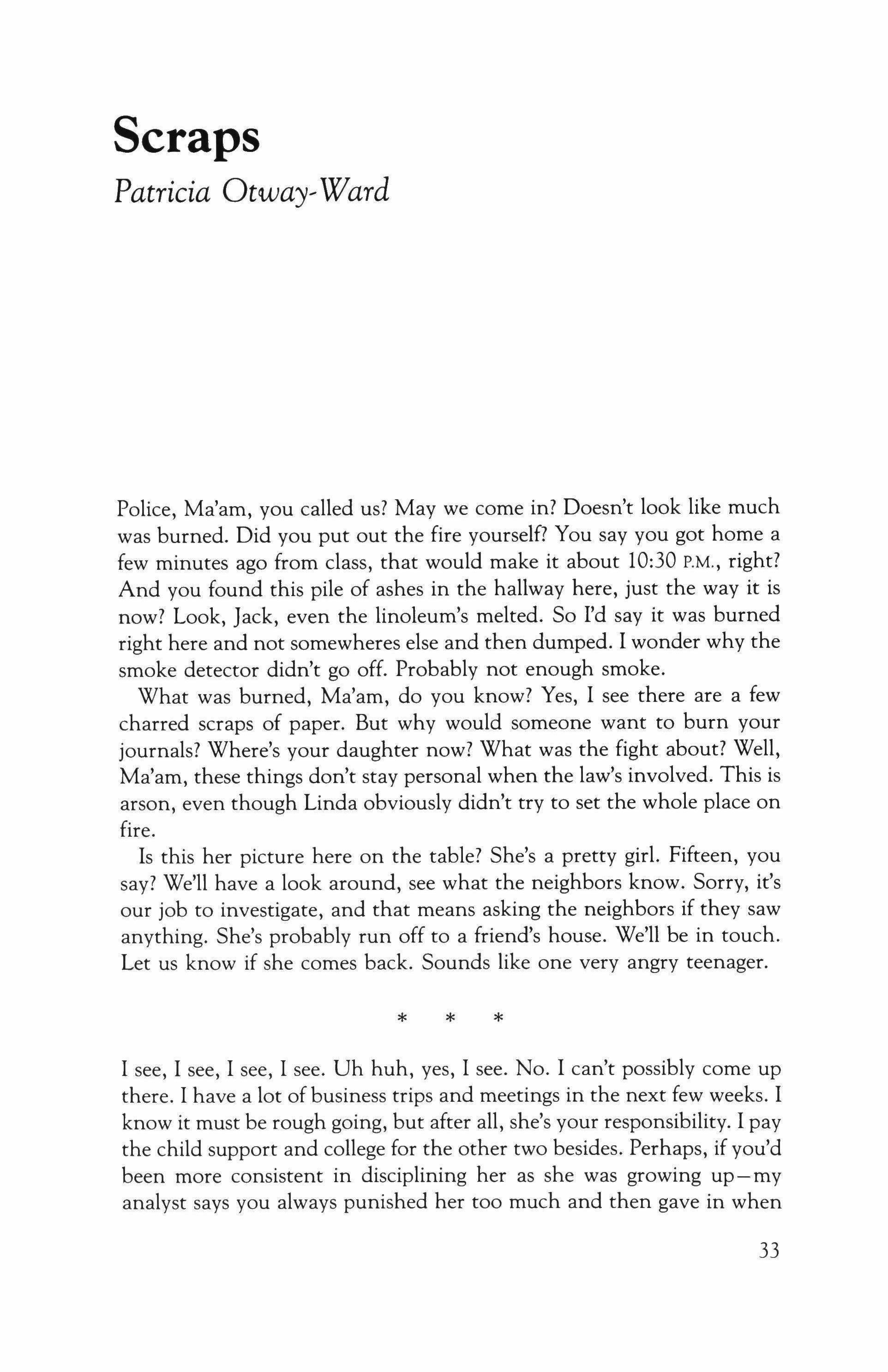
Police, Ma'am, you called us? May we come in? Doesn't look like much was burned. Did you put out the fire yourself? You say you got home a few minutes ago from class, that would make it about 10:30 P.M., right? And you found this pile of ashes in the hallway here, just the way it is now? Look, Jack, even the linoleum's melted. So I'd say it was burned right here and not somewheres else and then dumped. I wonder why the smoke detector didn't go off. Probably not enough smoke.
What was burned, Ma'am, do you know? Yes, I see there are a few charred scraps of paper. But why would someone want to burn your journals? Where's your daughter now? What was the fight about? Well, Ma'am, these things don't stay personal when the law's involved. This is arson, even though Linda obviously didn't try to set the whole place on fire.
Is this her picture here on the table? She's a pretty girl. Fifteen, you say? We'll have a look around, see what the neighbors know. Sorry, it's our job to investigate, and that means asking the neighbors if they saw anything. She's probably run off to a friend's house. We'll be in touch. Let us know if she comes back. Sounds like one very angry teenager.
I see, I see, I see, I see. Uh huh, yes, I see. No. I can't possibly come up there. I have a lot of business trips and meetings in the next few weeks. I know it must be rough going, but after all, she's your responsibility. I pay the child support and college for the other two besides. Perhaps, if you'd been more consistent in disciplining her as she was growing up-my analyst says you always punished her too much and then gave in when
* * *
33
she got upset. You're too weak. Four years worth of work, huh? All your notes for stories, novels, articles, research projects up in flames, huh? Poems, too, gee, that is too bad. Well good luck!
* * *
No sign of her yet, Mrs. Toland. As police chief, I'll tell you we see this kind of thing every day. Teenagers don't have enough responsibility. Truancy laws are still on the books, but there's no teeth in them anymore. Kids don't have to go to school. So they're running around getting into dope and the hard stuff.
How much is Linda into drugs? Well, I realize you didn't mention it, but I took it for granted. I mean, what else does she do all day at the beach with her friends except toke up and booze up?
Thanks for bringing her picture down. Such a pretty girl! Fifteen? Boys really go for these golden girls. Does she have a lot of boyfriends? Just the steady one, eh? I hope she has the sense to use birth control. Well, at least you don't have to worry about that. Did you turn her on to Planned Parenthood, or is that something she found herself? But I'll bet you were relieved.
Don't be so hard on yourself. Families break up, mothers have to go to work. What are you studying at the University? History was always my weak subject. Are you on Aid there? Food stamps, too, I suppose. Well, it just gives me a picture of Linda's home, you know.
So you had a fight with her because she wanted to go on a weekend camping trip with her boyfriend. And you said-what was it? I have it in my notes here-you said you wouldn't give her money for the Halloween dance, the yearbook or anything else if she went. But does that work really, Mrs. Toland? I mean, most kids these days, when they need money, they sell some herb. Doesn't Linda do some selling? Not that you know of, eh? No, I know nothing works. Believe me, I sympathize. I get a lot of mothers sitting in that very chair telling me they can't go on.
Now, besides truancy, alcohol, drugs, sex and arson, what else has she done?
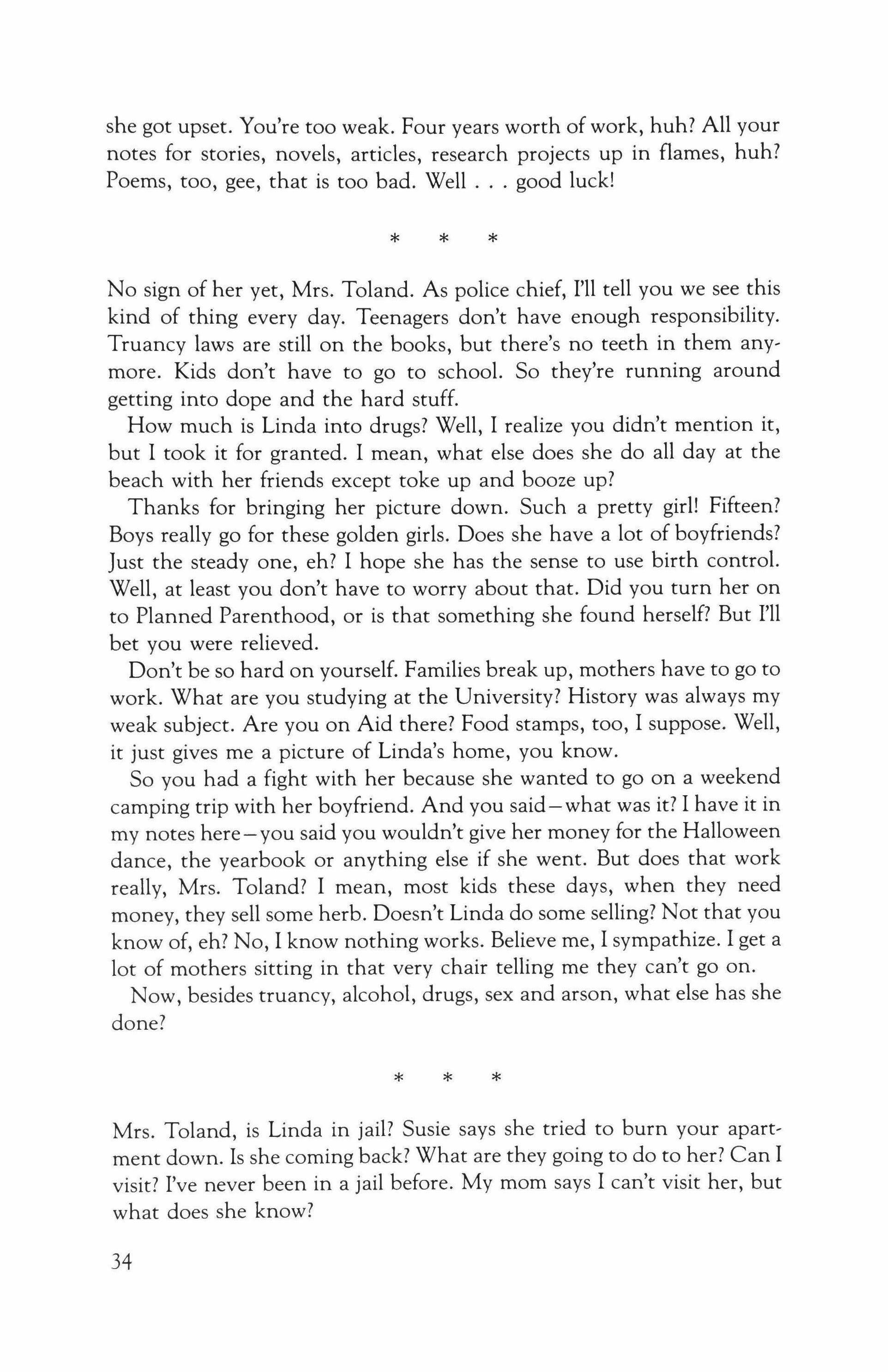
Mrs. Toland, is Linda in jail? Susie says she tried to burn your apartment down. Is she coming back? What are they going to do to her? Can I visit? I've never been in a jail before. My mom says I can't visit her, but what does she know?
* * *
34
Hello, Mrs. Toland? This is the Attendance Office at Grant High. I've been trying to reach you for weeks. Linda hasn't been in school since September. We'd like a conference. You can't? She won't? When will she be back? Mrs. Toland, I wonder if you realize what a serious matter this is. We lose money from the state every day she's absent. It's your responsibility to see she attends school. It's the law!
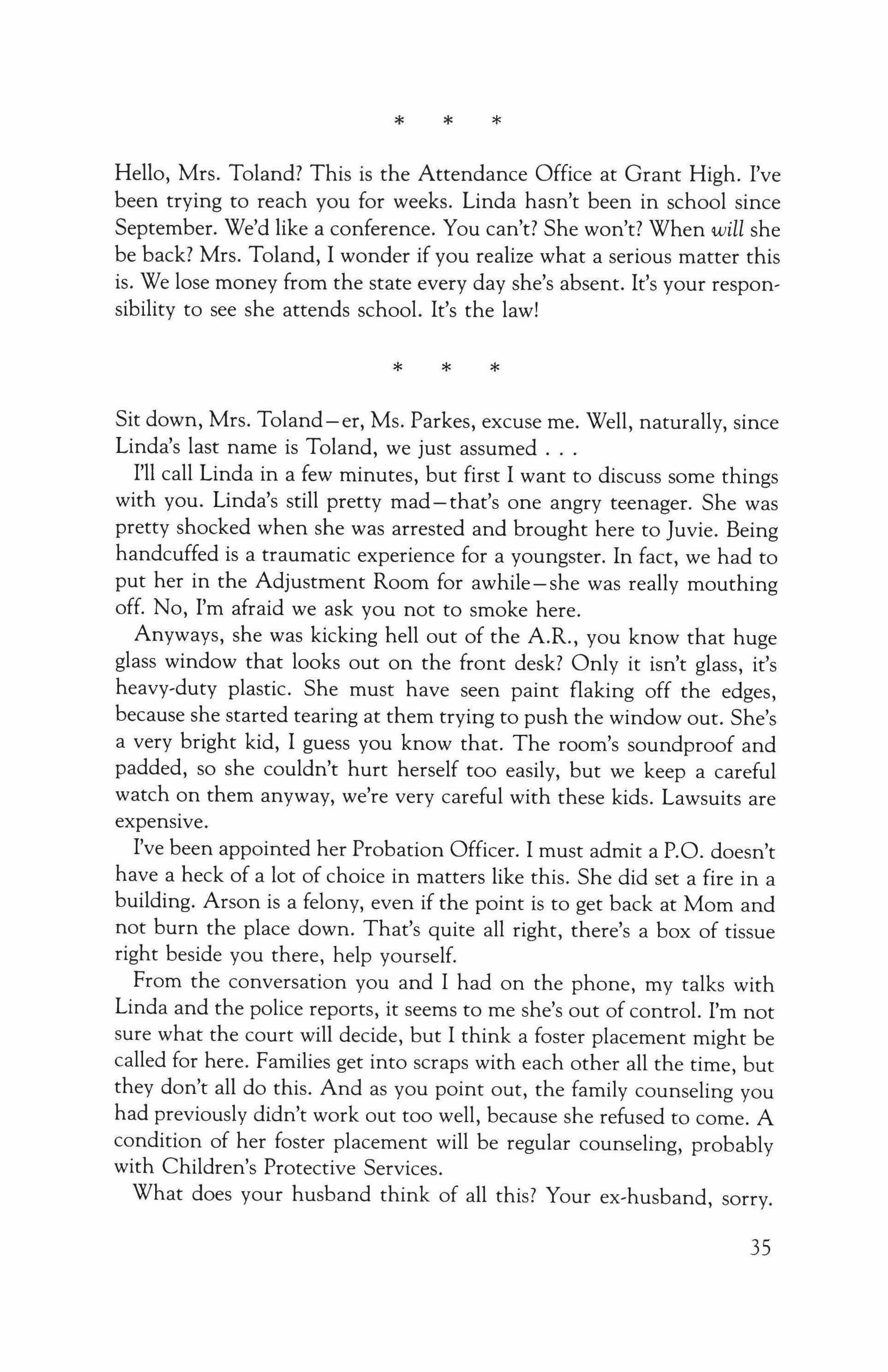
Sit down, Mrs. Toland-er, Ms. Parkes, excuse me. Well, naturally, since Linda's last name is Toland, we just assumed
I'll call Linda in a few minutes, but first I want to discuss some things with you. Linda's still pretty mad-that's one angry teenager. She was pretty shocked when she was arrested and brought here to [uvie. Being handcuffed is a traumatic experience for a youngster. In fact, we had to put her in the Adjustment Room for awhile-she was really mouthing off. No, I'm afraid we ask you not to smoke here.
Anyways, she was kicking hell out of the A.R., you know that huge glass window that looks out on the front desk? Only it isn't glass, it's heavy-duty plastic. She must have seen paint flaking off the edges, because she started tearing at them trying to push the window out. She's a very bright kid, I guess you know that. The room's soundproof and padded, so she couldn't hurt herself too easily, but we keep a careful watch on them anyway, we're very careful with these kids. Lawsuits are expensive.
I've been appointed her Probation Officer. I must admit a P.O. doesn't have a heck of a lot of choice in matters like this. She did set a fire in a building. Arson is a felony, even if the point is to get back at Mom and not burn the place down. That's quite all right, there's a box of tissue right beside you there, help yourself.
From the conversation you and I had on the phone, my talks with Linda and the police reports, it seems to me she's out of control. I'm not sure what the court will decide, but I think a foster placement might be called for here. Families get into scraps with each other all the time, but they don't all do this. And as you point out, the family counseling you had previously didn't work out too well, because she refused to come. A condition of her foster placement will be regular counseling, probably with Children's Protective Services.
What does your husband think of all this? Your ex-husband, sorry.
* * *
* * *
35
Her father. So there's no chance of placing her with him? Don't forget, this might work out well for you, too. As you say, it's a terrific strain being a full-time graduate student, working as a teaching assistant, and raising a troubled teen. She's your last, isn't she?
Ms. Parkes, it's only temporary.
Oh, Mrs. Toland, I've been meaning to visit. The police were by and told me about what Linda did, and I just want to say, if there's anything I can do What happened exactly? The police said she burned some of your things. Why would she do a thing like that? The kids say she's been arrested and taken to Juvenile Hall. What are they charging her with? When's the trial? How's she taking it? What will happen to her do you suppose? I only ask because I'm concerned. This is no time for false pride. Now's the time to accept help from your friends, Mrs. Toland. What? Parkes?
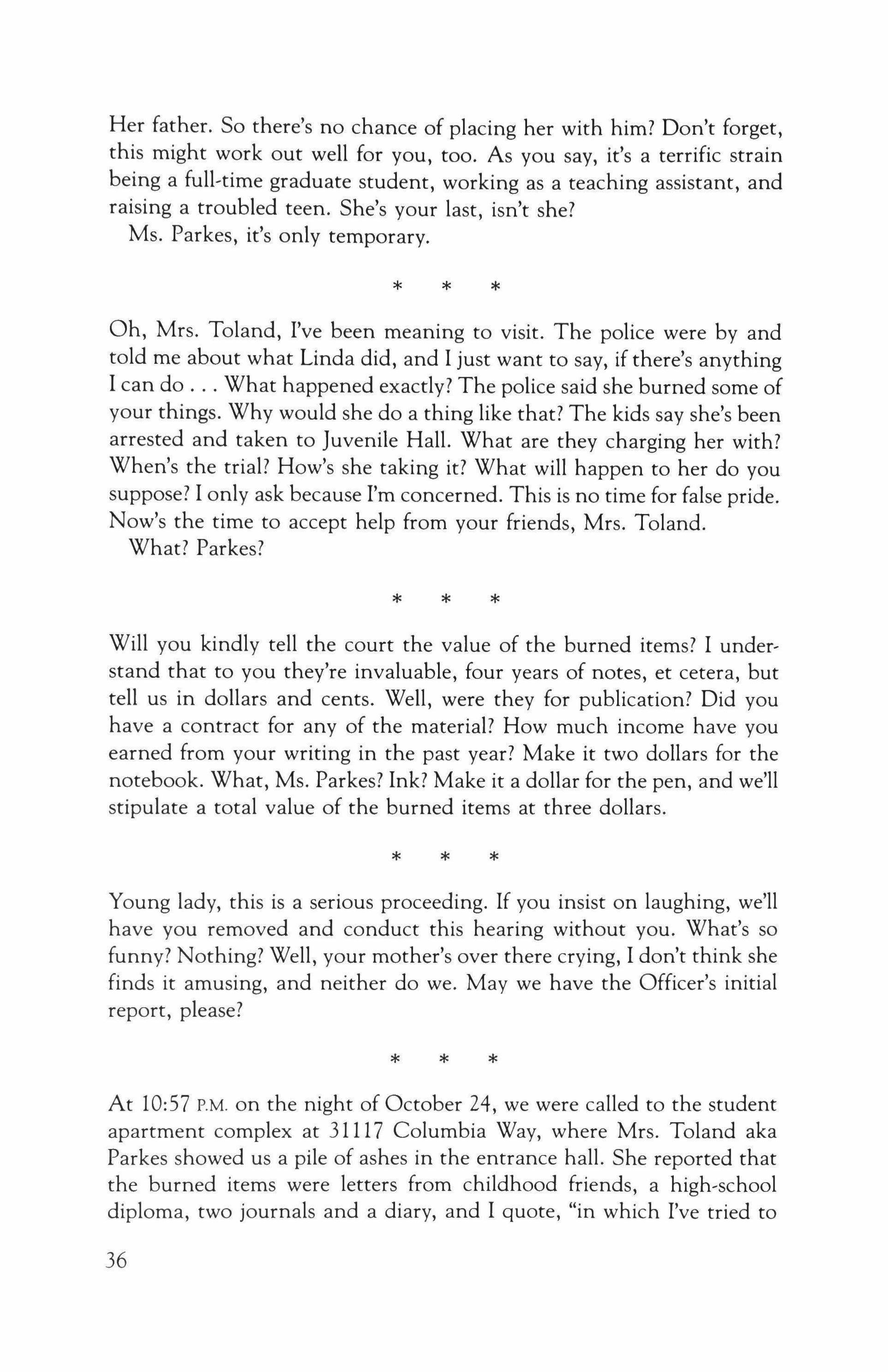
Will you kindly tell the court the value of the burned items? I understand that to you they're invaluable, four years of notes, et cetera, but tell us in dollars and cents. Well, were they for publication? Did you have a contract for any of the material? How much income have you earned from your writing in the past year? Make it two dollars for the notebook. What, Ms. Parkes? Ink? Make it a dollar for the pen, and we'll stipulate a total value of the burned items at three dollars.
Young lady, this is a serious proceeding. If you insist on laughing, we'll have you removed and conduct this hearing without you. What's so funny? Nothing? Well, your mother's over there crying, I don't think she finds it amusing, and neither do we. May we have the Officer's initial report, please?
At 10:57 P.M. on the night of October 24, we were called to the student apartment complex at 31117 Columbia Way, where Mrs. Toland aka Parkes showed us a pile of ashes in the entrance hall. She reported that the burned items were letters from childhood friends, a high-school diploma, two journals and a diary, and I quote, "in which I've tried to
* * *
* * *
* * *
* * *
36
make some sense out of the last four years of my life," end quote. A group of teenagers in the complex reported that Linda's mother set the fire in order to get Linda into trouble.
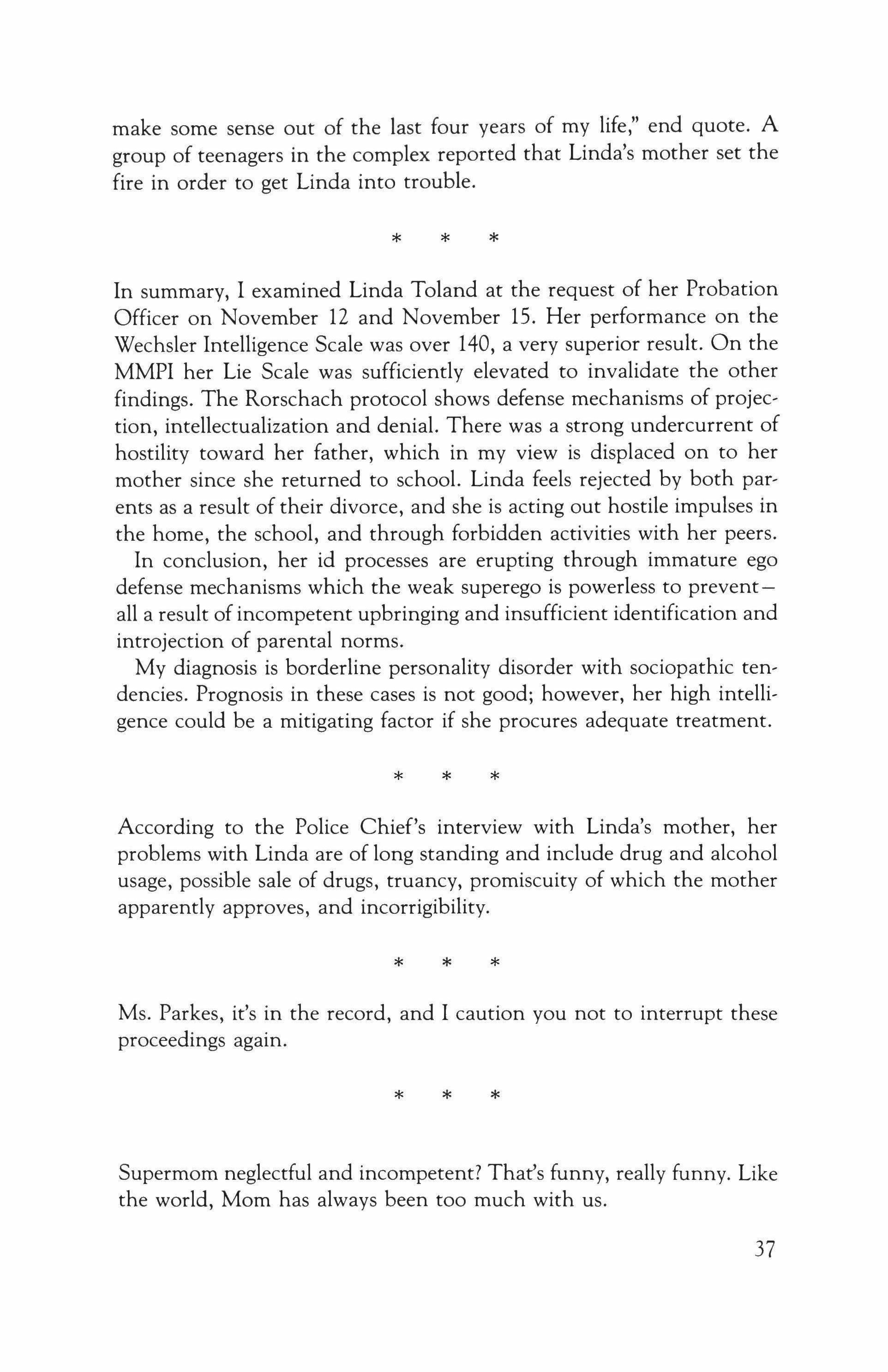
In summary, I examined Linda Toland at the request of her Probation Officer on November 12 and November 15. Her performance on the Wechsler Intelligence Scale was over 140, a very superior result. On the MMPI her Lie Scale was sufficiently elevated to invalidate the other findings. The Rorschach protocol shows defense mechanisms of projection, intellectualization and denial. There was a strong undercurrent of hostility toward her father, which in my view is displaced on to her mother since she returned to school. Linda feels rejected by both parents as a result of their divorce, and she is acting out hostile impulses in the home, the school, and through forbidden activities with her peers.
In conclusion, her id processes are erupting through immature ego defense mechanisms which the weak superego is powerless to preventall a result of incompetent upbringing and insufficient identification and introjection of parental norms.
My diagnosis is borderline personality disorder with sociopathic tendencies. Prognosis in these cases is not good; however, her high intelligence could be a mitigating factor if she procures adequate treatment.
According to the Police Chief's interview with Linda's mother, her problems with Linda are of long standing and include drug and alcohol usage, possible sale of drugs, truancy, promiscuity of which the mother apparently approves, and incorrigibility.
Ms. Parkes, it's in the record, and I caution you not to interrupt these proceedings again.
Supermom neglectful and incompetent? That's funny, really funny. Like the world, Mom has always been too much with us.
* * *
* * *
* * *
* * *
37
It was just so funny. Everyone was so serious, and here I was on the stand, a celebrity practically. I can't remember when so many people fussed over me, and I have my own lawyer and everything. It's like I'm an actress, and the part I have to play is juvenile delinquent, oh wow! I know I'm supposed to act the part-tough, freaked-out, dumb. But that's not me.
Am I supposed to go home with you now? Or do we just wait here in the hall until they bring my things?
Oh, Mom's just crying because she's sentimental. Mom's a very senti, mental person. I knew just what to burn.
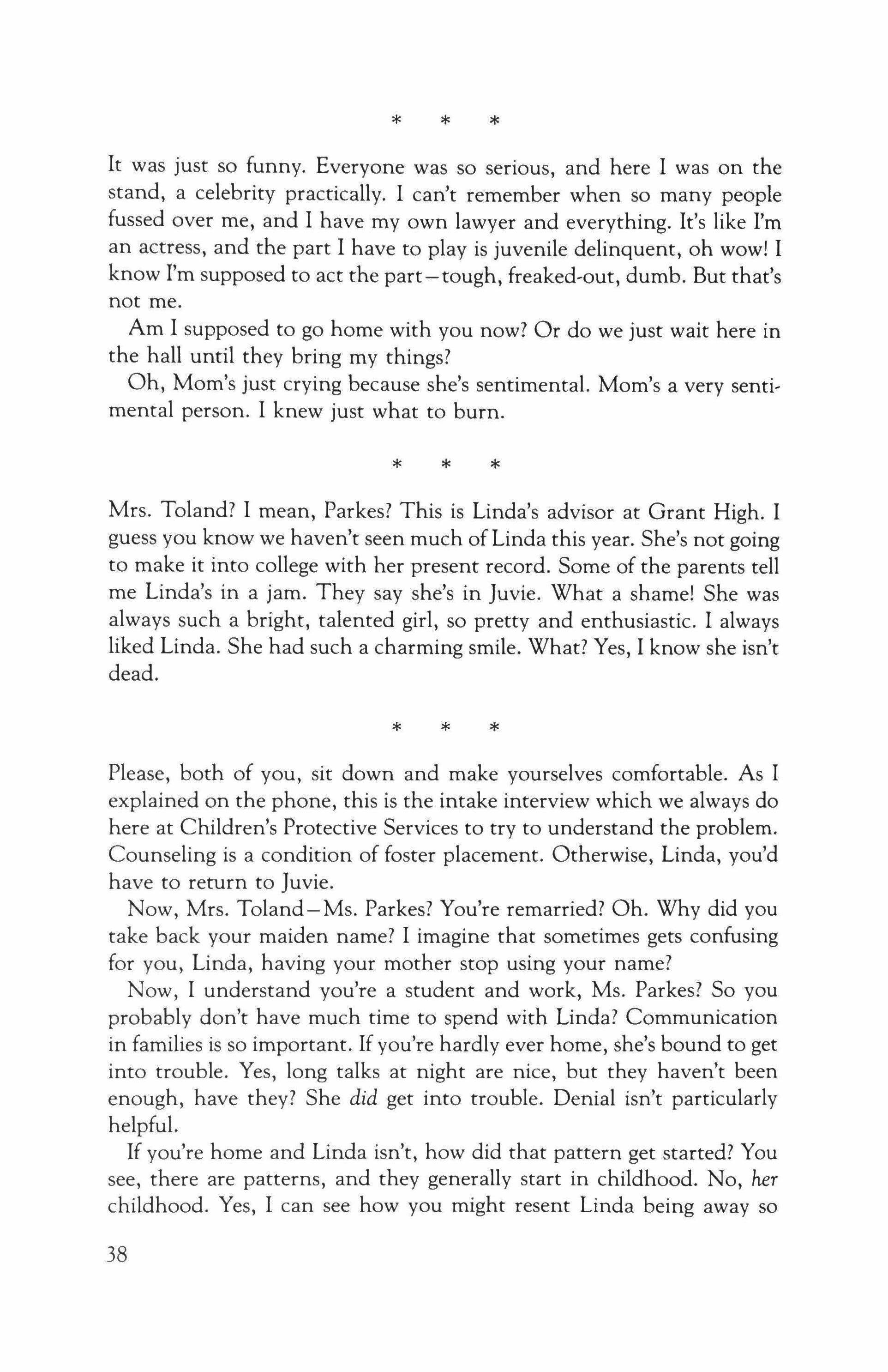
Mrs. Toland? I mean, Parkes? This is Linda's advisor at Grant High. I guess you know we haven't seen much of Linda this year. She's not going to make it into college with her present record. Some of the parents tell me Linda's in a jam. They say she's in juvie. What a shame! She was always such a bright, talented girl, so pretty and enthusiastic. I always liked Linda. She had such a charming smile. What? Yes, I know she isn't dead.
Please, both of you, sit down and make yourselves comfortable. As I explained on the phone, this is the intake interview which we always do here at Children's Protective Services to try to understand the problem. Counseling is a condition of foster placement. Otherwise, Linda, you'd have to return to juvie.
Now, Mrs. Toland-Ms. Parkes? You're remarried? Oh. Why did you take back your maiden name? I imagine that sometimes gets confusing for you, Linda, having your mother stop using your name?
Now, I understand you're a student and work, Ms. Parkes? So you probably don't have much time to spend with Linda? Communication in families is so important. If you're hardly ever home, she's bound to get into trouble. Yes, long talks at night are nice, but they haven't been enough, have they? She did get into trouble. Denial isn't particularly helpful.
If you're home and Linda isn't, how did that pattern get started? You see, there are patterns, and they generally start in childhood. No, her childhood. Yes, I can see how you might resent Linda being away so
* * *
* * *
* * *
38
much. She's a pretty girl. As we get older we start resenting our daughters. They're popular and have boyfriends. They're out on dates, while we're stuck at home, feeling over the hill. I don't mean you're over the hill, Ms. Parkes, though I imagine you feel that way sometimes? You don't? You needn't be defensive here. It's not particularly helpful. If you're jealous of your daughter, you can come right out and say it. That's what we're here for. I mean, your husband divorced you, you're stuck at home nights while your pretty young daughter is out. You're bound to feel rejected and resentful of your daughter's happiness. No? Well, let's move on, then.
You say you work, go to school, and keep house. Do you have any hobbies, any fun out of life? What do you do to pleasure yourself? You correct papers. I see. Well, that must be some fun. Why did your husband divorce you? O.K., pardon me, why did you and your husband get divorced?
Ms. Parkes, I'm the one who decides what gets talked about, and right now I think Linda's truancy, drug activities, lying, stealing, promiscuity and arson are beside the point. We treat the whole family. You see, the identified patient-that's Linda-got that way through her life situation. But her school, community, father, older sisters, and friends aren't here. You're the one who's responsible for her, Mom.
You don't like being called "Mom"? When did you first start feeling that way? How do you mean, I'm stereotyping you? You're feeling a little persecuted, perhaps? A little out of touch with reality?
Now, Linda, you don't have to defend your mother. She can't hurt you anymore. Well, it was probably so long ago you don't remember. Really, Ms. Parkes, Linda, I must insist-come back here! Walking out isn't helpful at all!
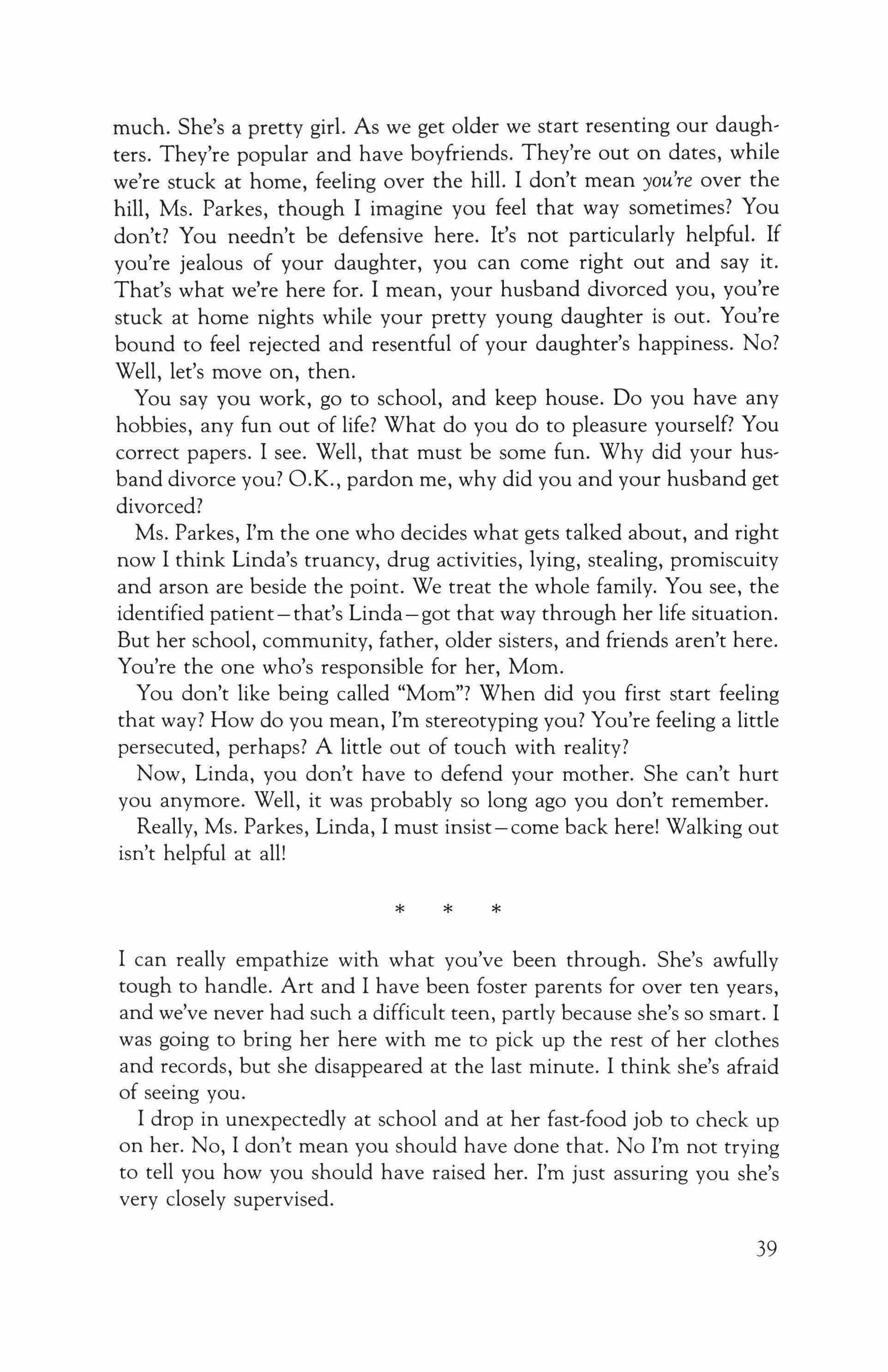
I can really empathize with what you've been through. She's awfully tough to handle. Art and I have been foster parents for over ten years, and we've never had such a difficult teen, partly because she's so smart. I was going to bring her here with me to pick up the rest of her clothes and records, but she disappeared at the last minute. I think she's afraid of seeing you.
I drop in unexpectedly at school and at her fast-food job to check up on her. No, I don't mean you should have done that. No I'm not trying to tell you how you should have raised her. I'm just assuring you she's very closely supervised.
* * *
39
Oh thank you. I may look soft and speak softly, but there are rules, and she has to follow them if she doesn't want to go back to juvie, and she doesn't. Art's told her if she so much as gets pinkeye, he'll send her back. You see, we have that advantage. Of course, she uses eye dropsthey all do.
But, you know, there's a lot that's good about Linda. She's smart as a whip, gets along well with people, has a lot ofcharm. So I think, if you're going to take the blame for what went wrong, you should take the credit for what's right with her, too. That's only fair. No, I'm not being kind, I'm just being fair.
Art and I find our religion has helped us a lot over the rough spots. Do you believe in God?
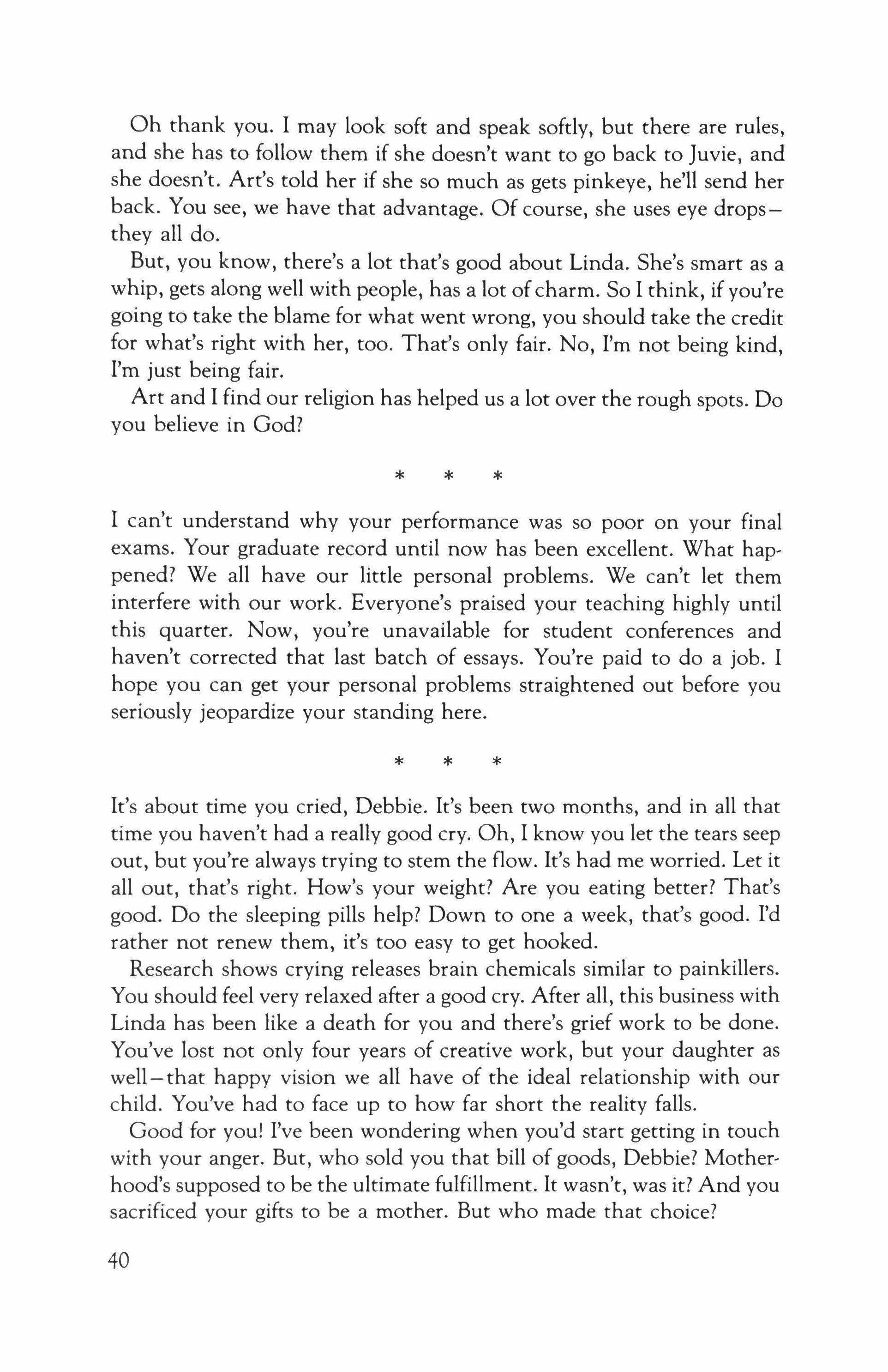
I can't understand why your performance was so poor on your final exams. Your graduate record until now has been excellent. What happened? We all have our little personal problems. We can't let them interfere with our work. Everyone's praised your teaching highly until this quarter. Now, you're unavailable for student conferences and haven't corrected that last batch of essays. You're paid to do a job. I hope you can get your personal problems straightened out before you seriously jeopardize your standing here.
It's about time you cried, Debbie. It's been two months, and in all that time you haven't had a really good cry. Oh, I know you let the tears seep out, but you're always trying to stem the flow. It's had me worried. Let it all out, that's right. How's your weight? Are you eating better? That's good. Do the sleeping pills help? Down to one a week, that's good. I'd rather not renew them, it's too easy to get hooked.
Research shows crying releases brain chemicals similar to painkillers. You should feel very relaxed after a good cry. After all, this business with Linda has been like a death for you and there's grief work to be done. You've lost not only four years of creative work, but your daughter as well-that happy vision we all have of the ideal relationship with our child. You've had to face up to how far short the reality falls.
Good for you! I've been wondering when you'd start getting in touch with your anger. But, who sold you that bill of goods, Debbie? Motherhood's supposed to be the ultimate fulfillment. It wasn't, was it? And you sacrificed your gifts to be a mother. But who made that choice?
* * *
* * *
40
How is it a setup?
I see. You mean, you're told you're responsible for your child. But what with the schools, courts, the drugs out there, you feel powerless. You know there are good reasons why Linda can have birth control and abortions without your permission. Still, you're blamed. Does that make you feel clear? Of course, it doesn't.
Well, I know the financial inequity doesn't help. Yes, I hear you saying you've raised your daughter on practically nothing. Her father made his career while you were staying home with the children. Now, he's wealthy, has job security, health insurance, the whole bit. Just explain that he can afford all these expensive gifts, and you can't.
I hear your anger, yes, Debbie, I hear it. But whoever told you life was fair?
My opinion? I think you did the best you could as a mother. Don't you? Well, even ifthat best wasn't very good, it was still your best, wasn't it?
That's real progress, Debbie. Next week, I'd like to see you wearing lipstick, if you feel up to it.
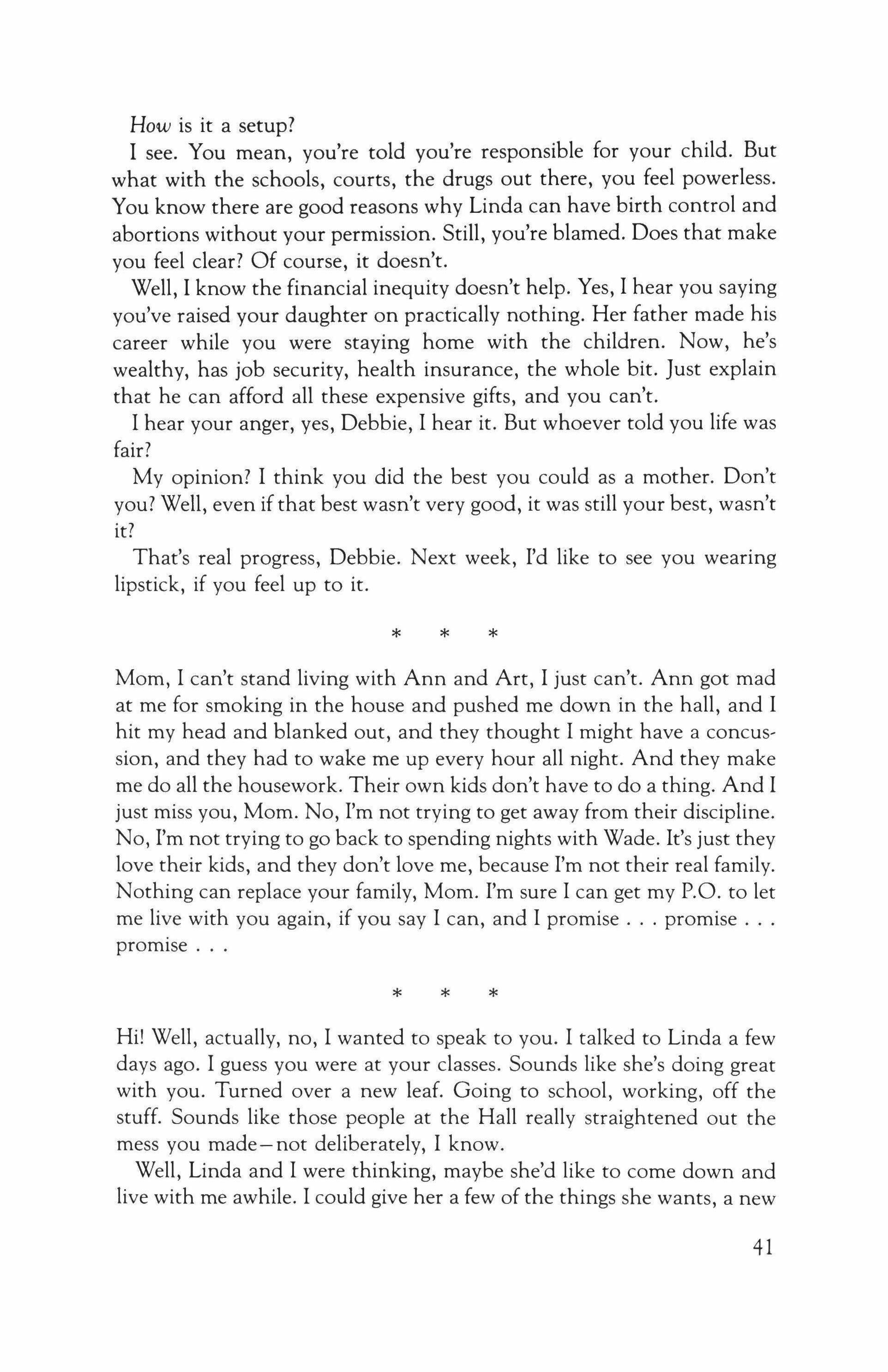
Mom, I can't stand living with Ann and Art, I just can't. Ann got mad at me for smoking in the house and pushed me down in the hall, and I hit my head and blanked out, and they thought I might have a concussion, and they had to wake me up every hour all night. And they make me do all the housework. Their own kids don't have to do a thing. And I just miss you, Mom. No, I'm not trying to get away from their discipline. No, I'm not trying to go back to spending nights with Wade. It's just they love their kids, and they don't love me, because I'm not their real family. Nothing can replace your family, Mom. I'm sure I can get my P.O. to let me live with you again, if you say I can, and I promise promise promise
Hi! Well, actually, no, I wanted to speak to you. I talked to Linda a few days ago. I guess you were at your classes. Sounds like she's doing great with you. Turned over a new leaf. Going to school, working, off the stuff. Sounds like those people at the Hall really straightened out the mess you made-not deliberately, I know.
Well, Linda and I were thinking, maybe she'd like to come down and live with me awhile. I could give her a few of the things she wants, a new
* * *
* * *
41
car, clothes, she'd be in the right neighborhood with the right people again. I know you want what's best for her. She could keep house for me. Now that the other two are in college, I never see them except at Christmas. And you'd have a chance to pursue that promising career of yours in peace.
Yes, I know it's much easier, now, or I wouldn't be suggesting this, ha, hal
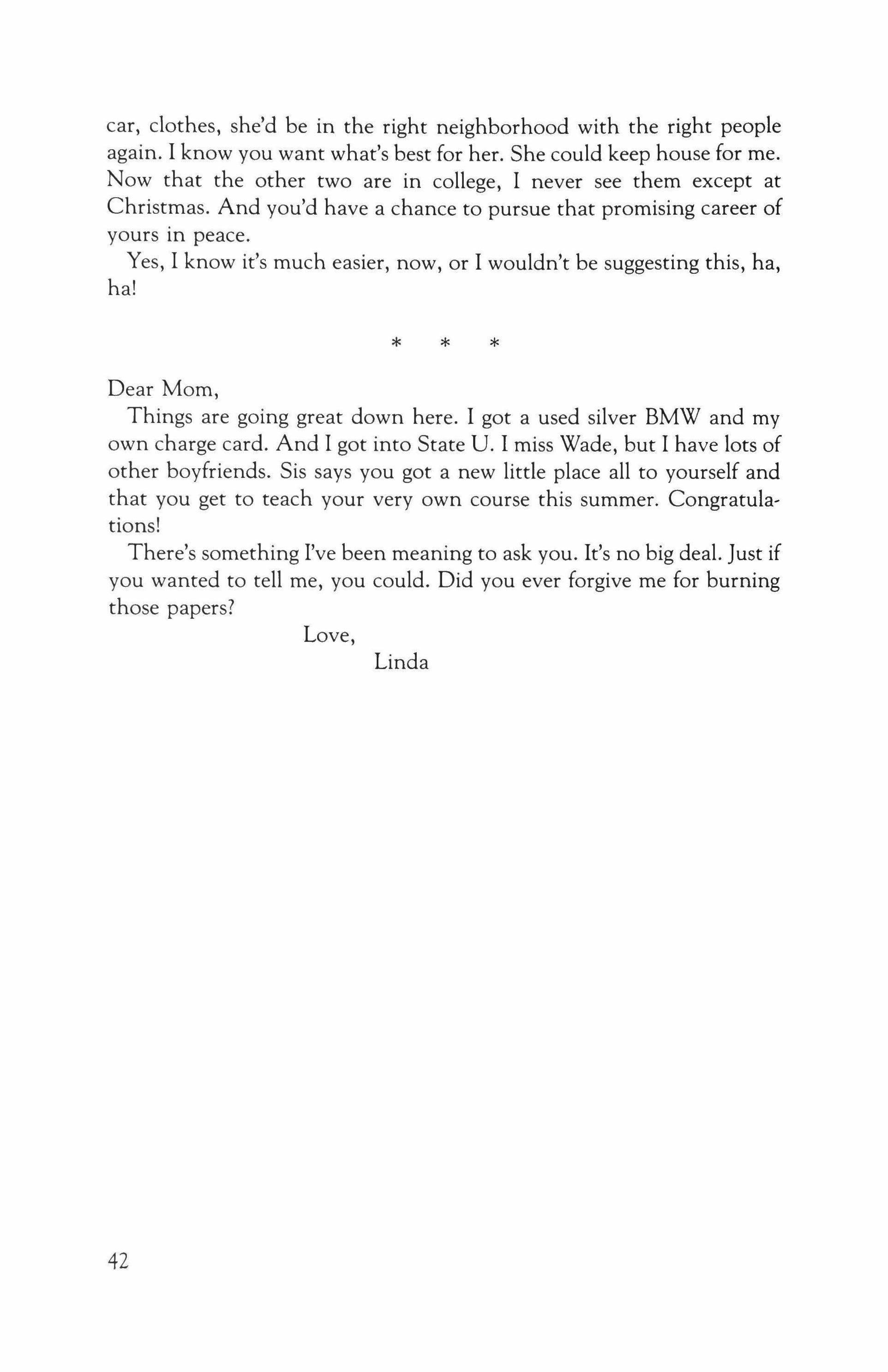
Dear Mom,
Things are going great down here. I got a used silver BMW and my own charge card. And I got into State U. I miss Wade, but I have lots of other boyfriends. Sis says you got a new little place all to yourself and that you get to teach your very own course this summer. Congratulations!
There's something I've been meaning to ask you. It's no big deal. Just if you wanted to tell me, you could. Did you ever forgive me for burning those papers?
Love, Linda
* * *
42



-
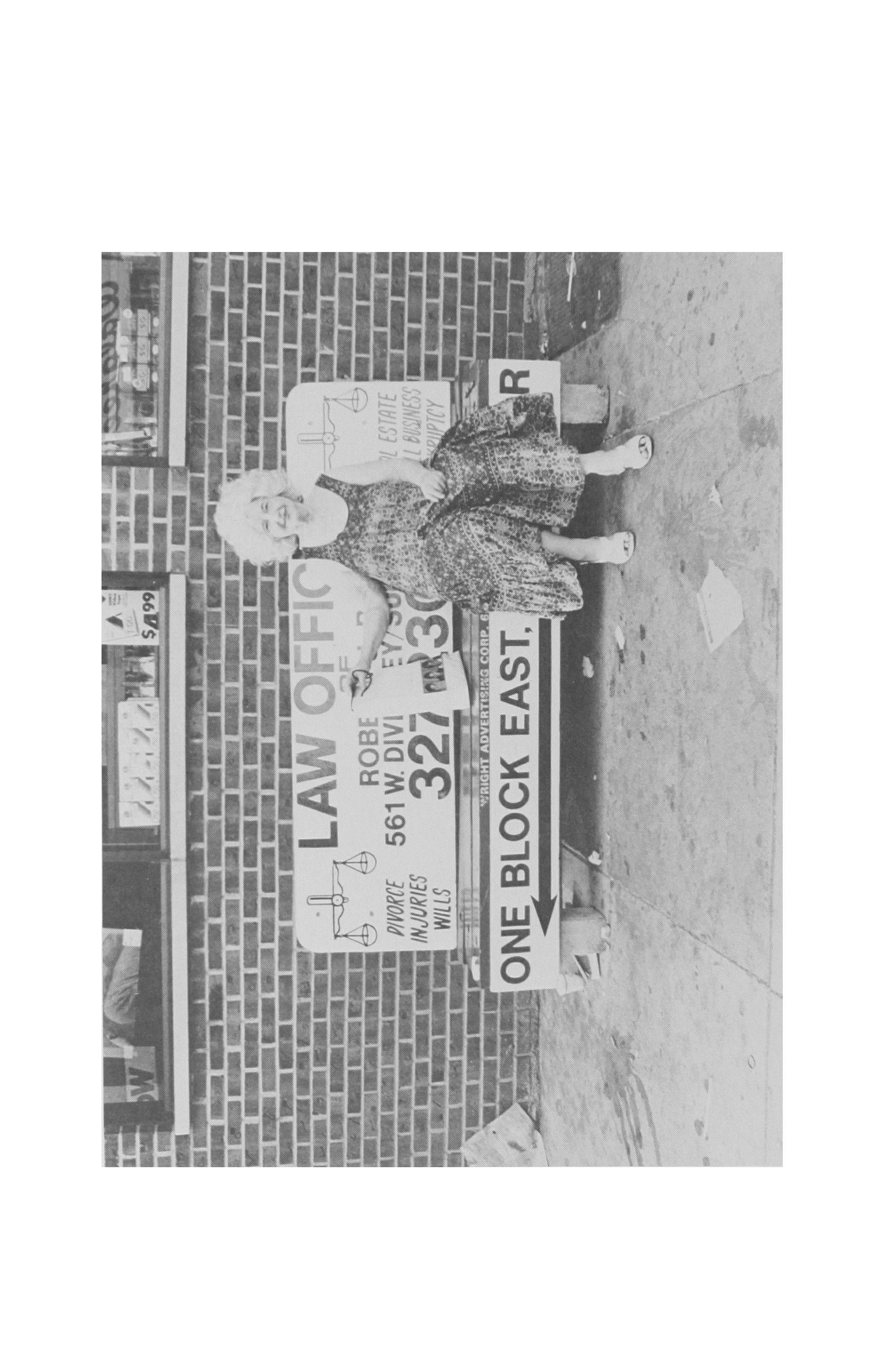
"'� I' --{� � \t t � t " ' '" f:i:l>I� W 00 I .� a:� « U) Lt) , , \
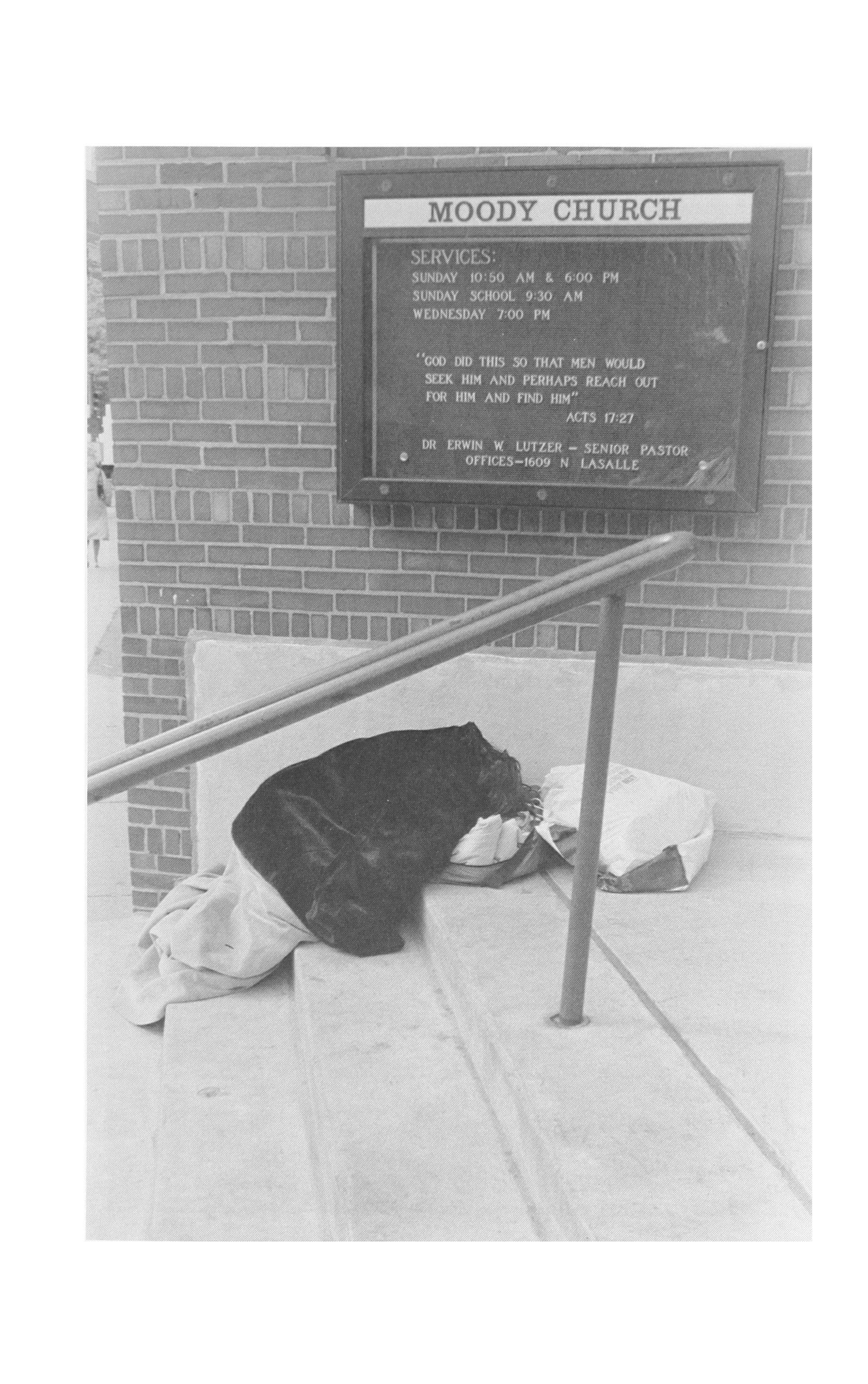
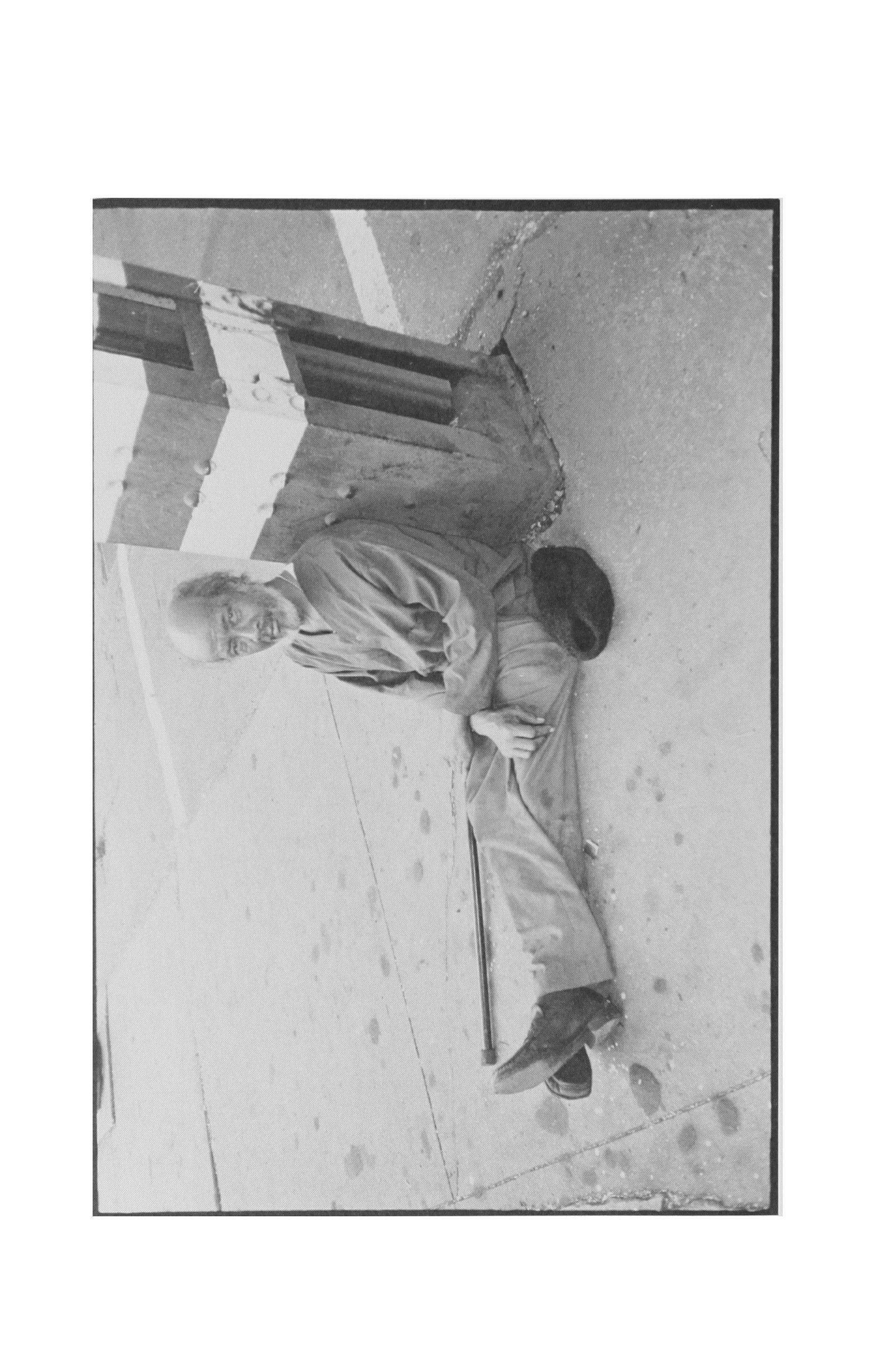
I \ \ \ \
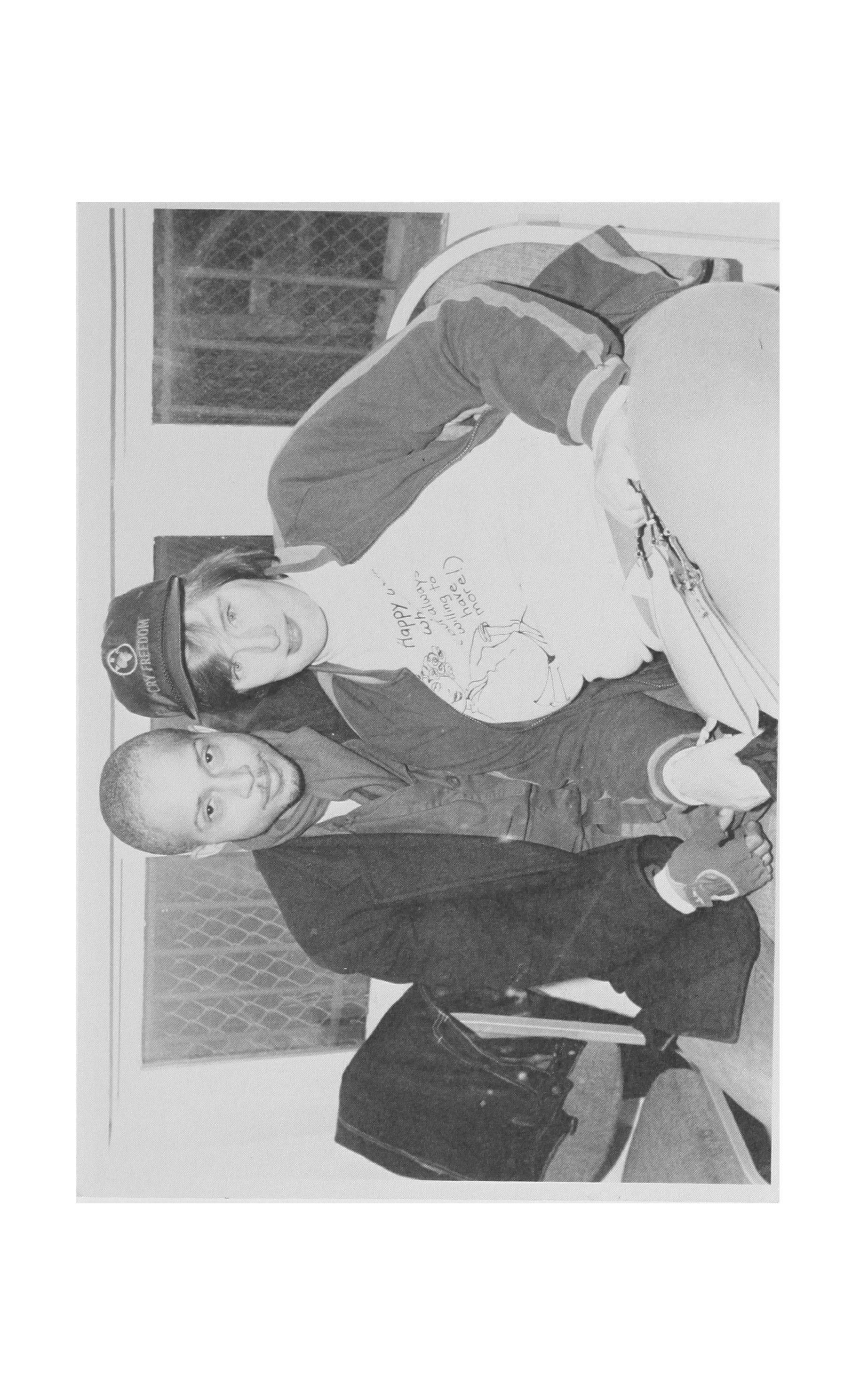
I\

•
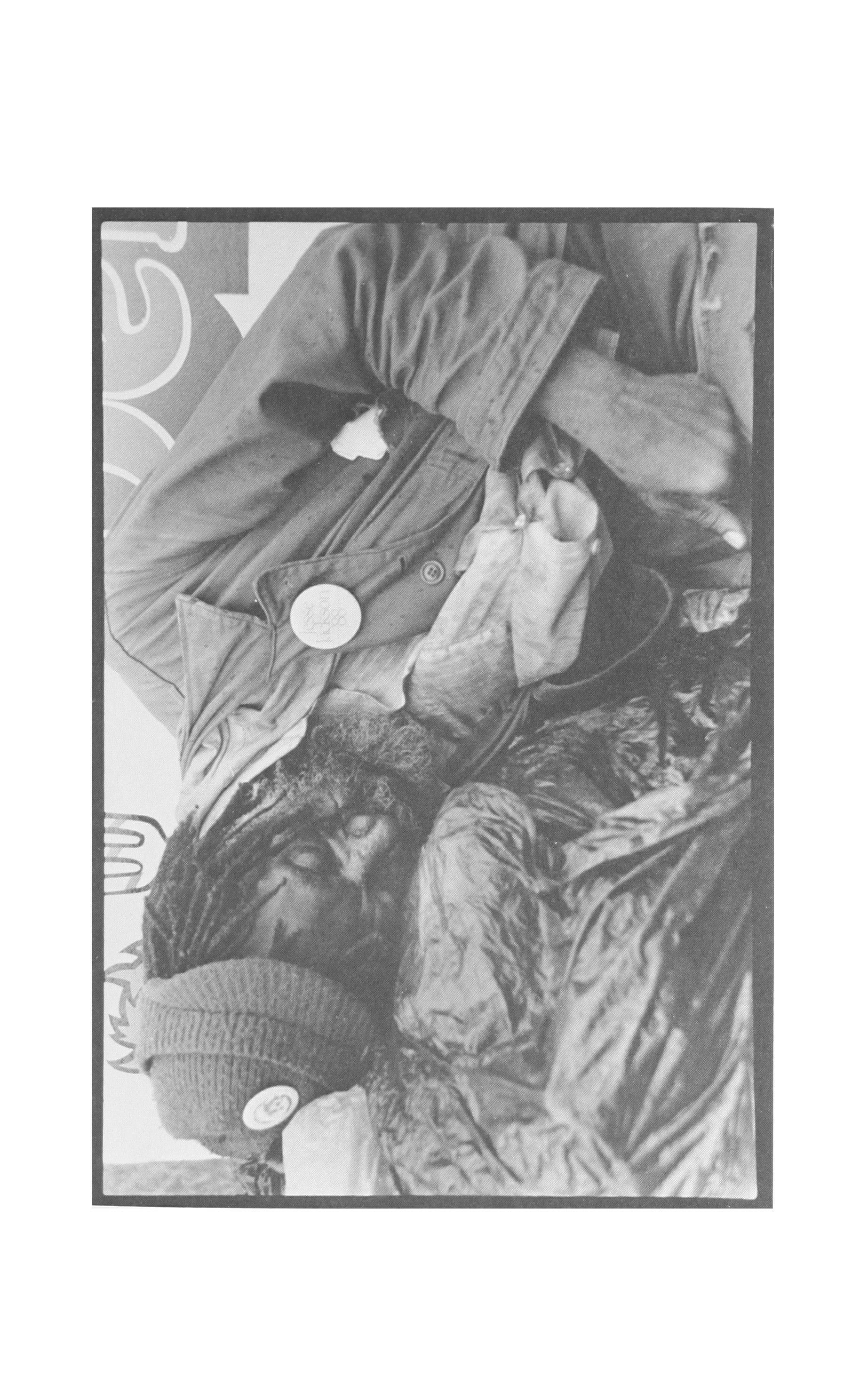
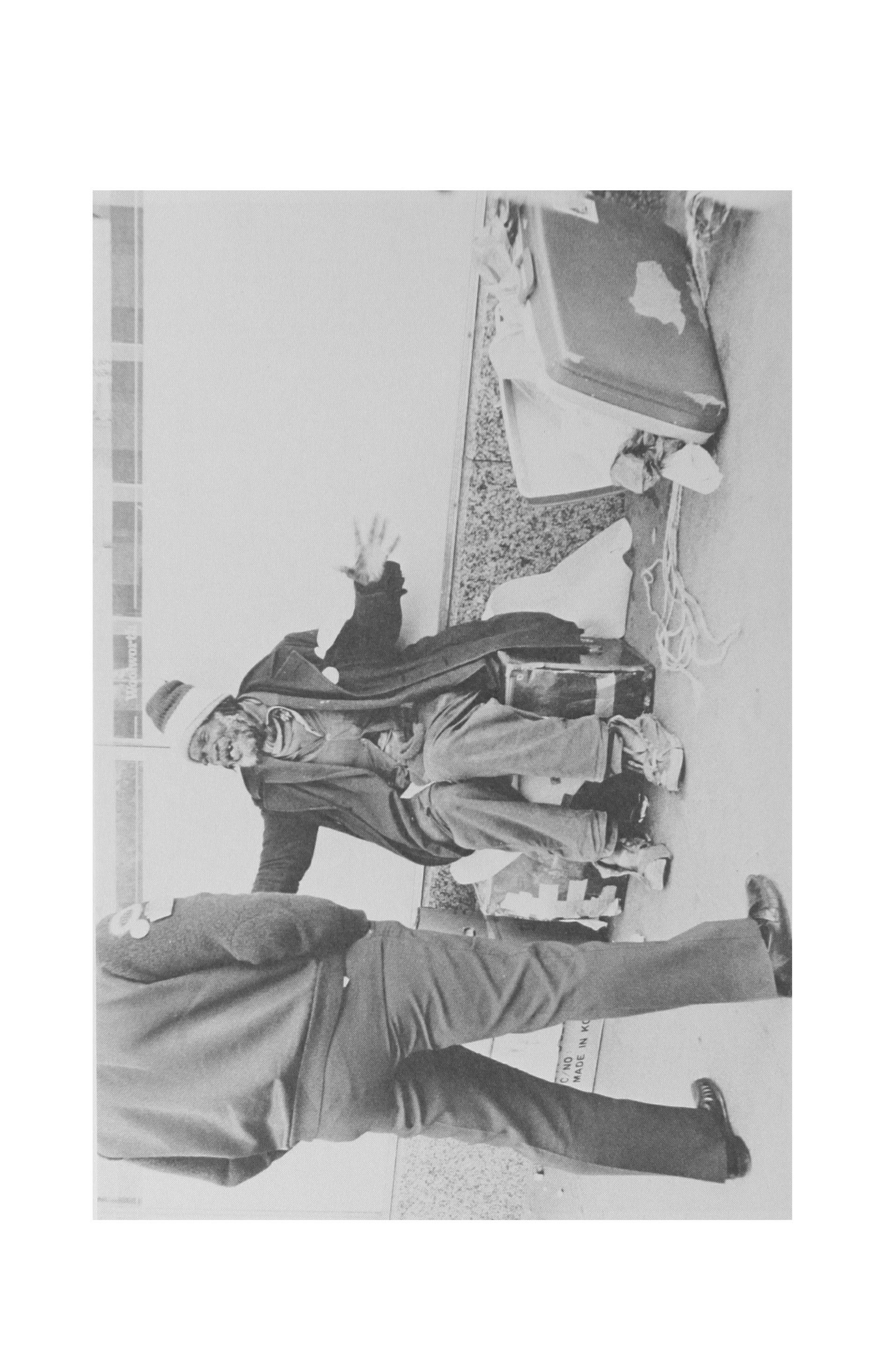
I I
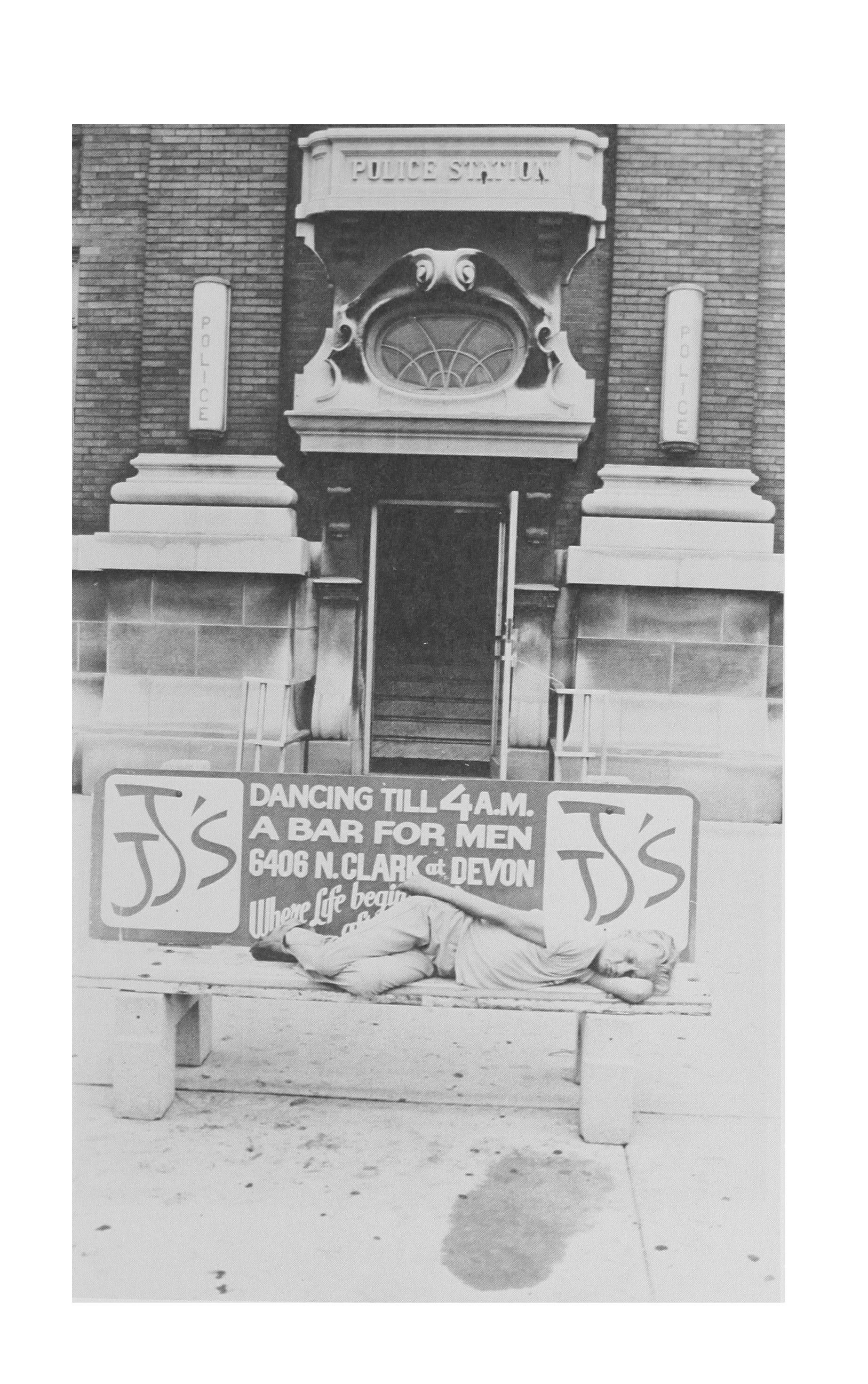
:. ,-.,,'-., .;-.i#JI",>,
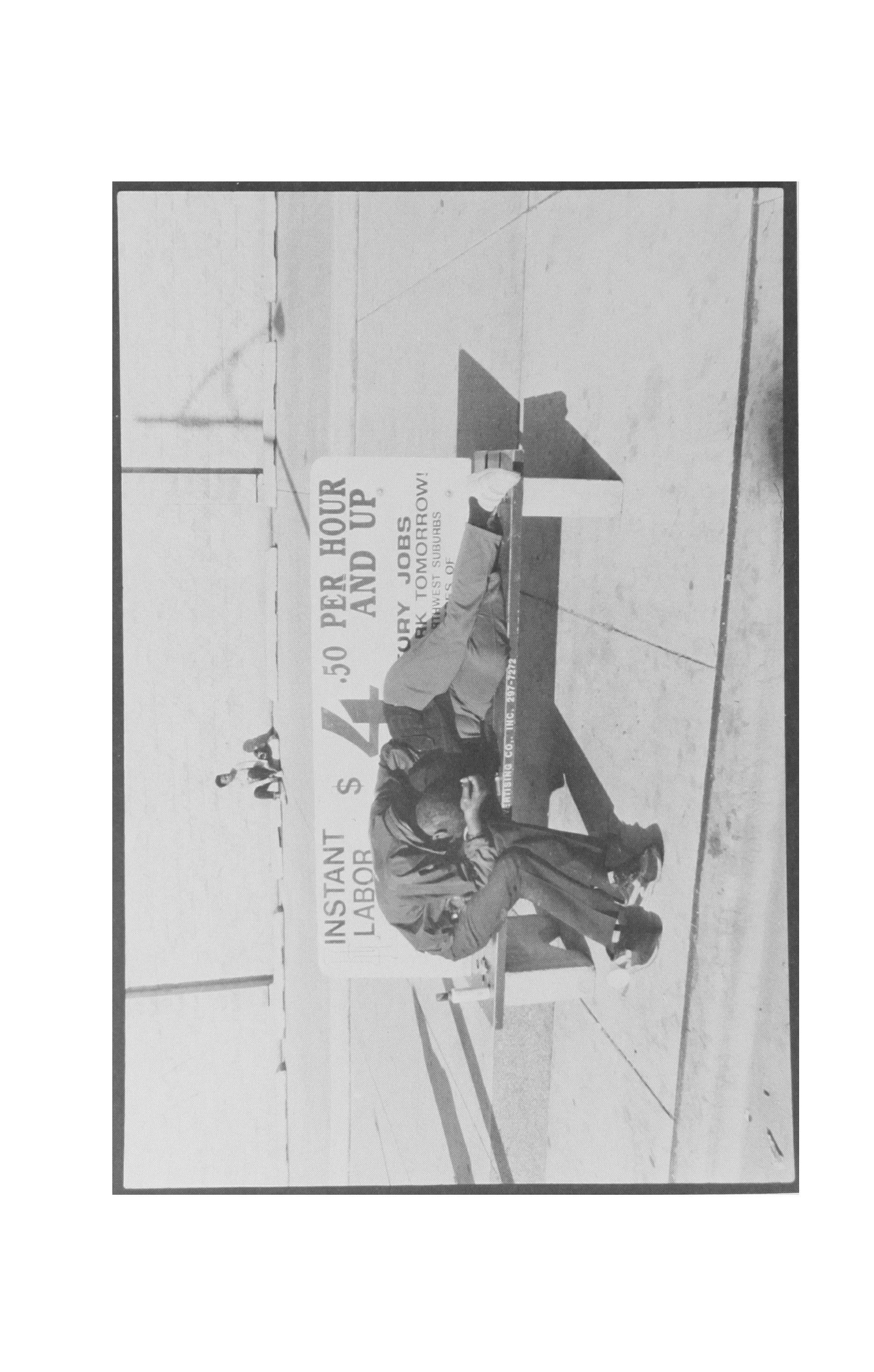
I �=.. � 0", ;:J� Cl)O:cn 0: a: 0 alo� =Q o :;ii if, � , "0," j, �iI!'! f-� �< > '-....._ ex Q.,. o 11") I I I
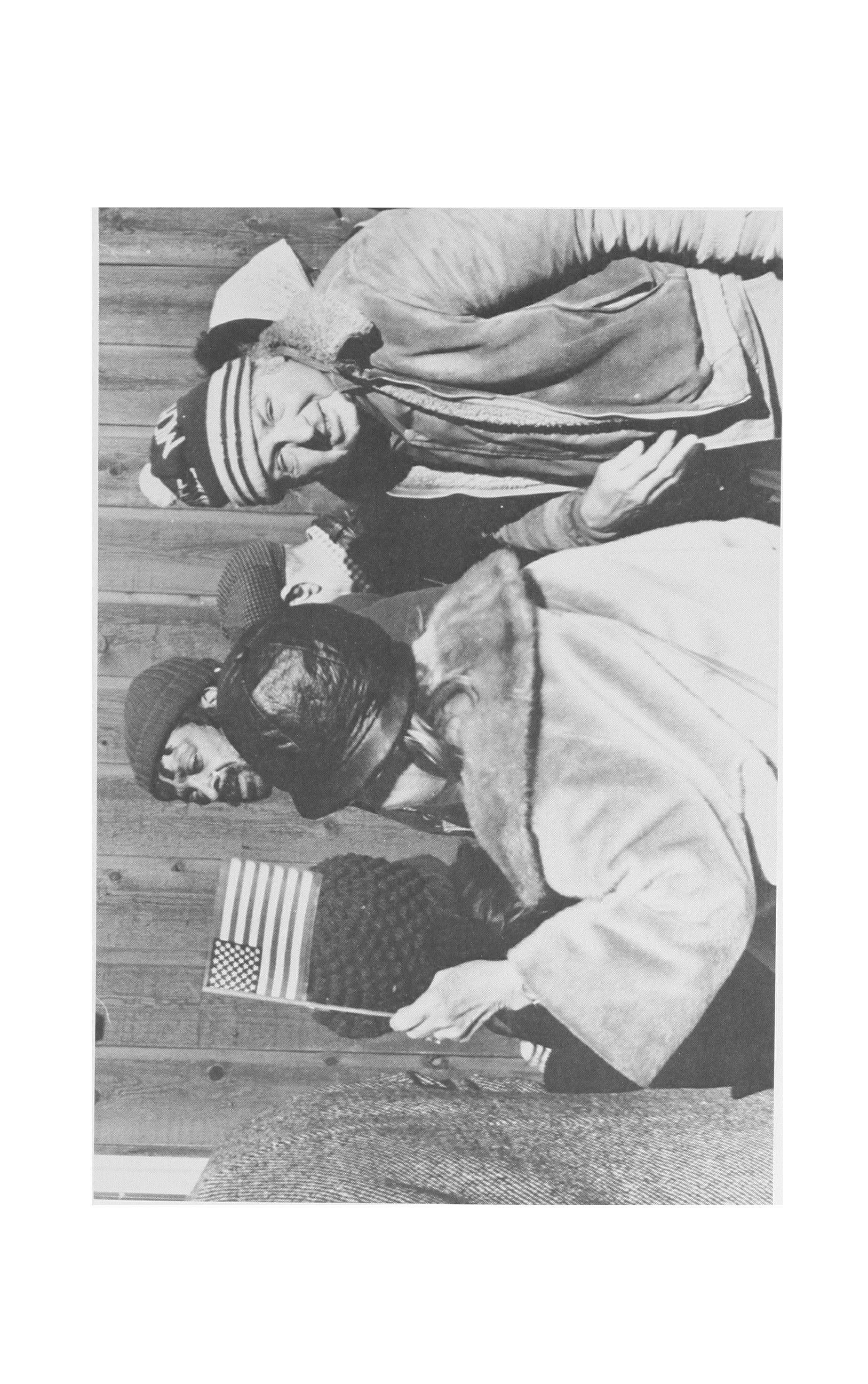
\
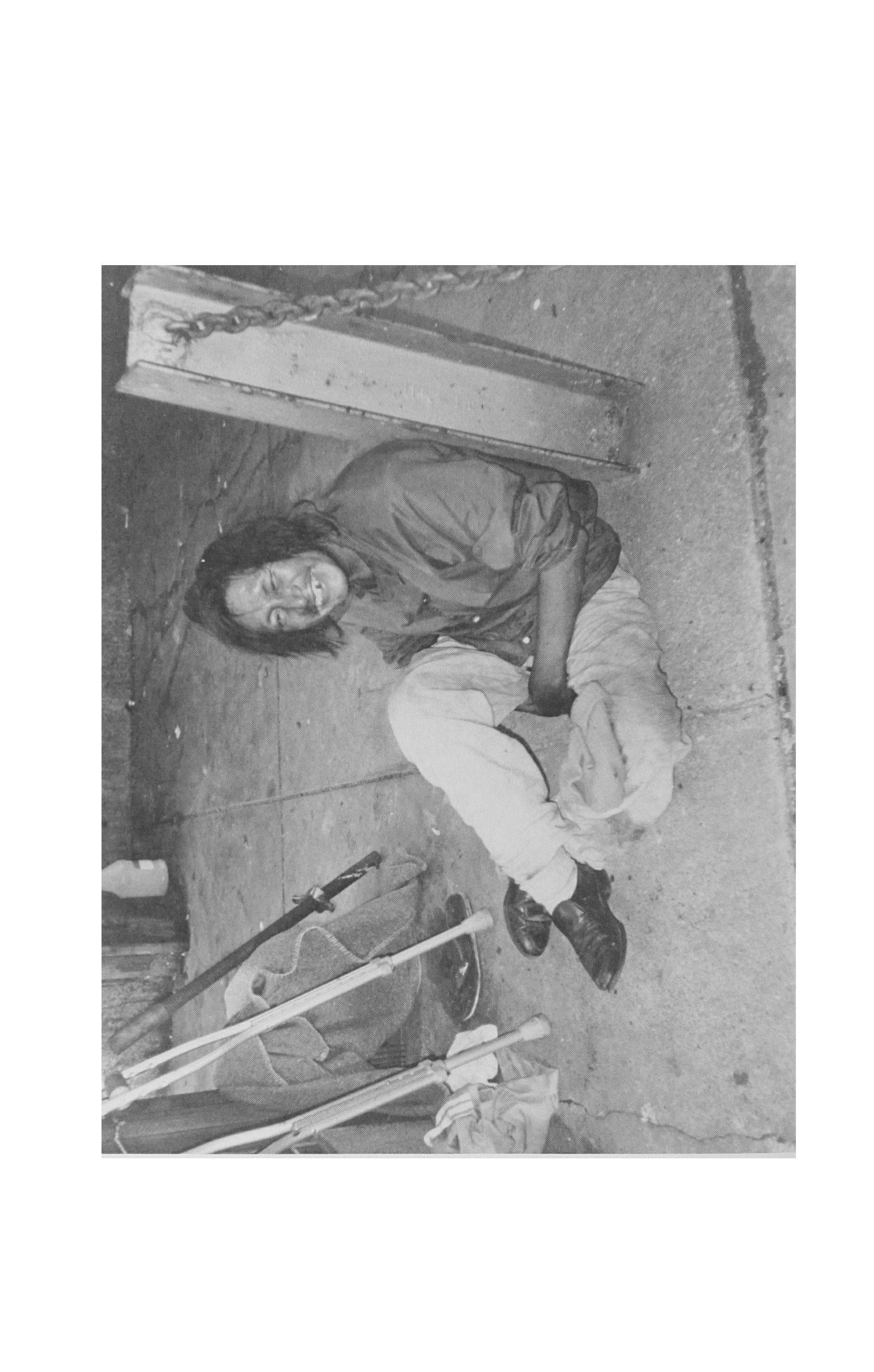

, ••••• ••••• II' I II. I II II ••1 II JI f • " II 'Ill ., II fj II II II II II If .t !
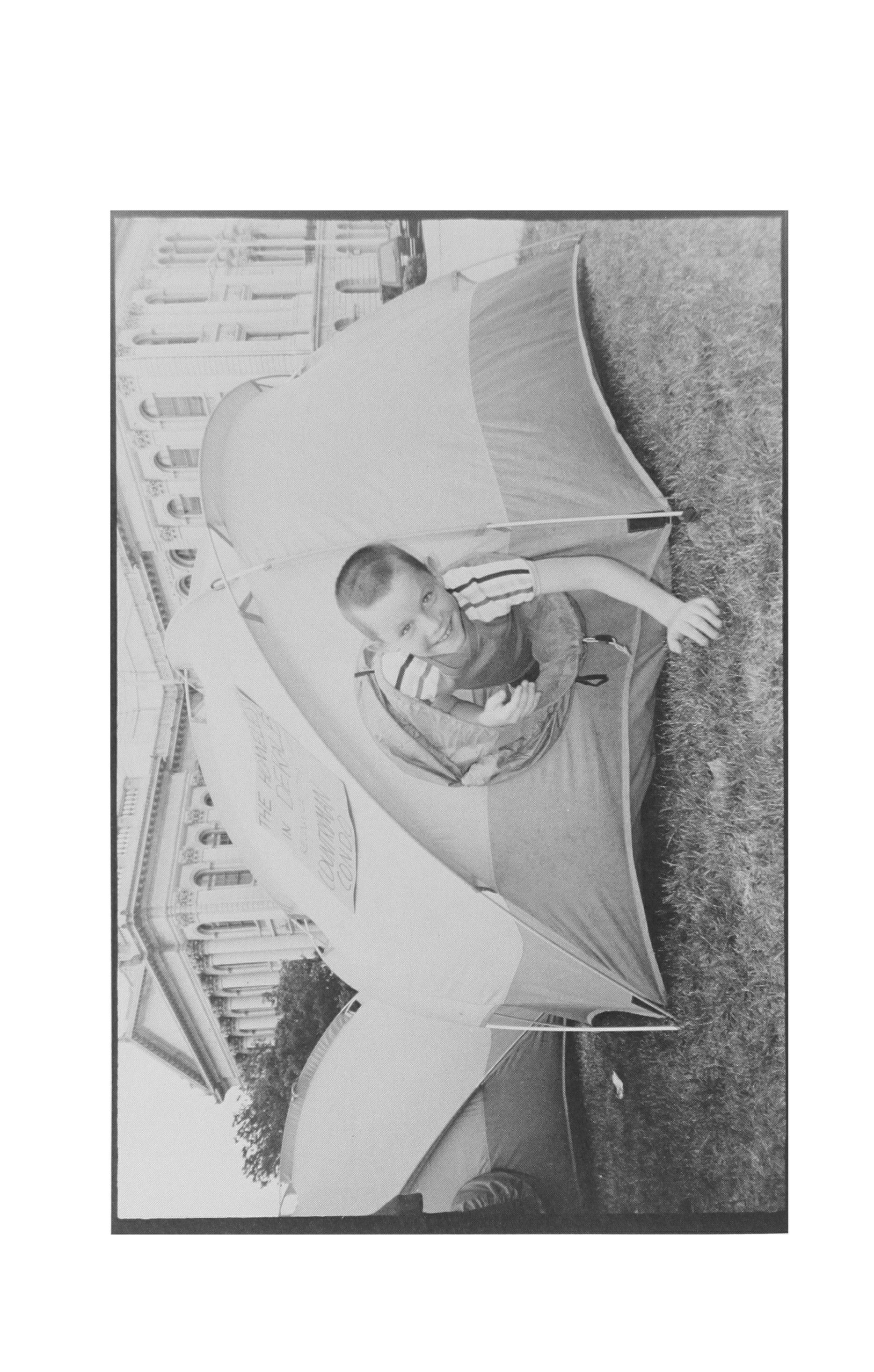
Democracy: Chapters in Verse
Fanny Howe
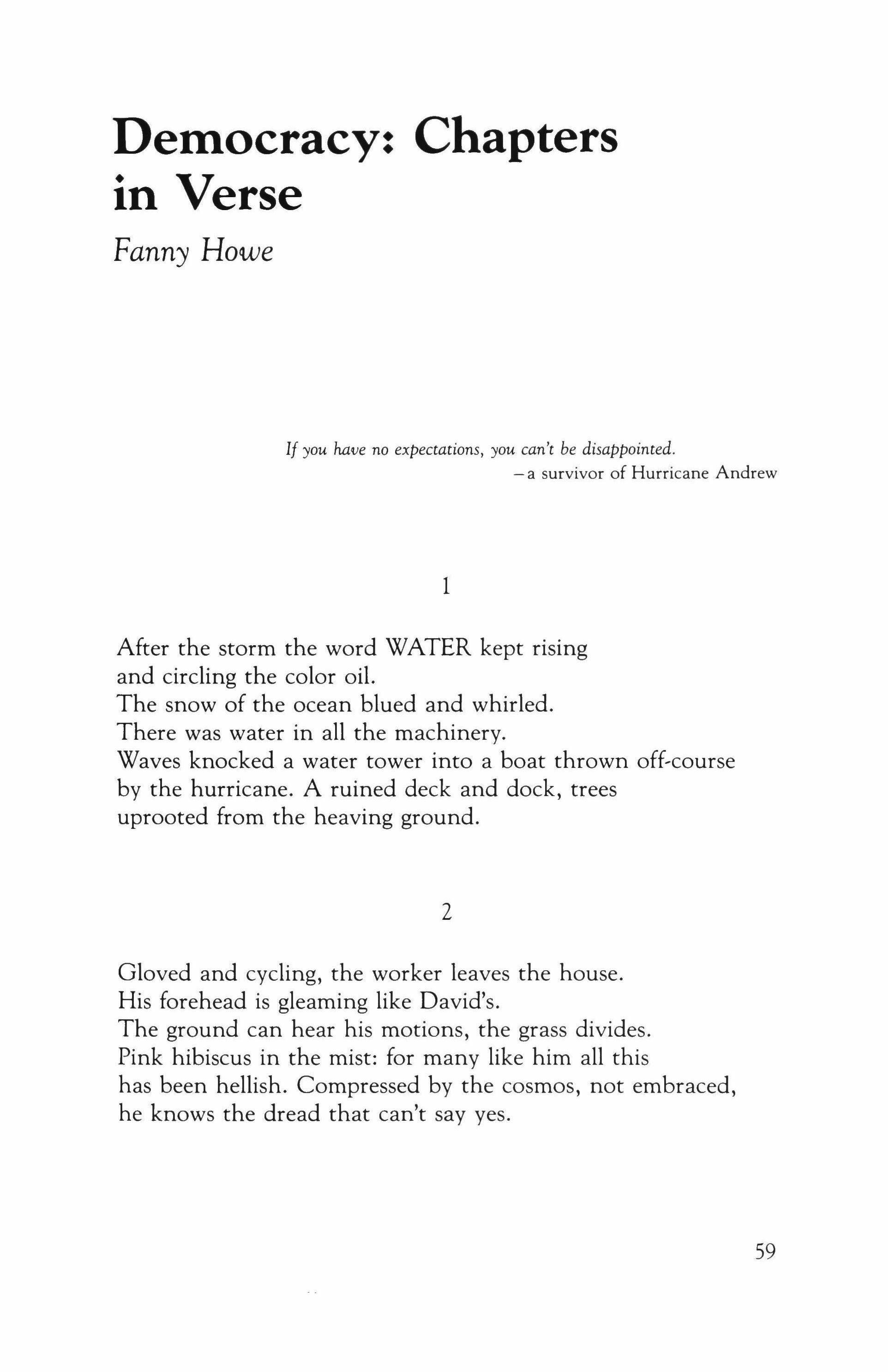
If you have no expectations, you can't be disappointed. - a survivor of Hurricane Andrew
1
After the storm the word WATER kept rising and circling the color oil. The snow of the ocean blued and whirled. There was water in all the machinery. Waves knocked a water tower into a boat thrown off-course by the hurricane. A ruined deck and dock, trees uprooted from the heaving ground.
2
Gloved and cycling, the worker leaves the house. His forehead is gleaming like David's. The ground can hear his motions, the grass divides. Pink hibiscus in the mist: for many like him all this has been hellish. Compressed by the cosmos, not embraced, he knows the dread that can't say yes.
59
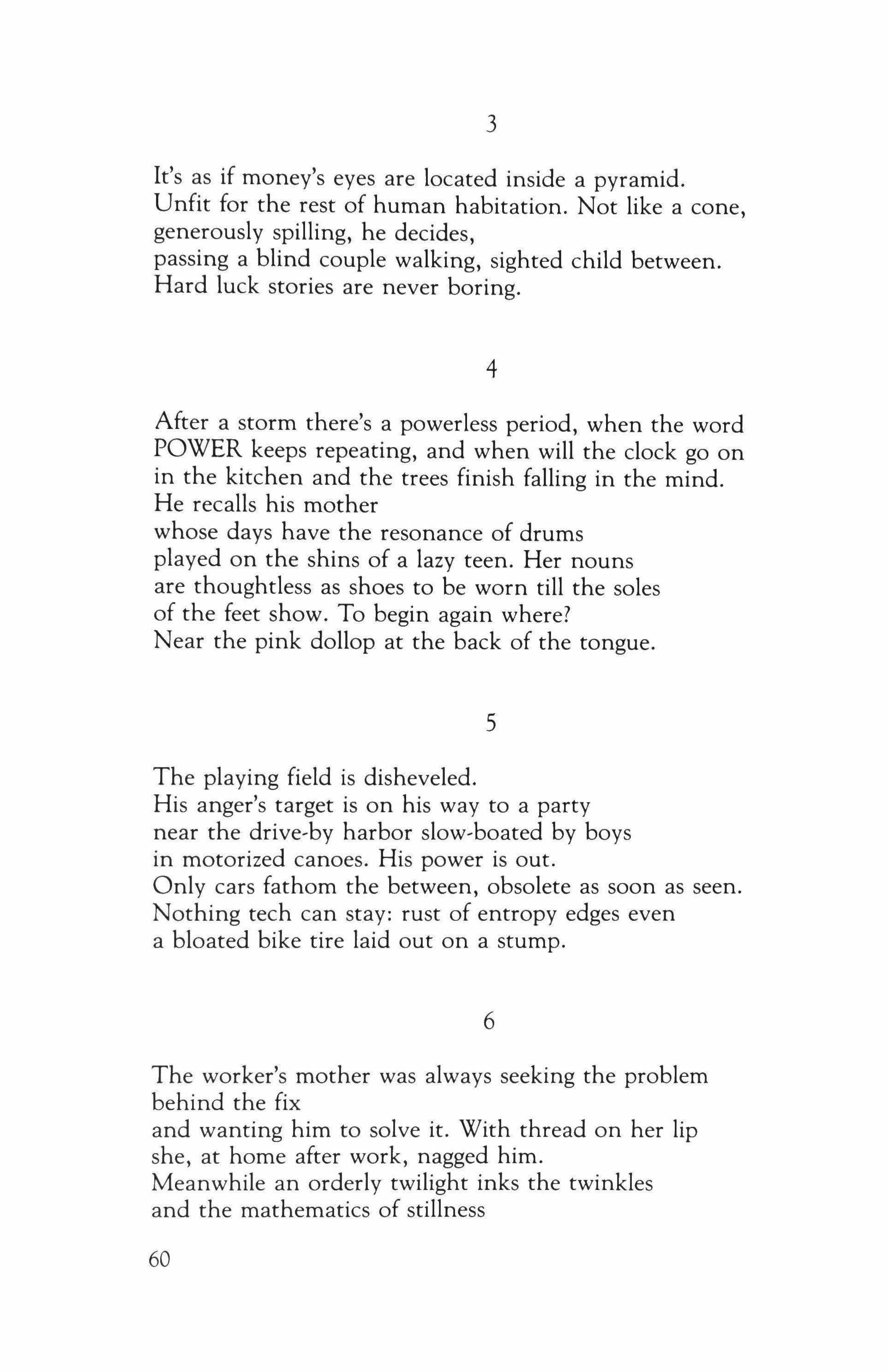
3
It's as if money's eyes are located inside a pyramid. Unfit for the rest of human habitation. Not like a cone, generously spilling, he decides, passing a blind couple walking, sighted child between. Hard luck stories are never boring.
4
After a storm there's a powerless period, when the word POWER keeps repeating, and when will the clock go on in the kitchen and the trees finish falling in the mind. He recalls his mother whose days have the resonance of drums played on the shins of a lazy teen. Her nouns are thoughtless as shoes to be worn till the soles of the feet show. To begin again where? Near the pink dollop at the back of the tongue.
5
The playing field is disheveled. His anger's target is on his way to a party near the drive-by harbor slow-boated by boys in motorized canoes. His power is out. Only cars fathom the between, obsolete as soon as seen. Nothing tech can stay: rust of entropy edges even a bloated bike tire laid out on a stump.
6
The worker's mother was always seeking the problem behind the fix and wanting him to solve it. With thread on her lip she, at home after work, nagged him. Meanwhile an orderly twilight inks the twinkles and the mathematics of stillness 60
is holiest when everyone is changing for bed, or in it. If a star is in her eye, she knows the star is finding itself, there, in her eye. Enlightenment is a level without measurement.
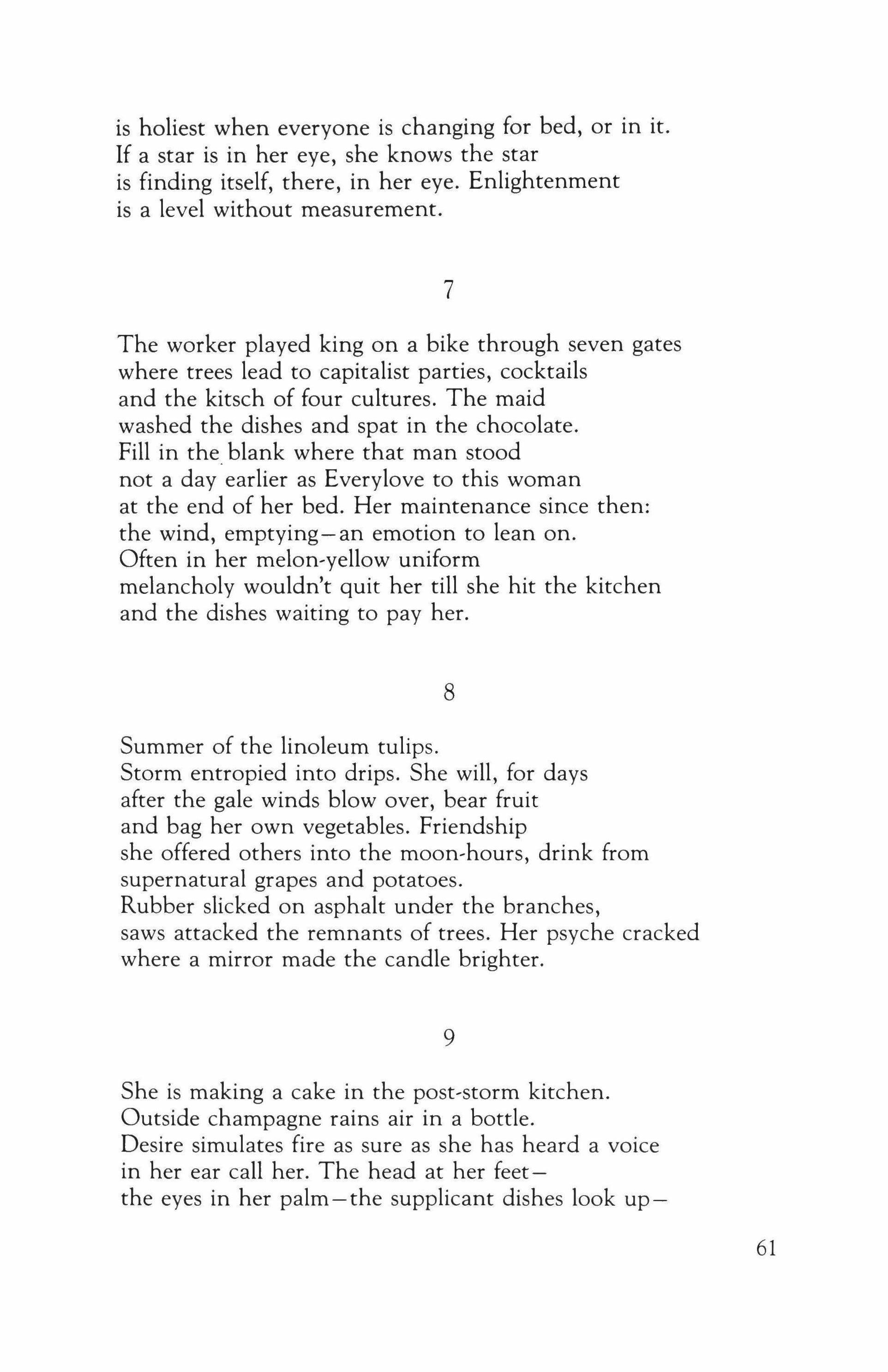
7
The worker played king on a bike through seven gates where trees lead to capitalist parties, cocktails and the kitsch of four cultures. The maid washed the dishes and spat in the chocolate. Fill in the blank where that man stood not a day earlier as Everylove to this woman at the end of her bed. Her maintenance since then: the wind, emptying-an emotion to lean on. Often in her melon-yellow uniform melancholy wouldn't quit her till she hit the kitchen and the dishes waiting to pay her.
8
Summer of the linoleum tulips. Storm entropied into drips. She will, for days after the gale winds blow over, bear fruit and bag her own vegetables. Friendship she offered others into the moon-hours, drink from supernatural grapes and potatoes. Rubber slicked on asphalt under the branches, saws attacked the remnants of trees. Her psyche cracked where a mirror made the candle brighter.
9
She is making a cake in the post-storm kitchen. Outside champagne rains air in a bottle. Desire simulates fire as sure as she has heard a voice in her ear call her. The head at her feetthe eyes in her palm-the supplicant dishes look up-
61
indications of Saint Monica wanting to appear in her consciousness. Ordinary time's daily prayer for the conversion of workers to angels.
But only pure prayer makes the air into an ear.
10
After the storm, the long-limbed oak trees twist. Corkish. They drank in kitchen wicker, and watched. Are those half-people or chairs at a bar? He held her ankles with his feet.
People are begotten from eternity, only to be returned. And the animals of Paradise?
Let fortune smile on them! Or: send someone to burn these monsters up. A person worthy of a sparrow's ashes. Together one night they hosed down his anger, and learned that a wound is only the edge of self-awareness.
11
At the capitalist party, the eros of a dress suggesting tips reinforces the connection between pyramids and money. Corks are unplugged from the green, which is then drunk with the savage concentration of bees wanting honey from a color.
Gossip evolves like a sourball growing smaller in a mouth.
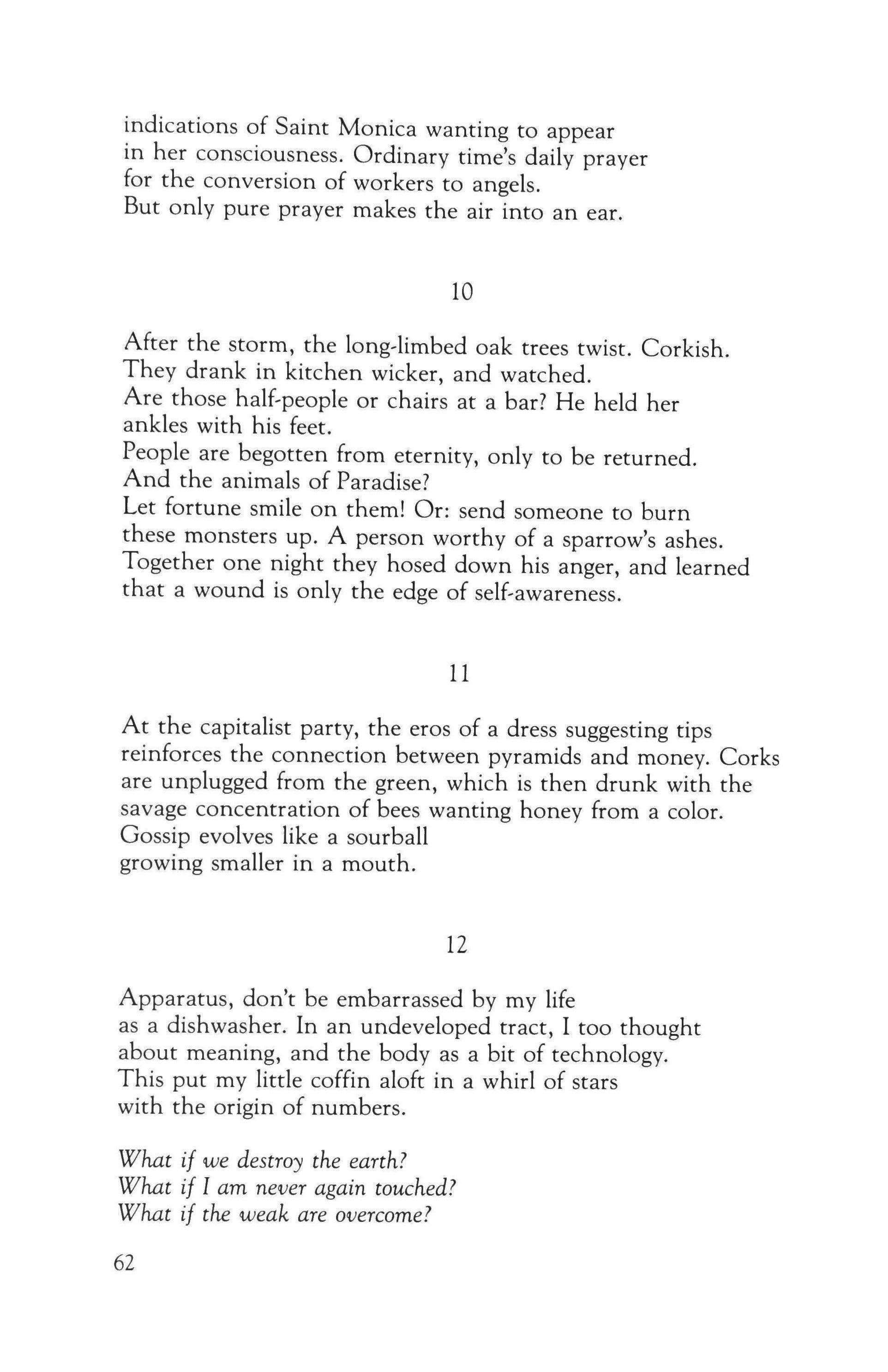
12
Apparatus, don't be embarrassed by my life as a dishwasher. In an undeveloped tract, I too thought about meaning, and the body as a bit of technology. This put my little coffin aloft in a whirl of stars with the origin of numbers.
What if we destroy the earth?
What if I am never again touched? What if the weak are overcome?
62
What if winning is a sign of God's love? What if women made men so mean?

13
When you eat alone you don't exist for anyone but the dish. Like the spaniel (the dog of invincible obsession) you might stare fixedly into a water glass for hours.
14
Sometimes eros appears in sleeping ears as the prayers of the flesh, empty of consciousness. And then the candle's wax peels off its hot body like foreskin. And you find yourself entering the long loneliness.
15
He held his bike between his thighs to contemplate the damage. The power of water. "If I were given access to several facts, I might finally mobilize a people's army to rise against the problematics. But anonymity is the true goal of my democracy."
16
She could have backed up into the target of his anger's belly and done violence. Assassinate. One giant step would accomplish it. His arm even extended over her shoulder, not interested in contact, colder than a barber at Treblinka. He was the right temperature for those who kill by proxy. But she believed in the immortal soul and hesitated.
63
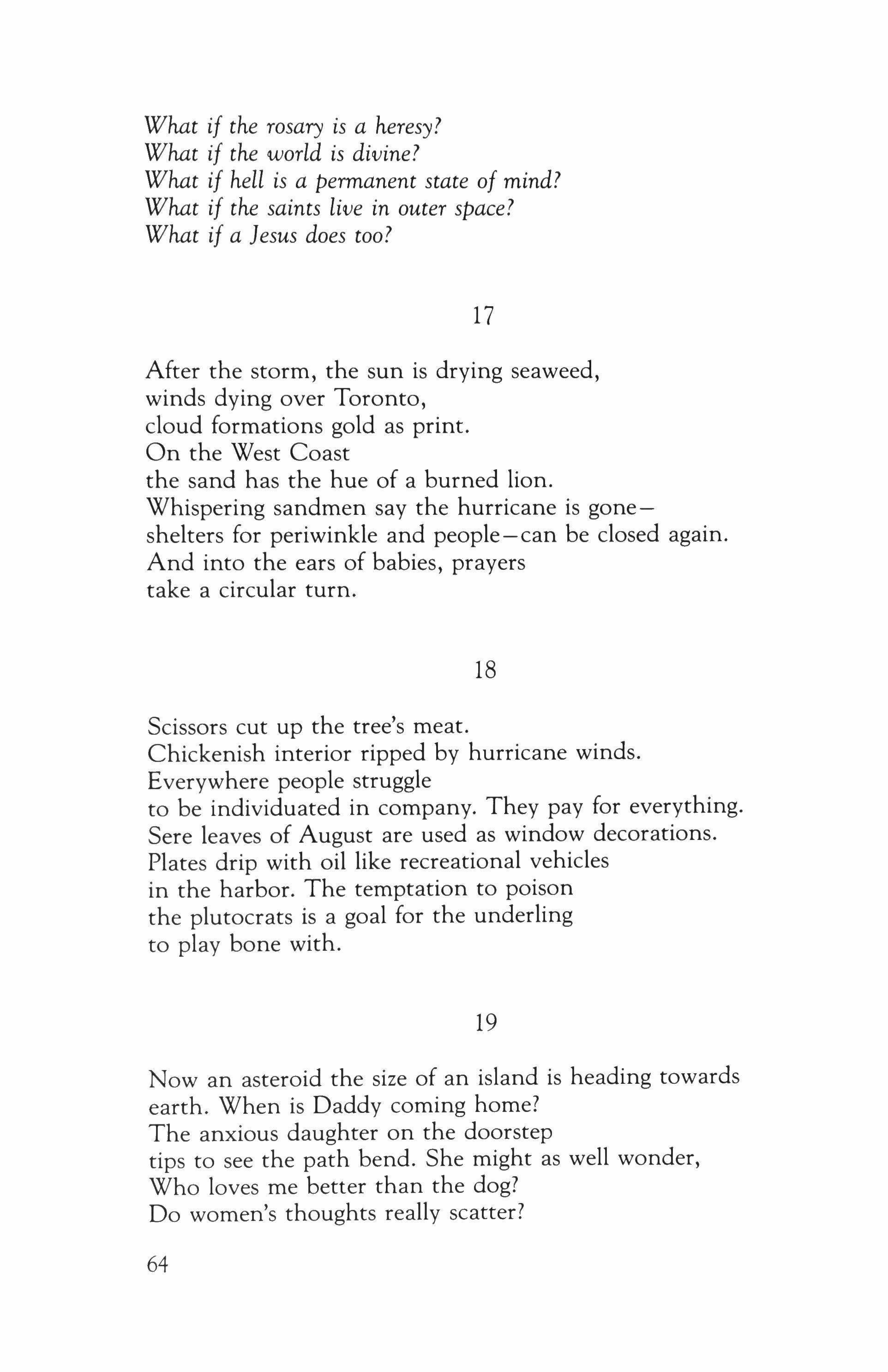
What if the rosary is a heresy? What if the world is divine?
What if hell is a permanent state of mind? What if the saints live in outer space? What if a Jesus does too?
17
After the storm, the sun is drying seaweed, winds dying over Toronto, cloud formations gold as print. On the West Coast the sand has the hue of a burned lion. Whispering sandmen say the hurricane is goneshelters for periwinkle and people-can be closed again. And into the ears of babies, prayers take a circular turn.
18
Scissors cut up the tree's meat. Chickenish interior ripped by hurricane winds. Everywhere people struggle to be individuated in company. They pay for everything. Sere leaves of August are used as window decorations. Plates drip with oil like recreational vehicles in the harbor. The temptation to poison the plutocrats is a goal for the underling to play bone with.
19
Now an asteroid the size of an island is heading towards earth. When is Daddy coming home? The anxious daughter on the doorstep tips to see the path bend. She might as well wonder, Who loves me better than the dog? Do women's thoughts really scatter?
64
From the porch, across the grass stacked with firewood, the worker waves with the confidence of every owner or assassin in a rush. He'll note aluminum siding on the way to the crime and remember: No windows in the ark. Keep out the view of water. It would drive them mad to see the power of water.
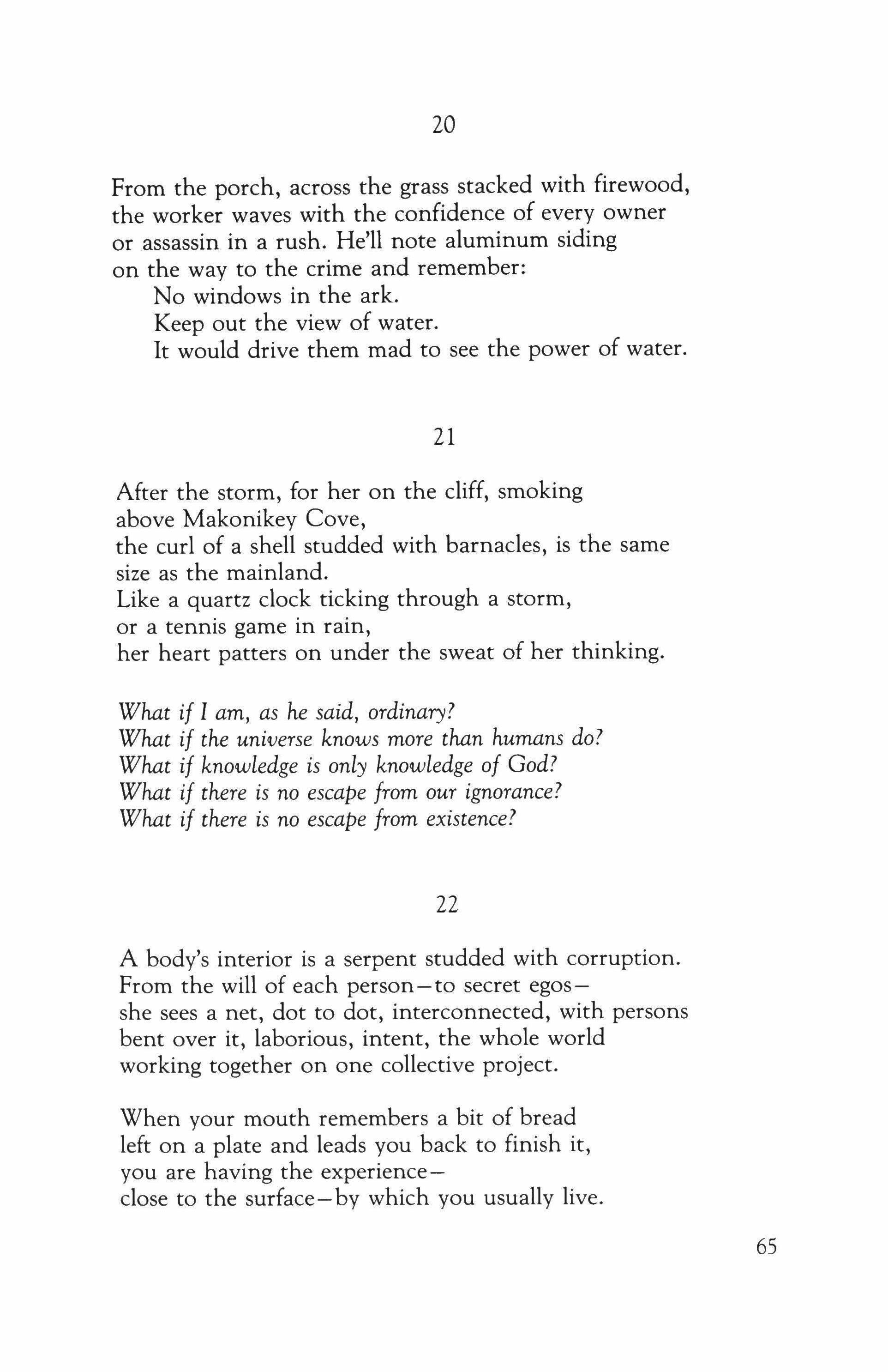
21
After the storm, for her on the cliff, smoking above Makonikey Cove, the curl of a shell studded with barnacles, is the same size as the mainland. Like a quartz clock ticking through a storm, or a tennis game in rain, her heart patters on under the sweat of her thinking.
What if I am, as he said, ordinary?
What if the universe knows more than humans do? What if knowledge is only knowledge of God? What if there is no escape from our ignorance? What if there is no escape from existence?
22
A body's interior is a serpent studded with corruption. From the will of each person - to secret egosshe sees a net, dot to dot, interconnected, with persons bent over it, laborious, intent, the whole world working together on one collective project.
When your mouth remembers a bit of bread left on a plate and leads you back to finish it, you are having the experienceclose to the surface-by which you usually live.
20
65
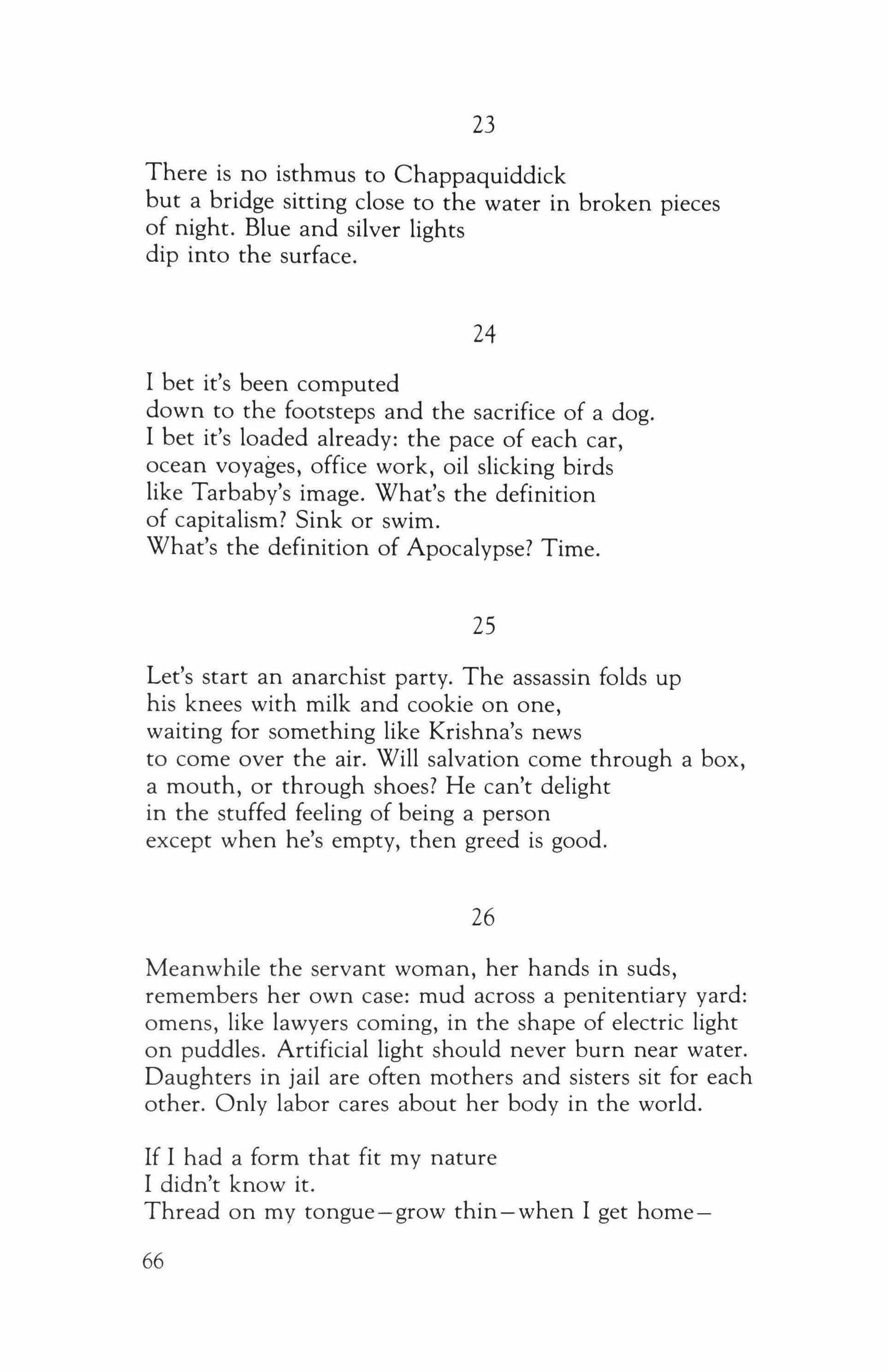
There is no isthmus to Chappaquiddick but a bridge sitting close to the water in broken pieces of night. Blue and silver lights dip into the surface.
24
I bet it's been computed down to the footsteps and the sacrifice of a dog. I bet it's loaded already: the pace of each car, ocean voyages, office work, oil slicking birds like Tarbaby's image. What's the definition of capitalism? Sink or swim. What's the definition of Apocalypse? Time.
25
Let's start an anarchist party. The assassin folds up his knees with milk and cookie on one, waiting for something like Krishna's news to come over the air. Will salvation come through a box, a mouth, or through shoes? He can't delight in the stuffed feeling of being a person except when he's empty, then greed is good.
26
Meanwhile the servant woman, her hands in suds, remembers her own case: mud across a penitentiary yard: omens, like lawyers coming, in the shape of electric light on puddles. Artificial light should never burn near water. Daughters in jail are often mothers and sisters sit for each other. Only labor cares about her body in the world.
If I had a form that fit my nature I didn't know it.
Thread on my tongue-grow thin-when I get home-
23
66
for the needle in my fingers. Don't make me struggle.
What if I am never found by God?
What if I am disfigured by my acts?
What if I bear bad fruit?
What if I have to live this way for the rest of my life? What if I never change?
27
If it was something corresponding to the ark; and if it was [ung's dream of a holocaust on a train; and if it was a democracy of poetry leveled into prose; and if it was that night again: and if the man was laughing on the wall; and if the woman falling under the car away from her son; if it was a gray wind called; if we were crossed by: or if it was the return of the; and if the cows cost; and if it was east to; an island of socialists was:
28
He said of his life so far: "It was me and it was about me. My time was a mystery, but it was mine. I wish I remembered more."
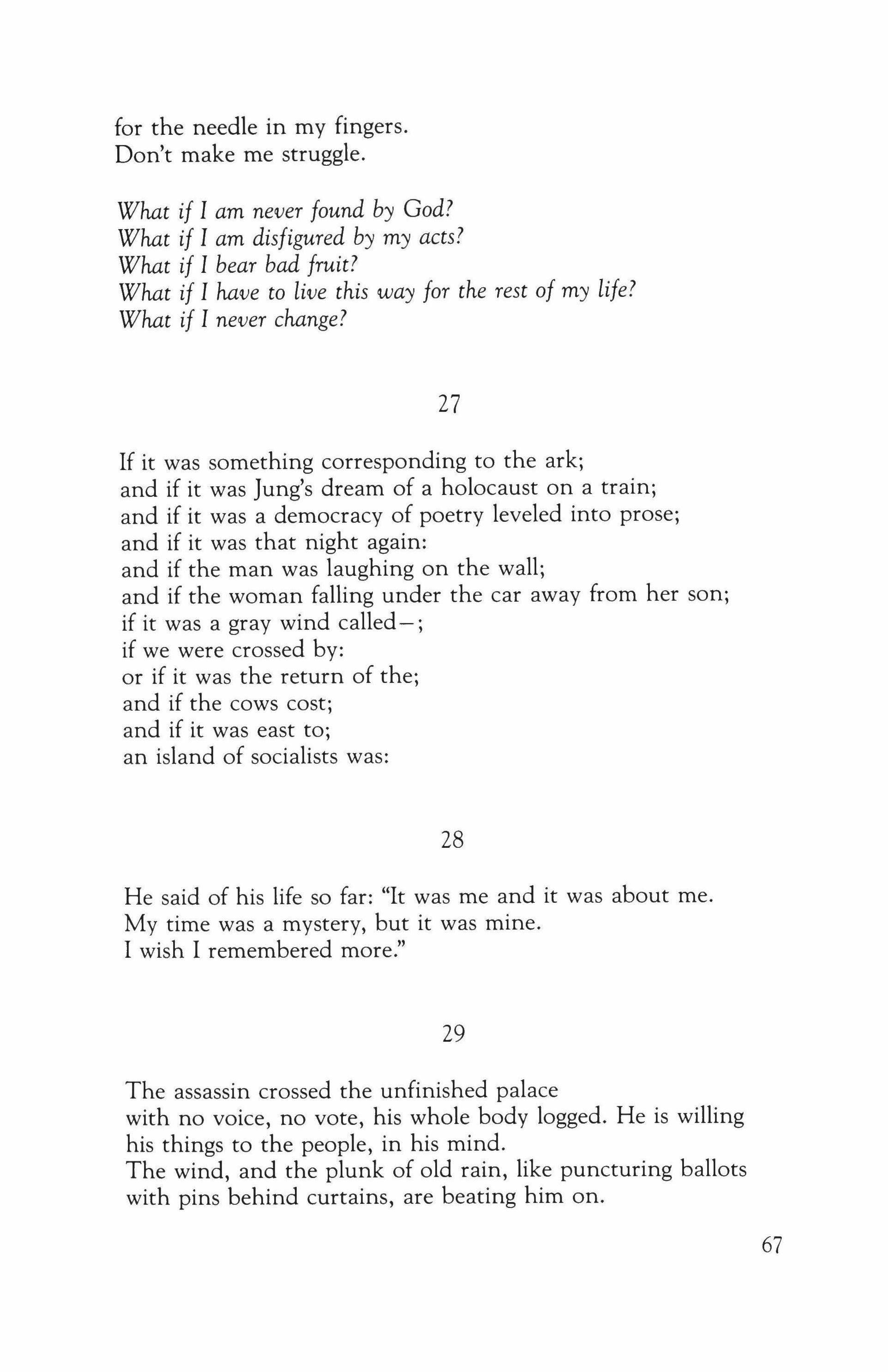
29
The assassin crossed the unfinished palace with no voice, no vote, his whole body logged. He is willing his things to the people, in his mind. The wind, and the plunk of old rain, like puncturing ballots with pins behind curtains, are beating him on.
67
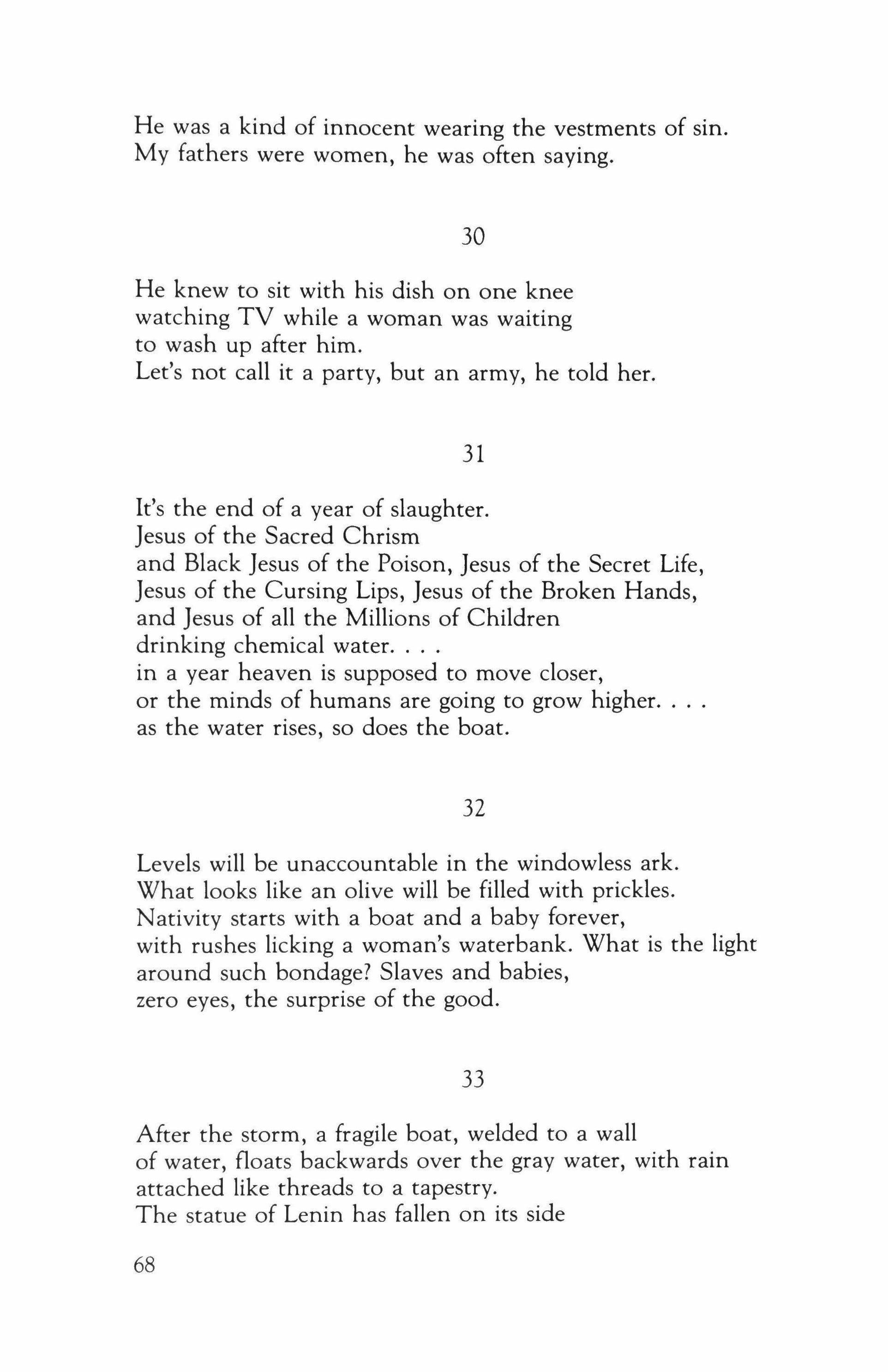
He was a kind of innocent wearing the vestments of sin. My fathers were women, he was often saying.
30
He knew to sit with his dish on one knee watching TV while a woman was waiting to wash up after him. Let's not call it a party, but an army, he told her.
31
It's the end of a year of slaughter. Jesus of the Sacred Chrism and Black Jesus of the Poison, Jesus of the Secret Life, Jesus of the Cursing Lips, Jesus of the Broken Hands, and Jesus of all the Millions of Children drinking chemical water. in a year heaven is supposed to move closer, or the minds of humans are going to grow higher as the water rises, so does the boat.
32
Levels will be unaccountable in the windowless ark. What looks like an olive will be filled with prickles. Nativity starts with a boat and a baby forever, with rushes licking a woman's waterbank. What is the light around such bondage? Slaves and babies, zero eyes, the surprise of the good.
33
After the storm, a fragile boat, welded to a wall of water, floats backwards over the gray water, with rain attached like threads to a tapestry. The statue of Lenin has fallen on its side
68
becoming a garden ornament after a storm. And if this is a ballad, its refrain is secret.
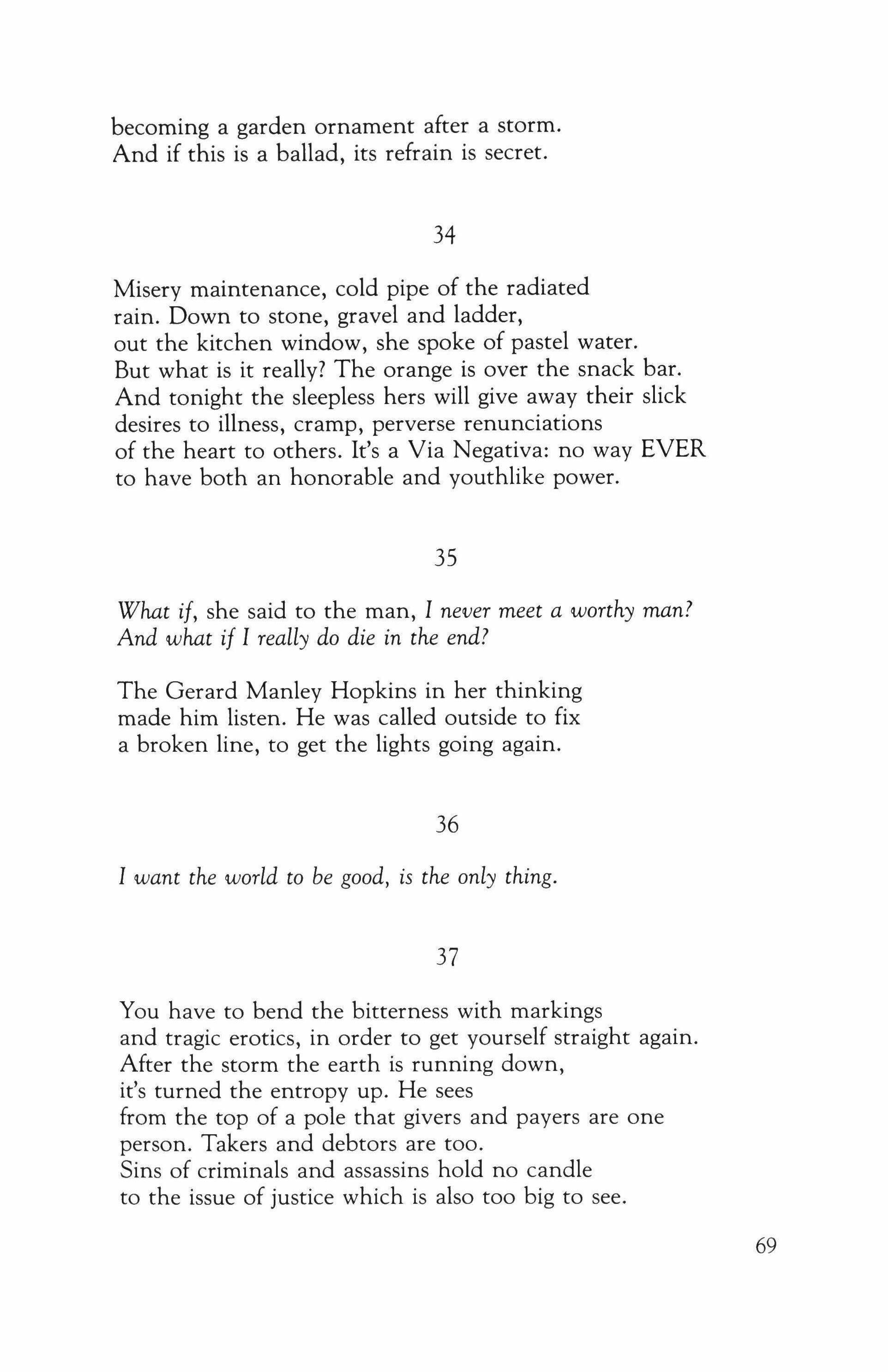
34
Misery maintenance, cold pipe of the radiated rain. Down to stone, gravel and ladder, out the kitchen window, she spoke of pastel water. But what is it really? The orange is over the snack bar. And tonight the sleepless hers will give away their slick desires to illness, cramp, perverse renunciations of the heart to others. It's a Via Negativa: no way EVER to have both an honorable and youthlike power.
35
What if, she said to the man, I never meet a worthy man? And what if I really do die in the end?
The Gerard Manley Hopkins in her thinking made him listen. He was called outside to fix a broken line, to get the lights going again.
36
I want the world to be good, is the only thing.
37
You have to bend the bitterness with markings and tragic erotics, in order to get yourself straight again. After the storm the earth is running down, it's turned the entropy up. He sees from the top of a pole that givers and payers are one person. Takers and debtors are too. Sins of criminals and assassins hold no candle to the issue of justice which is also too big to see.
69
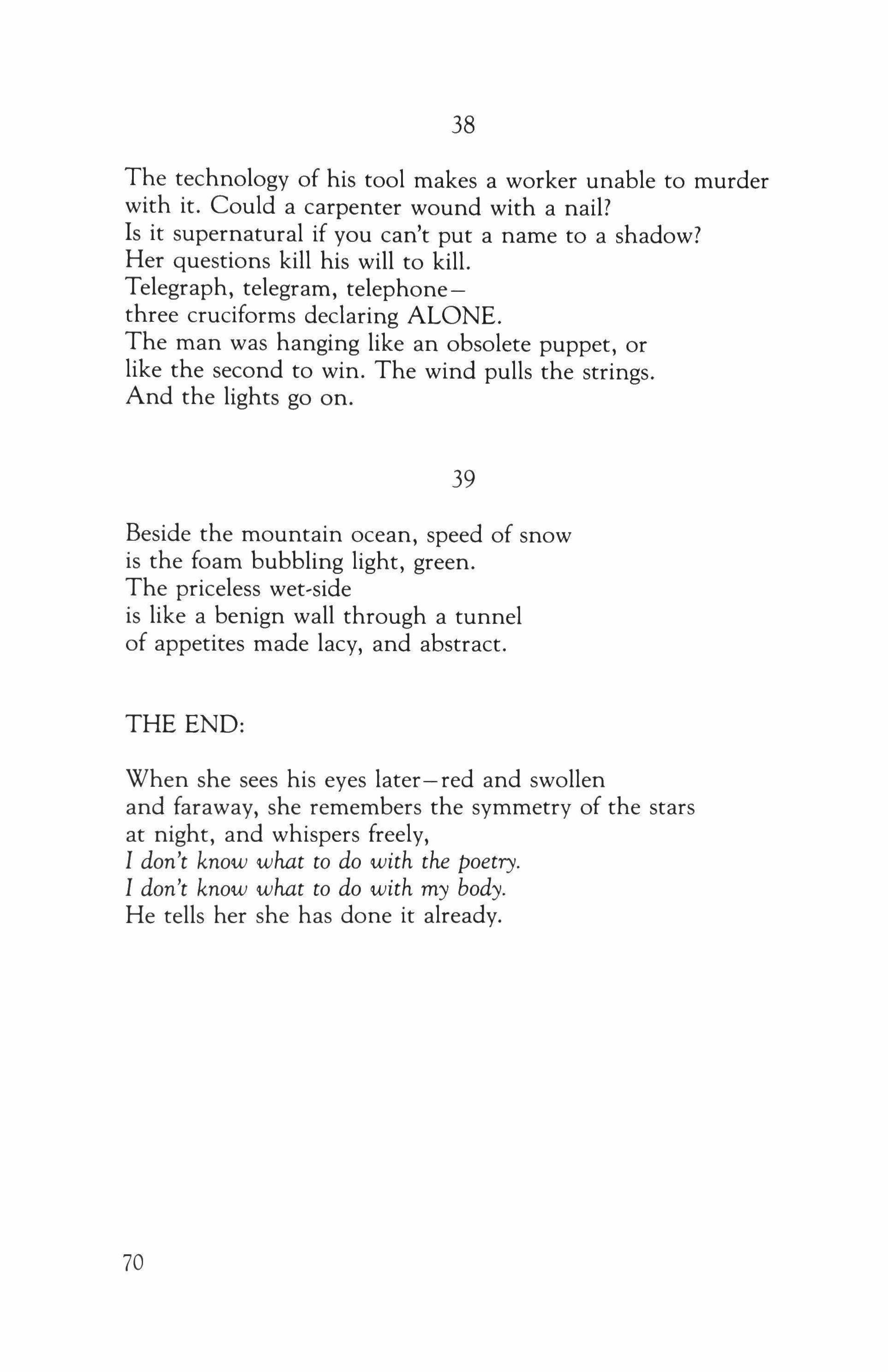
38
The technology of his tool makes a worker unable to murder with it. Could a carpenter wound with a nail? Is it supernatural if you can't put a name to a shadow? Her questions kill his will to kill.
Telegraph, telegram, telephonethree cruciforms declaring ALONE. The man was hanging like an obsolete puppet, or like the second to win. The wind pulls the strings. And the lights go on.
39
Beside the mountain ocean, speed of snow is the foam bubbling light, green. The priceless wet-side is like a benign wall through a tunnel of appetites made lacy, and abstract.
THE END:
When she sees his eyes later-red and swollen and faraway, she remembers the symmetry of the stars at night, and whispers freely, I don't know what to do with the poetry. I don't know what to do with my body. He tells her she has done it already.
70
Days of Indulgence
]ack Heffron
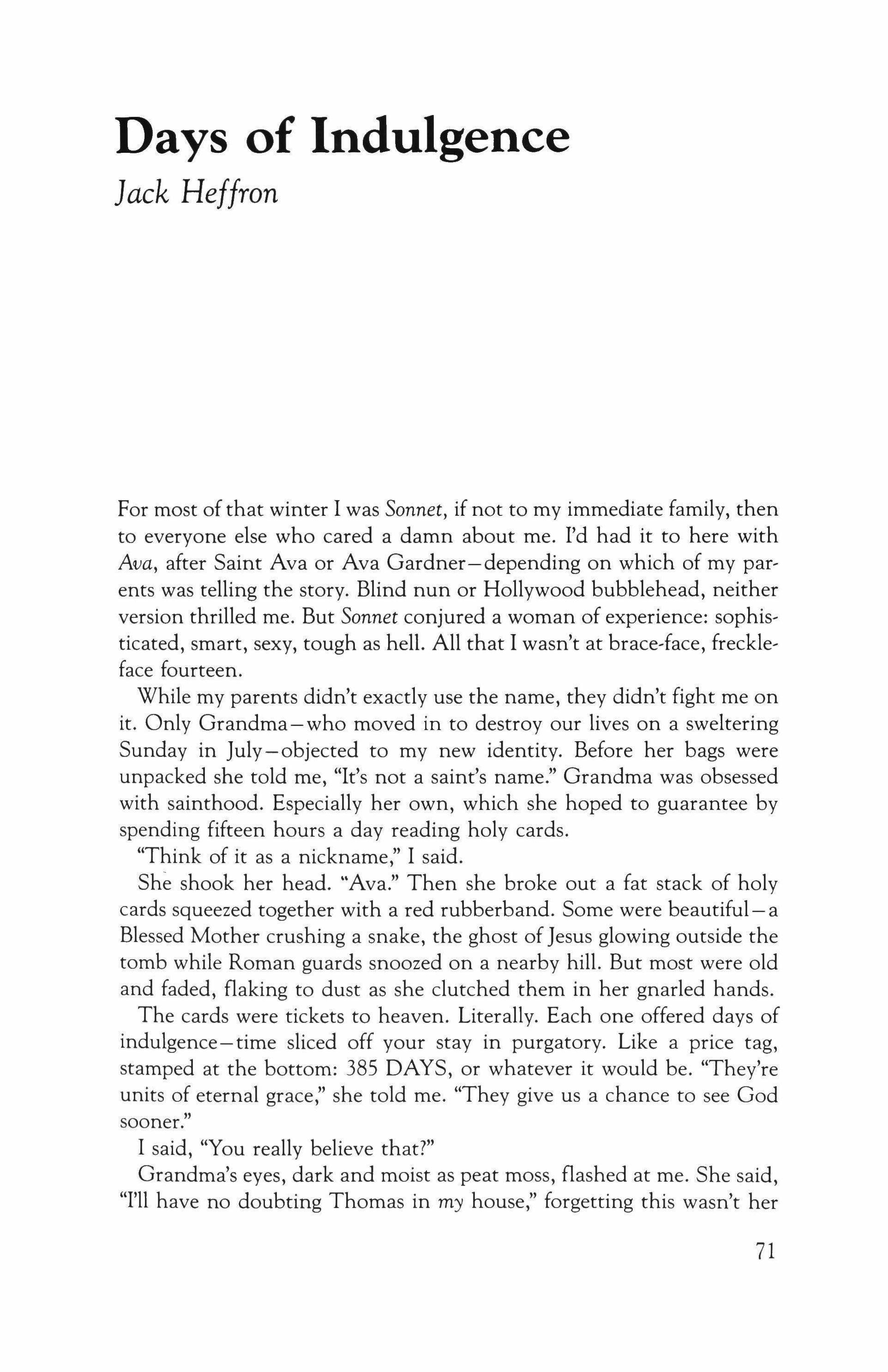
For most of that winter I was Sonnet, if not to my immediate family, then to everyone else who cared a damn about me. I'd had it to here with Ava, after Saint Ava or Ava Gardner-depending on which of my parents was telling the story. Blind nun or Hollywood bubblehead, neither version thrilled me. But Sonnet conjured a woman of experience: sophisticated, smart, sexy, tough as hell. All that I wasn't at brace-face, freckleface fourteen.
While my parents didn't exactly use the name, they didn't fight me on it. Only Grandma-who moved in to destroy our lives on a sweltering Sunday in July-objected to my new identity. Before her bags were unpacked she told me, "It's not a saint's name." Grandma was obsessed with sainthood. Especially her own, which she hoped to guarantee by spending fifteen hours a day reading holy cards.
"Think of it as a nickname," I said.
She shook her head. "Ava." Then she broke out a fat stack of holy cards squeezed together with a red rubberband. Some were beautiful- a Blessed Mother crushing a snake, the ghost ofJesus glowing outside the tomb while Roman guards snoozed on a nearby hill. But most were old and faded, flaking to dust as she clutched them in her gnarled hands.
The cards were tickets to heaven. Literally. Each one offered days of indulgence-time sliced off your stay in purgatory. Like a price tag, stamped at the bottom: 385 DAYS, or whatever it would be. "They're units of eternal grace:' she told me. "They give us a chance to see God sooner."
I said, "You really believe that?"
Grandma's eyes, dark and moist as peat moss, flashed at me. She said, "I'll have no doubting Thomas in my house," forgetting this wasn't her
71
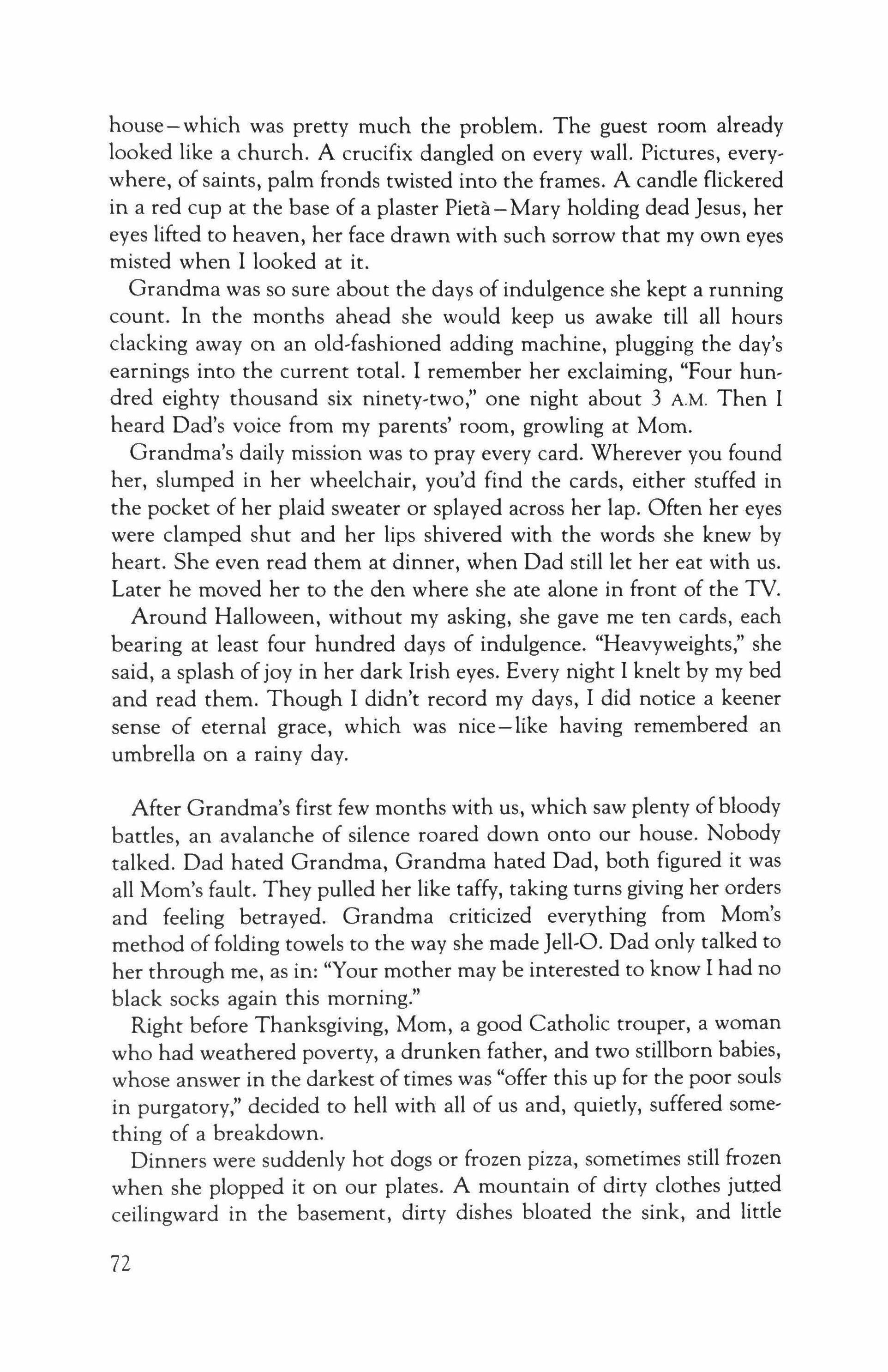
house-which was pretty much the problem. The guest room already looked like a church. A crucifix dangled on every wall. Pictures, everywhere, of saints, palm fronds twisted into the frames. A candle flickered in a red cup at the base of a plaster Pieta - Mary holding dead Jesus, her eyes lifted to heaven, her face drawn with such sorrow that my own eyes misted when I looked at it.
Grandma was so sure about the days of indulgence she kept a running count. In the months ahead she would keep us awake till all hours clacking away on an old-fashioned adding machine, plugging the day's earnings into the current total. I remember her exclaiming, "Four hundred eighty thousand six ninety-two," one night about 3 A.M. Then I heard Dad's voice from my parents' room, growling at Mom.
Grandma's daily mission was to pray every card. Wherever you found her, slumped in her wheelchair, you'd find the cards, either stuffed in the pocket of her plaid sweater or splayed across her lap. Often her eyes were clamped shut and her lips shivered with the words she knew by heart. She even read them at dinner, when Dad still let her eat with us. Later he moved her to the den where she ate alone in front of the TV.
Around Halloween, without my asking, she gave me ten cards, each bearing at least four hundred days of indulgence. "Heavyweights:' she said, a splash ofjoy in her dark Irish eyes. Every night I knelt by my bed and read them. Though I didn't record my days, I did notice a keener sense of eternal grace, which was nice-like having remembered an umbrella on a rainy day.
After Grandma's first few months with us, which saw plenty of bloody battles, an avalanche of silence roared down onto our house. Nobody talked. Dad hated Grandma, Grandma hated Dad, both figured it was all Mom's fault. They pulled her like taffy, taking turns giving her orders and feeling betrayed. Grandma criticized everything from Mom's method of folding towels to the way she made jell-O. Dad only talked to her through me, as in: "Your mother may be interested to know I had no black socks again this morning."
Right before Thanksgiving, Mom, a good Catholic trouper, a woman who had weathered poverty, a drunken father, and two stillborn babies, whose answer in the darkest of times was "offer this up for the poor souls in purgatory," decided to hell with all of us and, quietly, suffered something of a breakdown.
Dinners were suddenly hot dogs or frozen pizza, sometimes still frozen when she plopped it on our plates. A mountain of dirty clothes jutted ceilingward in the basement, dirty dishes bloated the sink, and little
n
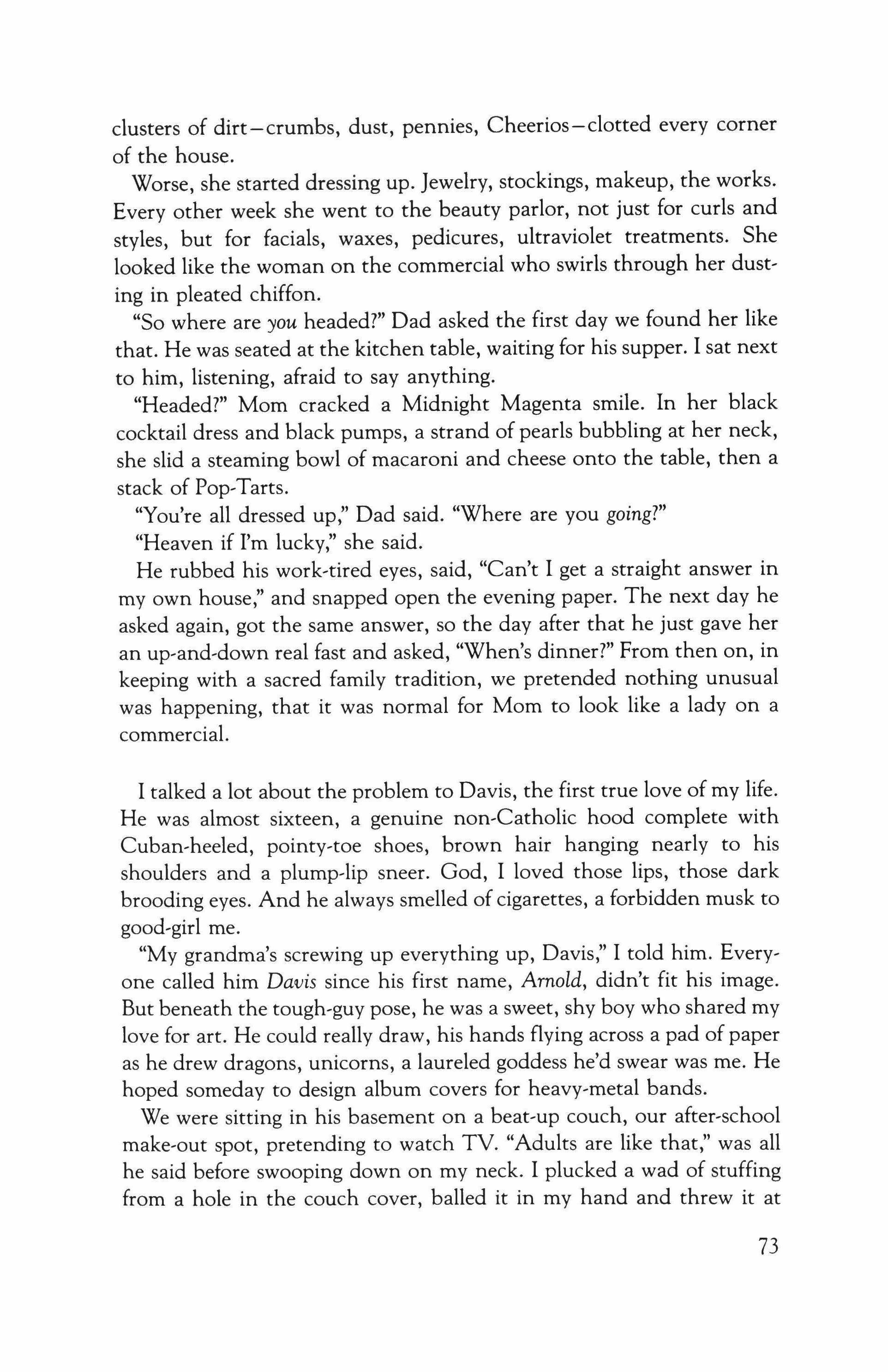
clusters of dirt-crumbs, dust, pennies, Cheerios-clotted every corner of the house.
Worse, she started dressing up. Jewelry, stockings, makeup, the works. Every other week she went to the beauty parlor, not just for curls and styles, but for facials, waxes, pedicures, ultraviolet treatments. She looked like the woman on the commercial who swirls through her dust, ing in pleated chiffon.
"So where are you headed?" Dad asked the first day we found her like that. He was seated at the kitchen table, waiting for his supper. I sat next to him, listening, afraid to say anything.
"Headed?" Mom cracked a Midnight Magenta smile. In her black cocktail dress and black pumps, a strand of pearls bubbling at her neck, she slid a steaming bowl of macaroni and cheese onto the table, then a stack of Pop-Tarrs.
"You're all dressed up," Dad said. "Where are you going?"
"Heaven if I'm lucky," she said.
He rubbed his work-tired eyes, said, "Can't I get a straight answer in my own house," and snapped open the evening paper. The next day he asked again, got the same answer, so the day after that he just gave her an up-and-down real fast and asked, "When's dinner?" From then on, in keeping with a sacred family tradition, we pretended nothing unusual was happening, that it was normal for Mom to look like a lady on a commercial.
I talked a lot about the problem to Davis, the first true love of my life. He was almost sixteen, a genuine non-Catholic hood complete with Cuban-heeled, pointy-toe shoes, brown hair hanging nearly to his shoulders and a plump-lip sneer. God, I loved those lips, those dark brooding eyes. And he always smelled of cigarettes, a forbidden musk to good-girl me.
"My grandma's screwing up everything up, Davis," I told him. Everyone called him Davis since his first name, Arnold, didn't fit his image. But beneath the tough-guy pose, he was a sweet, shy boy who shared my love for art. He could really draw, his hands flying across a pad of paper as he drew dragons, unicorns, a laureled goddess he'd swear was me. He hoped someday to design album covers for heavy-metal bands.
We were sitting in his basement on a beat-up couch, our after-school make-out spot, pretending to watch TV. "Adults are like that," was all he said before swooping down on my neck. I plucked a wad of stuffing from a hole in the couch cover, balled it in my hand and threw it at
73
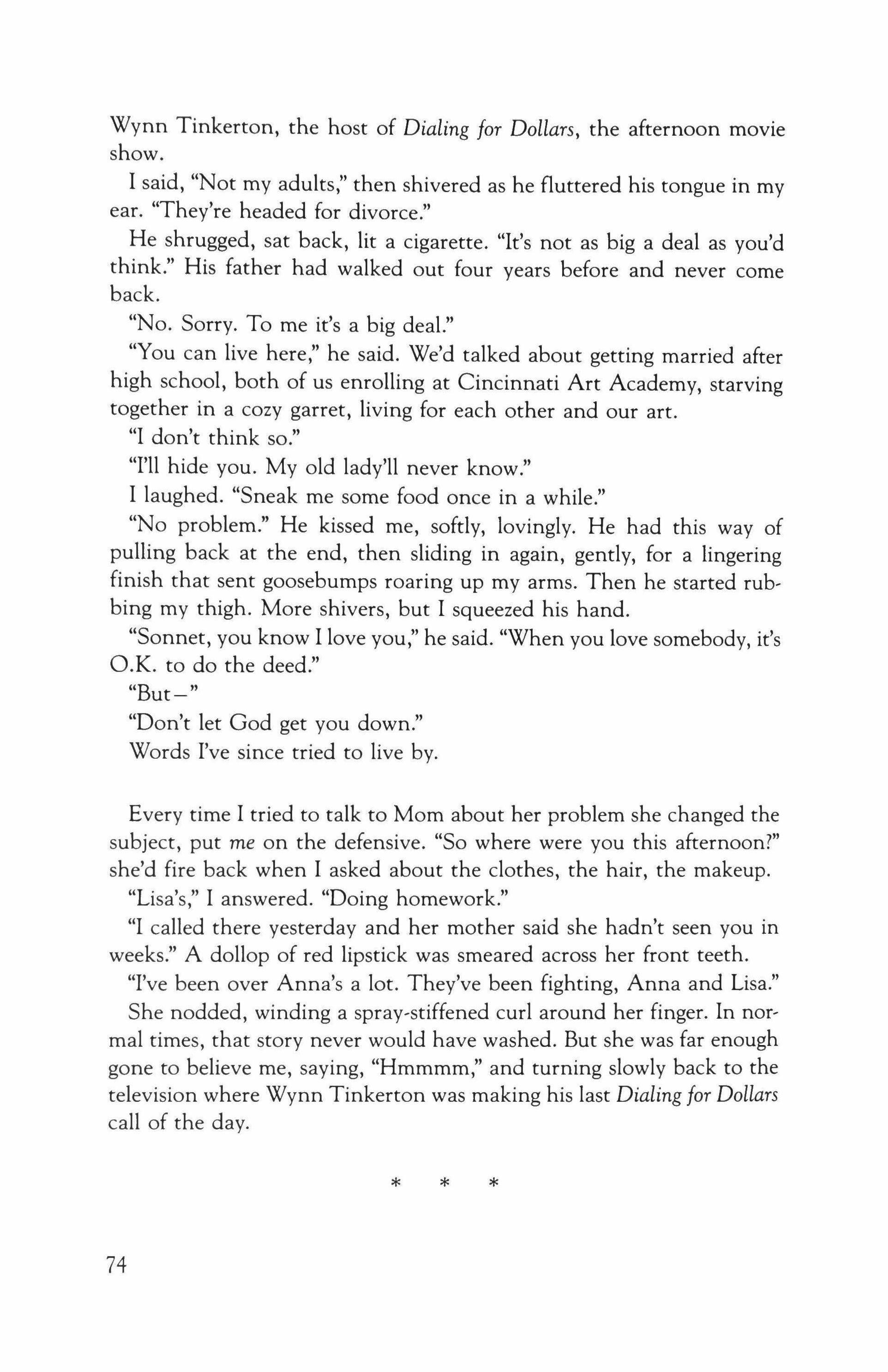
Wynn Tinkerton, the host of Dialing for Dollars, the afternoon movie show.
I said, "Not my adults," then shivered as he fluttered his tongue in my ear. "They're headed for divorce."
He shrugged, sat back, lit a cigarette. "It's not as big a deal as you'd think." His father had walked out four years before and never come back.
"No. Sorry. To me it's a big deal."
"You can live here," he said. We'd talked about getting married after high school, both of us enrolling at Cincinnati Art Academy, starving together in a cozy garret, living for each other and our art.
"I don't think so."
"I'll hide you. Myoid lady'll never know."
I laughed. "Sneak me some food once in a while."
"No problem." He kissed me, softly, lovingly. He had this way of pulling back at the end, then sliding in again, gently, for a lingering finish that sent goosebumps roaring up my arms. Then he started rubbing my thigh. More shivers, but I squeezed his hand.
"Sonnet, you know I love you," he said. "When you love somebody, it's O.K. to do the deed."
"But-"
"Don't let God get you down."
Words I've since tried to live by.
Every time I tried to talk to Mom about her problem she changed the subject, put me on the defensive. "So where were you this afternoon?" she'd fire back when I asked about the clothes, the hair, the makeup.
"Lisa's," I answered. "Doing homework."
"I called there yesterday and her mother said she hadn't seen you in weeks." A dollop of red lipstick was smeared across her front teeth.
"I've been over Anna's a lot. They've been fighting, Anna and Lisa."
She nodded, winding a spray-stiffened curl around her finger. In normal times, that story never would have washed. But she was far enough gone to believe me, saying, "Hmmmm," and turning slowly back to the television where Wynn Tinkerton was making his last Dialing for Dollars call of the day.
*
* 74
*
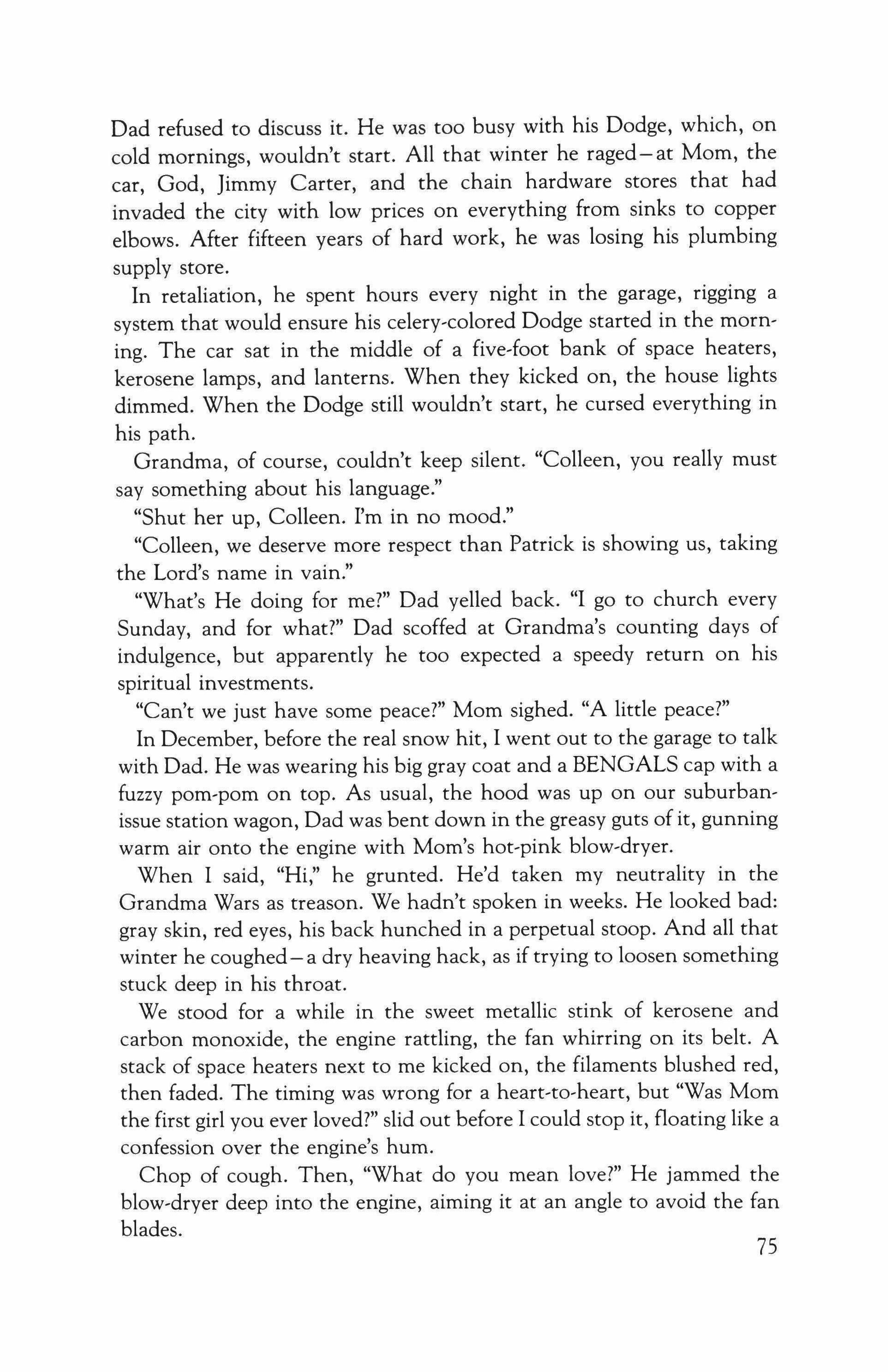
Dad refused to discuss it. He was too busy with his Dodge, which, on cold mornings, wouldn't start. All that winter he raged - at Mom, the car, God, Jimmy Carter, and the chain hardware stores that had invaded the city with low prices on everything from sinks to copper elbows. After fifteen years of hard work, he was losing his plumbing supply store.
In retaliation, he spent hours every night in the garage, rigging a system that would ensure his celery-colored Dodge started in the morning. The car sat in the middle of a five-foot bank of space heaters, kerosene lamps, and lanterns. When they kicked on, the house lights dimmed. When the Dodge still wouldn't start, he cursed everything in his path.
Grandma, of course, couldn't keep silent. "Colleen, you really must say something about his language."
"Shut her up, Colleen. I'm in no mood."
"Colleen, we deserve more respect than Patrick is showing us, taking the Lord's name in vain."
"What's He doing for me?" Dad yelled back. "I go to church every Sunday, and for what?" Dad scoffed at Grandma's counting days of indulgence, but apparently he too expected a speedy return on his spiritual investments.
"Can't we just have some peace?" Mom sighed. "A little peace?"
In December, before the real snow hit, I went out to the garage to talk with Dad. He was wearing his big gray coat and a BENGALS cap with a fuzzy porn-porn on top. As usual, the hood was up on our suburbanissue station wagon, Dad was bent down in the greasy guts of it, gunning warm air onto the engine with Mom's hot-pink blow-dryer.
When I said, "Hi," he grunted. He'd taken my neutrality in the Grandma Wars as treason. We hadn't spoken in weeks. He looked bad: gray skin, red eyes, his back hunched in a perpetual stoop. And all that winter he coughed - a dry heaving hack, as if trying to loosen something stuck deep in his throat.
We stood for a while in the sweet metallic stink of kerosene and carbon monoxide, the engine rattling, the fan whirring on its belt. A stack of space heaters next to me kicked on, the filaments blushed red, then faded. The timing was wrong for a heart-to-heart, but "Was Mom the first girl you ever loved?" slid out before I could stop it, floating like a confession over the engine's hum.
Chop of cough. Then, "What do you mean love?" He jammed the blow-dryer deep into the engine, aiming it at an angle to avoid the fan blades.
75
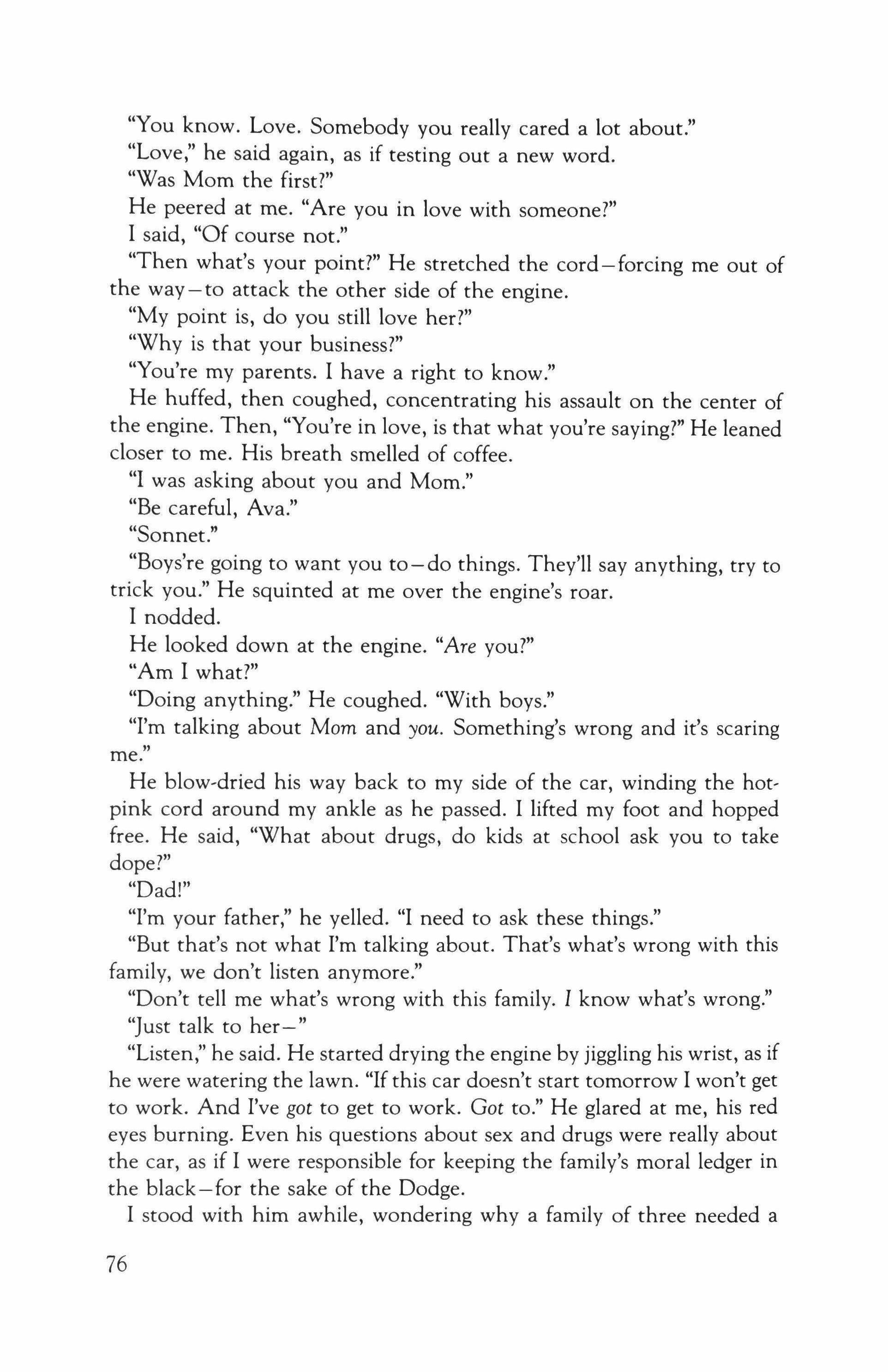
"You know. Love. Somebody you really cared a lot about."
"Love," he said again, as if testing out a new word.
"Was Mom the first?"
He peered at me. "Are you in love with someone?"
I said, "Of course not."
"Then what's your point?" He stretched the cord-forcing me out of the way-to attack the other side of the engine.
"My point is, do you still love her?"
"Why is that your business?"
"You're my parents. I have a right to know."
He huffed, then coughed, concentrating his assault on the center of the engine. Then, "You're in love, is that what you're saying?" He leaned closer to me. His breath smelled of coffee.
"I was asking about you and Mom."
"Be careful, Ava."
"Sonnet."
"Boys're going to want you to-do things. They'll say anything, try to trick you." He squinted at me over the engine's roar.
I nodded.
He looked down at the engine. "Are you?"
"Am I what?"
"Doing anything." He coughed. "With boys."
"I'm talking about Mom and you. Something's wrong and it's scaring me."
He blow-dried his way back to my side of the car, winding the hot, pink cord around my ankle as he passed. I lifted my foot and hopped free. He said, "What about drugs, do kids at school ask you to take dope?"
"Dad!"
"I'm your father," he yelled. "I need to ask these things."
"But that's not what I'm talking about. That's what's wrong with this family, we don't listen anymore."
"Don't tell me what's wrong with this family. I know what's wrong."
"Just talk to her-"
"Listen," he said. He started drying the engine by jiggling his wrist, as if he were watering the lawn. "If this car doesn't start tomorrow I won't get to work. And I've got to get to work. Got to." He glared at me, his red eyes burning. Even his questions about sex and drugs were really about the car, as if I were responsible for keeping the family's moral ledger in the black-for the sake of the Dodge.
I stood with him awhile, wondering why a family of three needed a
76

goddamn station wagon, anyway. He always said he needed extra room for hauling plumbing supplies, but I never saw so much as a lug wrench back there. It was his way, I think, of making room for the rest of the family, for his stillborn boys, for the earful of yakking heads he wanted to have, for ball bats crusty with the yellow dust of little-league infields.
"Good luck," I said, leaving him. He coughed at the engine.
Finally, I went to Grandma. I had nowhere else to go. Anna and Lisa hadn't spoken to me since I'd abandoned them for Davis. And other than two blue baby brothers, I had no siblings. In a neighborhood lousy with Catholics, I was the only only child.
Grandma sat in her wheelchair by a small writing table, cranking away on that antique adding machine. Rolls of paper, like party streamers, dangled off the table and coiled at her feet. A thin veil of smoke hung in the air, floating from a gold incense burner. The faces of saints gazed at me-sad, suffering faces. From somewhere, organ music played.
"Five hundred fifty-four thousand, two hundred and six," she announced when I walked in. She smiled through the smoke, gave the handle of the adding machine a few extra cranks.
I said, "You're really getting up there," and slid onto her bed. I wasn't sure how to begin. I didn't want her to feel guilty about staying with us. She was always offering to go live in a dumpster, or to earn her keep by shoveling the driveway, re-roofing the house, something like that.
"Do you pray your cards, Ava?" she asked.
"Sonnet. Yes, ma'am."
"Every night?"
"Every night."
"How many days have you got?"
"I don't keep score."
"If you want to use it," she said, jabbing a thumb at her adding machine, "you know you're welcome."
"I need to talk to you about Mom."
"Ava, did I ever tell you about Cardinal Philippe Visconti?"
"Sonnet. And about Mom. I'm really worried."
"A little tired maybe. That's all."
"She seems more than just tired."
"Let me tell you about Cardinal Visconti, Ava. There's an important lesson to the story."
"Sonnet. I think Mom is having some kind of breakdown."
"That's what happened to Cardinal Visconti."
"If we don't do something, she's going to get sick. Really sick."
77
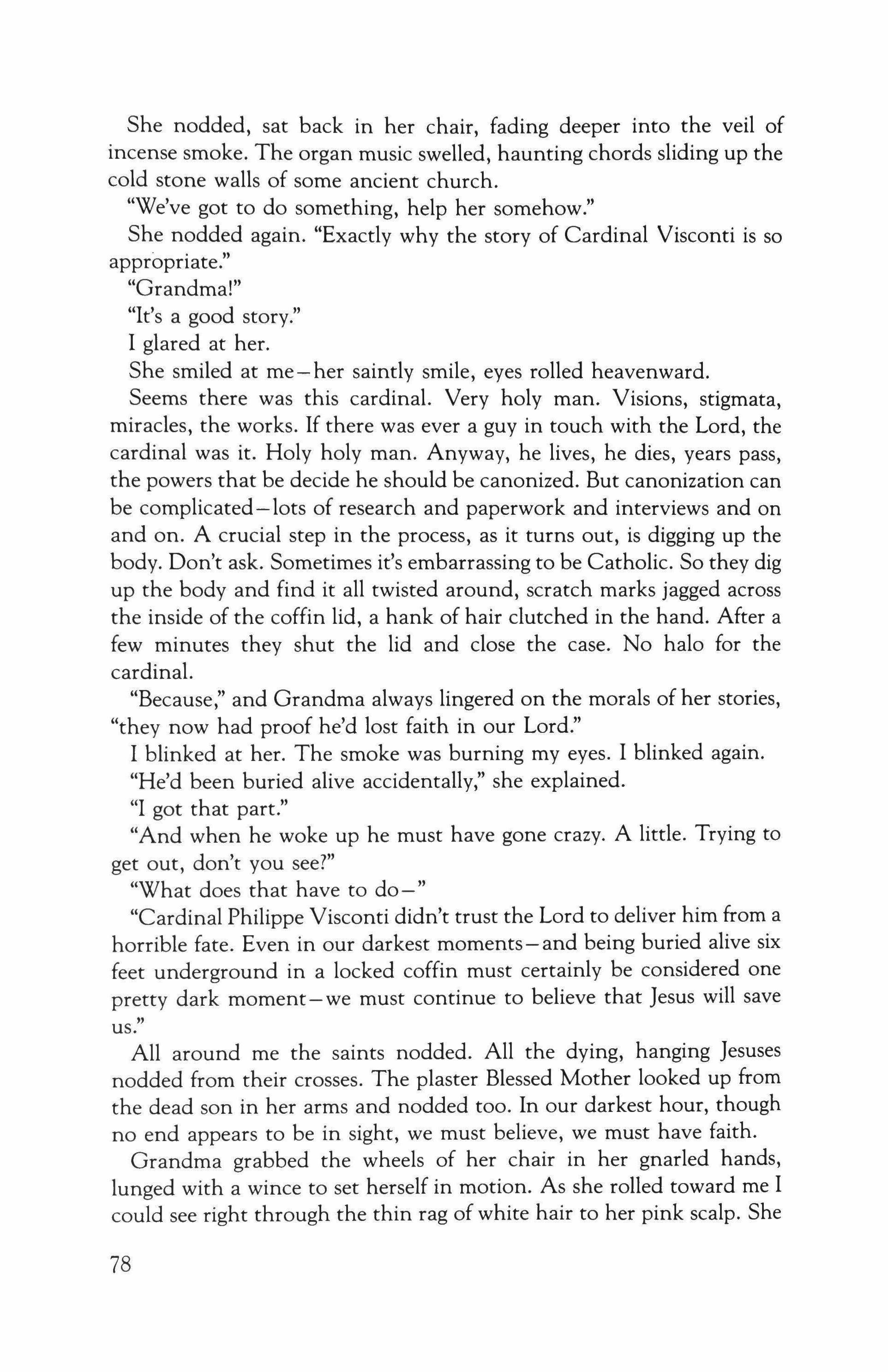
She nodded, sat back in her chair, fading deeper into the veil of incense smoke. The organ music swelled, haunting chords sliding up the cold stone walls of some ancient church.
"We've got to do something, help her somehow."
She nodded again. "Exactly why the story of Cardinal Visconti is so appropriate."
"Grandma!"
"It's a good story."
I glared at her.
She smiled at me-her saintly smile, eyes rolled heavenward.
Seems there was this cardinal. Very holy man. Visions, stigmata, miracles, the works. If there was ever a guy in touch with the Lord, the cardinal was it. Holy holy man. Anyway, he lives, he dies, years pass, the powers that be decide he should be canonized. But canonization can be complicated-lots of research and paperwork and interviews and on and on. A crucial step in the process, as it turns out, is digging up the body. Don't ask. Sometimes it's embarrassing to be Catholic. So they dig up the body and find it all twisted around, scratch marks jagged across the inside of the coffin lid, a hank of hair clutched in the hand. After a few minutes they shut the lid and close the case. No halo for the cardinal.
"Because," and Grandma always lingered on the morals of her stories, "they now had proof he'd lost faith in our Lord."
I blinked at her. The smoke was burning my eyes. I blinked again.
"He'd been buried alive accidentally," she explained.
"I got that part."
"And when he woke up he must have gone crazy. A little. Trying to get out, don't you see?"
"What does that have to do-"
"Cardinal Philippe Visconti didn't trust the Lord to deliver him from a horrible fate. Even in our darkest moments-and being buried alive six feet underground in a locked coffin must certainly be considered one pretty dark moment - we must continue to believe that Jesus will save us."
All around me the saints nodded. All the dying, hanging jesuses nodded from their crosses. The plaster Blessed Mother looked up from the dead son in her arms and nodded too. In our darkest hour, though no end appears to be in sight, we must believe, we must have faith.
Grandma grabbed the wheels of her chair in her gnarled hands, lunged with a wince to set herself in motion. As she rolled toward me I could see right through the thin rag of white hair to her pink scalp. She
78
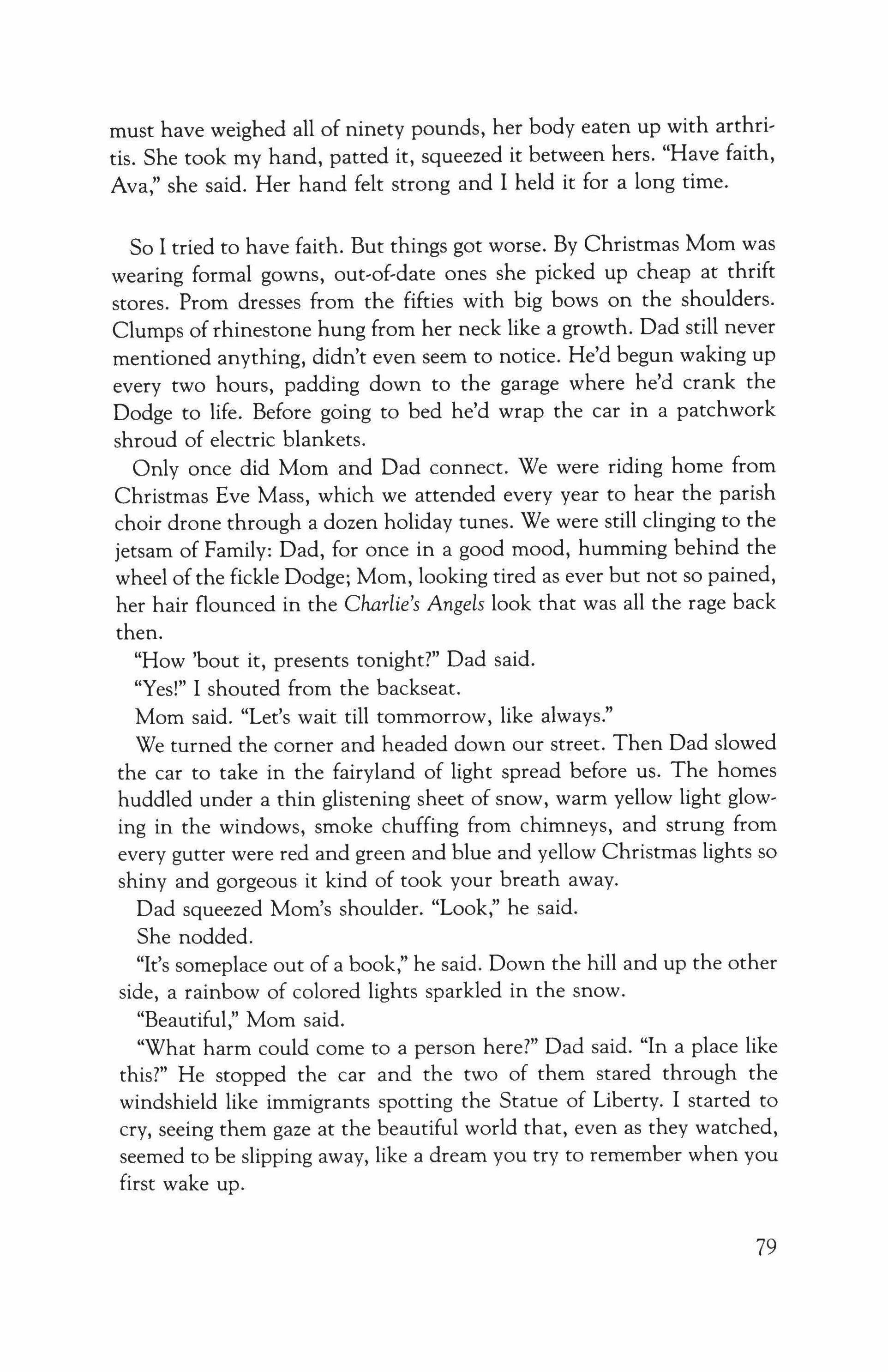
must have weighed all of ninety pounds, her body eaten up with arthritis. She took my hand, patted it, squeezed it between hers. "Have faith, Ava," she said. Her hand felt strong and I held it for a long time.
So I tried to have faith. But things got worse. By Christmas Mom was wearing formal gowns, out-of-date ones she picked up cheap at thrift stores. Prom dresses from the fifties with big bows on the shoulders. Clumps of rhinestone hung from her neck like a growth. Dad still never mentioned anything, didn't even seem to notice. He'd begun waking up every two hours, padding down to the garage where he'd crank the Dodge to life. Before going to bed he'd wrap the car in a patchwork shroud of electric blankets.
Only once did Mom and Dad connect. We were riding home from Christmas Eve Mass, which we attended every year to hear the parish choir drone through a dozen holiday tunes. We were still clinging to the jetsam of Family: Dad, for once in a good mood, humming behind the wheel of the fickle Dodge; Mom, looking tired as ever but not so pained, her hair flounced in the Charlie's Angels look that was all the rage back then.
"How 'bout it, presents tonight?" Dad said. "Yes!" I shouted from the backseat.
Mom said. "Let's wait till tommorrow, like always."
We turned the corner and headed down our street. Then Dad slowed the car to take in the fairyland of light spread before us. The homes huddled under a thin glistening sheet of snow, warm yellow light glowing in the windows, smoke chuffing from chimneys, and strung from every gutter were red and green and blue and yellow Christmas lights so shiny and gorgeous it kind of took your breath away.
Dad squeezed Mom's shoulder. "Look," he said.
She nodded.
"It's someplace out of a book," he said. Down the hill and up the other side, a rainbow of colored lights sparkled in the snow.
"Beautiful," Mom said.
"What harm could come to a person here?" Dad said. "In a place like this?" He stopped the car and the two of them stared through the windshield like immigrants spotting the Statue of Liberty. I started to cry, seeing them gaze at the beautiful world that, even as they watched, seemed to be slipping away, like a dream you try to remember when you first wake up.
79
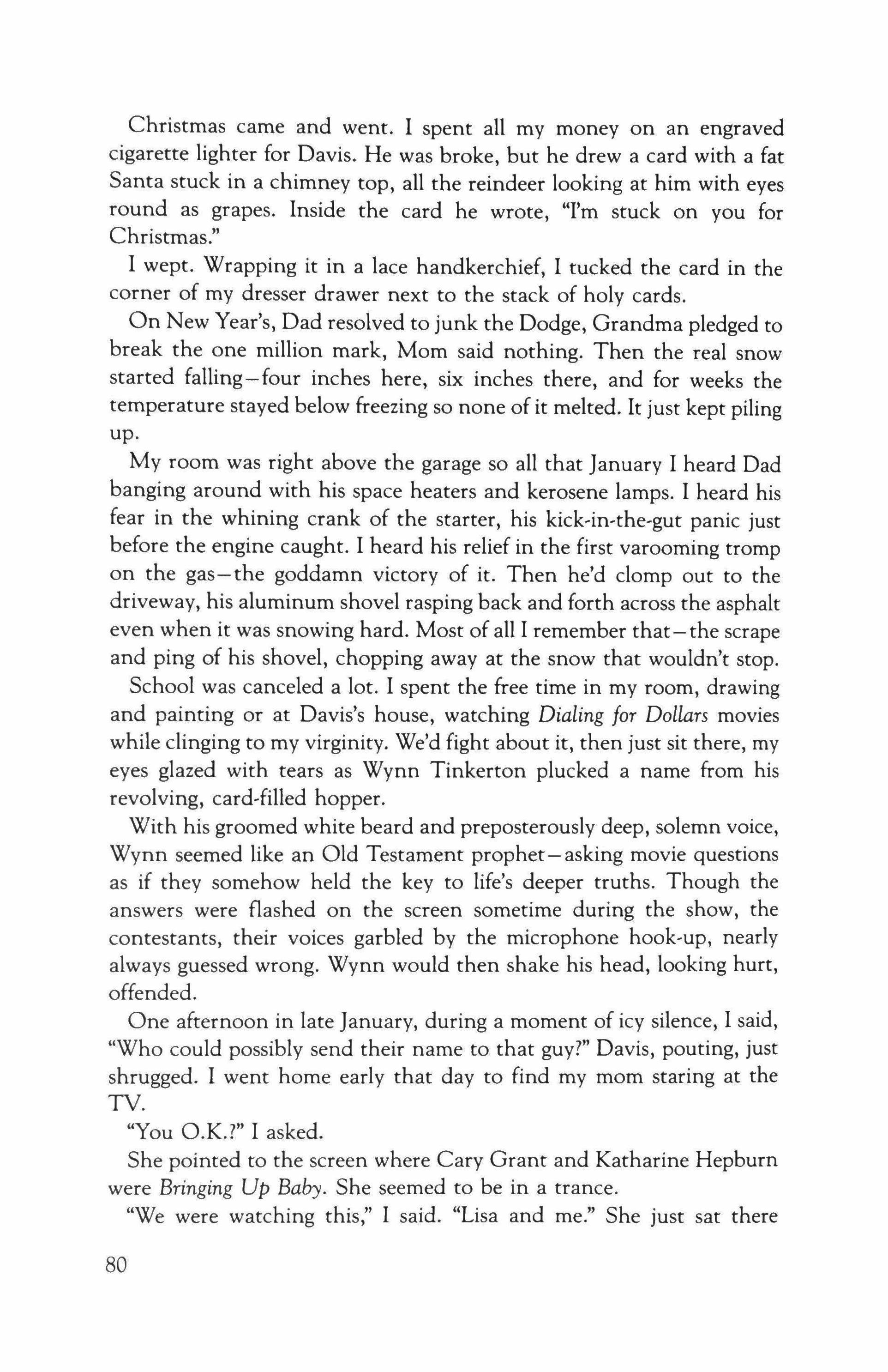
Christmas came and went. I spent all my money on an engraved cigarette lighter for Davis. He was broke, but he drew a card with a fat Santa stuck in a chimney top, all the reindeer looking at him with eyes round as grapes. Inside the card he wrote, "I'm stuck on you for Christmas."
I wept. Wrapping it in a lace handkerchief, I tucked the card in the corner of my dresser drawer next to the stack of holy cards.
On New Year's, Dad resolved to junk the Dodge, Grandma pledged to break the one million mark, Mom said nothing. Then the real snow started falling-four inches here, six inches there, and for weeks the temperature stayed below freezing so none of it melted. It just kept piling up.
My room was right above the garage so all that January I heard Dad banging around with his space heaters and kerosene lamps. I heard his fear in the whining crank of the starter, his kick-in-the-gut panic just before the engine caught. I heard his relief in the first varooming tromp on the gas-the goddamn victory of it. Then he'd clomp out to the driveway, his aluminum shovel rasping back and forth across the asphalt even when it was snowing hard. Most of all I remember that-the scrape and ping of his shovel, chopping away at the snow that wouldn't stop.
School was canceled a lot. I spent the free time in my room, drawing and painting or at Davis's house, watching Dialing for Dollars movies while clinging to my virginity. We'd fight about it, then just sit there, my eyes glazed with tears as Wynn Tinkerton plucked a name from his revolving, card-filled hopper.
With his groomed white beard and preposterously deep, solemn voice, Wynn seemed like an Old Testament prophet-asking movie questions as if they somehow held the key to life's deeper truths. Though the answers were flashed on the screen sometime during the show, the contestants, their voices garbled by the microphone hook-up, nearly always guessed wrong. Wynn would then shake his head, looking hurt, offended.
One afternoon in late January, during a moment of icy silence, I said, "Who could possibly send their name to that guy?" Davis, pouting, just shrugged. I went home early that day to find my mom staring at the TV.
"You O.K.?" I asked.
She pointed to the screen where Cary Grant and Katharine Hepburn were Bringing Up Baby. She seemed to be in a trance.
"We were watching this," I said. "Lisa and me." She just sat there
80
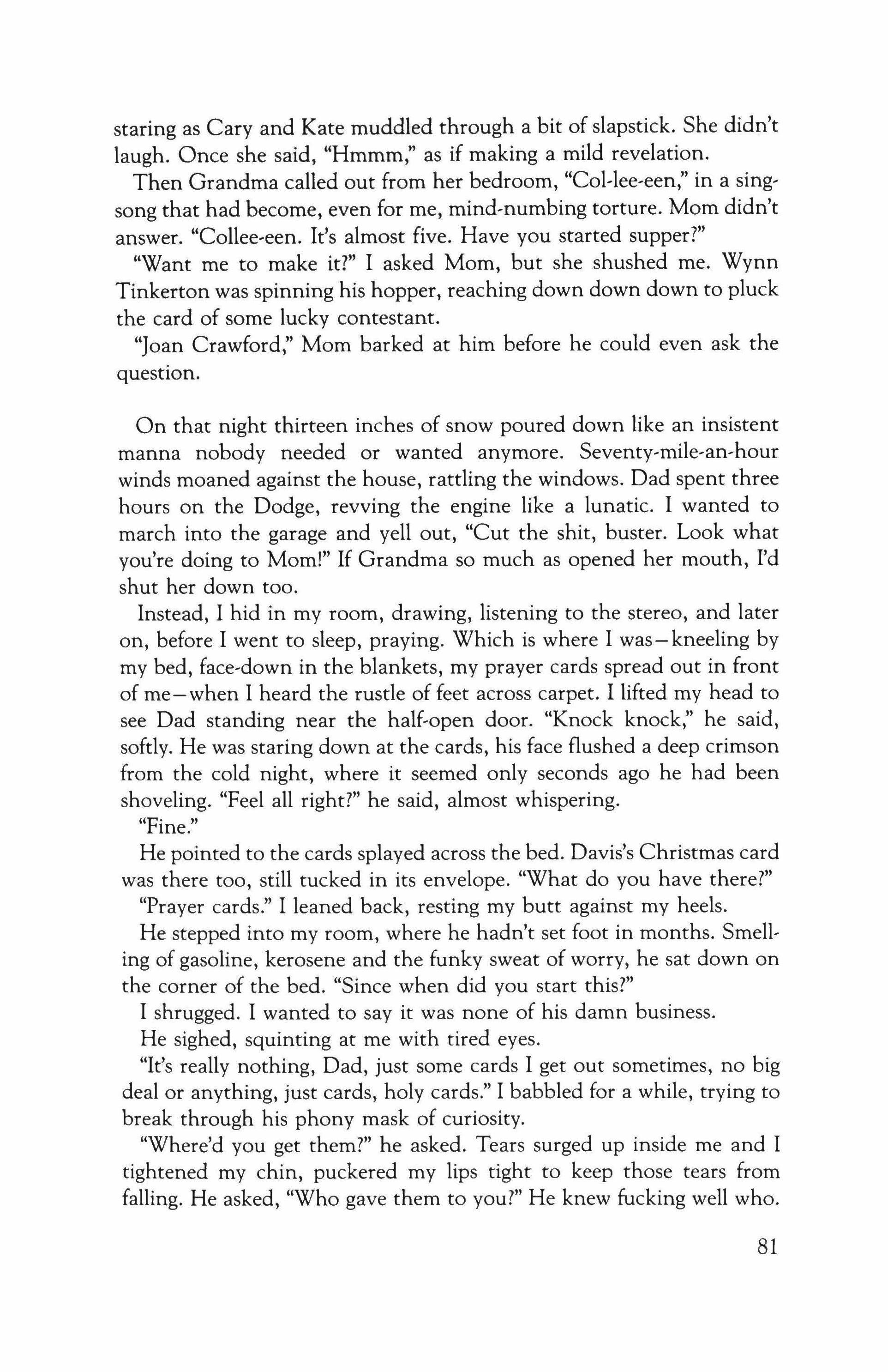
staring as Cary and Kate muddled through a bit of slapstick. She didn't laugh. Once she said, "Hmmm," as if making a mild revelation.
Then Grandma called out from her bedroom, "Col-lee-een," in a singsong that had become, even for me, mind-numbing torture. Mom didn't answer. "Collee-een. It's almost five. Have you started supper?"
"Want me to make it?" I asked Mom, but she shushed me. Wynn Tinkerton was spinning his hopper, reaching down down down to pluck the card of some lucky contestant.
"Joan Crawford," Mom barked at him before he could even ask the question.
On that night thirteen inches of snow poured down like an insistent manna nobody needed or wanted anymore. Seventy-mile-an-hour winds moaned against the house, rattling the windows. Dad spent three hours on the Dodge, revving the engine like a lunatic. I wanted to march into the garage and yell out, "Cut the shit, buster. Look what you're doing to Mom!" If Grandma so much as opened her mouth, I'd shut her down too.
Instead, I hid in my room, drawing, listening to the stereo, and later on, before I went to sleep, praying. Which is where I was-kneeling by my bed, face-down in the blankets, my prayer cards spread out in front of me-when I heard the rustle of feet across carpet. I lifted my head to see Dad standing near the half-open door. "Knock knock," he said, softly. He was staring down at the cards, his face flushed a deep crimson from the cold night, where it seemed only seconds ago he had been shoveling. "Feel all right?" he said, almost whispering. "Fine."
He pointed to the cards splayed across the bed. Davis's Christmas card was there too, still tucked in its envelope. "What do you have there?"
"Prayer cards." I leaned back, resting my butt against my heels.
He stepped into my room, where he hadn't set foot in months. Smelling of gasoline, kerosene and the funky sweat of worry, he sat down on the corner of the bed. "Since when did you start this?"
I shrugged. I wanted to say it was none of his damn business.
He sighed, squinting at me with tired eyes.
"It's really nothing, Dad, just some cards I get out sometimes, no big deal or anything, just cards, holy cards." I babbled for a while, trying to break through his phony mask of curiosity.
"Where'd you get them?" he asked. Tears surged up inside me and I tightened my chin, puckered my lips tight to keep those tears from falling. He asked, "Who gave them to you?" He knew fucking well who.
81
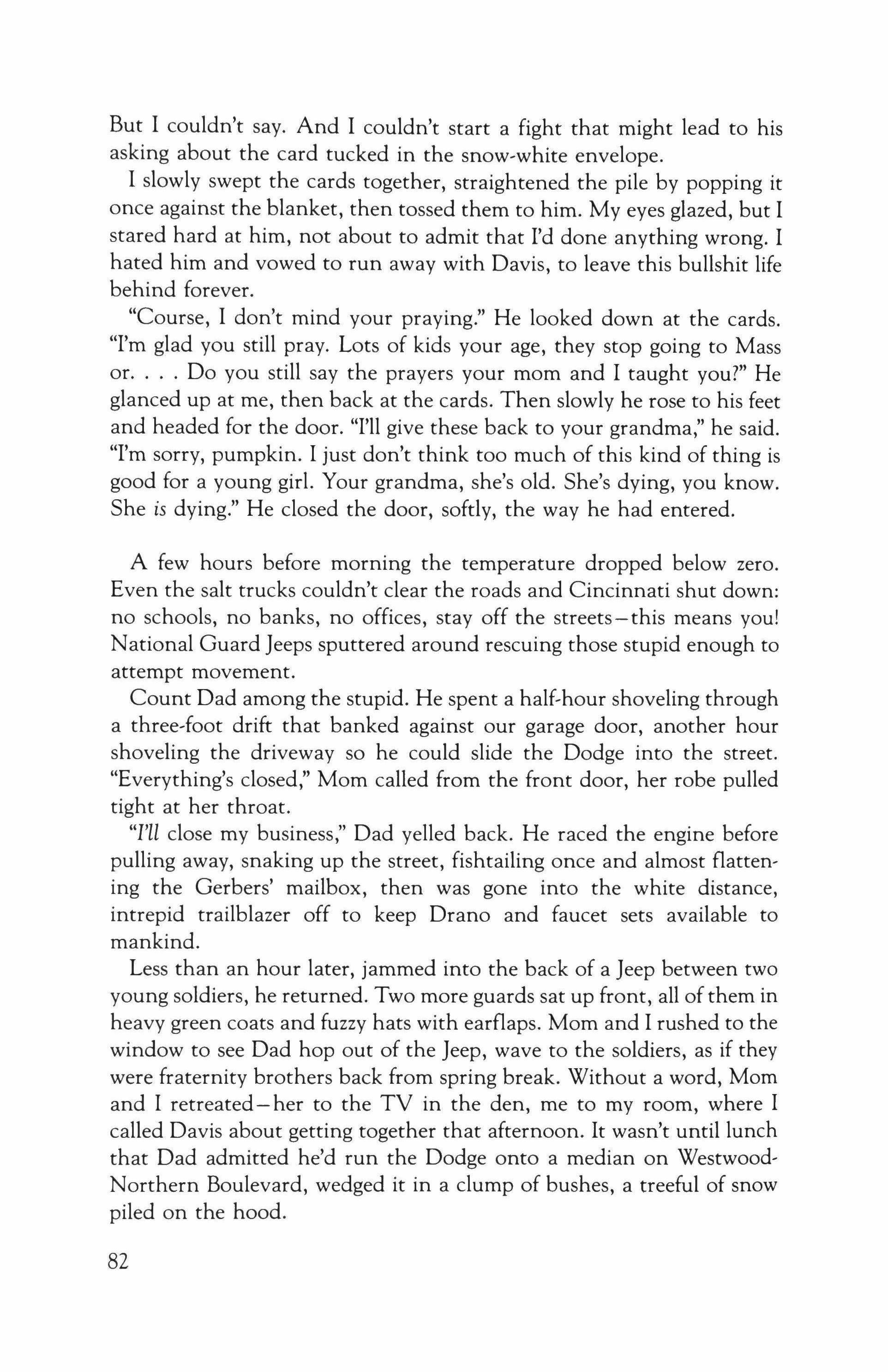
But I couldn't say. And I couldn't start a fight that might lead to his asking about the card tucked in the snow-white envelope.
I slowly swept the cards together, straightened the pile by popping it once against the blanket, then tossed them to him. My eyes glazed, but I stared hard at him, not about to admit that I'd done anything wrong. I hated him and vowed to run away with Davis, to leave this bullshit life behind forever.
"Course, I don't mind your praying." He looked down at the cards. "I'm glad you still pray. Lots of kids your age, they stop going to Mass or Do you still say the prayers your mom and I taught you?" He glanced up at me, then back at the cards. Then slowly he rose to his feet and headed for the door. "I'll give these back to your grandma," he said. "I'm sorry, pumpkin. I just don't think too much of this kind of thing is good for a young girl. Your grandma, she's old. She's dying, you know. She is dying." He closed the door, softly, the way he had entered.
A few hours before morning the temperature dropped below zero. Even the salt trucks couldn't clear the roads and Cincinnati shut down: no schools, no banks, no offices, stay off the streets-this means you! National Guard Jeeps sputtered around rescuing those stupid enough to attempt movement.
Count Dad among the stupid. He spent a half-hour shoveling through a three,foot drift that banked against our garage door, another hour shoveling the driveway so he could slide the Dodge into the street. "Everything's closed," Mom called from the front door, her robe pulled tight at her throat.
"I'll close my business," Dad yelled back. He raced the engine before pulling away, snaking up the street, fishtailing once and almost flatten, ing the Gerbers' mailbox, then was gone into the white distance, intrepid trailblazer off to keep Drano and faucet sets available to mankind.
Less than an hour later, jammed into the back of a Jeep between two young soldiers, he returned. Two more guards sat up front, all ofthem in heavy green coats and fuzzy hats with earflaps. Mom and I rushed to the window to see Dad hop out of the Jeep, wave to the soldiers, as if they were fraternity brothers back from spring break. Without a word, Mom and I retreated - her to the TV in the den, me to my room, where I called Davis about getting together that afternoon. It wasn't until lunch that Dad admitted he'd run the Dodge onto a median on Westwood, Northern Boulevard, wedged it in a clump of bushes, a treeful of snow piled on the hood.
82
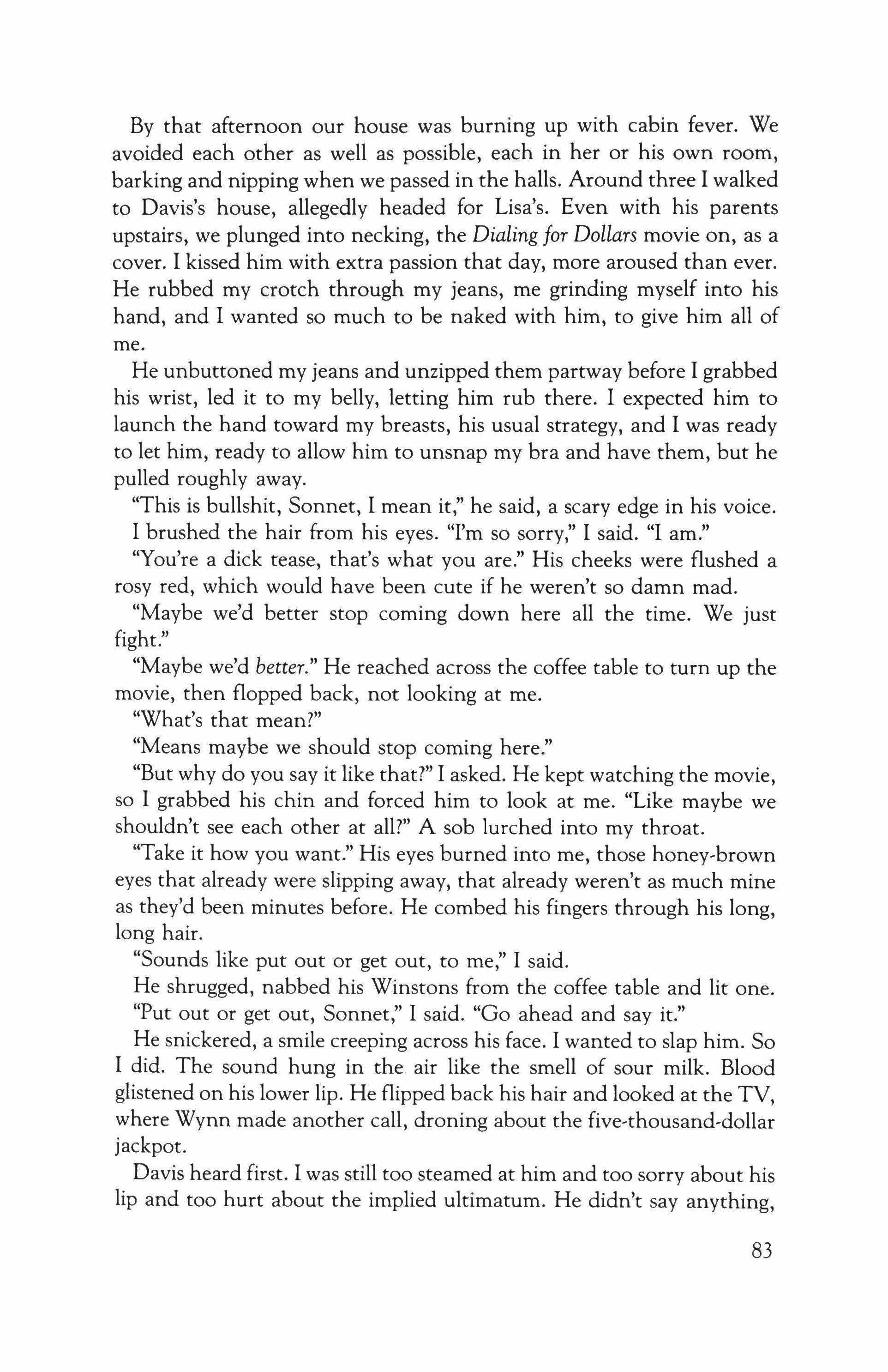
By that afternoon our house was burning up with cabin fever. We avoided each other as well as possible, each in her or his own room, barking and nipping when we passed in the halls. Around three 1 walked to Davis's house, allegedly headed for Lisa's. Even with his parents upstairs, we plunged into necking, the Dialing for Dollars movie on, as a cover. 1 kissed him with extra passion that day, more aroused than ever. He rubbed my crotch through my jeans, me grinding myself into his hand, and 1 wanted so much to be naked with him, to give him all of me.
He unbuttoned my jeans and unzipped them partway before 1 grabbed his wrist, led it to my belly, letting him rub there. 1 expected him to launch the hand toward my breasts, his usual strategy, and 1 was ready to let him, ready to allow him to unsnap my bra and have them, but he pulled roughly away.
"This is bullshit, Sonnet, 1 mean it," he said, a scary edge in his voice. 1 brushed the hair from his eyes. "I'm so sorry," 1 said. "1 am."
"You're a dick tease, that's what you are." His cheeks were flushed a rosy red, which would have been cute if he weren't so damn mad.
"Maybe we'd better stop coming down here all the time. We just fight."
"Maybe we'd better." He reached across the coffee table to turn up the movie, then flopped back, not looking at me.
"What's that mean?"
"Means maybe we should stop coming here."
"But why do you say it like that?" 1 asked. He kept watching the movie, so 1 grabbed his chin and forced him to look at me. "Like maybe we shouldn't see each other at all?" A sob lurched into my throat.
"Take it how you want." His eyes burned into me, those honey-brown eyes that already were slipping away, that already weren't as much mine as they'd been minutes before. He combed his fingers through his long, long hair.
"Sounds like put out or get out, to me," I said.
He shrugged, nabbed his Winstons from the coffee table and lit one.
"Put out or get out, Sonnet," 1 said. "Go ahead and say it."
He snickered, a smile creeping across his face. 1 wanted to slap him. So 1 did. The sound hung in the air like the smell of sour milk. Blood glistened on his lower lip. He flipped back his hair and looked at the TV, where Wynn made another call, droning about the five-thousand-dollar jackpot.
Davis heard first. 1 was still too steamed at him and too sorry about his lip and too hurt about the implied ultimatum. He didn't say anything,
83
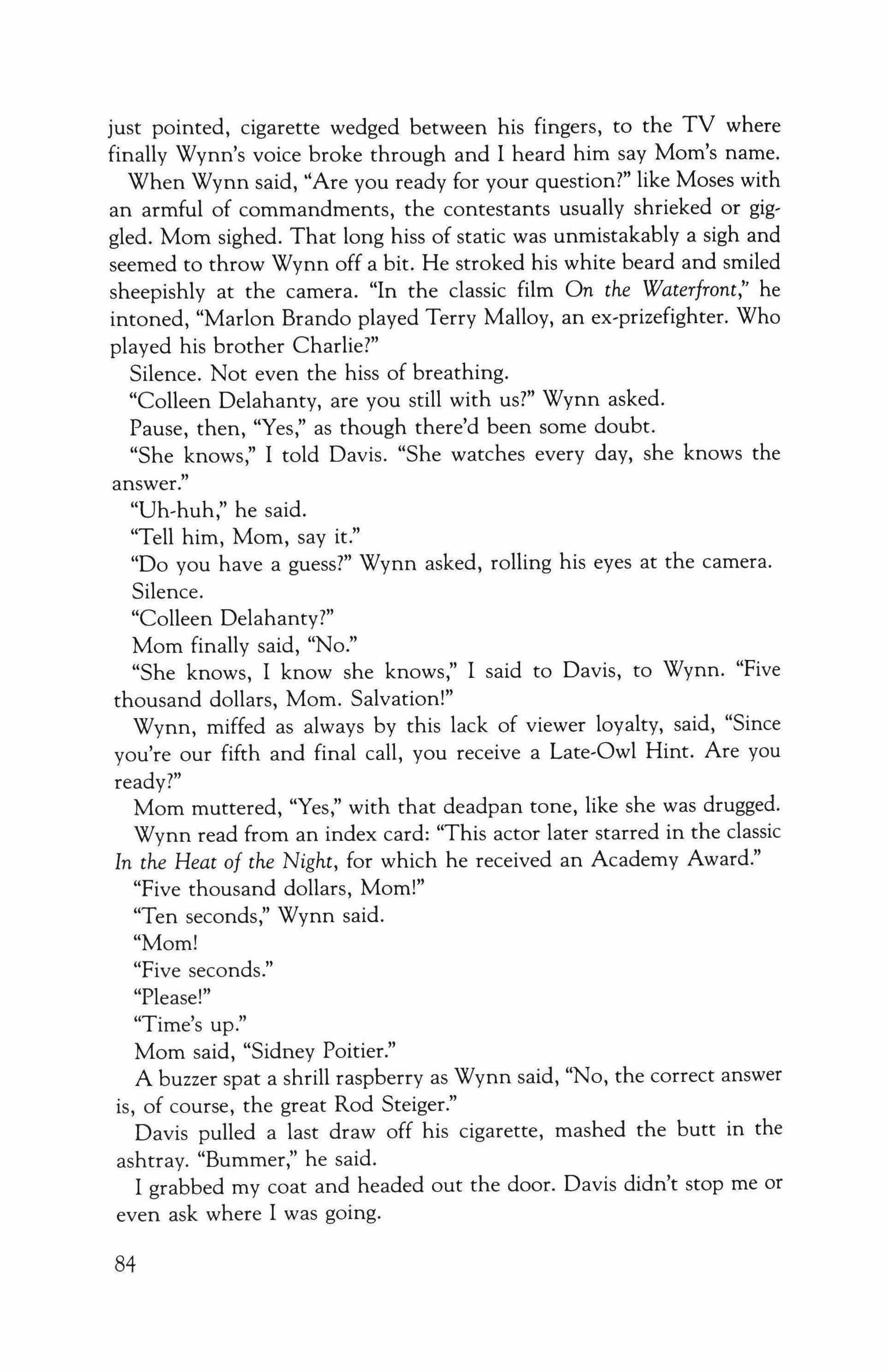
just pointed, cigarette wedged between his fingers, to the TV where finally Wynn's voice broke through and I heard him say Mom's name.
When Wynn said, "Are you ready for your question?" like Moses with an armful of commandments, the contestants usually shrieked or giggled. Mom sighed. That long hiss of static was unmistakably a sigh and seemed to throw Wynn off a bit. He stroked his white beard and smiled sheepishly at the camera. "In the classic film On the Waterfront," he intoned, "Marlon Brando played Terry Malloy, an ex-prizefighter. Who played his brother Charlie?"
Silence. Not even the hiss of breathing.
"Colleen Delahanty, are you still with us?" Wynn asked.
Pause, then, "Yes," as though there'd been some doubt.
"She knows," I told Davis. "She watches every day, she knows the answer."
"Uh-huh," he said.
"Tell him, Mom, say it."
"Do you have a guess?" Wynn asked, rolling his eyes at the camera. Silence.
"Colleen Delahanty?"
Mom finally said, "No."
"She knows, I know she knows," I said to Davis, to Wynn. "Five thousand dollars, Mom. Salvation!"
Wynn, miffed as always by this lack of viewer loyalty, said, "Since you're our fifth and final call, you receive a Late-Owl Hint. Are you ready?"
Mom muttered, "Yes," with that deadpan tone, like she was drugged. Wynn read from an index card: "This actor later starred in the classic In the Heat of the Night, for which he received an Academy Award."
"Five thousand dollars, Mom!"
"Ten seconds," Wynn said.
"Mom!
"Five seconds."
"Please!"
"Time's up."
Mom said, "Sidney Poitier."
A buzzer spat a shrill raspberry as Wynn said, "No, the correct answer is, of course, the great Rod Steiger."
Davis pulled a last draw off his cigarette, mashed the butt in the ashtray. "Bummer," he said.
I grabbed my coat and headed out the door. Davis didn't stop me or even ask where I was going.
84
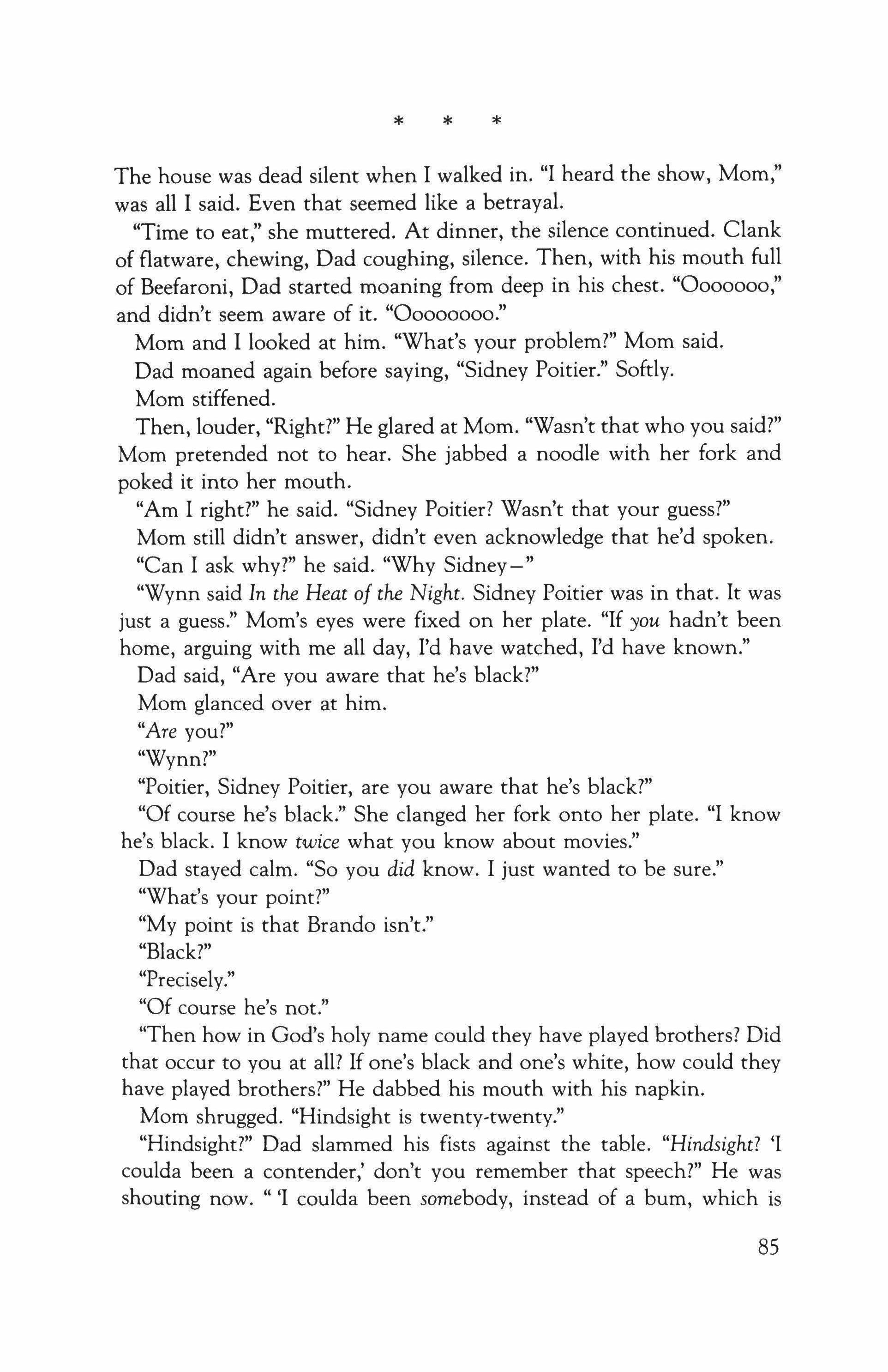
The house was dead silent when I walked in. "I heard the show, Mom," was all I said. Even that seemed like a betrayal.
"Time to eat," she muttered. At dinner, the silence continued. Clank of flatware, chewing, Dad coughing, silence. Then, with his mouth full of Beefaroni, Dad started moaning from deep in his chest. "0000000;' and didn't seem aware of it. "00000000."
Mom and I looked at him. "What's your problem?" Mom said.
Dad moaned again before saying, "Sidney Poitier." Softly.
Mom stiffened.
Then, louder, "Right?" He glared at Mom. "Wasn't that who you said?"
Mom pretended not to hear. She jabbed a noodle with her fork and poked it into her mouth.
"Am I right?" he said. "Sidney Poitier? Wasn't that your guess?"
Mom still didn't answer, didn't even acknowledge that he'd spoken.
"Can I ask why?" he said. "Why Sidney-"
"Wynn said In the Heat of the Night. Sidney Poitier was in that. It was just a guess." Mom's eyes were fixed on her plate. "If you hadn't been home, arguing with me all day, I'd have watched, I'd have known."
Dad said, "Are you aware that he's black?"
Mom glanced over at him.
"Are you?"
"Wynn?"
"Poitier, Sidney Poitier, are you aware that he's black?"
"Of course he's black." She clanged her fork onto her plate. "I know he's black. I know twice what you know about movies."
Dad stayed calm. "So you did know. I just wanted to be sure."
"What's your point?"
"My point is that Brando isn't."
"Black?"
"Precisely."
"Of course he's not."
"Then how in God's holy name could they have played brothers? Did that occur to you at all? If one's black and one's white, how could they have played brothers?" He dabbed his mouth with his napkin.
Mom shrugged. "Hindsight is twenty-twenty," "Hindsight?" Dad slammed his fists against the table. "Hindsight? 'I coulda been a contender,' don't you remember that speech?" He was shouting now. "'I coulda been somebody, instead of a bum, which is
* * *
85
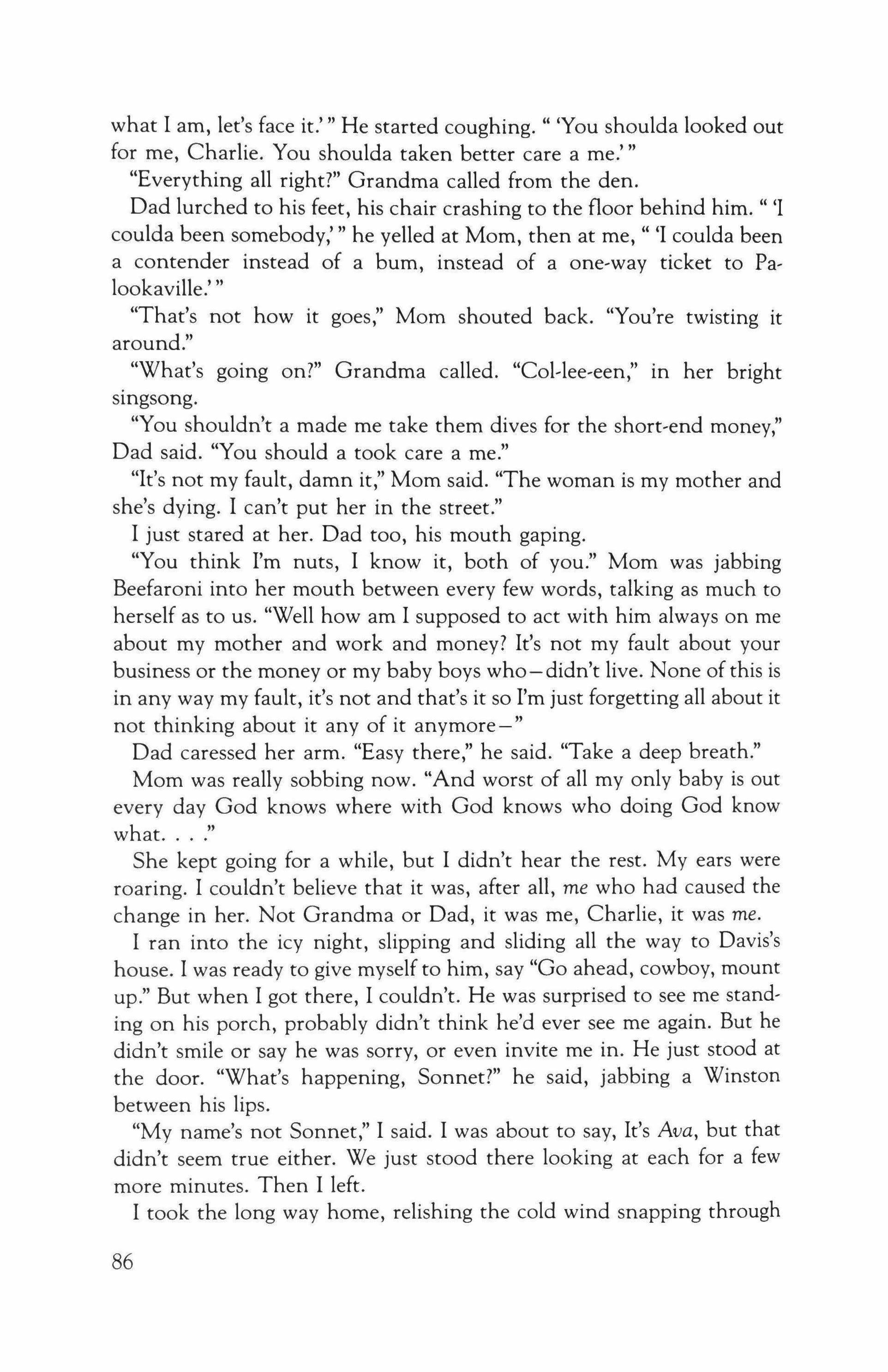
what I am, let's face it.''' He started coughing. 'You shoulda looked out for me, Charlie. You shoulda taken better care a me.'''
"Everything all right?" Grandma called from the den.
Dad lurched to his feet, his chair crashing to the floor behind him. 'I coulda been somebody,' he yelled at Mom, then at me, 'I coulda been a contender instead of a bum, instead of a one-way ticket to Palookaville.'
"That's not how it goes," Mom shouted back. "You're twisting it around."
"What's going on?" Grandma called. "Col-lee-een," in her bright singsong.
"You shouldn't a made me take them dives for the short-end money," Dad said. "You should a took care a me."
"It's not my fault, damn it," Mom said. "The woman is my mother and she's dying. I can't put her in the street."
I just stared at her. Dad too, his mouth gaping.
"You think I'm nuts, I know it, both of you." Mom was jabbing Beefaroni into her mouth between every few words, talking as much to herself as to us. "Well how am I supposed to act with him always on me about my mother and work and money? It's not my fault about your business or the money or my baby boys who-didn't live. None of this is in any way my fault, it's not and that's it so I'm just forgetting all about it not thinking about it any of it anymore-"
Dad caressed her arm. "Easy there," he said. "Take a deep breath."
Mom was really sobbing now. "And worst of all my only baby is out every day God knows where with God knows who doing God know what
She kept going for a while, but I didn't hear the rest. My ears were roaring. I couldn't believe that it was, after all, me who had caused the change in her. Not Grandma or Dad, it was me, Charlie, it was me.
I ran into the icy night, slipping and sliding all the way to Davis's house. I was ready to give myself to him, say "Go ahead, cowboy, mount up." But when I got there, I couldn't. He was surprised to see me standing on his porch, probably didn't think he'd ever see me again. But he didn't smile or say he was sorry, or even invite me in. He just stood at the door. "What's happening, Sonnet?" he said, jabbing a Winston between his lips.
"My name's not Sonnet," I said. I was about to say, It's Ava, but that didn't seem true either. We just stood there looking at each for a few more minutes. Then I left.
I took the long way home, relishing the cold wind snapping through
86

my cheeks. As I passed St. Mike's, the bells rang for benediction. I stopped, freezing in the darkness, white moon alone in the sky. A warm light gleamed blue and gold through the stained-glass windows of the church.
But if I went in I knew what I'd find. There'd be a dozen or so old people spread through the empty pews, their rosary beads clacking and echoing against the hard wooden benches. Like Cardinal Philippe Visconti, I'd given up on all of that: God, love, family. I was going to be an artist, which I then thought would rescue me and grant me eternal salvation.
87
Nosferatu
Jim Shepard
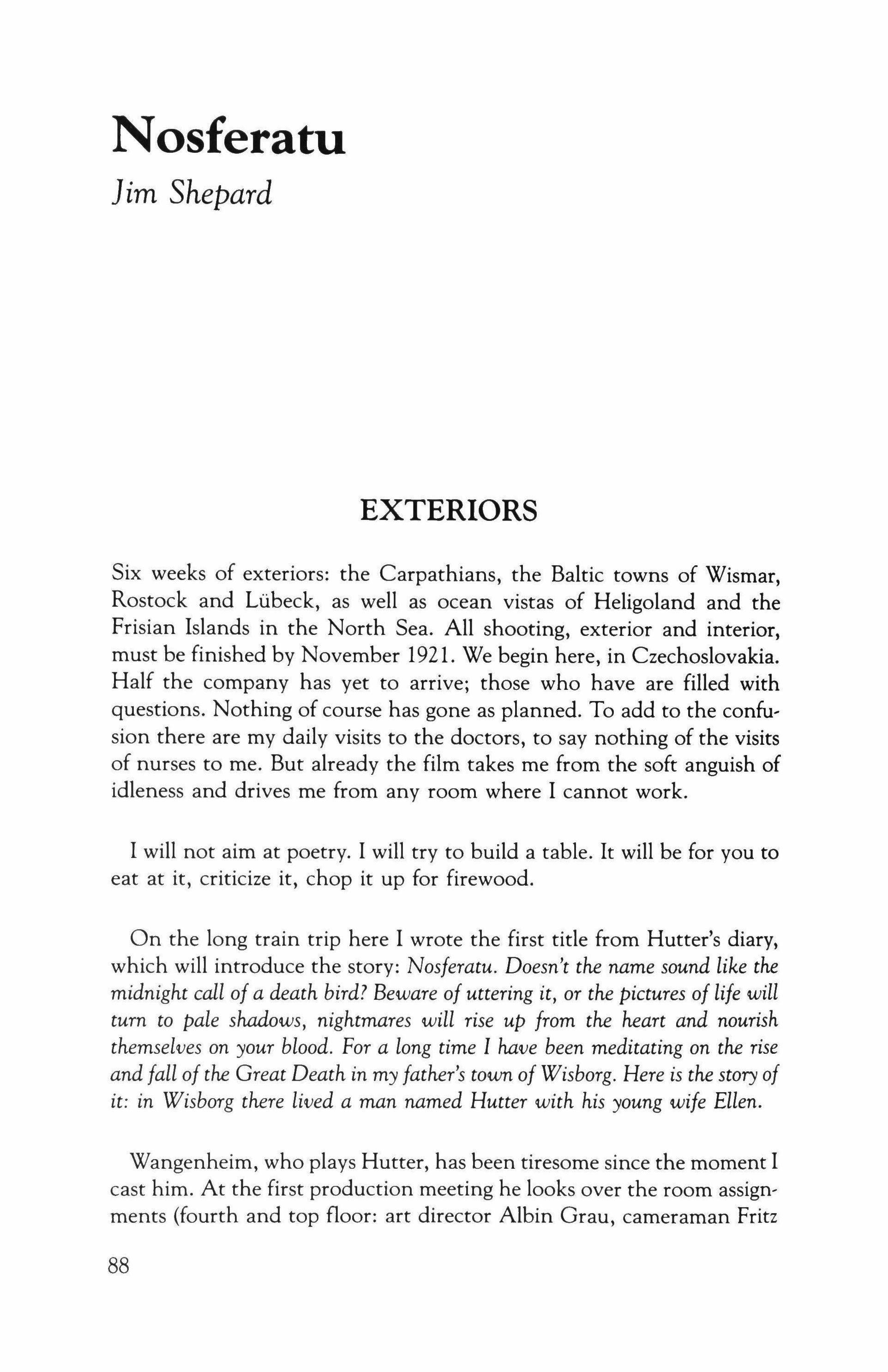
EXTERIORS
Six weeks of exteriors: the Carpathians, the Baltic towns of Wismar, Rostock and Lubeck, as well as ocean vistas of Heligoland and the Frisian Islands in the North Sea. All shooting, exterior and interior, must be finished by November 1921. We begin here, in Czechoslovakia. Half the company has yet to arrive; those who have are filled with questions. Nothing of course has gone as planned. To add to the confusion there are my daily visits to the doctors, to say nothing of the visits of nurses to me. But already the film takes me from the soft anguish of idleness and drives me from any room where I cannot work.
1 will not aim at poetry. 1 will try to build a table. It will be for you to eat at it, criticize it, chop it up for firewood.
On the long train trip here I wrote the first title from Hutter's diary, which will introduce the story: Nosferatu. Doesn't the name sound like the midnight call of a death bird? Beware of uttering it, or the pictures of life will turn to pale shadows, nightmares will rise up from the heart and nourish themselves on your blood. For a long time I have been meditating on the rise and fall of the Great Death in my father's town of Wisborg. Here is the story of it: in Wisborg there lived a man named Hutter with his young wife Ellen.
Wangenheim, who plays Hutter, has been tiresome since the moment 1 cast him. At the first production meeting he looks over the room assignments (fourth and top floor: art director Albin Grau, cameraman Fritz
88
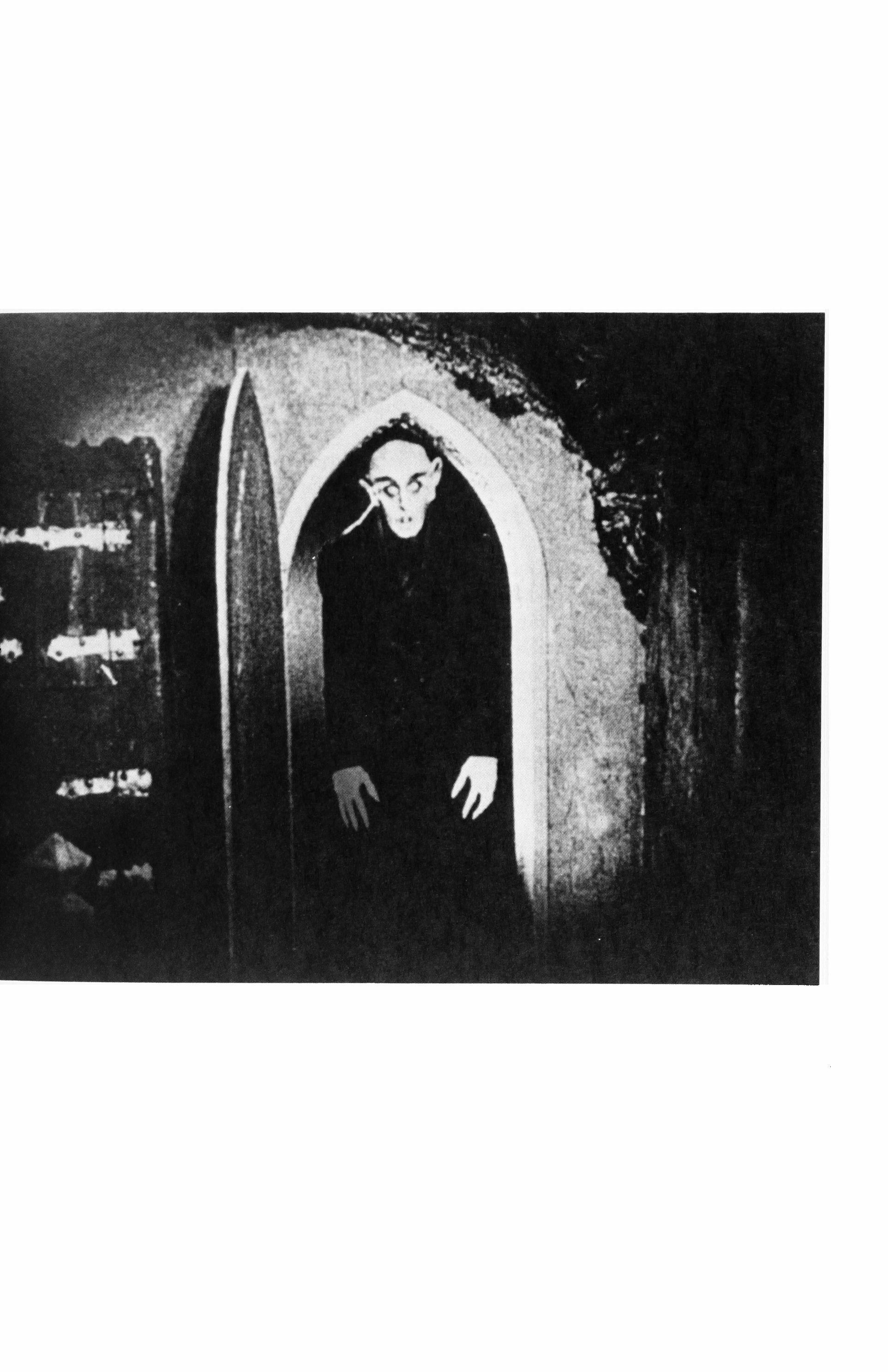
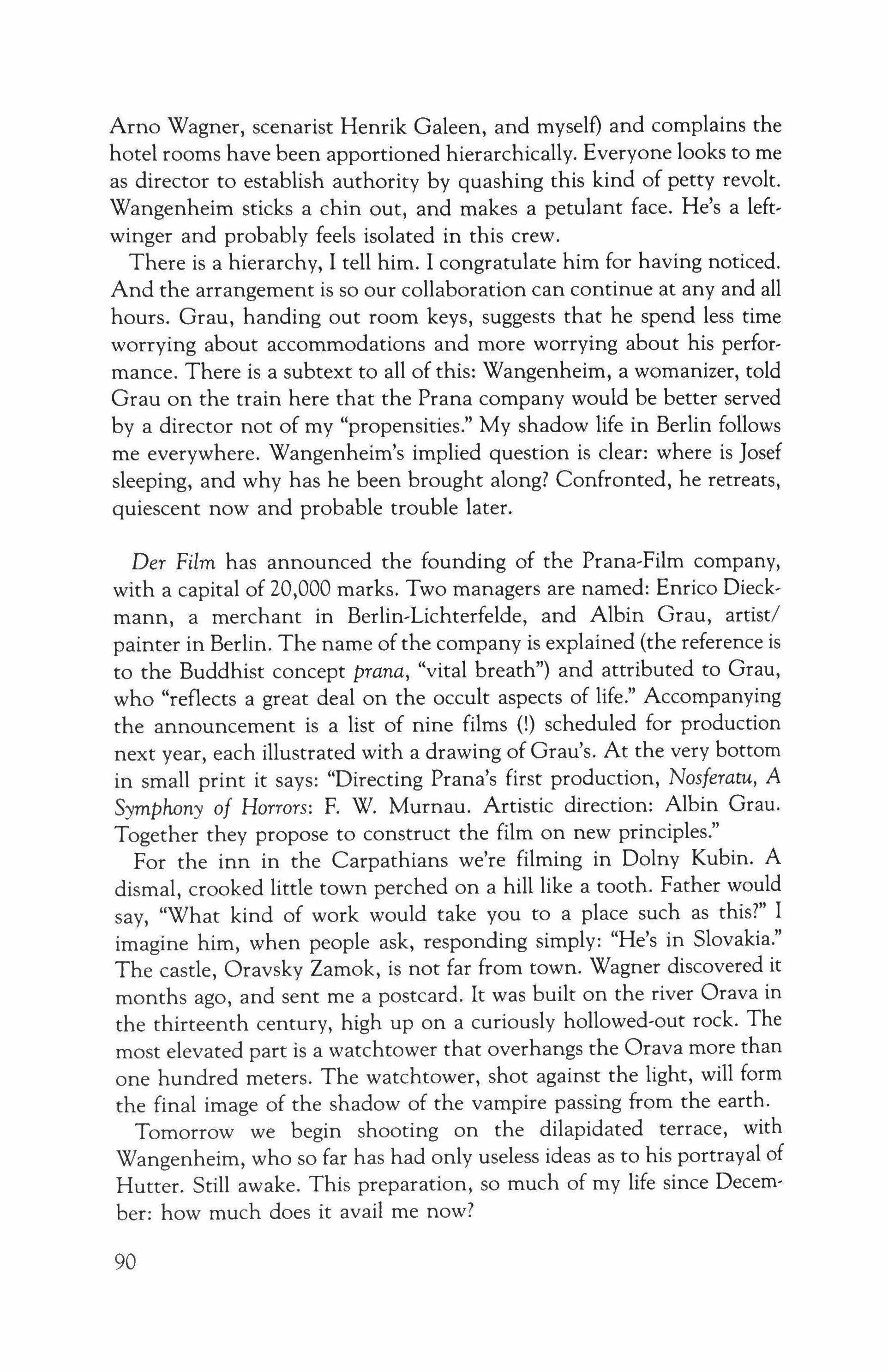
Arno Wagner, scenarist Henrik Galeen, and myself) and complains the hotel rooms have been apportioned hierarchically. Everyone looks to me as director to establish authority by quashing this kind of petty revolt. Wangenheim sticks a chin out, and makes a petulant face. He's a leftwinger and probably feels isolated in this crew.
There is a hierarchy, I tell him. I congratulate him for having noticed. And the arrangement is so our collaboration can continue at any and all hours. Grau, handing out room keys, suggests that he spend less time worrying about accommodations and more worrying about his performance. There is a subtext to all of this: Wangenheim, a womanizer, told Grau on the train here that the Prana company would be better served by a director not of my "propensities." My shadow life in Berlin follows me everywhere. Wangenheim's implied question is clear: where is Josef sleeping, and why has he been brought along? Confronted, he retreats, quiescent now and probable trouble later.
Der Film has announced the founding of the Prana-Film company, with a capital of 20,000 marks. Two managers are named: Enrico Dieckmann, a merchant in Berlin-Lichterfelde, and Albin Grau, artist/ painter in Berlin. The name of the company is explained (the reference is to the Buddhist concept prana, "vital breath") and attributed to Grau, who "reflects a great deal on the occult aspects of life." Accompanying the announcement is a list of nine films (l) scheduled for production next year, each illustrated with a drawing of Grau's. At the very bottom in small print it says: "Directing Prana's first production, Nosferatu, A Symphony of Horrors: F. W. Murnau. Artistic direction: Albin Grau. Together they propose to construct the film on new principles."
For the inn in the Carpathians we're filming in Dolny Kubin. A dismal, crooked little town perched on a hill like a tooth. Father would say, "What kind of work would take you to a place such as this?" I imagine him, when people ask, responding simply: "He's in Slovakia." The castle, Oravsky Zamok, is not far from town. Wagner discovered it months ago, and sent me a postcard. It was built on the river Orava in the thirteenth century, high up on a curiously hollowed-out rock. The most elevated part is a watchtower that overhangs the Orava more than one hundred meters. The watchtower, shot against the light, will form the final image of the shadow of the vampire passing from the earth.
Tomorrow we begin shooting on the dilapidated terrace, with Wangenheim, who so far has had only useless ideas as to his portrayal of Hutter. Still awake. This preparation, so much of my life since December: how much does it avail me now?
90
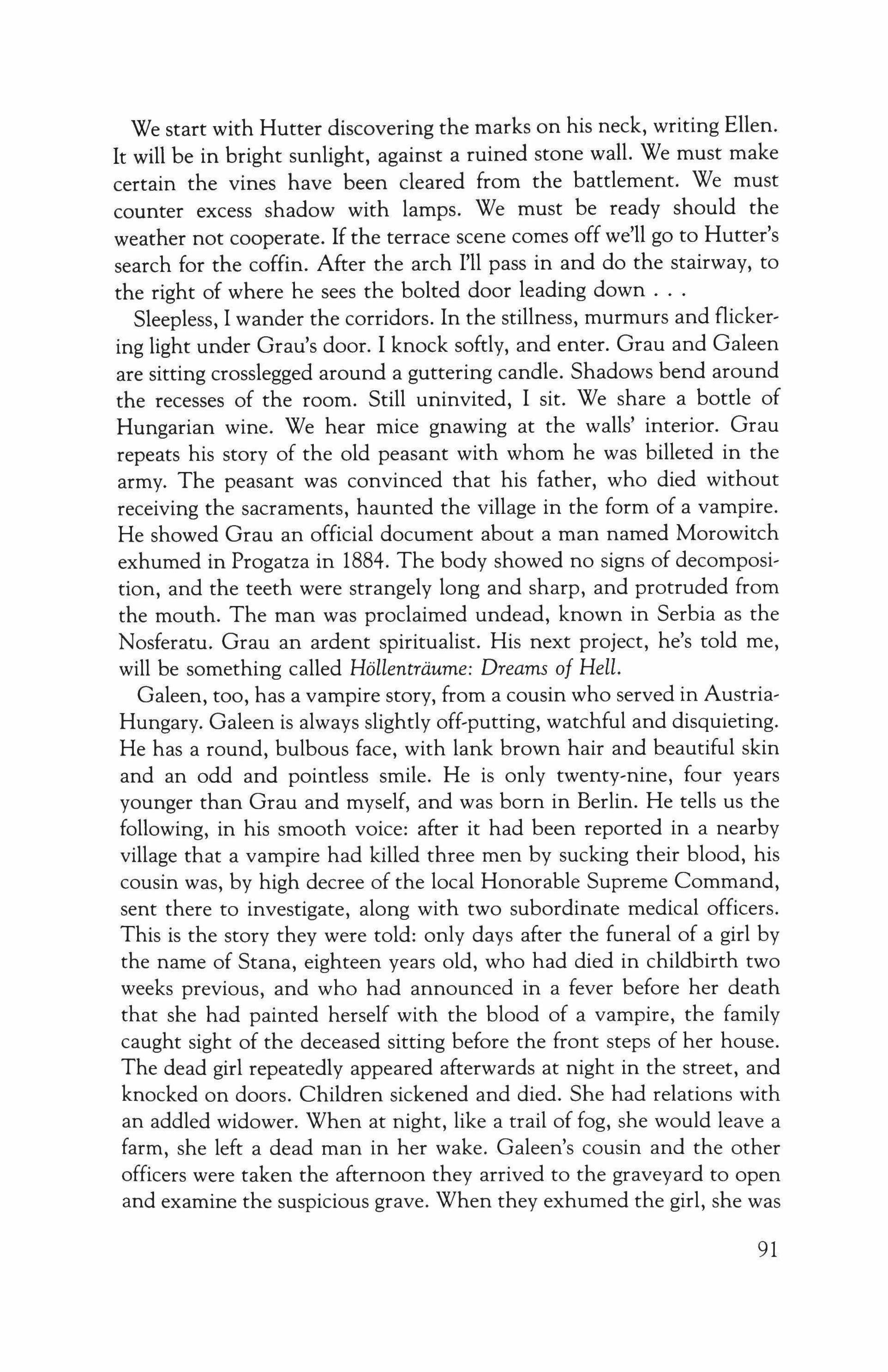
We start with Hutter discovering the marks on his neck, writing Ellen. It will be in bright sunlight, against a ruined stone wall. We must make certain the vines have been cleared from the battlement. We must counter excess shadow with lamps. We must be ready should the weather not cooperate. If the terrace scene comes off we'll go to Hutter's search for the coffin. After the arch I'll pass in and do the stairway, to the right of where he sees the bolted door leading down Sleepless, I wander the corridors. In the stillness, murmurs and flickering light under Grau's door. I knock softly, and enter. Grau and Galeen are sitting crosslegged around a guttering candle. Shadows bend around the recesses of the room. Still uninvited, I sit. We share a bottle of Hungarian wine. We hear mice gnawing at the walls' interior. Grau repeats his story of the old peasant with whom he was billeted in the army. The peasant was convinced that his father, who died without receiving the sacraments, haunted the village in the form of a vampire. He showed Grau an official document about a man named Morowitch exhumed in Progatza in 1884. The body showed no signs of decomposition, and the teeth were strangely long and sharp, and protruded from the mouth. The man was proclaimed undead, known in Serbia as the Nosferatu. Grau an ardent spiritualist. His next project, he's told me, will be something called Hollentrdume: Dreams of Hell.
Galeen, too, has a vampire story, from a cousin who served in AustriaHungary. Galeen is always slightly off-putting, watchful and disquieting. He has a round, bulbous face, with lank brown hair and beautiful skin and an odd and pointless smile. He is only twenty-nine, four years younger than Grau and myself, and was born in Berlin. He tells us the following, in his smooth voice: after it had been reported in a nearby village that a vampire had killed three men by sucking their blood, his cousin was, by high decree of the local Honorable Supreme Command, sent there to investigate, along with two subordinate medical officers. This is the story they were told: only days after the funeral of a girl by the name of Stana, eighteen years old, who had died in childbirth two weeks previous, and who had announced in a fever before her death that she had painted herself with the blood of a vampire, the family caught sight of the deceased sitting before the front steps of her house. The dead girl repeatedly appeared afterwards at night in the street, and knocked on doors. Children sickened and died. She had relations with an addled widower. When at night, like a trail of fog, she would leave a farm, she left a dead man in her wake. Galeen's cousin and the other officers were taken the afternoon they arrived to the graveyard to open and examine the suspicious grave. When they exhumed the girl, she was
91
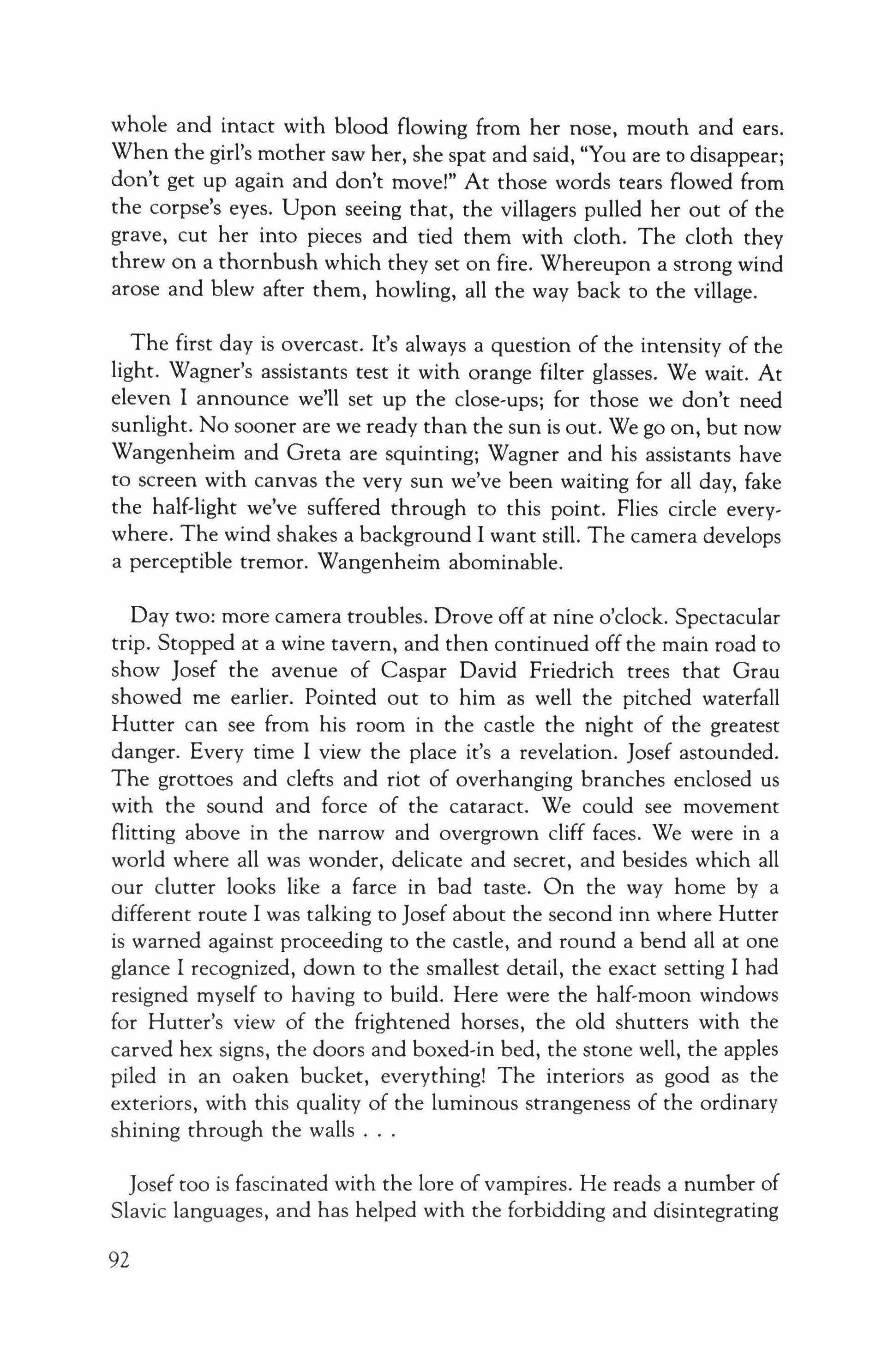
whole and intact with blood flowing from her nose, mouth and ears. When the girl's mother saw her, she spat and said, "You are to disappear; don't get up again and don't move!" At those words tears flowed from the corpse's eyes. Upon seeing that, the villagers pulled her out of the grave, cut her into pieces and tied them with cloth. The cloth they threw on a thornbush which they set on fire. Whereupon a strong wind arose and blew after them, howling, all the way back to the village.
The first day is overcast. It's always a question of the intensity of the light. Wagner's assistants test it with orange filter glasses. We wait. At eleven I announce we'll set up the close-ups; for those we don't need sunlight. No sooner are we ready than the sun is out. We go on, but now Wangenheim and Greta are squinting; Wagner and his assistants have to screen with canvas the very sun we've been waiting for all day, fake the half,light we've suffered through to this point. Flies circle everywhere. The wind shakes a background I want still. The camera develops a perceptible tremor. Wangenheim abominable.
Day two: more camera troubles. Drove off at nine o'clock. Spectacular trip. Stopped at a wine tavern, and then continued off the main road to show Josef the avenue of Caspar David Friedrich trees that Grau showed me earlier. Pointed out to him as well the pitched waterfall Hutter can see from his room in the castle the night of the greatest danger. Every time I view the place it's a revelation. Josef astounded. The grottoes and clefts and riot of overhanging branches enclosed us with the sound and force of the cataract. We could see movement flitting above in the narrow and overgrown cliff faces. We were in a world where all was wonder, delicate and secret, and besides which all our clutter looks like a farce in bad taste. On the way home by a different route I was talking to Josef about the second inn where Hutter is warned against proceeding to the castle, and round a bend all at one glance I recognized, down to the smallest detail, the exact setting I had resigned myself to having to build. Here were the half-moon windows for Hutter's view of the frightened horses, the old shutters with the carved hex signs, the doors and boxed-in bed, the stone well, the apples piled in an oaken bucket, everything! The interiors as good as the exteriors, with this quality of the luminous strangeness of the ordinary shining through the walls
Josef too is fascinated with the lore of vampires. He reads a number of Slavic languages, and has helped with the forbidding and disintegrating
92
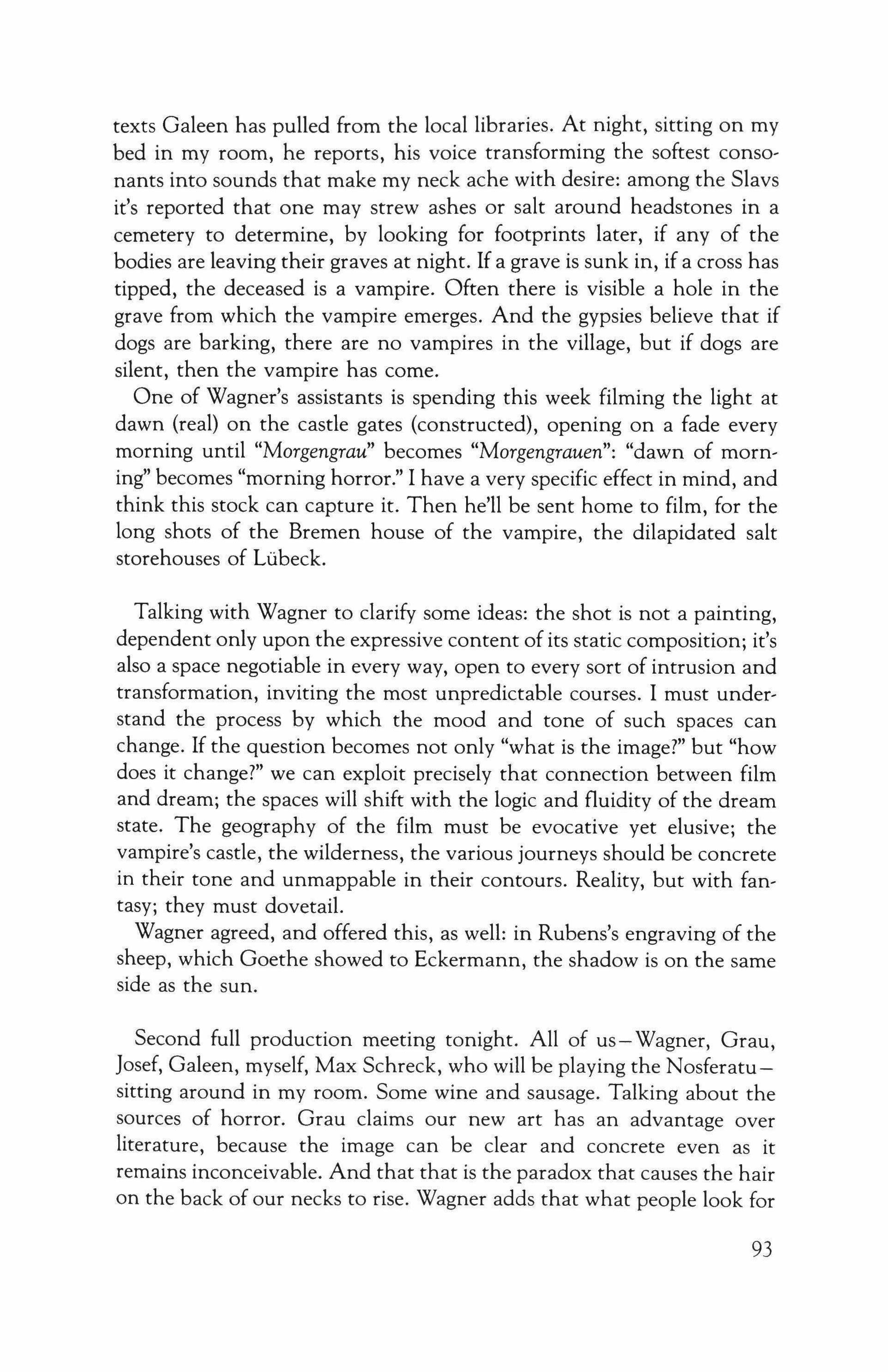
texts Galeen has pulled from the local libraries. At night, sitting on my bed in my room, he reports, his voice transforming the softest consonants into sounds that make my neck ache with desire: among the Slavs it's reported that one may strew ashes or salt around headstones in a cemetery to determine, by looking for footprints later, if any of the bodies are leaving their graves at night. If a grave is sunk in, if a cross has tipped, the deceased is a vampire. Often there is visible a hole in the grave from which the vampire emerges. And the gypsies believe that if dogs are barking, there are no vampires in the village, but if dogs are silent, then the vampire has come.
One of Wagner's assistants is spending this week filming the light at dawn (real) on the castle gates (constructed), opening on a fade every morning until "Morgengrau" becomes "Morgengrauen": "dawn of morning" becomes "morning horror." I have a very specific effect in mind, and think this stock can capture it. Then he'll be sent home to film, for the long shots of the Bremen house of the vampire, the dilapidated salt storehouses of Lubeck.
Talking with Wagner to clarify some ideas: the shot is not a painting, dependent only upon the expressive content of its static composition; it's also a space negotiable in every way, open to every sort of intrusion and transformation, inviting the most unpredictable courses. I must understand the process by which the mood and tone of such spaces can change. If the question becomes not only "what is the image?" but "how does it change?" we can exploit precisely that connection between film and dream; the spaces will shift with the logic and fluidity of the dream state. The geography of the film must be evocative yet elusive; the vampire's castle, the wilderness, the various journeys should be concrete in their tone and unmappable in their contours. Reality, but with fantasy; they must dovetail.
Wagner agreed, and offered this, as well: in Rubens's engraving of the sheep, which Goethe showed to Eckermann, the shadow is on the same side as the sun.
Second full production meeting tonight. All of us- Wagner, Grau, Josef, Galeen, myself, Max Schreck, who will be playing the Nosferatusitting around in my room. Some wine and sausage. Talking about the sources of horror. Grau claims our new art has an advantage over literature, because the image can be clear and concrete even as it remains inconceivable. And that that is the paradox that causes the hair on the back of our necks to rise. Wagner adds that what people look for
93
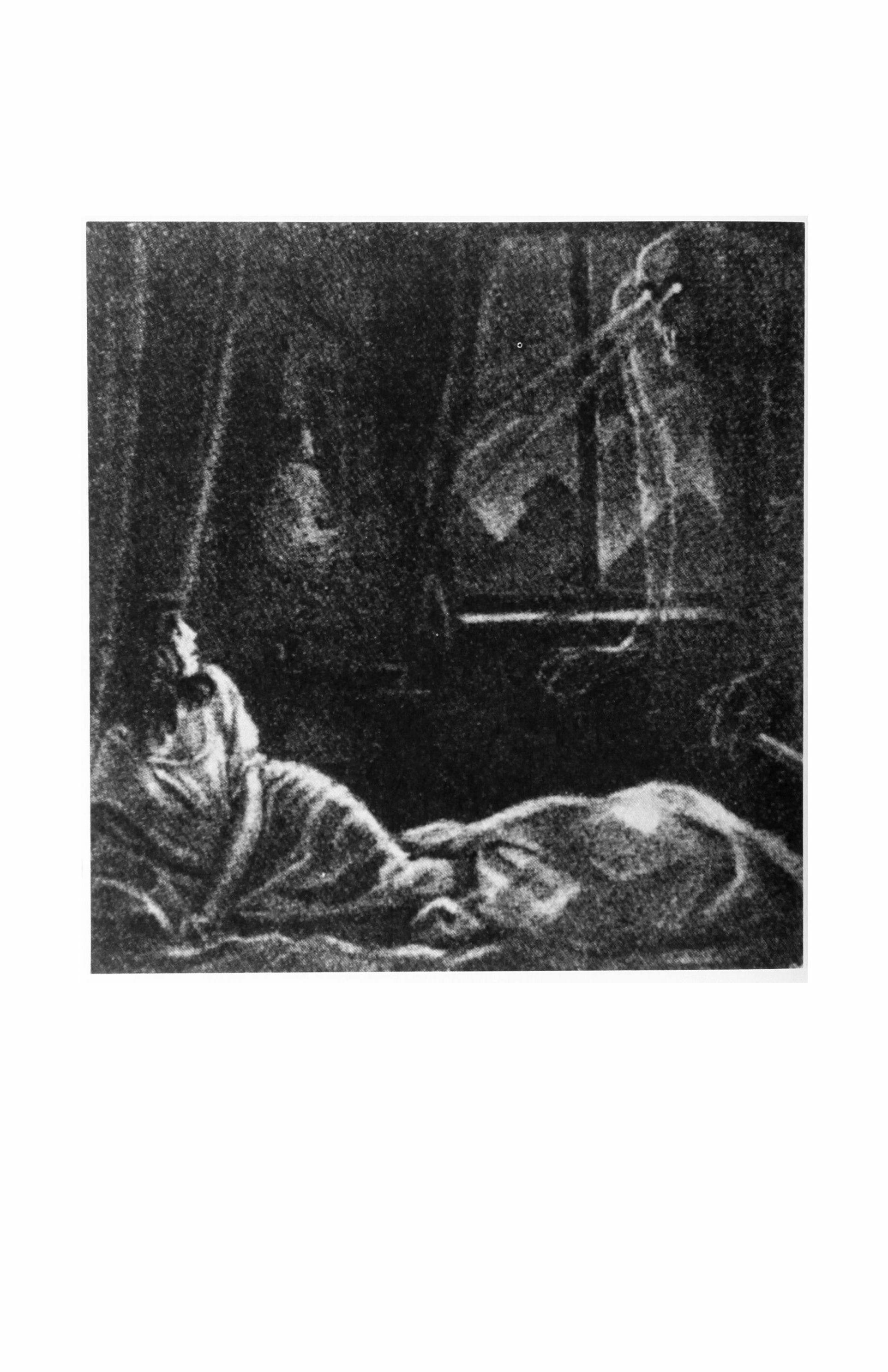
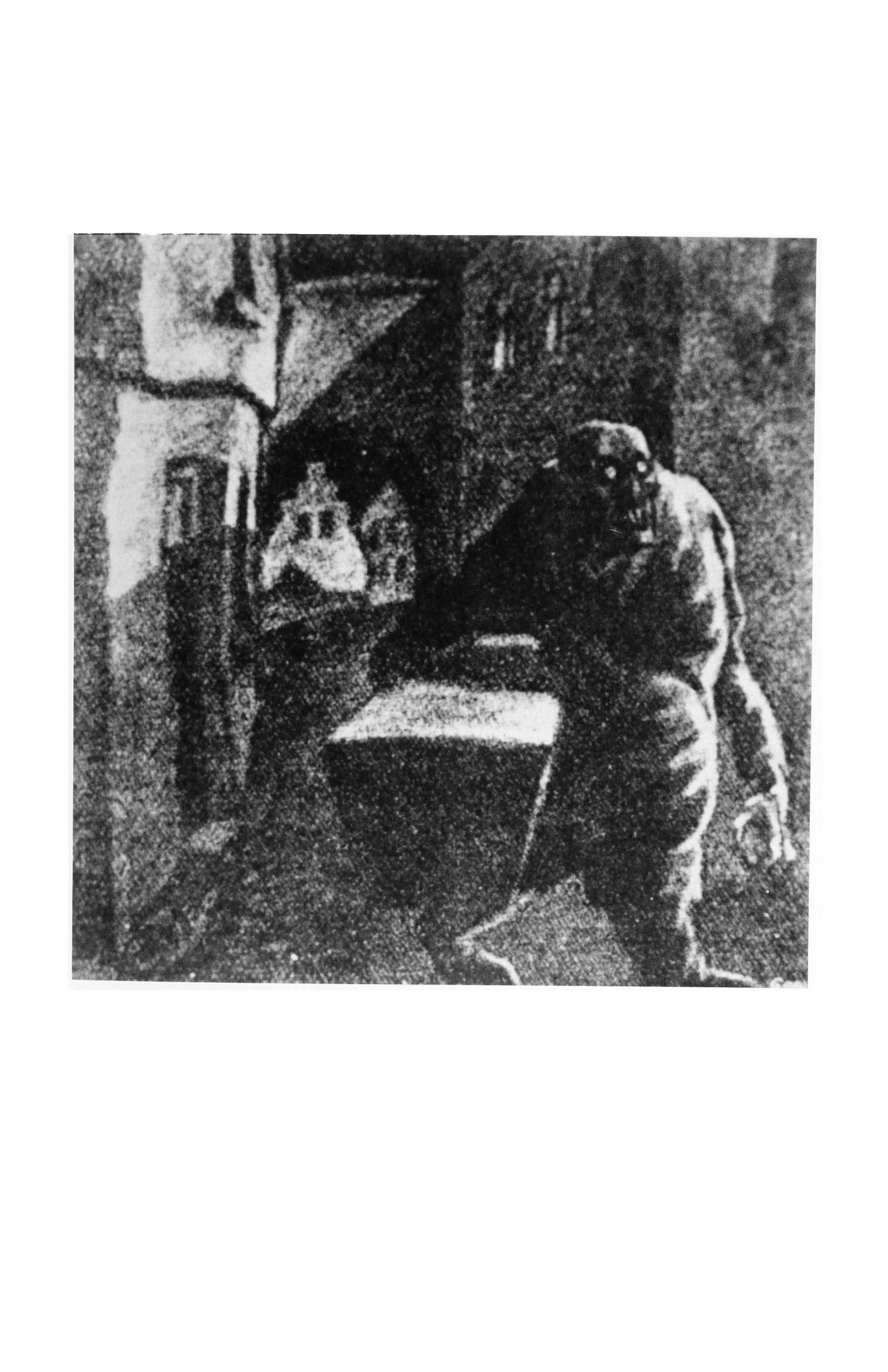
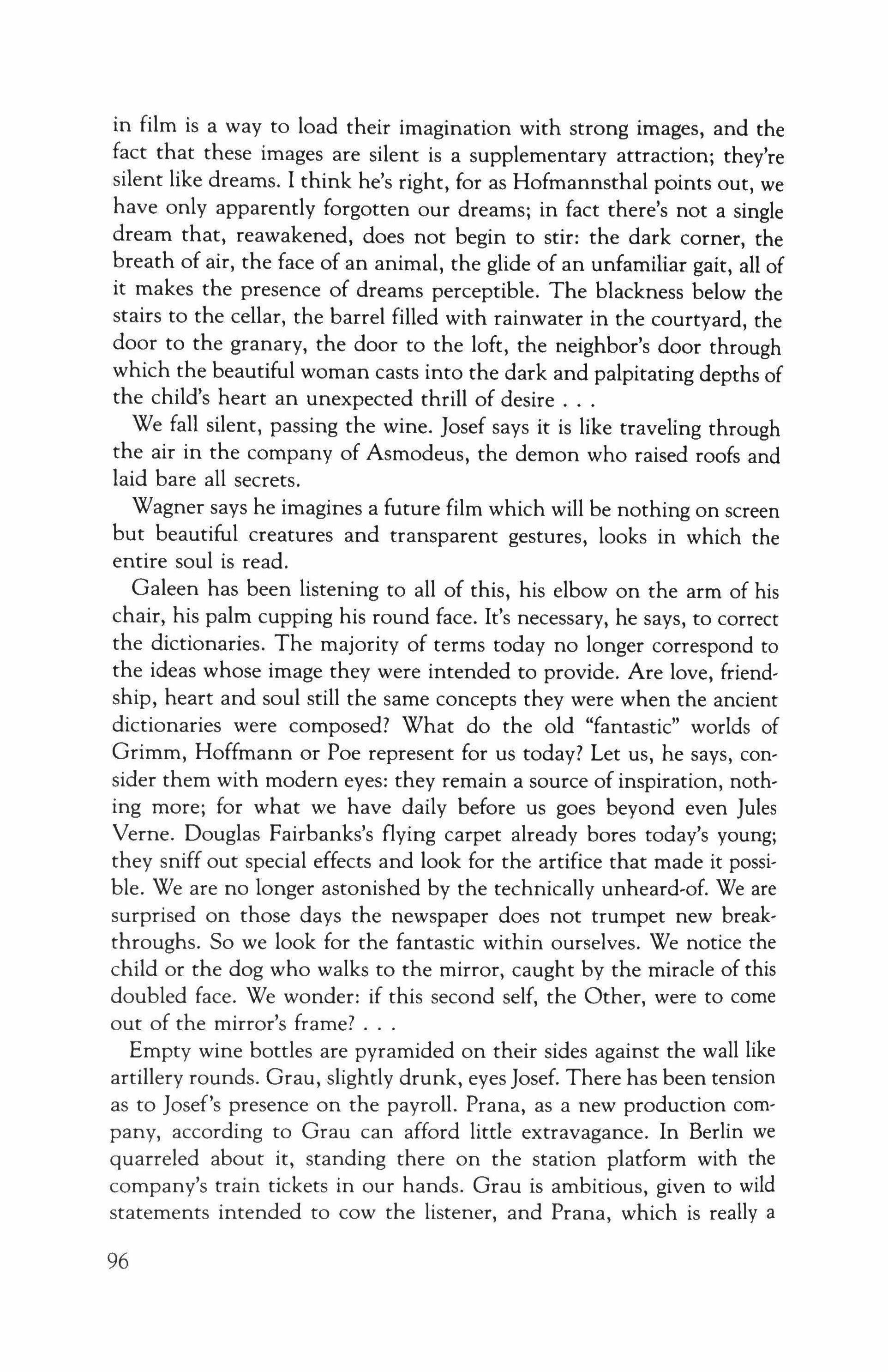
in film is a way to load their imagination with strong images, and the fact that these images are silent is a supplementary attraction; they're silent like dreams. I think he's right, for as Hofmannsthal points out, we have only apparently forgotten our dreams; in fact there's not a single dream that, reawakened, does not begin to stir: the dark corner, the breath of air, the face of an animal, the glide of an unfamiliar gait, all of it makes the presence of dreams perceptible. The blackness below the stairs to the cellar, the barrel filled with rainwater in the courtyard, the door to the granary, the door to the loft, the neighbor's door through which the beautiful woman casts into the dark and palpitating depths of the child's heart an unexpected thrill of desire
We fall silent, passing the wine. Josef says it is like traveling through the air in the company of Asmodeus, the demon who raised roofs and laid bare all secrets.
Wagner says he imagines a future film which will be nothing on screen but beautiful creatures and transparent gestures, looks in which the entire soul is read.
Galeen has been listening to all of this, his elbow on the arm of his chair, his palm cupping his round face. It's necessary, he says, to correct the dictionaries. The majority of terms today no longer correspond to the ideas whose image they were intended to provide. Are love, friendship, heart and soul still the same concepts they were when the ancient dictionaries were composed? What do the old "fantastic" worlds of Grimm, Hoffmann or Poe represent for us today? Let us, he says, consider them with modern eyes: they remain a source of inspiration, nothing more; for what we have daily before us goes beyond even Jules Verne. Douglas Fairbanks's flying carpet already bores today's young; they sniff out special effects and look for the artifice that made it possible. We are no longer astonished by the technically unheard-of. We are surprised on those days the newspaper does not trumpet new breakthroughs. So we look for the fantastic within ourselves. We notice the child or the dog who walks to the mirror, caught by the miracle of this doubled face. We wonder: if this second self, the Other, were to come out of the mirror's frame?
Empty wine bottles are pyramided on their sides against the wall like artillery rounds. Grau, slightly drunk, eyes Josef. There has been tension as to Josef's presence on the payroll. Prana, as a new production company, according to Grau can afford little extravagance. In Berlin we quarreled about it, standing there on the station platform with the company's train tickets in our hands. Grau is ambitious, given to wild statements intended to cow the listener, and Prana, which is really a
96
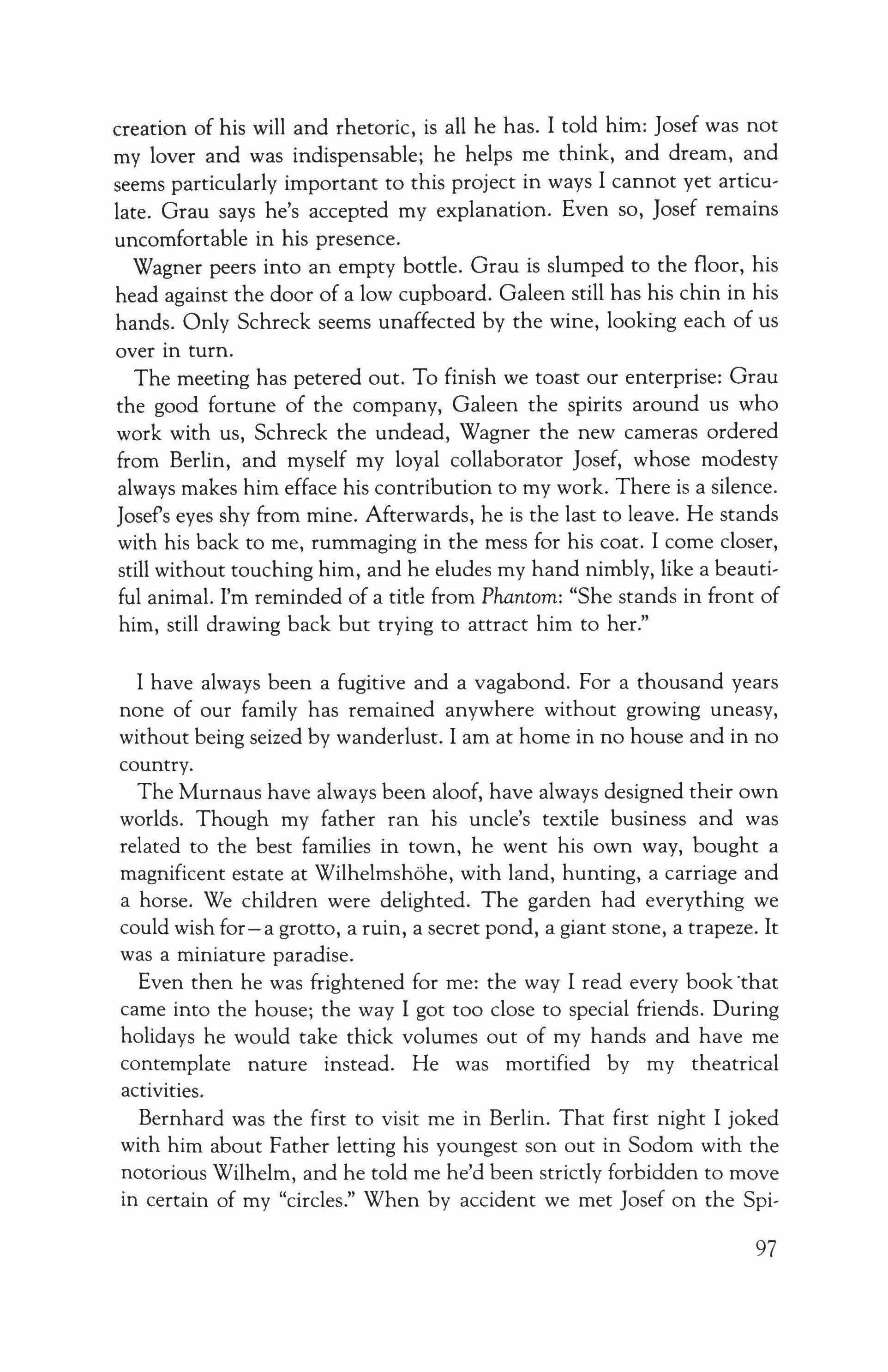
creation of his will and rhetoric, is all he has. I told him: Josef was not my lover and was indispensable; he helps me think, and dream, and seems particularly important to this project in ways I cannot yet articulate. Grau says he's accepted my explanation. Even so, Josef remains uncomfortable in his presence.
Wagner peers into an empty bottle. Grau is slumped to the floor, his head against the door of a low cupboard. Galeen still has his chin in his hands. Only Schreck seems unaffected by the wine, looking each of us over in turn.
The meeting has petered out. To finish we toast our enterprise: Grau the good fortune of the company, Galeen the spirits around us who work with us, Schreck the undead, Wagner the new cameras ordered from Berlin, and myself my loyal collaborator Josef, whose modesty always makes him efface his contribution to my work. There is a silence. Josef's eyes shy from mine. Afterwards, he is the last to leave. He stands with his back to me, rummaging in the mess for his coat. I come closer, still without touching him, and he eludes my hand nimbly, like a beautiful animal. I'm reminded of a title from Phantom: "She stands in front of him, still drawing back but trying to attract him to her."
I have always been a fugitive and a vagabond. For a thousand years none of our family has remained anywhere without growing uneasy, without being seized by wanderlust. I am at home in no house and in no country.
The Murnaus have always been aloof, have always designed their own worlds. Though my father ran his uncle's textile business and was related to the best families in town, he went his own way, bought a magnificent estate at Wilhelmshohe, with land, hunting, a carriage and a horse. We children were delighted. The garden had everything we could wish for- a grotto, a ruin, a secret pond, a giant stone, a trapeze. It was a miniature paradise.
Even then he was frightened for me: the way I read every book 'that came into the house; the way I got too close to special friends. During holidays he would take thick volumes out of my hands and have me contemplate nature instead. He was mortified by my theatrical activities.
Bernhard was the first to visit me in Berlin. That first night I joked with him about Father letting his youngest son out in Sodom with the notorious Wilhelm, and he told me he'd been strictly forbidden to move in certain of my "circles." When by accident we met Josef on the Spi-
97
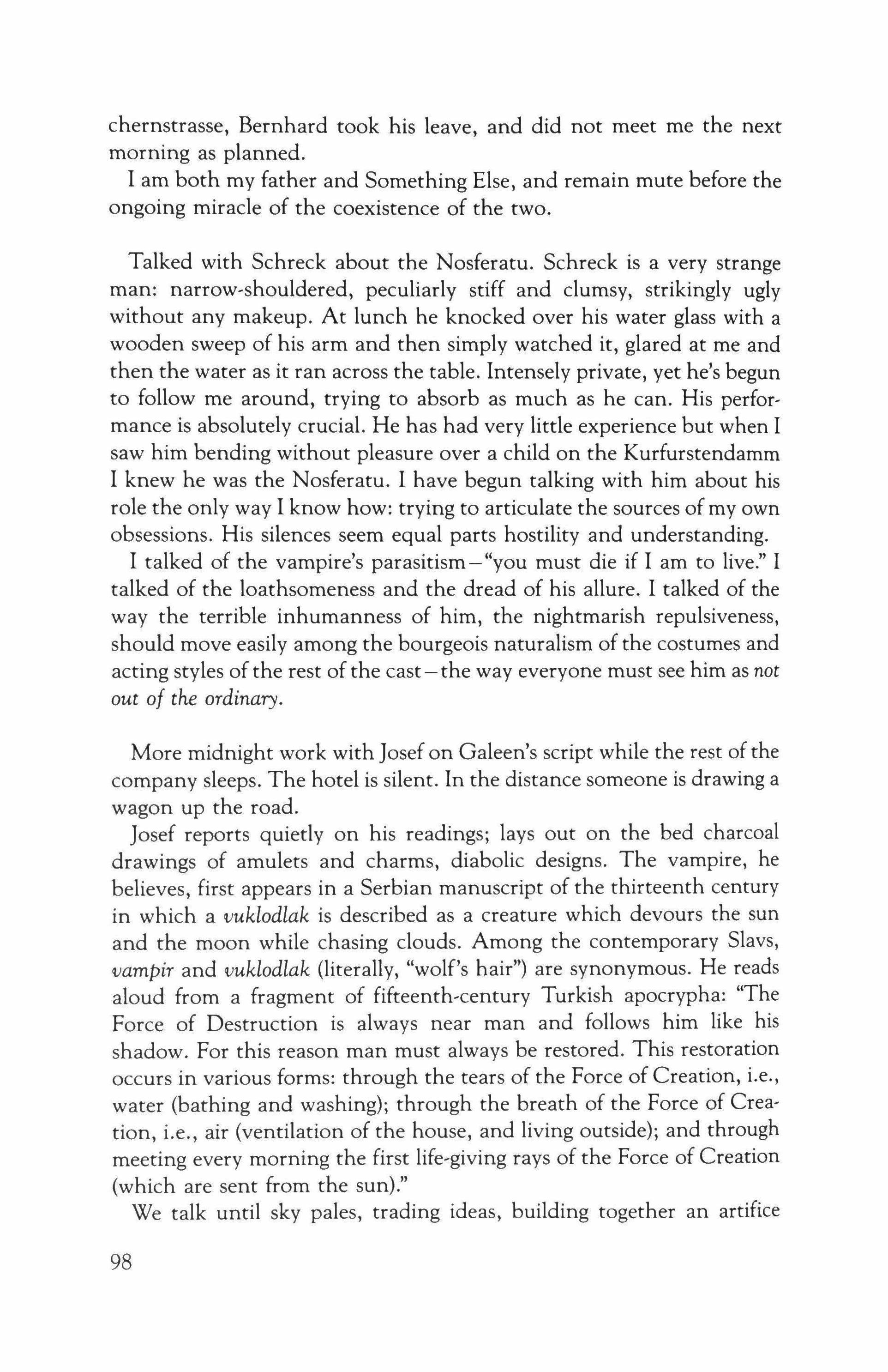
chernstrasse, Bernhard took his leave, and did not meet me the next morning as planned.
I am both my father and Something Else, and remain mute before the ongoing miracle of the coexistence of the two.
Talked with Schreck about the Nosferatu. Schreck is a very strange man: narrow-shouldered, peculiarly stiff and clumsy, strikingly ugly without any makeup. At lunch he knocked over his water glass with a wooden sweep of his arm and then simply watched it, glared at me and then the water as it ran across the table. Intensely private, yet he's begun to follow me around, trying to absorb as much as he can. His performance is absolutely crucial. He has had very little experience but when I saw him bending without pleasure over a child on the Kurfurstendamm I knew he was the Nosferatu. I have begun talking with him about his role the only way I know how: trying to articulate the sources of my own obsessions. His silences seem equal parts hostility and understanding. I talked of the vampire's parasitism - "you must die if I am to live." I talked of the loathsomeness and the dread of his allure. I talked of the way the terrible inhumanness of him, the nightmarish repulsiveness, should move easily among the bourgeois naturalism of the costumes and acting styles of the rest of the cast - the way everyone must see him as not out 0/ the ordinary.
More midnight work with Josef on Galeen's script while the rest of the company sleeps. The hotel is silent. In the distance someone is drawing a wagon up the road.
Josef reports quietly on his readings; lays out on the bed charcoal drawings of amulets and charms, diabolic designs. The vampire, he believes, first appears in a Serbian manuscript of the thirteenth century in which a vuklodlak is described as a creature which devours the sun and the moon while chasing clouds. Among the contemporary Slavs, vampir and vuklodlak (literally, "wolf's hair") are synonymous. He reads aloud from a fragment of fifteenth-century Turkish apocrypha: "The Force of Destruction is always near man and follows him like his shadow. For this reason man must always be restored. This restoration occurs in various forms: through the tears of the Force of Creation, i.e., water (bathing and washing); through the breath of the Force of Creation, i.e., air (ventilation of the house, and living outside); and through meeting every morning the first life-giving rays of the Force of Creation (which are sent from the sun}."
We talk until sky pales, trading ideas, building together an artifice
98
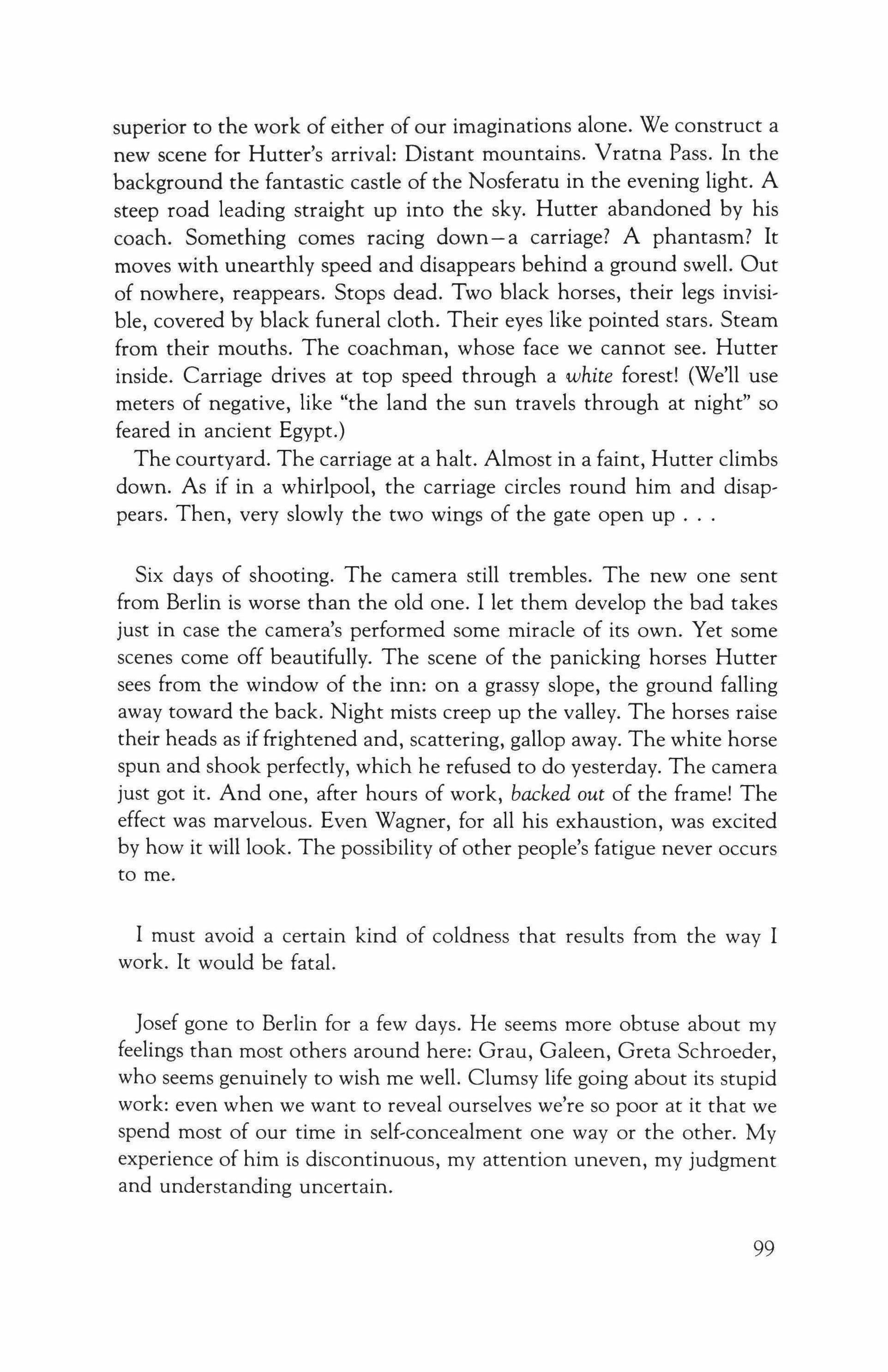
superior to the work of either of our imaginations alone. We construct a new scene for Hutter's arrival: Distant mountains. Vratna Pass. In the background the fantastic castle of the Nosferatu in the evening light. A steep road leading straight up into the sky. Hutter abandoned by his coach. Something comes racing down - a carriage? A phantasm? It moves with unearthly speed and disappears behind a ground swell. Out of nowhere, reappears. Stops dead. Two black horses, their legs invisible, covered by black funeral cloth. Their eyes like pointed stars. Steam from their mouths. The coachman, whose face we cannot see. Hutter inside. Carriage drives at top speed through a white forest! (We'll use meters of negative, like "the land the sun travels through at night" so feared in ancient Egypt.)
The courtyard. The carriage at a halt. Almost in a faint, Hutter climbs down. As if in a whirlpool, the carriage circles round him and disappears. Then, very slowly the two wings of the gate open up
Six days of shooting. The camera still trembles. The new one sent from Berlin is worse than the old one. I let them develop the bad takes just in case the camera's performed some miracle of its own. Yet some scenes come off beautifully. The scene of the panicking horses Hutter sees from the window of the inn: on a grassy slope, the ground falling away toward the back. Night mists creep up the valley. The horses raise their heads as iffrightened and, scattering, gallop away. The white horse spun and shook perfectly, which he refused to do yesterday. The camera just got it. And one, after hours of work, backed out of the frame! The effect was marvelous. Even Wagner, for all his exhaustion, was excited by how it will look. The possibility of other people's fatigue never occurs to me.
I must avoid a certain kind of coldness that results from the way I work. It would be fatal.
Josef gone to Berlin for a few days. He seems more obtuse about my feelings than most others around here: Grau, Galeen, Greta Schroeder, who seems genuinely to wish me well. Clumsy life going about its stupid work: even when we want to reveal ourselves we're so poor at it that we spend most of our time in self-concealment one way or the other. My experience of him is discontinuous, my attention uneven, my judgment and understanding uncertain.
99
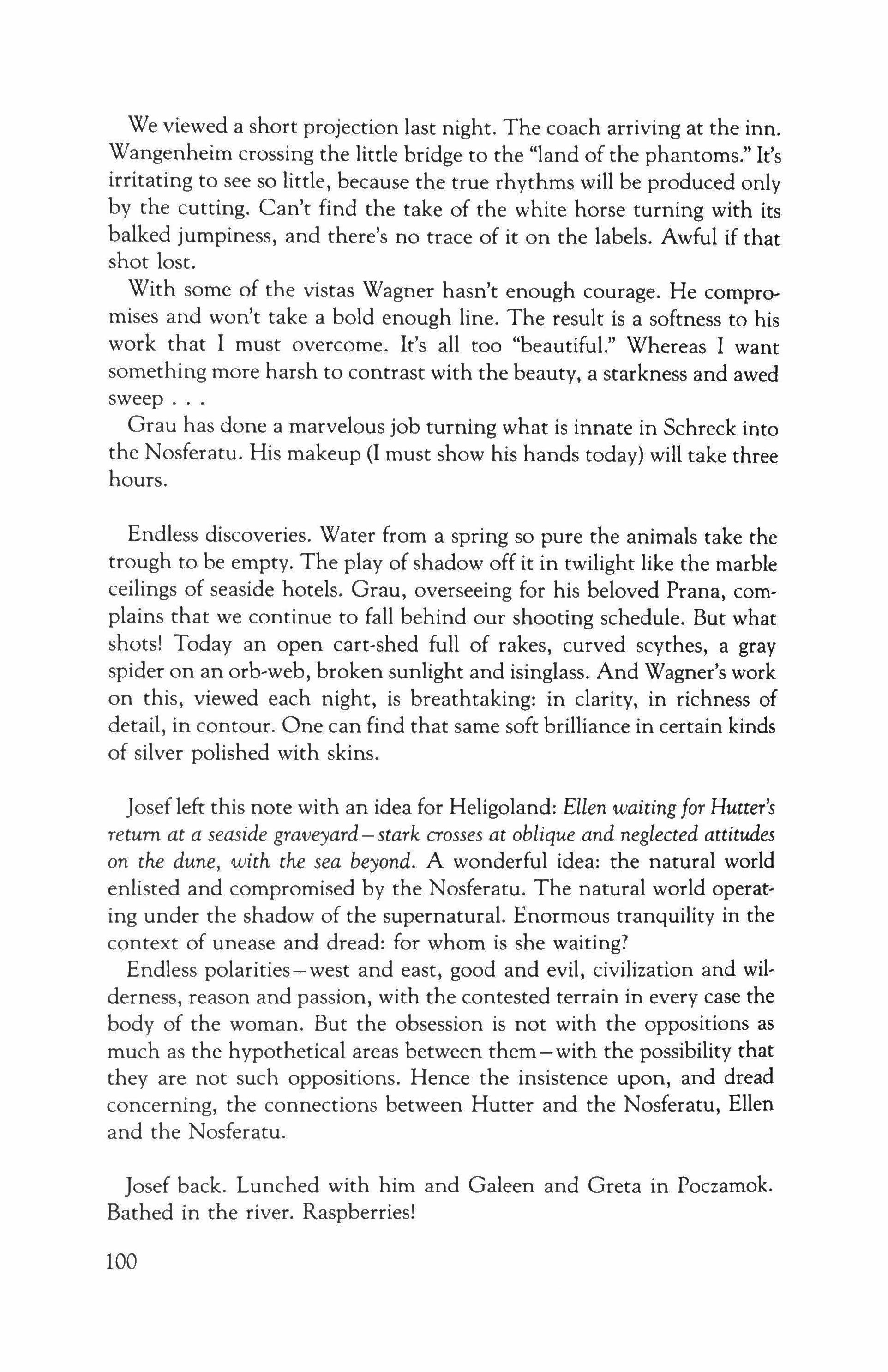
We viewed a short projection last night. The coach arriving at the inn. Wangenheim crossing the little bridge to the "land of the phantoms." It's irritating to see so little, because the true rhythms will be produced only by the cutting. Can't find the take of the white horse turning with its balked jumpiness, and there's no trace of it on the labels. Awful if that shot lost.
With some of the vistas Wagner hasn't enough courage. He compromises and won't take a bold enough line. The result is a softness to his work that I must overcome. It's all too "beautiful." Whereas I want something more harsh to contrast with the beauty, a starkness and awed sweep
Grau has done a marvelous job turning what is innate in Schreck into the Nosferatu. His makeup (I must show his hands today) will take three hours.
Endless discoveries. Water from a spring so pure the animals take the trough to be empty. The play of shadow off it in twilight like the marble ceilings of seaside hotels. Grau, overseeing for his beloved Prana, complains that we continue to fall behind our shooting schedule. But what shots! Today an open cart-shed full of rakes, curved scythes, a gray spider on an orb-web, broken sunlight and isinglass. And Wagner's work on this, viewed each night, is breathtaking: in clarity, in richness of detail, in contour. One can find that same soft brilliance in certain kinds of silver polished with skins.
Josef left this note with an idea for Heligoland: Ellen waitingfor Hutter's return at a seaside graveyard-stark crosses at oblique and neglected attitudes on the dune, with the sea beyond. A wonderful idea: the natural world enlisted and compromised by the Nosferatu. The natural world operating under the shadow of the supernatural. Enormous tranquility in the context of unease and dread: for whom is she waiting?
Endless polarities-west and east, good and evil, civilization and wilderness, reason and passion, with the contested terrain in every case the body of the woman. But the obsession is not with the oppositions as much as the hypothetical areas between them-with the possibility that they are not such oppositions. Hence the insistence upon, and dread concerning, the connections between Hutter and the Nosferatu, Ellen and the Nosferatu.
Josef back. Lunched with him and Galeen and Greta in Poczamok. Bathed in the river. Raspberries!
100
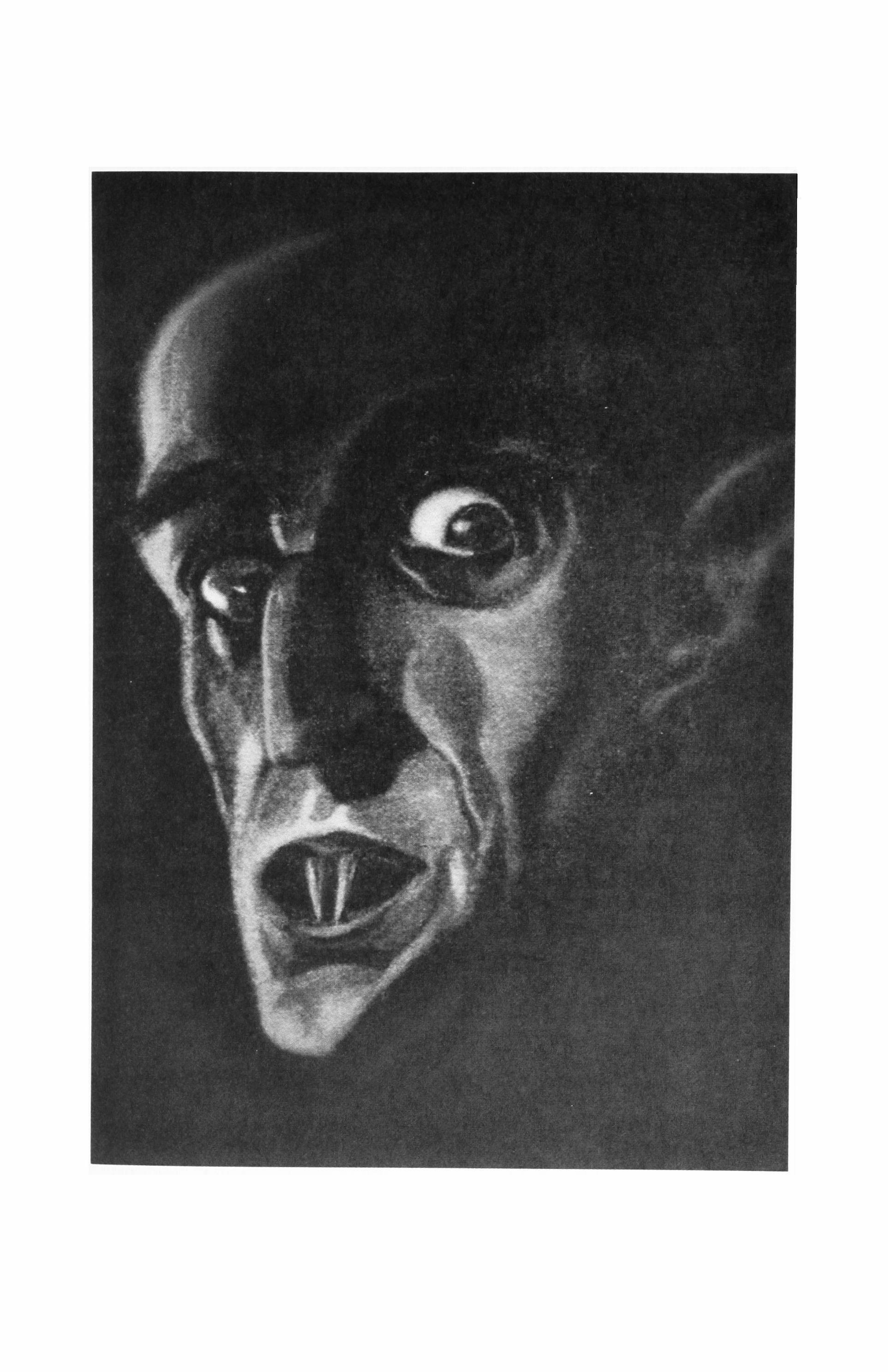

Josefbrought with him an article reprinted from the Literarische Welt: "Murnau has become a new kind of being who thinks directly in photographs. Murnau is a kind of modern centaur: he and the camera are joined together to form a single body." And then this: "Murnau teaches us to see the modern film; others will teach us to feel it."
The headaches back. The doctors unhappy with my kidneys. Great pain while urinating. The crew sits about and waits. There are times when I am ashamed of their confidence. What have I achieved so far?
A single day left to do scenes that should take three or four, which is always the way the schedules work out. Wagner points out that for the negative footage the vampire's carriage must be painted white, so that it will remain black. In the same way, Schreck must be clothed in white. Multiple disasters and new ideas make the last days on location always a nightmare of clumsiness. Everyone falls over everyone else while the light slowly disappears. Four of us splash paint over the carriage in a fever. Grau fashions a white cloak out of a bedsheet. Eleven in the morning becomes five in the afternoon.
That night I dreamed of my father, the last time I saw him: on the platform of the Berlin railway station, standing amid the depressed and nondescript lower-middle-class passengers. I was leaning out the window of the train. For a moment we looked at each other; then the train moved off and he disappeared among the crowd. Then I was in a dead woman's apartment, gazing at the remains of an unappetizing meal, the head and bones of some smoked fish. A sort of ghost meal.
I lay awake afterwards, and scribbled down an idea for a general shot: Hutter looks around the room which seems to him utterly changed. The damp wallpaper, the stains on the floor, the rough furniture, the depressing well of the courtyard beyond. All these things exude a rank physicality, a bleak hostility, a hostility directed at him.
INTERIORS
The interiors have all been built by Grau at the jofa studios at BerlinJohannistal. A hard place to get used to-a huge, dirigible-hangar sort of place, with its exposed steel girders and glass high above us, and the sound harsh and prone to echo. Today we checked the dining hall of the castle for the first time. A little arrangement, like a child's playhouse, erected in the middle of this vast space. Grau enraged by the way his sketches had been realized. He ranted, upbraided, drew new versions in
102
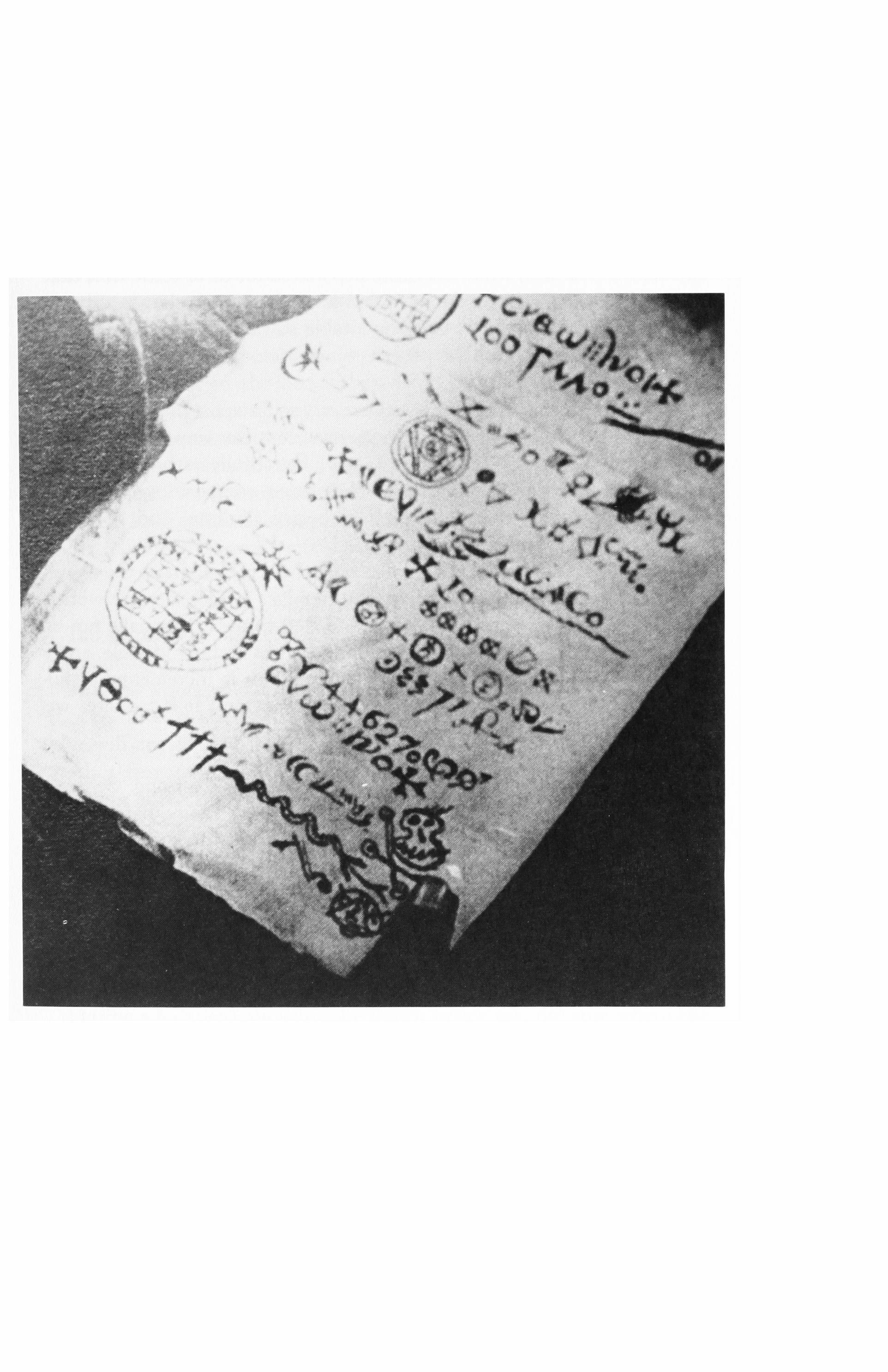
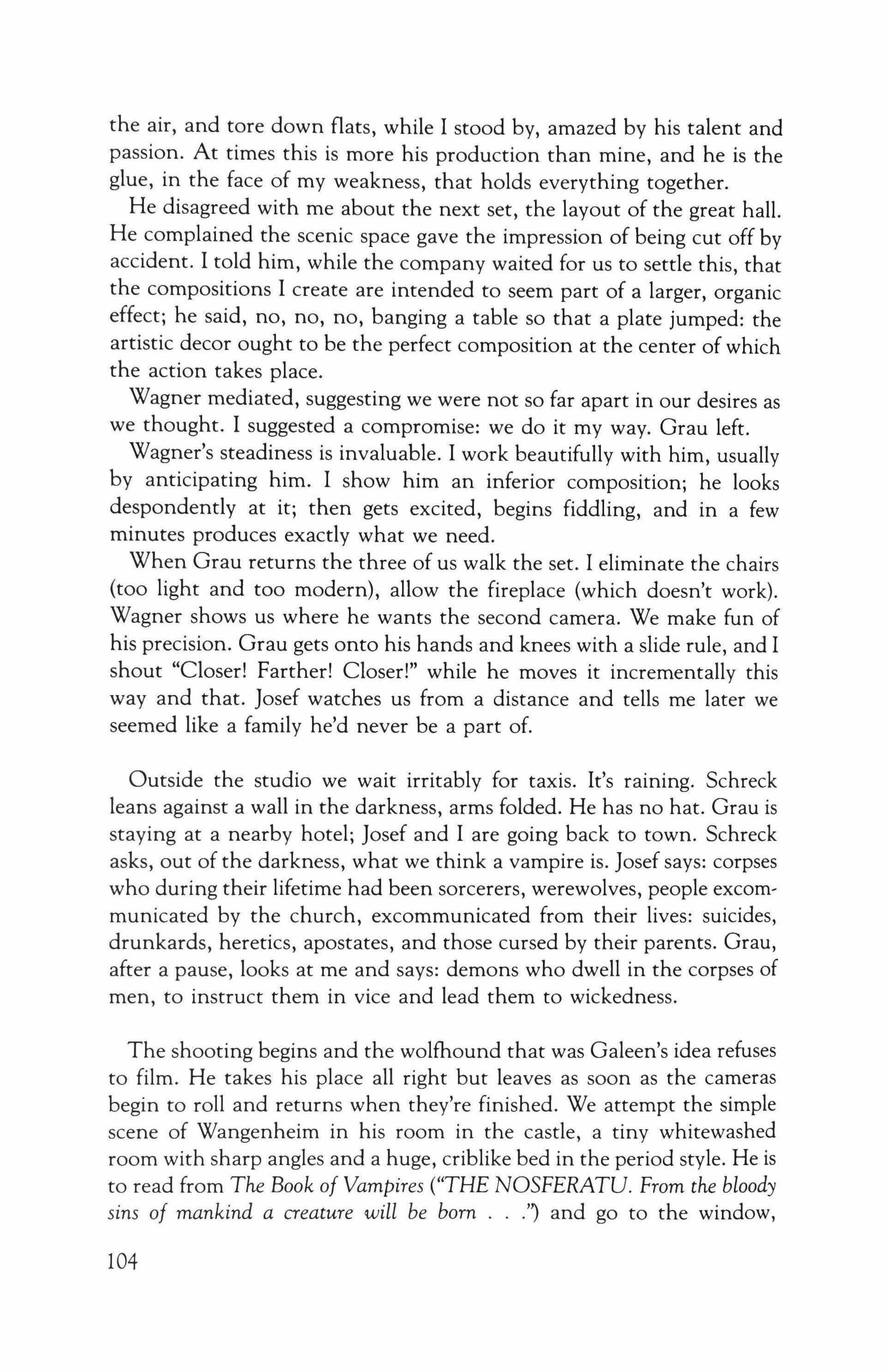
the air, and tore down flats, while I stood by, amazed by his talent and passion. At times this is more his production than mine, and he is the glue, in the face of my weakness, that holds everything together.
He disagreed with me about the next set, the layout of the great hall. He complained the scenic space gave the impression of being cut off by accident. I told him, while the company waited for us to settle this, that the compositions I create are intended to seem part of a larger, organic effect; he said, no, no, no, banging a table so that a plate jumped: the artistic decor ought to be the perfect composition at the center of which the action takes place.
Wagner mediated, suggesting we were not so far apart in our desires as we thought. I suggested a compromise: we do it my way. Grau left.
Wagner's steadiness is invaluable. I work beautifully with him, usually by anticipating him. I show him an inferior composition; he looks despondently at it; then gets excited, begins fiddling, and in a few minutes produces exactly what we need.
When Grau returns the three of us walk the set. I eliminate the chairs {too light and too modern}, allow the fireplace {which doesn't work}. Wagner shows us where he wants the second camera. We make fun of his precision. Grau gets onto his hands and knees with a slide rule, and I shout "Closer! Farther! Closer!" while he moves it incrementally this way and that. Josef watches us from a distance and tells me later we seemed like a family he'd never be a part of.
Outside the studio we wait irritably for taxis. It's raining. Schreck leans against a wall in the darkness, arms folded. He has no hat. Grau is staying at a nearby hotel; Josef and I are going back to town. Schreck asks, out of the darkness, what we think a vampire is. Josef says: corpses who during their lifetime had been sorcerers, werewolves, people excommunicated by the church, excommunicated from their lives: suicides, drunkards, heretics, apostates, and those cursed by their parents. Grau, after a pause, looks at me and says: demons who dwell in the corpses of men, to instruct them in vice and lead them to wickedness.
The shooting begins and the wolfhound that was Galeen's idea refuses to film. He takes his place all right but leaves as soon as the cameras begin to roll and returns when they're finished. We attempt the simple scene of Wangenheim in his room in the castle, a tiny whitewashed room with sharp angles and a huge, criblike bed in the period style. He is to read from The Book of Vampires (''THE NOSFERATU. From the bloody sins of mankind a creature will be born ") and go to the window,
104
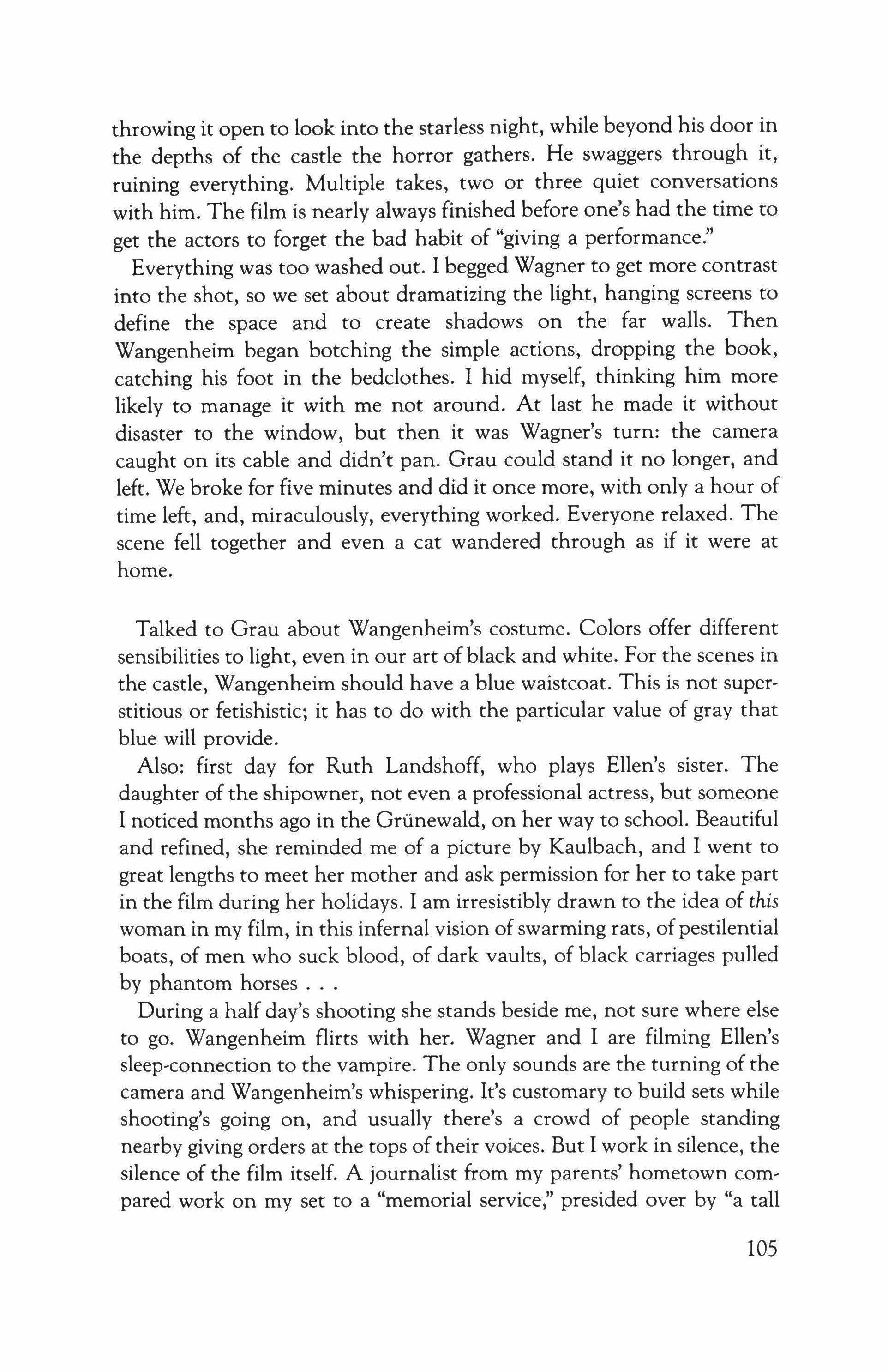
throwing it open to look into the starless night, while beyond his door in the depths of the castle the horror gathers. He swaggers through it, ruining everything. Multiple takes, two or three quiet conversations with him. The film is nearly always finished before one's had the time to get the actors to forget the bad habit of "giving a performance."
Everything was too washed out. I begged Wagner to get more contrast into the shot, so we set about dramatizing the light, hanging screens to define the space and to create shadows on the far walls. Then Wangenheim began botching the simple actions, dropping the book, catching his foot in the bedclothes. I hid myself, thinking him more likely to manage it with me not around. At last he made it without disaster to the window, but then it was Wagner's turn: the camera caught on its cable and didn't pan. Grau could stand it no longer, and left. We broke for five minutes and did it once more, with only a hour of time left, and, miraculously, everything worked. Everyone relaxed. The scene fell together and even a cat wandered through as if it were at home.
Talked to Grau about Wangenheim's costume. Colors offer different sensibilities to light, even in our art ofblack and white. For the scenes in the castle, Wangenheim should have a blue waistcoat. This is not superstitious or fetishistic; it has to do with the particular value of gray that blue will provide.
Also: first day for Ruth Landshoff, who plays Ellen's sister. The daughter of the shipowner, not even a professional actress, but someone I noticed months ago in the Grunewald, on her way to school. Beautiful and refined, she reminded me of a picture by Kaulbach, and I went to great lengths to meet her mother and ask permission for her to take part in the film during her holidays. I am irresistibly drawn to the idea of this woman in my film, in this infernal vision ofswarming rats, ofpestilential boats, of men who suck blood, of dark vaults, of black carriages pulled by phantom horses
During a half day's shooting she stands beside me, not sure where else to go. Wangenheim flirts with her. Wagner and I are filming Ellen's sleep-connection to the vampire. The only sounds are the turning of the camera and Wangenheim's whispering. It's customary to build sets while shooting's going on, and usually there's a crowd of people standing nearby giving orders at the tops of their voices, But I work in silence, the silence of the film itself. A journalist from my parents' hometown compared work on my set to a "memorial service," presided over by "a tall
105
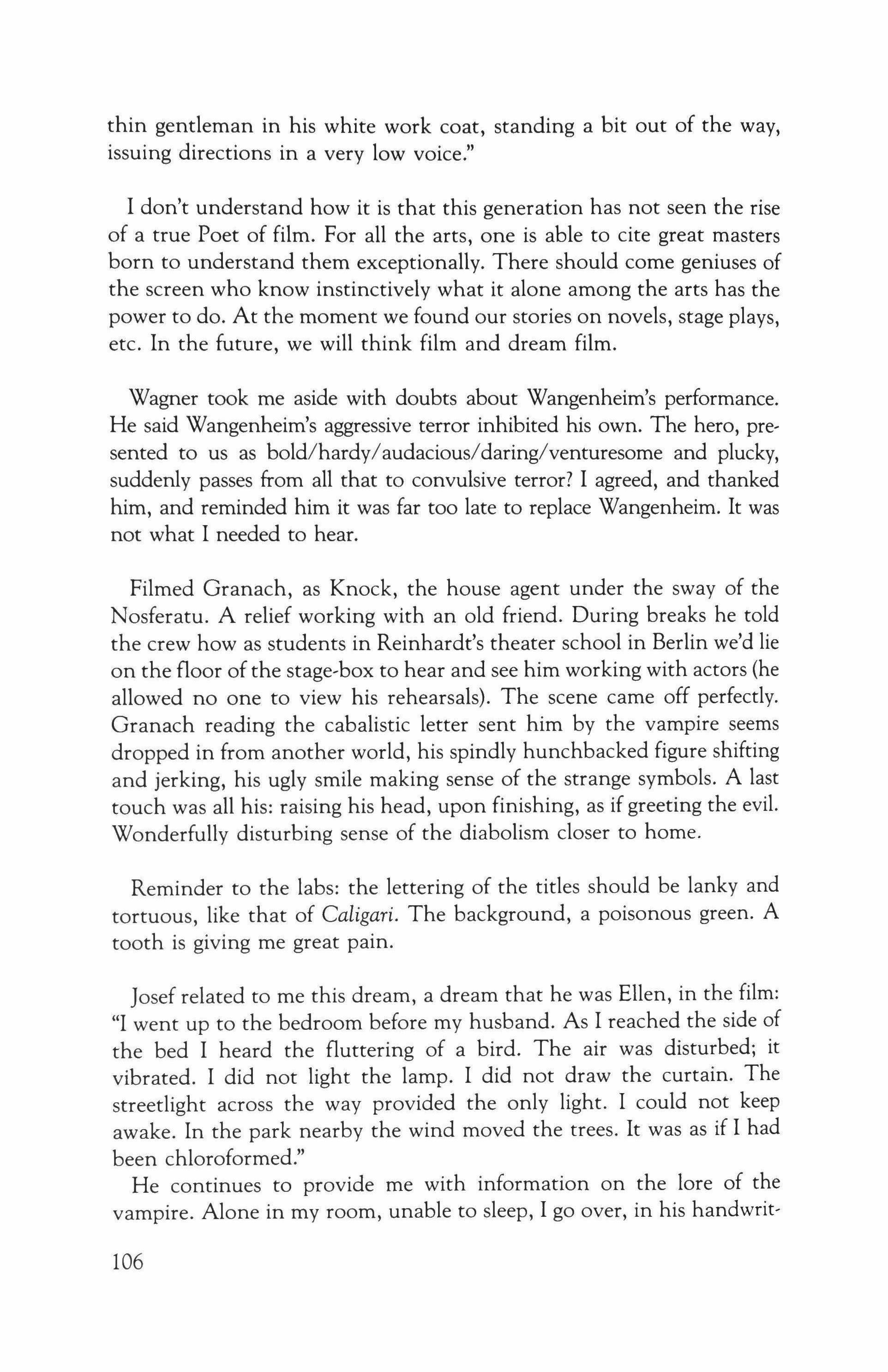
thin gentleman in his white work coat, standing a bit out of the way, issuing directions in a very low voice."
I don't understand how it is that this generation has not seen the rise of a true Poet of film. For all the arts, one is able to cite great masters born to understand them exceptionally. There should come geniuses of the screen who know instinctively what it alone among the arts has the power to do. At the moment we found our stories on novels, stage plays, etc. In the future, we will think film and dream film.
Wagner took me aside with doubts about Wangenheim's performance. He said Wangenheim's aggressive terror inhibited his own. The hero, presented to us as bold/hardy/audacious/daring/venturesome and plucky, suddenly passes from all that to convulsive terror? I agreed, and thanked him, and reminded him it was far too late to replace Wangenheim. It was not what I needed to hear.
Filmed Granach, as Knock, the house agent under the sway of the Nosferatu. A relief working with an old friend. During breaks he told the crew how as students in Reinhardt's theater school in Berlin we'd lie on the floor of the stage-box to hear and see him working with actors (he allowed no one to view his rehearsals). The scene came off perfectly. Granach reading the cabalistic letter sent him by the vampire seems dropped in from another world, his spindly hunchbacked figure shifting and jerking, his ugly smile making sense of the strange symbols. A last touch was all his: raising his head, upon finishing, as if greeting the evil. Wonderfully disturbing sense of the diabolism closer to home.
Reminder to the labs: the lettering of the titles should be lanky and tortuous, like that of Caligari. The background, a poisonous green. A tooth is giving me great pain.
Josef related to me this dream, a dream that he was Ellen, in the film: "I went up to the bedroom before my husband. As I reached the side of the bed I heard the fluttering of a bird. The air was disturbed; it vibrated. I did not light the lamp. I did not draw the curtain. The streetlight across the way provided the only light. I could not keep awake. In the park nearby the wind moved the trees. It was as if I had been chloroformed."
He continues to provide me with information on the lore of the vampire. Alone in my room, unable to sleep, I go over, in his handwrit-
106
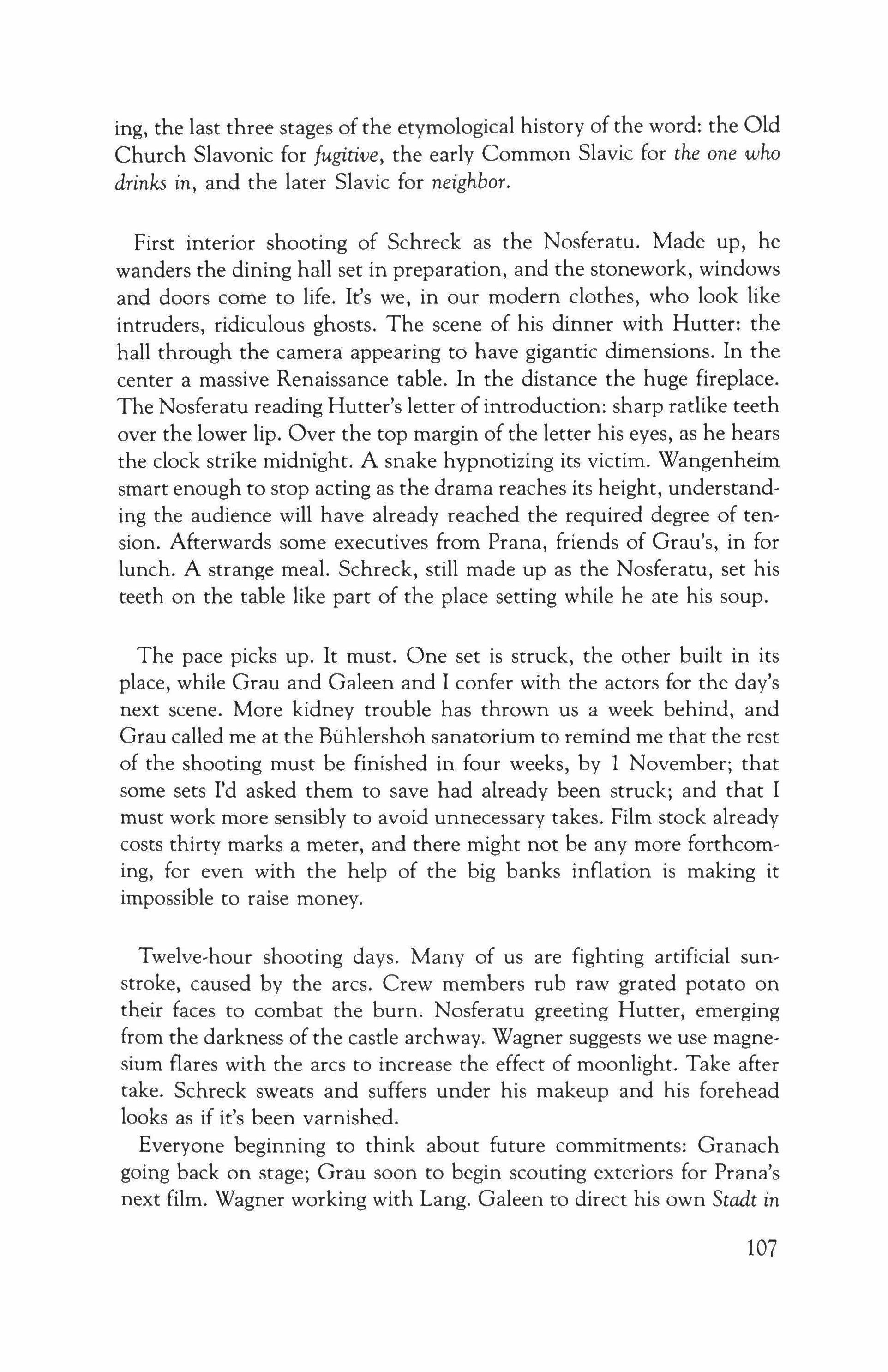
ing, the last three stages of the etymological history of the word: the Old Church Slavonic for fugitive, the early Common Slavic for the one who drinks in, and the later Slavic for neighbor.
First interior shooting of Schreck as the Nosferatu. Made up, he wanders the dining hall set in preparation, and the stonework, windows and doors come to life. It's we, in our modern clothes, who look like intruders, ridiculous ghosts. The scene of his dinner with Hutter: the hall through the camera appearing to have gigantic dimensions. In the center a massive Renaissance table. In the distance the huge fireplace. The Nosferatu reading Hutter's letter of introduction: sharp ratlike teeth over the lower lip. Over the top margin of the letter his eyes, as he hears the clock strike midnight. A snake hypnotizing its victim. Wangenheim smart enough to stop acting as the drama reaches its height, understanding the audience will have already reached the required degree of tension. Afterwards some executives from Prana, friends of Grau's, in for lunch. A strange meal. Schreck, still made up as the Nosferatu, set his teeth on the table like part of the place setting while he ate his soup.
The pace picks up. It must. One set is struck, the other built in its place, while Grau and Galeen and I confer with the actors for the day's next scene. More kidney trouble has thrown us a week behind, and Grau called me at the Buhlershoh sanatorium to remind me that the rest of the shooting must be finished in four weeks, by 1 November; that some sets I'd asked them to save had already been struck; and that I must work more sensibly to avoid unnecessary takes. Film stock already costs thirty marks a meter, and there might not be any more forthcoming, for even with the help of the big banks inflation is making it impossible to raise money.
Twelve-hour shooting days. Many of us are fighting artificial sunstroke, caused by the arcs. Crew members rub raw grated potato on their faces to combat the burn. Nosferatu greeting Hutter, emerging from the darkness of the castle archway. Wagner suggests we use magnesium flares with the arcs to increase the effect of moonlight. Take after take. Schreck sweats and suffers under his makeup and his forehead looks as if it's been varnished.
Everyone beginning to think about future commitments: Granach going back on stage; Grau soon to begin scouting exteriors for Prana's next film. Wagner working with Lang. Galeen to direct his own Stadt in
107
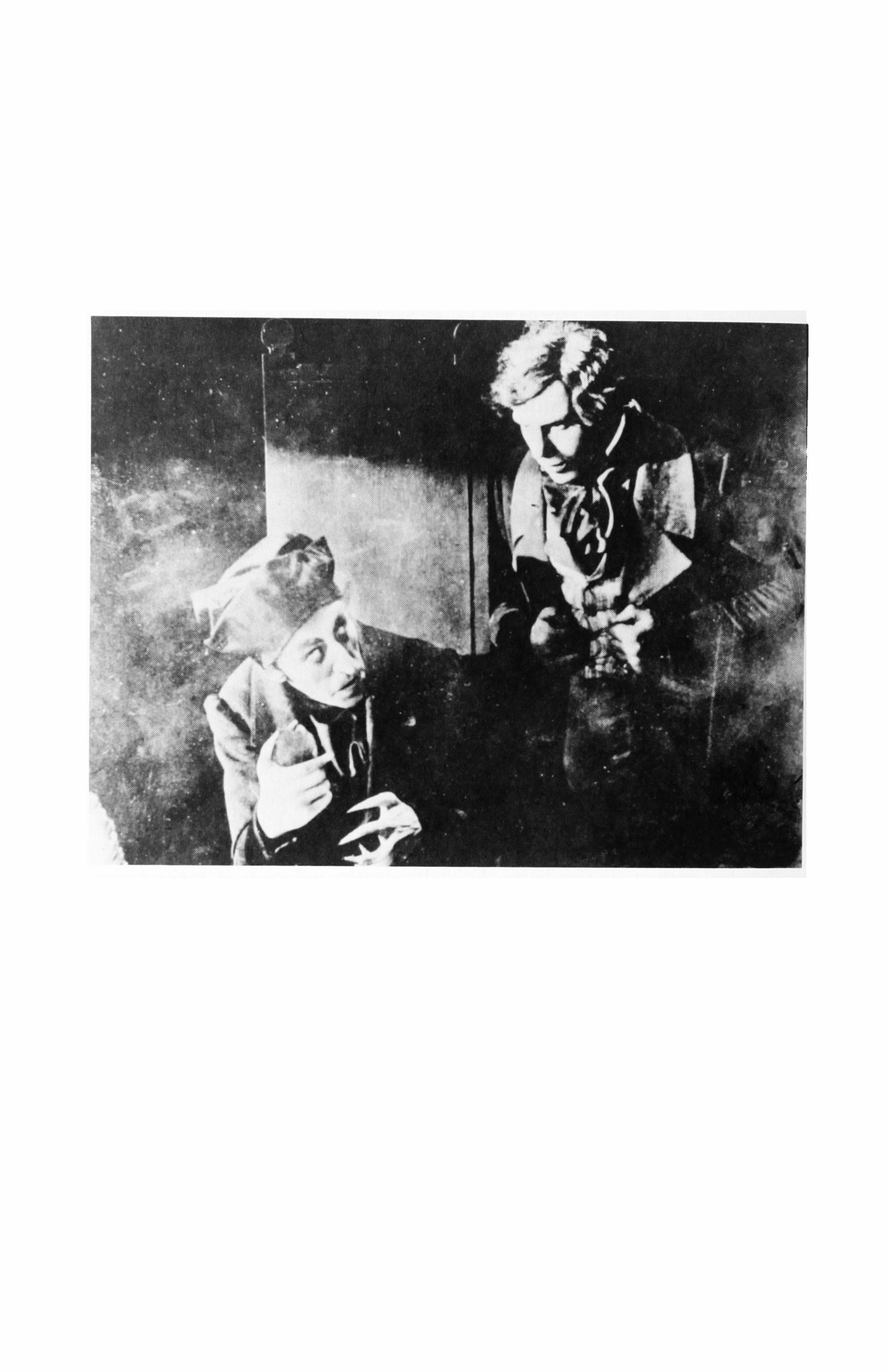
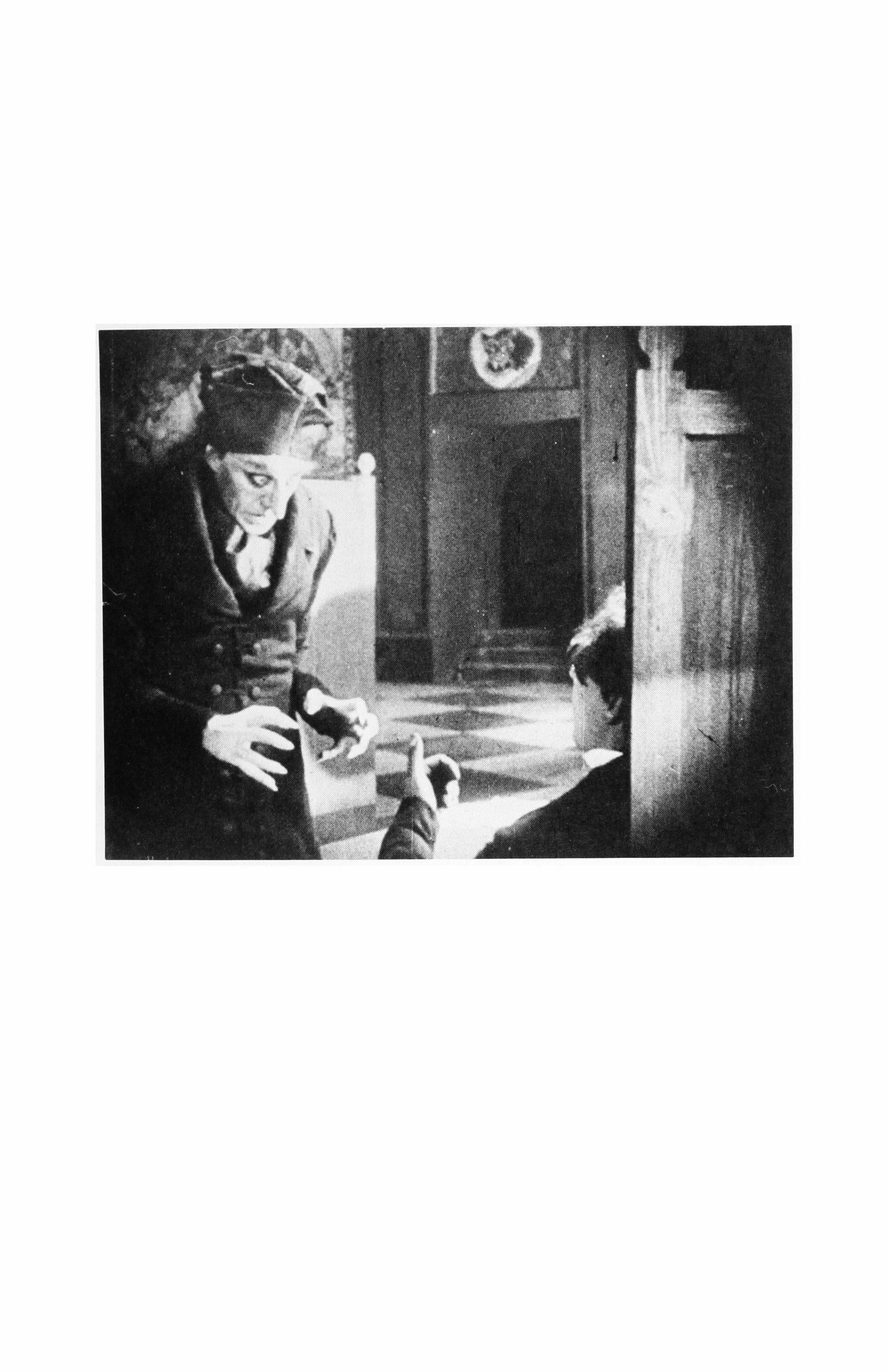
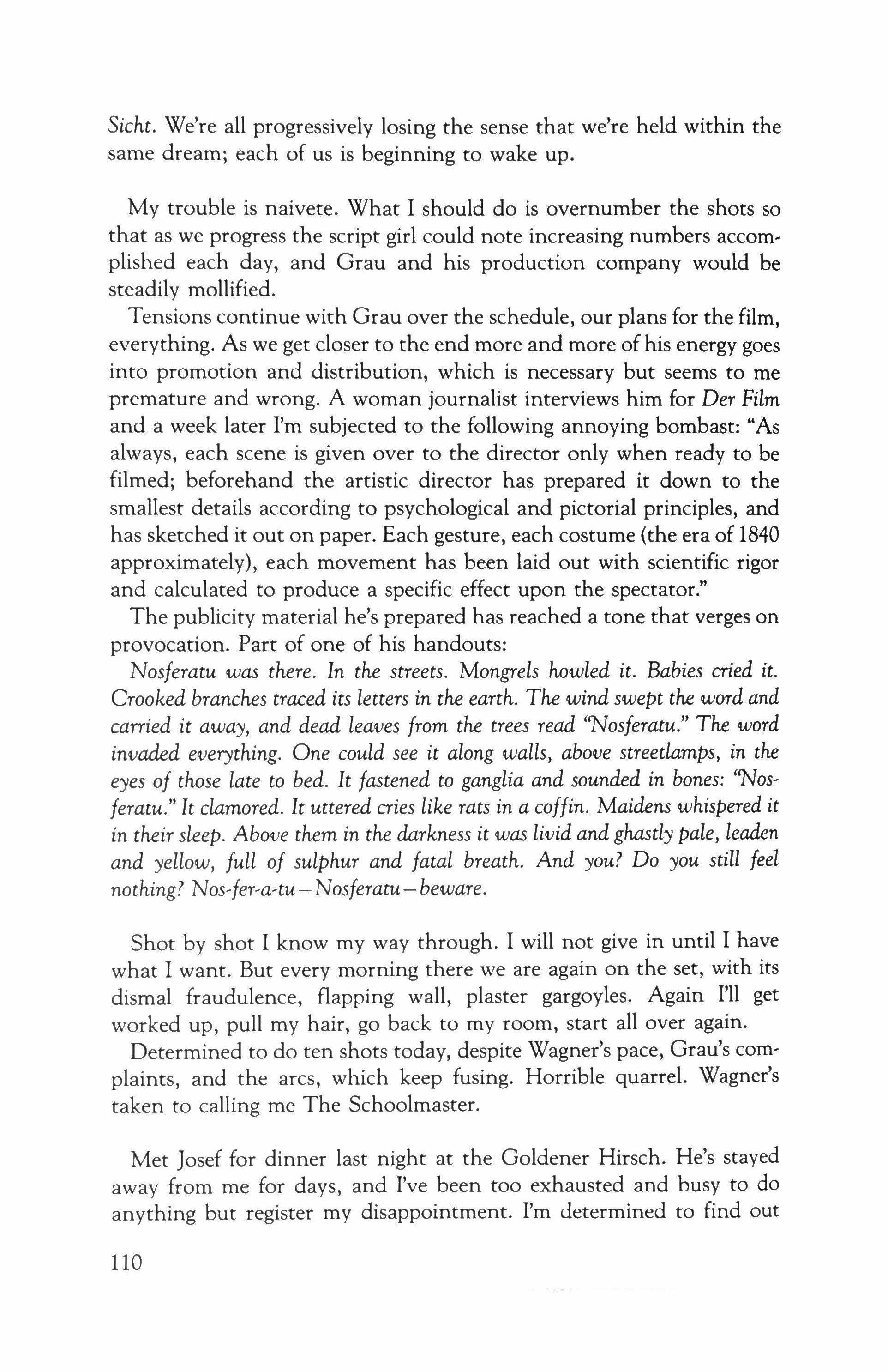
Sicht. We're all progressively losing the sense that we're held within the same dream; each of us is beginning to wake up.
My trouble is naivete. What I should do is overnumber the shots so that as we progress the script girl could note increasing numbers accomplished each day, and Grau and his production company would be steadily mollified.
Tensions continue with Grau over the schedule, our plans for the film, everything. As we get closer to the end more and more of his energy goes into promotion and distribution, which is necessary but seems to me premature and wrong. A woman journalist interviews him for Der Film and a week later I'm subjected to the following annoying bombast: "As always, each scene is given over to the director only when ready to be filmed; beforehand the artistic director has prepared it down to the smallest details according to psychological and pictorial principles, and has sketched it out on paper. Each gesture, each costume (the era of 1840 approximately), each movement has been laid out with scientific rigor and calculated to produce a specific effect upon the spectator."
The publicity material he's prepared has reached a tone that verges on provocation. Part of one of his handouts:
Nosferatu was there. In the streets. Mongrels howled it. Babies cried it. Crooked branches traced its letters in the earth. The wind swept the word and carried it away, and dead leaves from the trees read "Nosietasu,' The word invaded everything. One could see it along walls, above streetlamps, in the eyes of those late to bed. It fastened to ganglia and sounded in bones: "Nosferatu." It clamored. It uttered cries like rats in a coffin. Maidens whispered it in their sleep. Above them in the darkness it was livid and ghastly pale, leaden and yellow, full of sulphur and fatal breath. And you? Do you still feel nothing? Nos-fer-a-tu-Nosferatu-beware.
Shot by shot I know my way through. I will not give in until I have what I want. But every morning there we are again on the set, with its dismal fraudulence, flapping wall, plaster gargoyles. Again I'll get worked up, pull my hair, go back to my room, start all over again.
Determined to do ten shots today, despite Wagner's pace, Grau's complaints, and the arcs, which keep fusing. Horrible quarrel. Wagner's taken to calling me The Schoolmaster.
Met Josef for dinner last night at the Goldener Hirsch. He's stayed away from me for days, and I've been too exhausted and busy to do anything but register my disappointment. I'm determined to find out
110
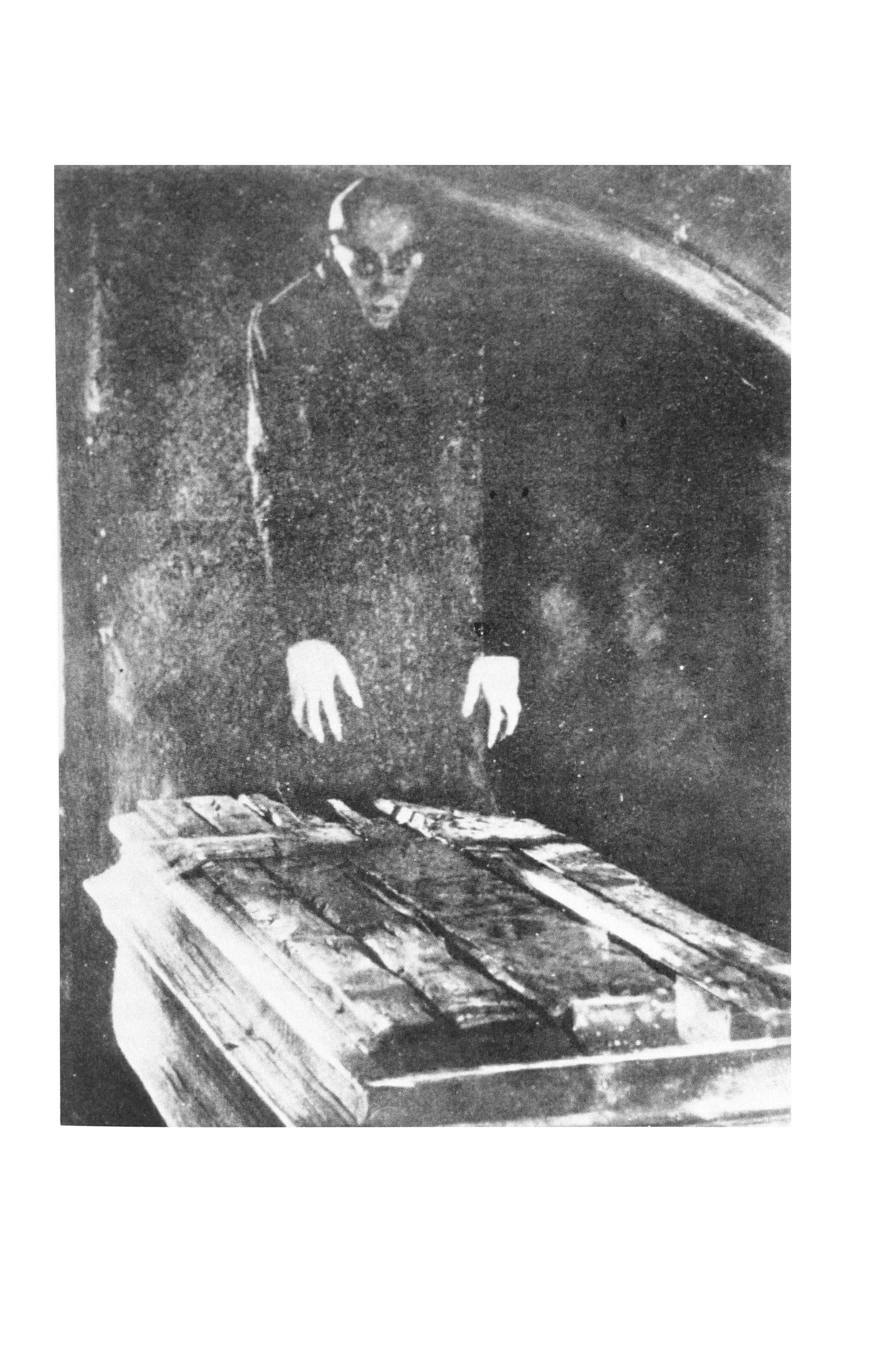

how much is innocence and how much is coyness. Determined to match words to body in terms of our intimacy. This meeting arranged awkwardly, days in advance. While we were being seated, Wangenheim wandered by. It's as though I'm living in a Feydeau farce. Josef seemed frightened, uneasy; I was exhausted and short-tempered. A bad start.
The first stalking of Hutter, in his room in the castle, huddled behind the door. He opens it a crack. View deep into dining hall. By the fireplace the Nosferatu, motionless, arms down, confrontationally stark against the background. Horrible lack of movement. Hutter supports himself on the doorpost. Terrible realizations dawning. Shut the door, shut it quickly! No bolt. No lock. He rushes to the window. (View of the forest at night: undergrowth; wolves raising their heads, howling.) The contrast between Hutter's movements and the Nosferatu's: frenzied panic vs. the terrible evenness of the advance. Hutter on his knees by the side of the bed. Stares at the door, which opens to half its width; opens fully. Superimpositions of progressively closer shots of the vampire, producing movement without movement, the figure swelling within the frame, the mechanism of nightmare. Wagner has the genius idea of having the figure penetrate a powerful light emanating from the side just as he enters the doorway. Four days of work.
Two weeks left. Hardly eating. That same woman journalist from Dei Film told me today my face was like "two profiles stuck together." Ellen's room, her decision to sacrifice herself, the final approach of the vampire, all still left. Two days of work on Ellen reading The Book of Vampires, until my temples are throbbing, my cheeks burning, my whole frame shivering. A few hours in my room drinking hot soup. Realizing mistakes I made by plunging on at such a pace; but besides the lack of time, I feel myselffighting to prevent any kind of indecision at this point from demoralizing the unit.
My headaches worse. My kidneys breaking down. Berliners are tactless and cruel. On a bus yesterday a young lieutenant seated me with a flourish. The spectacle of this disintegrating thirty-three-year-old seems to make people laugh.
Take after take of Ellen at the window, seeing the Nosferatu. Greta not up to it. Wagner has the inhumanity of all cameramen; he calibrates the lights at his own pace without noticing that Greta all that time is swaying on her feet. Grau looks on, his arms folded. The nerve storm
112
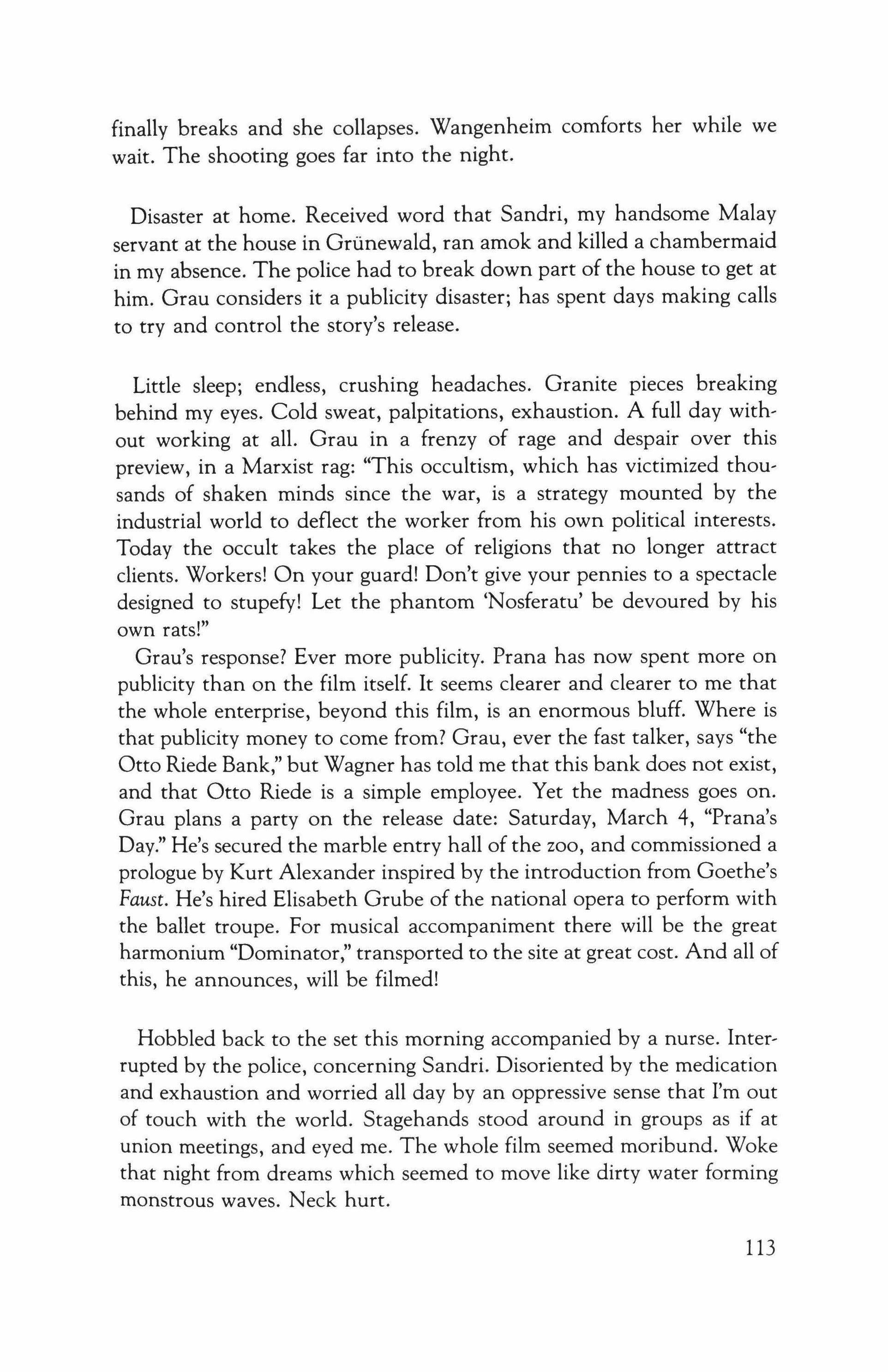
finally breaks and she collapses. Wangenheim comforts her while we wait. The shooting goes far into the night.
Disaster at home. Received word that Sandri, my handsome Malay servant at the house in Grunewald, ran amok and killed a chambermaid in my absence. The police had to break down part of the house to get at him. Grau considers it a publicity disaster; has spent days making calls to try and control the story's release.
Little sleep; endless, crushing headaches. Granite pieces breaking behind my eyes. Cold sweat, palpitations, exhaustion. A full day without working at all. Grau in a frenzy of rage and despair over this preview, in a Marxist rag: "This occultism, which has victimized thousands of shaken minds since the war, is a strategy mounted by the industrial world to deflect the worker from his own political interests. Today the occult takes the place of religions that no longer attract clients. Workers! On your guard! Don't give your pennies to a spectacle designed to stupefy! Let the phantom 'Nosferatu' be devoured by his own rats!"
Grau's response? Ever more publicity. Prana has now spent more on publicity than on the film itself. It seems clearer and clearer to me that the whole enterprise, beyond this film, is an enormous bluff. Where is that publicity money to come from? Grau, ever the fast talker, says "the Otto Riede Bank," but Wagner has told me that this bank does not exist, and that Otto Riede is a simple employee. Yet the madness goes on. Grau plans a party on the release date: Saturday, March 4, "Prana's Day." He's secured the marble entry hall of the zoo, and commissioned a prologue by Kurt Alexander inspired by the introduction from Goethe's Faust. He's hired Elisabeth Grube of the national opera to perform with the ballet troupe. For musical accompaniment there will be the great harmonium "Dominator," transported to the site at great cost. And all of this, he announces, will be filmed!
Hobbled back to the set this morning accompanied by a nurse. Interrupted by the police, concerning Sandri. Disoriented by the medication and exhaustion and worried all day by an oppressive sense that I'm out of touch with the world. Stagehands stood around in groups as if at union meetings, and eyed me. The whole film seemed moribund. Woke that night from dreams which seemed to move like dirty water forming monstrous waves. Neck hurt.
113
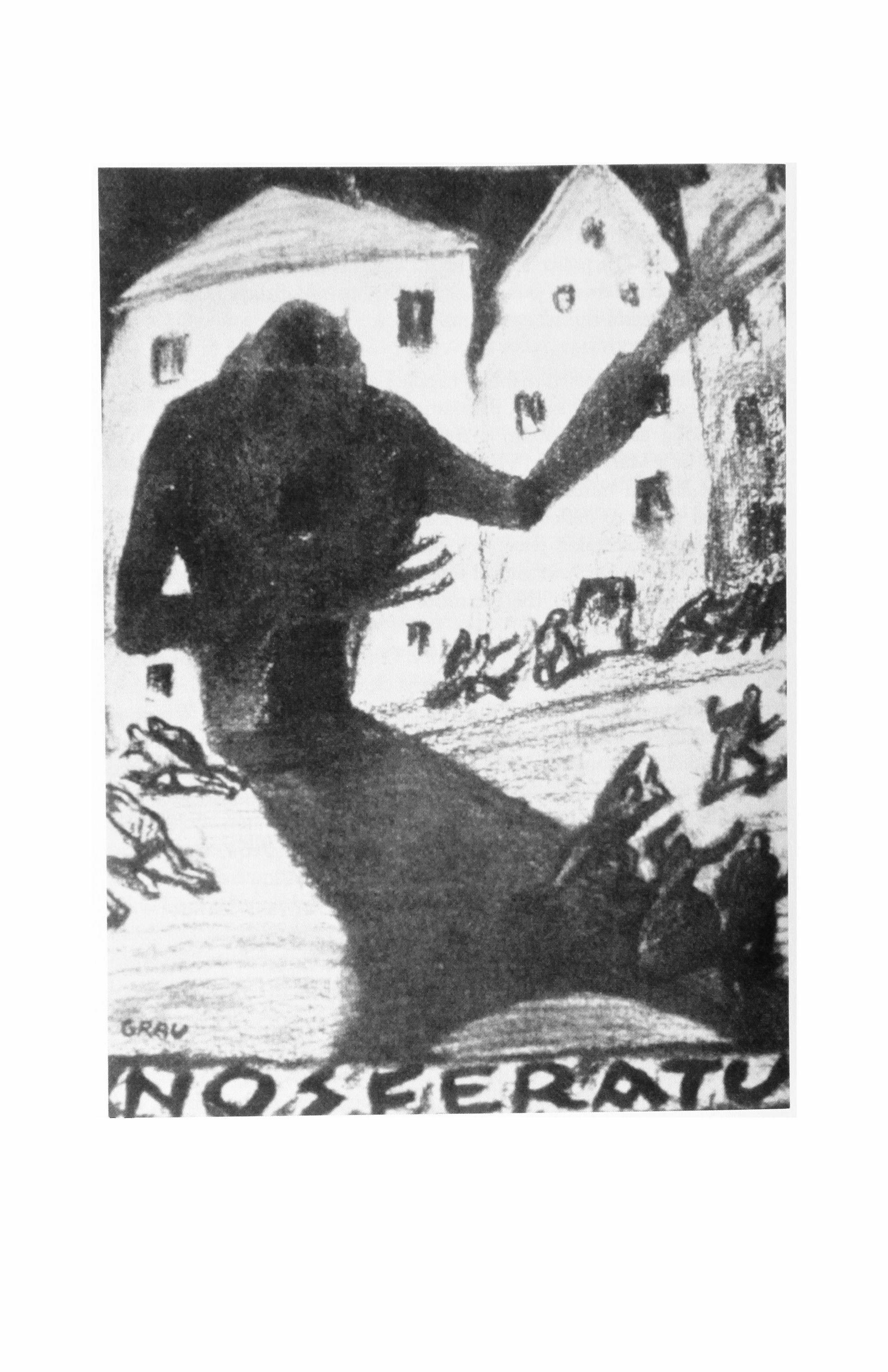
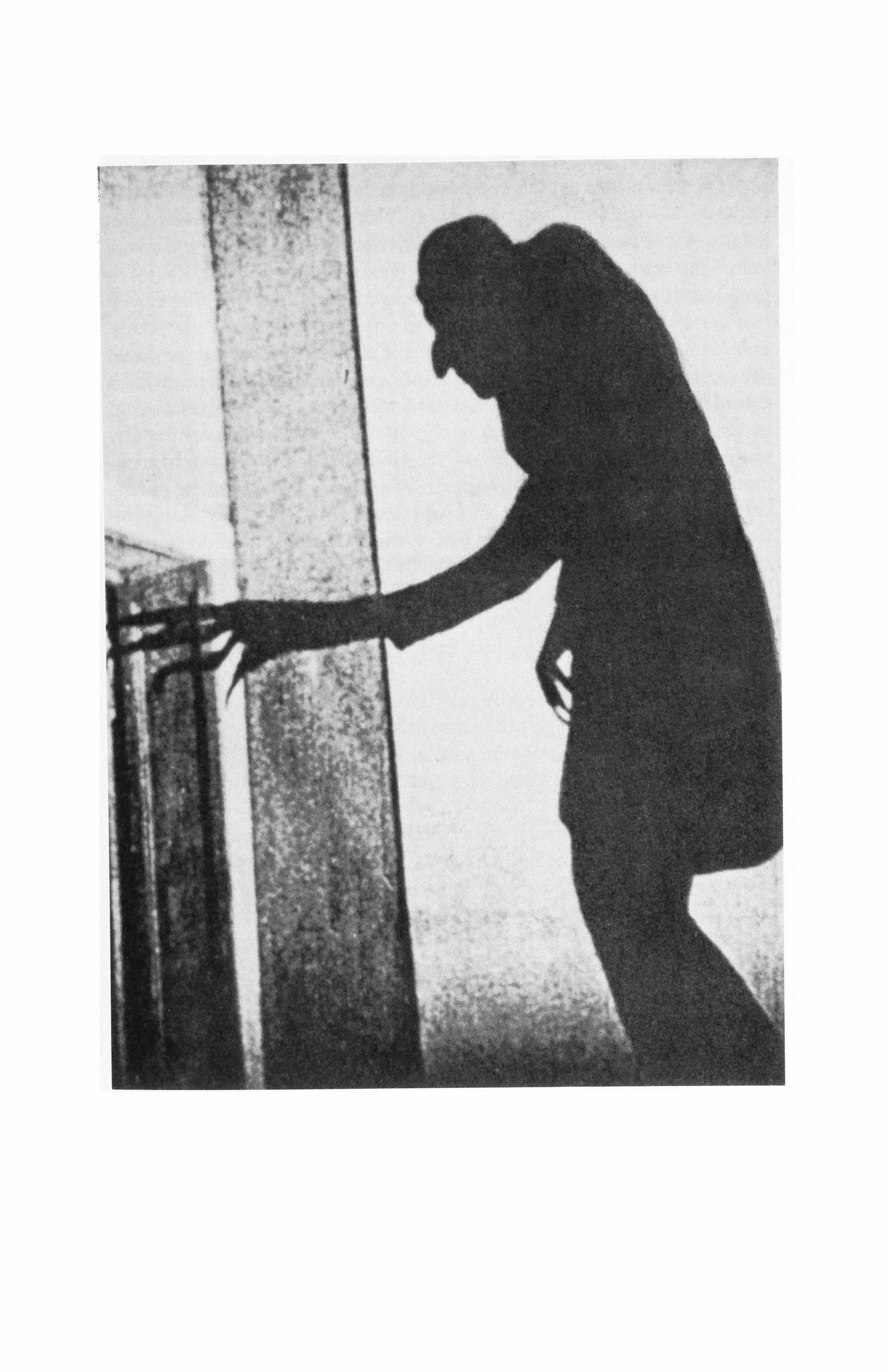
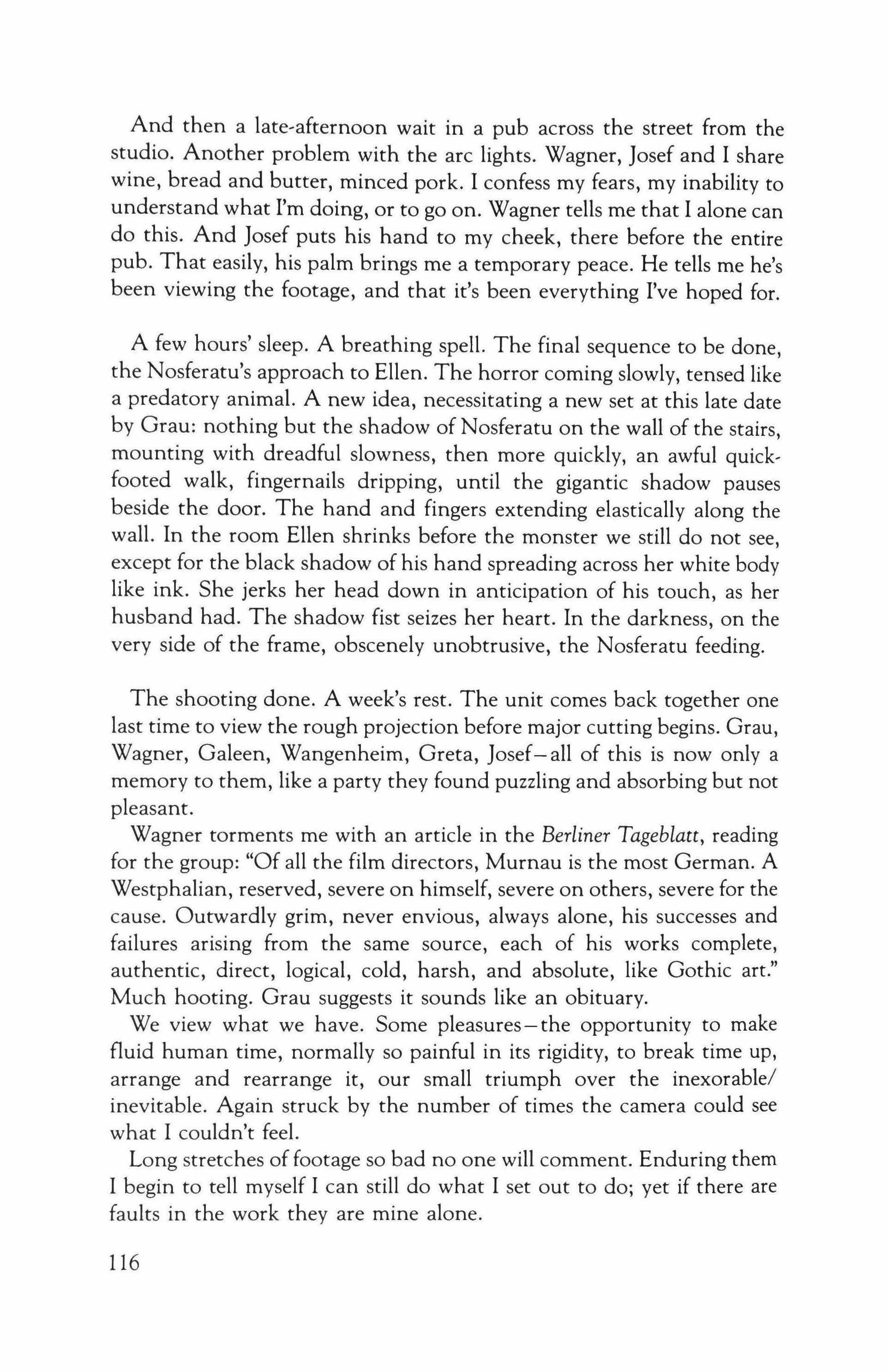
And then a late-afternoon wait in a pub across the street from the studio. Another problem with the arc lights. Wagner, Josef and I share wine, bread and butter, minced pork. I confess my fears, my inability to understand what I'm doing, or to go on. Wagner tells me that I alone can do this. And Josef puts his hand to my cheek, there before the entire pub. That easily, his palm brings me a temporary peace. He tells me he's been viewing the footage, and that it's been everything I've hoped for.
A few hours' sleep. A breathing spell. The final sequence to be done, the Nosferatu's approach to Ellen. The horror coming slowly, tensed like a predatory animal. A new idea, necessitating a new set at this late date by Grau: nothing but the shadow of Nosferatu on the wall of the stairs, mounting with dreadful slowness, then more quickly, an awful quickfooted walk, fingernails dripping, until the gigantic shadow pauses beside the door. The hand and fingers extending elastically along the wall. In the room Ellen shrinks before the monster we still do not see, except for the black shadow of his hand spreading across her white body like ink. She jerks her head down in anticipation of his touch, as her husband had. The shadow fist seizes her heart. In the darkness, on the very side of the frame, obscenely unobtrusive, the Nosferatu feeding.
The shooting done. A week's rest. The unit comes back together one last time to view the rough projection before major cutting begins. Grau, Wagner, Galeen, Wangenheim, Greta, Josef-all of this is now only a memory to them, like a party they found puzzling and absorbing but not pleasant.
Wagner torments me with an article in the Berliner Tageblatt, reading for the group: "Of all the film directors, Murnau is the most German. A Westphalian, reserved, severe on himself, severe on others, severe for the cause. Outwardly grim, never envious, always alone, his successes and failures arising from the same source, each of his works complete, authentic, direct, logical, cold, harsh, and absolute, like Gothic art." Much hooting. Grau suggests it sounds like an obituary.
We view what we have. Some pleasures-the opportunity to make fluid human time, normally so painful in its rigidity, to break time up, arrange and rearrange it, our small triumph over the inexorable/ inevitable. Again struck by the number of times the camera could see what I couldn't feel.
Long stretches of footage so bad no one will comment. Enduring them I begin to tell myself I can still do what I set out to do; yet if there are faults in the work they are mine alone.
116
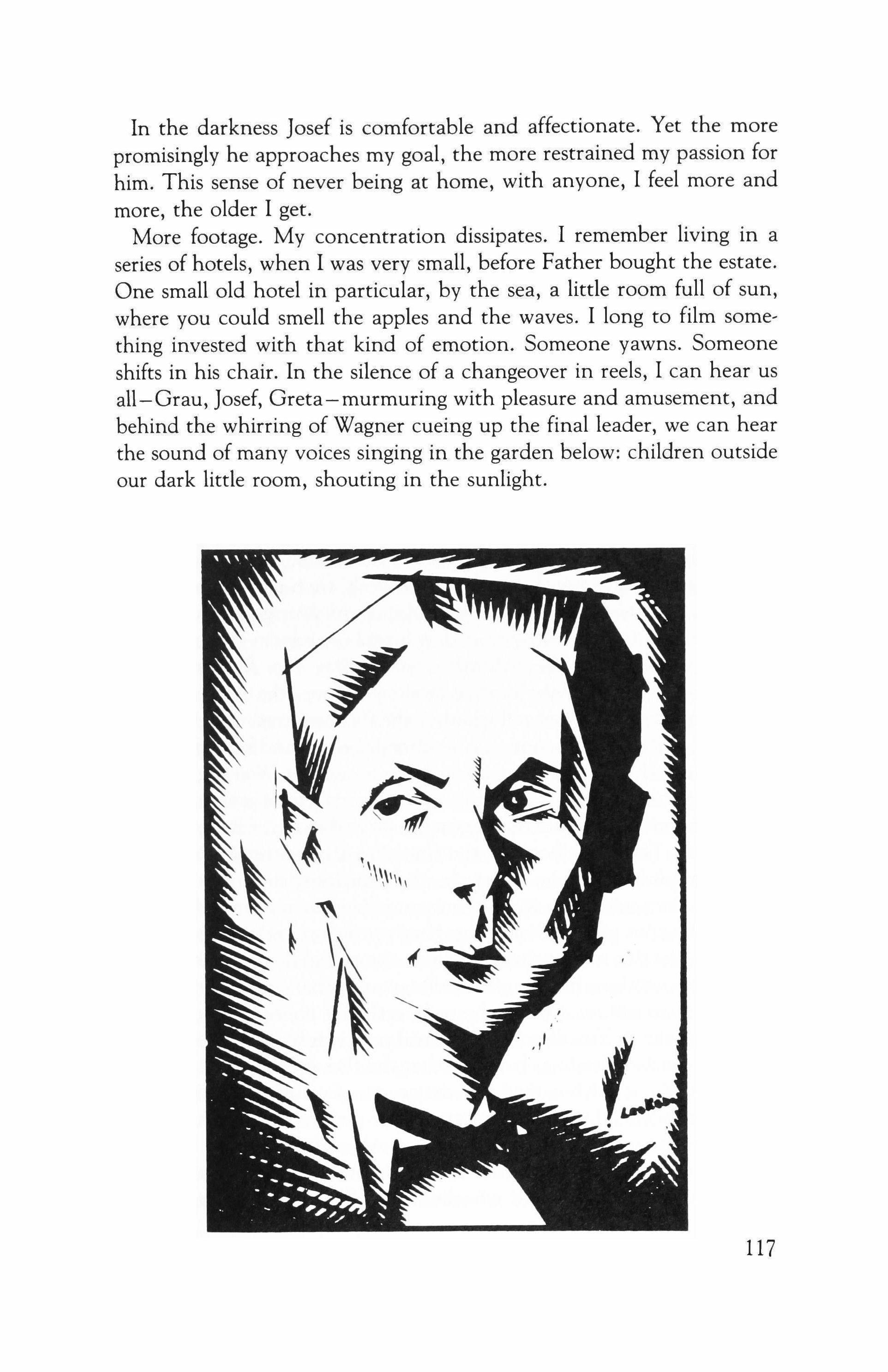
In the darkness Josef is comfortable and affectionate. Yet the more promisingly he approaches my goal, the more restrained my passion for him. This sense of never being at home, with anyone, I feel more and more, the older I get.
More footage. My concentration dissipates. I remember living in a series of hotels, when I was very small, before Father bought the estate. One small old hotel in particular, by the sea, a little room full of sun, where you could smell the apples and the waves. I long to film something invested with that kind of emotion. Someone yawns. Someone shifts in his chair. In the silence of a changeover in reels, I can hear us all-Grau, Josef, Greta-murmuring with pleasure and amusement, and behind the whirring of Wagner cueing up the final leader, we can hear the sound of many voices singing in the garden below: children outside our dark little room, shouting in the sunlight.
117
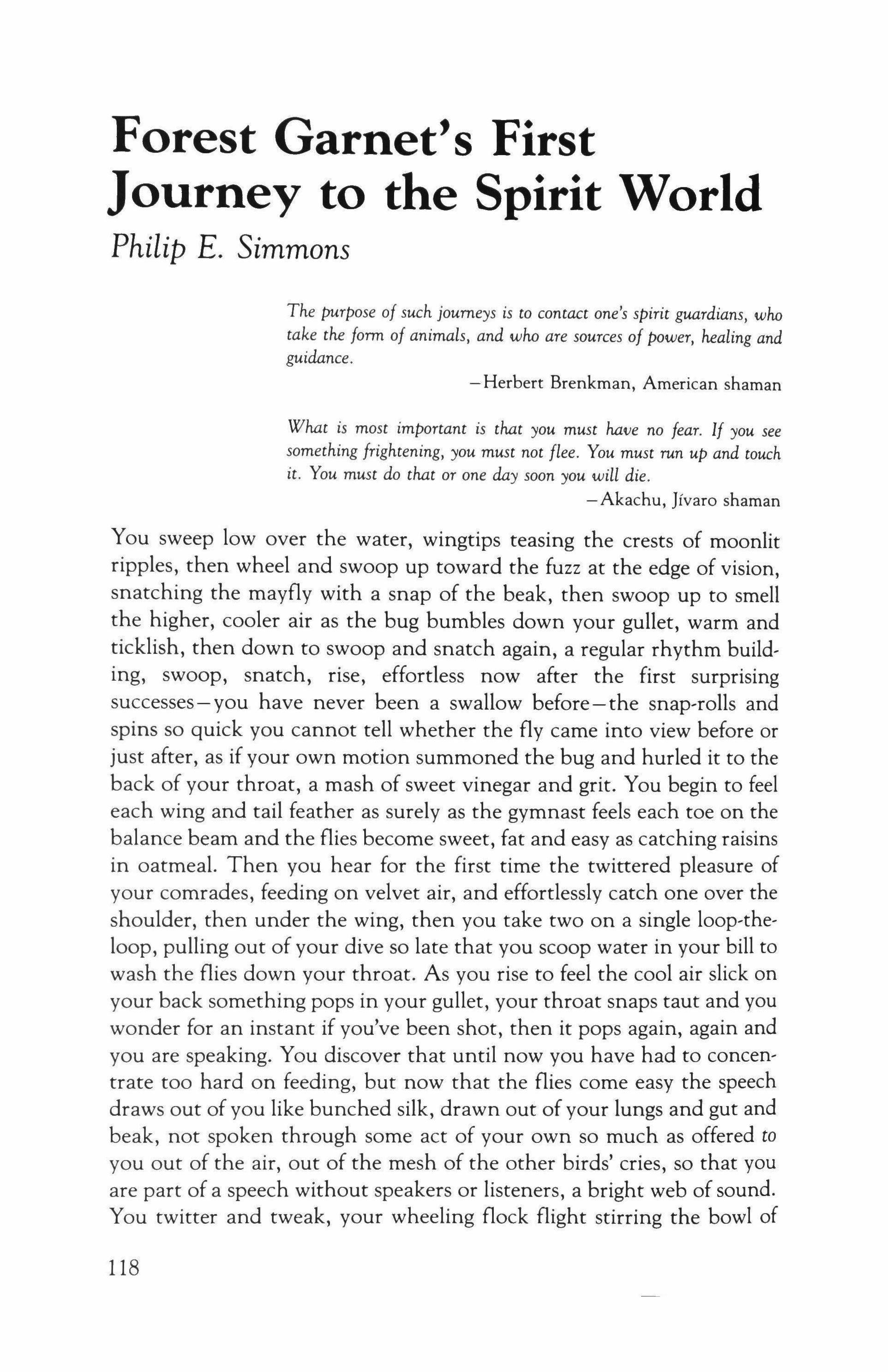
Forest Garnet's First
Journey to the Spirit World
Philip E. Simmons
The purpose of such journeys is to contact one's spirit guardians, who take the form of animals, and who are sources of power, healing and guidance.
- Herbert Brenkman, American shaman
What is most important is that you must have no fear. If you see something frightening, you must not flee. You must run up and touch it. You must do that or one day soon you will die.
-Akachu, [Ivaro shaman
You sweep low over the water, wingtips teasing the crests of moonlit ripples, then wheel and swoop up toward the fuzz at the edge of vision, snatching the mayfly with a snap of the beak, then swoop up to smell the higher, cooler air as the bug bumbles down your gullet, warm and ticklish, then down to swoop and snatch again, a regular rhythm building, swoop, snatch, rise, effortless now after the first surprising successes-you have never been a swallow before-the snap-rolls and spins so quick you cannot tell whether the fly came into view before or just after, as if your own motion summoned the bug and hurled it to the back of your throat, a mash of sweet vinegar and grit. You begin to feel each wing and tail feather as surely as the gymnast feels each toe on the balance beam and the flies become sweet, fat and easy as catching raisins in oatmeal. Then you hear for the first time the twittered pleasure of your comrades, feeding on velvet air, and effortlessly catch one over the shoulder, then under the wing, then you take two on a single loop-theloop, pulling out of your dive so late that you scoop water in your bill to wash the flies down your throat. As you rise to feel the cool air slick on your back something pops in your gullet, your throat snaps taut and you wonder for an instant if you've been shot, then it pops again, again and you are speaking. You discover that until now you have had to concentrate too hard on feeding, but now that the flies come easy the speech draws out of you like bunched silk, drawn out of your lungs and gut and beak, not spoken through some act of your own so much as offered to you out of the air, out of the mesh of the other birds' cries, so that you are part of a speech without speakers or listeners, a bright web of sound. You twitter and tweak, your wheeling flock flight stirring the bowl of
118
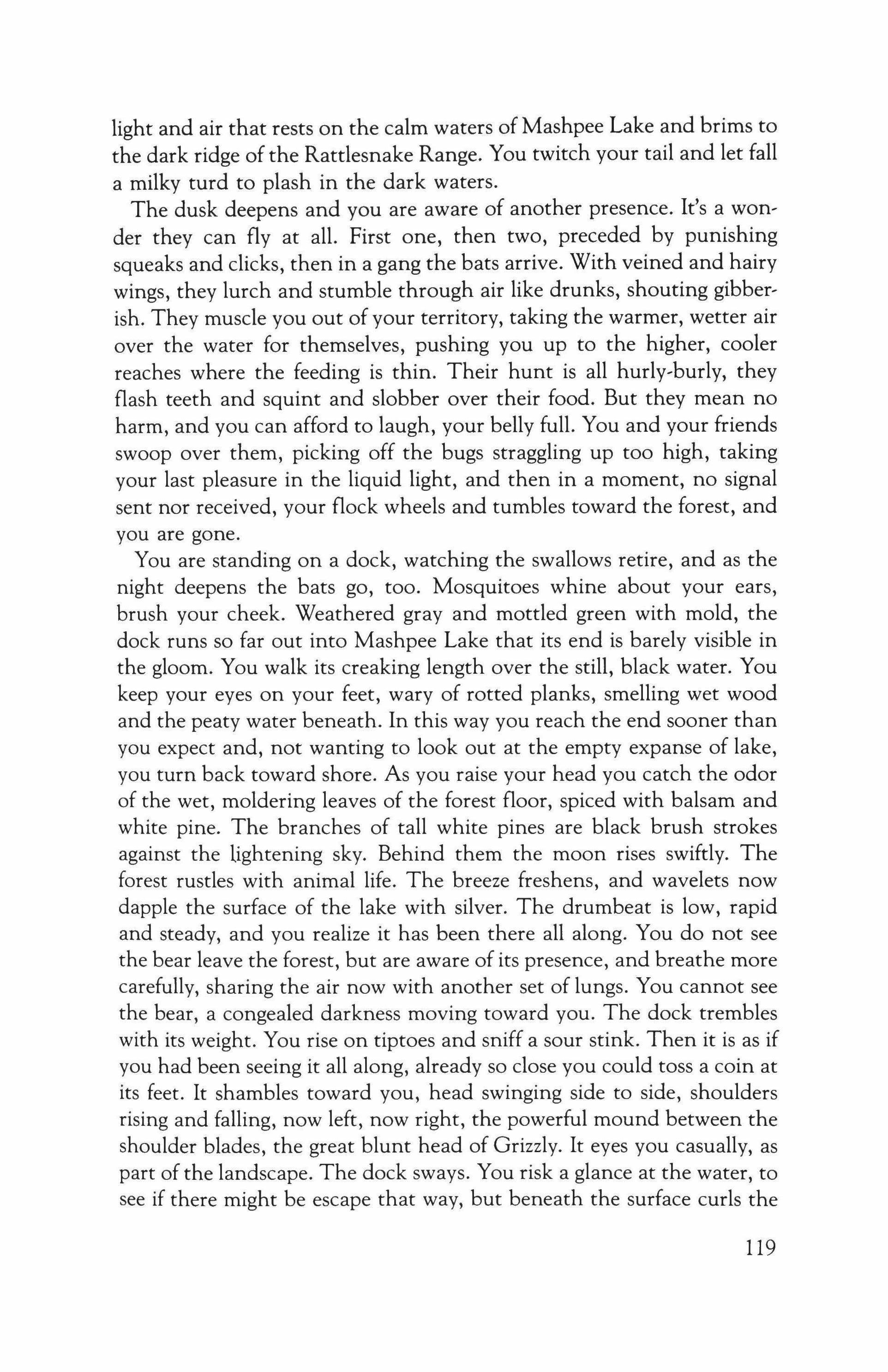
light and air that rests on the calm waters of Mashpee Lake and brims to the dark ridge of the Rattlesnake Range. You twitch your tail and let fall a milky turd to plash in the dark waters.
The dusk deepens and you are aware of another presence. It's a won, der they can fly at all. First one, then two, preceded by punishing squeaks and clicks, then in a gang the bats arrive. With veined and hairy wings, they lurch and stumble through air like drunks, shouting gibber, ish. They muscle you out of your territory, taking the warmer, wetter air over the water for themselves, pushing you up to the higher, cooler reaches where the feeding is thin. Their hunt is all hurlv-burly, they flash teeth and squint and slobber over their food. But they mean no harm, and you can afford to laugh, your belly full. You and your friends swoop over them, picking off the bugs straggling up too high, taking your last pleasure in the liquid light, and then in a moment, no signal sent nor received, your flock wheels and tumbles toward the forest, and you are gone.
You are standing on a dock, watching the swallows retire, and as the night deepens the bats go, too. Mosquitoes whine about your ears, brush your cheek. Weathered gray and mottled green with mold, the dock runs so far out into Mashpee Lake that its end is barely visible in the gloom. You walk its creaking length over the still, black water. You keep your eyes on your feet, wary of rotted planks, smelling wet wood and the peaty water beneath. In this way you reach the end sooner than you expect and, not wanting to look out at the empty expanse of lake, you turn back toward shore. As you raise your head you catch the odor of the wet, moldering leaves of the forest floor, spiced with balsam and white pine. The branches of tall white pines are black brush strokes against the lightening sky. Behind them the moon rises swiftly. The forest rustles with animal life. The breeze freshens, and wavelets now dapple the surface of the lake with silver. The drumbeat is low, rapid and steady, and you realize it has been there all along. You do not see the bear leave the forest, but are aware of its presence, and breathe more carefully, sharing the air now with another set of lungs. You cannot see the bear, a congealed darkness moving toward you. The dock trembles with its weight. You rise on tiptoes and sniff a sour stink. Then it is as if you had been seeing it all along, already so close you could toss a coin at its feet. It shambles toward you, head swinging side to side, shoulders rising and falling, now left, now right, the powerful mound between the shoulder blades, the great blunt head of Grizzly. It eyes you casually, as part of the landscape. The dock sways. You risk a glance at the water, to see if there might be escape that way, but beneath the surface curls the
119
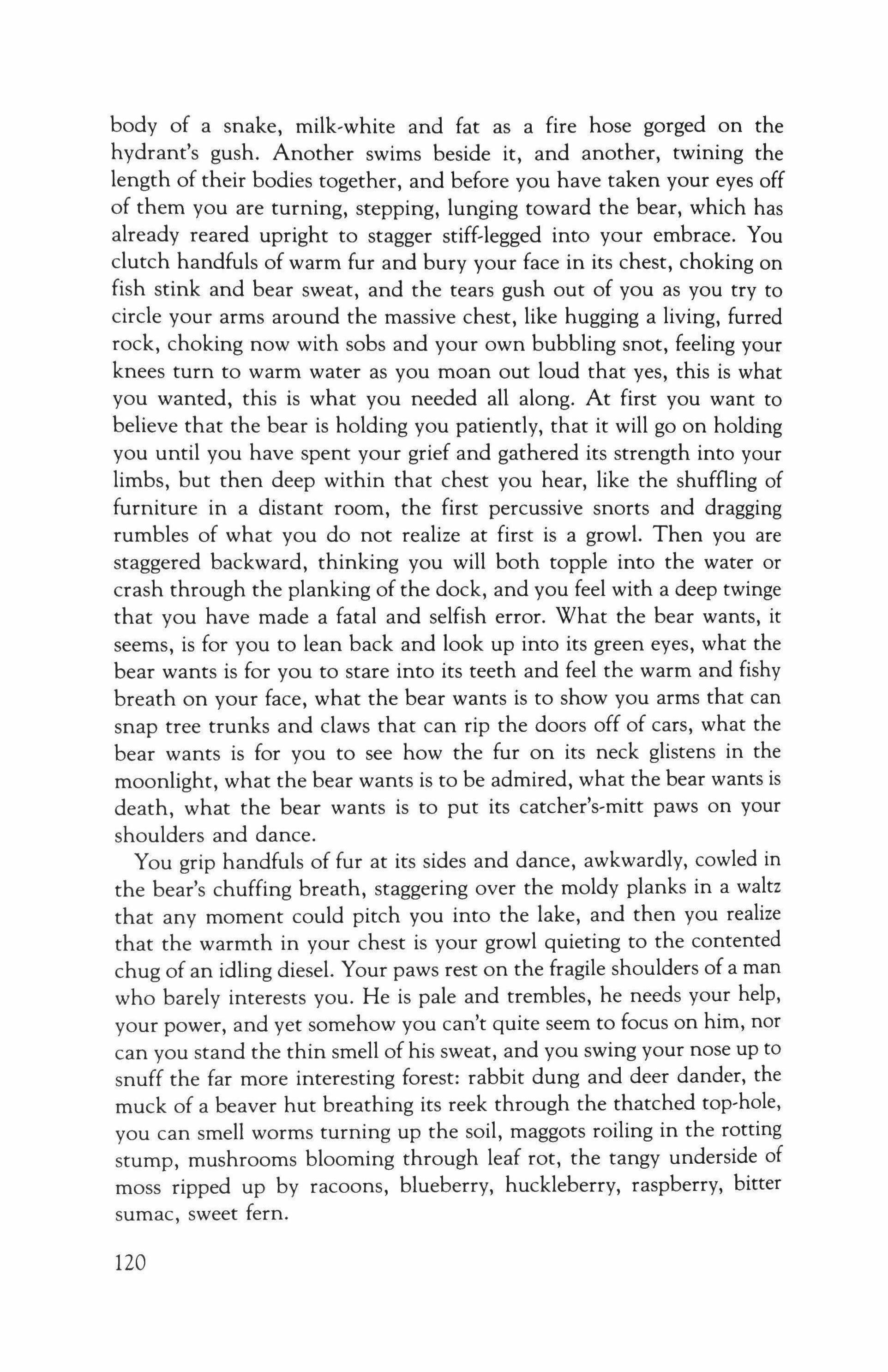
body of a snake, milk-white and fat as a fire hose gorged on the hydrant's gush. Another swims beside it, and another, twining the length of their bodies together, and before you have taken your eyes off of them you are turning, stepping, lunging toward the bear, which has already reared upright to stagger stiff-legged into your embrace. You clutch handfuls of warm fur and bury your face in its chest, choking on fish stink and bear sweat, and the tears gush out of you as you try to circle your arms around the massive chest, like hugging a living, furred rock, choking now with sobs and your own bubbling snot, feeling your knees turn to warm water as you moan out loud that yes, this is what you wanted, this is what you needed all along. At first you want to believe that the bear is holding you patiently, that it will go on holding you until you have spent your grief and gathered its strength into your limbs, but then deep within that chest you hear, like the shuffling of furniture in a distant room, the first percussive snorts and dragging rumbles of what you do not realize at first is a growl. Then you are staggered backward, thinking you will both topple into the water or crash through the planking of the dock, and you feel with a deep twinge that you have made a fatal and selfish error. What the bear wants, it seems, is for you to lean back and look up into its green eyes, what the bear wants is for you to stare into its teeth and feel the warm and fishy breath on your face, what the bear wants is to show you arms that can snap tree trunks and claws that can rip the doors off of cars, what the bear wants is for you to see how the fur on its neck glistens in the moonlight, what the bear wants is to be admired, what the bear wants is death, what the bear wants is to put its catcher's-mitt paws on your shoulders and dance.
You grip handfuls of fur at its sides and dance, awkwardly, cowled in the bear's chuffing breath, staggering over the moldy planks in a waltz that any moment could pitch you into the lake, and then you realize that the warmth in your chest is your growl quieting to the contented chug of an idling diesel. Your paws rest on the fragile shoulders of a man who barely interests you. He is pale and trembles, he needs your help, your power, and yet somehow you can't quite seem to focus on him, nor can you stand the thin smell of his sweat, and you swing your nose up to snuff the far more interesting forest: rabbit dung and deer dander, the muck of a beaver hut breathing its reek through the thatched top-hole, you can smell worms turning up the soil, maggots roiling in the rotting stump, mushrooms blooming through leaf rot, the tangy underside of moss ripped up by racoons, blueberry, huckleberry, raspberry, bitter sumac, sweet fern.
120
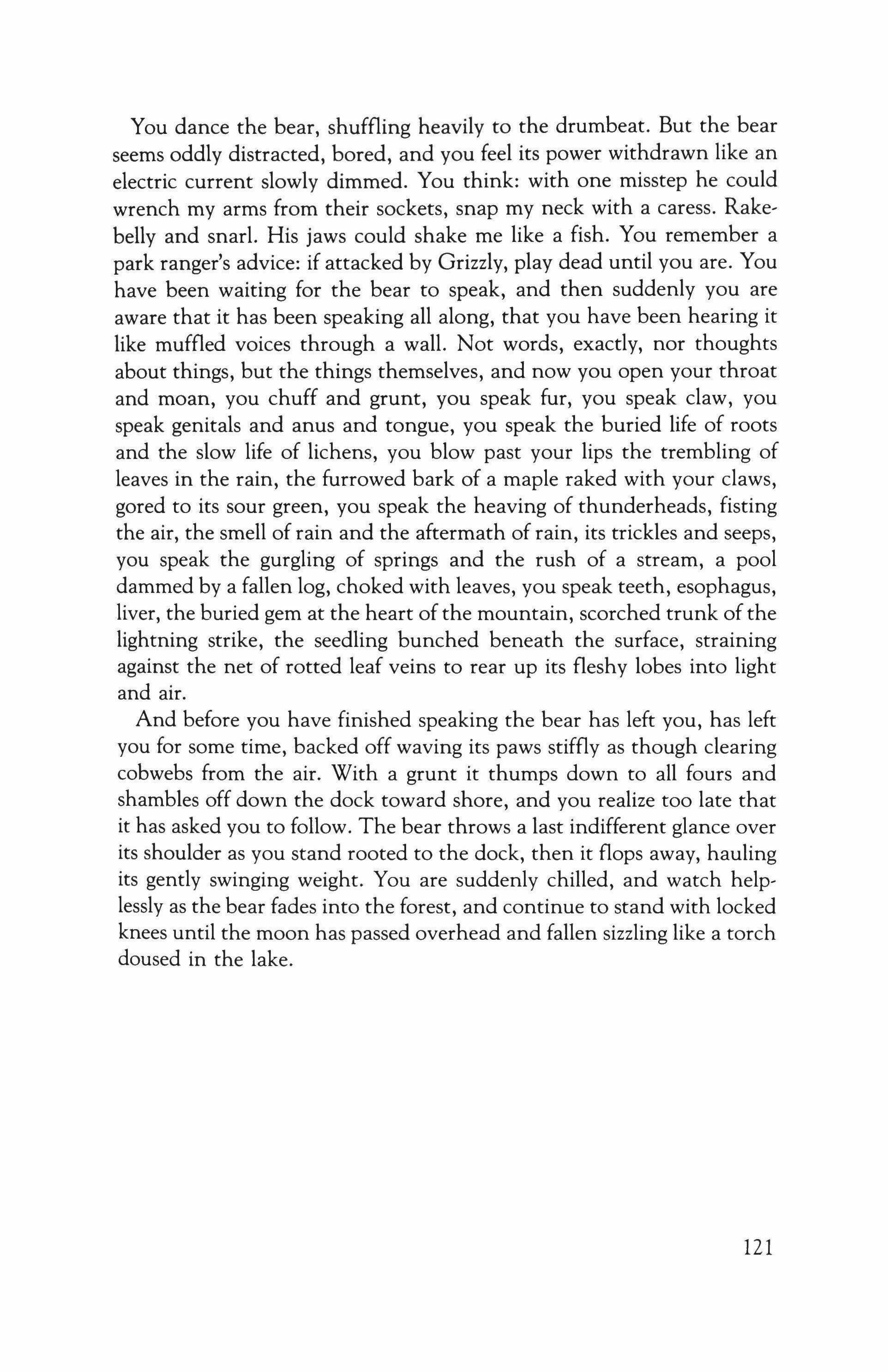
You dance the bear, shuffling heavily to the drumbeat. But the bear seems oddly distracted, bored, and you feel its power withdrawn like an electric current slowly dimmed. You think: with one misstep he could wrench my arms from their sockets, snap my neck with a caress. Rake, belly and snarl. His jaws could shake me like a fish. You remember a park ranger's advice: if attacked by Grizzly, play dead until you are. You have been waiting for the bear to speak, and then suddenly you are aware that it has been speaking all along, that you have been hearing it like muffled voices through a wall. Not words, exactly, nor thoughts about things, but the things themselves, and now you open your throat and moan, you chuff and grunt, you speak fur, you speak claw, you speak genitals and anus and tongue, you speak the buried life of roots and the slow life of lichens, you blow past your lips the trembling of leaves in the rain, the furrowed bark of a maple raked with your claws, gored to its sour green, you speak the heaving of thunderheads, fisting the air, the smell of rain and the aftermath of rain, its trickles and seeps, you speak the gurgling of springs and the rush of a stream, a pool dammed by a fallen log, choked with leaves, you speak teeth, esophagus, liver, the buried gem at the heart of the mountain, scorched trunk ofthe lightning strike, the seedling bunched beneath the surface, straining against the net of rotted leaf veins to rear up its fleshy lobes into light and air.
And before you have finished speaking the bear has left you, has left you for some time, backed off waving its paws stiffly as though clearing cobwebs from the air. With a grunt it thumps down to all fours and shambles off down the dock toward shore, and you realize too late that it has asked you to follow. The bear throws a last indifferent glance over its shoulder as you stand rooted to the dock, then it flops away, hauling its gently swinging weight. You are suddenly chilled, and watch help, lessly as the bear fades into the forest, and continue to stand with locked knees until the moon has passed overhead and fallen sizzling like a torch doused in the lake.
121
Small Adjustments
Caila Rossi
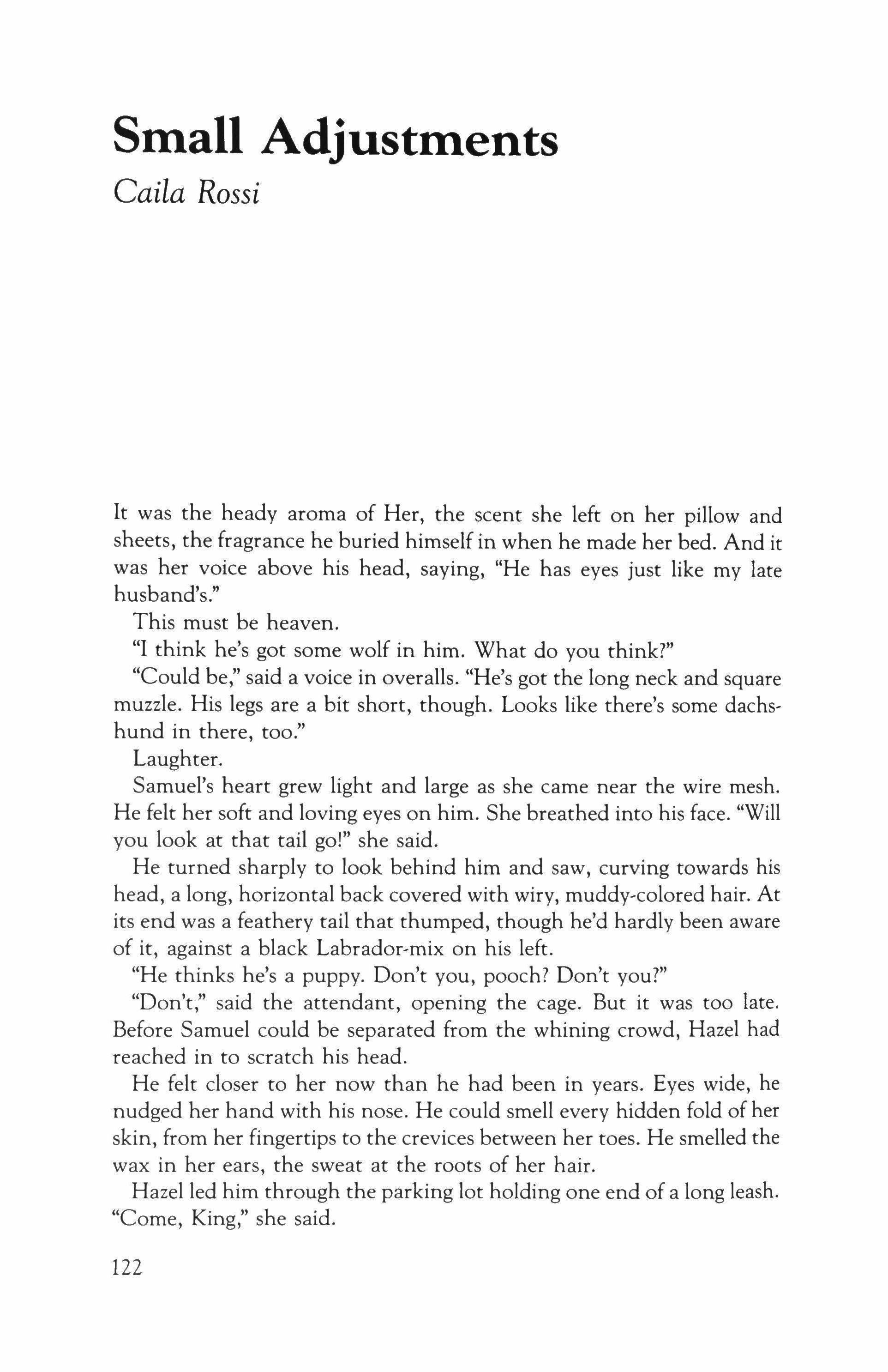
It was the heady aroma of Her, the scent she left on her pillow and sheets, the fragrance he buried himself in when he made her bed. And it was her voice above his head, saying, "He has eyes just like my late husband's."
This must be heaven.
"I think he's got some wolf in him. What do you think?"
"Could be," said a voice in overalls. "He's got the long neck and square muzzle. His legs are a bit short, though. Looks like there's some dachshund in there, too."
Laughter.
Samuel's heart grew light and large as she came near the wire mesh. He felt her soft and loving eyes on him. She breathed into his face. "Will you look at that tail go!" she said.
He turned sharply to look behind him and saw, curving towards his head, a long, horizontal back covered with wiry, muddy-colored hair. At its end was a feathery tail that thumped, though he'd hardly been aware of it, against a black Labrador-mix on his left.
"He thinks he's a puppy. Don't you, pooch? Don't you?"
"Don't," said the attendant, opening the cage. But it was too late. Before Samuel could be separated from the whining crowd, Hazel had reached in to scratch his head.
He felt closer to her now than he had been in years. Eyes wide, he nudged her hand with his nose. He could smell every hidden fold of her skin, from her fingertips to the crevices between her toes. He smelled the wax in her ears, the sweat at the roots of her hair.
Hazel led him through the parking lot holding one end of a long leash. "Come, King," she said.
122
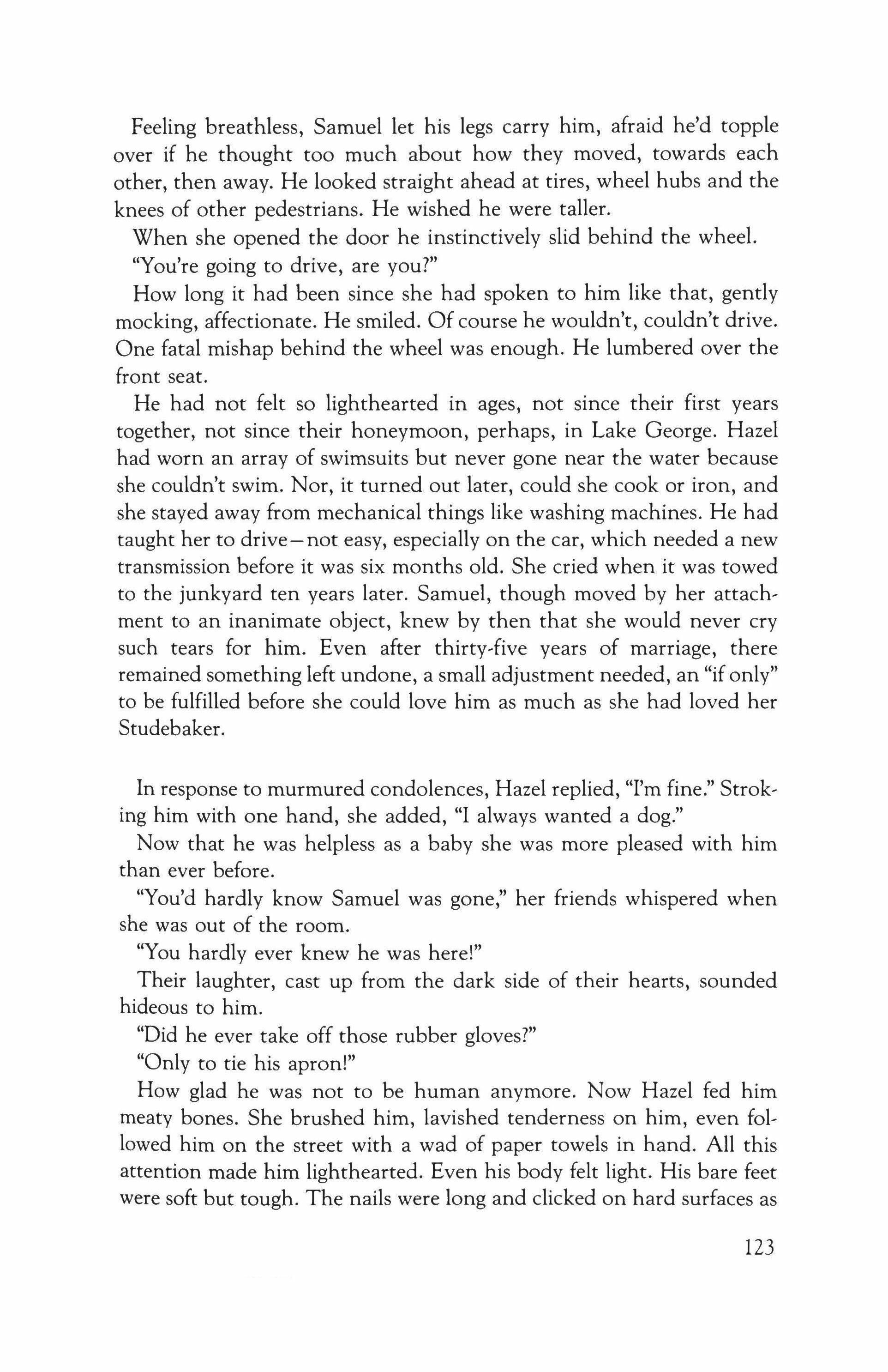
Feeling breathless, Samuel let his legs carry him, afraid he'd topple over if he thought too much about how they moved, towards each other, then away. He looked straight ahead at tires, wheel hubs and the knees of other pedestrians. He wished he were taller.
When she opened the door he instinctively slid behind the wheel.
"You're going to drive, are you?"
How long it had been since she had spoken to him like that, gently mocking, affectionate. He smiled. Of course he wouldn't, couldn't drive. One fatal mishap behind the wheel was enough. He lumbered over the front seat.
He had not felt so lighthearted in ages, not since their first years together, not since their honeymoon, perhaps, in Lake George. Hazel had worn an array of swimsuits but never gone near the water because she couldn't swim. Nor, it turned out later, could she cook or iron, and she stayed away from mechanical things like washing machines. He had taught her to drive-not easy, especially on the car, which needed a new transmission before it was six months old. She cried when it was towed to the junkyard ten years later. Samuel, though moved by her attachment to an inanimate object, knew by then that she would never cry such tears for him. Even after thirty-five years of marriage, there remained something left undone, a small adjustment needed, an "if only" to be fulfilled before she could love him as much as she had loved her Studebaker.
In response to murmured condolences, Hazel replied, "I'm fine." Stroking him with one hand, she added, "I always wanted a dog."
Now that he was helpless as a baby she was more pleased with him than ever before.
"You'd hardly know Samuel was gone," her friends whispered when she was out of the room.
"You hardly ever knew he was here!"
Their laughter, cast up from the dark side of their hearts, sounded hideous to him.
"Did he ever take off those rubber gloves?"
"Only to tie his apron!"
How glad he was not to be human anymore. Now Hazel fed him meaty bones. She brushed him, lavished tenderness on him, even followed him on the street with a wad of paper towels in hand. All this attention made him lighthearted. Even his body felt light. His bare feet were soft but tough. The nails were long and clicked on hard surfaces as
123
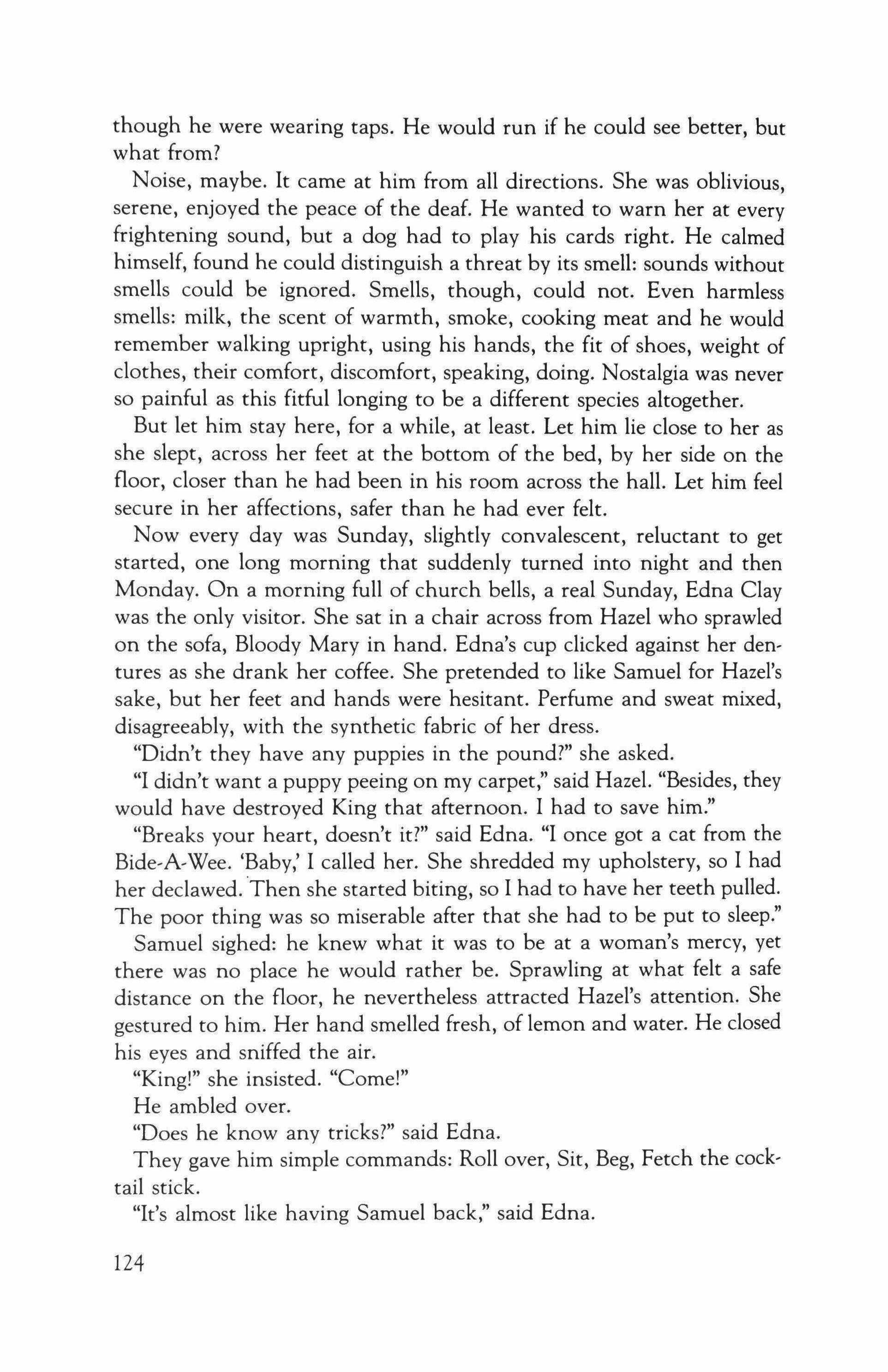
though he were wearing taps. He would run if he could see better, but what from?
Noise, maybe. It came at him from all directions. She was oblivious, serene, enjoyed the peace of the deaf. He wanted to warn her at every frightening sound, but a dog had to play his cards right. He calmed himself, found he could distinguish a threat by its smell: sounds without smells could be ignored. Smells, though, could not. Even harmless smells: milk, the scent of warmth, smoke, cooking meat and he would remember walking upright, using his hands, the fit of shoes, weight of clothes, their comfort, discomfort, speaking, doing. Nostalgia was never so painful as this fitful longing to be a different species altogether.
But let him stay here, for a while, at least. Let him lie close to her as she slept, across her feet at the bottom of the bed, by her side on the floor, closer than he had been in his room across the hall. Let him feel secure in her affections, safer than he had ever felt.
Now every day was Sunday, slightly convalescent, reluctant to get started, one long morning that suddenly turned into night and then Monday. On a morning full of church bells, a real Sunday, Edna Clay was the only visitor. She sat in a chair across from Hazel who sprawled on the sofa, Bloody Mary in hand. Edna's cup clicked against her dentures as she drank her coffee. She pretended to like Samuel for Hazel's sake, but her feet and hands were hesitant. Perfume and sweat mixed, disagreeably, with the synthetic fabric of her dress.
"Didn't they have any puppies in the pound?" she asked.
"I didn't want a puppy peeing on my carpet," said Hazel. "Besides, they would have destroyed King that afternoon. I had to save him."
"Breaks your heart, doesn't it?" said Edna. "I once got a cat from the Bide-A-Wee. 'Baby,' I called her. She shredded my upholstery, so I had her declawed. 'Then she started biting, so I had to have her teeth pulled. The poor thing was so miserable after that she had to be put to sleep."
Samuel sighed: he knew what it was to be at a woman's mercy, yet there was no place he would rather be. Sprawling at what felt a safe distance on the floor, he nevertheless attracted Hazel's attention. She gestured to him. Her hand smelled fresh, of lemon and water. He closed his eyes and sniffed the air.
"King!" she insisted. "Come!"
He ambled over.
"Does he know any tricks?" said Edna. They gave him simple commands: Roll over, Sit, Beg, Fetch the cocktail stick.
"It's almost like having Samuel back," said Edna.
124

"It's better." Hazel scratched him intently behind his right ear. Then, placing her hands on either side of his face, she looked into his eyes. "A dog is much easier to love," she said. "Even to kiss." And she planted one right on his mouth.
"Euw!" said Edna.
Winged insects whirred about the room, snrrmg the heat around them in soft waves. He moved his nose up and down the smooth flesh of Hazel's inner arm. She smelled of talc and vodka and he could even smell the blood flowing through veins close to her pale skin. Downstairs, the washing machine clicked into a new cycle. Hazel was doing her own laundry.
He had been circling the globe, seen the sun set and rise in quick succession numerous times. He had gained and lost days, gained and lost. He had been suspended in time, so it felt, and now he had a serious case of jet lag.
"Pretty girl. Pretty pretty girl."
Worse, though he hated to dwell on it, but he felt pilloried, tarred and feathered, otherwise naked, his hair completely gone. His bones were light but compacted, his equilibrium undone.
"Do you think she's a little too green?" Hazel asked.
"She's fine," said the vet, "for a bird her age."
"How old do you think she is?"
"Difficult to say. I suppose we could count the rings on her tail."
"Let's!" she said.
The veterinarian laughed and Samuel felt safe, for the moment, perched on his hand. Despite her ignorance, maybe because of it, Hazel still looked young. Her straight brown hair was graying, but worn in the same shag style as on their wedding day. She was beautiful.
"What happened to that funny-looking dog you adopted?"
"It was terrible," she said. "He bit a friend of mine."
"No kidding?"
"My first date in ten years and we ended up in the emergency room." Ten years? thought Samuel. Surely that much time hadn't passed since his accident.
"You put the dog to sleep?"
"It was terrible," she said, unable to confess.
She must have dated other men while they were still married. A sad surprise-he had never thought her fickle. Flighty, yes, but loyal. Now he remembered being locked up again, waiting for Hazel to retrieve him, being led into an antiseptic room much like this one, the injection, the
125
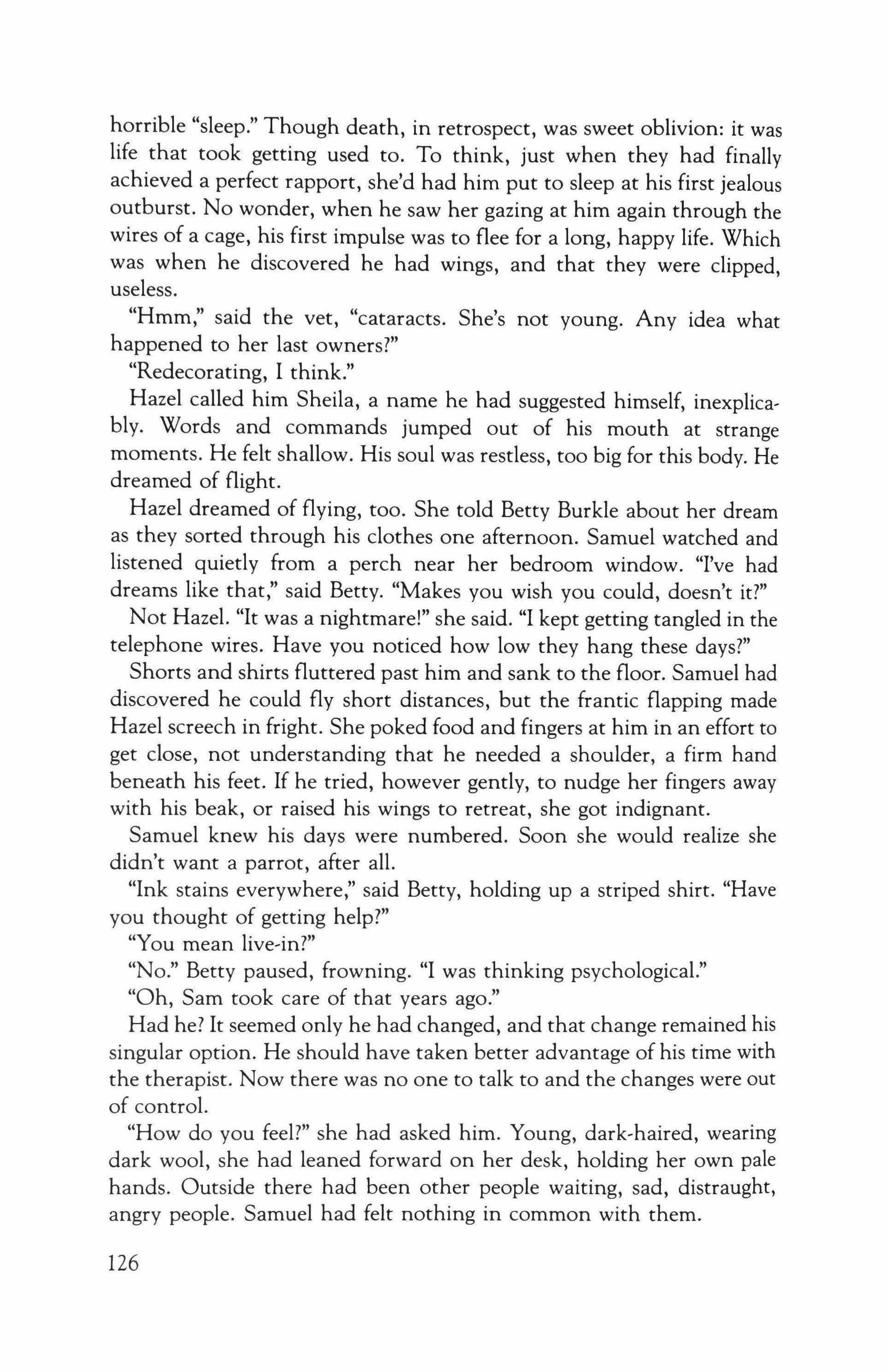
horrible "sleep." Though death, in retrospect, was sweet oblivion: it was life that took getting used to. To think, just when they had finally achieved a perfect rapport, she'd had him put to sleep at his first jealous outburst. No wonder, when he saw her gazing at him again through the wires of a cage, his first impulse was to flee for a long, happy life. Which was when he discovered he had wings, and that they were clipped, useless.
"Hmrn," said the vet, "cataracts. She's not young. Any idea what happened to her last owners?"
"Redecorating, I think."
Hazel called him Sheila, a name he had suggested himself, inexplicably. Words and commands jumped out of his mouth at strange moments. He felt shallow. His soul was restless, too big for this body. He dreamed of flight.
Hazel dreamed of flying, too. She told Betty Burkle about her dream as they sorted through his clothes one afternoon. Samuel watched and listened quietly from a perch near her bedroom window. "I've had dreams like that," said Betty. "Makes you wish you could, doesn't it?"
Not Hazel. "It was a nightmare!" she said. "I kept getting tangled in the telephone wires. Have you noticed how low they hang these days?"
Shorts and shirts fluttered past him and sank to the floor. Samuel had discovered he could fly short distances, but the frantic flapping made Hazel screech in fright. She poked food and fingers at him in an effort to get close, not understanding that he needed a shoulder, a firm hand beneath his feet. If he tried, however gently, to nudge her fingers away with his beak, or raised his wings to retreat, she got indignant.
Samuel knew his days were numbered. Soon she would realize she didn't want a parrot, after all.
"Ink stains everywhere," said Betty, holding up a striped shirt. "Have you thought of getting help?"
"You mean live-in?"
"No." Betty paused, frowning. "I was thinking psychological."
"Oh, Sam took care of that years ago."
Had he? It seemed only he had changed, and that change remained his singular option. He should have taken better advantage of his time with the therapist. Now there was no one to talk to and the changes were out of control.
"How do you feel?" she had asked him. Young, dark-haired, wearing dark wool, she had leaned forward on her desk, holding her own pale hands. Outside there had been other people waiting, sad, distraught, angry people. Samuel had felt nothing in common with them.
126
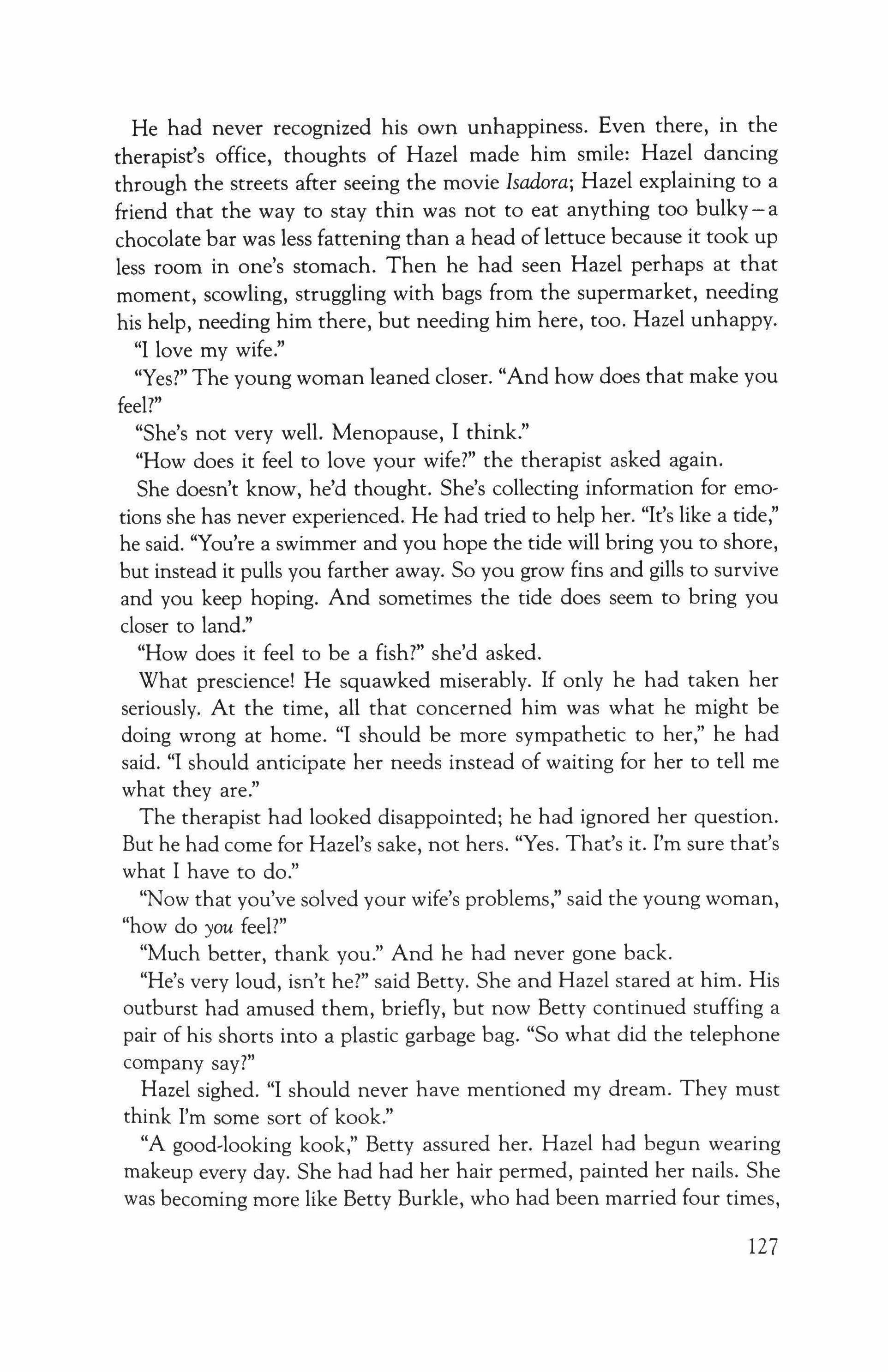
He had never recognized his own unhappiness. Even there, in the therapist's office, thoughts of Hazel made him smile: Hazel dancing through the streets after seeing the movie Isadora; Hazel explaining to a friend that the way to stay thin was not to eat anything too bulky-a chocolate bar was less fattening than a head of lettuce because it took up less room in one's stomach. Then he had seen Hazel perhaps at that moment, scowling, struggling with bags from the supermarket, needing his help, needing him there, but needing him here, too. Hazel unhappy.
"I love my wife."
"Yes?" The young woman leaned closer. "And how does that make you feel?"
"She's not very well. Menopause, I think."
"How does it feel to love your wife?" the therapist asked again.
She doesn't know, he'd thought. She's collecting information for emotions she has never experienced. He had tried to help her. "It's like a tide," he said. "You're a swimmer and you hope the tide will bring you to shore, but instead it pulls you farther away. So you grow fins and gills to survive and you keep hoping. And sometimes the tide does seem to bring you closer to land."
"How does it feel to be a fish?" she'd asked. What prescience! He squawked miserably. If only he had taken her seriously. At the time, all that concerned him was what he might be doing wrong at home. "I should be more sympathetic to her," he had said. "I should anticipate her needs instead of waiting for her to tell me what they are."
The therapist had looked disappointed; he had ignored her question. But he had come for Hazel's sake, not hers. "Yes. That's it. I'm sure that's what I have to do."
"Now that you've solved your wife's problems," said the young woman, "how do you feel?"
"Much better, thank you." And he had never gone back.
"He's very loud, isn't he?" said Betty. She and Hazel stared at him. His outburst had amused them, briefly, but now Betty continued stuffing a pair of his shorts into a plastic garbage bag. "So what did the telephone company say?"
Hazel sighed. "I should never have mentioned my dream. They must think I'm some sort of kook."
"A good-looking kook," Betty assured her. Hazel had begun wearing makeup every day. She had had her hair permed, painted her nails. She was becoming more like Betty Burkle, who had been married four times,
127

widowed the last two, who boasted of dating men half her age. A couple of men already hung about, sometimes spending the night with Hazel.
"I'm not getting married again," she insisted, "if that's what you're saying. Once was enough."
"Once was never enough." Betty forced his robe into the overstuffed bag, secured it tightly and threw it against the wall. "There!" she said. "That's the last of it. Why didn't you divorce Sam if you weren't happy?"
"On what grounds? Besides, he needed me. He loved me. Whatever that means."
"Don't you know?"
"Do you?" Hazel's voice rose plaintively.
Betty Burkle got to her feet. She put her arms around her friend's shoulders.
Pained to see Hazel so unhappy, Samuel broke the silence with a "RRRinggg," surprising himself. "Good morning!" he said brightly, though it was afternoon. "Oh George!" He couldn't help himself.
Hazel's laugh enveloped him.
She had many friends. The phone rang often. Hearing her laugh into the silent space of the house, Samuel felt intensely lonely. Perhaps he always had. He had always known she didn't love him, but he had never stopped hoping she would. And that was how it felt to be a man and a bird, and how it would probably feel to be a fish.
But now he discovered he could laugh. It was Hazel's laugh, and though it lacked human conviction, she didn't seem to notice. Thinking it a perfect echo, she would laugh, and he would laugh: they laughed together, filling the house with laughter. At these times she seemed happy enough with him.
"I think you'd like some sunshine, wouldn't you?" she said one day, smiling at him through the bars of his cage. He edged away, leery of new ideas.
Hazel was determined. "We're moving outside," she said, lifting the cage with both hands. "It's a beautiful day and I want to work in the garden."
His head rang as she knocked the cage against the doorframe.
The yard was large, with a flower garden along the back and side fences. Hazel had wanted lupines, hollyhocks, foxglove, an English garden. It had taken him years to get it right.
"How's this?" she said, placing him on the edge of the fountain in the middle of the yard. She surveyed the overgrown garden. Samuel was sure she would give up immediately and carry him back inside, but instead she leaned toward him. "Enough air?" she said. And for some
128
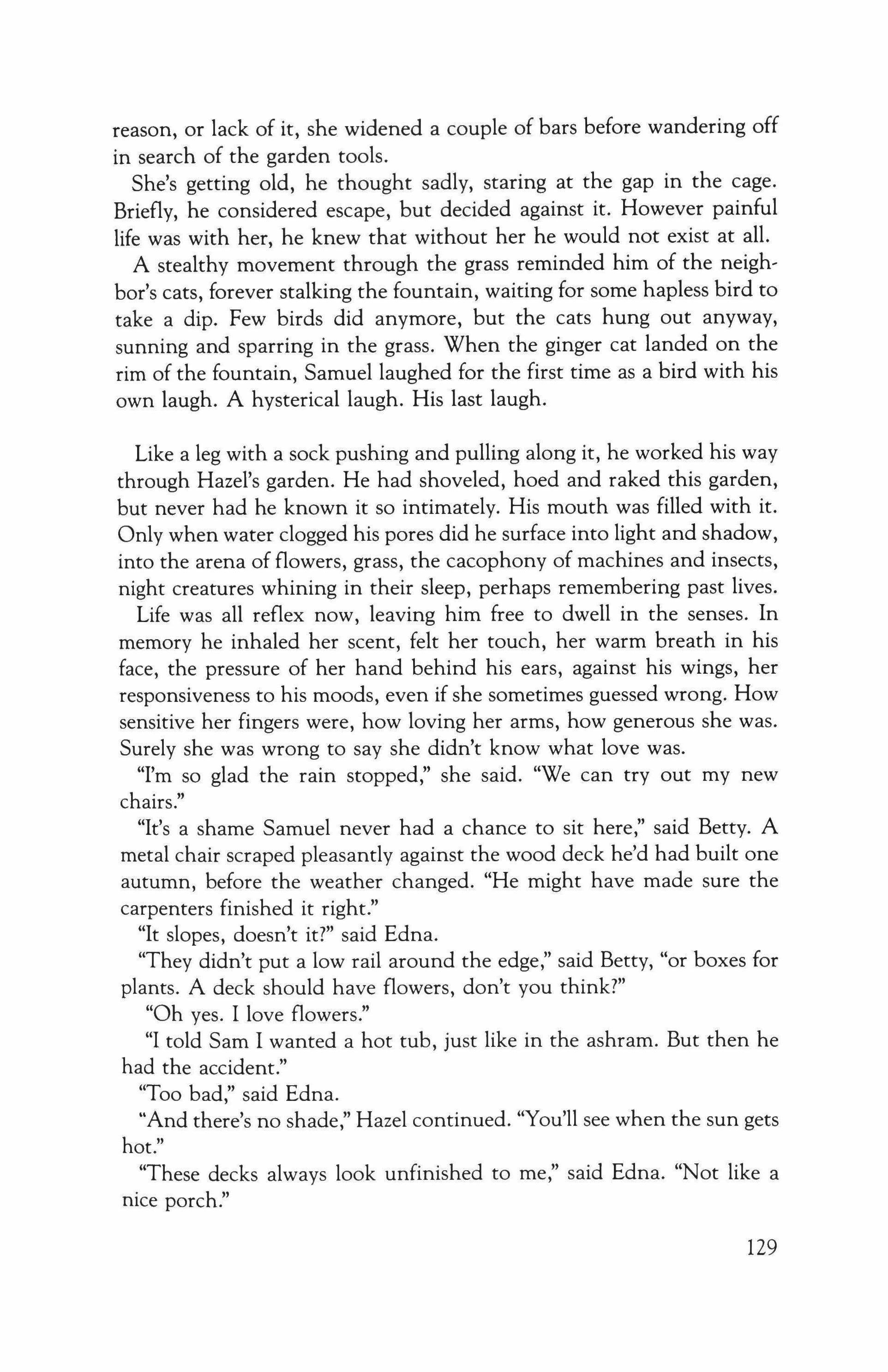
reason, or lack of it, she widened a couple of bars before wandering off in search of the garden tools.
She's getting old, he thought sadly, staring at the gap in the cage. Briefly, he considered escape, but decided against it. However painful life was with her, he knew that without her he would not exist at all.
A stealthy movement through the grass reminded him of the neighbor's cats, forever stalking the fountain, waiting for some hapless bird to take a dip. Few birds did anymore, but the cats hung out anyway, sunning and sparring in the grass. When the ginger cat landed on the rim of the fountain, Samuel laughed for the first time as a bird with his own laugh. A hysterical laugh. His last laugh.
Like a leg with a sock pushing and pulling along it, he worked his way through Hazel's garden. He had shoveled, hoed and raked this garden, but never had he known it so intimately. His mouth was filled with it. Only when water clogged his pores did he surface into light and shadow, into the arena of flowers, grass, the cacophony of machines and insects, night creatures whining in their sleep, perhaps remembering past lives.
Life was all reflex now, leaving him free to dwell in the senses. In memory he inhaled her scent, felt her touch, her warm breath in his face, the pressure of her hand behind his ears, against his wings, her responsiveness to his moods, even if she sometimes guessed wrong. How sensitive her fingers were, how loving her arms, how generous she was. Surely she was wrong to say she didn't know what love was.
"I'm so glad the rain stopped," she said. "We can tryout my new chairs."
"It's a shame Samuel never had a chance to sit here," said Betty. A metal chair scraped pleasantly against the wood deck he'd had built one autumn, before the weather changed. "He might have made sure the carpenters finished it right."
"It slopes, doesn't it?" said Edna.
"They didn't put a low rail around the edge," said Betty, "or boxes for plants. A deck should have flowers, don't you think?"
"Oh yes. I love flowers."
"I told Sam I wanted a hot tub, just like in the ashram. But then he had the accident."
'Too bad," said Edna.
"And there's no shade," Hazel continued. "You'll see when the sun gets hot."
'These decks always look unfinished to me," said Edna. "Not like a nice porch."
129
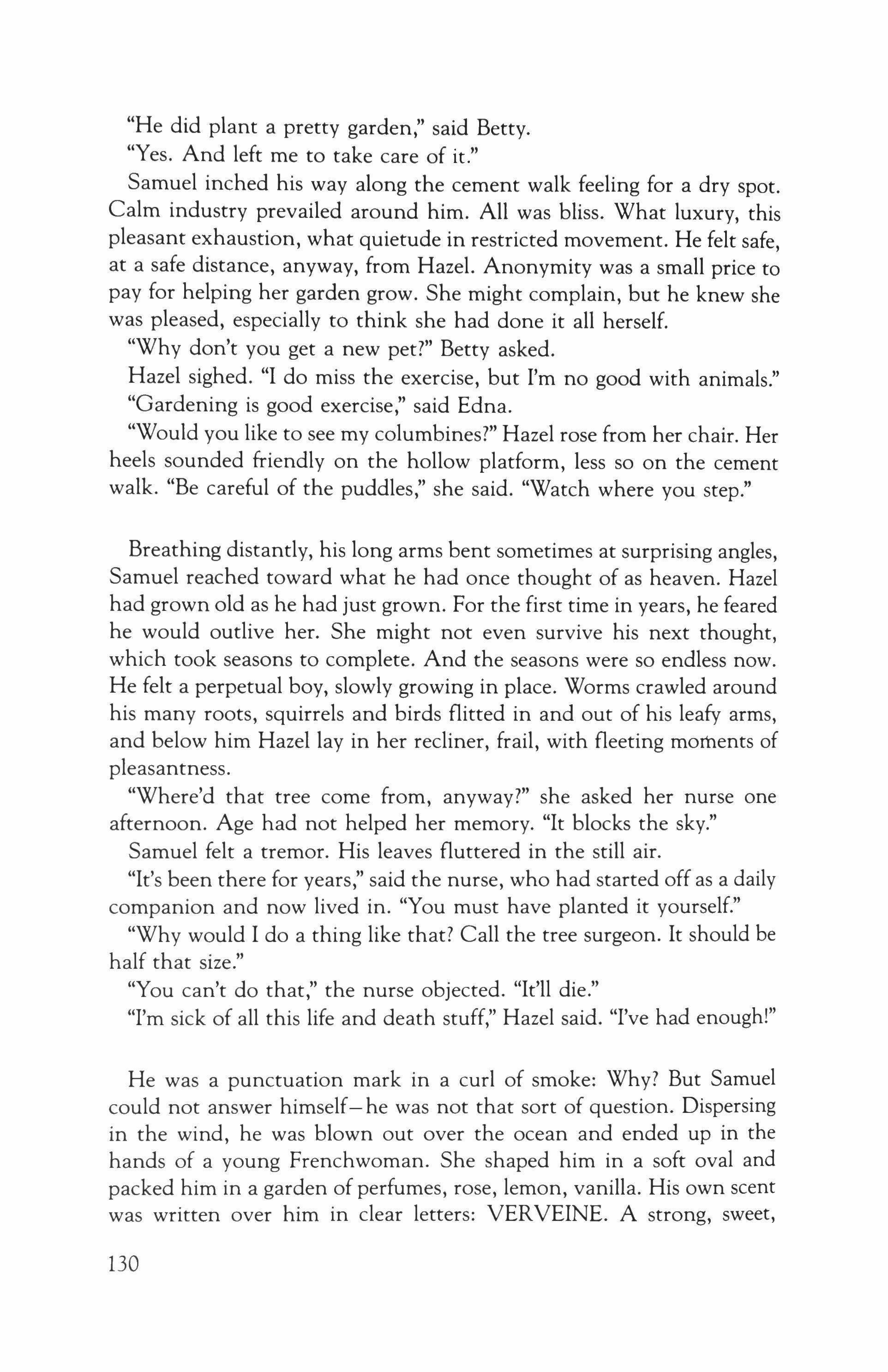
"He did plant a pretty garden:' said Betty. "Yes. And left me to take care of it."
Samuel inched his way along the cement walk feeling for a dry spot. Calm industry prevailed around him. All was bliss. What luxury, this pleasant exhaustion, what quietude in restricted movement. He felt safe, at a safe distance, anyway, from Hazel. Anonymity was a small price to pay for helping her garden grow. She might complain, but he knew she was pleased, especially to think she had done it all herself.
"Why don't you get a new pet?" Betty asked.
Hazel sighed. "I do miss the exercise, but I'm no good with animals."
"Gardening is good exercise," said Edna.
"Would you like to see my columbines?" Hazel rose from her chair. Her heels sounded friendly on the hollow platform, less so on the cement walk. "Be careful of the puddles," she said. "Watch where you step."
Breathing distantly, his long arms bent sometimes at surprising angles, Samuel reached toward what he had once thought of as heaven. Hazel had grown old as he had just grown. For the first time in years, he feared he would outlive her. She might not even survive his next thought, which took seasons to complete. And the seasons were so endless now. He felt a perpetual boy, slowly growing in place. Worms crawled around his many roots, squirrels and birds flitted in and out of his leafy arms, and below him Hazel lay in her recliner, frail, with fleeting moments of pleasantness.
"Where'd that tree come from, anyway?" she asked her nurse one afternoon. Age had not helped her memory. "It blocks the sky."
Samuel felt a tremor. His leaves fluttered in the still air.
"It's been there for years," said the nurse, who had started off as a daily companion and now lived in. "You must have planted it yourself."
"Why would I do a thing like that? Call the tree surgeon. It should be half that size."
"You can't do that," the nurse objected. "It'll die."
"I'm sick of all this life and death stuff," Hazel said. "I've had enough!"
He was a punctuation mark in a curl of smoke: Why? But Samuel could not answer himself-he was not that sort of question. Dispersing in the wind, he was blown out over the ocean and ended up in the hands of a young Frenchwoman. She shaped him in a soft oval and packed him in a garden of perfumes, rose, lemon, vanilla. His own scent was written over him in clear letters: VERVEINE. A strong, sweet,
130
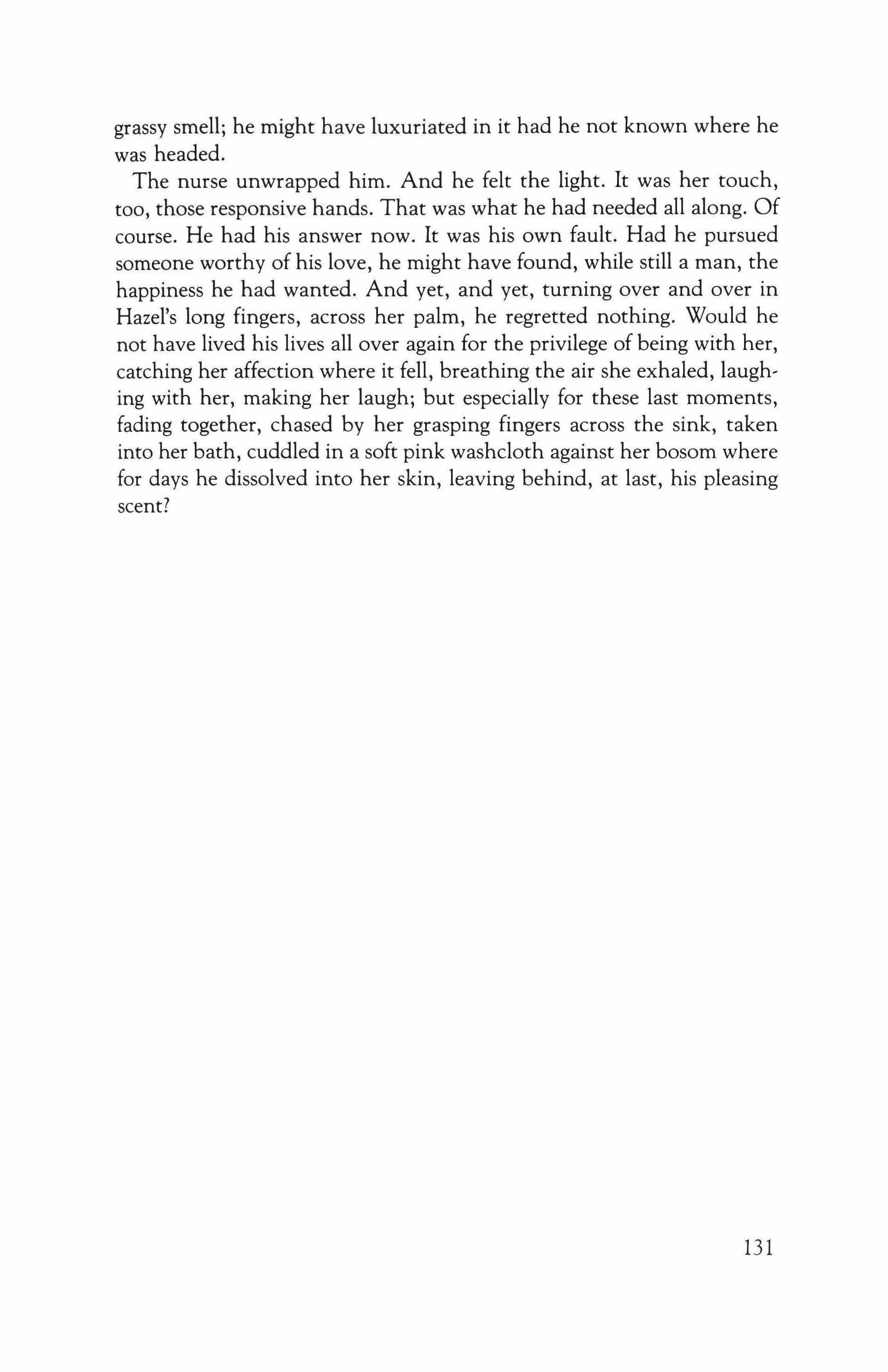
grassy smell; he might have luxuriated in it had he not known where he was headed.
The nurse unwrapped him. And he felt the light. It was her touch, too, those responsive hands. That was what he had needed all along. Of course. He had his answer now. It was his own fault. Had he pursued someone worthy of his love, he might have found, while still a man, the happiness he had wanted. And yet, and yet, turning over and over in Hazel's long fingers, across her palm, he regretted nothing. Would he not have lived his lives all over again for the privilege of being with her, catching her affection where it fell, breathing the air she exhaled, laughing with her, making her laugh; but especially for these last moments, fading together, chased by her grasping fingers across the sink, taken into her bath, cuddled in a soft pink washcloth against her bosom where for days he dissolved into her skin, leaving behind, at last, his pleasing scent?
131
Meat and My Husband
Lydia Davis
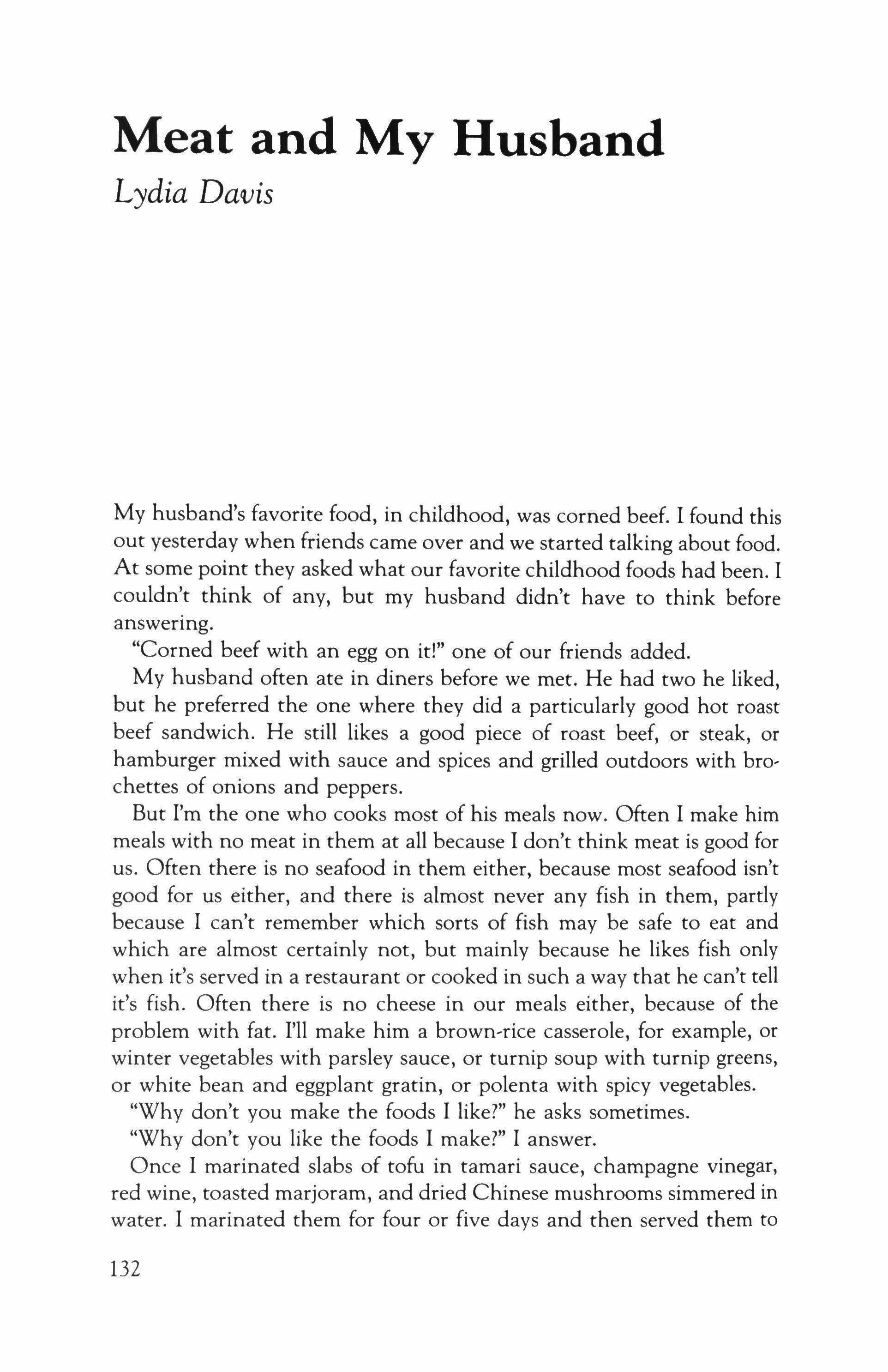
My husband's favorite food, in childhood, was corned beef. I found this out yesterday when friends came over and we started talking about food. At some point they asked what our favorite childhood foods had been. I couldn't think of any, but my husband didn't have to think before answering.
"Corned beef with an egg on it!" one of our friends added.
My husband often ate in diners before we met. He had two he liked, but he preferred the one where they did a particularly good hot roast beef sandwich. He still likes a good piece of roast beef, or steak, or hamburger mixed with sauce and spices and grilled outdoors with brochettes of onions and peppers.
But I'm the one who cooks most of his meals now. Often I make him meals with no meat in them at all because I don't think meat is good for us. Often there is no seafood in them either, because most seafood isn't good for us either, and there is almost never any fish in them, partly because I can't remember which sorts of fish may be safe to eat and which are almost certainly not, but mainly because he likes fish only when it's served in a restaurant or cooked in such a way that he can't tell it's fish. Often there is no cheese in our meals either, because of the problem with fat. I'll make him a brown-rice casserole, for example, or winter vegetables with parsley sauce, or turnip soup with turnip greens, or white bean and eggplant gratin, or polenta with spicy vegetables.
"Why don't you make the foods I like?" he asks sometimes.
"Why don't you like the foods I make?" I answer.
Once I marinated slabs of tofu in tamari sauce, champagne vinegar, red wine, toasted marjoram, and dried Chinese mushrooms simmered in water. I marinated them for four or five days and then served them to
132
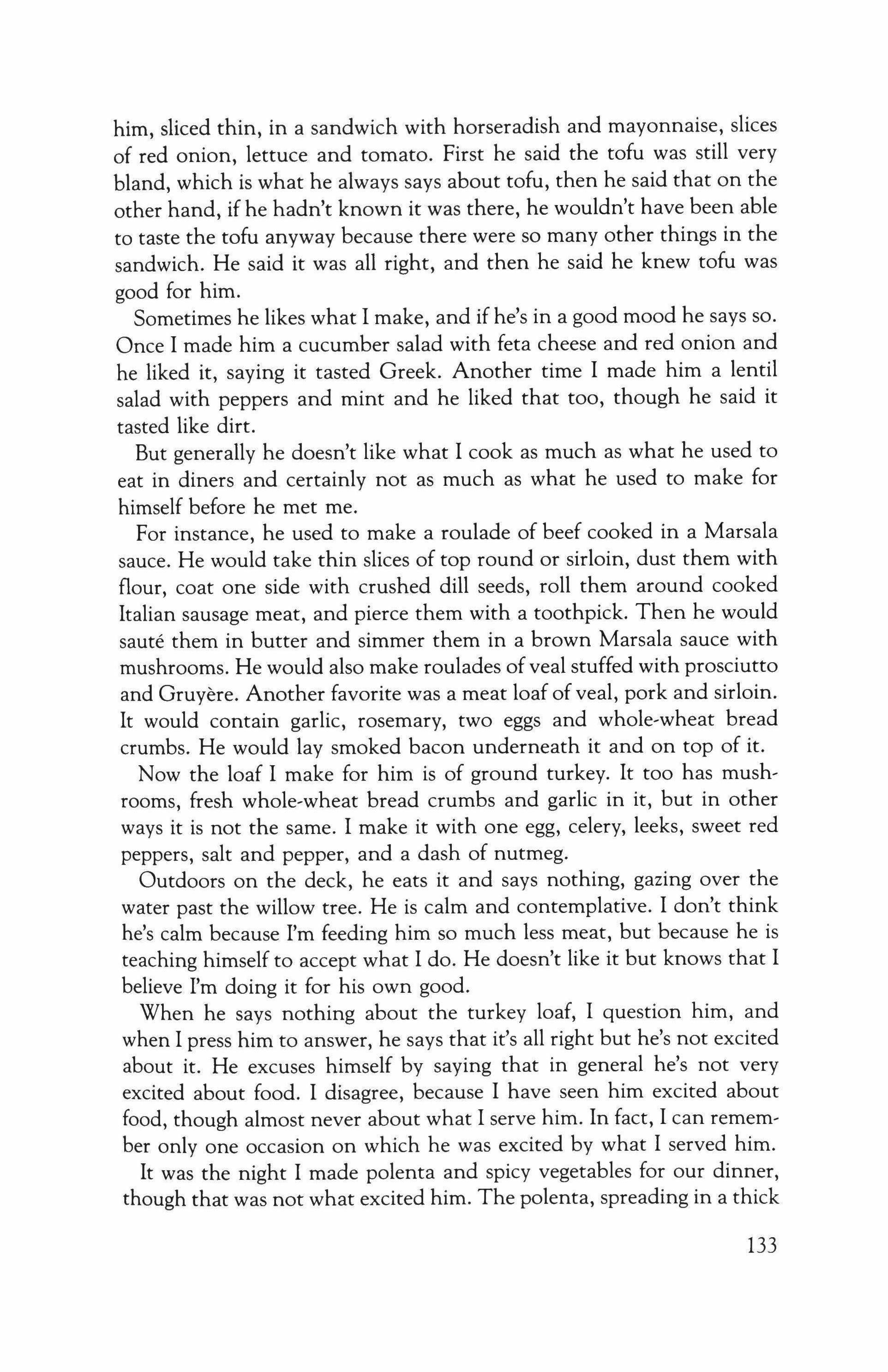
him, sliced thin, in a sandwich with horseradish and mayonnaise, slices of red onion, lettuce and tomato. First he said the tofu was still very bland, which is what he always says about tofu, then he said that on the other hand, if he hadn't known it was there, he wouldn't have been able to taste the tofu anyway because there were so many other things in the sandwich. He said it was all right, and then he said he knew tofu was good for him.
Sometimes he likes what I make, and if he's in a good mood he says so. Once I made him a cucumber salad with feta cheese and red onion and he liked it, saying it tasted Greek. Another time I made him a lentil salad with peppers and mint and he liked that too, though he said it tasted like dirt.
But generally he doesn't like what I cook as much as what he used to eat in diners and certainly not as much as what he used to make for himself before he met me.
For instance, he used to make a roulade of beef cooked in a Marsala sauce. He would take thin slices of top round or sirloin, dust them with flour, coat one side with crushed dill seeds, roll them around cooked Italian sausage meat, and pierce them with a toothpick. Then he would saute them in butter and simmer them in a brown Marsala sauce with mushrooms. He would also make roulades ofveal stuffed with prosciutto and Gruyere. Another favorite was a meat loaf ofveal, pork and sirloin. It would contain garlic, rosemary, two eggs and whole-wheat bread crumbs. He would lay smoked bacon underneath it and on top of it.
Now the loaf I make for him is of ground turkey. It too has mushrooms, fresh whole-wheat bread crumbs and garlic in it, but in other ways it is not the same. I make it with one egg, celery, leeks, sweet red peppers, salt and pepper, and a dash of nutmeg.
Outdoors on the deck, he eats it and says nothing, gazing over the water past the willow tree. He is calm and contemplative. I don't think he's calm because I'm feeding him so much less meat, but because he is teaching himself to accept what I do. He doesn't like it but knows that I believe I'm doing it for his own good.
When he says nothing about the turkey loaf, I question him, and when I press him to answer, he says that it's all right but he's not excited about it. He excuses himself by saying that in general he's not very excited about food. I disagree, because I have seen him excited about food, though almost never about what I serve him. In fact, I can rernember only one occasion on which he was excited by what I served him.
It was the night I made polenta and spicy vegetables for our dinner, though that was not what excited him. The polenta, spreading in a thick
133

ochre circle under the heap of reddish-brown vegetables, looked strange and reminded us both of a cow patty. When he had eaten some of it, though, my husband said it tasted better than it looked, something he has said before about other meals of mine. The cookbook had suggested a certain dessert to follow: a ripe pear, chilled, with walnuts. Before we sat down to our meal, I told my husband what I was planning for dessert, though I was not going to bother chilling the pear.
That's one of my problems as a cook-that I don't bother to do each thing the way it should be done. I don't seem to understand the importance of detail, in cooking. My husband does, and when I told him my plan for dessert, he got right up from the table and put the pear in the freezer to chill.
When we came to eat the pear and the walnuts, the contrast between the cool, juicy sweetness of the fruit and the warmer, oily fragrance of the nuts certainly excited my husband, enough for him to imagine other desserts of fruit-poached figs with ginger, apricot fritters, and sliced blood oranges with pecans. Certainly he was more excited about this dessert than he had been about anything else I had served him. But then he was the one who had put the pear in the freezer, and I've learned by now that when he's involved in preparing a meal, or anything else for that matter, he's more apt to like it.
134
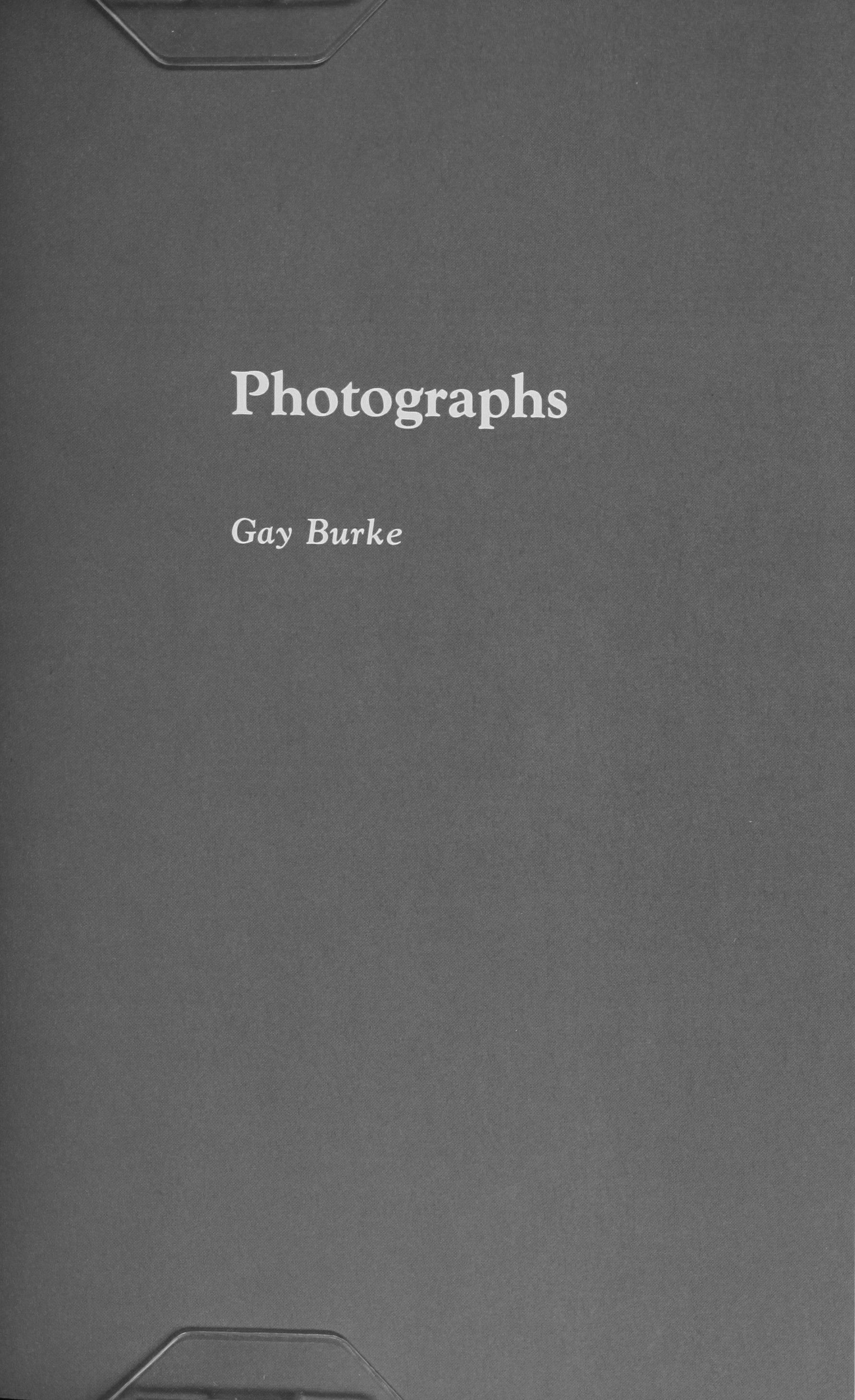

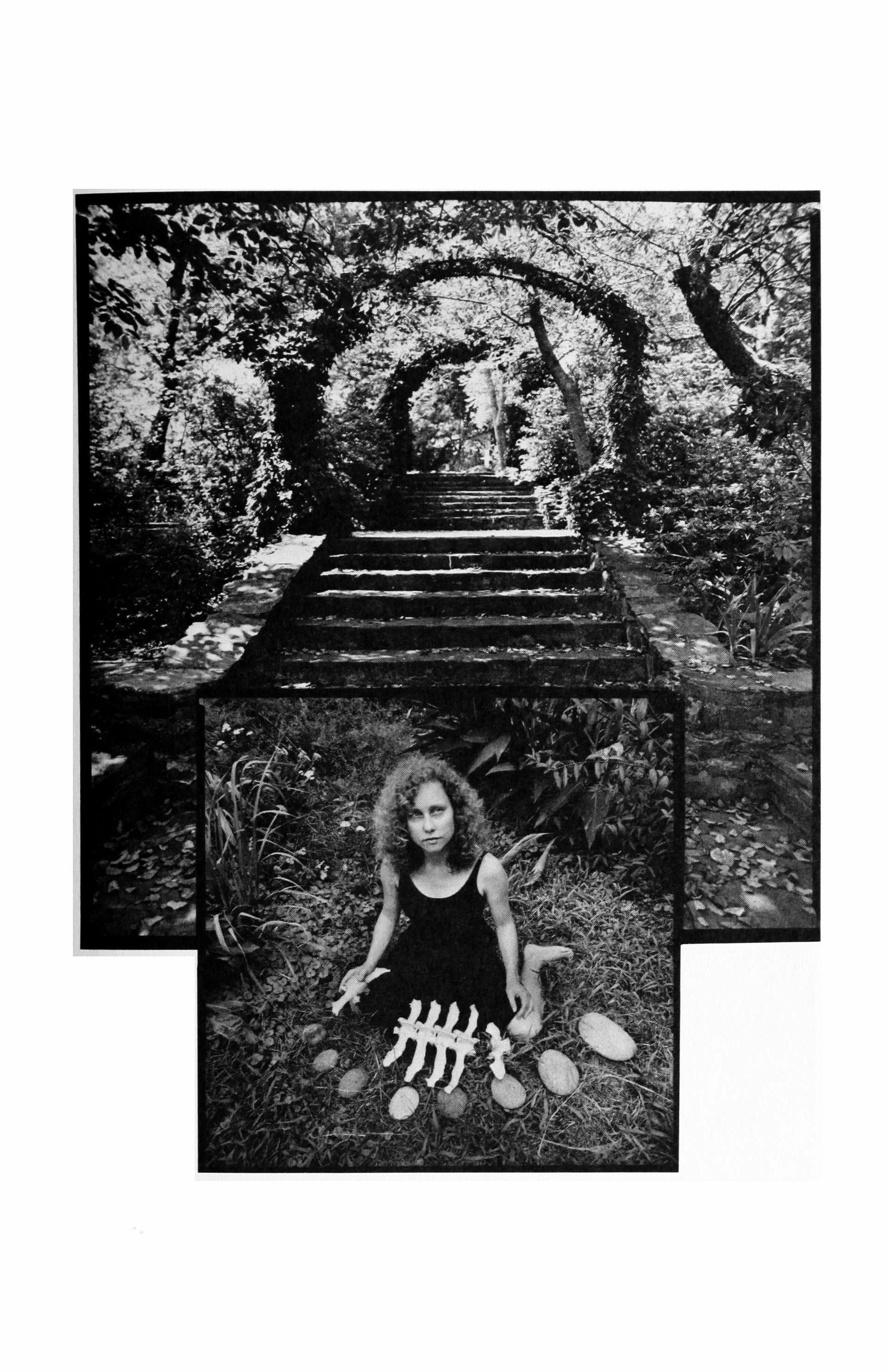

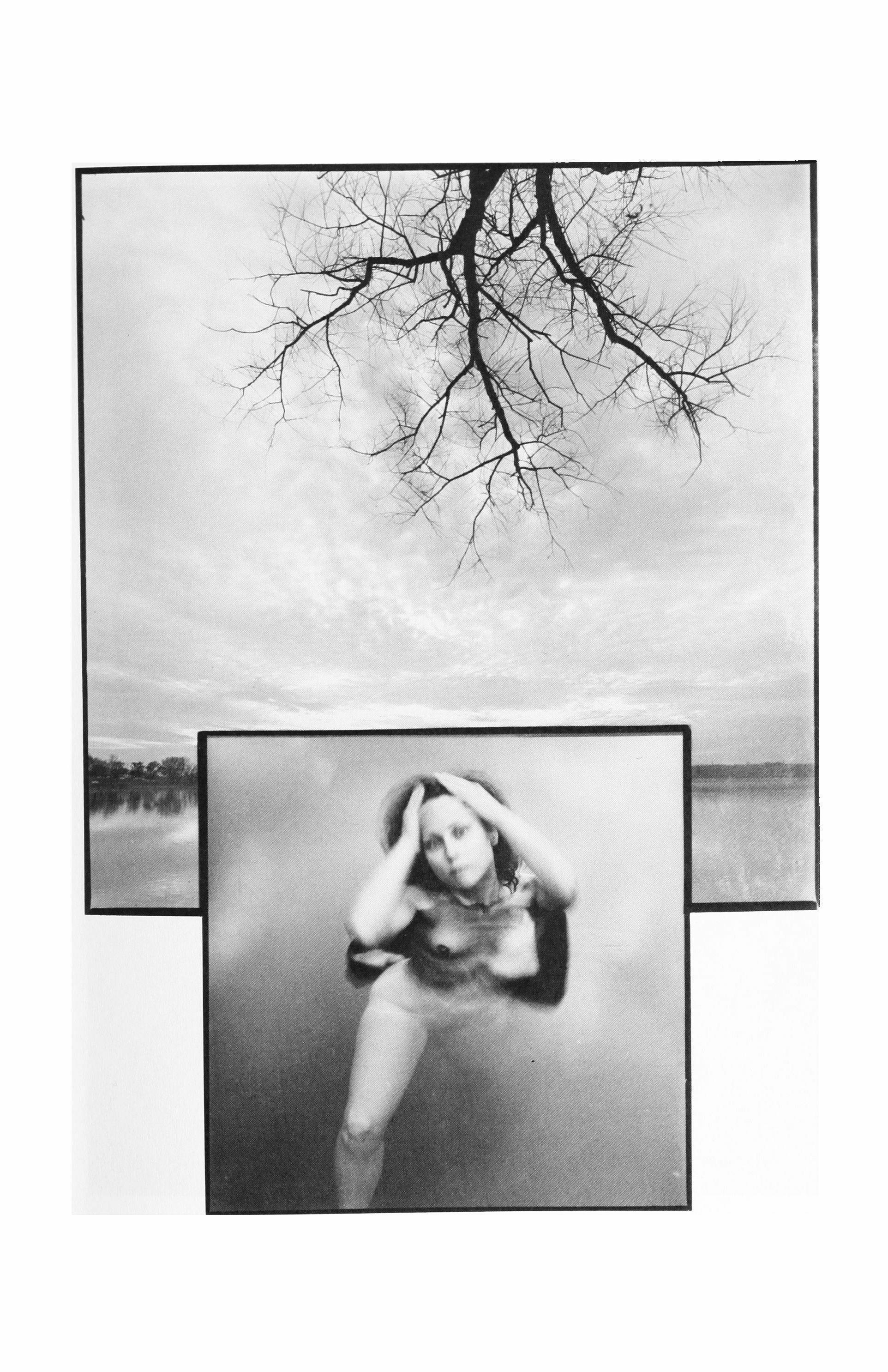
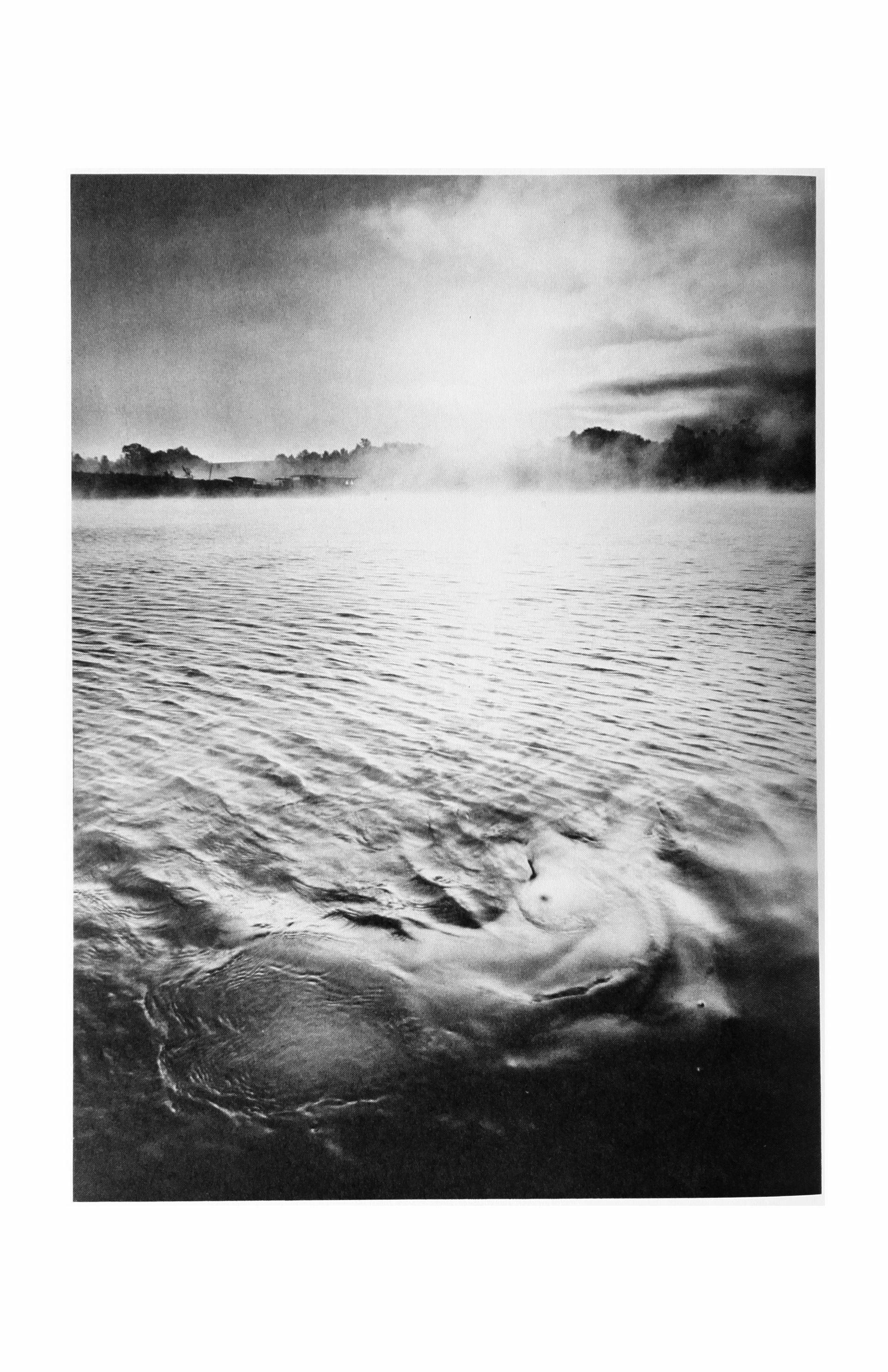

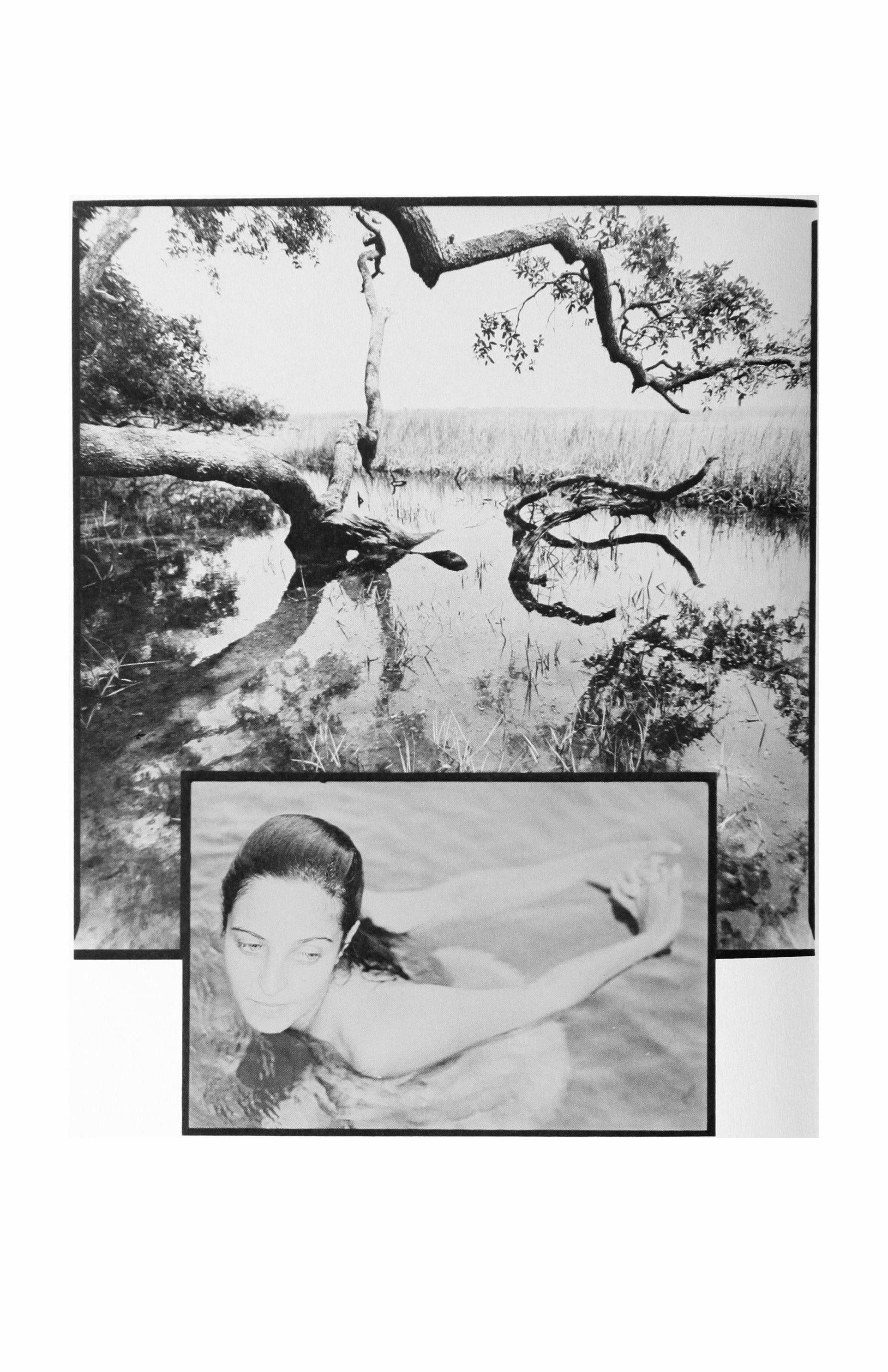
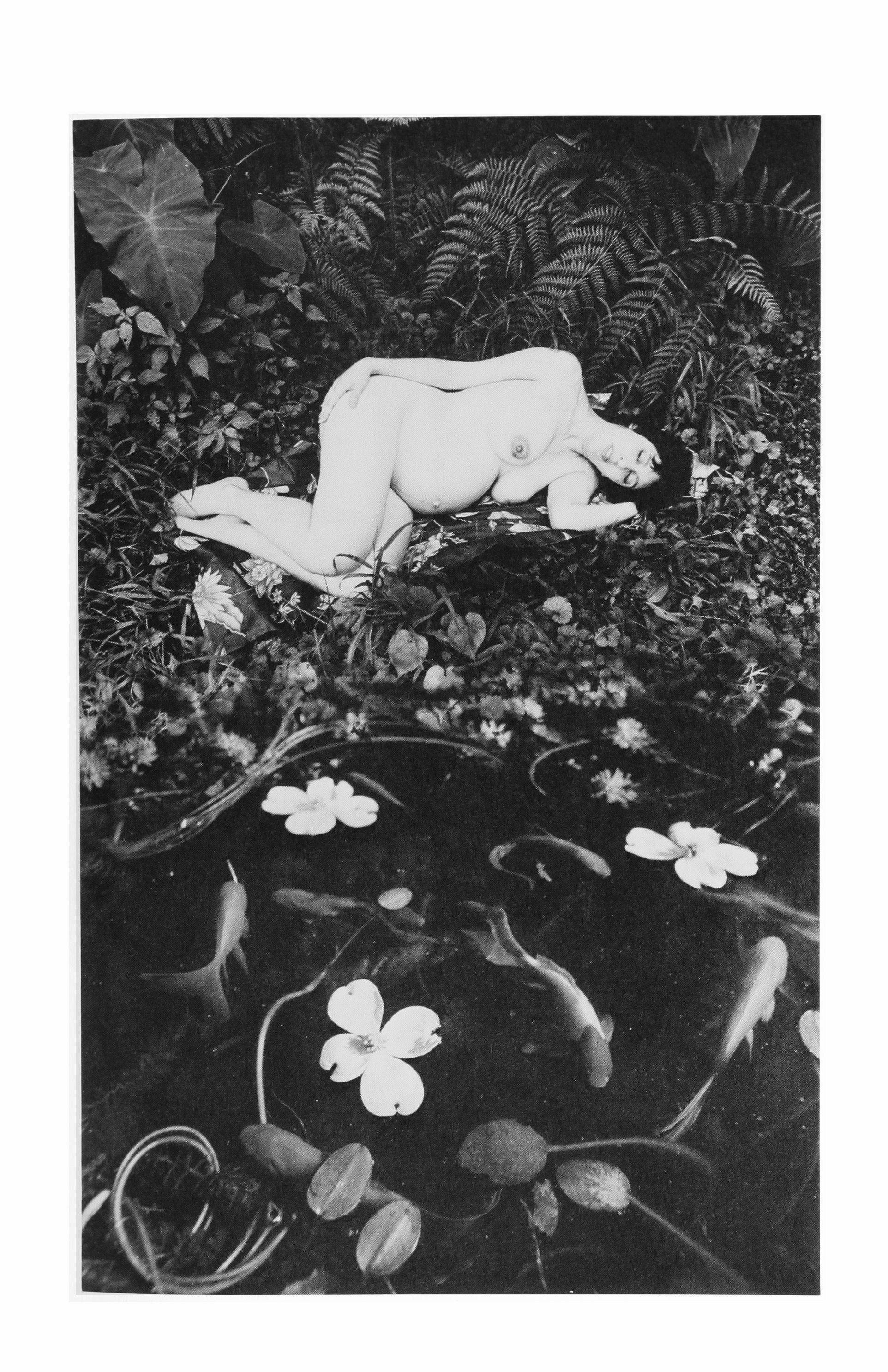
Three Poems
Janet McAdams
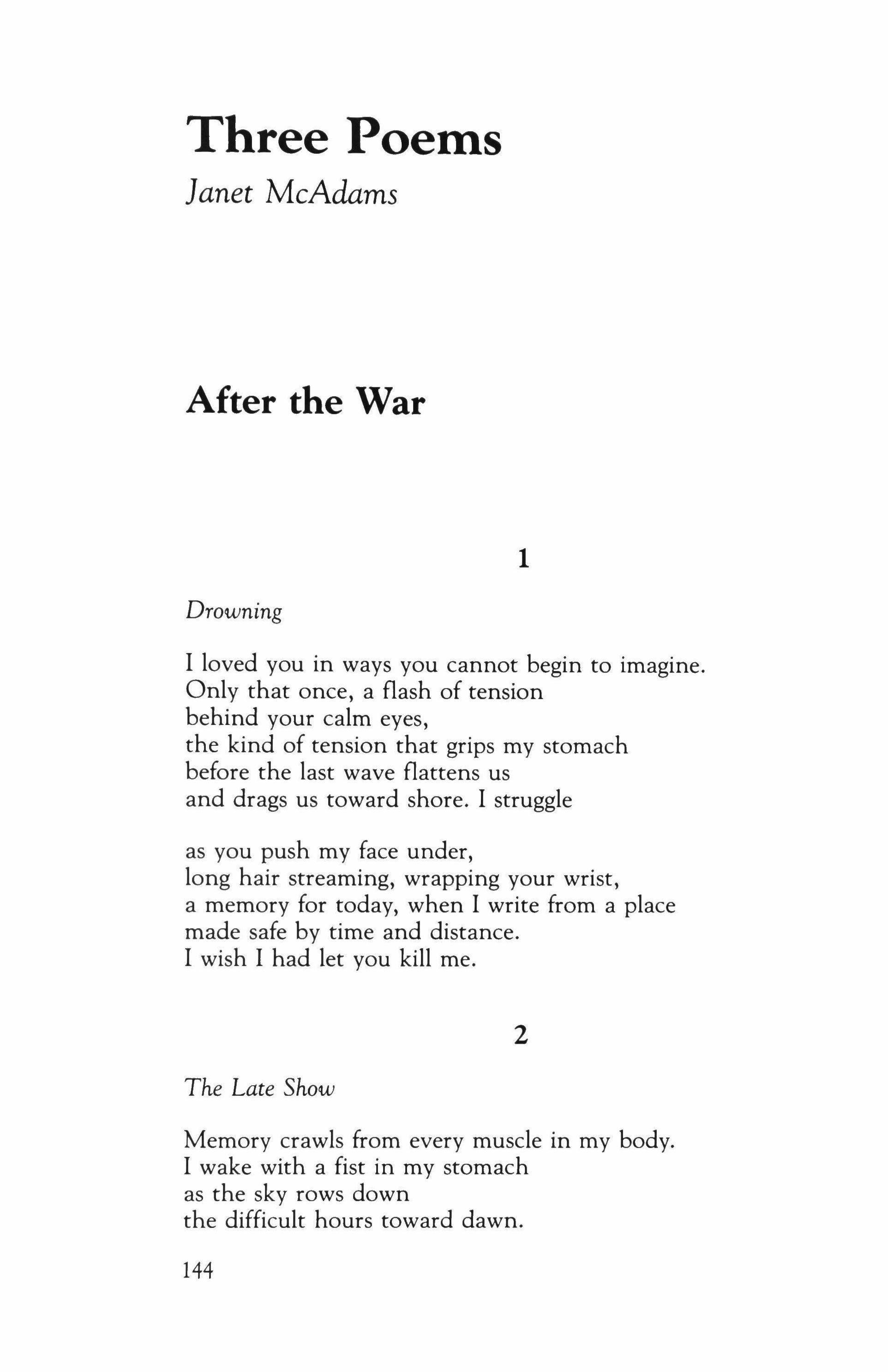
After the War
1
Drowning
I loved you in ways you cannot begin to imagine. Only that once, a flash of tension behind your calm eyes, the kind of tension that grips my stomach before the last wave flattens us and drags us toward shore. I struggle
as you push my face under, long hair streaming, wrapping your wrist, a memory for today, when I write from a place made safe by time and distance. I wish I had let you kill me.
2
The Late Show
Memory crawls from every muscle in my body. I wake with a fist in my stomach as the sky rows down the difficult hours toward dawn.
144
The day we left each other, the sky was a bright, bright blue, the day heady with regret. I walked down the narrow street, heels laconic on the flat gray of the sidewalk.
You drifted around a corner, thinking about anything, I imagined, your '64 Buick, the year the Grateful Dead played Memphis, a sharkskin suit you bought from a guy in the jungle and lost on the plane coming home.
3
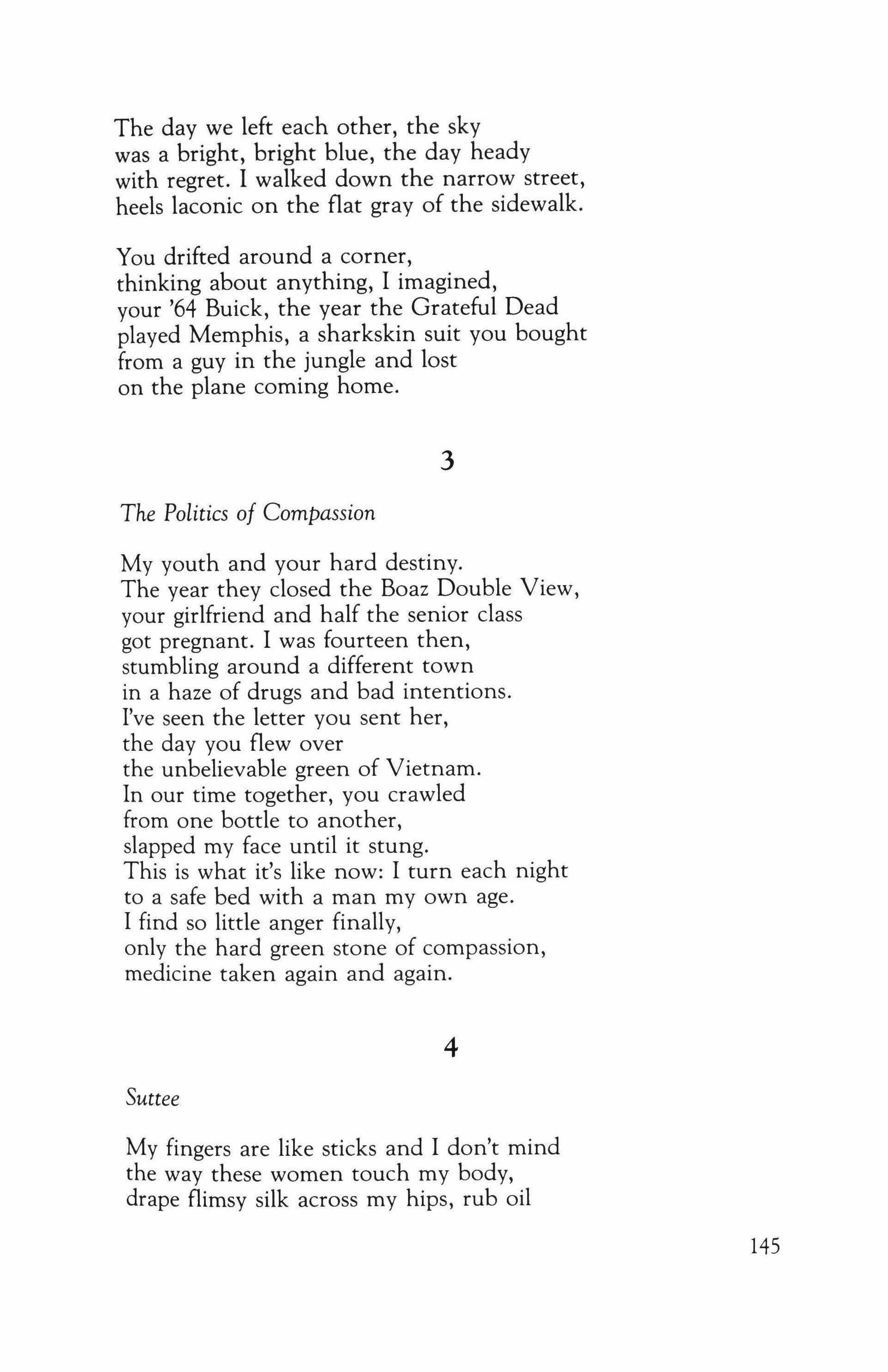
The Politics of Compassion
My youth and your hard destiny. The year they closed the Boaz Double View, your girlfriend and half the senior class got pregnant. I was fourteen then, stumbling around a different town in a haze of drugs and bad intentions. I've seen the letter you sent her, the day you flew over the unbelievable green of Vietnam. In our time together, you crawled from one bottle to another, slapped my face until it stung. This is what it's like now: I turn each night to a safe bed with a man my own age. I find so little anger finally, only the hard green stone of compassion, medicine taken again and again.
4 Suttee
My fingers are like sticks and I don't mind the way these women touch my body, drape flimsy silk across my hips, rub oil
145

into my nipples until they shine and redden. My fingers are like sticks, and when I hold them out across the stack of balsa, smoke rises between them
like thin gray scarves. In the distance, the flat boats of fisherman are moving along the pier, and the fire roars in my ears, like the ocean
after all, like the roar of the helicopter moving the green tops of trees. How long it took that year I was with you, that year I burned.
146
EI Salvador del Mundo
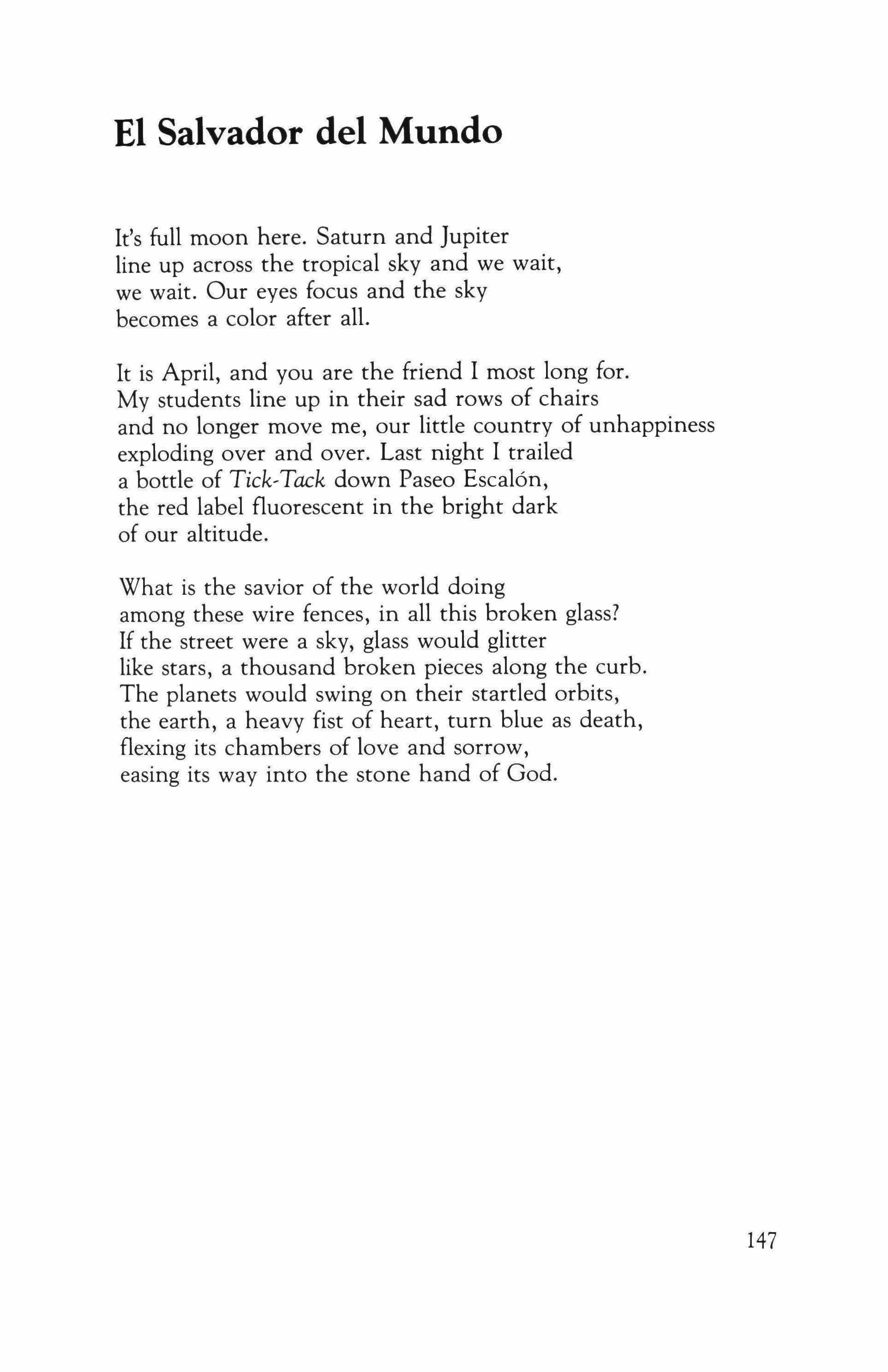
It's full moon here. Saturn and Jupiter line up across the tropical sky and we wait, we wait. Our eyes focus and the sky becomes a color after all.
It is April, and you are the friend I most long for. My students line up in their sad rows of chairs and no longer move me, our little country of unhappiness exploding over and over. Last night I trailed a bottle of Tick-Tack down Paseo Escalon, the red label fluorescent in the bright dark of our altitude.
What is the savior of the world doing among these wire fences, in all this broken glass? If the street were a sky, glass would glitter like stars, a thousand broken pieces along the curb. The planets would swing on their startled orbits, the earth, a heavy fist of heart, turn blue as death, flexing its chambers of love and sorrow, easing its way into the stone hand of God.
147
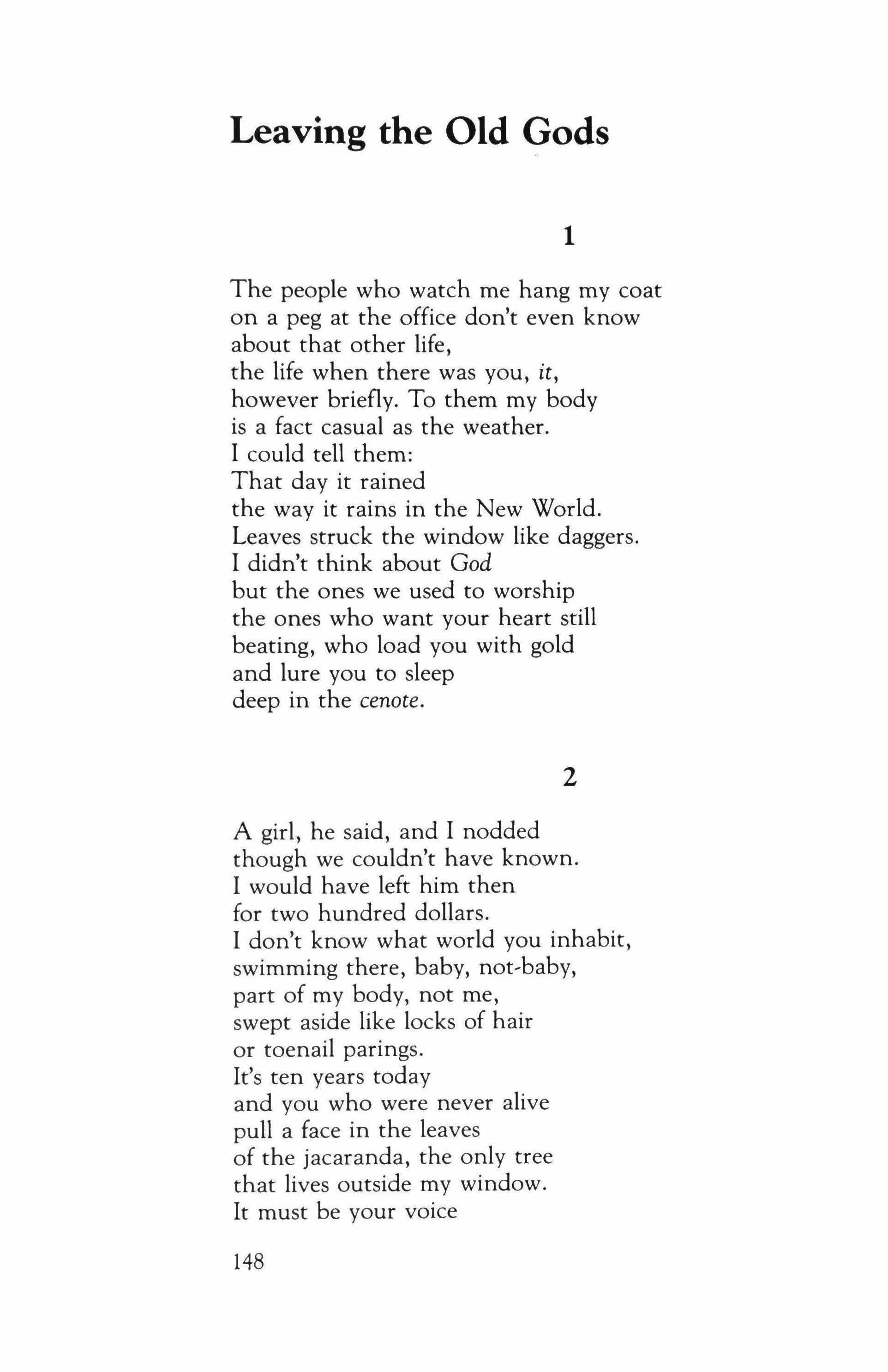
Leaving the Old Gods 1
The people who watch me hang my coat on a peg at the office don't even know about that other life, the life when there was you, it, however briefly. To them my body is a fact casual as the weather. I could tell them: That day it rained the way it rains in the New World. Leaves struck the window like daggers. I didn't think about God but the ones we used to worship the ones who want your heart still beating, who load you with gold and lure you to sleep deep in the cenote.
2
A girl, he said, and I nodded though we couldn't have known. I would have left him then for two hundred dollars. I don't know what world you inhabit, swimming there, baby, not-baby, part of my body, not me, swept aside like locks of hair or toenail parings. It's ten years today and you who were never alive pull a face in the leaves of the jacaranda, the only tree that lives outside my window. It must be your voice
148

whistling through the office window, though I can't understand your words.
Comfort or accusation, I can't understand your words.
149
Two Poems
Arlene Keizer
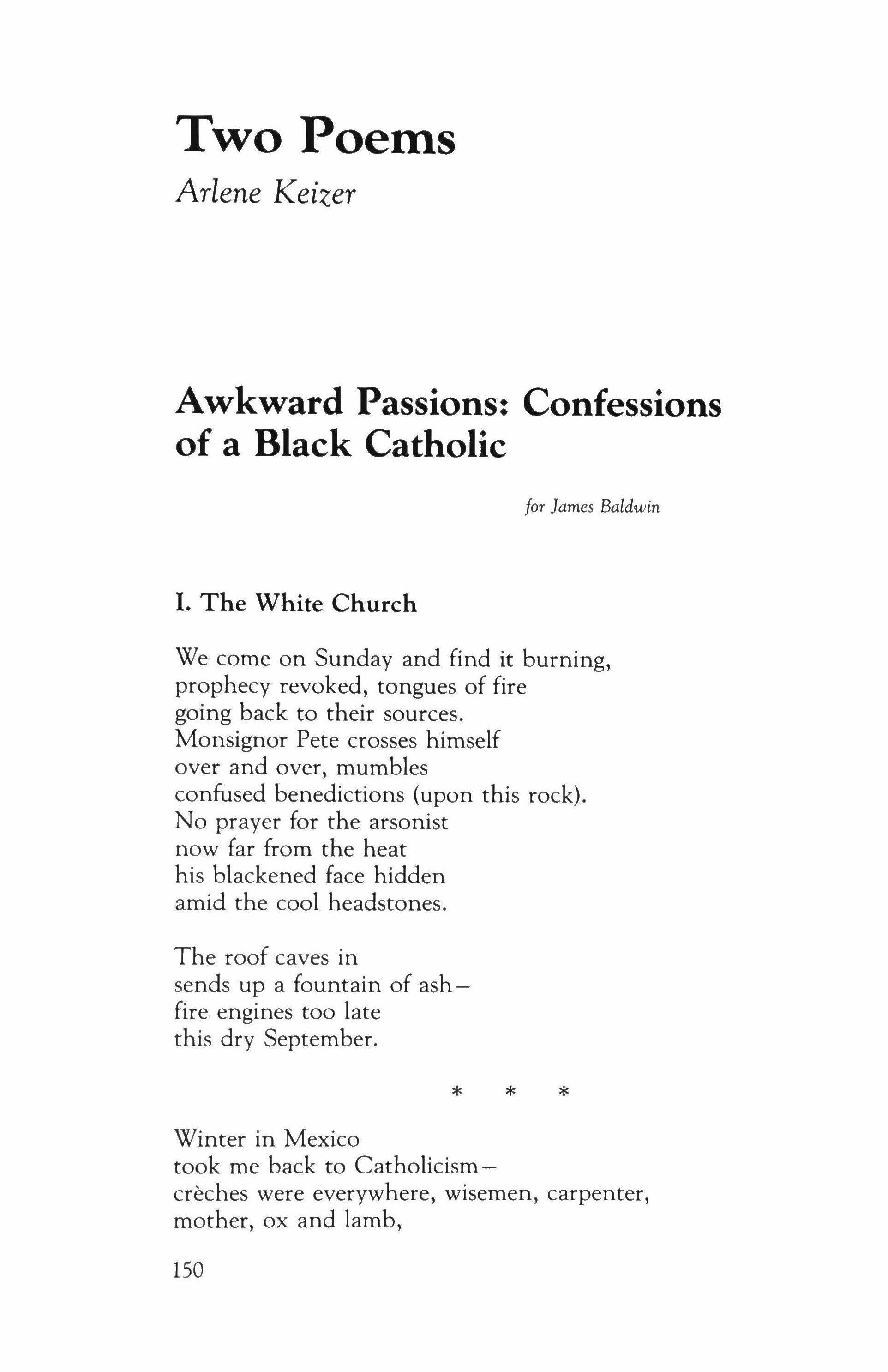
Awkward Passions: Confessions of a Black Catholic
for James Baldwin
I. The White Church
We come on Sunday and find it burning, prophecy revoked, tongues of fire going back to their sources.
Monsignor Pete crosses himself over and over, mumbles confused benedictions (upon this rock). No prayer for the arsonist now far from the heat his blackened face hidden amid the cool headstones.
The roof caves in sends up a fountain of ashfire engines too late this dry September.
Winter in Mexico took me back to Catholicismcreches were everywhere, wisemen, carpenter, mother, ox and lamb,
* * *
150
all turned towards that hallowed center like the towns each turned towards a plaza. Three rowdy boys, our guides, suddenly reverent in the mission church, offered me the baby Jesus to kiss and I did and I remembered the forehead is for holy water and ashes the palms and soles may at any time bleed the mouth, unbidden, may pour out syllables the meek shall inherit the earth the thought is equal to the deed mea culpa
I stepped off the ascending spiral.
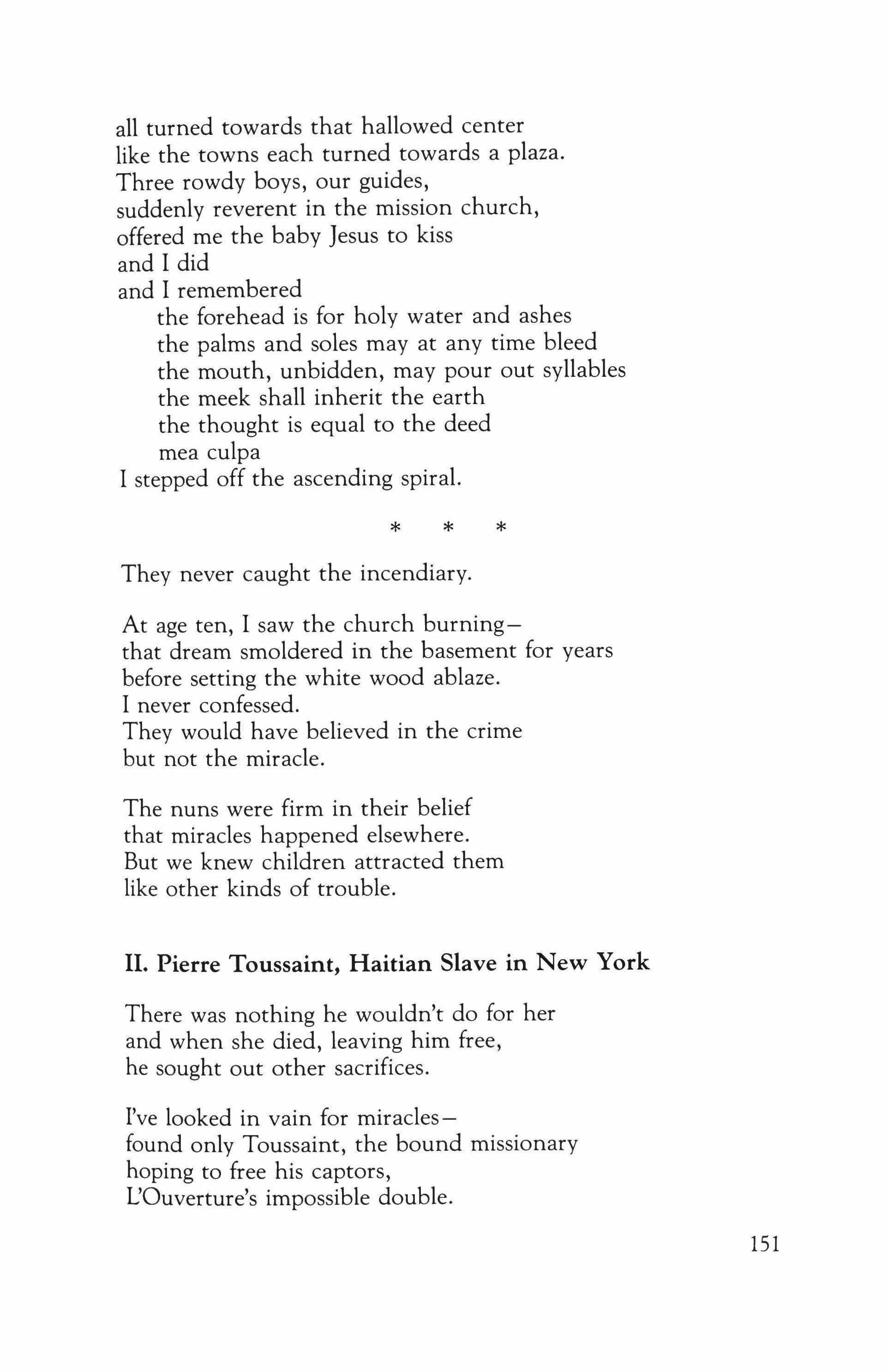
They never caught the incendiary.
At age ten, I saw the church burningthat dream smoldered in the basement for years before setting the white wood ablaze. I never confessed. They would have believed in the crime but not the miracle.
The nuns were firm in their belief that miracles happened elsewhere. But we knew children attracted them like other kinds of trouble.
II. Pierre Toussaint, Haitian Slave in New York
There was nothing he wouldn't do for her and when she died, leaving him free, he sought out other sacrifices.
I've looked in vain for miraclesfound only Toussaint, the bound missionary hoping to free his captors, L'Ouverture's impossible double.
* * *
151
Picture him
lovingly supporting his owner serving at parties he'd paid for "dressed in a red jacket, full of spirits, very fond of dancing and music."
He has not spoken. White praise fixes him as an organ grinder's monkey.
Picture him
"The attachment of these two classes, of mistress and slave, might almost reconcile us to domestic slavery, if we only selected particular instances."
Picture him driven as a monk is driven to love the maggots that live in his wounds.
Picture him
"God's image carved in ebony."
Brave new world, that has such people in it!
Brave new world where the master's tools build houses only fit for burning.
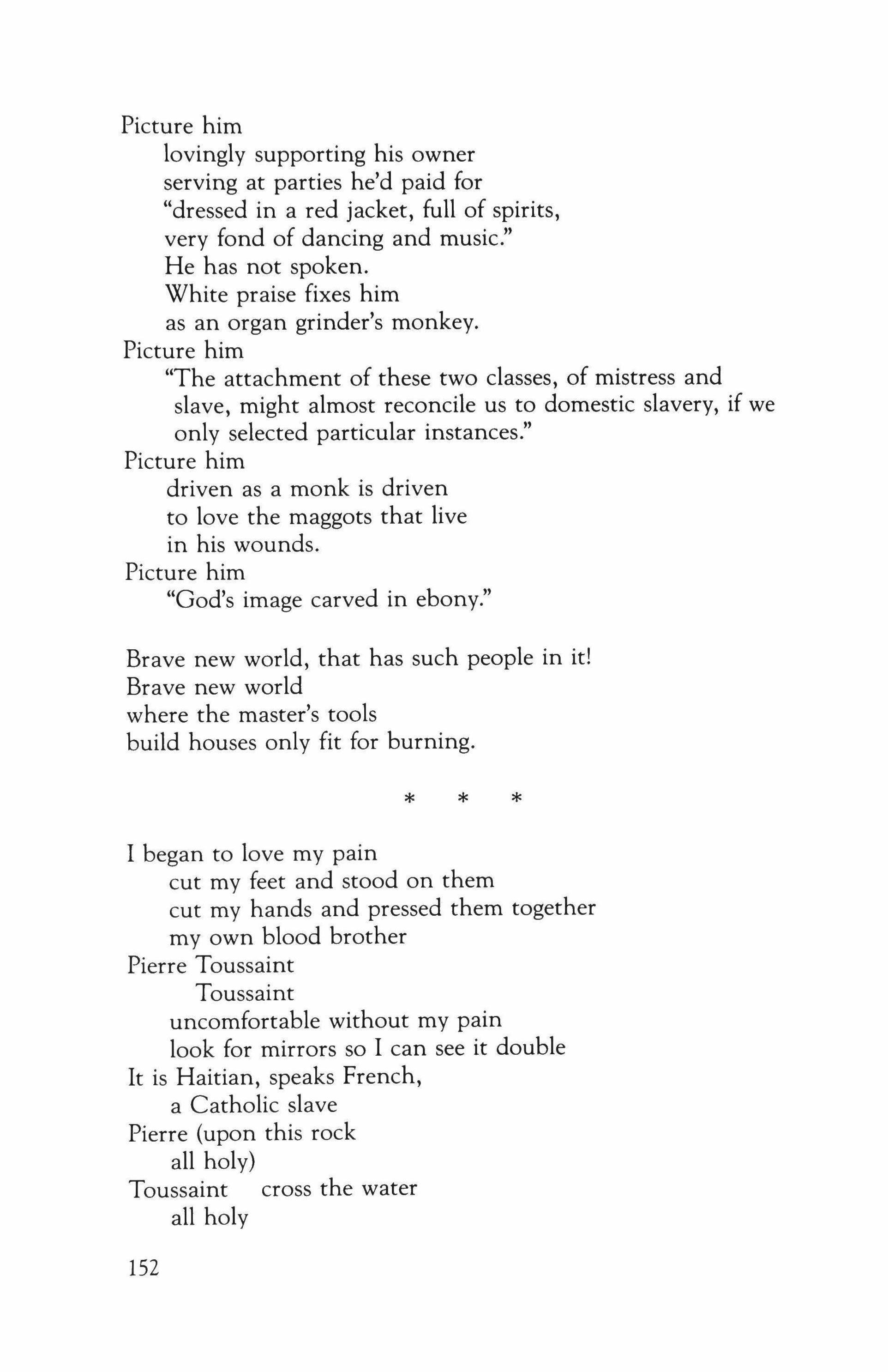
I began to love my pain cut my feet and stood on them cut my hands and pressed them together my own blood brother
Pierre Toussaint
Toussaint
uncomfortable without my pain look for mirrors so I can see it double
It is Haitian, speaks French, a Catholic slave
Pierre (upon this rock all holy)
Toussaint cross the water all holy
* * *
152
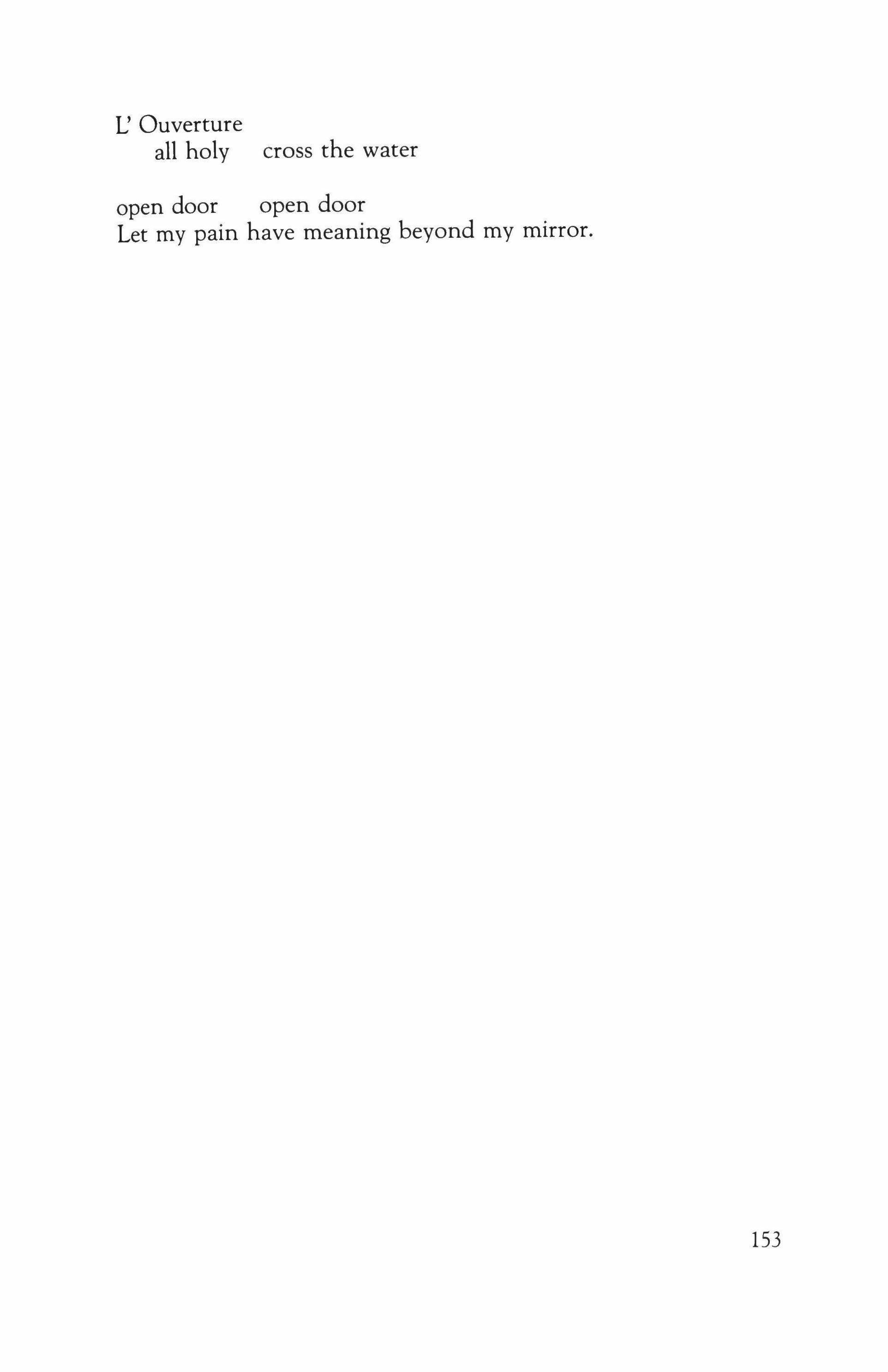
L' Ouverture all holy cross the water
open door open door
Let my pain have meaning beyond my mirror.
153
Migrants
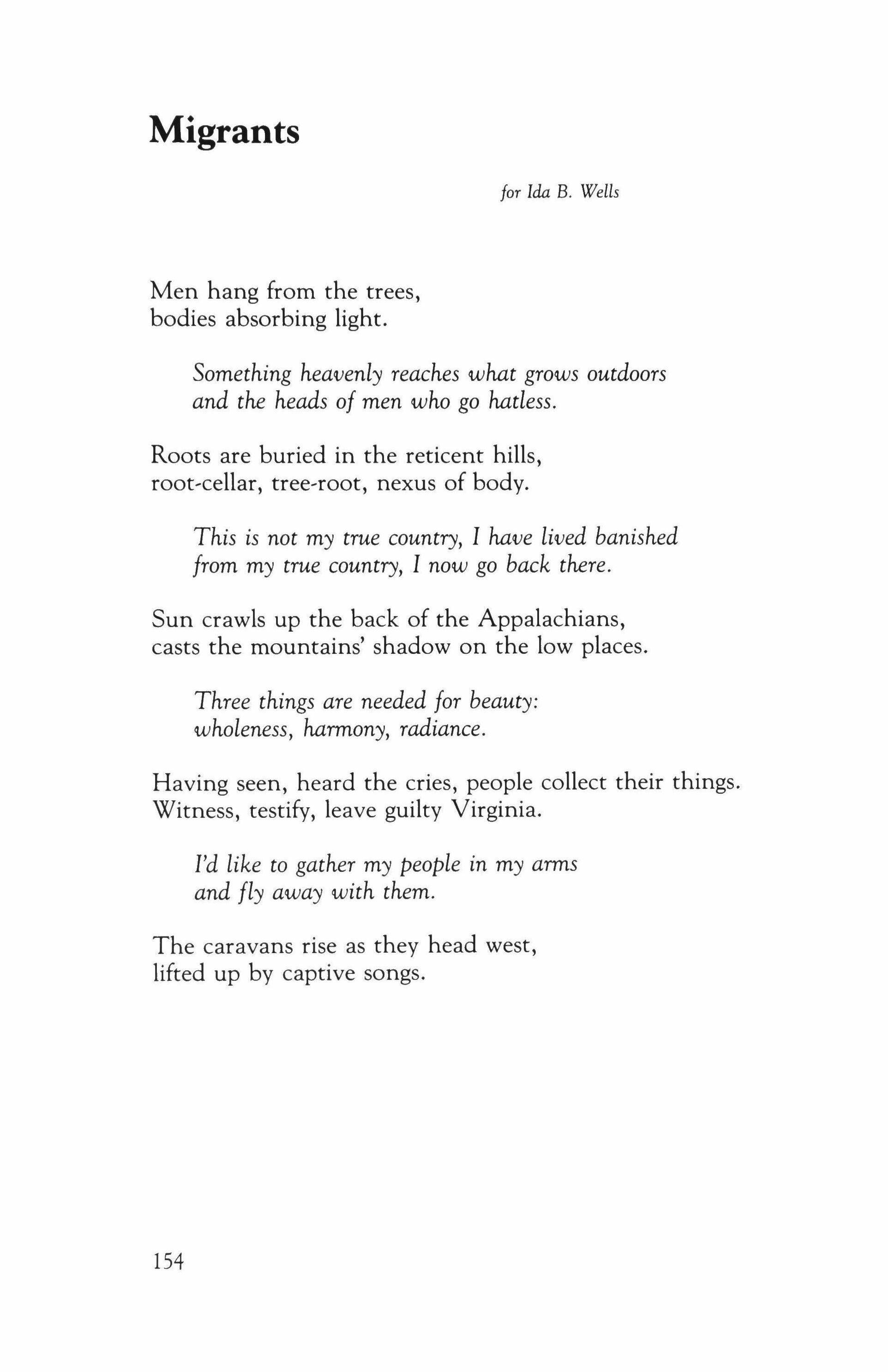 for Ida B. Wells
for Ida B. Wells
Men hang from the trees, bodies absorbing light.
Something heavenly reaches what grows outdoors and the heads of men who go hatless.
Roots are buried in the reticent hills, root-cellar, tree-root, nexus of body.
This is not my true country, I have lived banished from my true country, I now go back there.
Sun crawls up the back of the Appalachians, casts the mountains' shadow on the low places.
Three things are needed for beauty: wholeness, harmony, radiance.
Having seen, heard the cries, people collect their things. Witness, testify, leave guilty Virginia.
I'd like to gather my people in my arms and flyaway with them.
The caravans rise as they head west, lifted up by captive songs.
154
Two Poems
Holly Welker
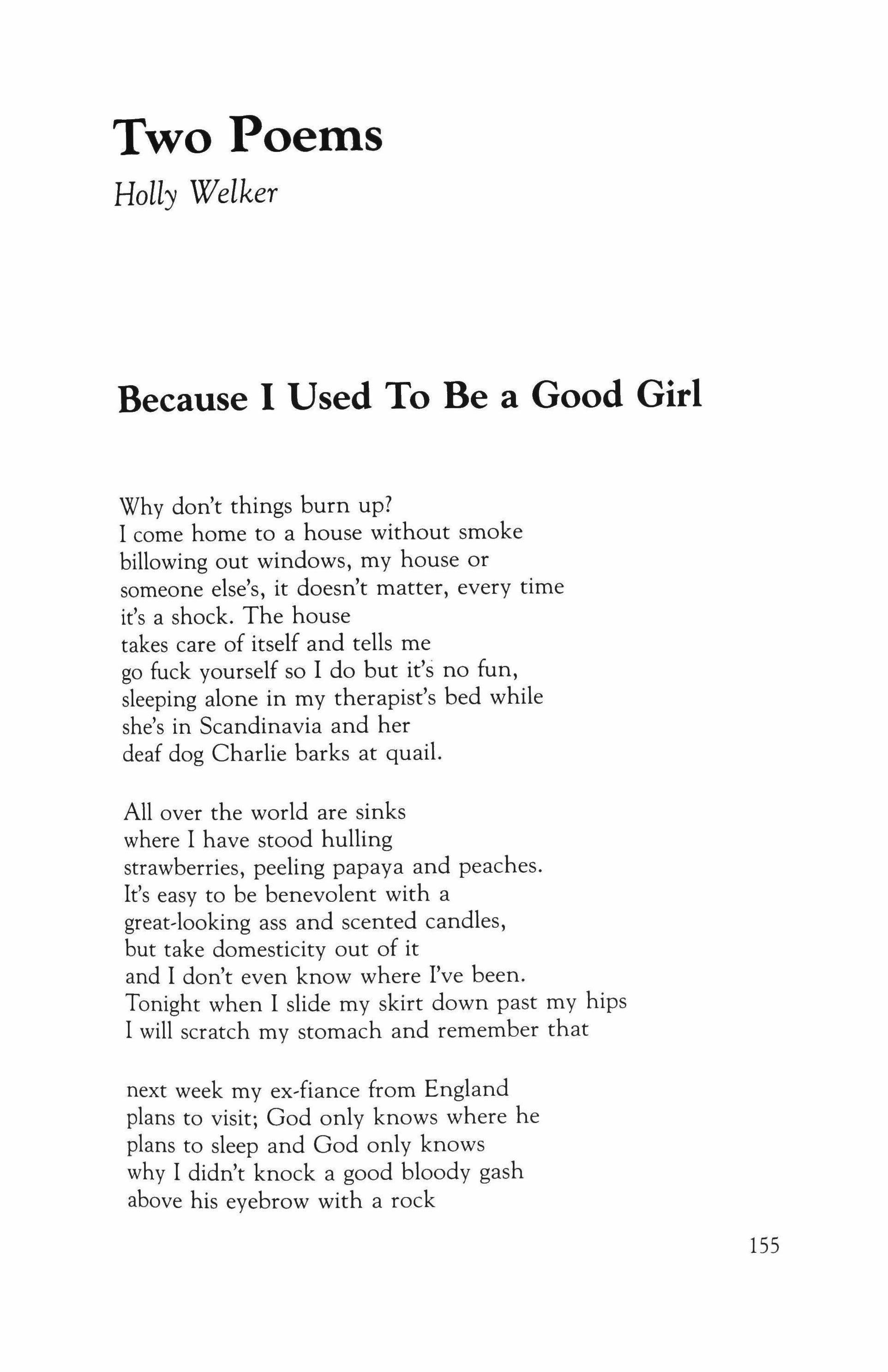
Because I Used To Be a Good Girl
Why don't things burn up?
I come home to a house without smoke billowing out windows, my house or someone else's, it doesn't matter, every time it's a shock. The house takes care of itself and tells me go fuck yourself so I do but it's no fun, sleeping alone in my therapist's bed while she's in Scandinavia and her deaf dog Charlie barks at quail.
All over the world are sinks where I have stood hulling strawberries, peeling papaya and peaches. It's easy to be benevolent with a great-looking ass and scented candles, but take domesticity out of it and I don't even know where I've been. Tonight when I slide my skirt down past my hips I will scratch my stomach and remember that next week my ex-fiance from England plans to visit; God only knows where he plans to sleep and God only knows why I didn't knock a good bloody gash above his eyebrow with a rock
155
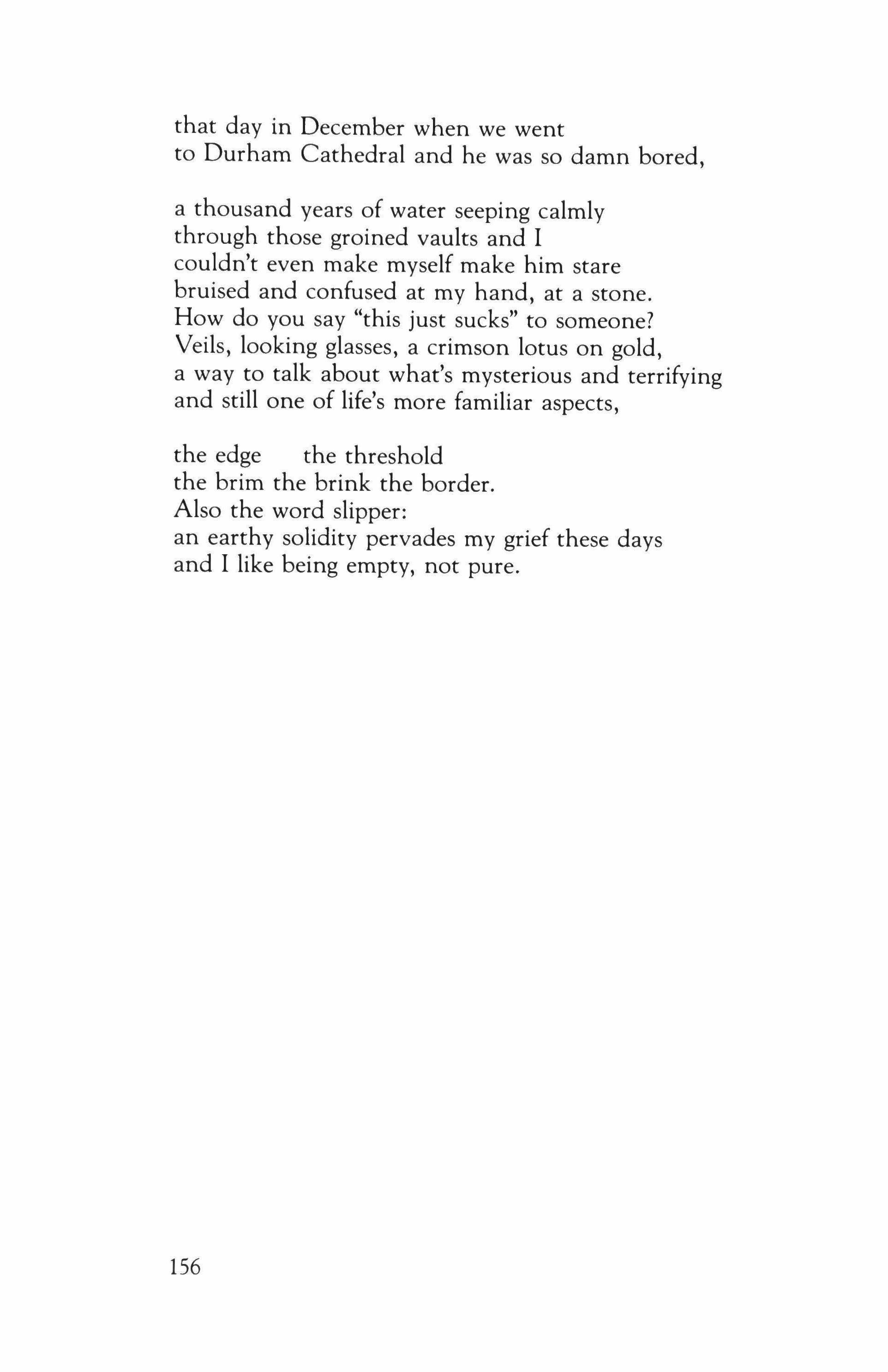
that day in December when we went to Durham Cathedral and he was so damn bored, a thousand years of water seeping calmly through those groined vaults and I couldn't even make myself make him stare bruised and confused at my hand, at a stone. How do you say "this just sucks" to someone? Veils, looking glasses, a crimson lotus on gold, a way to talk about what's mysterious and terrifying and still one of life's more familiar aspects, the edge the threshold the brim the brink the border. Also the word slipper: an earthy solidity pervades my grief these days and I like being empty, not pure.
156
Dynamics
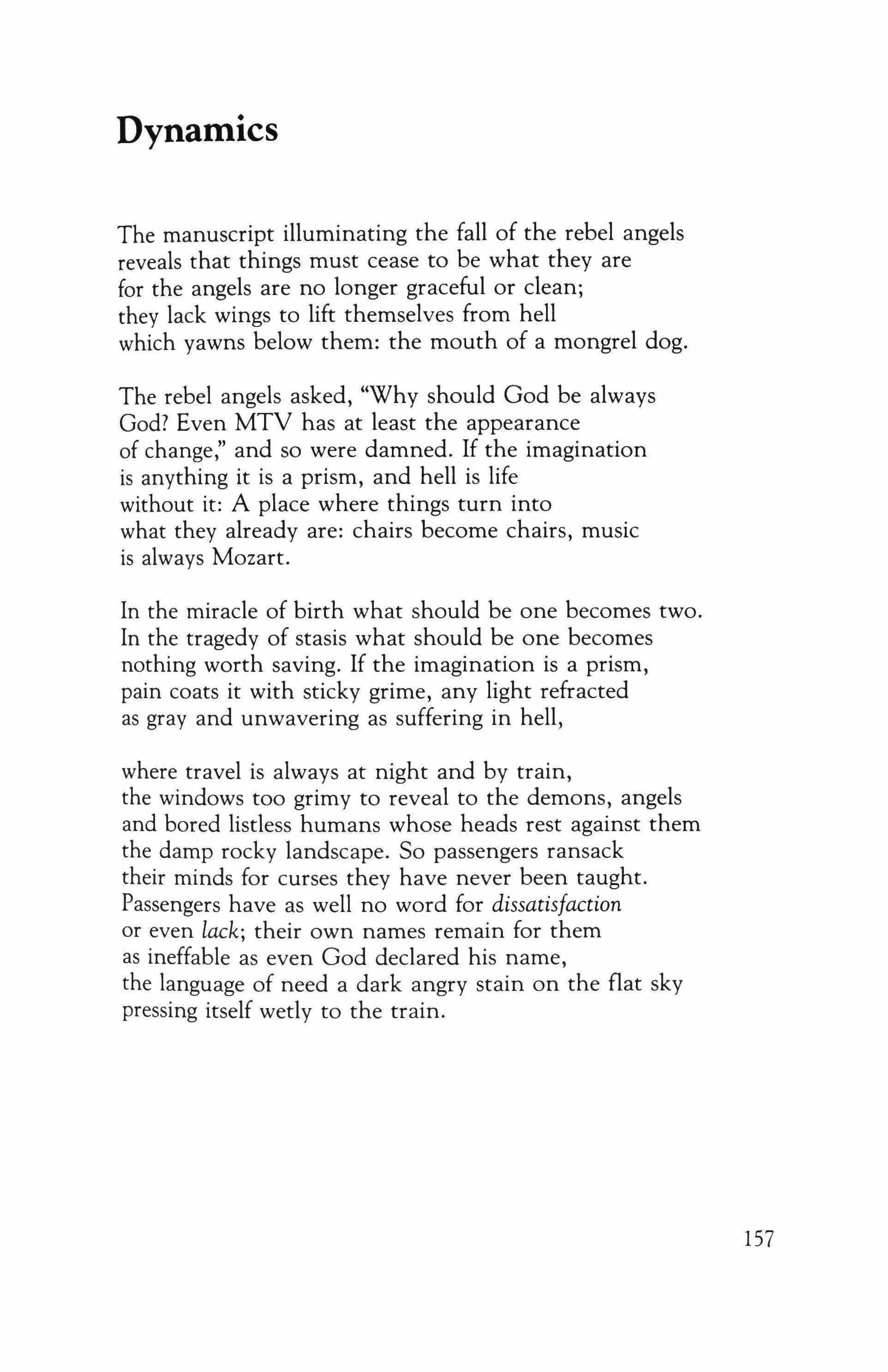
The manuscript illuminating the fall of the rebel angels reveals that things must cease to be what they are for the angels are no longer graceful or clean; they lack wings to lift themselves from hell which yawns below them: the mouth of a mongrel dog.
The rebel angels asked, "Why should God be always God? Even MTV has at least the appearance of change," and so were damned. If the imagination is anything it is a prism, and hell is life without it: A place where things turn into what they already are: chairs become chairs, music is always Mozart.
In the miracle of birth what should be one becomes two. In the tragedy of stasis what should be one becomes nothing worth saving. If the imagination is a prism, pain coats it with sticky grime, any light refracted as gray and unwavering as suffering in hell,
where travel is always at night and by train, the windows too grimy to reveal to the demons, angels and bored listless humans whose heads rest against them the damp rocky landscape. So passengers ransack their minds for curses they have never been taught. Passengers have as well no word for dissatisfaction or even lack; their own names remain for them as ineffable as even God declared his name, the language of need a dark angry stain on the flat sky pressing itself wetly to the train.
157
Womeru Image and Myth
Barbara Thomas

The representation of women in art has become an increasingly sensitive topic in the last two decades. Women's bodies, after centuries of being perhaps one of the most widely used subjects for artists, have come to be seen by many as the most exploited. This change of consciousness has been brought about mainly by the second wave of the feminist movement, beginning in the late 1960s, and by the impact that deconstructionist theories have had on literature and visual art in recent years. A serious practitioner can no longer afford to ignore criticism which demonstrates how all images and imagemakers are complicit in constructing the myths by which we live our lives.
Deconstruction helps us to understand how images that were once thought to express the true nature of women are actually social constructions and despite deeply felt beliefs to the contrary, have no basis In biology or the natural world. Those who have chosen to represent women in their work in this atmosphere, be they male or female, have left themselves open to much criticism. As the layers of lllusion have been stripped away by artists and critics, everything is now open to question; nothing is allowed to stand at face value. The problem is even more acute for those have have chosen photography as their medium. Depending on the way one views the medium, photography is thought by many to be either a co-conspirator, or the main culprit in stereotyping women and turning them into objects.
It is into this minefield of theories and countertheories that I have chosen to walk. Rather than employing a "postmodern" strategy as a way of dealing with the representation of women in photography, I have chosen a more traditional approach, that of the street photographer. Armed with a small 35mm camera, the traditional tool of the street
158

photographer, I photographed women in public places, mainly upscale shopping areas of Chicago and San Francisco. I began the work in black and white and later moved to color. There were many reasons for this choice of venue. Fashionable streets and stores offer the promise of perfecting the image that women have or wish to have of themselves. Those who have the money may attempt to purchase the image; those who are unable to purchase the image often watch and absorb the information so that they may try to duplicate the image in an alternate manner. Whether they buy or merely observe, all participants size themselves up in relation to each other and the image. The most intriguing aspect of the shopping area is that, unlike the fashion magazine, movie or television show, the street offers both the idealized image as represented by mannequins in window displays, posters, promotions, artfully arranged merchandise and the sales staff (often hired to portray a specific image), and the various interpretations of the image as seen on the shoppers and browsers. Therefore, the ideal and the interpretations of the ideal exist side by side. Distinctions between what is "real" and what is not become blurred in this milieu. One finds a complex series of interpretations of an image.
Sources for these images are many-Hollywood (the image of Marilyn Monroe and other movie stars, mainly from the past), old money (the upper classes as seen in designer Ralph Lauren's appropriation of the impeccable, well-tailored, well-monied look), art history (art images have always been used to provide instant "class" in advertising), pop music (pop stars like Madonna and the iconography ofrock and roll are widely used, especially in stores and departments catering to teenagers), and of course fashion, which draws from all of these sources. The participants in this world offer a sharp series of contrasts: fashionable and unfashionable, old and young, rich and poor, white and nonwhite, male and female, those who understand the rules of the game and those who don't.
John Berger stated in Ways of Seeing: "A woman must watch herself. She is almost continually accompanied by her own image of herself Women watch themselves being looked at." Since young adulthood I have felt simultaneously attracted and repelled by this world. I am both the voyeur and the looked at. Being both the watcher and the watched, I have felt this work to be autobiographical in the manner of a novel or a fiction film. My image does not appear, but my ideas about myself and other women are projected for others to see and interpret according to the tension that exists between their inner lives and the outside world.
159
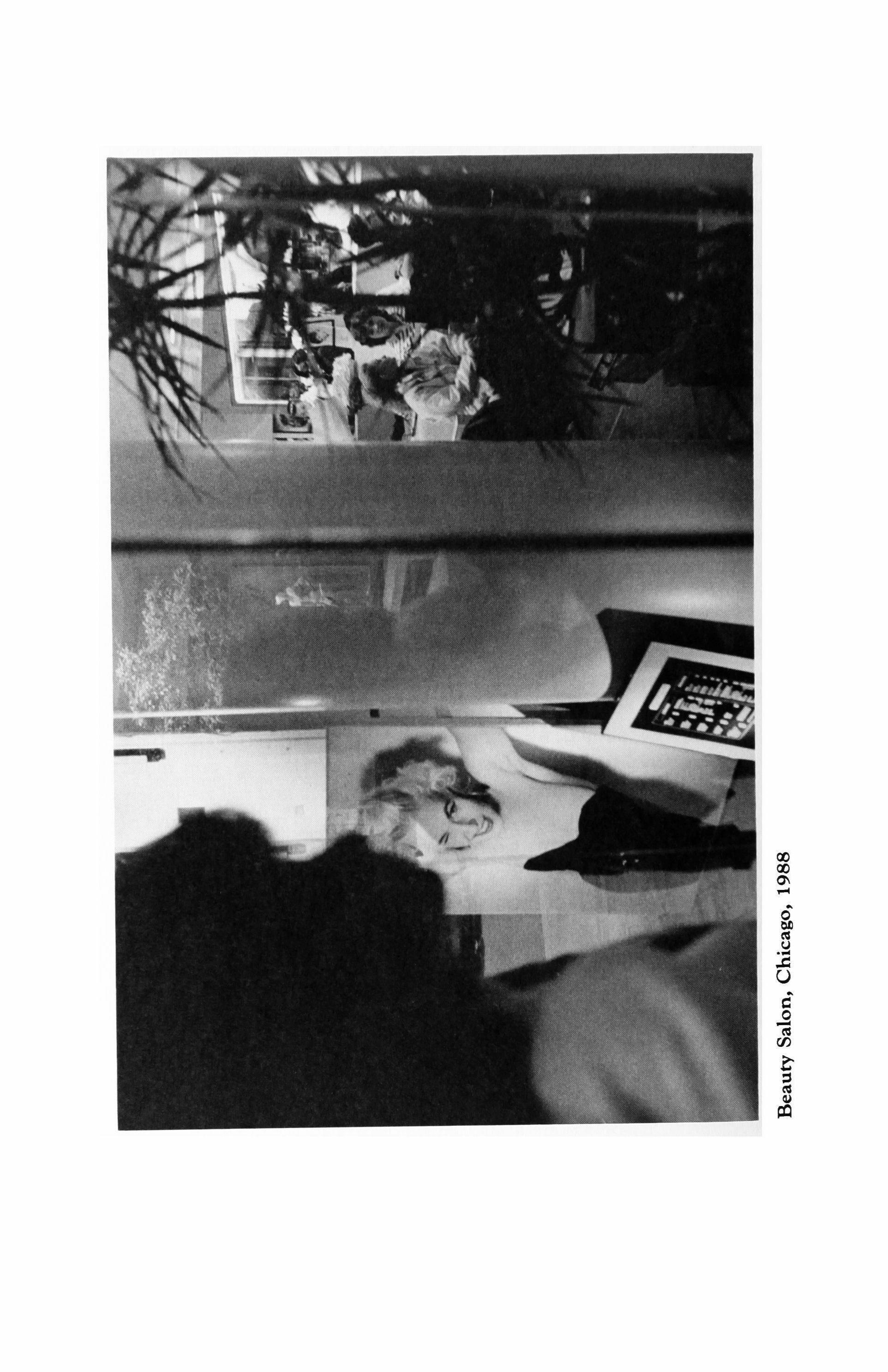
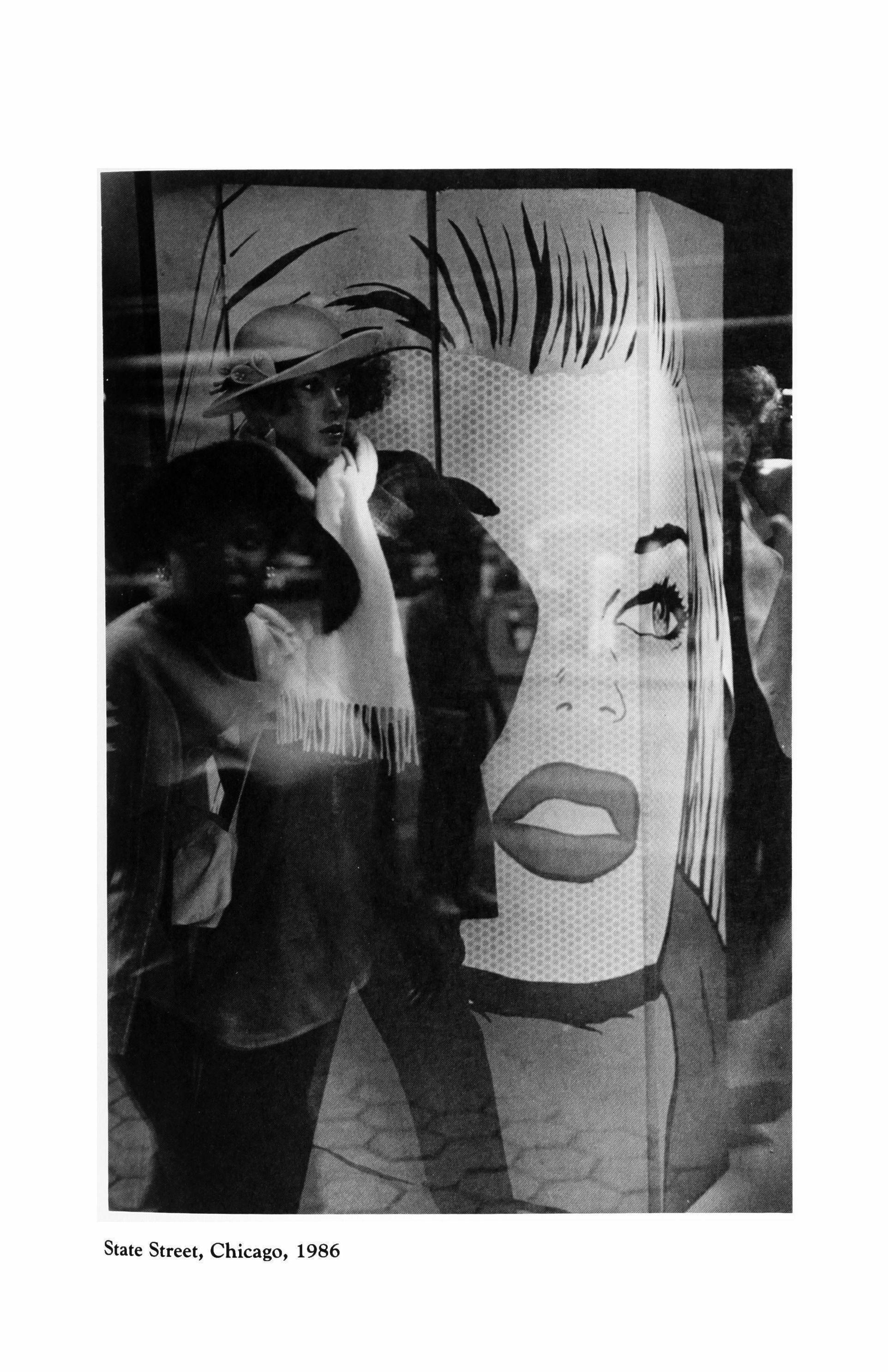
State Street, Chicago, 1986
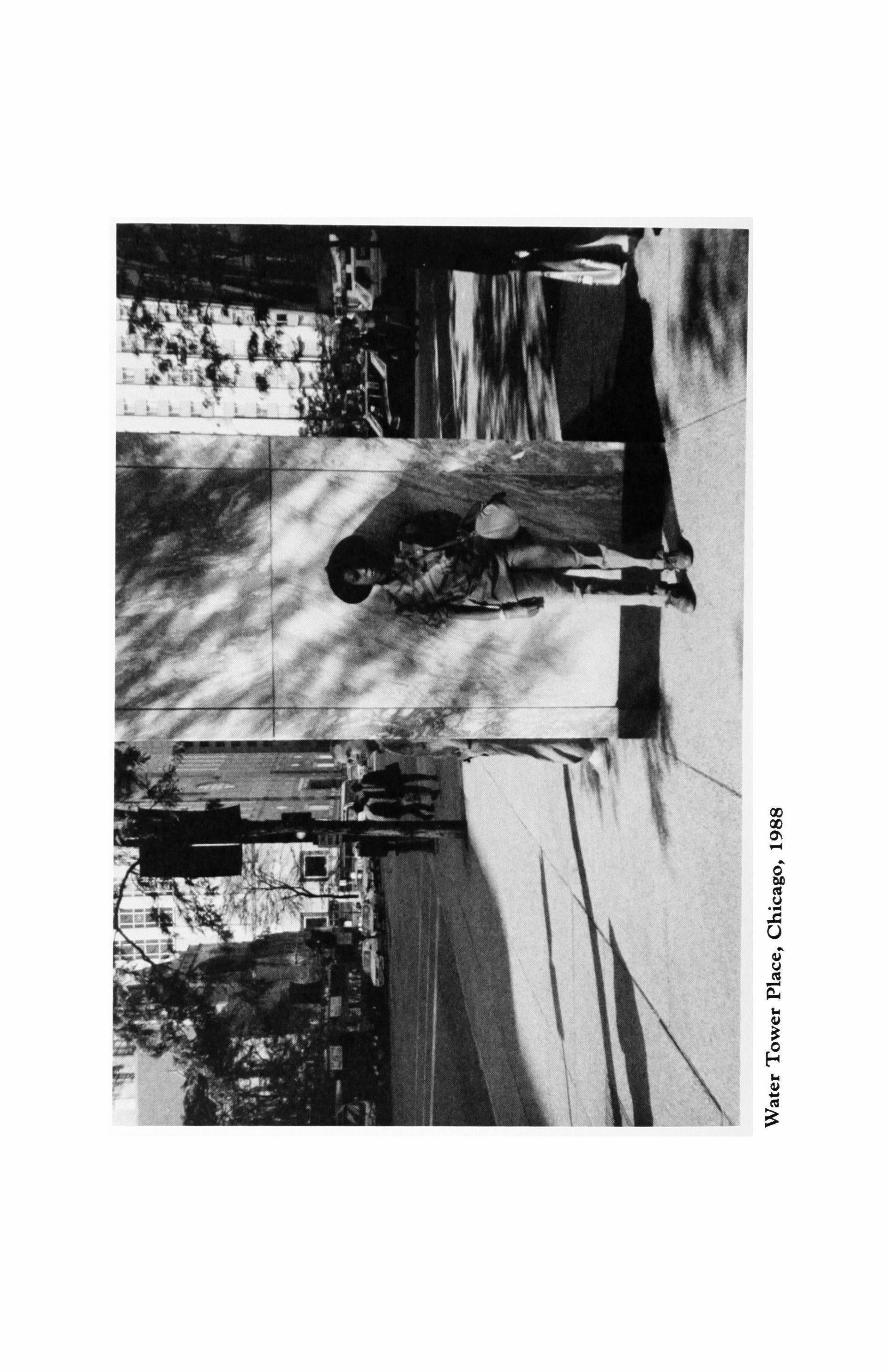

00 00 0"1
Two Prose Poems
Rene Steinke

The Psychology of the Sentence: Case Histories
Simple: It wants to be solid and unmovable as a rock, but as we have seen at the tomb, rocks are sometimes rolled away and new declarations made, each one, says Sisyphus, equally heavy. It wants to be two things at once, interchangeable as the head and tail of a worm, or a magic act, the scarves changed into the rabbit, hiding the sleights of the hand that bring about its transformation. It happens. That's it. In the long, disorienting dramas of the senses, it's the little man who steps out in front of the curtain to state what has not been said: this is this.
Question: Like the loop of a half-drawn shade, the keyhole, a flex of streetlight in the familiar, feelable dark of your room, it hangs there. Like a eat's striped tail, a string caught on the lint of a coat, an IOU, it rises up and follows. It is one leg, one wing, one side of the page, an eyelid cocked like a lens. You will not know unless you ask. A dancing man extends his long, gloved hand, a boulder is precariously clenched and lifted by the jaws of a crane, a nude woman walks out ofthe ocean, door ajar, purple sunrise, someone standing there, his face unfinished.
Compound: Siamese twins are not always happily connected, for one will often have more to say than the other. Scales are easily tipped, and one mouth is wiser when it explains another. Only in the very long and circuitous outlines of a map, the entanglements of love knotted, or a bent tin ladder, can one forget their quarrel, ing, their one-upmanship, because the short ones, like short un-
164
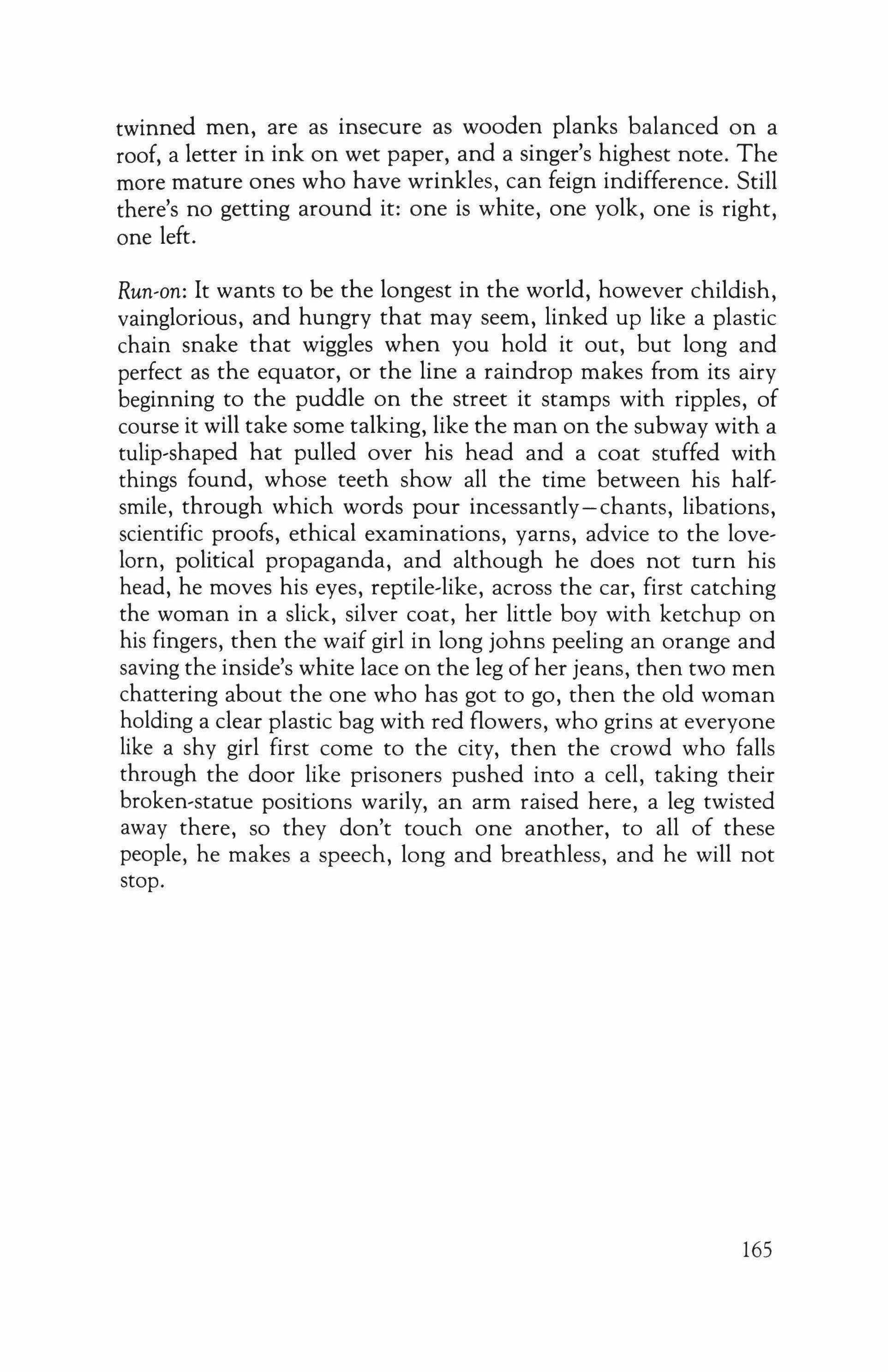
twinned men, are as insecure as wooden planks balanced on a roof, a letter in ink on wet paper, and a singer's highest note. The more mature ones who have wrinkles, can feign indifference. Still there's no getting around it: one is white, one yolk, one is right, one left.
Run-on: It wants to be the longest in the world, however childish, vainglorious, and hungry that may seem, linked up like a plastic chain snake that wiggles when you hold it out, but long and perfect as the equator, or the line a raindrop makes from its airy beginning to the puddle on the street it stamps with ripples, of course it will take some talking, like the man on the subway with a tulip-shaped hat pulled over his head and a coat stuffed with things found, whose teeth show all the time between his halfsmile, through which words pour incessantly-chants, libations, scientific proofs, ethical examinations, yarns, advice to the lovelorn, political propaganda, and although he does not turn his head, he moves his eyes, reptile-like, across the car, first catching the woman in a slick, silver coat, her little boy with ketchup on his fingers, then the waif girl in long johns peeling an orange and saving the inside's white lace on the leg of her jeans, then two men chattering about the one who has got to go, then the old woman holding a clear plastic bag with red flowers, who grins at everyone like a shy girl first come to the city, then the crowd who falls through the door like prisoners pushed into a cell, taking their broken-statue positions warily, an arm raised here, a leg twisted away there, so they don't touch one another, to all of these people, he makes a speech, long and breathless, and he will not stop.
165
Emmet Street
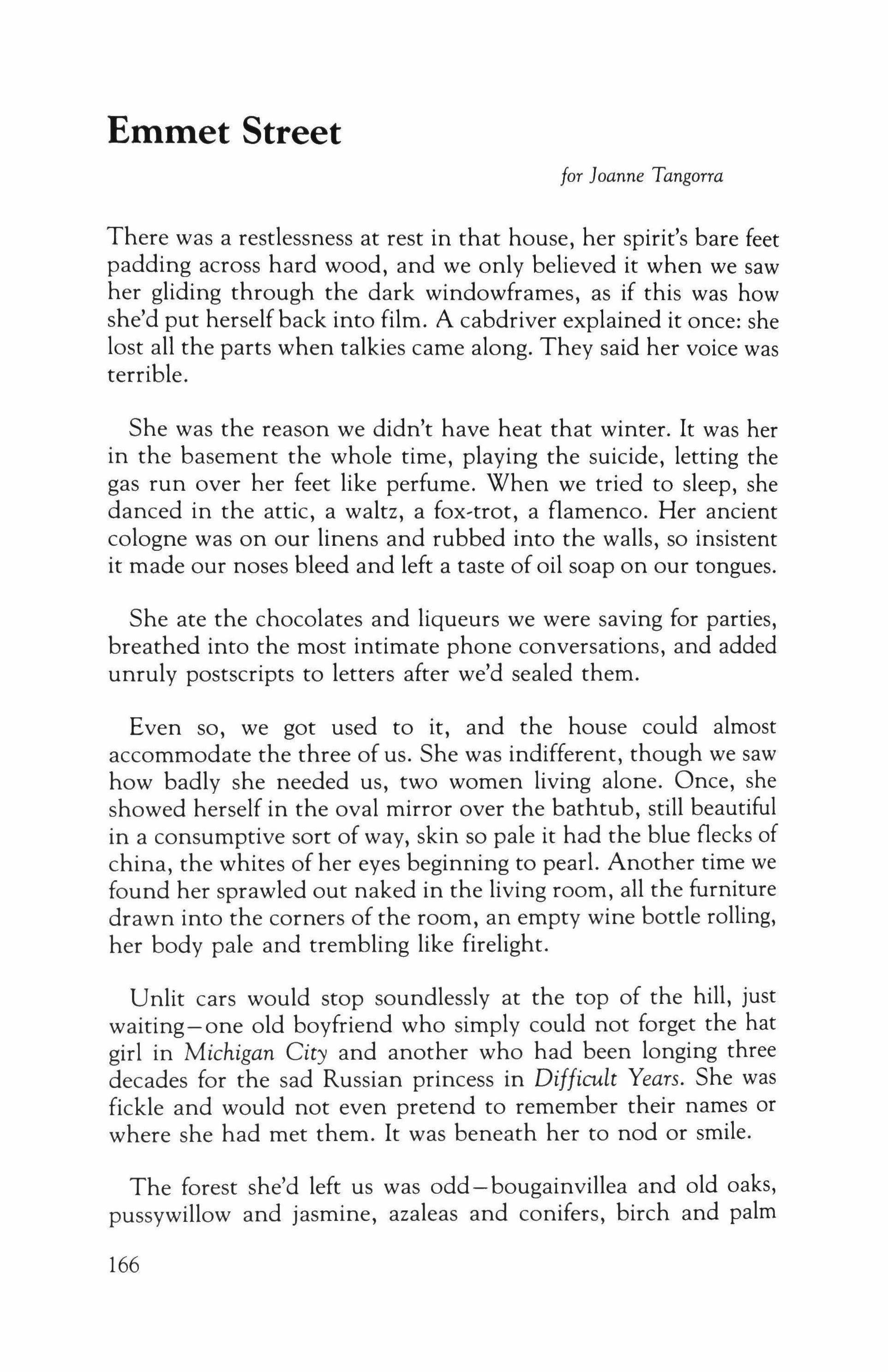 for Joanne Tangorra
for Joanne Tangorra
There was a restlessness at rest in that house, her spirit's bare feet padding across hard wood, and we only believed it when we saw her gliding through the dark windowframes, as if this was how she'd put herself back into film. A cabdriver explained it once: she lost all the parts when talkies came along. They said her voice was terrible.
She was the reason we didn't have heat that winter. It was her in the basement the whole time, playing the suicide, letting the gas run over her feet like perfume. When we tried to sleep, she danced in the attic, a waltz, a fox-trot, a flamenco. Her ancient cologne was on our linens and rubbed into the walls, so insistent it made our noses bleed and left a taste of oil soap on our tongues.
She ate the chocolates and liqueurs we were saving for parties, breathed into the most intimate phone conversations, and added unruly postscripts to letters after we'd sealed them.
Even so, we got used to it, and the house could almost accommodate the three of us. She was indifferent, though we saw how badly she needed us, two women living alone. Once, she showed herself in the oval mirror over the bathtub, still beautiful in a consumptive sort of way, skin so pale it had the blue flecks of china, the whites of her eyes beginning to pearl. Another time we found her sprawled out naked in the living room, all the furniture drawn into the corners of the room, an empty wine bottle rolling, her body pale and trembling like firelight.
Unlit cars would stop soundlessly at the top of the hill, just waiting-one old boyfriend who simply could not forget the hat girl in Michigan City and another who had been longing three decades for the sad Russian princess in Difficult Years. She was fickle and would not even pretend to remember their names or where she had met them. It was beneath her to nod or smile.
The forest she'd left us was odd-bougainvillea and old oaks, pussywillow and jasmine, azaleas and conifers, birch and palm
166

and dogwood - a thicket like a swath of dirty green lace off some trapeze costume. I saw her standing in the middle of it once, a hood over her eyes, hands pressed together, the yellow flowers around her caught like stars in the black tracery of stained glass.
Finally she spoke, and it was all we could do, we listened. She wouldn't stop, as if grief had frozen her tongue all those years and made it beautiful in the thawing. All spring she sang arias through the drainpipes when it rained and the doxology on white, sunny mornings. She recited sonnets from the fireplace through the soot, sparks flying up afterwards. Her voice was hoarse and urgent: a nun whispering penance over her beads, a schoolgirl telling secrets through her cupped hands, a woman murmuring radiantly through a blanket, to the stranger, whom she dreamed into a lover only the night before.
167
The Clock
Cassandra Smith
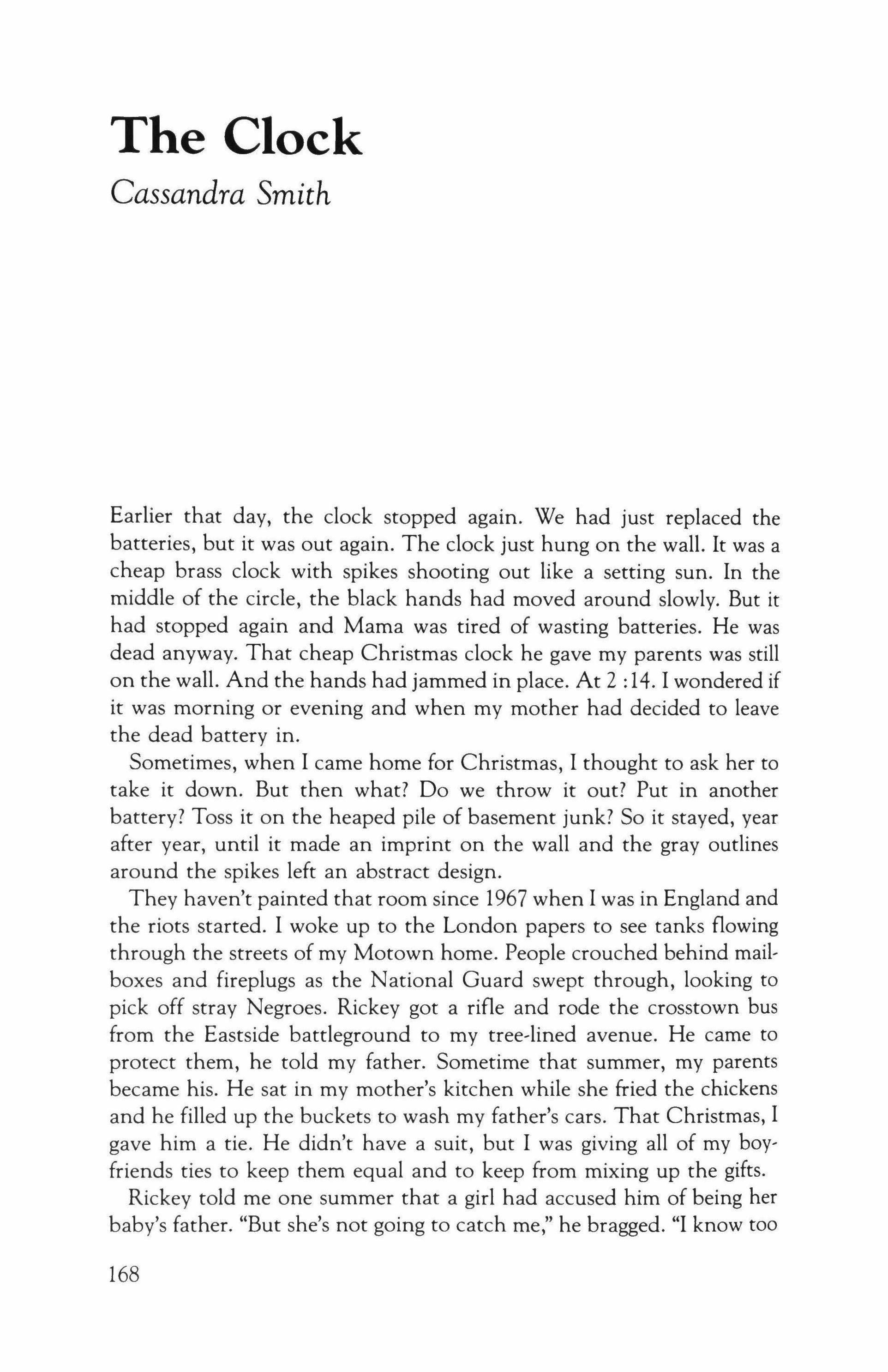
Earlier that day, the clock stopped again. We had just replaced the batteries, but it was out again. The clock just hung on the wall. It was a cheap brass clock with spikes shooting out like a setting sun. In the middle of the circle, the black hands had moved around slowly. But it had stopped again and Mama was tired of wasting batteries. He was dead anyway. That cheap Christmas clock he gave my parents was still on the wall. And the hands had jammed in place. At 2 : 14. I wondered if it was morning or evening and when my mother had decided to leave the dead battery in.
Sometimes, when I came home for Christmas, I thought to ask her to take it down. But then what? Do we throw it out? Put in another battery? Toss it on the heaped pile of basement junk? So it stayed, year after year, until it made an imprint on the wall and the gray outlines around the spikes left an abstract design.
They haven't painted that room since 1967 when I was in England and the riots started. I woke up to the London papers to see tanks flowing through the streets of my Motown home. People crouched behind mailboxes and fireplugs as the National Guard swept through, looking to pick off stray Negroes. Rickey got a rifle and rode the crosstown bus from the Eastside battleground to my tree-lined avenue. He came to protect them, he told my father. Sometime that summer, my parents became his. He sat in my mother's kitchen while she fried the chickens and he filled up the buckets to wash my father's cars. That Christmas, I gave him a tie. He didn't have a suit, but I was giving all of my boyfriends ties to keep them equal and to keep from mixing up the gifts. Rickey told me one summer that a girl had accused him of being her baby's father. "But she's not going to catch me," he bragged. "I know too
168
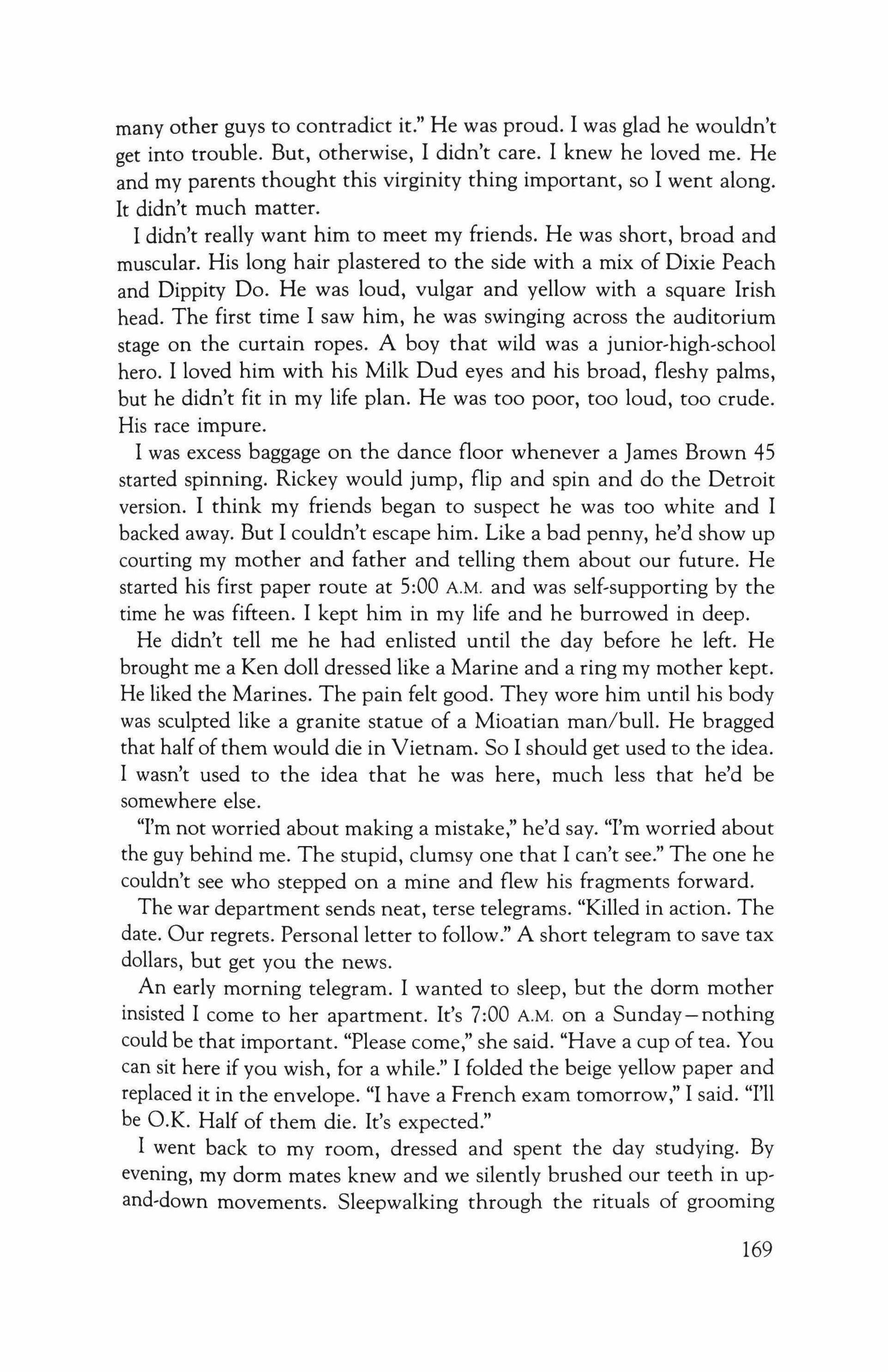
many other guys to contradict it." He was proud. I was glad he wouldn't get into trouble. But, otherwise, I didn't care. I knew he loved me. He and my parents thought this virginity thing important, so I went along. It didn't much matter.
I didn't really want him to meet my friends. He was short, broad and muscular. His long hair plastered to the side with a mix of Dixie Peach and Dippirv Do. He was loud, vulgar and yellow with a square Irish head. The first time I saw him, he was swinging across the auditorium stage on the curtain ropes. A boy that wild was a junior-high-school hero. I loved him with his Milk Dud eyes and his broad, fleshy palms, but he didn't fit in my life plan. He was too poor, too loud, too crude. His race impure.
I was excess baggage on the dance floor whenever a James Brown 45 started spinning. Rickey would jump, flip and spin and do the Detroit version. I think my friends began to suspect he was too white and I backed away. But I couldn't escape him. Like a bad penny, he'd show up courting my mother and father and telling them about our future. He started his first paper route at 5:00 A.M. and was self-supporting by the time he was fifteen. I kept him in my life and he burrowed in deep.
He didn't tell me he had enlisted until the day before he left. He brought me a Ken doll dressed like a Marine and a ring my mother kept. He liked the Marines. The pain felt good. They wore him until his body was sculpted like a granite statue of a Mioatian man/bull. He bragged that half of them would die in Vietnam. So I should get used to the idea. I wasn't used to the idea that he was here, much less that he'd be somewhere else.
"I'm not worried about making a mistake," he'd say. "I'm worried about the guy behind me. The stupid, clumsy one that I can't see." The one he couldn't see who stepped on a mine and flew his fragments forward.
The war department sends neat, terse telegrams. "Killed in action. The date. Our regrets. Personal letter to follow." A short telegram to save tax dollars, but get you the news.
An early morning telegram. I wanted to sleep, but the dorm mother insisted I come to her apartment. It's 7:00 A.M. on a Sunday-nothing could be that important. "Please come," she said. "Have a cup of tea. You can sit here if you wish, for a while." I folded the beige yellow paper and replaced it in the envelope. "I have a French exam tomorrow," I said. "I'll be O.K. Half of them die. It's expected."
I went back to my room, dressed and spent the day studying. By evening, my dorm mates knew and we silently brushed our teeth in upand-down movements. Sleepwalking through the rituals of grooming
169

and studying. We never talked about it and my grades began to rise. Exams, essays, all information stuck to my brain easily with soft, sticky glue. I could repeat back anything I'd heard or read and the professors were impressed by my sudden improvement. The application of discipline, they thought. If only a student applies himself.
I dated him repeatedly after his death. In D.C. he was 6'4" and in Mexico he was 5'2". The Jamaican version showed up the year the wall was chiseled and, in Chicago he spoke with a Kentucky accent.
The clock is crooked and the spokes reveal the outline behind. I'd like to buy some new batteries, but the old ones are rusted in place.
170
Two Stories
Ron Whitehead
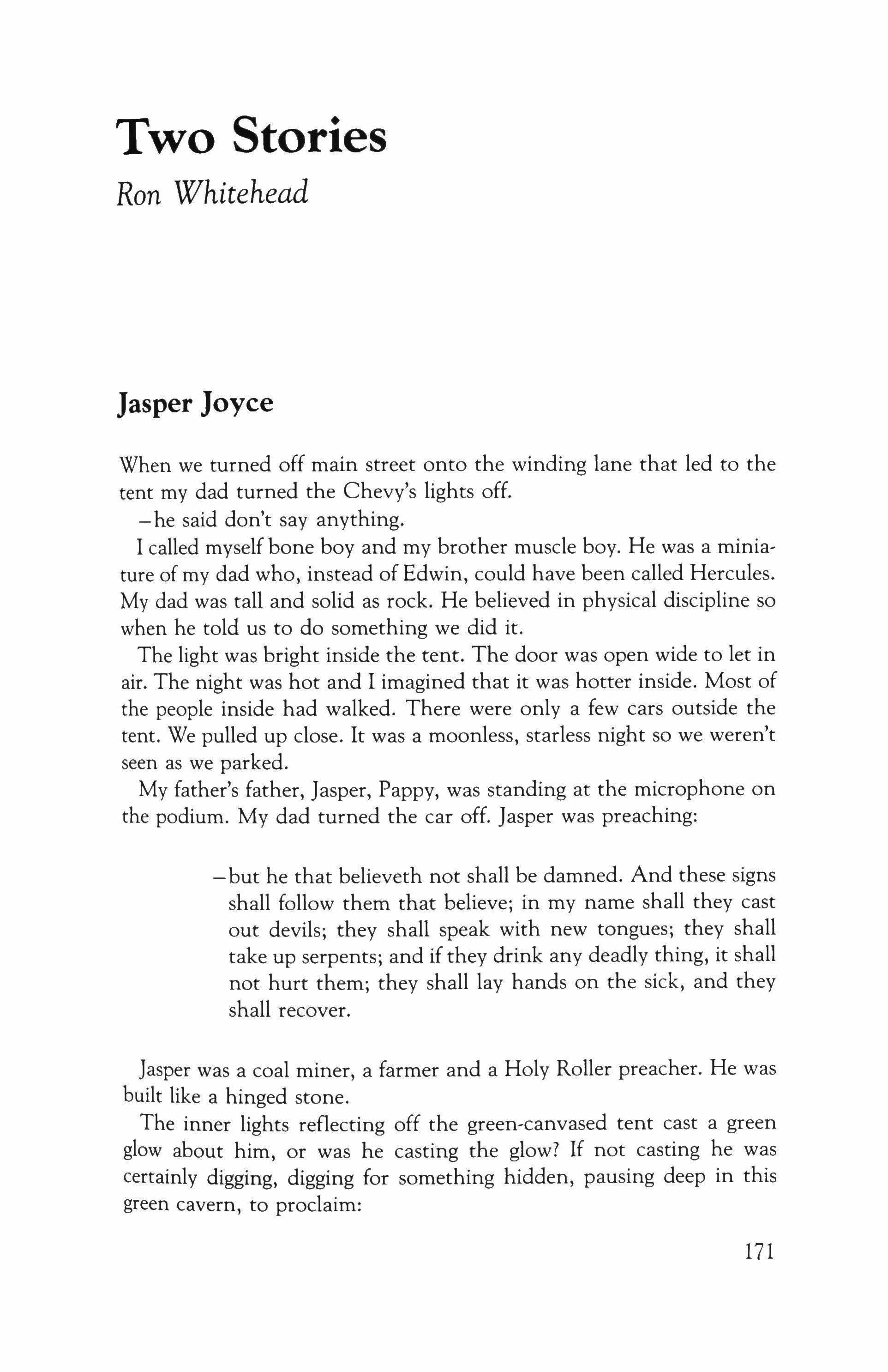
Jasper Joyce
When we turned off main street onto the winding lane that led to the tent my dad turned the Chevy's lights off.
- he said don't say anything.
I called myself bone boy and my brother muscle boy. He was a miniature of my dad who, instead of Edwin, could have been called Hercules. My dad was tall and solid as rock. He believed in physical discipline so when he told us to do something we did it.
The light was bright inside the tent. The door was open wide to let in air. The night was hot and I imagined that it was hotter inside. Most of the people inside had walked. There were only a few cars outside the tent. We pulled up close. It was a moonless, starless night so we weren't seen as we parked.
My father's father, Jasper, Pappy, was standing at the microphone on the podium. My dad turned the car off. Jasper was preaching:
- but he that believeth not shall be damned. And these signs shall follow them that believe; in my name shall they cast out devils; they shall speak with new tongues; they shall take up serpents; and if they drink any deadly thing, it shall not hurt them; they shall lay hands on the sick, and they shall recover.
Jasper was a coal miner, a farmer and a Holy Roller preacher. He was built like a hinged stone.
The inner lights reflecting off the green-canvased tent cast a green glow about him, or was he casting the glow? If not casting he was certainly digging, digging for something hidden, pausing deep in this green cavern, to proclaim:
171
-
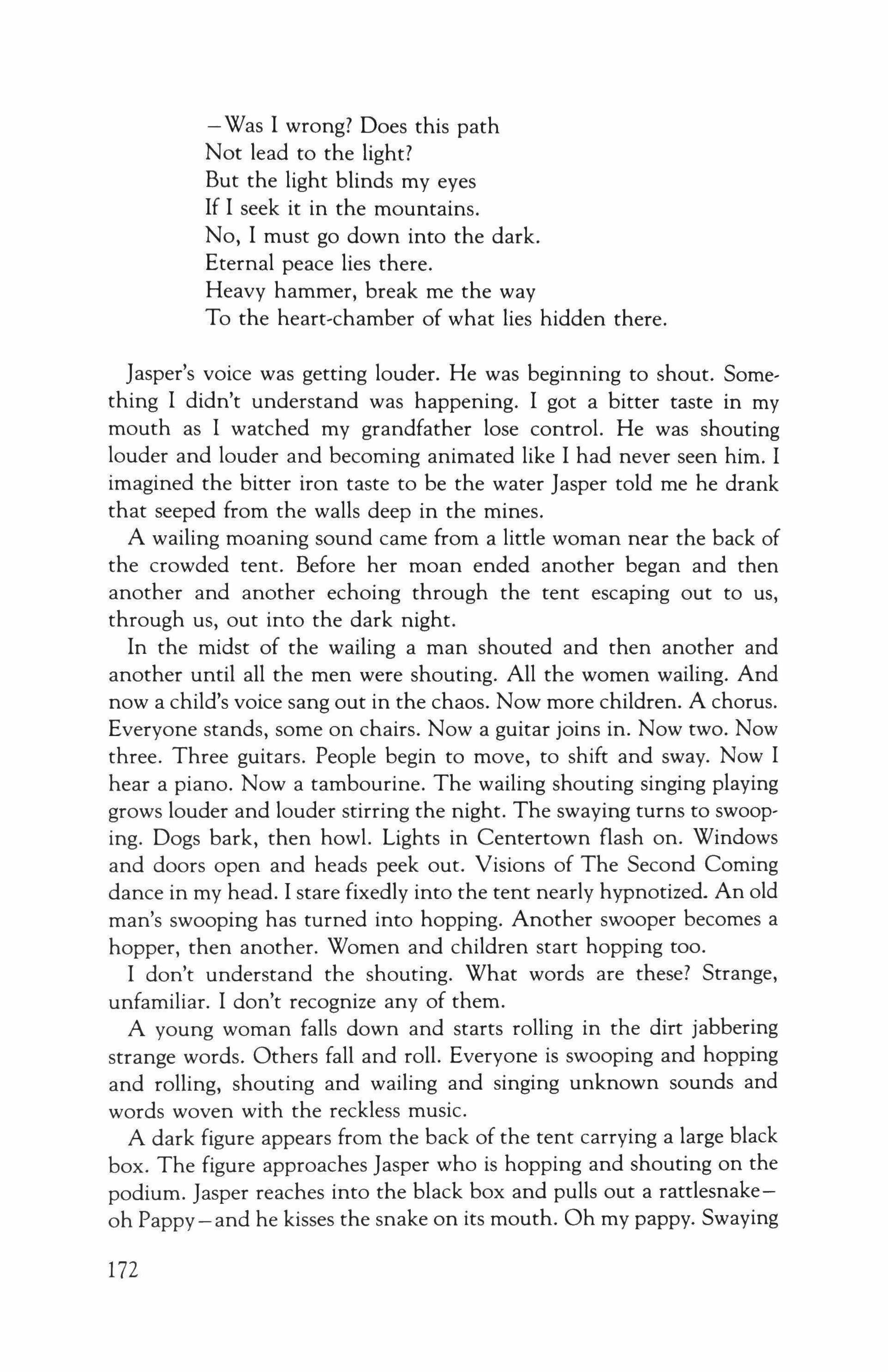
Was I wrong? Does this path
Not lead to the light?
But the light blinds my eyes If I seek it in the mountains. No, I must go down into the dark. Eternal peace lies there.
Heavy hammer, break me the way To the heart-chamber of what lies hidden there.
Jasper's voice was getting louder. He was beginning to shout. Something I didn't understand was happening. I got a bitter taste in my mouth as I watched my grandfather lose control. He was shouting louder and louder and becoming animated like I had never seen him. I imagined the bitter iron taste to be the water Jasper told me he drank that seeped from the walls deep in the mines.
A wailing moaning sound came from a little woman near the back of the crowded tent. Before her moan ended another began and then another and another echoing through the tent escaping out to us, through us, out into the dark night.
In the midst of the wailing a man shouted and then another and another until all the men were shouting. All the women wailing. And now a child's voice sang out in the chaos. Now more children. A chorus. Everyone stands, some on chairs. Now a guitar joins in. Now two. Now three. Three guitars. People begin to move, to shift and sway. Now I hear a piano. Now a tambourine. The wailing shouting singing playing grows louder and louder stirring the night. The swaying turns to swooping. Dogs bark, then howl. Lights in Centertown flash on. Windows and doors open and heads peek out. Visions of The Second Coming dance in my head. I stare fixedly into the tent nearly hypnotized. An old man's swooping has turned into hopping. Another swooper becomes a hopper, then another. Women and children start hopping too.
I don't understand the shouting. What words are these? Strange, unfamiliar. I don't recognize any of them.
A young woman falls down and starts rolling in the dirt jabbering strange words. Others fall and roll. Everyone is swooping and hopping and rolling, shouting and wailing and singing unknown sounds and words woven with the reckless music.
A dark figure appears from the back of the tent carrying a large black box. The figure approaches Jasper who is hopping and shouting on the podium. Jasper reaches into the black box and pulls out a rattlesnakeoh Pappy - and he kisses the snake on its mouth. Oh my pappy. Swaying
172

and swooping and hopping and rolling and shouting and wailing and singing. Louder and louder and wilder and wilder. The dark figure weaves the black box to men and women who take snakes - rattlers, copperheads, water moccasins-from the box and perform the jaspersnake kiss.
I see a man who looks like he swallowed his tongue. He is the tongueswallower. He makes no sound. He is rigid, white as a ghost, foaming at the mouth. My dad starts the car and without turning on the lights drives away.
173
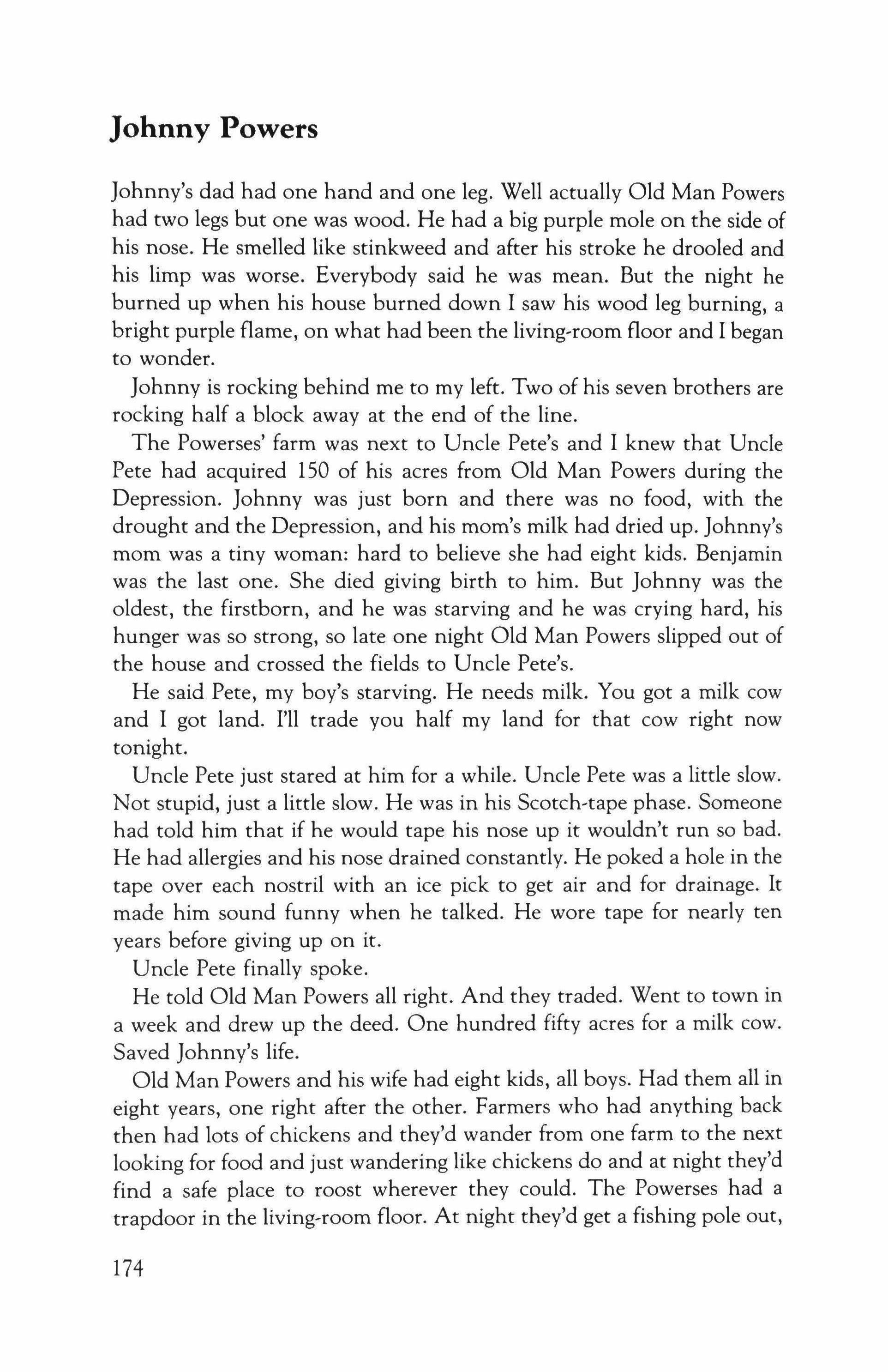
Johnny Powers
Johnny's dad had one hand and one leg. Well actually Old Man Powers had two legs but one was wood. He had a big purple mole on the side of his nose. He smelled like stinkweed and after his stroke he drooled and his limp was worse. Everybody said he was mean. But the night he burned up when his house burned down I saw his wood leg burning, a bright purple flame, on what had been the living-room floor and I began to wonder.
Johnny is rocking behind me to my left. Two of his seven brothers are rocking half a block away at the end of the line.
The Powerses' farm was next to Uncle Pete's and I knew that Uncle Pete had acquired 150 of his acres from Old Man Powers during the Depression. Johnny was just born and there was no food, with the drought and the Depression, and his mom's milk had dried up. Johnny's mom was a tiny woman: hard to believe she had eight kids. Benjamin was the last one. She died giving birth to him. But Johnny was the oldest, the firstborn, and he was starving and he was crying hard, his hunger was so strong, so late one night Old Man Powers slipped out of the house and crossed the fields to Uncle Pete's.
He said Pete, my boy's starving. He needs milk. You got a milk cow and I got land. I'll trade you half my land for that cow right now tonight.
Uncle Pete just stared at him for a while. Uncle Pete was a little slow. Not stupid, just a little slow. He was in his Scotch-tape phase. Someone had told him that if he would tape his nose up it wouldn't run so bad. He had allergies and his nose drained constantly. He poked a hole in the tape over each nostril with an ice pick to get air and for drainage. It made him sound funny when he talked. He wore tape for nearly ten years before giving up on it.
Uncle Pete finally spoke.
He told Old Man Powers all right. And they traded. Went to town in a week and drew up the deed. One hundred fifty acres for a milk cow. Saved Johnny's life.
Old Man Powers and his wife had eight kids, all boys. Had them all in eight years, one right after the other. Farmers who had anything back then had lots of chickens and they'd wander from one farm to the next looking for food and just wandering like chickens do and at night they'd find a safe place to roost wherever they could. The Powerses had a trapdoor in the living-room floor. At night they'd get a fishing pole out,
174
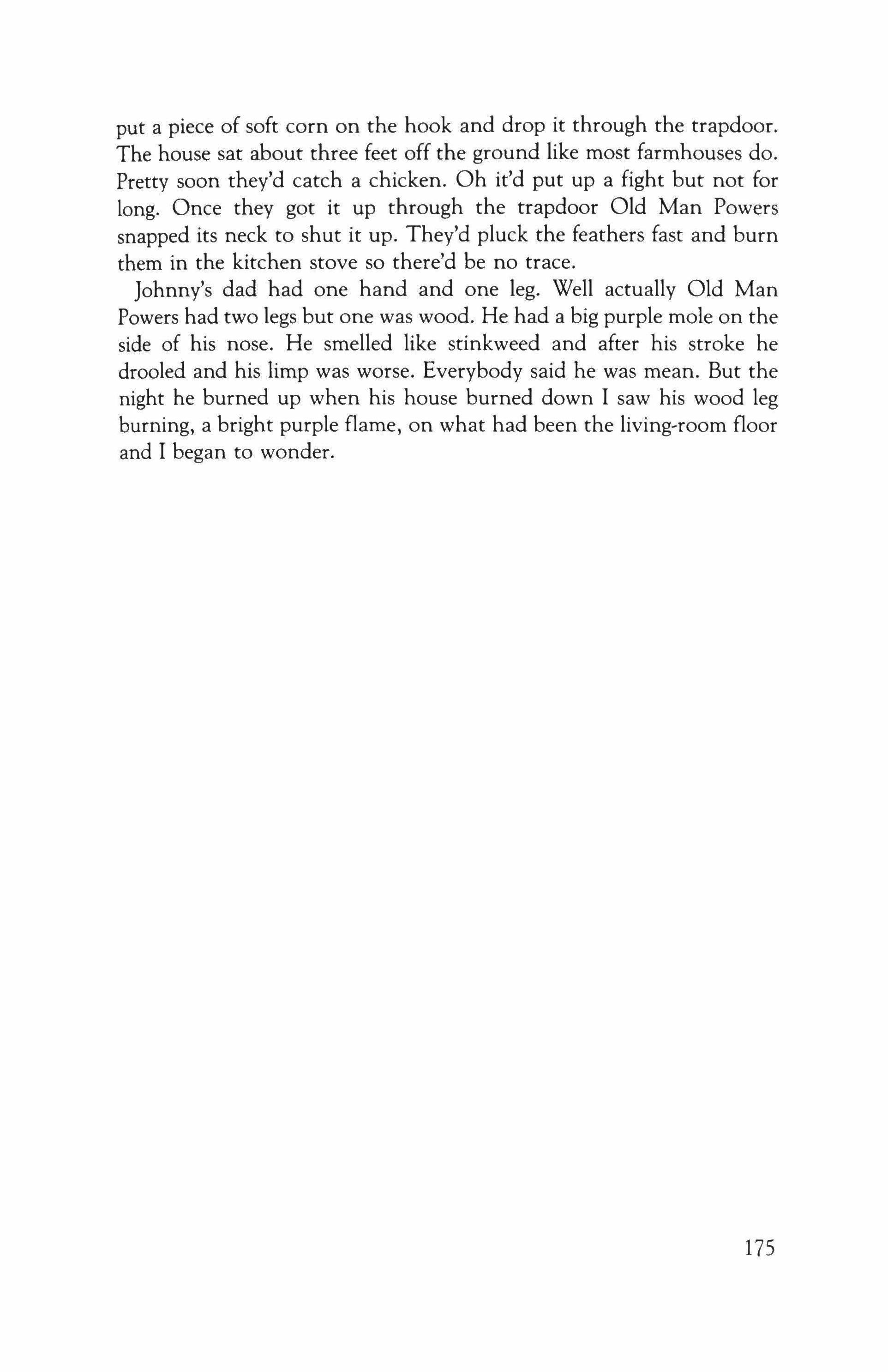
put a piece of soft corn on the hook and drop it through the trapdoor. The house sat about three feet off the ground like most farmhouses do. Pretty soon they'd catch a chicken. Oh it'd put up a fight but not for long. Once they got it up through the trapdoor Old Man Powers snapped its neck to shut it up. They'd pluck the feathers fast and burn them in the kitchen stove so there'd be no trace.
Johnny's dad had one hand and one leg. Well actually Old Man Powers had two legs but one was wood. He had a big purple mole on the side of his nose. He smelled like stinkweed and after his stroke he drooled and his limp was worse. Everybody said he was mean. But the night he burned up when his house burned down I saw his wood leg burning, a bright purple flame, on what had been the living-room floor and I began to wonder.
175
A Singular Beauty
George Cruger
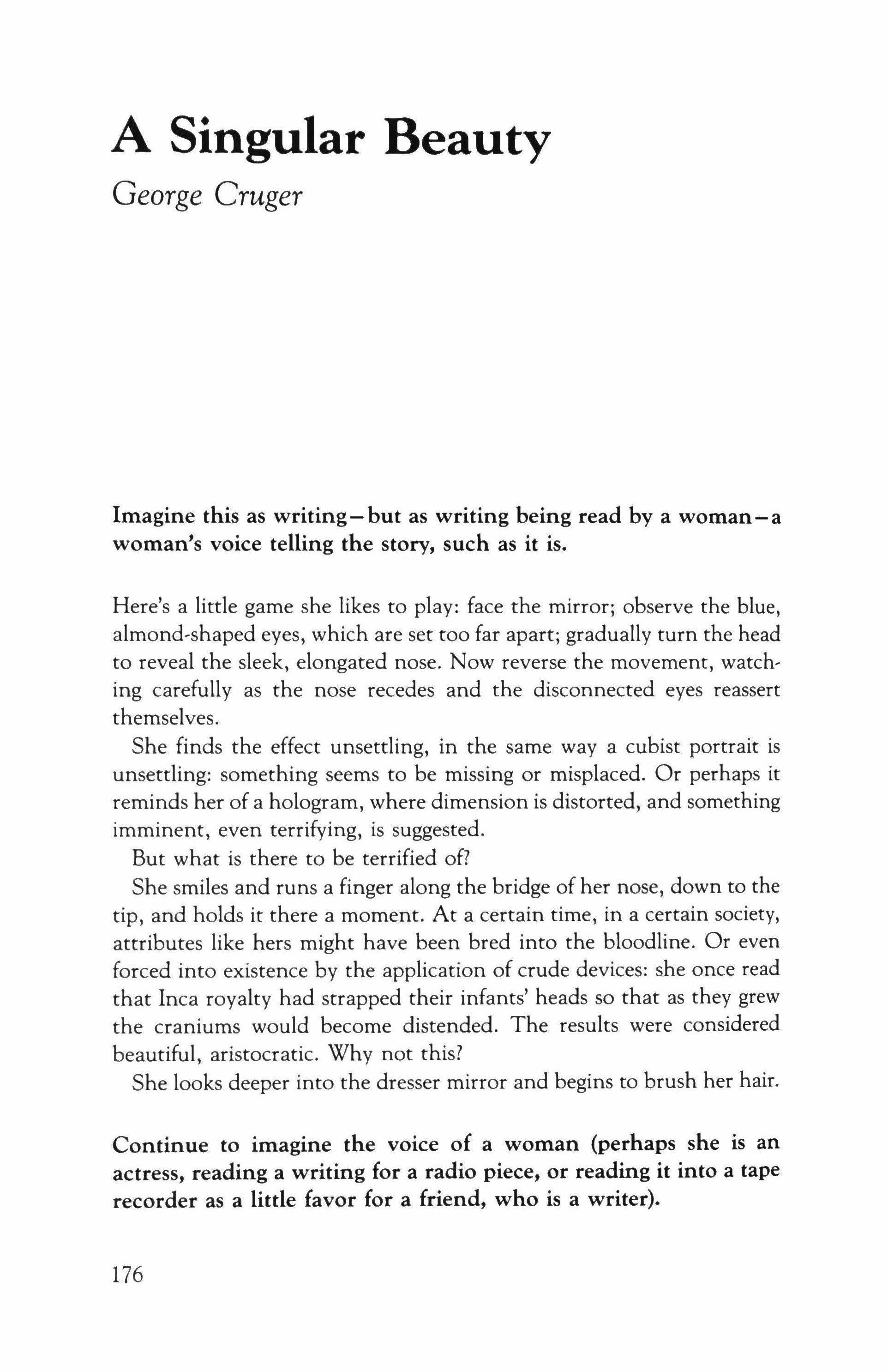
Imagine this as writing - but as writing being read by a woman - a woman's voice telling the story, such as it is.
Here's a little game she likes to play: face the mirror; observe the blue, almond-shaped eyes, which are set too far apart; gradually turn the head to reveal the sleek, elongated nose. Now reverse the movement, watching carefully as the nose recedes and the disconnected eyes reassert themselves.
She finds the effect unsettling, in the same way a cubist portrait is unsettling: something seems to be missing or misplaced. Or perhaps it reminds her of a hologram, where dimension is distorted, and something imminent, even terrifying, is suggested.
But what is there to be terrified of?
She smiles and runs a finger along the bridge of her nose, down to the tip, and holds it there a moment. At a certain time, in a certain society, attributes like hers might have been bred into the bloodline. Or even forced into existence by the application of crude devices: she once read that Inca royalty had strapped their infants' heads so that as they grew the craniums would become distended. The results were considered beautiful, aristocratic. Why not this?
She looks deeper into the dresser mirror and begins to brush her hair.
Continue to imagine the voice of a woman (perhaps she is an actress, reading a writing for a radio piece, or reading it into a tape recorder as a little favor for a friend, who is a writer).
176
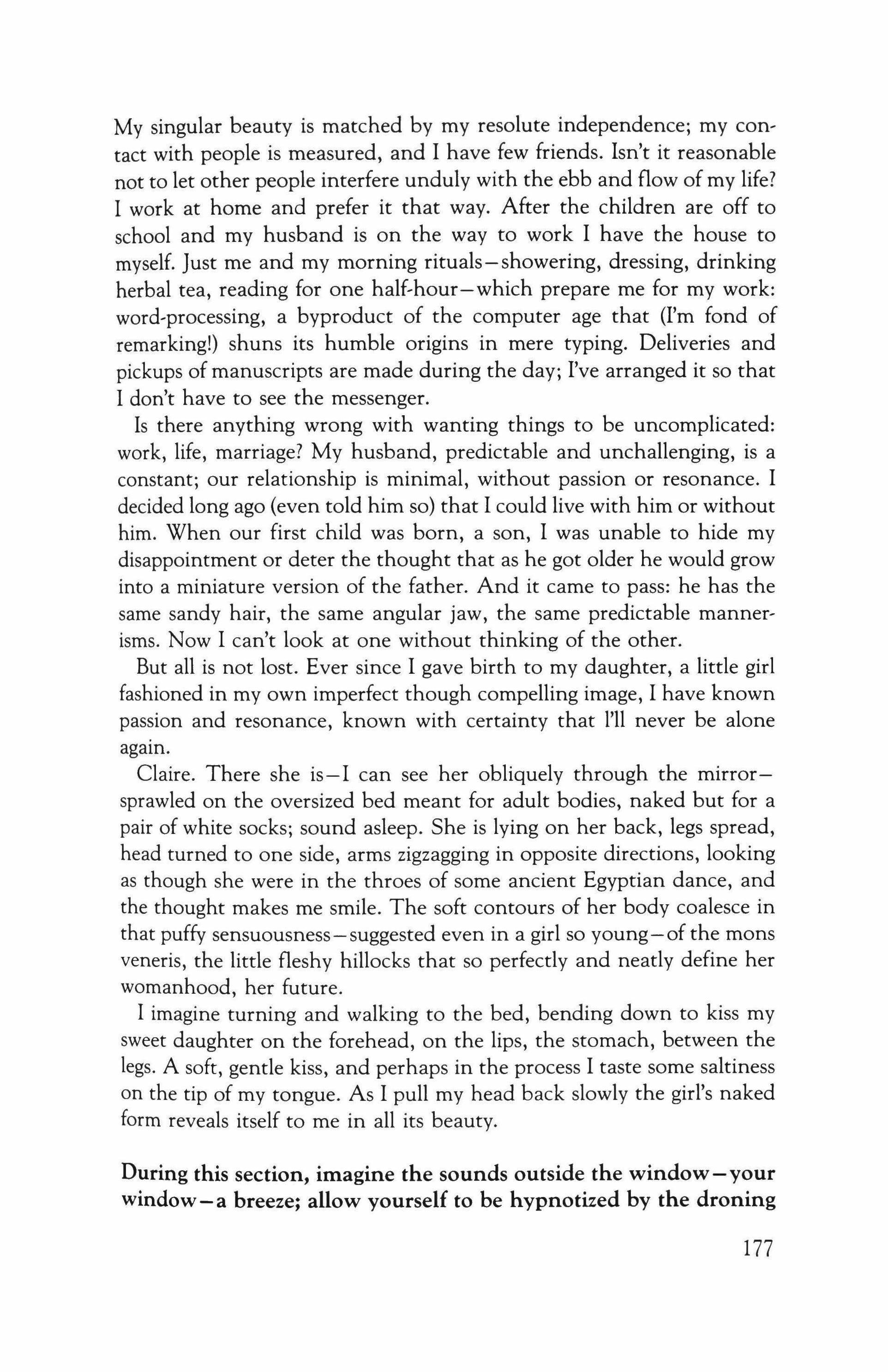
My singular beauty is matched by my resolute independence; my contact with people is measured, and I have few friends. Isn't it reasonable not to let other people interfere unduly with the ebb and flow of my life? I work at home and prefer it that way. After the children are off to school and my husband is on the way to work I have the house to myself. Just me and my morning rituals-showering, dressing, drinking herbal tea, reading for one half-hour=which prepare me for my work: word-processing, a byproduct of the computer age that (I'm fond of remarking!) shuns its humble origins in mere typing. Deliveries and pickups of manuscripts are made during the day; I've arranged it so that I don't have to see the messenger.
Is there anything wrong with wanting things to be uncomplicated: work, life, marriage? My husband, predictable and unchallenging, is a constant; our relationship is minimal, without passion or resonance. I decided long ago (even told him so) that I could live with him or without him. When our first child was born, a son, I was unable to hide my disappointment or deter the thought that as he got older he would grow into a miniature version of the father. And it came to pass: he has the same sandy hair, the same angular jaw, the same predictable mannerisms. Now I can't look at one without thinking of the other.
But all is not lost. Ever since I gave birth to my daughter, a little girl fashioned in my own imperfect though compelling image, I have known passion and resonance, known with certainty that I'll never be alone again.
Claire. There she is-I can see her obliquely through the mirrorsprawled on the oversized bed meant for adult bodies, naked but for a pair of white socks; sound asleep. She is lying on her back, legs spread, head turned to one side, arms zigzagging in opposite directions, looking as though she were in the throes of some ancient Egyptian dance, and the thought makes me smile. The soft contours of her body coalesce in that puffy sensuousness-suggested even in a girl so young-of the mons veneris, the little fleshy hillocks that so perfectly and neatly define her womanhood, her future.
I imagine turning and walking to the bed, bending down to kiss my sweet daughter on the forehead, on the lips, the stomach, between the legs. A soft, gentle kiss, and perhaps in the process I taste some saltiness on the tip of my tongue. As I pull my head back slowly the girl's naked form reveals itself to me in all its beauty.
During this section, imagine the sounds outside the windowyour window-a breeze; allow yourself to be hypnotized by the droning
177
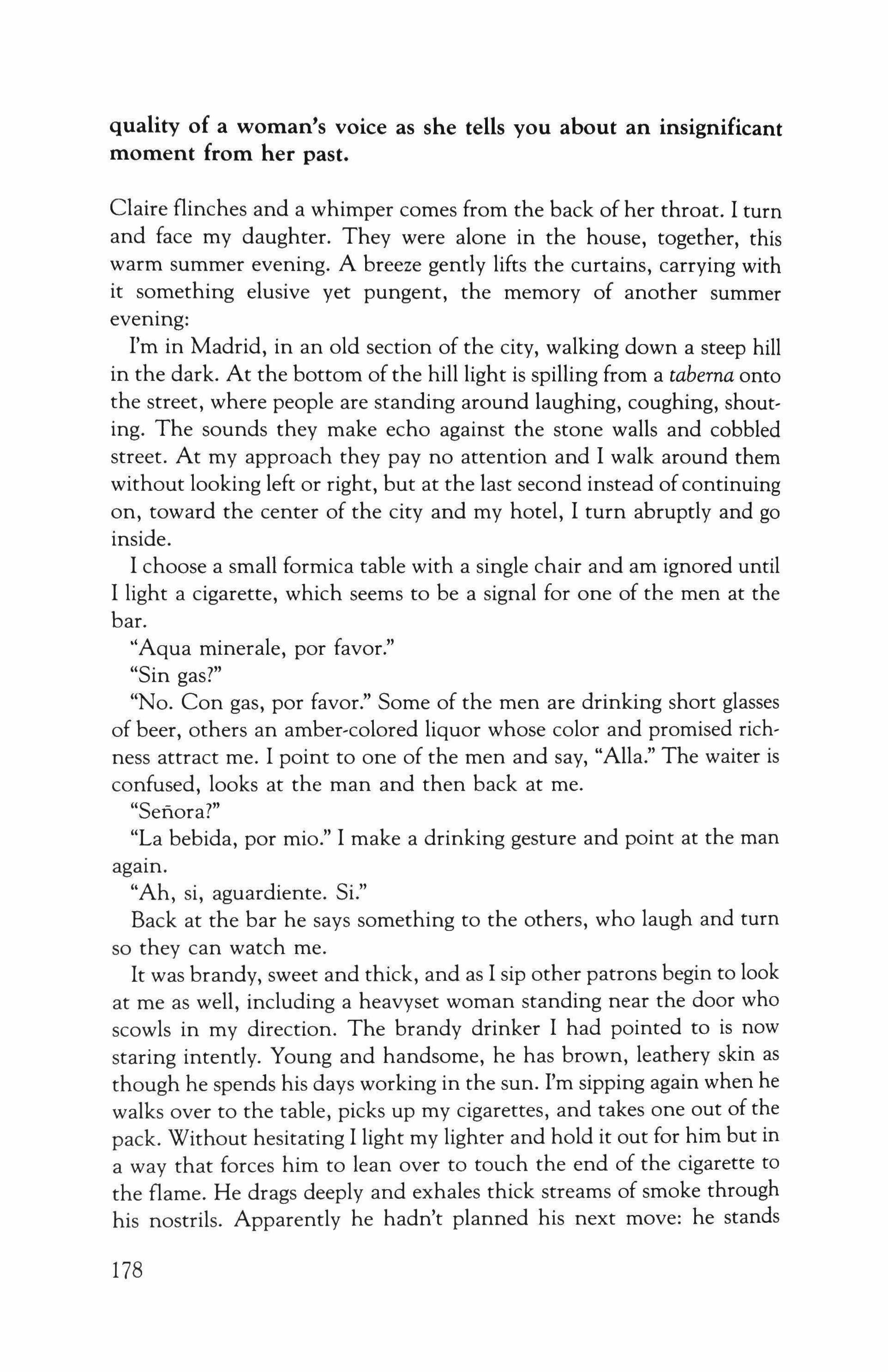
quality of a woman's voice as she tells you about an insignificant moment from her past.
Claire flinches and a whimper comes from the back of her throat. I turn and face my daughter. They were alone in the house, together, this warm summer evening. A breeze gently lifts the curtains, carrying with it something elusive yet pungent, the memory of another summer evening:
I'm in Madrid, in an old section of the city, walking down a steep hill in the dark. At the bottom of the hill light is spilling from a taberna onto the street, where people are standing around laughing, coughing, shouting. The sounds they make echo against the stone walls and cobbled street. At my approach they pay no attention and I walk around them without looking left or right, but at the last second instead ofcontinuing on, toward the center of the city and my hotel, I turn abruptly and go inside.
I choose a small formica table with a single chair and am ignored until I light a cigarette, which seems to be a signal for one of the men at the bar.
"Aqua minerale, por favor."
"Sin gas?"
"No. Con gas, por favor." Some of the men are drinking short glasses of beer, others an amber-colored liquor whose color and promised richness attract me. I point to one of the men and say, "AlIa." The waiter is confused, looks at the man and then back at me.
"Senora?"
"La bebida, por mio." I make a drinking gesture and point at the man again.
"Ah, si, aguardiente. Si."
Back at the bar he says something to the others, who laugh and turn so they can watch me.
lt was brandy, sweet and thick, and as I sip other patrons begin to look at me as well, including a heavyset woman standing near the door who scowls in my direction. The brandy drinker I had pointed to is now staring intently. Young and handsome, he has brown, leathery skin as though he spends his days working in the sun. I'm sipping again when he walks over to the table, picks up my cigarettes, and takes one out of the pack. Without hesitating I light my lighter and hold it out for him but in a way that forces him to lean over to touch the end of the cigarette to the flame. He drags deeply and exhales thick streams of smoke through his nostrils. Apparently he hadn't planned his next move: he stands
178
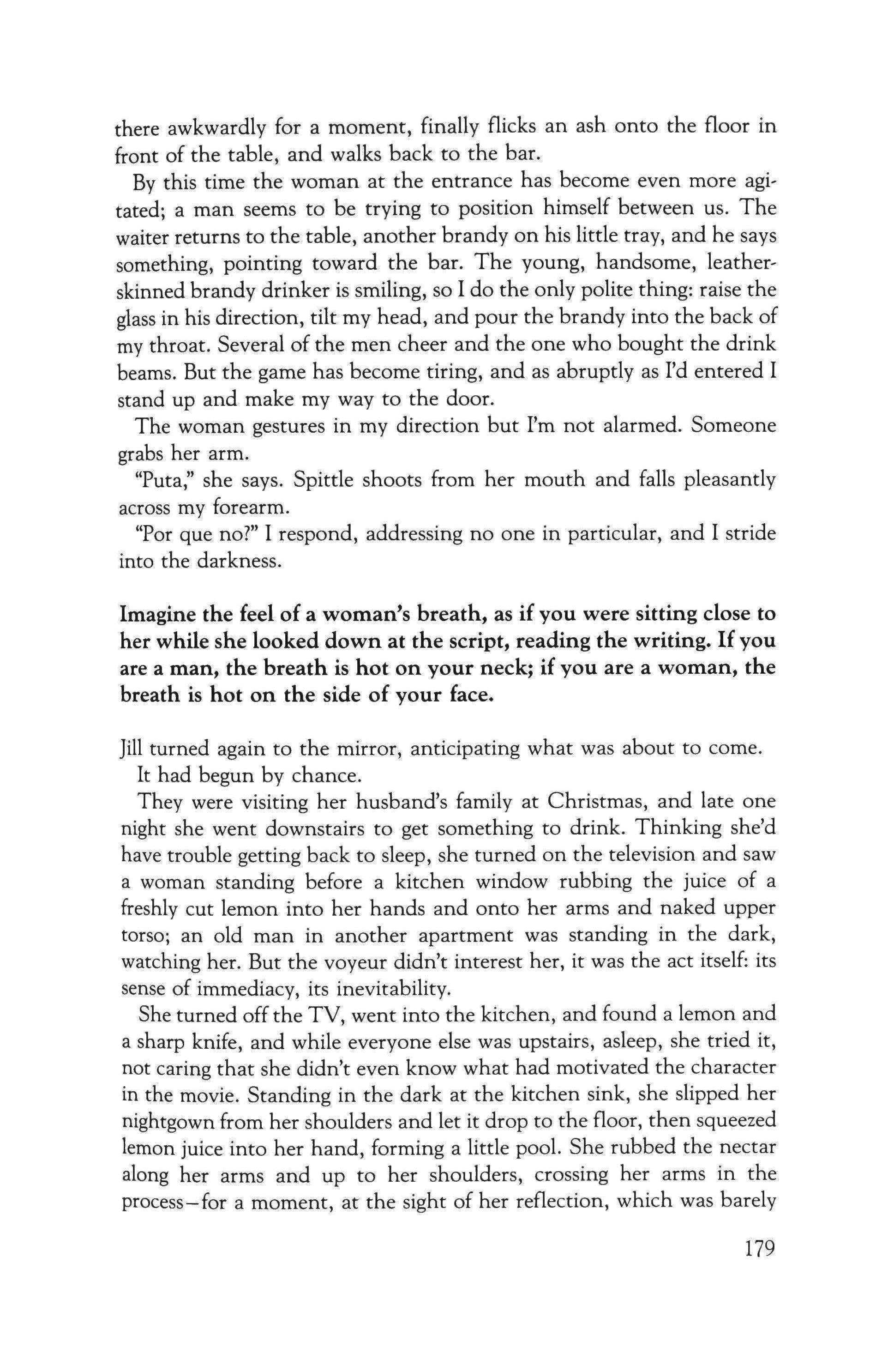
there awkwardly for a moment, finally flicks an ash onto the floor in front of the table, and walks back to the bar.
By this time the woman at the entrance has become even more agitated; a man seems to be trying to position himself between us. The waiter returns to the table, another brandy on his little tray, and he says something, pointing toward the bar. The young, handsome, leatherskinned brandy drinker is smiling, so I do the only polite thing: raise the glass in his direction, tilt my head, and pour the brandy into the back of my throat. Several of the men cheer and the one who bought the drink beams. But the game has become tiring, and as abruptly as I'd entered I stand up and make my way to the door.
The woman gestures in my direction but I'm not alarmed. Someone grabs her arm.
"Puta," she says. Spittle shoots from her mouth and falls pleasantly across my forearm.
"Por que no?" I respond, addressing no one in particular, and I stride into the darkness.
Imagine the feel of a woman's breath, as if you were sitting close to her while she looked down at the script, reading the writing. If you are a man, the breath is hot on your neck; if you are a woman, the breath is hot on the side of your face.
Jill turned again to the mirror, anticipating what was about to come. It had begun by chance.
They were visiting her husband's family at Christmas, and late one night she went downstairs to get something to drink. Thinking she'd have trouble getting back to sleep, she turned on the television and saw a woman standing before a kitchen window rubbing the juice of a freshly cut lemon into her hands and onto her arms and naked upper torso; an old man in another apartment was standing in the dark, watching her. But the voyeur didn't interest her, it was the act itself: its sense of immediacy, its inevitability.
She turned off the TV, went into the kitchen, and found a lemon and a sharp knife, and while everyone else was upstairs, asleep, she tried it, not caring that she didn't even know what had motivated the character in the movie. Standing in the dark at the kitchen sink, she slipped her nightgown from her shoulders and let it drop to the floor, then squeezed lemon juice into her hand, forming a little pool. She rubbed the nectar along her arms and up to her shoulders, crossing her arms in the process-for a moment, at the sight of her reflection, which was barely
179

visible in the kitchen window, imagining herself as a devout acolyte performing some obscure cuitic ritual. She dropped her hands to the flat of her stomach and brought them up slowly to cup and caress her breasts. The aroma of the juice filled her nostrils. When she closed her eyes she imagined trees swaying in an ocean breeze, men in sarongs (or loincloths) whose nipples became hard as peanuts as she puckered her lips and blew across their hairless chests.
Imagine that you know in advance every word the woman is reading.
It is ten o'clock and Claire is still asleep. I hear a train whistle in the distance. The treetop just outside the window reminds me of the scene I witnessed that afternoon: Claire, in the front yard, huddled with two other girls beneath the small crabapple tree, which was shading them from the sun. Girls Claire's age wear shorts or jeans, T-shirts, and sneakers, but Claire fancies dresses, today a white dress with a blue sash, its hem forming gentle arcs as she whirled or was whirled, as she flashed in and out of the sunlight filtering through the crisscrossing limbs. Blond-haired Lindy was the ringleader. Constantly chattering, she propelled their fantasy with furious energy, bossing, teasing, apologizing at a pace so fast the others had trouble keeping up. When the incident with the sash took place I simply stood and watched from inside the front door, my figure concealed by the screen mesh and the shadows of the darkened hallway. We live at the end of a cul-de-sac, and little traffic comes by, so I was attentive not out of concern but instead to satisfy my curiosity: what does my daughter look like moving about in the world? While Claire was twirling, still beneath the tree, Lindy reached out and grabbed the blue sash. She held onto it and in a flash it was in her hand; she waved it over her head as though she had seized a trophy. Claire was startled. After she recovered from her dizziness she tried to reclaim the sash but the tomboy Lindy easily eluded her, first by running out to the roadway and then veering, catching Claire off guard. When she tried to change direction, Claire skidded on the asphalt and went down. For an instant her white dress formed a flower-like pattern on the dark roadway. Lindy was back to the tree by now and Claire followed, running, her face red; but she wasn't crying. Lindy climbed the tree and Claire stood underneath, saying something to her. I imagined her saying: "You give me that sash or else" (my lips actually formed the words), but Lindy ignored her, so Claire pulled herself up into the tree. Her dress was
180
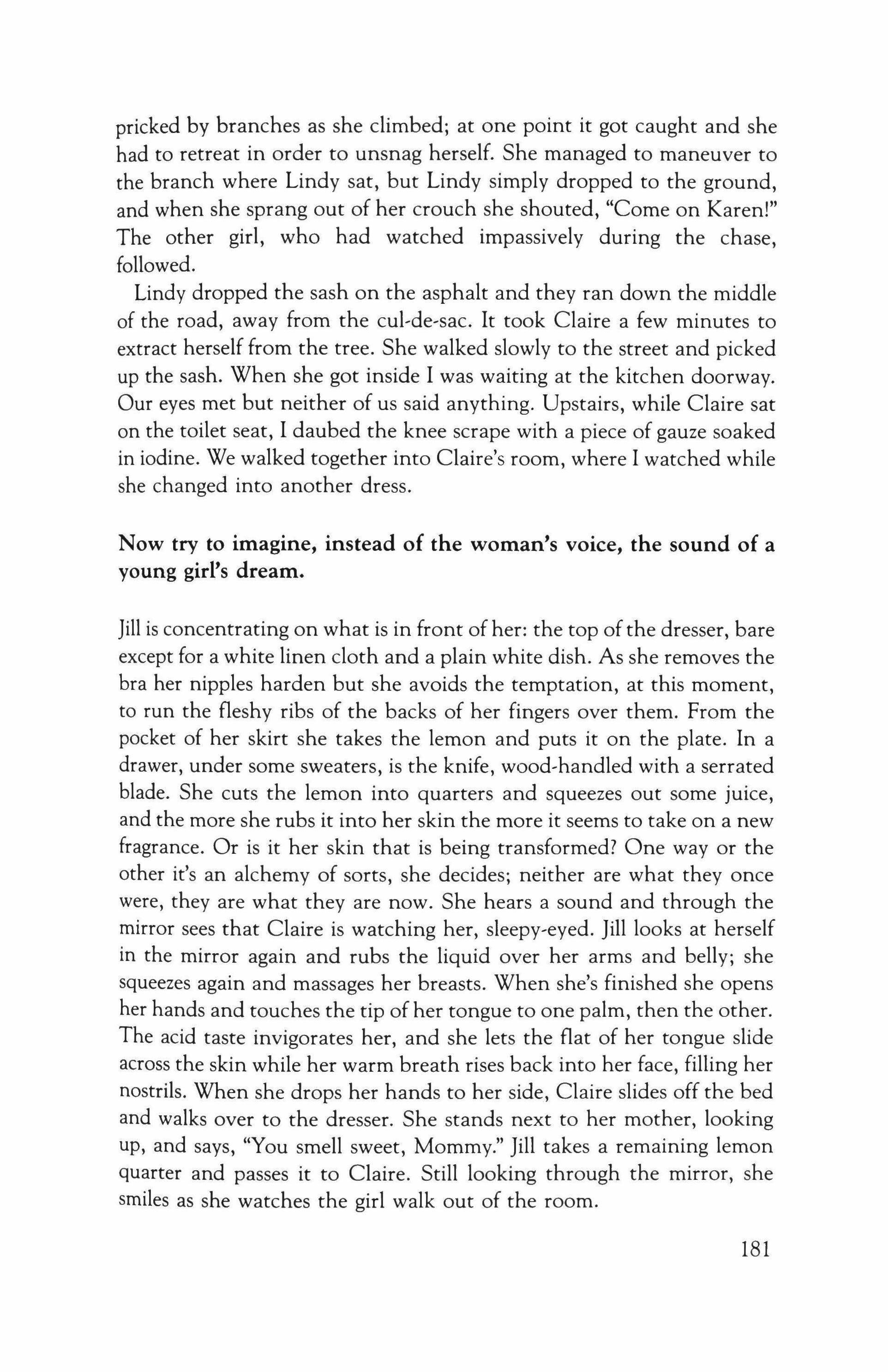
pricked by branches as she climbed; at one point it got caught and she had to retreat in order to unsnag herself. She managed to maneuver to the branch where Lindy sat, but Lindy simply dropped to the ground, and when she sprang out of her crouch she shouted, "Come on Karen!" The other girl, who had watched impassively during the chase, followed.
Lindy dropped the sash on the asphalt and they ran down the middle of the road, away from the cul-de-sac. It took Claire a few minutes to extract herself from the tree. She walked slowly to the street and picked up the sash. When she got inside I was waiting at the kitchen doorway. Our eyes met but neither of us said anything. Upstairs, while Claire sat on the toilet seat, I daubed the knee scrape with a piece of gauze soaked in iodine. We walked together into Claire's room, where I watched while she changed into another dress.
Now try to imagine, instead of the woman's voice, the sound of a young girl's dream.
Jill is concentrating on what is in front of her: the top ofthe dresser, bare except for a white linen cloth and a plain white dish. As she removes the bra her nipples harden but she avoids the temptation, at this moment, to run the fleshy ribs of the backs of her fingers over them. From the pocket of her skirt she takes the lemon and puts it on the plate. In a drawer, under some sweaters, is the knife, wood-handled with a serrated blade. She cuts the lemon into quarters and squeezes out some juice, and the more she rubs it into her skin the more it seems to take on a new fragrance. Or is it her skin that is being transformed? One way or the other it's an alchemy of sorts, she decides; neither are what they once were, they are what they are now. She hears a sound and through the mirror sees that Claire is watching her, sleepy-eyed. Jill looks at herself in the mirror again and rubs the liquid over her arms and belly; she squeezes again and massages her breasts. When she's finished she opens her hands and touches the tip of her tongue to one palm, then the other. The acid taste invigorates her, and she lets the flat of her tongue slide across the skin while her warm breath rises back into her face, filling her nostrils. When she drops her hands to her side, Claire slides off the bed and walks over to the dresser. She stands next to her mother, looking up, and says, "You smell sweet, Mommy." Jill takes a remaining lemon quarter and passes it to Claire. Still looking through the mirror, she smiles as she watches the girl walk out of the room.
181
Four Poems
Donald Platt
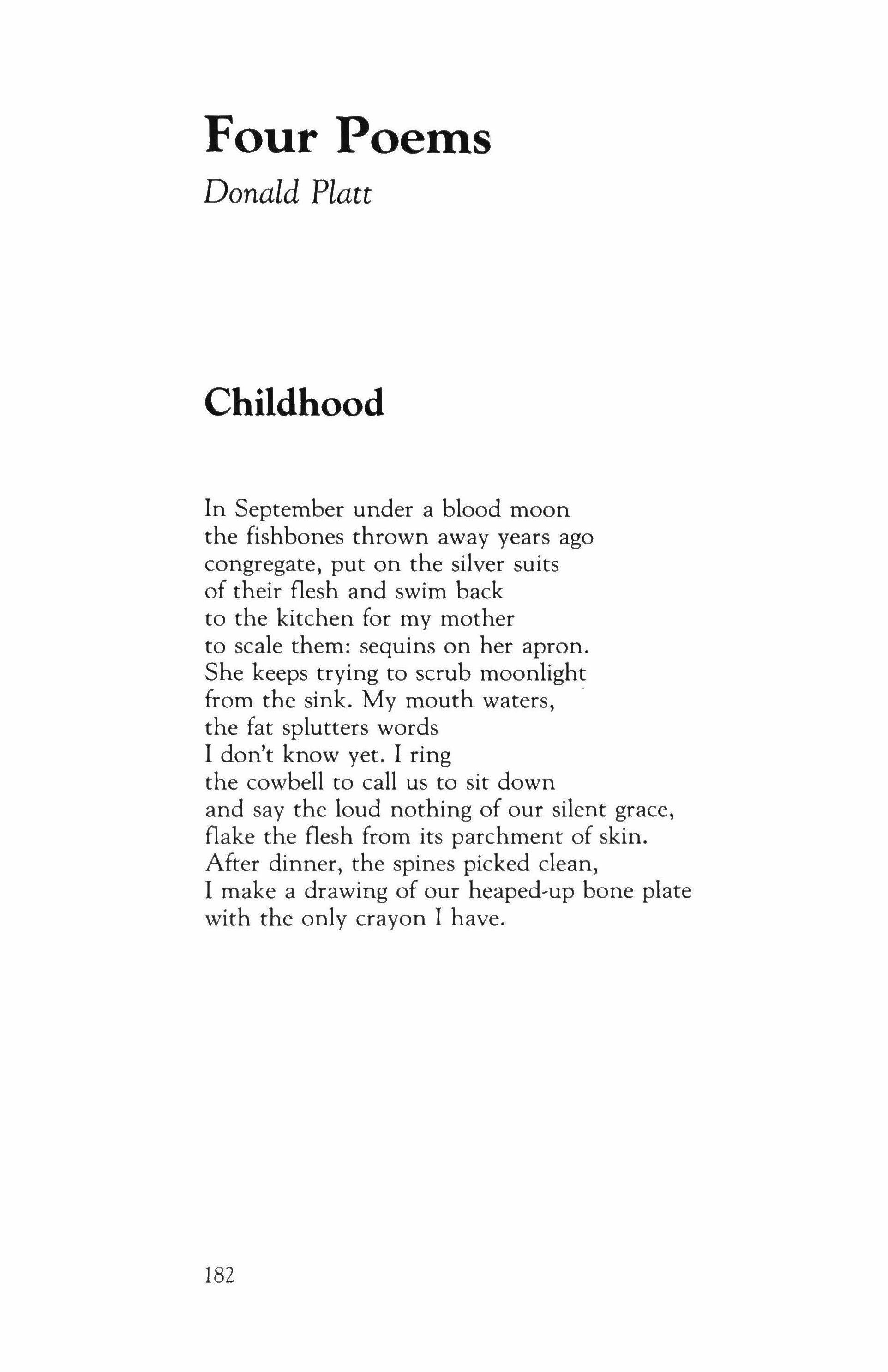
Childhood
In September under a blood moon the fishbones thrown away years ago congregate, put on the silver suits of their flesh and swim back to the kitchen for my mother to scale them: sequins on her apron. She keeps trying to scrub moonlight from the sink. My mouth waters, the fat splutters words I don't know yet. I ring the cowbell to call us to sit down and say the loud nothing of our silent grace, flake the flesh from its parchment of skin. After dinner, the spines picked clean, I make a drawing of our heaped-up bone plate with the only crayon I have.
182
The Nakedness of Fathers
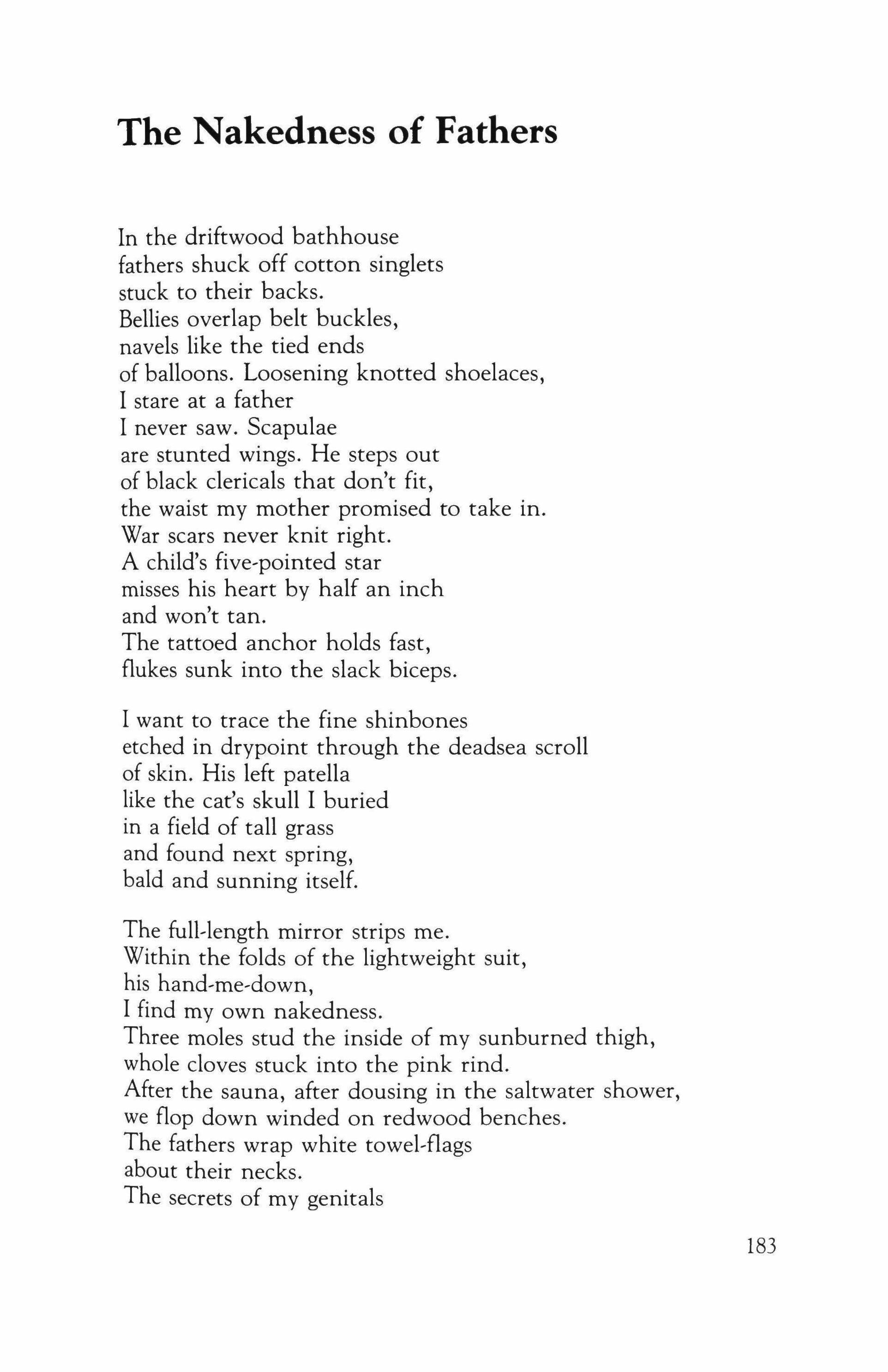
In the driftwood bathhouse fathers shuck off cotton singlets stuck to their backs. Bellies overlap belt buckles, navels like the tied ends of balloons. Loosening knotted shoelaces, I stare at a father I never saw. Scapulae are stunted wings. He steps out of black clericals that don't fit, the waist my mother promised to take in. War scars never knit right. A child's five-pointed star misses his heart by half an inch and won't tan. The tattoed anchor holds fast, flukes sunk into the slack biceps.
I want to trace the fine shinbones etched in drypoint through the deadsea scroll of skin. His left patella like the cat's skull I buried in a field of tall grass and found next spring, bald and sunning itself.
The full,length mirror strips me. Within the folds of the lightweight suit, his hand-me-down, I find my own nakedness. Three moles stud the inside of my sunburned thigh, whole cloves stuck into the pink rind. After the sauna, after dousing in the saltwater shower, we flop down winded on redwood benches. The fathers wrap white towel-flags about their necks.
The secrets of my genitals
183
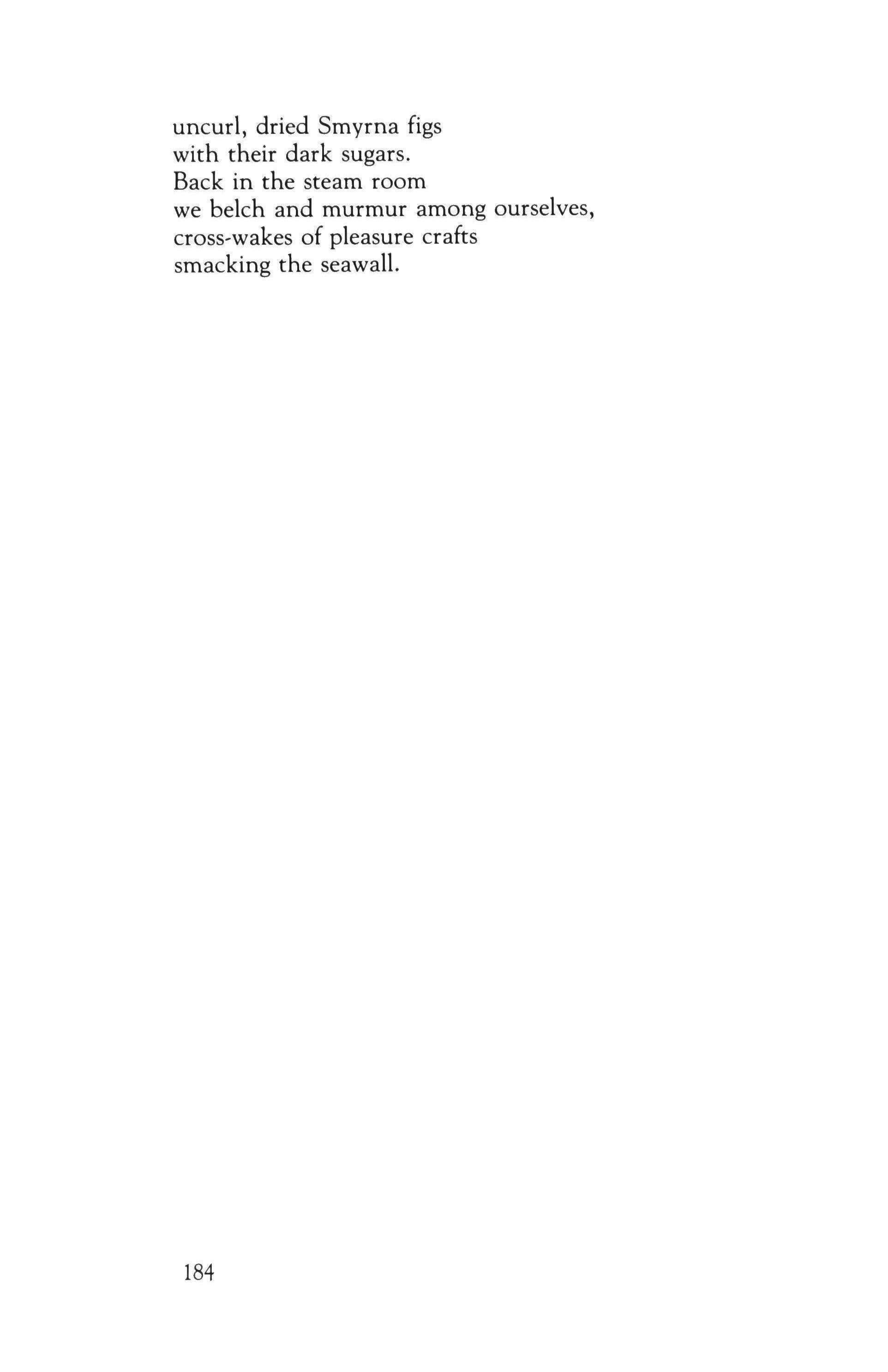
uncurl, dried Smyrna figs with their dark sugars. Back in the steam room we belch and murmur among ourselves, cross-wakes of pleasure crafts smacking the seawall.
184
First Child
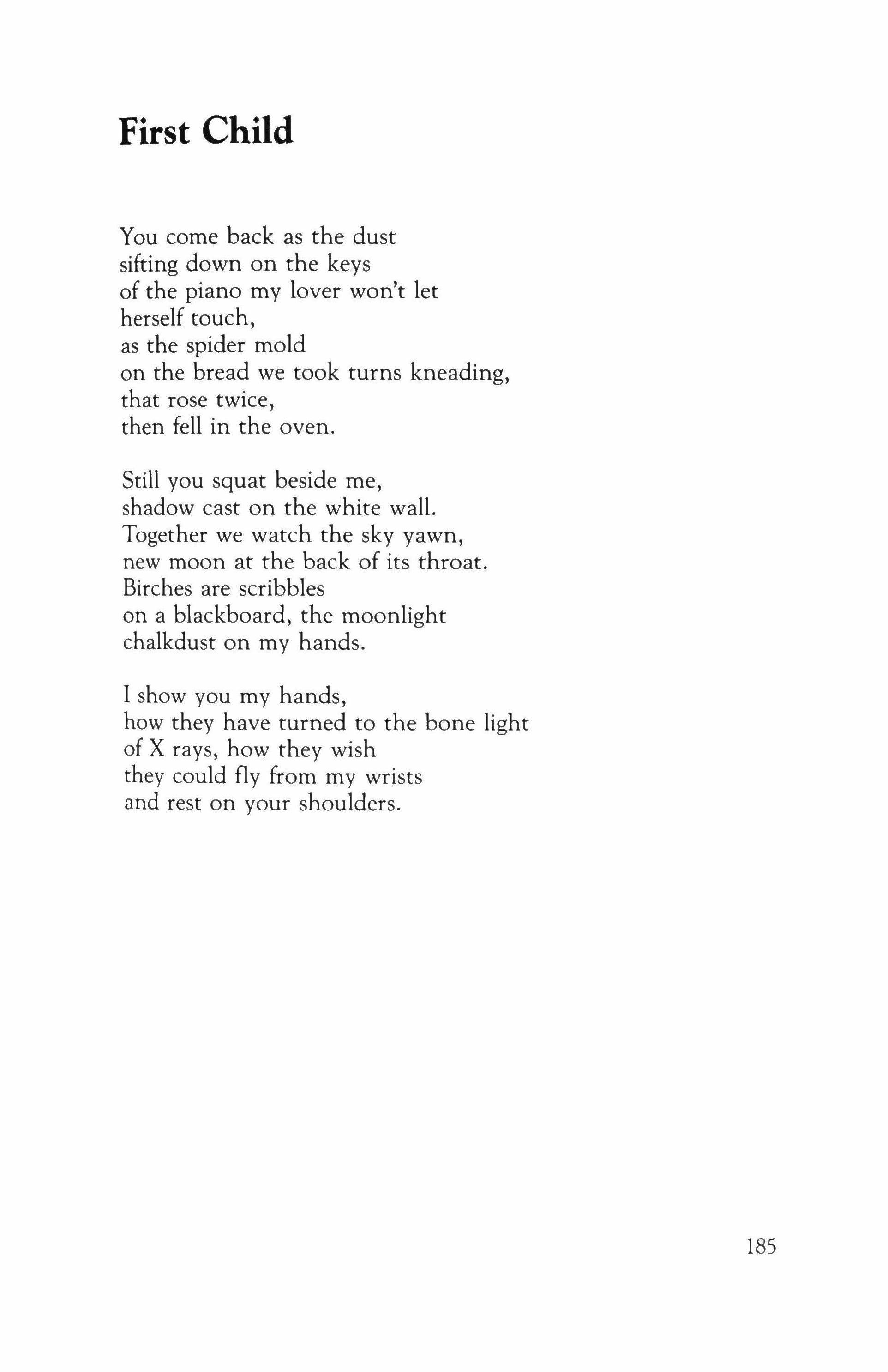
You come back as the dust sifting down on the keys of the piano my lover won't let herself touch, as the spider mold on the bread we took turns kneading, that rose twice, then fell in the oven.
Still you squat beside me, shadow cast on the white wall. Together we watch the sky yawn, new moon at the back of its throat. Birches are scribbles on a blackboard, the moonlight chalkdust on my hands.
I show you my hands, how they have turned to the bone light of X rays, how they wish they could fly from my wrists and rest on your shoulders.
185
My Father's Crucifix
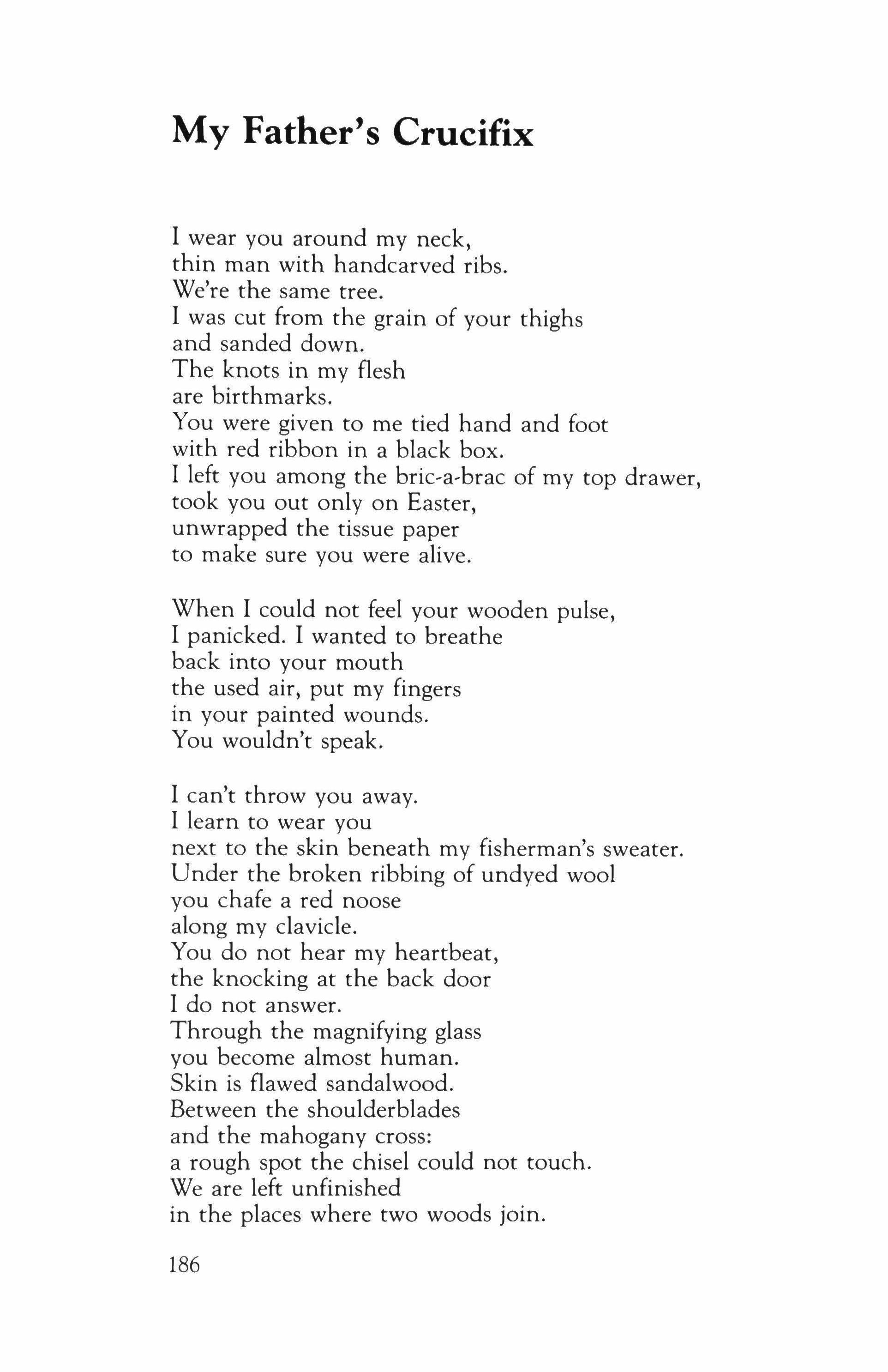
I wear you around my neck, thin man with handcarved ribs. We're the same tree. I was cut from the grain of your thighs and sanded down. The knots in my flesh are birthmarks. You were given to me tied hand and foot with red ribbon in a black box. I left you among the bric-a-brac of my top drawer, took you out only on Easter, unwrapped the tissue paper to make sure you were alive.
When I could not feel your wooden pulse, I panicked. I wanted to breathe back into your mouth the used air, put my fingers in your painted wounds. You wouldn't speak.
I can't throw you away. I learn to wear you next to the skin beneath my fisherman's sweater. Under the broken ribbing of undyed wool you chafe a red noose along my clavicle. You do not hear my heartbeat, the knocking at the back door I do not answer.
Through the magnifying glass you become almost human. Skin is flawed sandalwood. Between the shoulderblades and the mahogany cross: a rough spot the chisel could not touch. We are left unfinished in the places where two woods join.
186
Hitting a Skunk at 60 Miles Per Hour
Bruce Cohen
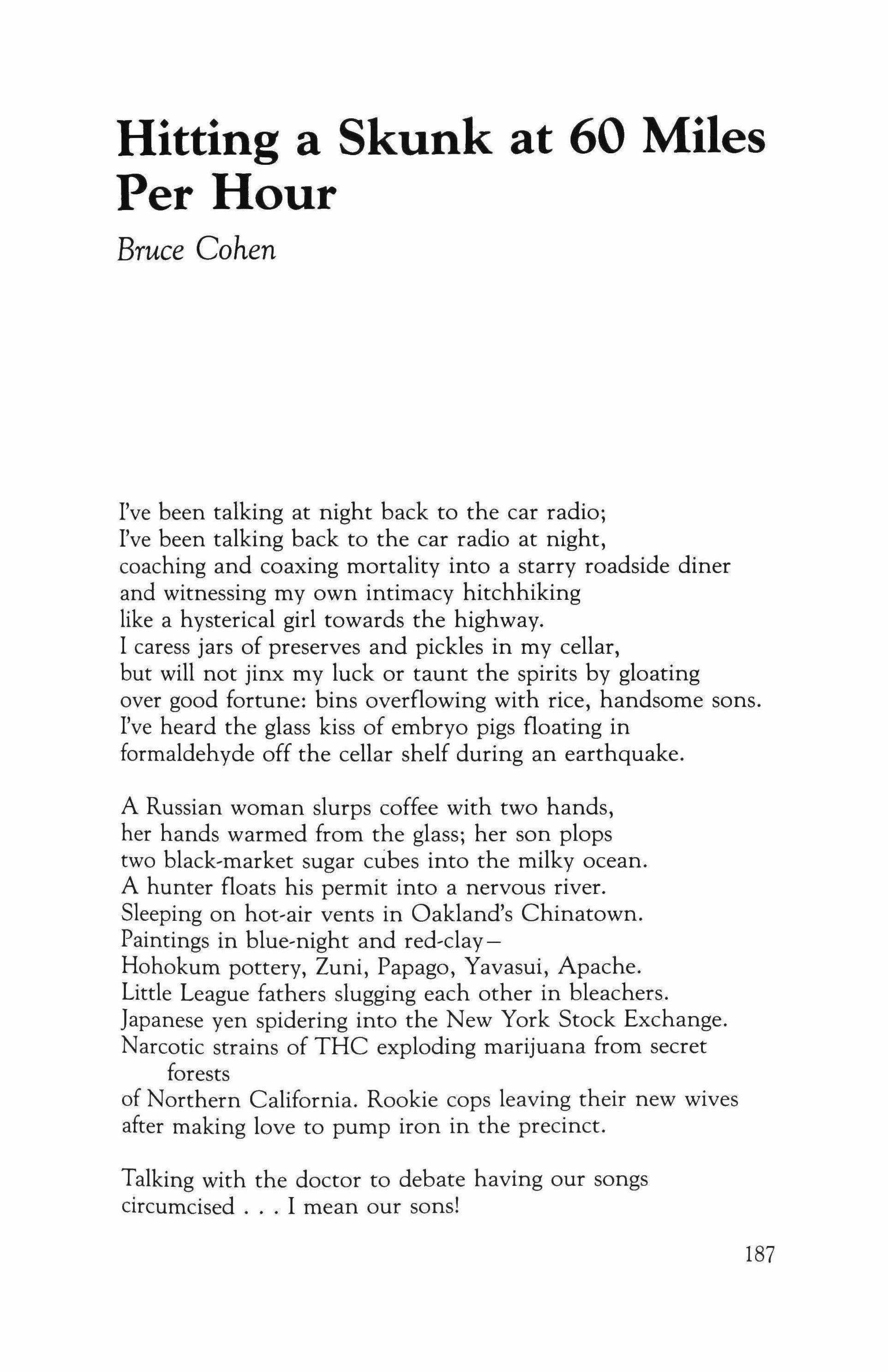
I've been talking at night back to the car radio; I've been talking back to the car radio at night, coaching and coaxing mortality into a starry roadside diner and witnessing my own intimacy hitchhiking like a hysterical girl towards the highway. I caress jars of preserves and pickles in my cellar, but will not jinx my luck or taunt the spirits by gloating over good fortune: bins overflowing with rice, handsome sons. I've heard the glass kiss of embryo pigs floating in formaldehyde off the cellar shelf during an earthquake.
A Russian woman slurps coffee with two hands, her hands warmed from the glass; her son plops two black-market sugar cubes into the milky ocean. A hunter floats his permit into a nervous river. Sleeping on hot-air vents in Oakland's Chinatown. Paintings in blue,night and red-clay= Hohokum pottery, Zuni, Papago, Yavasui, Apache. Little League fathers slugging each other in bleachers. Japanese yen spidering into the New York Stock Exchange. Narcotic strains of THC exploding marijuana from secret forests of Northern California. Rookie cops leaving their new wives after making love to pump iron in the precinct.
Talking with the doctor to debate having our songs circumcised I mean our sons!
187
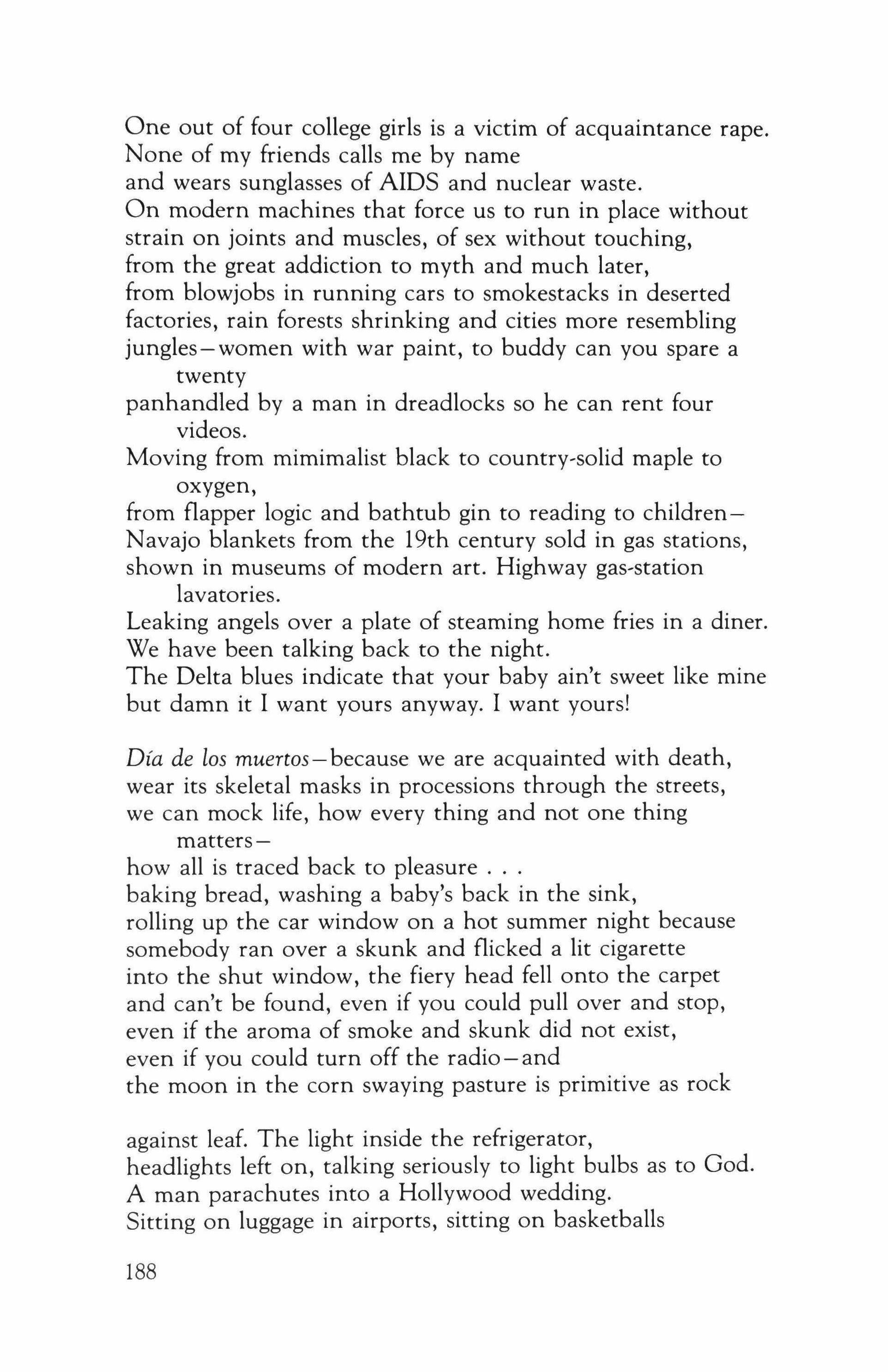
One out of four college girls is a victim of acquaintance rape. None of my friends calls me by name and wears sunglasses of AIDS and nuclear waste. On modern machines that force us to run in place without strain on joints and muscles, of sex without touching, from the great addiction to myth and much later, from blowjobs in running cars to smokestacks in deserted factories, rain forests shrinking and cities more resembling jungles-women with war paint, to buddy can you spare a twenty panhandled by a man in dreadlocks so he can rent four videos.
Moving from mimimalist black to country-solid maple to oxygen, from flapper logic and bathtub gin to reading to childrenNavajo blankets from the 19th century sold in gas stations, shown in museums of modern art. Highway gas-station lavatories.
Leaking angels over a plate of steaming home fries in a diner. We have been talking back to the night. The Delta blues indicate that your baby ain't sweet like mine but damn it I want yours anyway. I want yours!
Dia de los muertos - because we are acquainted with death, wear its skeletal masks in processions through the streets, we can mock life, how every thing and not one thing mattershow all is traced back to pleasure baking bread, washing a baby's back in the sink, rolling up the car window on a hot summer night because somebody ran over a skunk and flicked a lit cigarette into the shut window, the fiery head fell onto the carpet and can't be found, even if you could pull over and stop, even if the aroma of smoke and skunk did not exist, even if you could turn off the radio - and the moon in the corn swaying pasture is primitive as rock against leaf. The light inside the refrigerator, headlights left on, talking seriously to light bulbs as to God. A man parachutes into a Hollywood wedding. Sitting on luggage in airports, sitting on basketballs
188
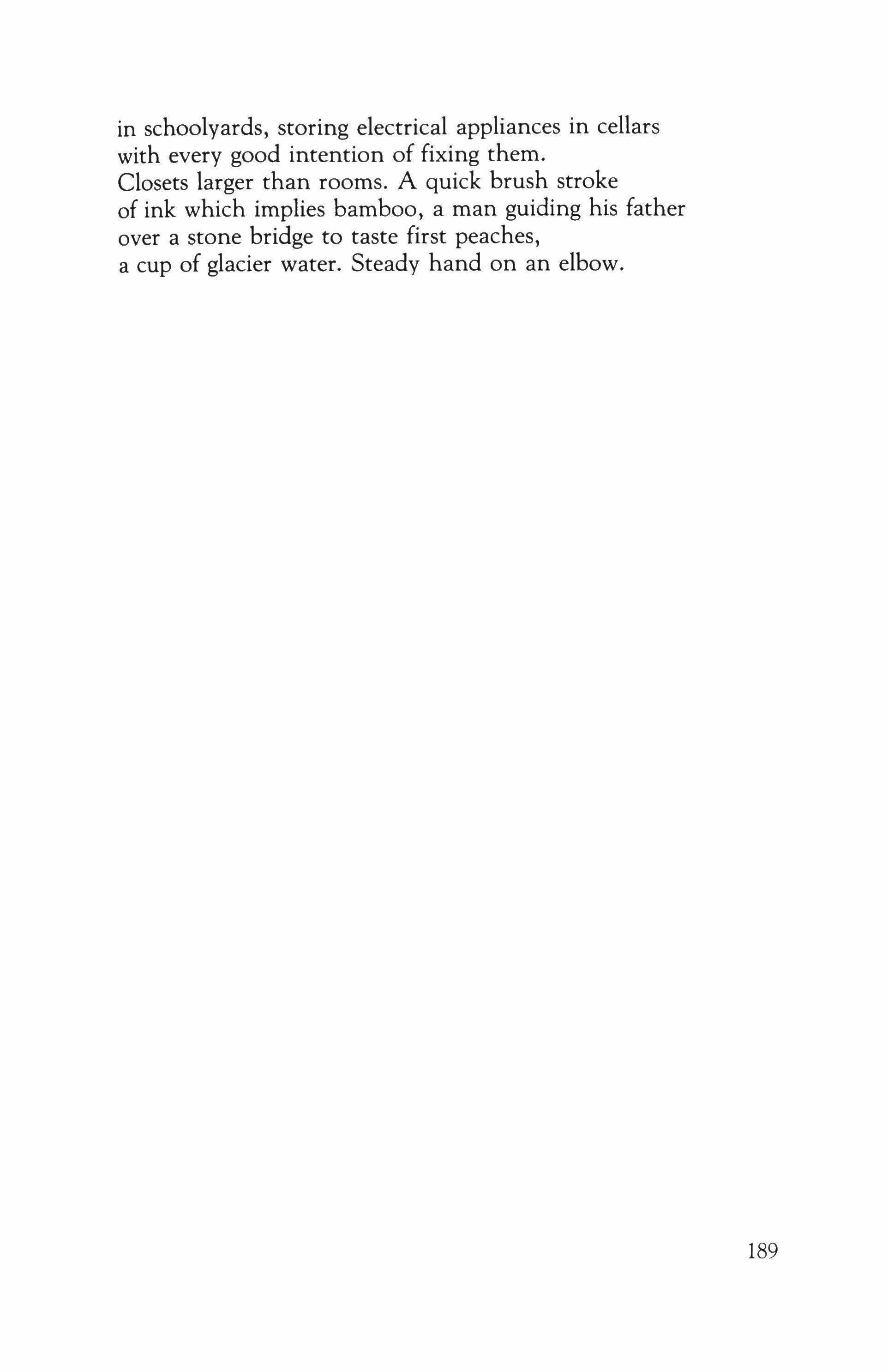
in schoolyards, storing electrical appliances in cellars with every good intention of fixing them. Closets larger than rooms. A quick brush stroke of ink which implies bamboo, a man guiding his father over a stone bridge to taste first peaches, a cup of glacier water. Steady hand on an elbow.
189
Rembrandt Drawings
Charles Wyatt
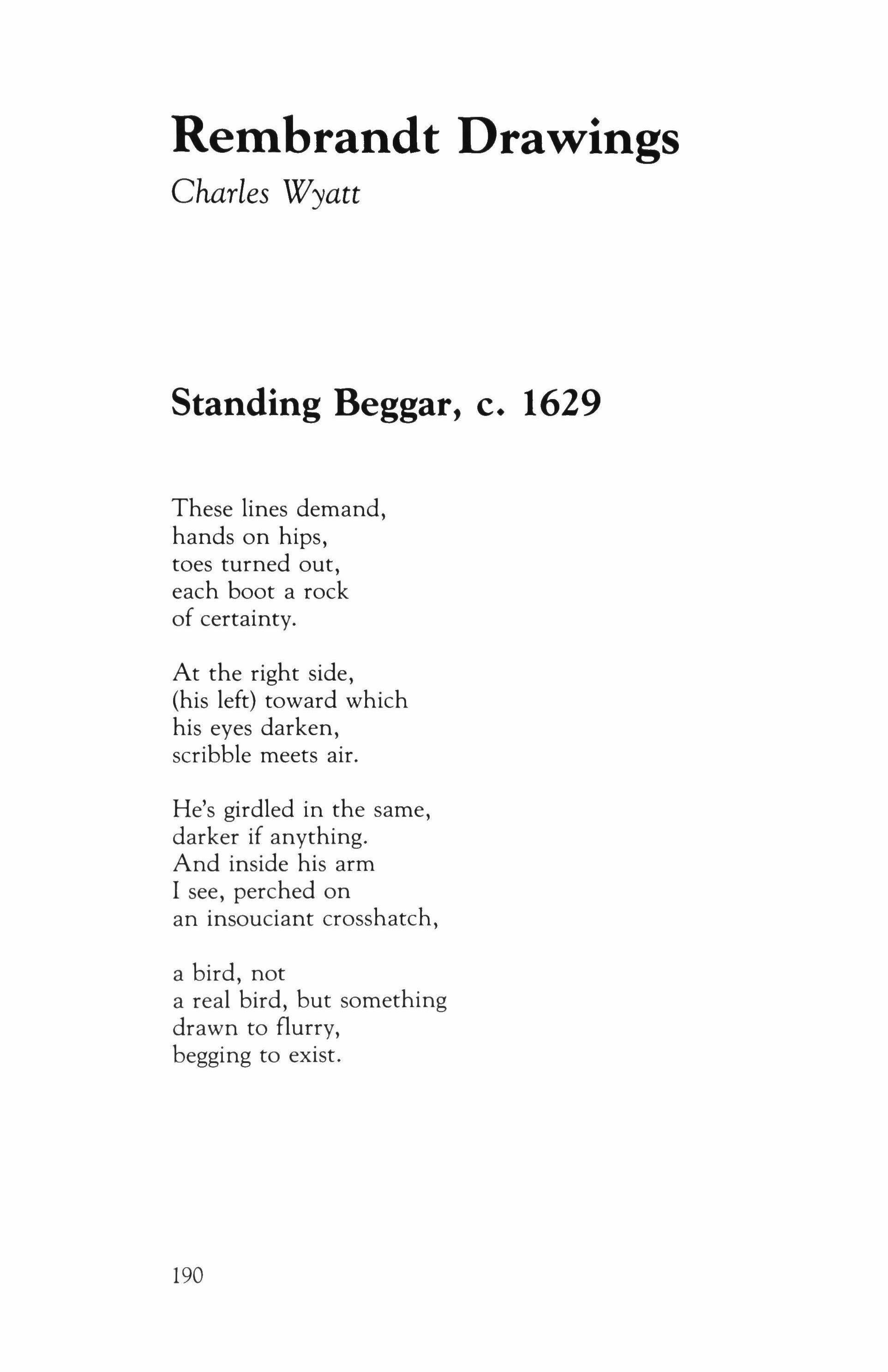
Standing Beggar, c. 1629
These lines demand, hands on hips, toes turned out, each boot a rock of certainty.
At the right side, (his left) toward which his eyes darken, scribble meets air.
He's girdled in the same, darker if anything. And inside his arm I see, perched on an insouciant crosshatch, a bird, not a real bird, but something drawn to flurry, begging to exist.
190
The Naughty Child, c. 1635
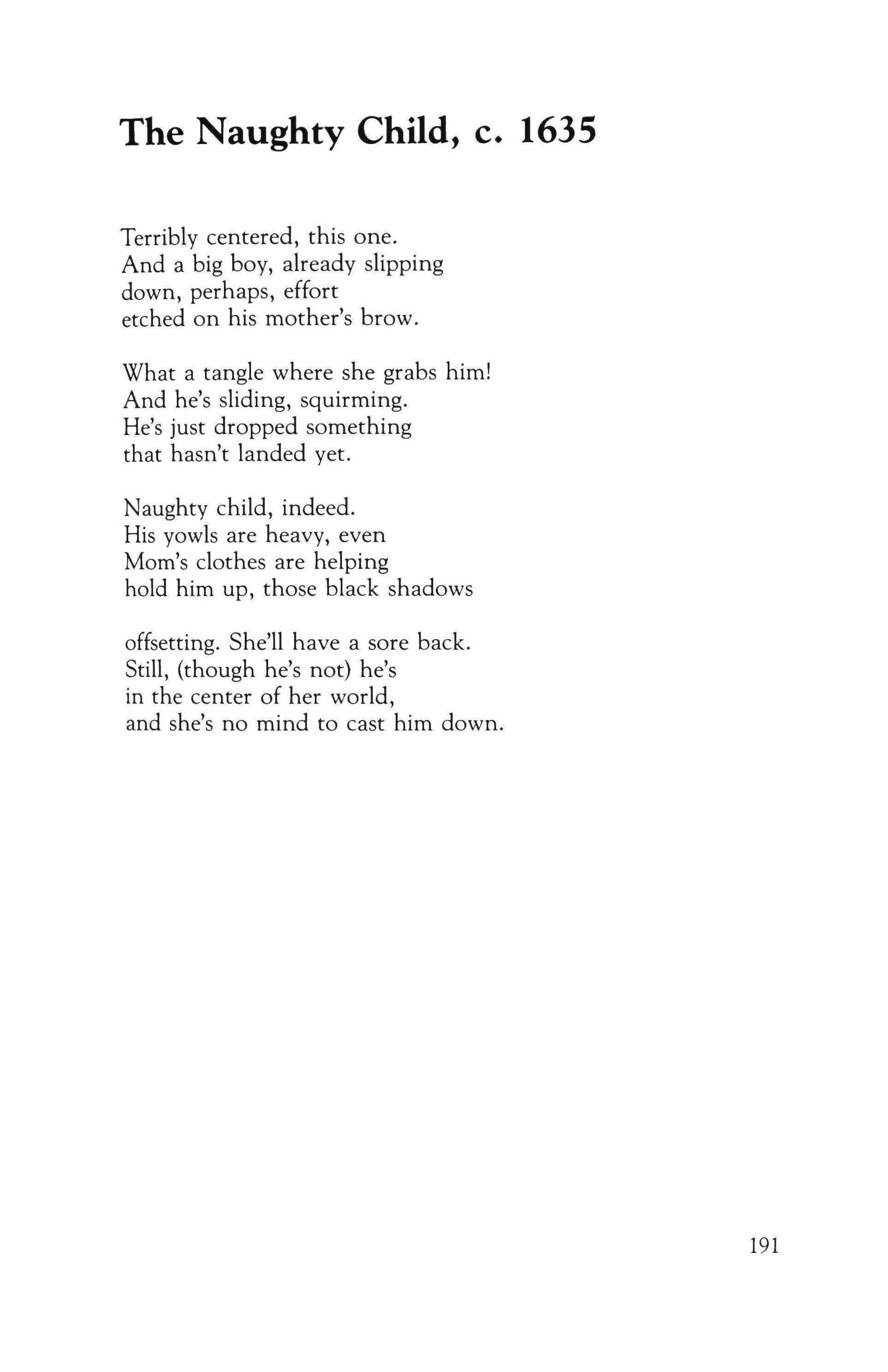
Terribly centered, this one. And a big boy, already slipping down, perhaps, effort etched on his mother's brow.
What a tangle where she grabs him! And he's sliding, squirming. He's just dropped something that hasn't landed yet.
Naughty child, indeed. His yowls are heavy, even Mom's clothes are helping hold him up, those black shadows offsetting. She'll have a sore back. Still, (though he's not) he's in the center of her world, and she's no mind to cast him down.
191
Saskia Sitting Up in Bed, c. 1639-40
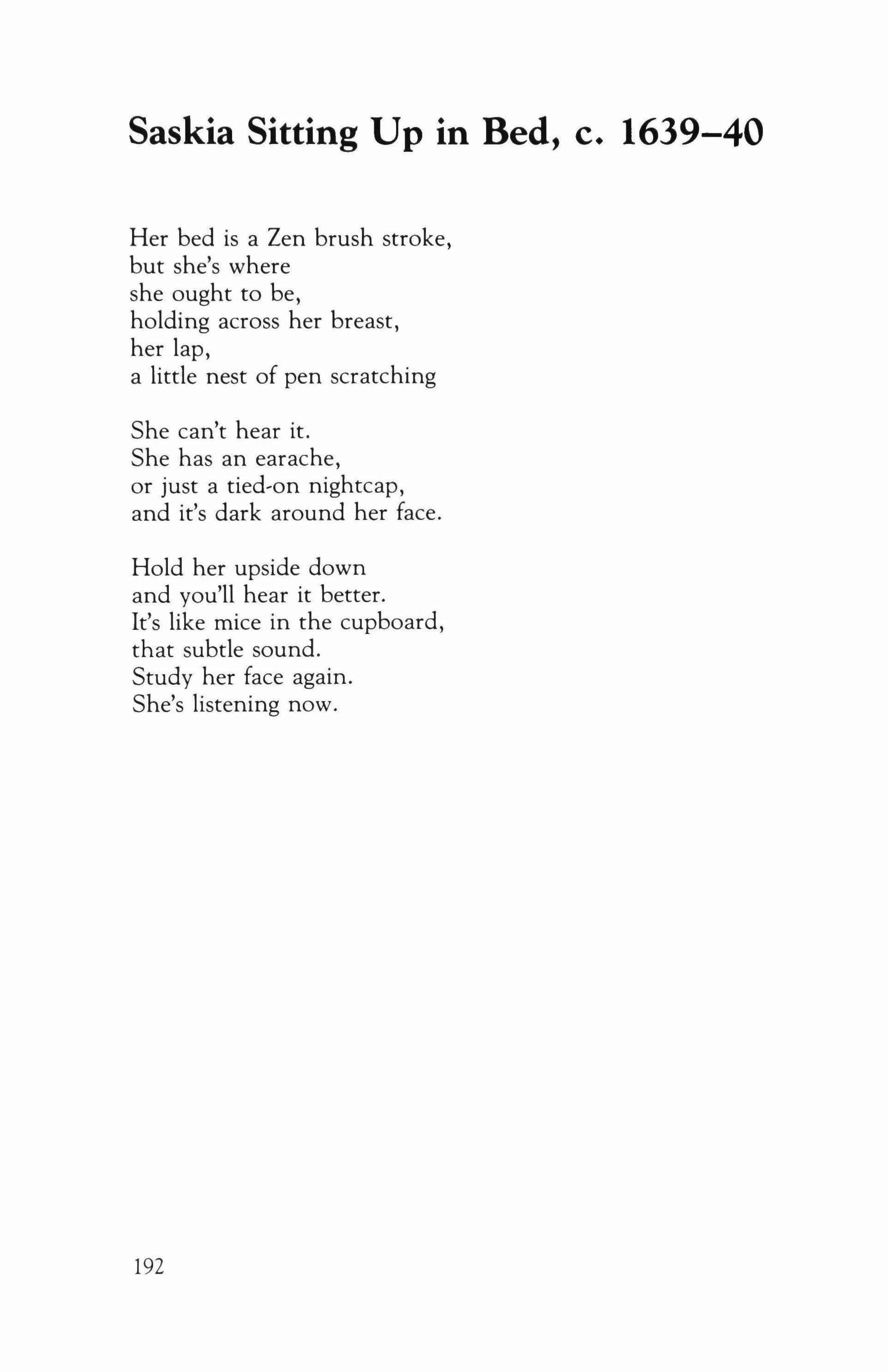
Her bed is a Zen brush stroke, but she's where she ought to be, holding across her breast, her lap, a little nest of pen scratching
She can't hear it. She has an earache, or just a tied-on nightcap, and it's dark around her face.
Hold her upside down and you'll hear it better. It's like mice in the cupboard, that subtle sound. Study her face again. She's listening now.
192
"Clawed into Each Other":
Jewish vs. Christian Memory in Paul Celan's "Tenebrae"
John Felstiner
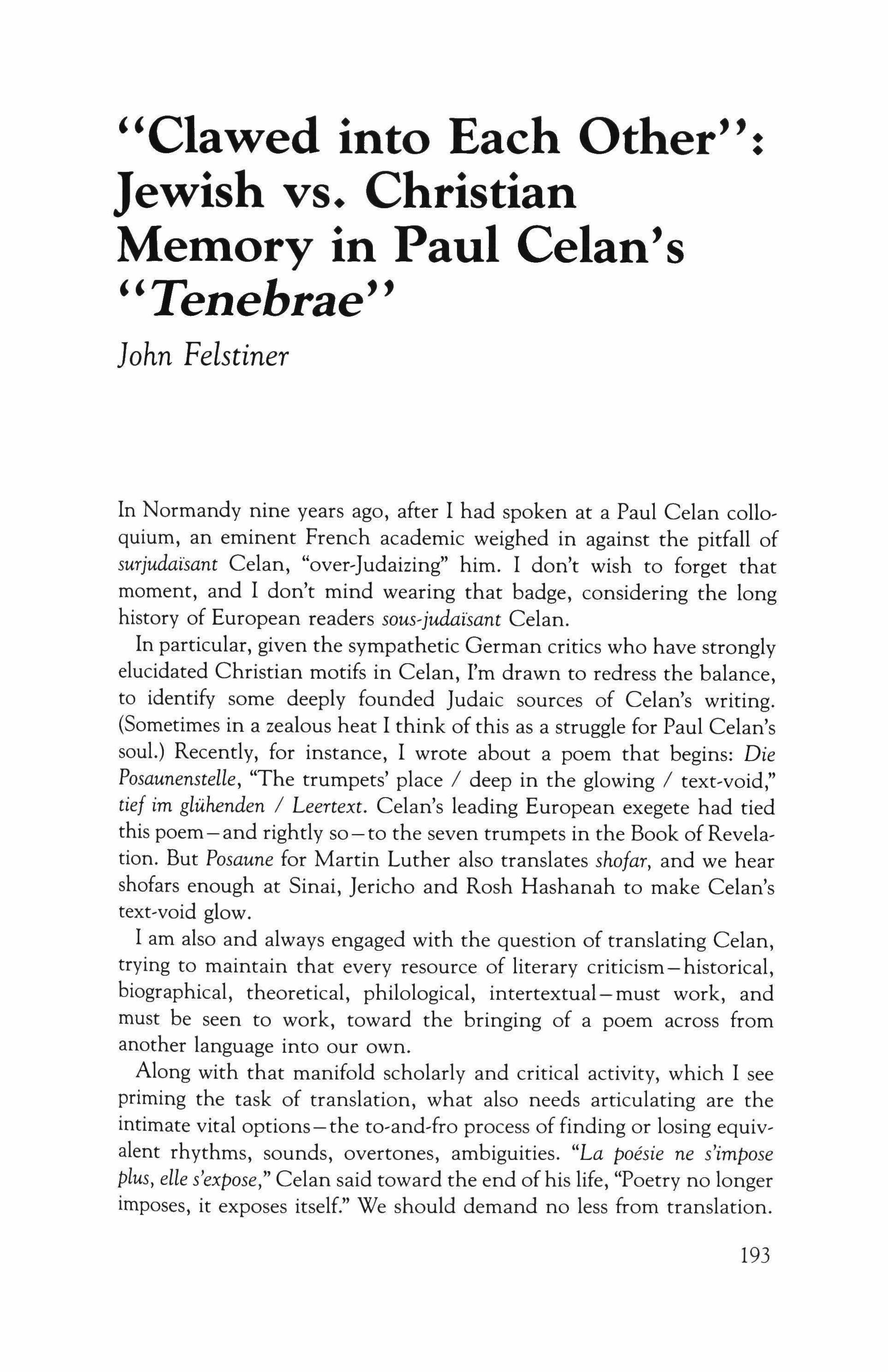
In Normandy nine years ago, after I had spoken at a Paul Celan colloquium, an eminent French academic weighed in against the pitfall of surjudai"sant Celan, "over-judaizing" him. I don't wish to forget that moment, and I don't mind wearing that badge, considering the long history of European readers sous-judaisant Celano
In particular, given the sympathetic German critics who have strongly elucidated Christian motifs in Celan, I'm drawn to redress the balance, to identify some deeply founded Judaic sources of Celan's writing. (Sometimes in a zealous heat I think of this as a struggle for Paul Celan's soul.) Recently, for instance, I wrote about a poem that begins: Die Posaunenstelle, "The trumpets' place / deep in the glowing! text-void," tief im gluhenden / Leertext. Celan's leading European exegete had tied this poem-and rightly so-to the seven trumpets in the Book of Revelation. But Posaune for Martin Luther also translates shofar, and we hear shofars enough at Sinai, Jericho and Rosh Hashanah to make Celan's text-void glow.
I am also and always engaged with the question of translating Celan, trying to maintain that every resource of literary criticism - historical, biographical, theoretical, philological, intertextual- must work, and must be seen to work, toward the bringing of a poem across from another language into our own.
Along with that manifold scholarly and critical activity, which I see priming the task of translation, what also needs articulating are the intimate vital options-the to-and-fro process of finding or losing equivalent rhythms, sounds, overtones, ambiguities. "La poesie ne s'impose plus, elle s'expose," Celan said toward the end of his life, "Poetry no longer imposes, it exposes itself." We should demand no less from translation.
193
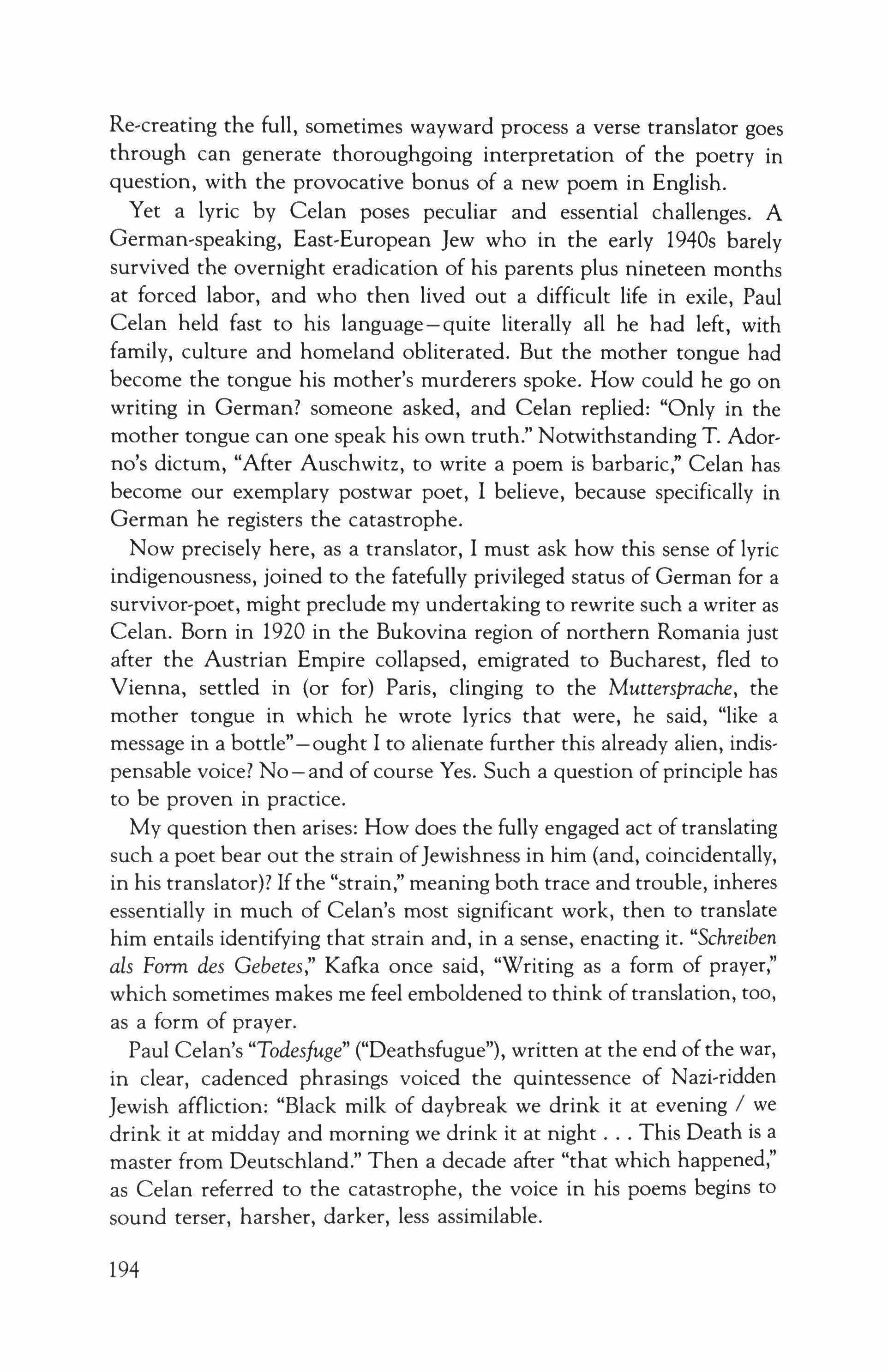
Re-creating the full, sometimes wayward process a verse translator goes through can generate thoroughgoing interpretation of the poetry in question, with the provocative bonus of a new poem in English.
Yet a lyric by Celan poses peculiar and essential challenges. A German-speaking, East-European Jew who in the early 1940s barely survived the overnight eradication of his parents plus nineteen months at forced labor, and who then lived out a difficult life in exile, Paul Celan held fast to his language-quite literally all he had left, with family, culture and homeland obliterated. But the mother tongue had become the tongue his mother's murderers spoke. How could he go on writing in German? someone asked, and Celan replied: "Only in the mother tongue can one speak his own truth." Notwithstanding T. Adorno's dictum, "After Auschwitz, to write a poem is barbaric," Celan has become our exemplary postwar poet, I believe, because specifically in German he registers the catastrophe.
Now precisely here, as a translator, I must ask how this sense of lyric indigenousness, joined to the fatefully privileged status of German for a survivor-poet, might preclude my undertaking to rewrite such a writer as Celano Born in 1920 in the Bukovina region of northern Romania just after the Austrian Empire collapsed, emigrated to Bucharest, fled to Vienna, settled in {or for} Paris, clinging to the Muttersprache, the mother tongue in which he wrote lyrics that were, he said, "like a message in a bottle" - ought I to alienate further this already alien, indispensable voice? No-and of course Yes. Such a question of principle has to be proven in practice.
My question then arises: How does the fully engaged act of translating such a poet bear out the strain ofjewishness in him {and, coincidentally, in his translator}? If the "strain," meaning both trace and trouble, inheres essentially in much of Celan's most significant work, then to translate him entails identifying that strain and, in a sense, enacting it. "Schreiben als Form des Gebetes," Kafka once said, "Writing as a form of prayer," which sometimes makes me feel emboldened to think of translation, too, as a form of prayer.
Paul Celan's "Todesfuge" {"Deathsfugue"}, written at the end of the war, in clear, cadenced phrasings voiced the quintessence of Nazi-ridden Jewish affliction: "Black milk of daybreak we drink it at evening / we drink it at midday and morning we drink it at night This Death is a master from Deutschland." Then a decade after "that which happened," as Celan referred to the catastrophe, the voice in his poems begins to sound terser, harsher, darker, less assimilable.
194
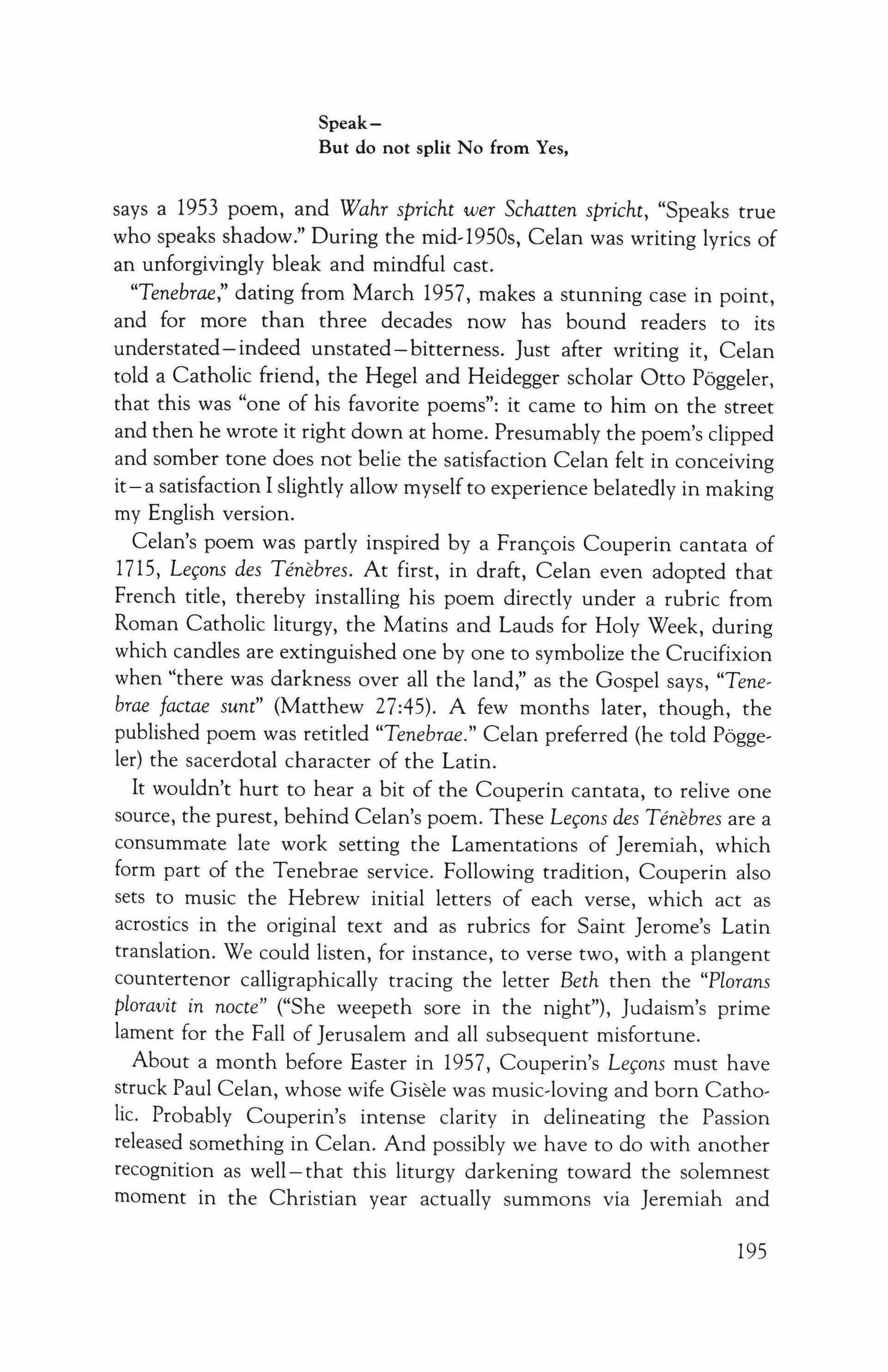
Speak-
But do not split No from Yes,
says a 1953 poem, and Wahr spricht wer Schatten spticiu, "Speaks true who speaks shadow." During the mid-1950s, Celan was writing lyrics of an unforgivingly bleak and mindful cast.
"Tenebrae," dating from March 1957, makes a stunning case in point, and for more than three decades now has bound readers to its understated - indeed unstated - bitterness. Just after writing it, Celan told a Catholic friend, the Hegel and Heidegger scholar Otto Poggeler, that this was "one of his favorite poems": it came to him on the street and then he wrote it right down at home. Presumably the poem's clipped and somber tone does not belie the satisfaction Celan felt in conceiving it-a satisfaction I slightly allow myself to experience belatedly in making my English version.
Celan's poem was partly inspired by a Francois Couperin cantata of 1715, Lecons des Tenebres. At first, in draft, Celan even adopted that French title, thereby installing his poem directly under a rubric from Roman Catholic liturgy, the Matins and Lauds for Holy Week, during which candles are extinguished one by one to symbolize the Crucifixion when "there was darkness over all the land," as the Gospel says, "Tenebrae [actae sunt" (Matthew 27:45). A few months later, though, the published poem was retitled "Tenebrae." Celan preferred (he told Poggeler) the sacerdotal character of the Latin.
It wouldn't hurt to hear a bit of the Couperin cantata, to relive one source, the purest, behind Celan's poem. These Lecons des Tenebres are a consummate late work setting the Lamentations of Jeremiah, which form part of the Tenebrae service. Following tradition, Couperin also sets to music the Hebrew initial letters of each verse, which act as acrostics in the original text and as rubrics for Saint Jerome's Latin translation. We could listen, for instance, to verse two, with a plangent countertenor calligraphically tracing the letter Beth then the "Plorans ploravit in nocte" ("She weepeth sore in the night"), Judaism's prime lament for the Fall of Jerusalem and all subsequent misfortune.
About a month before Easter in 1957, Couperin's Lecons must have struck Paul Celan, whose wife Gisele was music-loving and born Catholic. Probably Couperin's intense clarity in delineating the Passion released something in Celano And possibly we have to do with another recognition as well-that this liturgy darkening toward the solemnest moment in the Christian year actually summons via Jeremiah and
195
speaks Judaic catastrophe, the arch-Exile. Possibly we need, along with Celan, to over-hear this lesson.
Here then is Celan's poem, with a fairly close response to it:
Tenebrae
Nah sind wir, Herr, nahe und greifbar.
Gegriffen schon, Herr, ineinander verkrallt, als war der Leib eines ;eden von uns dein Leib, Herr.
Bete, Herr, bete zu uns, wir sind nah.
Windschief gingen wir hin, gingen wir hin, uns zu bucken nach Mulde und Maar.
Zur Tranke gingen wir, Herr.
Es war Blut, es war, was du vergossen, Herr.
Es glanzte.
Es was] uns dein Bild in die Augen, Herr. Augen und Mund stehn so offen und leer, Herr. Wir haben getrunken, Herr. Das Blut und das Bild, das im Blut war, Herr.
Bete, Herr. Wir sind nah.
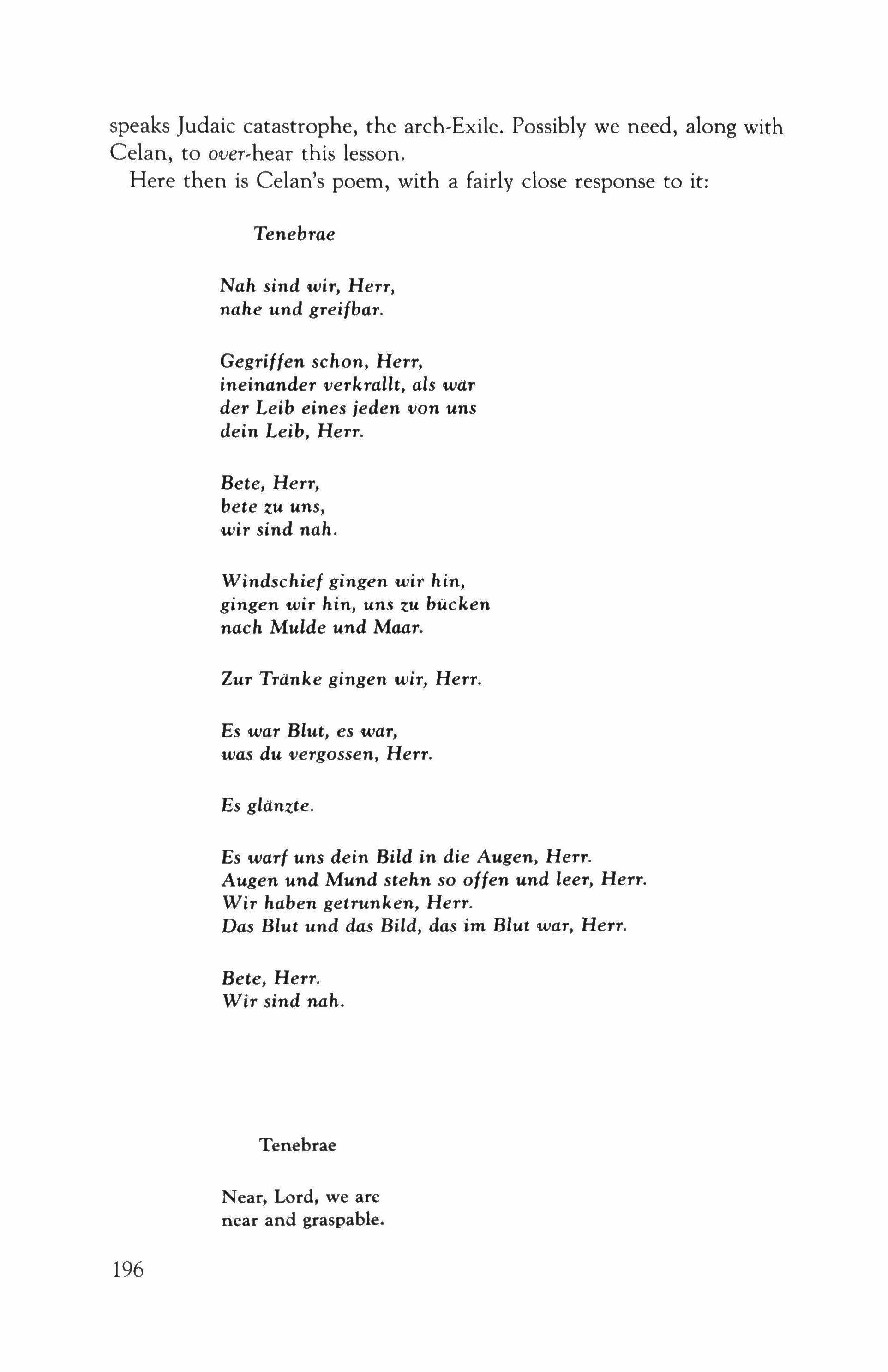
Tenebrae
Near, Lord, we are near and graspable.
196
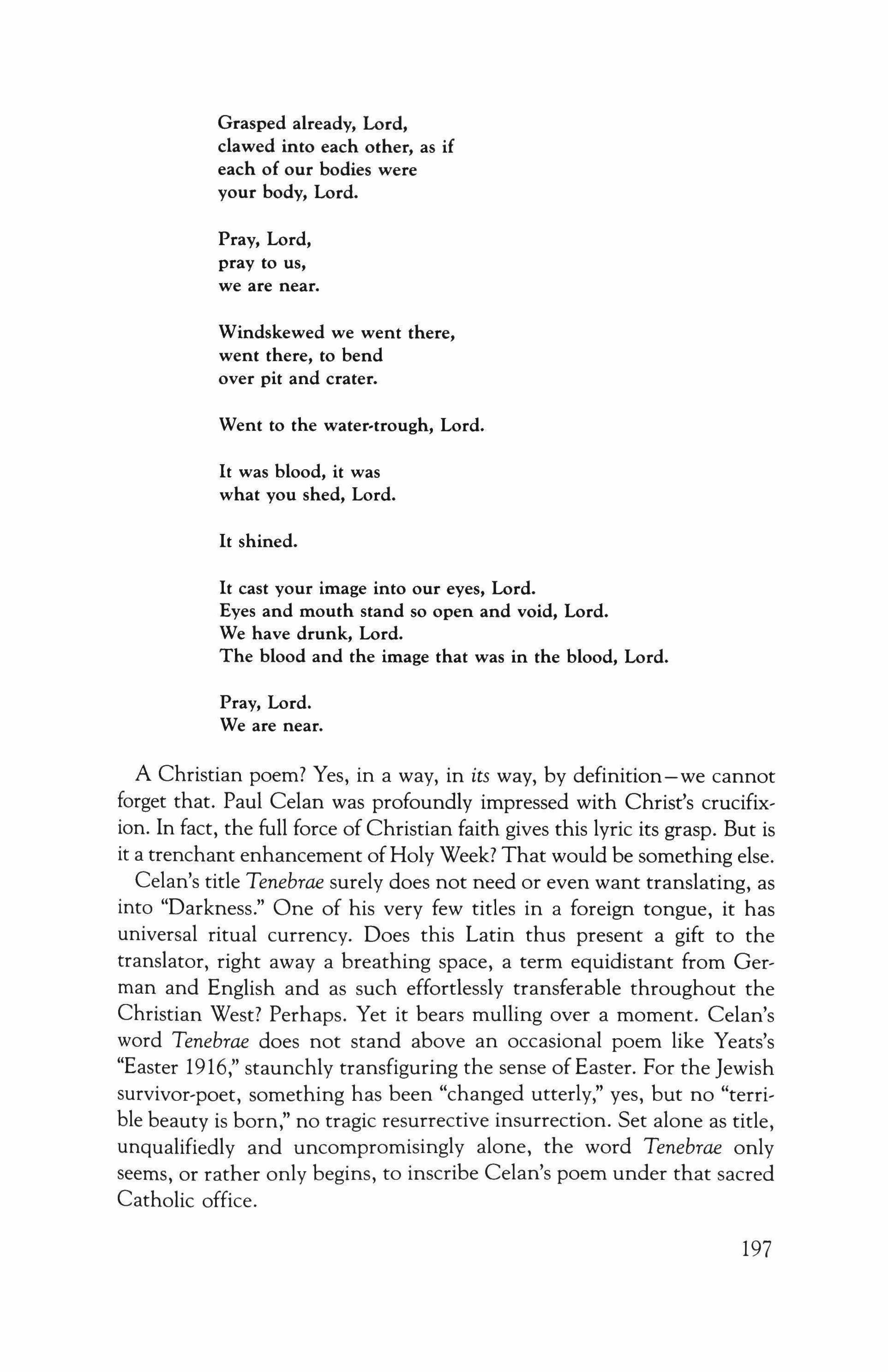
Grasped already, Lord, clawed into each other, as if each of our bodies were your body, Lord.
Pray, Lord, pray to us, we are near.
Windskewed we went there, went there, to bend over pit and crater.
Went to the water-trough, Lord.
It was blood, it was what you shed, Lord. It shined.
It cast your image into our eyes, Lord. Eyes and mouth stand so open and void, Lord. We have drunk, Lord. The blood and the image that was in the blood, Lord.
Pray, Lord. We are near.
A Christian poem? Yes, in a way, in its way, by definition-we cannot forget that. Paul Celan was profoundly impressed with Christ's crucifixion. In fact, the full force of Christian faith gives this lyric its grasp. But is it a trenchant enhancement ofHoly Week? That would be something else. Celan's title Tenebrae surely does not need or even want translating, as into "Darkness." One of his very few titles in a foreign tongue, it has universal ritual currency. Does this Latin thus present a gift to the translator, right away a breathing space, a term equidistant from German and English and as such effortlessly transferable throughout the Christian West? Perhaps. Yet it bears mulling over a moment. Celan's word Tenebrae does not stand above an occasional poem like Yeats's "Easter 1916," staunchly transfiguring the sense of Easter. For the Jewish survivor-poet, something has been "changed utterly," yes, but no "terrible beauty is born," no tragic resurrective insurrection. Set alone as title, unqualifiedly and uncompromisingly alone, the word Tenebrae only seems, or rather only begins, to inscribe Celan's poem under that sacred Catholic office.
197
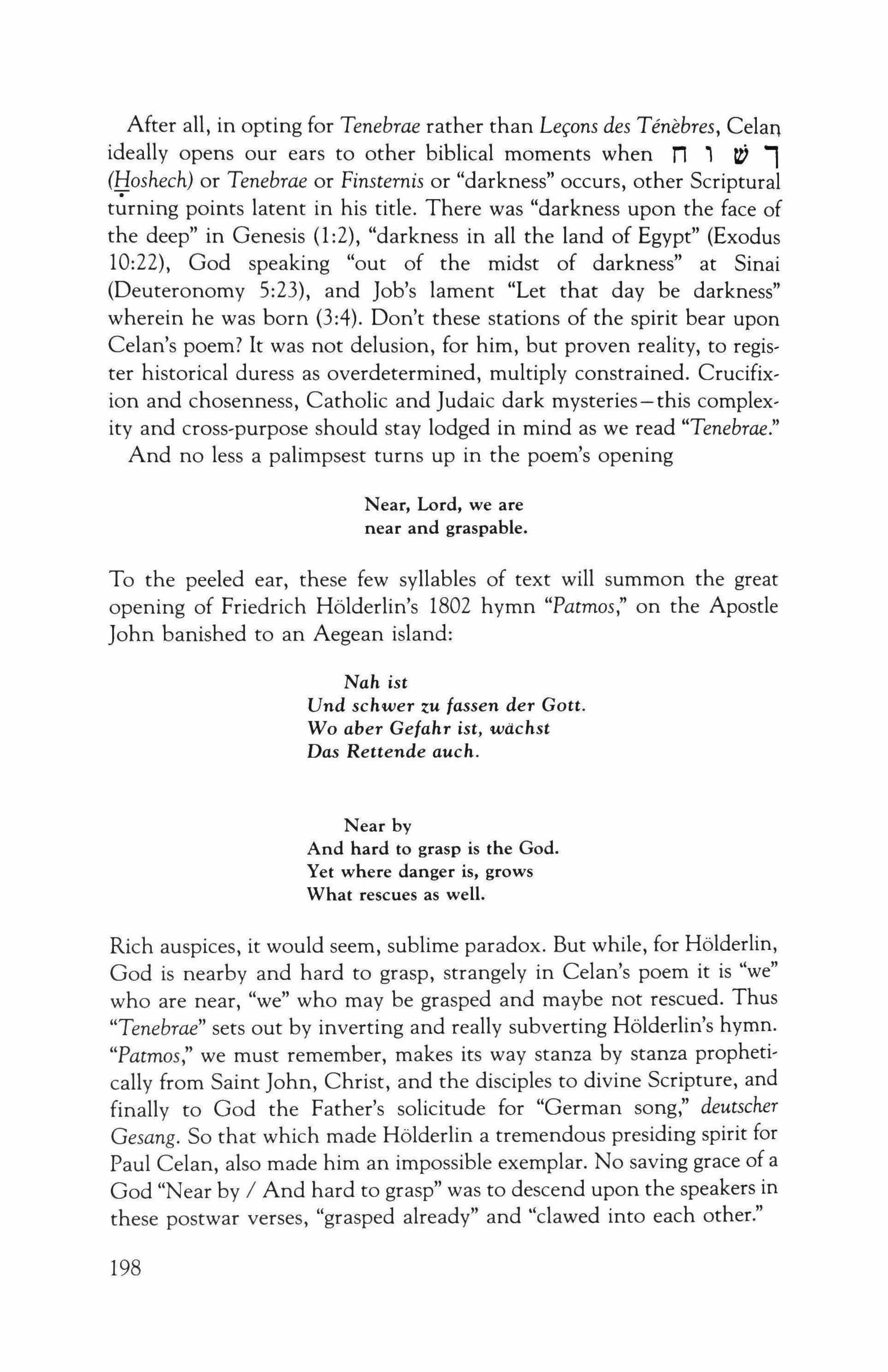
After all, in opting for Tenebrae rather than Lecons des Tenebres, Celan ideally opens our ears to other biblical moments when n , tV ., (Hoshech) or Tenebrae or Finsternis or "darkness" occurs, other Scriptural turning points latent in his title. There was "darkness upon the face of the deep" in Genesis (1:2), "darkness in all the land of Egypt" (Exodus 10:22), God speaking "out of the midst of darkness" at Sinai (Deuteronomy 5:23), and Job's lament "Let that day be darkness" wherein he was born (3:4). Don't these stations of the spirit bear upon Celan's poem? It was not delusion, for him, but proven reality, to register historical duress as overdetermined, multiply constrained. Crucifixion and chosenness, Catholic and Judaic dark mysteries-this complexity and cross-purpose should stay lodged in mind as we read "Tenebrae." And no less a palimpsest turns up in the poem's opening
Near, Lord, we are near and graspable.
To the peeled ear, these few syllables of text will summon the great opening of Friedrich Holderlin's 1802 hymn "Patmos," on the Apostle John banished to an Aegean island:
Nah ist
Und schwer zu lassen der Gott. Wo aber Gejahr ist, wachst Das Rettende auch.
Near by
And hard to grasp is the God. Yet where danger is, grows What rescues as well.
Rich auspices, it would seem, sublime paradox. But while, for Holderlin, God is nearby and hard to grasp, strangely in Celan's poem it is "we" who are near, "we" who may be grasped and maybe not rescued. Thus "Tenebrae" sets out by inverting and really subverting Holderlin's hymn. "Patmos," we must remember, makes its way stanza by stanza prophetically from Saint John, Christ, and the disciples to divine Scripture, and finally to God the Father's solicitude for "German song," deutscher Gesang. So that which made Holderlin a tremendous presiding spirit for Paul Celan, also made him an impossible exemplar. No saving grace of a God "N ear by / And hard to grasp" was to descend upon the speakers in these postwar verses, "grasped already" and "clawed into each other."
198

Layered even deeper than Couperin and Holy Week, than Holderlin and John and Patmos behind Celan's "Tenebrae" stands that lovely word nah-"near," and why not "nigh"?-which acts throughout the Psalms as a signal of mercy. "0 taste and see The Lord is nigh unto them that are of a broken heart" (34: 18), "We give thanks thy name is near" (75:2), "Thou art near, 0 Lord; and all thy commandments are truth" (119:151), "The Lord is nigh unto all them that call upon him" (145:18). Gratefully we hold onto this consolatory promise of presence. Yet out of the psalmist's promise, and out of Holderlin who crieth salvific danger, comes only a clawing.
"Grasped already, Lord," say the speakers in Celan's lyric, and that word "already" wrenches the communal voice out of a psalmic ever, presence into historical contingency:
Grasped already, Lord, clawed into each other, as if each of our bodies were your body, Lord.
How close a bond does Celan's poem clinch between "our bodies" and "your body, Lord"? For one thing, this likening occurs only by way of a subjunctive, the mood reserved for what's doubtful or contrary to fact. Certainly the image of excruciation brings a very physical and mythic charge to the scene. But the comparison, the precedent ofJesus, shall we say, retains its undoubted potency only in contradistinction-not as if the speakers were suffering in His name. To think this crucial moment "[udeo-Christian" would, it seems to me, vitiate the force of Celan's poem.
During Tenebrae services the Psalms too are chanted, along with the Lamentations. But Psalms and Lamentations also came to the lips of Jews struggling for breath inside "shower rooms" fabricated in Germany. So in a sense it is Jewish versus Christian memory in this poem, the one tugging at the other. Celan bore witness to the severest test of divine presence when, shortly before writing "Tenebrae," he translated for German viewers the narration in Alain Resnais's death-camp documentary Night and Fog, which makes this observation as the camera pans upward in a gas chamber: "The only sign-but you have to know about it-is the ceiling dug into by fingernails." So the question arises, Can there be anything even remotely redemptive for Celan, anything whatsoever reconciliatory, in the analogy ventured by his poem's speakers? The violence alone-"clawed into each other" -can break down all
199
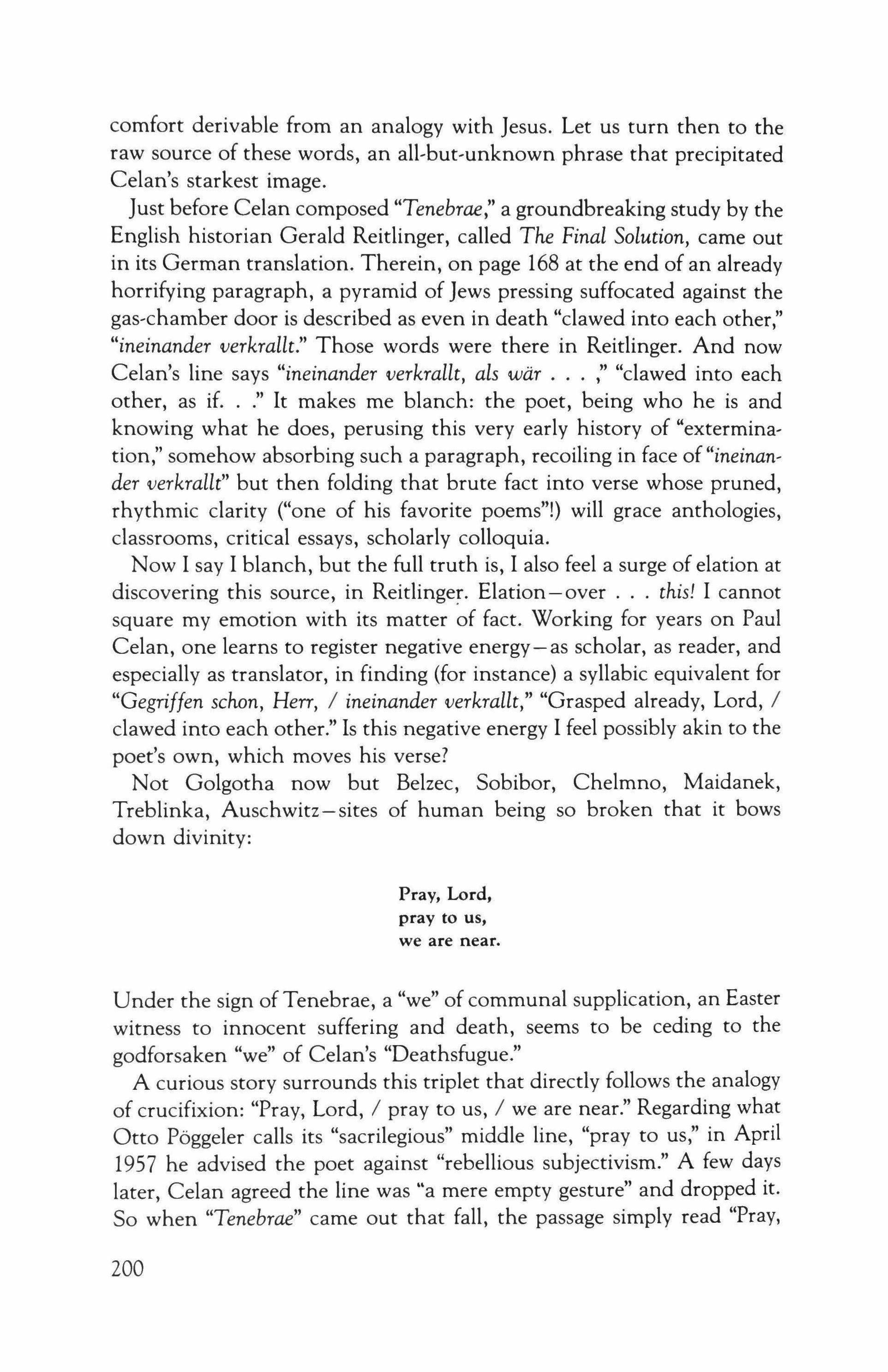
comfort derivable from an analogy with Jesus. Let us turn then to the raw source of these words, an all-but-unknown phrase that precipitated Celan's starkest image.
Just before Celan composed "Tenebrae," a groundbreaking study by the English historian Gerald Reitlinger, called The Final Solution, came out in its German translation. Therein, on page 168 at the end of an already horrifying paragraph, a pyramid of Jews pressing suffocated against the gas-chamber door is described as even in death "clawed into each other," "ineinander verkrallt." Those words were there in Reitlinger. And now Celan's line says "ineinander verkrallt, als war ," "clawed into each other, as if. ." It makes me blanch: the poet, being who he is and knowing what he does, perusing this very early history of "exterrnination," somehow absorbing such a paragraph, recoiling in face of "inemzmder verkrallt" but then folding that brute fact into verse whose pruned, rhythmic clarity {"one of his favorite poems"!} will grace anthologies, classrooms, critical essays, scholarly colloquia.
Now I say I blanch, but the full truth is, I also feel a surge of elation at discovering this source, in Reitlinger, Elation-over this! I cannot square my emotion with its matter of fact. Working for years on Paul Celan, one learns to register negative energy-as scholar, as reader, and especially as translator, in finding {for instance} a syllabic equivalent for "Gegnffen schon, Herr, / ineinander verkrallt," "Grasped already, Lord, / clawed into each other." Is this negative energy I feel possibly akin to the poet's own, which moves his verse?
Not Golgotha now but Belzec, Sobibor, Chelmno, Maidanek, Treblinka, Auschwitz-sites of human being so broken that it bows down divinity:
Pray, Lord, pray to us, we are near.
Under the sign of Tenebrae, a "we" of communal supplication, an Easter witness to innocent suffering and death, seems to be ceding to the godforsaken "we" of Celan's "Deathsfugue."
A curious story surrounds this triplet that directly follows the analogy of crucifixion: "Pray, Lord, ! pray to us, / we are near." Regarding what Otto Poggeler calls its "sacrilegious" middle line, "pray to us:' in April 1957 he advised the poet against "rebellious subjectivism." A few days later, Celan agreed the line was "a mere empty gesture" and dropped it. So when "Tenebrae" came out that fall, the passage simply read "Pray,
200
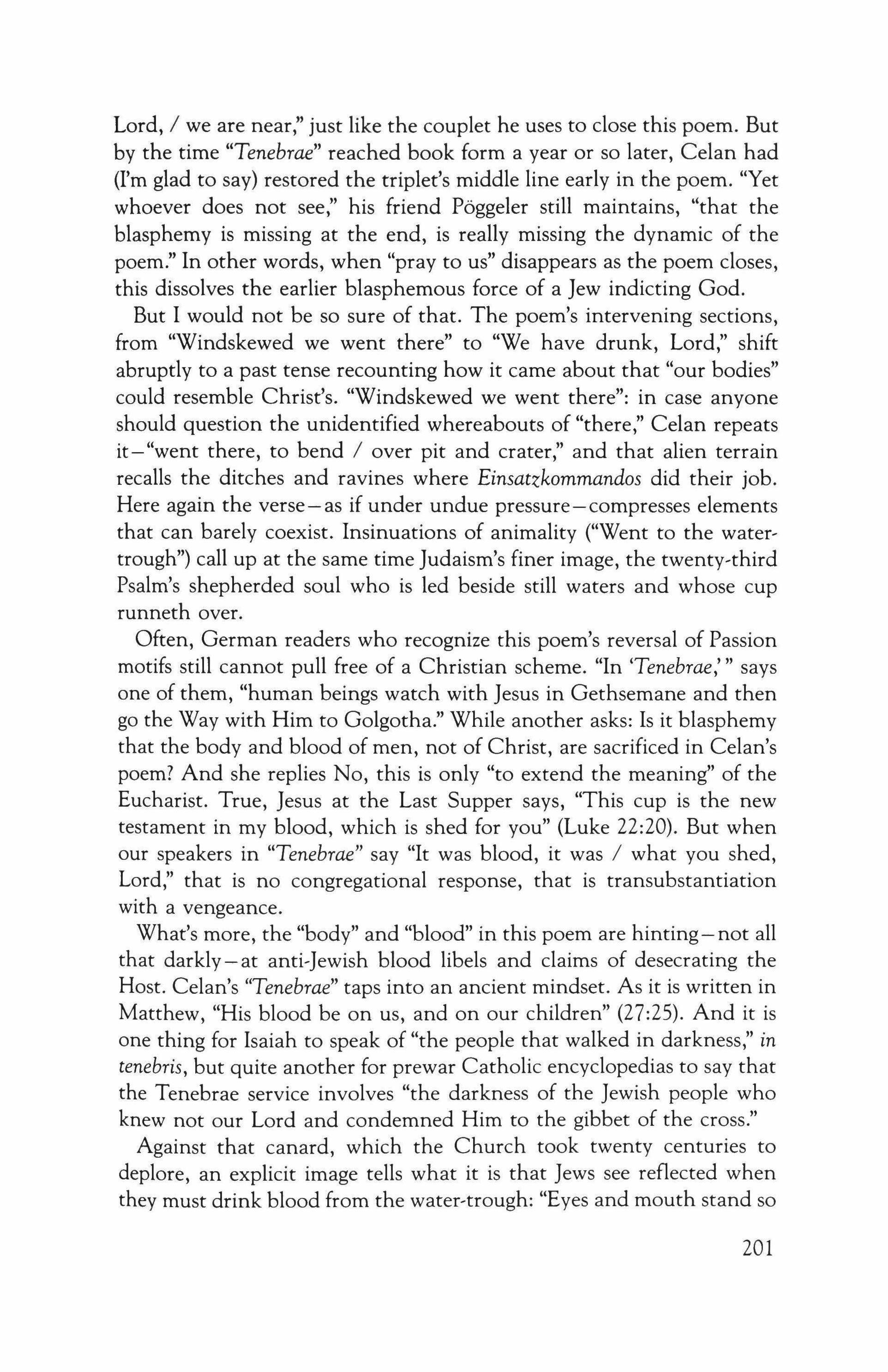
Lord, / we are near," just like the couplet he uses to close this poem. But by the time "Tenebrae" reached book form a year or so later, Celan had (I'm glad to say) restored the triplet's middle line early in the poem. "Yet whoever does not see:' his friend Poggeler still maintains, "that the blasphemy is missing at the end, is really missing the dynamic of the poem." In other words, when "pray to us" disappears as the poem closes, this dissolves the earlier blasphemous force of a Jew indicting God.
But I would not be so sure of that. The poem's intervening sections, from "Windskewed we went there" to "We have drunk, Lord," shift abruptly to a past tense recounting how it came about that "our bodies" could resemble Christ's. "Windskewed we went there": in case anyone should question the unidentified whereabouts of "there," Celan repeats it-"went there, to bend lover pit and crater," and that alien terrain recalls the ditches and ravines where Einsatzkommandos did their job. Here again the verse-as if under undue pressure-compresses elements that can barely coexist. Insinuations of animality ("Went to the watertrough") call up at the same time Judaism's finer image, the twenty-third Psalm's shepherded soul who is led beside still waters and whose cup runneth over.
Often, German readers who recognize this poem's reversal of Passion motifs still cannot pull free of a Christian scheme. "In 'Tenebrae:" says one of them, "human beings watch with Jesus in Gethsemane and then go the Way with Him to Golgotha." While another asks: Is it blasphemy that the body and blood of men, not of Christ, are sacrificed in Celan's poem? And she replies No, this is only "to extend the meaning" of the Eucharist. True, Jesus at the Last Supper says, "This cup is the new testament in my blood, which is shed for you" (Luke 22:20). But when our speakers in "Tenebrae" say "It was blood, it was / what you shed, Lord," that is no congregational response, that is transubstantiation with a vengeance.
What's more, the "body" and "blood" in this poem are hinting-not all that darkly-at anti-jewish blood libels and claims of desecrating the Host. Celan's ''Tenebrae'' taps into an ancient mindset. As it is written in Matthew, "His blood be on us, and on our children" (27:25). And it is one thing for Isaiah to speak of "the people that walked in darkness," in tenebris, but quite another for prewar Catholic encyclopedias to say that the Tenebrae service involves "the darkness of the Jewish people who knew not our Lord and condemned Him to the gibbet of the cross."
Against that canard, which the Church took twenty centuries to deplore, an explicit image tells what it is that Jews see reflected when they must drink blood from the water-trough: "Eyes and mouth stand so
201

open and void, Lord." The eyes and mouth, elsewhere positive figures for Celan, belong here-through his strong verb "stand" -not only to a voided Communion but to mortally emaciated faces. It is the same poet writing "We have drunk, Lord," in "Tenebrae," who wrote "Black milk of morning We drink and drink" in "Todesfuge."
Now perhaps I am still, nine years after that moment in Normandy, surjudai'sant Paul Celan, "over-judaizing" him. So be it. That Celan can bind the Crucifixion into Jewish suffering, for instance, links him with Marc Chagall. For remember, in Chagall's many crucifixion scenes the martyr is an East European Jew in a tallith, and synagogues and sacred scrolls are burning, and there is no salvation, but suffering goes on. By imagining their death throes "as if I each of our bodies were I your body, Lord," couldn't these verses, in fact, be working to reclaim the Jewish Jesus' suffering from an ecclesiastical ideology that has used it antijewishlv?
The need to see in Celan's "Tenebrae" both a Christian and a radically human suffering finds its grandest advocate in the philosophical critic Hans-Georg Gadamer, who also attended closely the relationship between Heidegger and the poet. Gadamer derives a kind of existential Christian universality from the poem: "In dying," he says, "each of us is as alone and forsaken as the dying Jesus on the cross." And he speaks of "this commonality between Jesus and us." But the reversals and subversions in "Tenebrae" do not support the idea of commonality, and the poem's "we" does not migrate into an "us" that comprises Gadamer.
Nor has Celan's "Tenebrae" anything to do with a kind of apologism that finds mystery and mercy and even eschatological salvation in Holocaust sacrifice by aligning Holocaust with Crucifixion. "My God, my God, why hast thou forsaken me?" That that cry sounds originally in Psalms (22: 1), then later as "Eli, Eli, lama sabachtani?" in the Gospelists' account ofJesus' final hour (Matthew 27:46), does not signify a continuity, as far as Judaism is concerned. And although the Lamentations of Jeremiah (as in Couperin's cantata) form part of a Tenebrae service, Jewish memorial grieving does not reciprocally identify with Christian.
Celan's "Tenebrae," I think, would gainsay the idea that Jewish prefigures Christian testament. Its title alone might seem to offer conciliation, a devoutly-to-be-wished-for sharing of wounds. But so starkly uttered a word only seems to offer this. It was not from the likes of Paul Celan in 1957, before John XXIII and Vatican II, that conciliation had to come.
So when "Tenebrae" closes on a note of quiet entreaty, "Pray, Lord. I We are near," this eleven-times-invoked "Lord" does not simply culminate a litany, as Gadamer would hear it. "In the ever-repeated 'Lord'," he says,
202
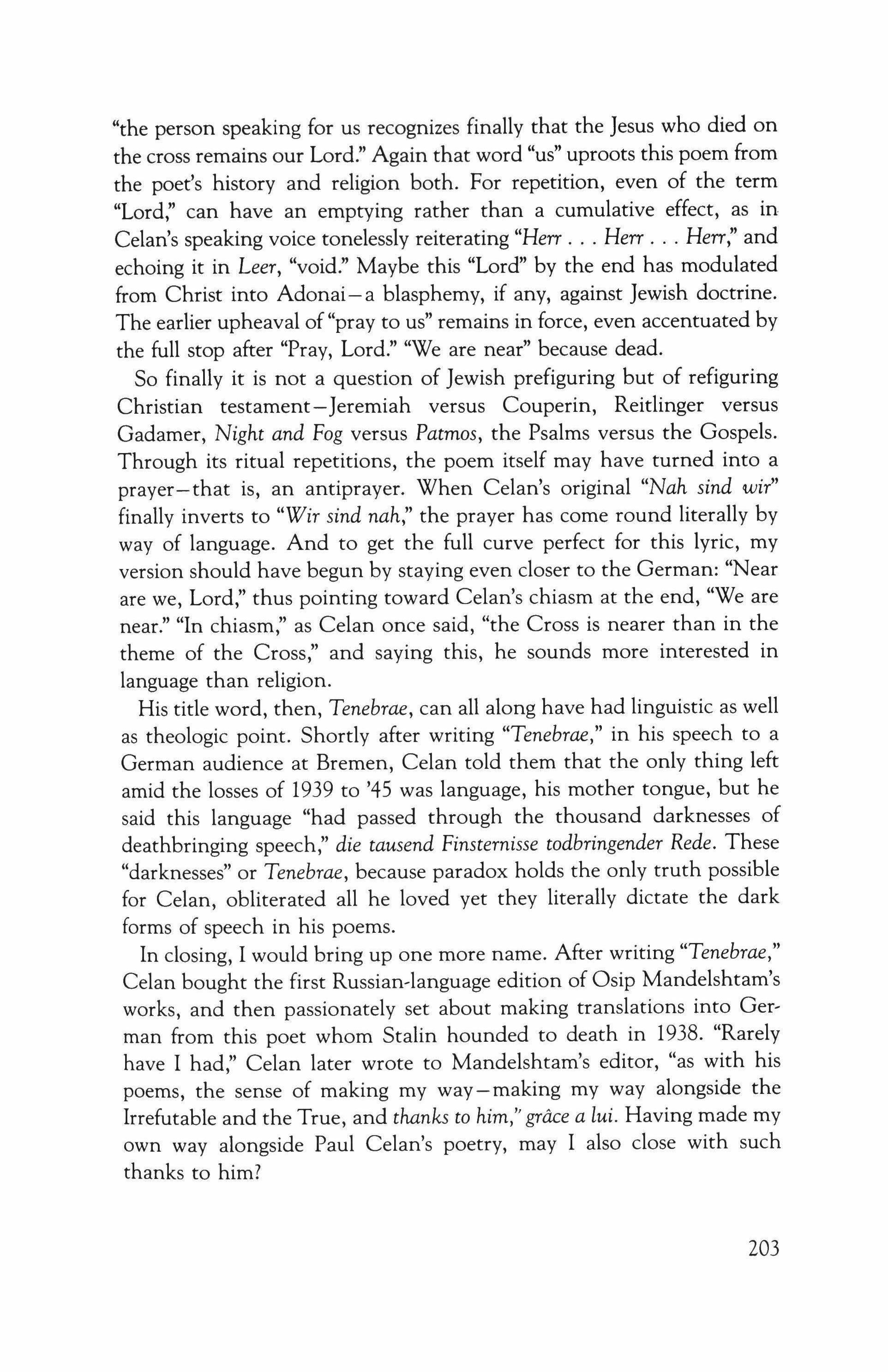
"the person speaking for us recognizes finally that the Jesus who died on the cross remains our Lord." Again that word "us" uproots this poem from the poet's history and religion both. For repetition, even of the term "Lord:' can have an emptying rather than a cumulative effect, as in Celan's speaking voice tonelessly reiterating "Herr Herr Herr:' and echoing it in Leer, "void." Maybe this "Lord" by the end has modulated from Christ into Adonai - a blasphemy, if any, against Jewish doctrine. The earlier upheaval of"pray to us" remains in force, even accentuated by the full stop after "Pray, Lord." "We are near" because dead.
So finally it is not a question of Jewish prefiguring but of refiguring Christian testament-Jeremiah versus Couperin, Reidinger versus Gadamer, Night and Fog versus Patmos, the Psalms versus the Gospels. Through its ritual repetitions, the poem itself may have turned into a prayer-that is, an antiprayer. When Celan's original "Nah sind wir" finally inverts to "Wir sind nah," the prayer has come round literally by way of language. And to get the full curve perfect for this lyric, my version should have begun by staying even closer to the German: "Near are we, Lord," thus pointing toward Celan's chiasm at the end, "We are near." "In chiasm," as Celan once said, "the Cross is nearer than in the theme of the Cross," and saying this, he sounds more interested in language than religion.
His title word, then, Tenebrae, can all along have had linguistic as well as theologic point. Shortly after writing "Tenebrae," in his speech to a German audience at Bremen, Celan told them that the only thing left amid the losses of 1939 to '45 was language, his mother tongue, but he said this language "had passed through the thousand darknesses of deathbringing speech," die tausend Finsternisse todbringender Rede. These "darknesses" or Tenebrae, because paradox holds the only truth possible for Celan, obliterated all he loved yet they literally dictate the dark forms of speech in his poems.
In closing, I would bring up one more name. After writing "Tenebrae," Celan bought the first Russian-language edition of Osip Mandelshtam's works, and then passionately set about making translations into German from this poet whom Stalin hounded to death in 1938. "Rarely have I had," Celan later wrote to Mandelshtam's editor, "as with his poems, the sense of making my way - making my way alongside the Irrefutable and the True, and thanks to him," grace a lui. Having made my own way alongside Paul Celan's poetry, may I also close with such thanks to him?
203
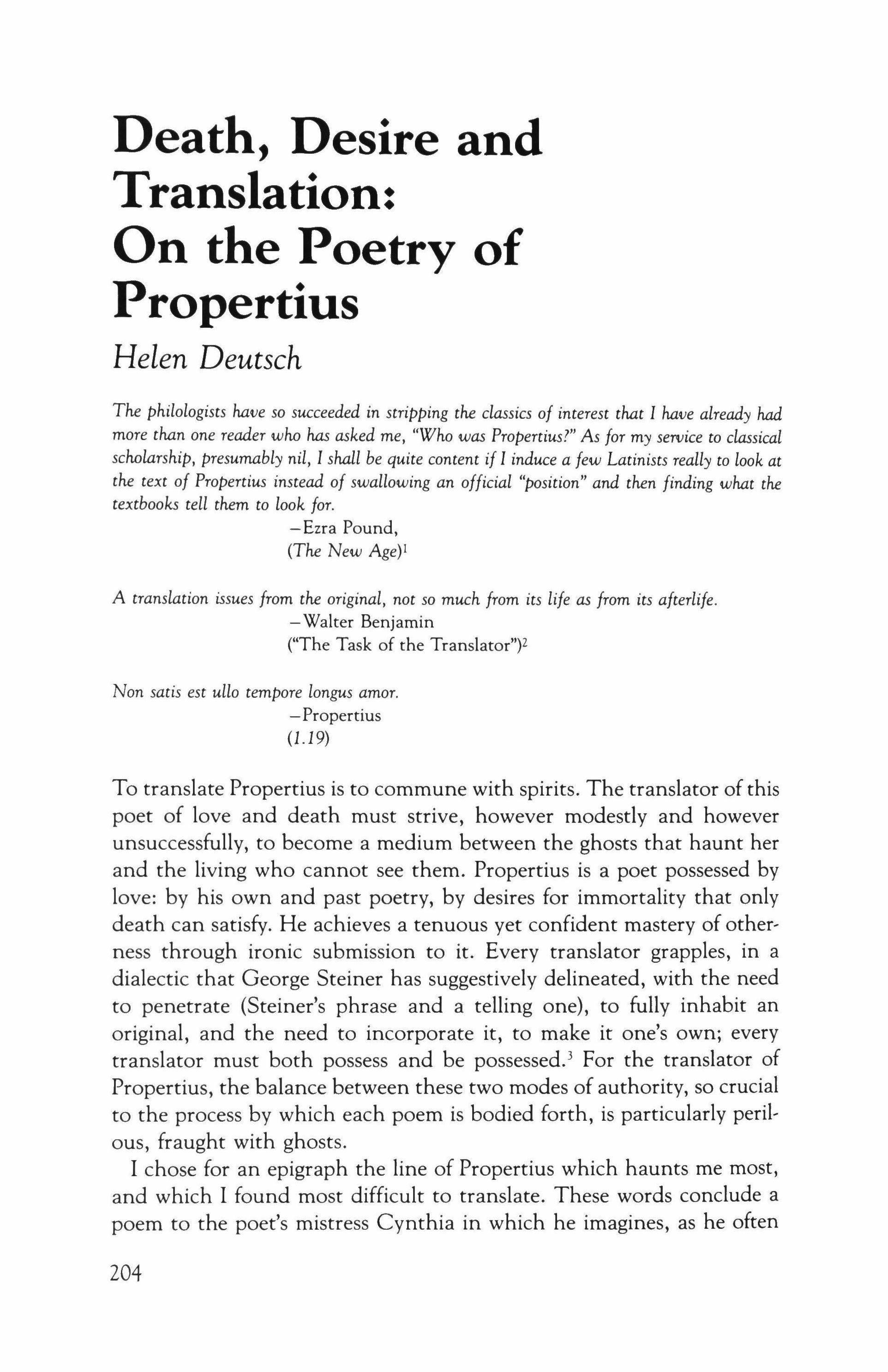
Death, Desire and Translation: On the Poetry of Propertius
Helen Deutsch
The philologists have so succeeded in stripping the classics of interest that I have alreaay htU1 more than one reader who has asked me, "Who was Propertiusi" As for my service to classical scholarship, presumably nil, I shall be quite content if I induce a few Latinists really to look at the text of Propettius instead of swallowing an official "position" and then finding what the textbooks tell them to look for.
- Ezra Pound, (The New Age)!
A translation issues from the original, not so much from its life as from its afterlife.
- Walter Benjamin ("The Task of the Translator")2
Non satis est ullo tempore longus amor.
- Propertius (1.19)
To translate Propertius is to commune with spirits. The translator of this poet of love and death must strive, however modestly and however unsuccessfully, to become a medium between the ghosts that haunt her and the living who cannot see them. Propertius is a poet possessed by love: by his own and past poetry, by desires for immortality that only death can satisfy. He achieves a tenuous yet confident mastery of otherness through ironic submission to it. Every translator grapples, in a dialectic that George Steiner has suggestively delineated, with the need to penetrate (Steiner's phrase and a telling one), to fully inhabit an original, and the need to incorporate it, to make it one's own; every translator must both possess and be possessed.' For the translator of Propertius, the balance between these two modes of authority, so crucial to the process by which each poem is bodied forth, is particularly perilous, fraught with ghosts.
I chose for an epigraph the line of Propertius which haunts me most, and which I found most difficult to translate. These words conclude a poem to the poet's mistress Cynthia in which he imagines, as he often
204
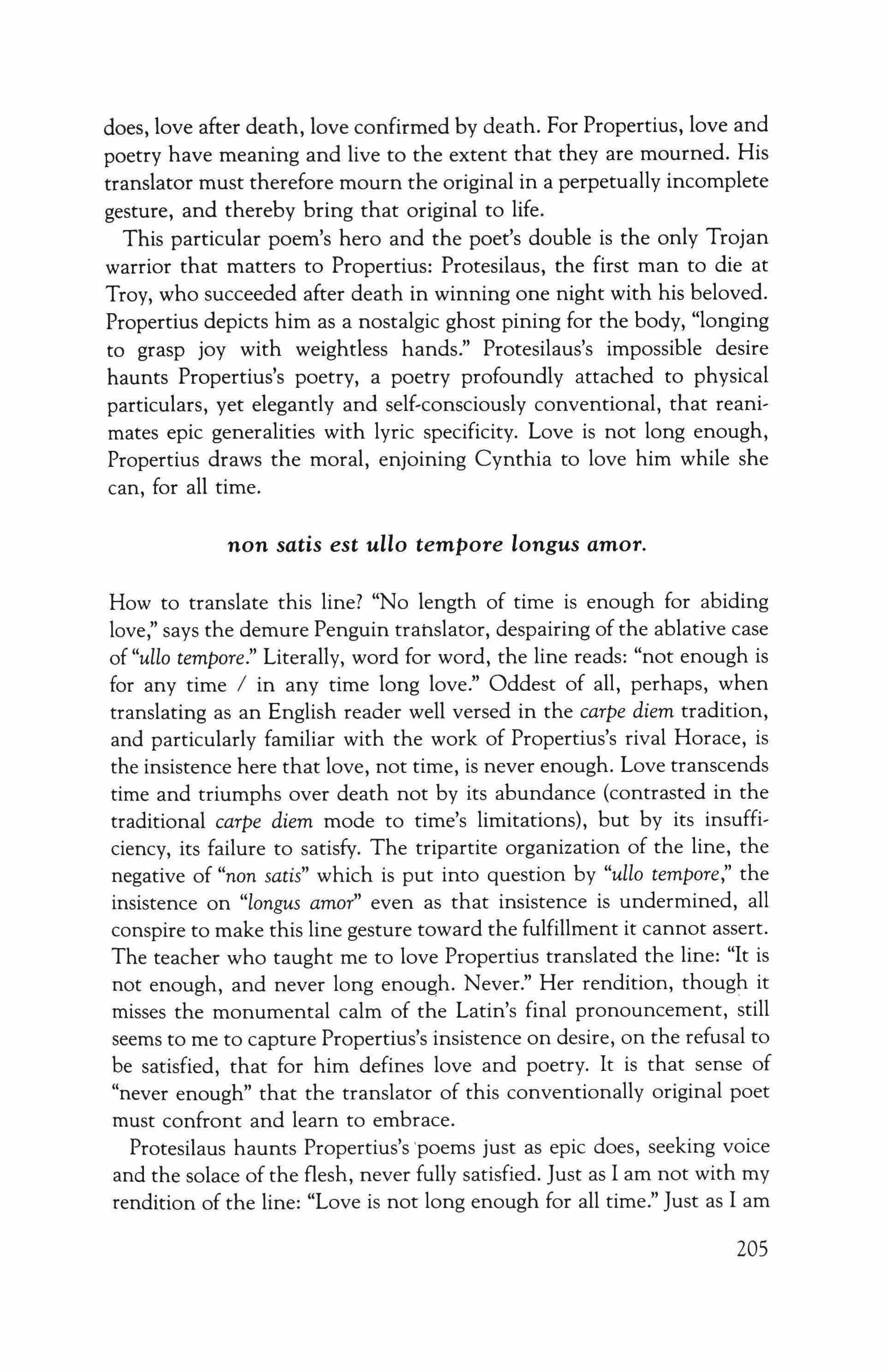
does, love after death, love confirmed by death. For Propertius, love and poetry have meaning and live to the extent that they are mourned. His translator must therefore mourn the original in a perpetually incomplete gesture, and thereby bring that original to life.
This particular poem's hero and the poet's double is the only Trojan warrior that matters to Propertius: Protesilaus, the first man to die at Troy, who succeeded after death in winning one night with his beloved. Propertius depicts him as a nostalgic ghost pining for the body, "longing to grasp joy with weightless hands." Protesilaus's impossible desire haunts Propertius's poetry, a poetry profoundly attached to physical particulars, yet elegantly and self-consciously conventional, that reanimates epic generalities with lyric specificity. Love is not long enough, Propertius draws the moral, enjoining Cynthia to love him while she can, for all time.
non satis est ullo tempore longus amor.
How to translate this line? "No length of time is enough for abiding love," says the demure Penguin trahslator, despairing of the ablative case of "ullo tempore." Literally, word for word, the line reads: "not enough is for any time I in any time long love." Oddest of all, perhaps, when translating as an English reader well versed in the carpe diem tradition, and particularly familiar with the work of Propertius's rival Horace, is the insistence here that love, not time, is never enough. Love transcends time and triumphs over death not by its abundance (contrasted in the traditional carpe diem mode to time's limitations), but by its insufficiency, its failure to satisfy. The tripartite organization of the line, the negative of "non satis" which is put into question by "ullo tempore," the insistence on "longus amor" even as that insistence is undermined, all conspire to make this line gesture toward the fulfillment it cannot assert. The teacher who taught me to love Propertius translated the line: "It is not enough, and never long enough. Never." Her rendition, though it misses the monumental calm of the Latin's final pronouncement, still seems to me to capture Propertius's insistence on desire, on the refusal to be satisfied, that for him defines love and poetry. It is that sense of "never enough" that the translator of this conventionally original poet must confront and learn to embrace.
Protesilaus haunts Propertius's 'poems just as epic does, seeking voice and the solace of the flesh, never fully satisfied. Just as I am not with my rendition of the line: "Love is not long enough for all time." Just as I am
205
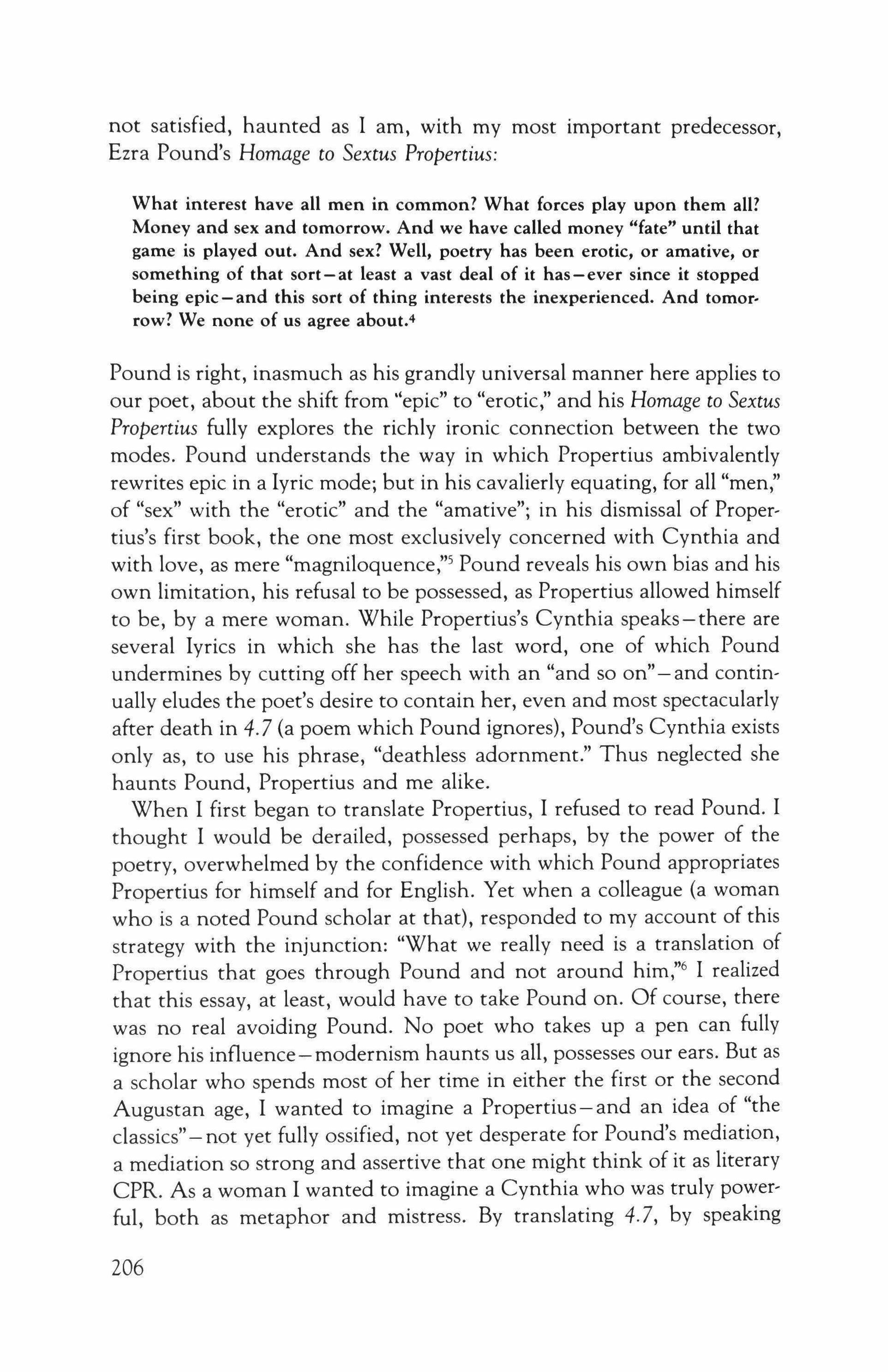
not satisfied, haunted as I am, with my most important predecessor, Ezra Pound's Homage to Sextus Propertius:
What interest have all men in common? What forces play upon them all? Money and sex and tomorrow. And we have called money "fate" until that game is played out. And sex? Well, poetry has been erotic, or amative, or something of that sort-at least a vast deal of it has-ever since it stopped being epic - and this sort of thing interests the inexperienced. And tomorrow? We none of us agree about.s
Pound is right, inasmuch as his grandly universal manner here applies to our poet, about the shift from "epic" to "erotic," and his Homage to Sextus Propertius fully explores the richly ironic connection between the two modes. Pound understands the way in which Propertius ambivalently rewrites epic in a lyric mode; but in his cavalierly equating, for all "men," of "sex" with the "erotic" and the "amative"; in his dismissal of Propertius's first book, the one most exclusively concerned with Cynthia and with love, as mere "magniloquence," Pound reveals his own bias and his own limitation, his refusal to be possessed, as Propertius allowed himself to be, by a mere woman. While Propertius's Cynthia speaks-there are several lyrics in which she has the last word, one of which Pound undermines by cutting off her speech with an "and so on" - and continually eludes the poet's desire to contain her, even and most spectacularly after death in 4.7 (a poem which Pound ignores), Pound's Cynthia exists only as, to use his phrase, "deathless adornment." Thus neglected she haunts Pound, Propertius and me alike.
When I first began to translate Propertius, I refused to read Pound. I thought I would be derailed, possessed perhaps, by the power of the poetry, overwhelmed by the confidence with which Pound appropriates Propertius for himself and for English. Yet when a colleague (a woman who is a noted Pound scholar at that), responded to my account of this strategy with the injunction: "What we really need is a translation of Propertius that goes through Pound and not around him," I realized that this essay, at least, would have to take Pound on. Of course, there was no real avoiding Pound. No poet who takes up a pen can fully ignore his influence-modernism haunts us all, possesses our ears. But as a scholar who spends most of her time in either the first or the second Augustan age, I wanted to imagine a Propertius - and an idea of "the classics" - not yet fully ossified, not yet desperate for Pound's mediation, a mediation so strong and assertive that one might think of it as literary CPR. As a woman I wanted to imagine a Cynthia who was truly powerful, both as metaphor and mistress. By translating 4.7, by speaking
206
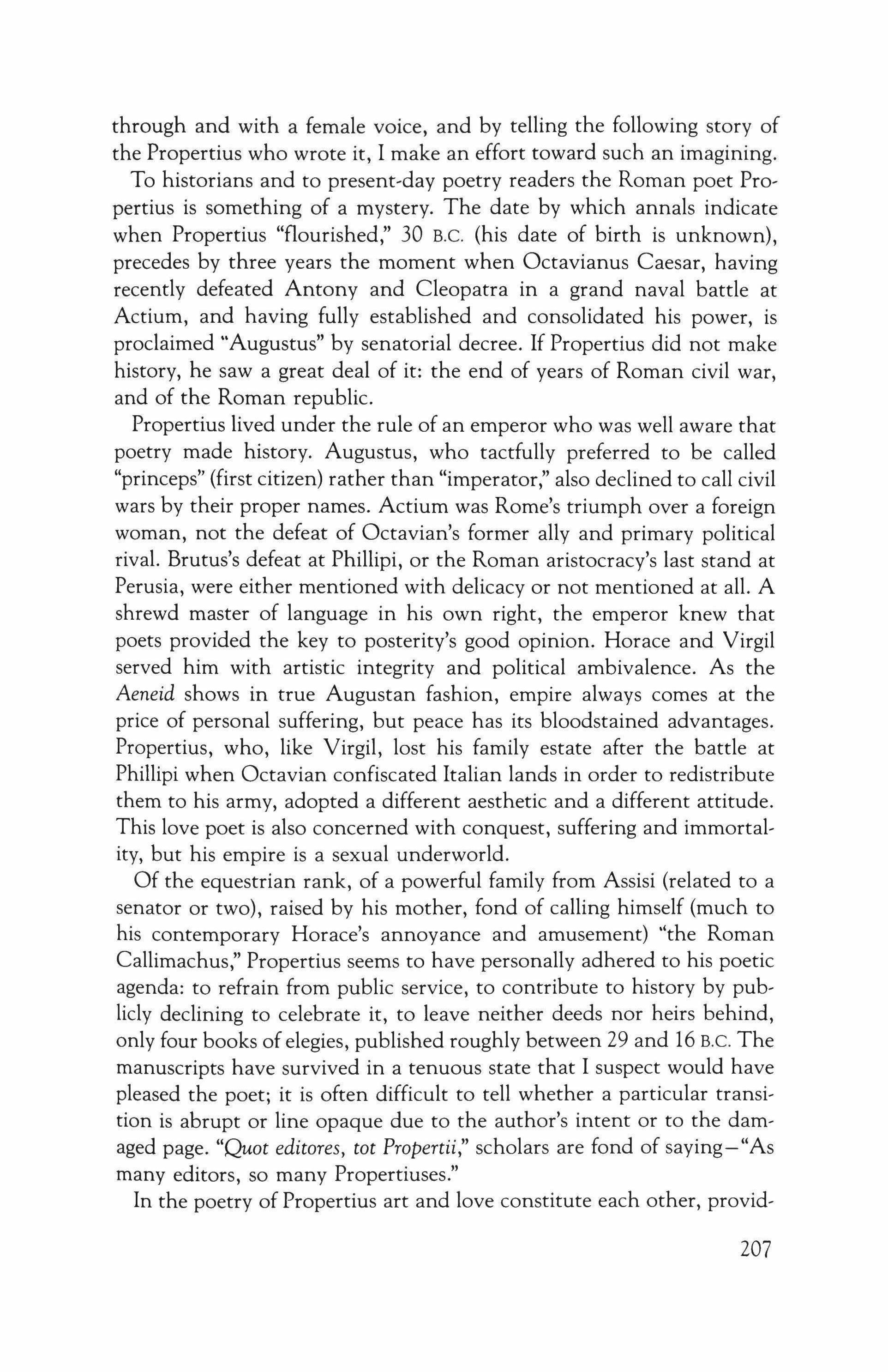
through and with a female voice, and by telling the following story of the Propertius who wrote it, I make an effort toward such an imagining.
To historians and to present-day poetry readers the Roman poet Propertius is something of a mystery. The date by which annals indicate when Propertius "flourished," 30 B.C. (his date of birth is unknown), precedes by three years the moment when Octavianus Caesar, having recently defeated Antony and Cleopatra in a grand naval battle at Actium, and having fully established and consolidated his power, is proclaimed "Augustus" by senatorial decree. If Propertius did not make history, he saw a great deal of it: the end of years of Roman civil war, and of the Roman republic.
Propertius lived under the rule of an emperor who was well aware that poetry made history. Augustus, who tactfully preferred to be called "princeps" (first citizen) rather than "imperator," also declined to call civil wars by their proper names. Actium was Rome's triumph over a foreign woman, not the defeat of Octavian's former ally and primary political rival. Brutus's defeat at Phillipi, or the Roman aristocracy's last stand at Perusia, were either mentioned with delicacy or not mentioned at all. A shrewd master of language in his own right, the emperor knew that poets provided the key to posterity's good opinion. Horace and Virgil served him with artistic integrity and political ambivalence. As the Aeneid shows in true Augustan fashion, empire always comes at the price of personal suffering, but peace has its bloodstained advantages. Propertius, who, like Virgil, lost his family estate after the battle at Phillipi when Octavian confiscated Italian lands in order to redistribute them to his army, adopted a different aesthetic and a different attitude. This love poet is also concerned with conquest, suffering and immortality, but his empire is a sexual underworld.
Of the equestrian rank, of a powerful family from Assisi (related to a senator or two), raised by his mother, fond of calling himself (much to his contemporary Horace's annoyance and amusement) "the Roman Callimachus," Propertius seems to have personally adhered to his poetic agenda: to refrain from public service, to contribute to history by publicly declining to celebrate it, to leave neither deeds nor heirs behind, only four books ofelegies, published roughly between 29 and 16 B.C. The manuscripts have survived in a tenuous state that I suspect would have pleased the poet; it is often difficult to tell whether a particular transition is abrupt or line opaque due to the author's intent or to the damaged page. "Quat editores, tot Propertii," scholars are fond of saying-"As many editors, so many Propertiuses."
In the poetry of Propertius art and love constitute each other, provid-
207
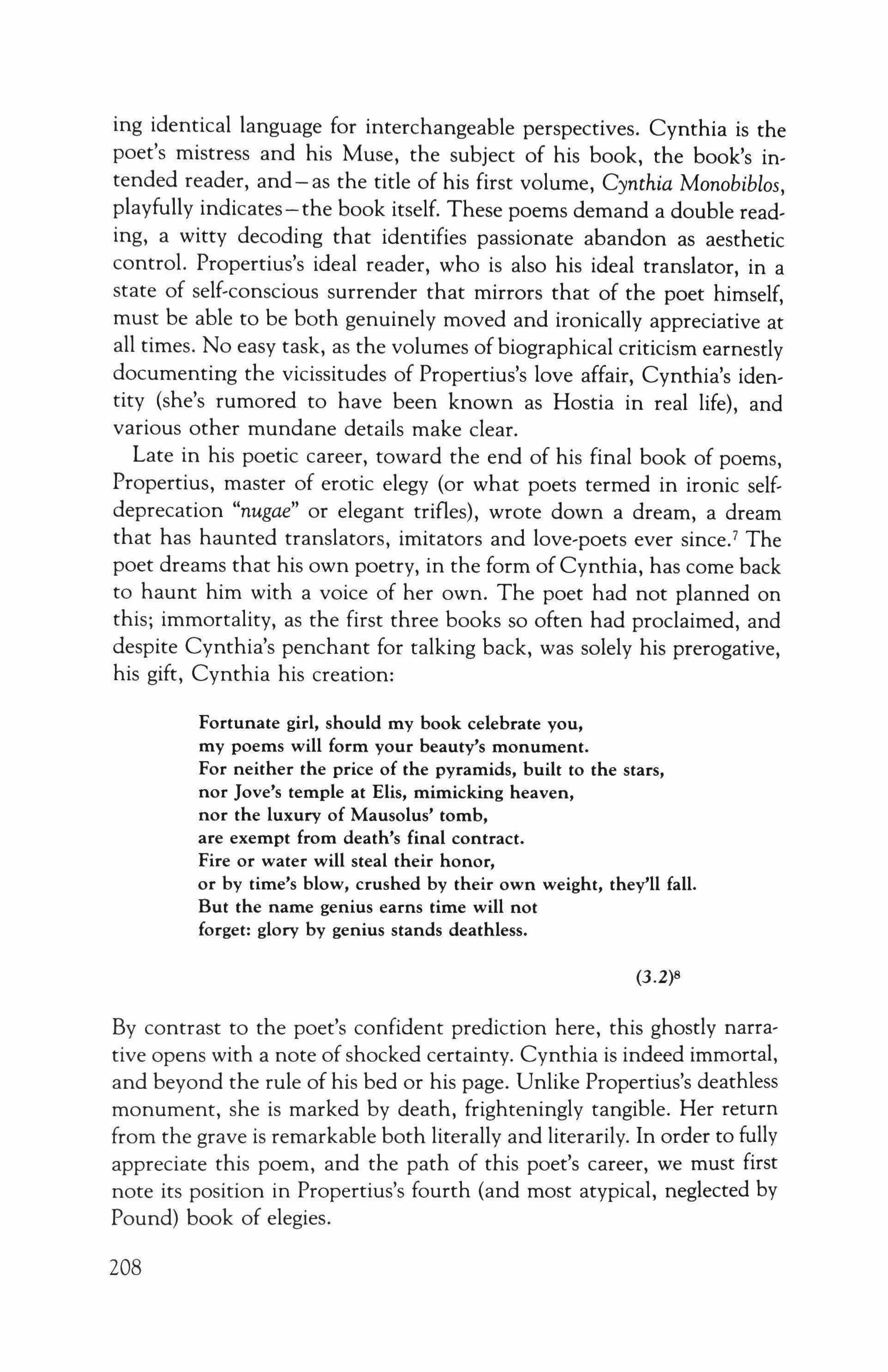
ing identical language for interchangeable perspectives. Cynthia is the poet's mistress and his Muse, the subject of his book, the book's intended reader, and - as the title of his first volume, Cynthia Monobiblos, playfully indicates-the book itself. These poems demand a double reading, a witty decoding that identifies passionate abandon as aesthetic control. Propertius's ideal reader, who is also his ideal translator, in a state of self-conscious surrender that mirrors that of the poet himself, must be able to be both genuinely moved and ironically appreciative at all times. No easy task, as the volumes of biographical criticism earnestly documenting the vicissitudes of Propertius's love affair, Cynthia's identity (she's rumored to have been known as Hostia in real life), and various other mundane details make clear.
Late in his poetic career, toward the end of his final book of poems, Propertius, master of erotic elegy (or what poets termed in ironic selfdeprecation "nugae" or elegant trifles), wrote down a dream, a dream that has haunted translators, imitators and love-poets ever since.' The poet dreams that his own poetry, in the form of Cynthia, has come back to haunt him with a voice of her own. The poet had not planned on this; immortality, as the first three books so often had proclaimed, and despite Cynthia's penchant for talking back, was solely his prerogative, his gift, Cynthia his creation:
Fortunate girl, should my book celebrate you, my poems will form your beauty's monument.
For neither the price of the pyramids, built to the stars, nor Jove's temple at Elis, mimicking heaven, nor the luxury of Mausolus' tomb, are exempt from death's final contract.
Fire or water will steal their honor, or by time's blow, crushed by their own weight, they'll fall. But the name genius earns time will not forget: glory by genius stands deathless.
(3.2)8
By contrast to the poet's confident prediction here, this ghostly narrative opens with a note of shocked certainty. Cynthia is indeed immortal, and beyond the rule of his bed or his page. Unlike Propertius's deathless monument, she is marked by death, frighteningly tangible. Her return from the grave is remarkable both literally and literarily. In order to fully appreciate this poem, and the path of this poet's career, we must first note its position in Propertius's fourth (and most atypical, neglected by Pound) book of elegies. 208
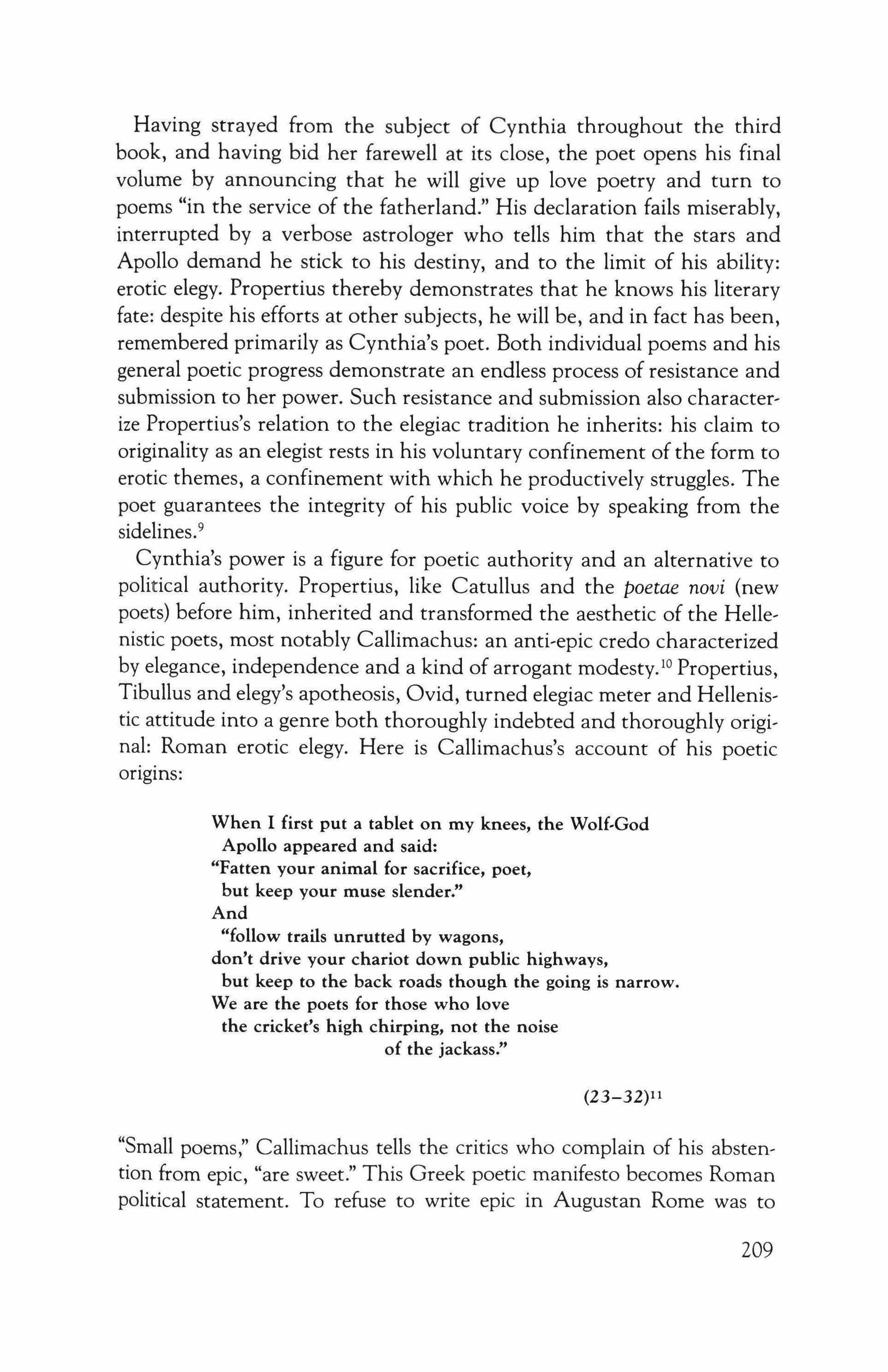
Having strayed from the subject of Cynthia throughout the third book, and having bid her farewell at its close, the poet opens his final volume by announcing that he will give up love poetry and turn to poems "in the service of the fatherland." His declaration fails miserably, interrupted by a verbose astrologer who tells him that the stars and Apollo demand he stick to his destiny, and to the limit of his ability: erotic elegy. Propertius thereby demonstrates that he knows his literary fate: despite his efforts at other subjects, he will be, and in fact has been, remembered primarily as Cynthia's poet. Both individual poems and his general poetic progress demonstrate an endless process of resistance and submission to her power. Such resistance and submission also characterize Propertius's relation to the elegiac tradition he inherits: his claim to originality as an elegist rests in his voluntary confinement of the form to erotic themes, a confinement with which he productively struggles. The poet guarantees the integrity of his public voice by speaking from the sidelines."
Cynthia's power is a figure for poetic authority and an alternative to political authority. Propertius, like Catullus and the poetae novi (new poets) before him, inherited and transformed the aesthetic of the Hellenistic poets, most notably Callimachus: an anti-epic credo characterized by elegance, independence and a kind of arrogant modesty. 10 Propertius, Tibullus and elegy's apotheosis, Ovid, turned elegiac meter and Hellenistic attitude into a genre both thoroughly indebted and thoroughly original: Roman erotic elegy. Here is Callimachus's account of his poetic origins:
When I first put a tablet on my knees, the Wolf-God Apollo appeared and said: "Fatten your animal for sacrifice, poet, but keep your muse slender."
And "follow trails unrutted by wagons, don't drive your chariot down public highways, but keep to the back roads though the going is narrow. We are the poets for those who love the cricket's high chirping, not the noise of the jackass."
(23-32)11
"Small poems," Callimachus tells the critics who complain of his abstention from epic, "are sweet." This Greek poetic manifesto becomes Roman political statement. To refuse to write epic in Augustan Rome was to
209
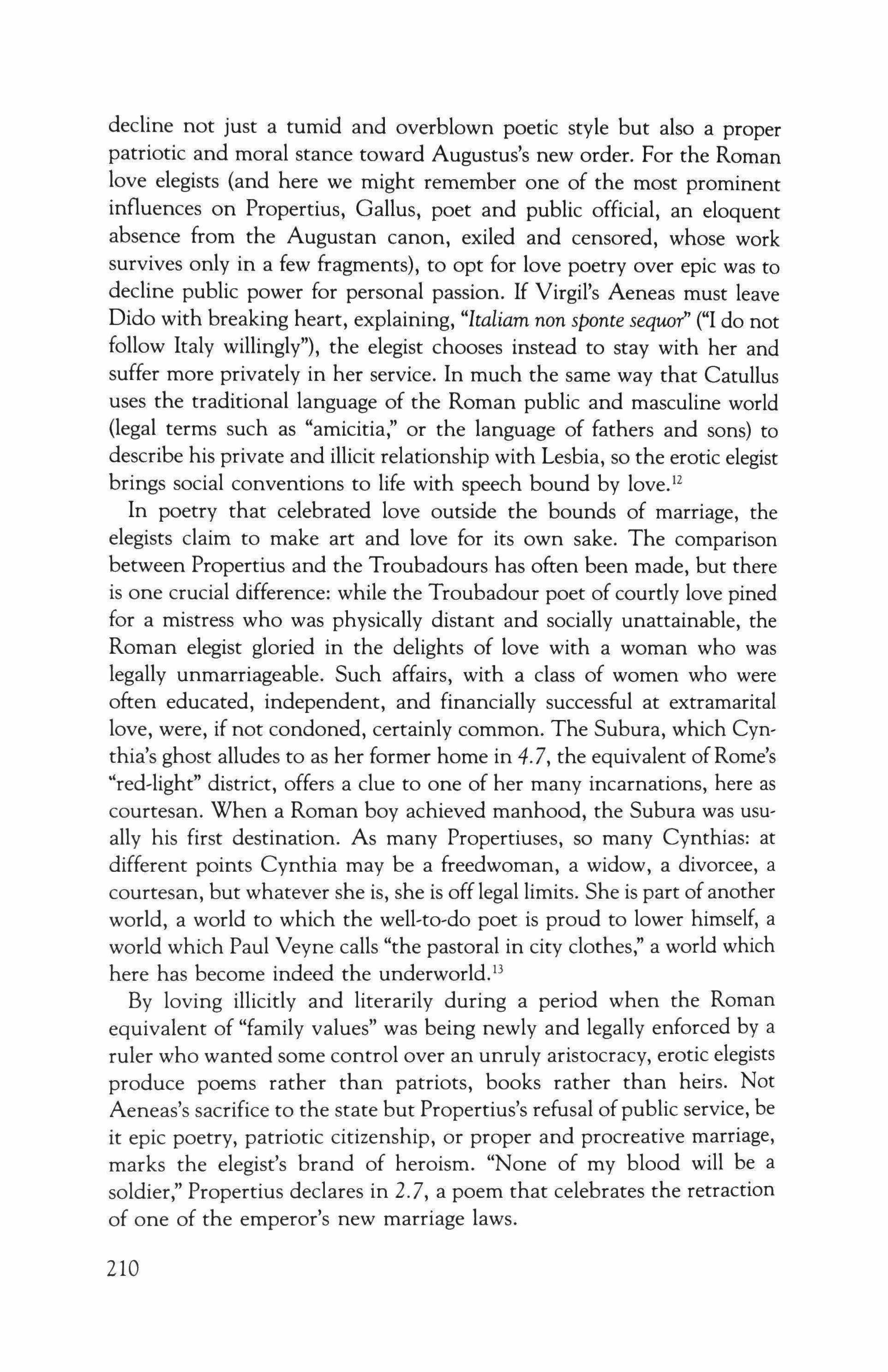
decline not just a tumid and overblown poetic style but also a proper patriotic and moral stance toward Augustus's new order. For the Roman love elegists (and here we might remember one of the most prominent influences on Propertius, Gallus, poet and public official, an eloquent absence from the Augustan canon, exiled and censored, whose work survives only in a few fragments), to opt for love poetry over epic was to decline public power for personal passion. If Virgil's Aeneas must leave Dido with breaking heart, explaining, "Italiam non sponte sequot" ("I do not follow Italy willingly"), the elegist chooses instead to stay with her and suffer more privately in her service. In much the same way that Catullus uses the traditional language of the Roman public and masculine world (legal terms such as "amicitia," or the language of fathers and sons) to describe his private and illicit relationship with Lesbia, so the erotic elegist brings social conventions to life with speech bound by love."
In poetry that celebrated love outside the bounds of marriage, the elegists claim to make art and love for its own sake. The comparison between Propertius and the Troubadours has often been made, but there is one crucial difference: while the Troubadour poet of courtly love pined for a mistress who was physically distant and socially unattainable, the Roman elegist gloried in the delights of love with a woman who was legally unmarriageable. Such affairs, with a class of women who were often educated, independent, and financially successful at extramarital love, were, if not condoned, certainly common. The Subura, which Cynthia's ghost alludes to as her former home in 4.7, the equivalent of Rome's "red-light" district, offers a clue to one of her many incarnations, here as courtesan. When a Roman boy achieved manhood, the Subura was usually his first destination. As many Propertiuses, so many Cynthias: at different points Cynthia may be a freedwoman, a widow, a divorcee, a courtesan, but whatever she is, she is off legal limits. She is part of another world, a world to which the well-to-do poet is proud to lower himself, a world which Paul Veyne calls "the pastoral in city clothes," a world which here has become indeed the underworld. 13
By loving illicitly and literarily during a period when the Roman equivalent of "family values" was being newly and legally enforced by a ruler who wanted some control over an unruly aristocracy, erotic elegists produce poems rather than patriots, books rather than heirs. Not Aeneas's sacrifice to the state but Propertius's refusal ofpublic service, be it epic poetry, patriotic citizenship, or proper and procreative marriage, marks the elegist's brand of heroism. "None of my blood will be a soldier," Propertius declares in 2.7, a poem that celebrates the retraction of one of the emperor's new marriage laws. 210

Propertius begins each of his four books with an assertion of poetic authority that marks out an adversarial stance (in the guise of powerlessness) toward political authority. Book One opens with a plaint, paradoxically proud, of total enslavement to Love and to Cynthia.
Cynthia's eyes first captured poor me, who before was immune to desire. Then Love subdued my arrogant gaze, his adamant feet bowed my head, until he taught me to spurn chaste women, (perverse Love!) and to live foolishly. A year now, and this madness won't leave me. Despite myself I cross the gods.
If in the Monobiblos love has overpowered the poet, in the opening to Book Two love empowers him. In a classic tecusatio - a polite and ironic refusal to write epic on the grounds of lack of fitness for the task (an inability that is subsequently and subversively either tactlessly demonstrated or tacitly contradicted), a gesture in which Roman poets excelled-Propertius assures his would-be patron Maecenas (benefactor of Horace and Virgil) that if he were to write epic he would celebrate him (most grandiosely and most offensively at that as he goes on to demonstrate), but he prefers instead to celebrate Cynthia, whose lovemaking inspires "long Iliads." The only wars this poet will wage, he goes on to declare, are on a "narrow bed." The adjective is odd and striking, a moment when the aesthetic and the amatory fully merge: the bed is "narrow" because aesthetic concerns are never forgotten, even at the moments of greatest passion, "narrow" because Callimachus's heir travels on less trodden paths and always avoids excess, epic too weighty for his "narrow chest.?"
The third book opens with the most aggressive assertion yet: the poet takes on Homer himself.
Who would have known - the towers pummelled by a wooden horse, that rivers fought hand to hand with Achilles, ldaean Simois, Scamander the offspring of Jove, that wheels befouled Hector three times through the fields? Deiphobus, and Helenus and Polvdamas, and whatever he was in arms, Paris, hardly even his homeland would have known. Ilion, you would be small talk now, and you Troy, twice captured by Hercules' force. Even Homer, that rememberer of your fall, felt his work grow with posterity. And me, in generations to come, Rome will praise;
211
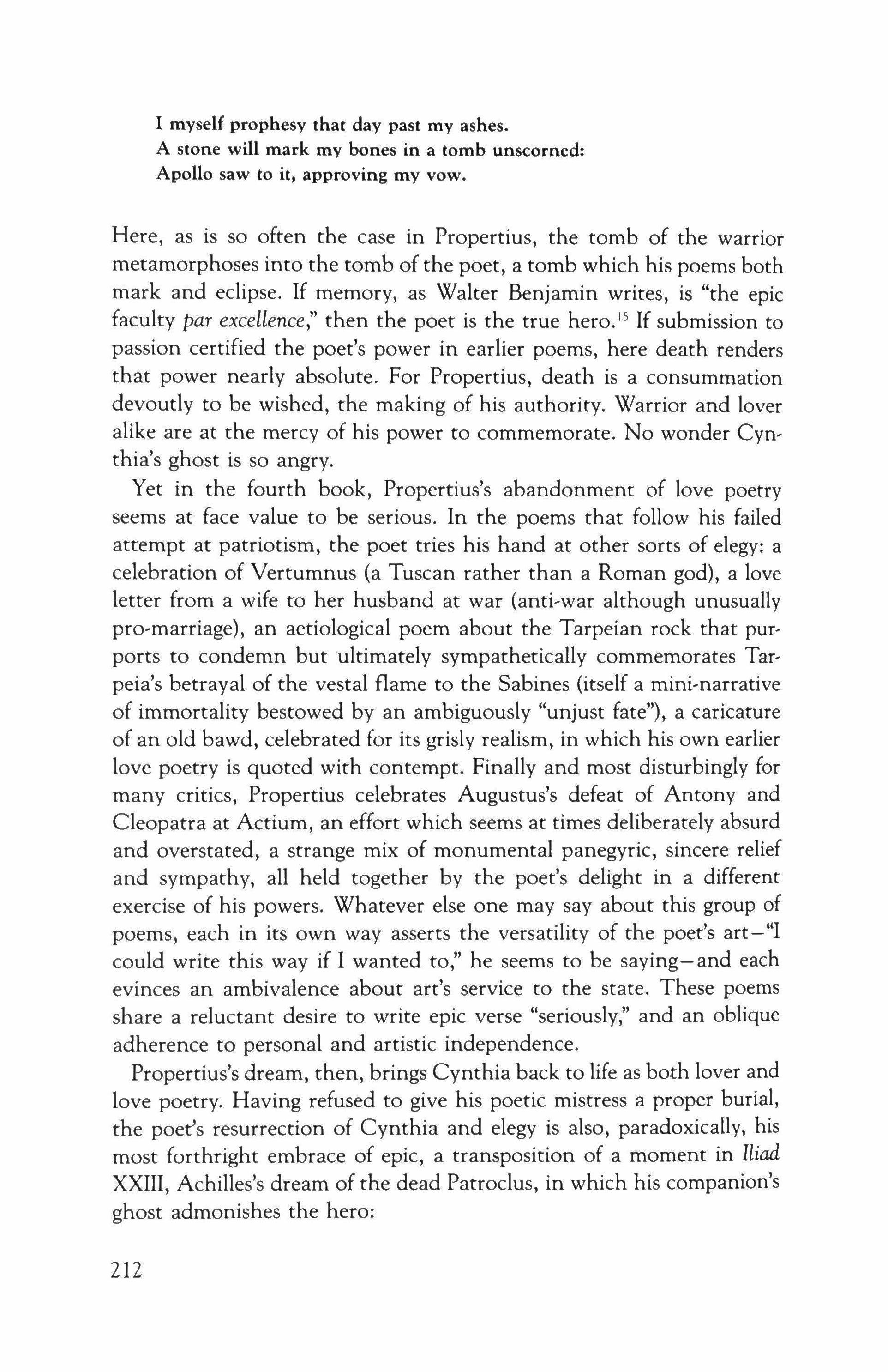
I myself prophesy that day past my ashes. A stone will mark my bones in a tomb unscorned: Apollo saw to it, approving my vow.
Here, as is so often the case in Propertius, the tomb of the warrior metamorphoses into the tomb of the poet, a tomb which his poems both mark and eclipse. If memory, as Walter Benjamin writes, is "the epic faculty par excellence," then the poet is the true hero. IS If submission to passion certified the poet's power in earlier poems, here death renders that power nearly absolute. For Propertius, death is a consummation devoutly to be wished, the making of his authority. Warrior and lover alike are at the mercy of his power to commemorate. No wonder Cynthia's ghost is so angry.
Yet in the fourth book, Propertius's abandonment of love poetry seems at face value to be serious. In the poems that follow his failed attempt at patriotism, the poet tries his hand at other sorts of elegy: a celebration of Vertumnus (a Tuscan rather than a Roman god), a love letter from a wife to her husband at war (anti-war although unusually pro-marriage), an aetiological poem about the Tarpeian rock that purports to condemn but ultimately sympathetically commemorates Tarpeia's betrayal of the vestal flame to the Sabines (itself a mini-narrative of immortality bestowed by an ambiguously "unjust fate"), a caricature of an old bawd, celebrated for its grisly realism, in which his own earlier love poetry is quoted with contempt. Finally and most disturbingly for many critics, Propertius celebrates Augustus's defeat of Antony and Cleopatra at Actium, an effort which seems at times deliberately absurd and overstated, a strange mix of monumental panegyric, sincere relief and sympathy, all held together by the poet's delight in a different exercise of his powers. Whatever else one may say about this group of poems, each in its own way asserts the versatility of the poet's art - "I could write this way if I wanted to," he seems to be saying-and each evinces an ambivalence about art's service to the state. These poems share a reluctant desire to write epic verse "seriously," and an oblique adherence to personal and artistic independence.
Propertius's dream, then, brings Cynthia back to life as both lover and love poetry. Having refused to give his poetic mistress a proper burial, the poet's resurrection of Cynthia and elegy is also, paradoxically, his most forthright embrace of epic, a transposition of a moment in Iliad XXIII, Achilles's dream of the dead Patroclus, in which his companion's ghost admonishes the hero:
212
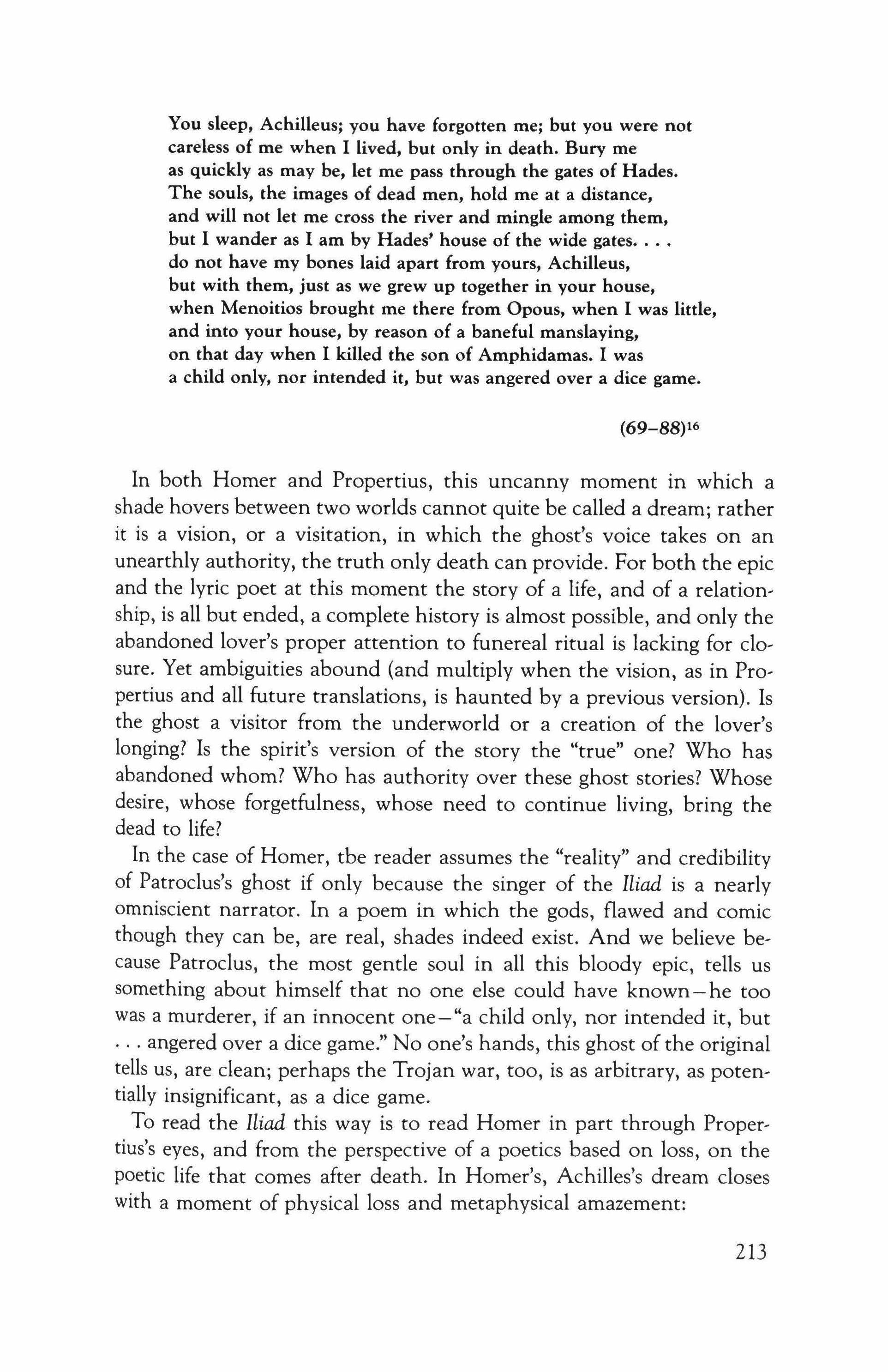
You sleep, Achilleus; you have forgotten me; but you were not careless of me when I lived, but only in death. Bury me as quickly as may be, let me pass through the gates of Hades. The souls, the images of dead men, hold me at a distance, and will not let me cross the river and mingle among them, but I wander as I am by Hades' house of the wide gates do not have my bones laid apart from yours, Achilleus, but with them, just as we grew up together in your house, when Menoitios brought me there from Opous, when I was little, and into your house, by reason of a baneful manslaying, on that day when I killed the son of Amphidamas. I was a child only, nor intended it, but was angered over a dice game.
(69-88)16
In both Homer and Propertius, this uncanny moment in which a shade hovers between two worlds cannot quite be called a dream; rather it is a vision, or a visitation, in which the ghost's voice takes on an unearthly authority, the truth only death can provide. For both the epic and the lyric poet at this moment the story of a life, and of a relationship, is all but ended, a complete history is almost possible, and only the abandoned lover's proper attention to funereal ritual is lacking for closure. Yet ambiguities abound (and multiply when the vision, as in Propertius and all future translations, is haunted by a previous version). Is the ghost a visitor from the underworld or a creation of the lover's longing? Is the spirit's version of the story the "true" one? Who has abandoned whom? Who has authority over these ghost stories? Whose desire, whose forgetfulness, whose need to continue living, bring the dead to life?
In the case of Homer, tbe reader assumes the "reality" and credibility of Patroclus's ghost if only because the singer of the Iliad is a nearly omniscient narrator. In a poem in which the gods, flawed and comic though they can be, are real, shades indeed exist. And we believe because Patroclus, the most gentle soul in all this bloody epic, tells us something about himself that no one else could have known - he too was a murderer, if an innocent one - "a child only, nor intended it, but angered over a dice game." No one's hands, this ghost of the original tells us, are clean; perhaps the Trojan war, too, is as arbitrary, as potentially insignificant, as a dice game.
To read the Iliad this way is to read Homer in part through Propertius's eyes, and from the perspective of a poetics based on loss, on the poetic life that comes after death. In Homer's, Achilles's dream closes with a moment of physical loss and metaphysical amazement:
213
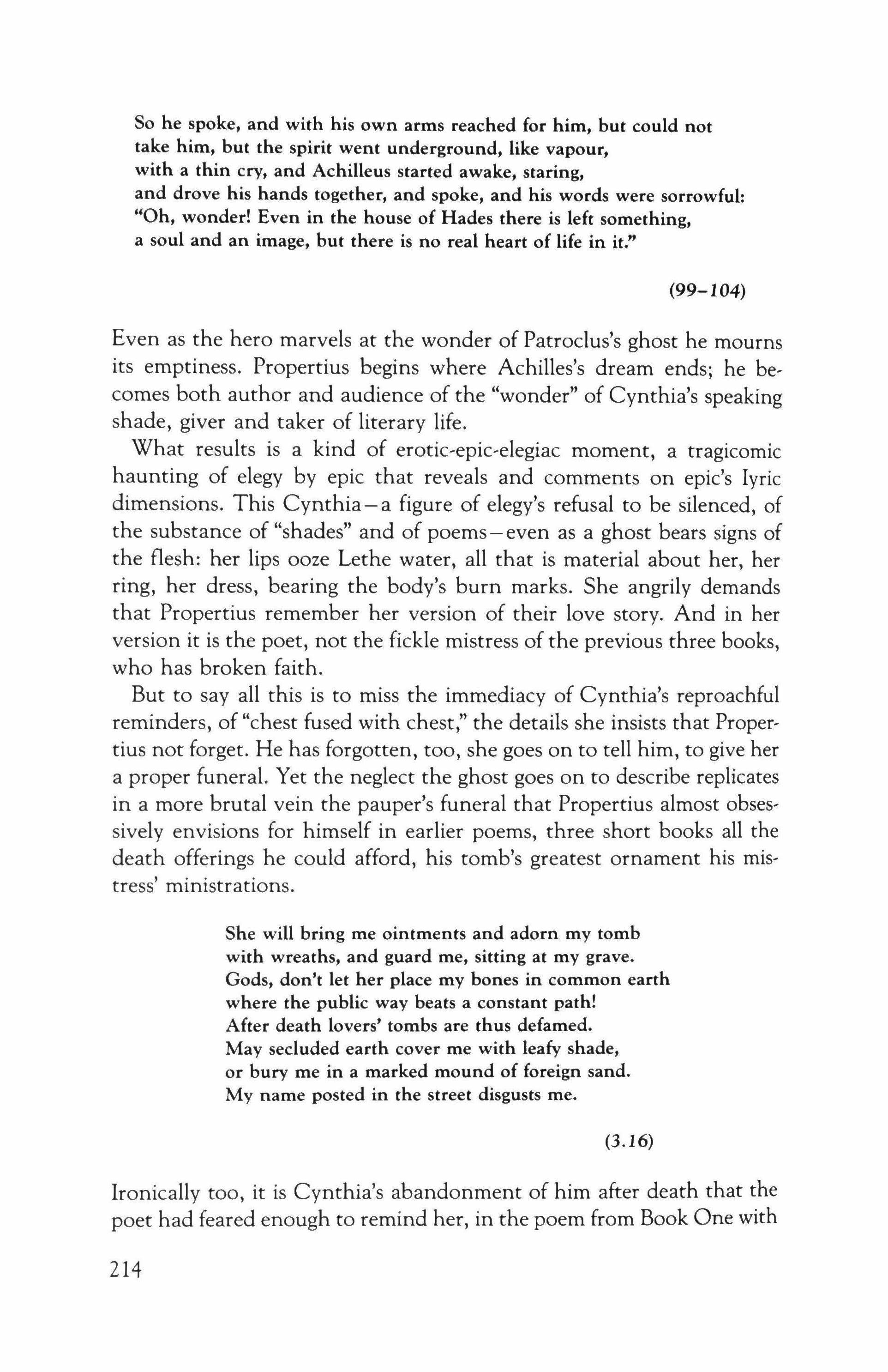
So he spoke, and with his own arms reached for him, but could not take him, but the spirit went underground, like vapour, with a thin cry, and Achilleus started awake, staring, and drove his hands together, and spoke, and his words were sorrowful: "Oh, wonder! Even in the house of Hades there is left something, a soul and an image, but there is no real heart of life in it."
(99-104)
Even as the hero marvels at the wonder of Patroclus's ghost he mourns its emptiness. Propertius begins where Achilles's dream ends; he becomes both author and audience of the "wonder" of Cynthia's speaking shade, giver and taker of literary life.
What results is a kind of erotic-epic-elegiac moment, a tragicomic haunting of elegy by epic that reveals and comments on epic's lyric dimensions. This Cynthia-a figure of elegy's refusal to be silenced, of the substance of "shades" and of poems-even as a ghost bears signs of the flesh: her lips ooze Lethe water, all that is material about her, her ring, her dress, bearing the body's burn marks. She angrily demands that Propertius remember her version of their love story. And in her version it is the poet, not the fickle mistress of the previous three books, who has broken faith.
But to say all this is to miss the immediacy of Cynthia's reproachful reminders, of "chest fused with chest," the details she insists that Propertius not forget. He has forgotten, too, she goes on to tell him, to give her a proper funeral. Yet the neglect the ghost goes on to describe replicates in a more brutal vein the pauper's funeral that Propertius almost obsessively envisions for himself in earlier poems, three short books all the death offerings he could afford, his tomb's greatest ornament his mistress' ministrations.
She will bring me ointments and adorn my tomb with wreaths, and guard me, sitting at my grave. Gods, don't let her place my bones in common earth where the public way beats a constant path! After death lovers' tombs are thus defamed. May secluded earth cover me with leafy shade, or bury me in a marked mound of foreign sand. My name posted in the street disgusts me.
(3.16)
Ironically too, it is Cynthia's abandonment of him after death that the poet had feared enough to remind her, in the poem from Book One with
214
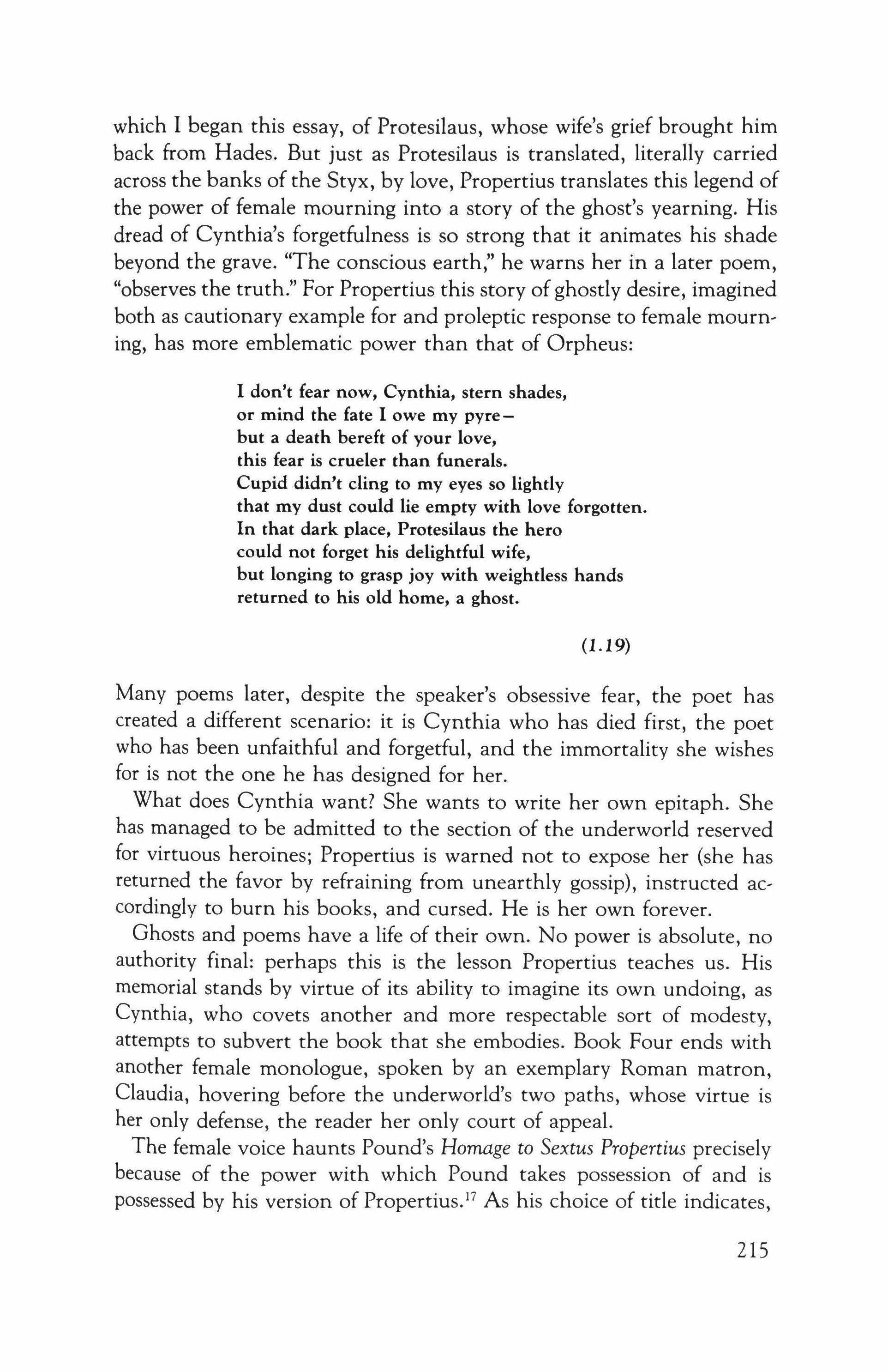
which I began this essay, of Protesilaus, whose wife's grief brought him back from Hades. But just as Protesilaus is translated, literally carried across the banks of the Styx, by love, Propertius translates this legend of the power of female mourning into a story of the ghost's yearning. His dread of Cynthia's forgetfulness is so strong that it animates his shade beyond the grave. "The conscious earth," he warns her in a later poem, "observes the truth." For Propertius this story of ghostly desire, imagined both as cautionary example for and proleptic response to female mourning, has more emblematic power than that of Orpheus:
I don't fear now, Cynthia, stern shades, or mind the fate I owe my pyrebut a death bereft of your love, this fear is crueler than funerals. Cupid didn't cling to my eyes so lightly that my dust could lie empty with love forgotten. In that dark place, Protesilaus the hero could not forget his delightful wife, but longing to grasp joy with weightless hands returned to his old home, a ghost.
(1.19)
Many poems later, despite the speaker's obsessive fear, the poet has created a different scenario: it is Cynthia who has died first, the poet who has been unfaithful and forgetful, and the immortality she wishes for is not the one he has designed for her.
What does Cynthia want? She wants to write her own epitaph. She has managed to be admitted to the section of the underworld reserved for virtuous heroines; Propertius is warned not to expose her (she has returned the favor by refraining from unearthly gossip), instructed accordingly to burn his books, and cursed. He is her own forever.
Ghosts and poems have a life of their own. No power is absolute, no authority final: perhaps this is the lesson Propertius teaches us. His memorial stands by virtue of its ability to imagine its own undoing, as Cynthia, who covets another and more respectable sort of modesty, attempts to subvert the book that she embodies. Book Four ends with another female monologue, spoken by an exemplary Roman matron, Claudia, hovering before the underworld's two paths, whose virtue is her only defense, the reader her only court of appeal.
The female voice haunts Pound's Homage to Sextus Propertius precisely because of the power with which Pound takes possession of and is possessed by his version of Propertius." As his choice of title indicates,
215
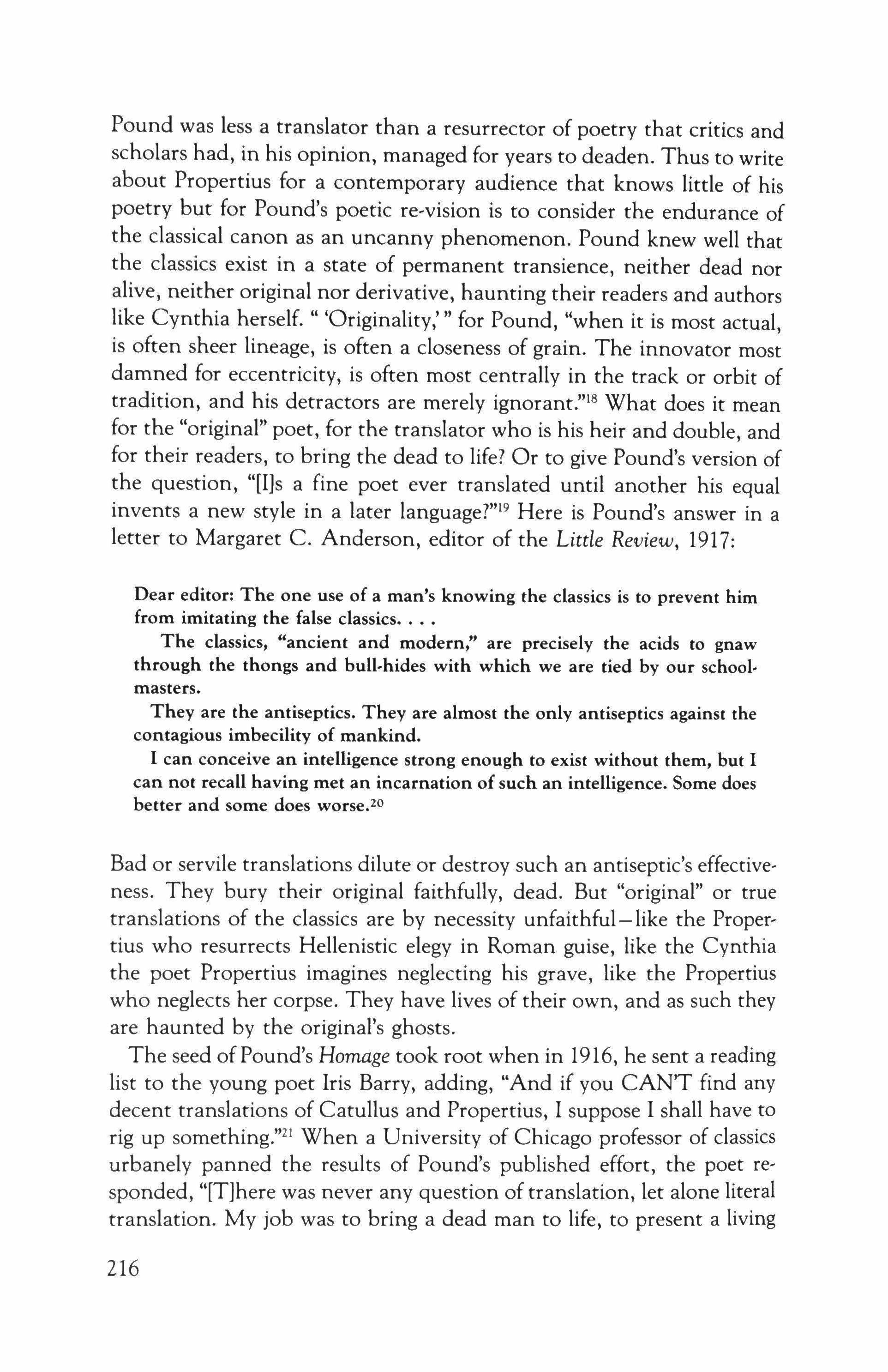
Pound was less a translator than a resurrector of poetry that critics and scholars had, in his opinion, managed for years to deaden. Thus to write about Propertius for a contemporary audience that knows little of his poetry but for Pound's poetic re-vision is to consider the endurance of the classical canon as an uncanny phenomenon. Pound knew well that the classics exist in a state of permanent transience, neither dead nor alive, neither original nor derivative, haunting their readers and authors like Cynthia herself. 'Originality,' " for Pound, "when it is most actual, is often sheer lineage, is often a closeness of grain. The innovator most damned for eccentricity, is often most centrally in the track or orbit of tradition, and his detractors are merely ignorant.?" What does it mean for the "original" poet, for the translator who is his heir and double, and for their readers, to bring the dead to life? Or to give Pound's version of the question, "[I]s a fine poet ever translated until another his equal invents a new style in a later languagei'"? Here is Pound's answer in a letter to Margaret C. Anderson, editor of the Little Review, 1917:
Dear editor: The one use of a man's knowing the classics is to prevent him from imitating the false classics
The classics, "ancient and modern," are precisely the acids to gnaw through the thongs and bull-hides with which we are tied by our schoolmasters.
They are the antiseptics. They are almost the only antiseptics against the contagious imbecility of mankind.
I can conceive an intelligence strong enough to exist without them, but I can not recall having met an incarnation of such an intelligence. Some does better and some does worse.t?
Bad or servile translations dilute or destroy such an antiseptic's effectiveness. They bury their original faithfully, dead. But "original" or true translations of the classics are by necessity unfaithful-like the Propertius who resurrects Hellenistic elegy in Roman guise, like the Cynthia the poet Propertius imagines neglecting his grave, like the Propertius who neglects her corpse. They have lives of their own, and as such they are haunted by the original's ghosts.
The seed of Pound's Homage took root when in 1916, he sent a reading list to the young poet Iris Barry, adding, "And if you CAN'T find any decent translations of Catullus and Propertius, I suppose I shall have to rig up something.'?' When a University of Chicago professor of classics urbanely panned the results of Pound's published effort, the poet responded, "[T]here was never any question of translation, let alone literal translation. My job was to bring a dead man to life, to present a living
216

figure."22 Yet Pound also denied any claim to his poem's "originality." How could he be original, "when I can so snugly fit into the words of Propertius almost thirty pages with nothing that isn't S.P., or with no distortion of his phrases that isn't justifiable by some other phrase of his elsewherel''" In this sense Pound's English is like Propertius's Latin, an original paradoxically both thoroughly indebted to an earlier language and without precedent. In his extended dialogue with the academic and critical powers that be, Pound makes clear what he sees in the Propertius he has revived: a hatred of pedantry and philology, of "the mask of erudition," of political rhetoric and "imperial hog-wash,'?' Pound's Propertius has become, in effect, himself. As he writes in 1931 to another editor in refutation of his original editor's response to the Homage:
As Miss Monroe has never yet discovered what the aforementioned poem is, I may perhaps avoid charges of further mystification and wilful obscurity by saying that it presents certain emotions as vital to me in 1917, faced with the infinite and ineffable imbecility of the British Empire, as they were to Propertius some centuries earlier, when faced with the infinite and ineffable imbecility of the Roman Empire. These emotions are defined largely, but not entirely, in Propertius' own terms. If the reader does not find relation to life defined in the poem, he may conclude that I have been unsuccessful in my endeavour. I certainly omitted no means of definition that I saw open to me, including shortenings, cross cuts, implications derivable from other writings of Propertius, as for example the "Ride to Lanuvium" [4.8] from which I have taken a color or tone but no direct or entire expression.25
With this reference to 4.8, the poem that follows Propertius's dream of Cynthia's ghost, Pound reveals the direction in which his own version of Propertius slants. If 4.7 was Propertius's Iliad, 4.8 is his OdvsseYi a highly comic and realistic poem in which Cynthia, as if she had never died, leaves Propertius for an illicit rendezvous, returns to find him engaged in unsuccessful philanderings of his own, purges the house of rivals like Odysseus driving out Penelope's suitors, beats up her straying lover, and finally calls an amorous truce. Propertius's affectionate and salacious irony in this piece is late and therefore well-earned, a rueful and playful farewell to a Cynthia who exists as process, not as product. In his putting an end to the story of Propertius and Cynthia, choosing one tone to characterize a Propertius who is more concerned with "tying blue ribbon in the tails of Virgil and Horace" than in the intricacies of mourning and of the female voice, Pound's irony occasionally misses Propertius's seriousness, Cynthia's wayward variability and independence.
I confess, however, that after having translated the second poem of 217
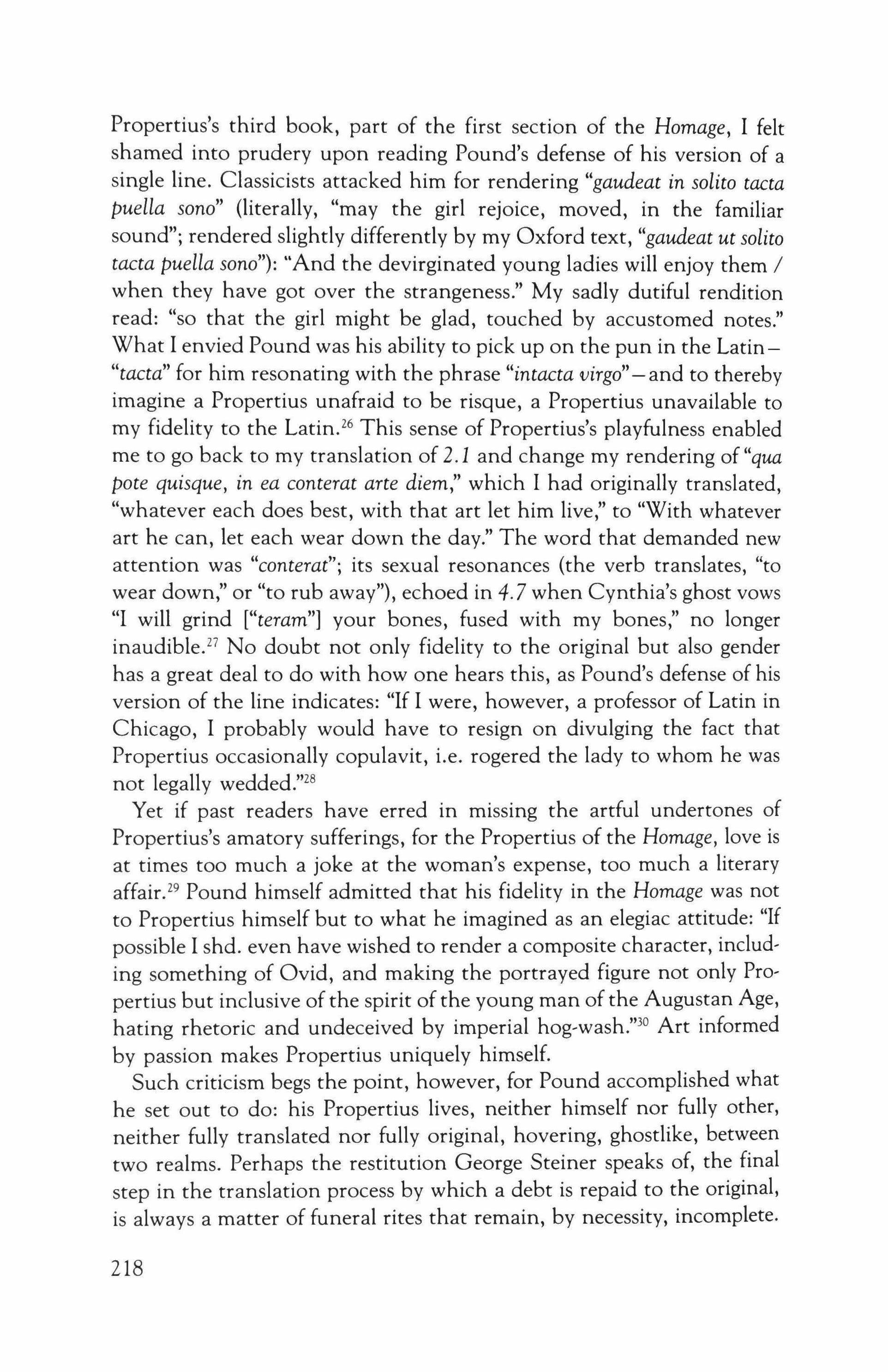
Propertius's third book, part of the first section of the Homage, I felt shamed into prudery upon reading Pound's defense of his version of a single line. Classicists attacked him for rendering "gaudeat in solito tacta puella sana" (literally, "may the girl rejoice, moved, in the familiar sound"; rendered slightly differently by my Oxford text, "gaudeat ut solita tacta puella sana"): "And the devirginated young ladies will enjoy them / when they have got over the strangeness." My sadly dutiful rendition read: "so that the girl might be glad, touched by accustomed notes." What I envied Pound was his ability to pick up on the pun in the Latin"tacta" for him resonating with the phrase "intacta virgo" - and to thereby imagine a Propertius unafraid to be risque, a Propertius unavailable to my fidelity to the Latin." This sense of Propertius's playfulness enabled me to go back to my translation of 2.1 and change my rendering of "qua pate quisque, in ea canterat arte diem," which I had originally translated, "whatever each does best, with that art let him live," to "With whatever art he can, let each wear down the day." The word that demanded new attention was "canterat"; its sexual resonances (the verb translates, "to wear down," or "to rub away"), echoed in 4.7 when Cynthia's ghost vows "I will grind ["teram"] your bones, fused with my bones," no longer inaudible." No doubt not only fidelity to the original but also gender has a great deal to do with how one hears this, as Pound's defense of his version of the line indicates: "If I were, however, a professor of Latin in Chicago, I probably would have to resign on divulging the fact that Propertius occasionally copulavit, i.e. rogered the lady to whom he was not legally wedded."28
Yet if past readers have erred in missing the artful undertones of Propertius's amatory sufferings, for the Propertius of the Homage, love is at times too much a joke at the woman's expense, too much a literary affair." Pound himself admitted that his fidelity in the Homage was not to Propertius himself but to what he imagined as an elegiac attitude: "If possible I shd. even have wished to render a composite character, including something of Ovid, and making the portrayed figure not only Propertius but inclusive of the spirit of the young man of the Augustan Age, hating rhetoric and undeceived by imperial hog-wash,"?" Art informed by passion makes Propertius uniquely himself.
Such criticism begs the point, however, for Pound accomplished what he set out to do: his Propertius lives, neither himself nor fully other, neither fully translated nor fully original, hovering, ghostlike, between two realms. Perhaps the restitution George Steiner speaks of, the final step in the translation process by which a debt is repaid to the original, is always a matter of funeral rites that remain, by necessity, incomplete.
218
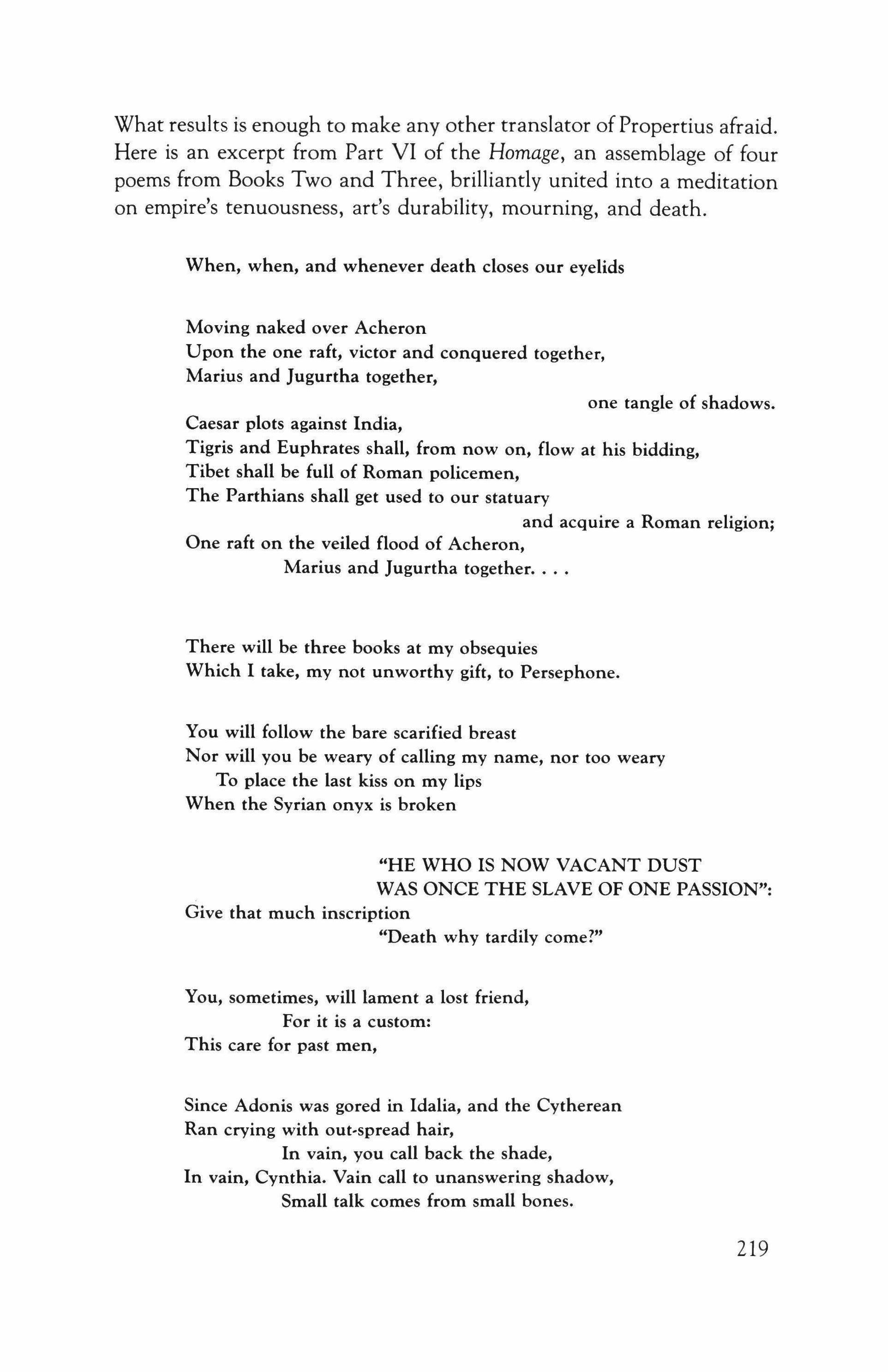
What results is enough to make any other translator of Propertius afraid. Here is an excerpt from Part VI of the Homage, an assemblage of four poems from Books Two and Three, brilliantly united into a meditation on empire's tenuousness, art's durability, mourning, and death.
When, when, and whenever death closes our eyelids
Moving naked over Acheron
Upon the one raft, victor and conquered together, Marius and jugurtha together,
one tangle of shadows. Caesar plots against India, Tigris and Euphrates shall, from now on, flow at his bidding, Tibet shall be full of Roman policemen, The Parthians shall get used to our statuary and acquire a Roman religion; One raft on the veiled flood of Acheron, Marius and Jugurtha together
There will be three books at my obsequies Which I take, my not unworthy gift, to Persephone.
You will follow the bare scarified breast
Nor will you be weary of calling my name, nor too weary To place the last kiss on my lips When the Syrian onyx is broken
"HE WHO IS NOW VACANT DUST WAS ONCE THE SLAVE OF ONE PASSION":
Give that much inscription "Death why tardily come?"
You, sometimes, will lament a lost friend, For it is a custom: This care for past men,
Since Adonis was gored in Idalia, and the Cytherean Ran crying with out-spread hair, In vain, you call back the shade, In vain, Cynthia. Vain call to unanswering shadow, Small talk comes from small bones.
219
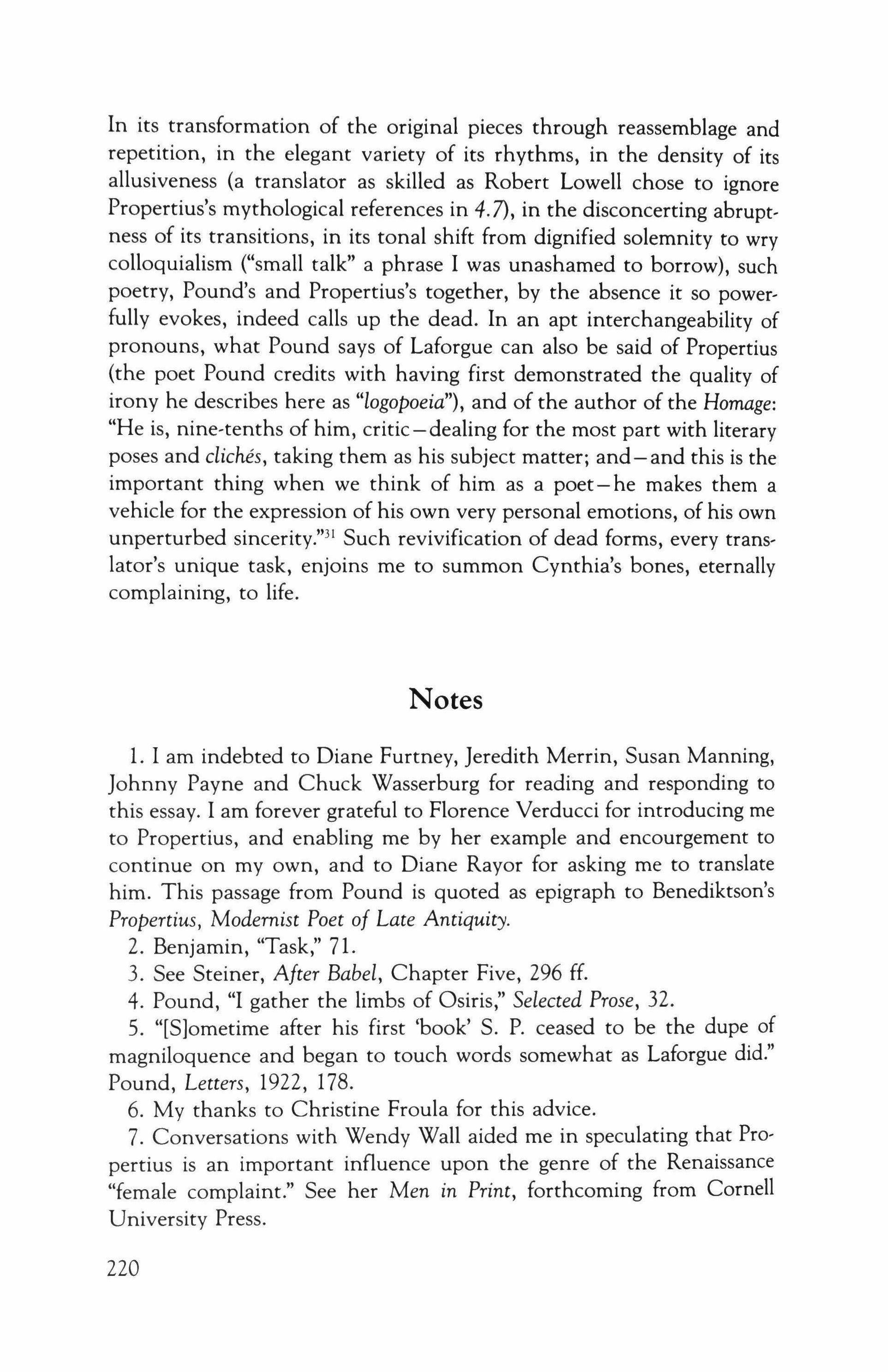
In its transformation of the original pieces through reassemblage and repetition, in the elegant variety of its rhythms, in the density of its allusiveness (a translator as skilled as Robert Lowell chose to ignore Propertius's mythological references in 4.7), in the disconcerting abruptness of its transitions, in its tonal shift from dignified solemnity to wry colloquialism ("small talk" a phrase I was unashamed to borrow), such poetry, Pound's and Propertius's together, by the absence it so powerfully evokes, indeed calls up the dead. In an apt interchangeability of pronouns, what Pound says of Laforgue can also be said of Propertius (the poet Pound credits with having first demonstrated the quality of irony he describes here as "logopoeia"), and of the author of the Homage: "He is, nine-tenths of him, critic-dealing for the most part with literary poses and cliches, taking them as his subject matter; and - and this is the important thing when we think of him as a poet - he makes them a vehicle for the expression of his own very personal emotions, of his own unperturbed sincerity,'?' Such revivification of dead forms, every translator's unique task, enjoins me to summon Cynthia's bones, eternally complaining, to life.
Notes
1. I am indebted to Diane Furtney, jeredith Merrin, Susan Manning, Johnny Payne and Chuck Wasserburg for reading and responding to this essay. I am forever grateful to Florence Verducci for introducing me to Propertius, and enabling me by her example and encourgement to continue on my own, and to Diane Rayor for asking me to translate him. This passage from Pound is quoted as epigraph to Benediktson's Propertius, Modernist Poet of Late Antiquity.
2. Benjamin, "Task," 7l.
3. See Steiner, After Babel, Chapter Five, 296 ff.
4. Pound, "I gather the limbs of Osiris," Selected Prose, 32.
5. "[Sjometime after his first 'book'S. P. ceased to be the dupe of magniloquence and began to touch words somewhat as Laforgue did." Pound, Letters, 1922, 178.
6. My thanks to Christine Froula for this advice.
7. Conversations with Wendy Wall aided me in speculating that Propertius is an important influence upon the genre of the Renaissance "female complaint." See her Men in Print, forthcoming from Cornell University Press. 220
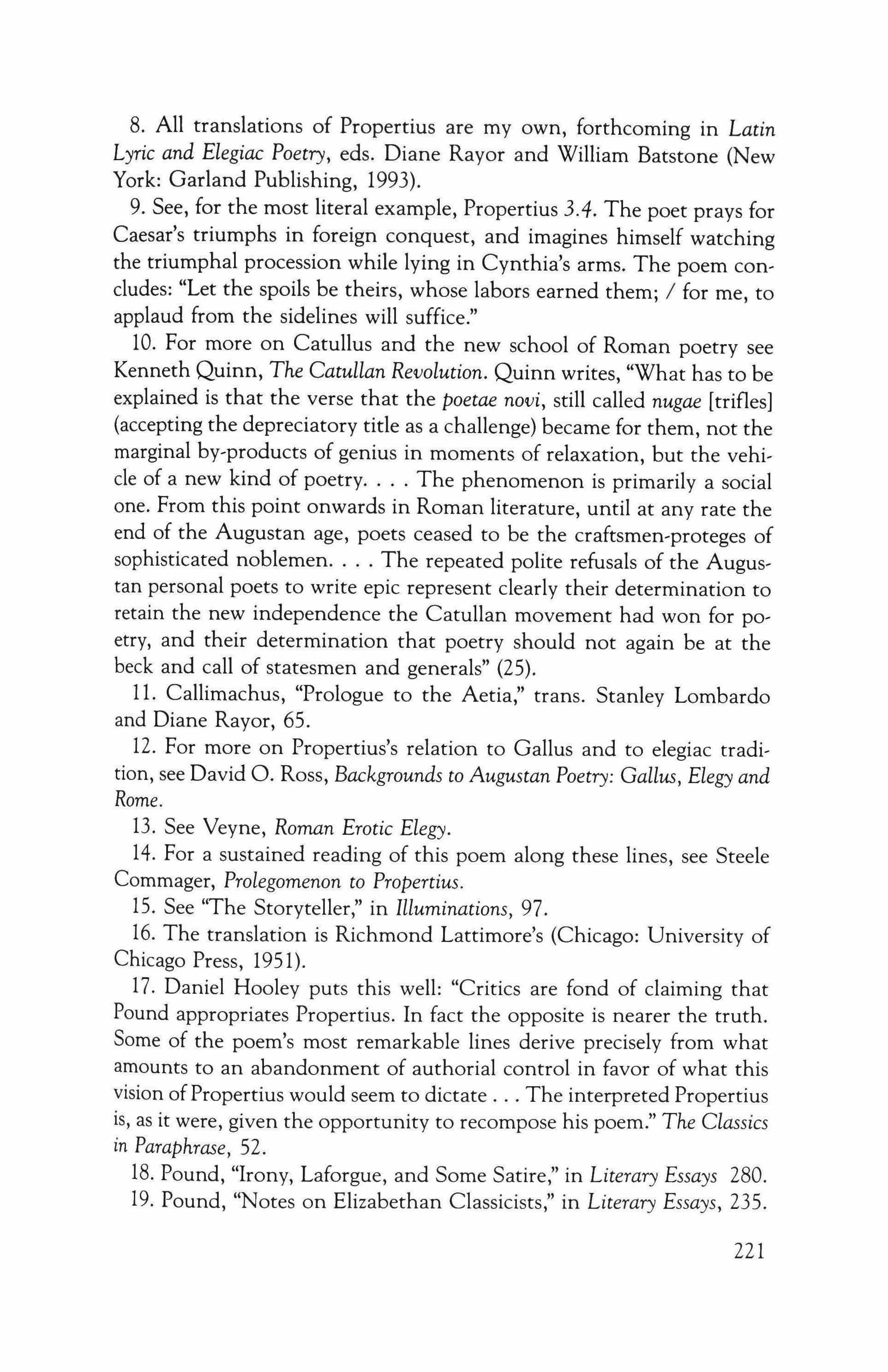
8. All translations of Propertius are my own, forthcoming in Latin Lyric and Elegiac Poetry, eds. Diane Rayor and William Batstone (New York: Garland Publishing, 1993).
9. See, for the most literal example, Propertius 3.4. The poet prays for Caesar's triumphs in foreign conquest, and imagines himself watching the triumphal procession while lying in Cynthia's arms. The poem concludes: "Let the spoils be theirs, whose labors earned them; / for me, to applaud from the sidelines will suffice."
10. For more on Catullus and the new school of Roman poetry see Kenneth Quinn, The Catullan Revolution. Quinn writes, "What has to be explained is that the verse that the poetae novi, still called nugae [trifles] (accepting the depreciatory title as a challenge) became for them, not the marginal by-products of genius in moments of relaxation, but the vehicle of a new kind of poetry The phenomenon is primarily a social one. From this point onwards in Roman literature, until at any rate the end of the Augustan age, poets ceased to be the craftsmen-proteges of sophisticated noblemen The repeated polite refusals of the Augustan personal poets to write epic represent clearly their determination to retain the new independence the Catullan movement had won for poetry, and their determination that poetry should not again be at the beck and call of statesmen and generals" (25).
11. Callimachus, "Prologue to the Aetia," trans. Stanley Lombardo and Diane Rayor, 65.
12. For more on Propertius's relation to Gallus and to elegiac tradition, see David O. Ross, Backgrounds to Augustan Poetry: Gallus, Elegy and Rome.
13. See Veyne, Roman Erotic Elegy.
14. For a sustained reading of this poem along these lines, see Steele Commager, Prolegomenon to Propertius.
15. See "The Storyteller," in Illuminations, 97.
16. The translation is Richmond Lattimore's (Chicago: University of Chicago Press, 1951).
17. Daniel Hooley puts this well: "Critics are fond of claiming that Pound appropriates Propertius. In fact the opposite is nearer the truth. Some of the poem's most remarkable lines derive precisely from what amounts to an abandonment of authorial control in favor of what this vision ofPropertius would seem to dictate The interpreted Propertius is, as it were, given the opportunity to recompose his poem." The Classics in Paraphrase, 52.
18. Pound, "Irony, Laforgue, and Some Satire," in Literary Essays 280.
19. Pound, "Notes on Elizabethan Classicists," in Literary Essays, 235.
221
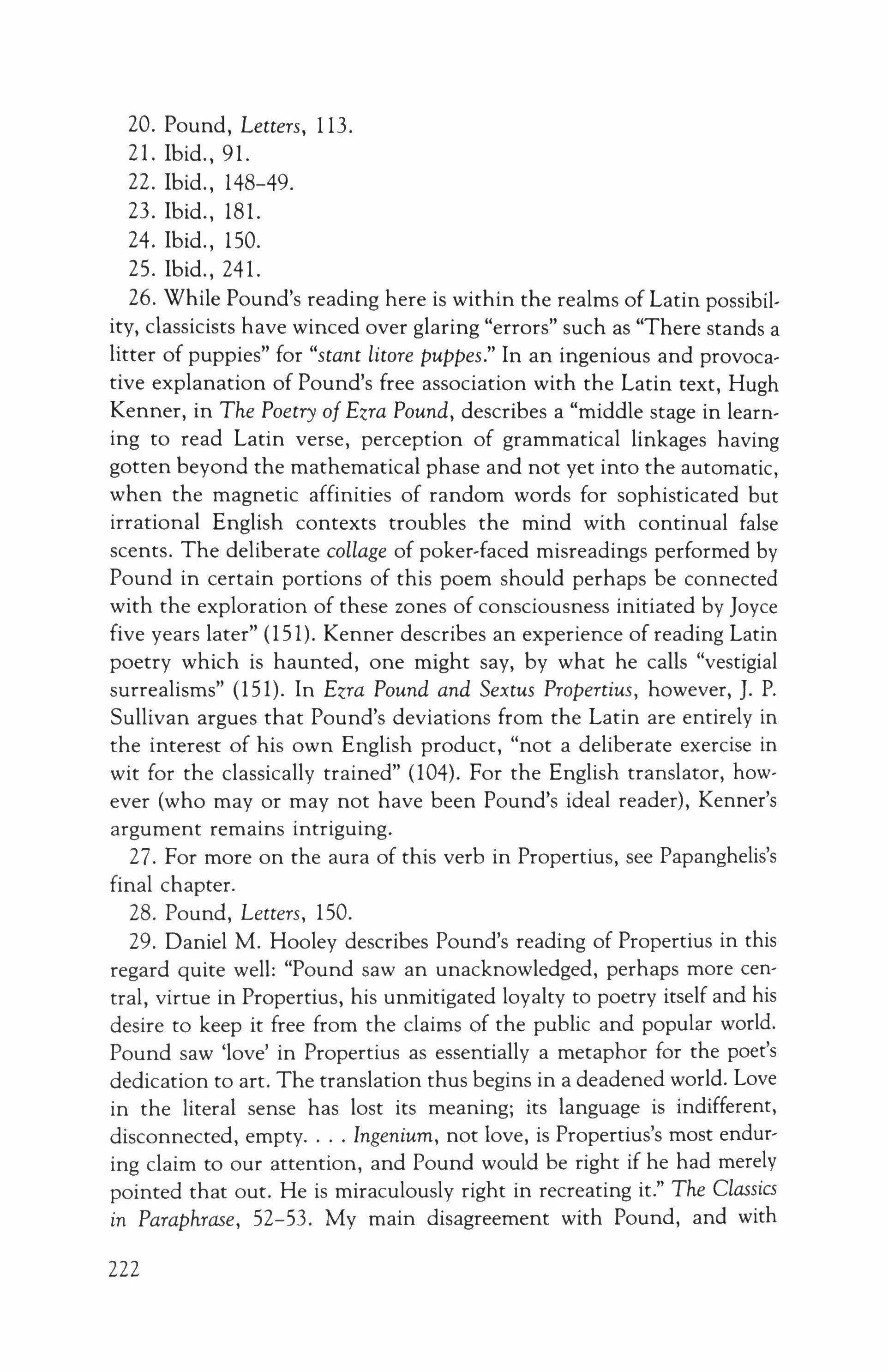
20. Pound, Letters, 113.
21. Ibid., 91.
22. Ibid., 148-49.
23. Ibid., 181.
24. Ibid., 150.
25. Ibid., 241.
26. While Pound's reading here is within the realms of Latin possibility, classicists have winced over glaring "errors" such as "There stands a litter of puppies" for "stant litote puppes." In an ingenious and provocative explanation of Pound's free association with the Latin text, Hugh Kenner, in The Poetry 0/ Ezra Pound, describes a "middle stage in learning to read Latin verse, perception of grammatical linkages having gotten beyond the mathematical phase and not yet into the automatic, when the magnetic affinities of random words for sophisticated but irrational English contexts troubles the mind with continual false scents. The deliberate collage of poker-faced misreadings performed by Pound in certain portions of this poem should perhaps be connected with the exploration of these zones of consciousness initiated by Joyce five years later" (151). Kenner describes an experience of reading Latin poetry which is haunted, one might say, by what he calls "vestigial surrealisms" (151). In Ezra Pound and Sextus Propertius, however, J. P. Sullivan argues that Pound's deviations from the Latin are entirely in the interest of his own English product, "not a deliberate exercise in wit for the classically trained" (104). For the English translator, however (who mayor may not have been Pound's ideal reader), Kenner's argument remains intriguing.
27. For more on the aura of this verb in Propertius, see Papanghelis's final chapter.
28. Pound, Letters, 150.
29. Daniel M. Hooley describes Pound's reading of Propertius in this regard quite well: "Pound saw an unacknowledged, perhaps more central, virtue in Propertius, his unmitigated loyalty to poetry itself and his desire to keep it free from the claims of the public and popular world. Pound saw 'love' in Propertius as essentially a metaphor for the poet's dedication to art. The translation thus begins in a deadened world. Love in the literal sense has lost its meaning; its language is indifferent, disconnected, empty Ingenium, not love, is Propertius's most enduring claim to our attention, and Pound would be right if he had merely pointed that out. He is miraculously right in recreating it." The Classics in Paraphrase, 52-53. My main disagreement with Pound, and with
222

Hooley's account, is on the nature of love as metaphor for Propertius: it is very much a metaphor, and yet very much alive.
30. Pound, Letters 150.
31. Pound, "Irony, Lafargue and Some Satire," 282. For a more detailed definition of "logopoeia," or what Pound terms "the dance of the intellect among words," see "How to Read," Literary Essays, 25.
223
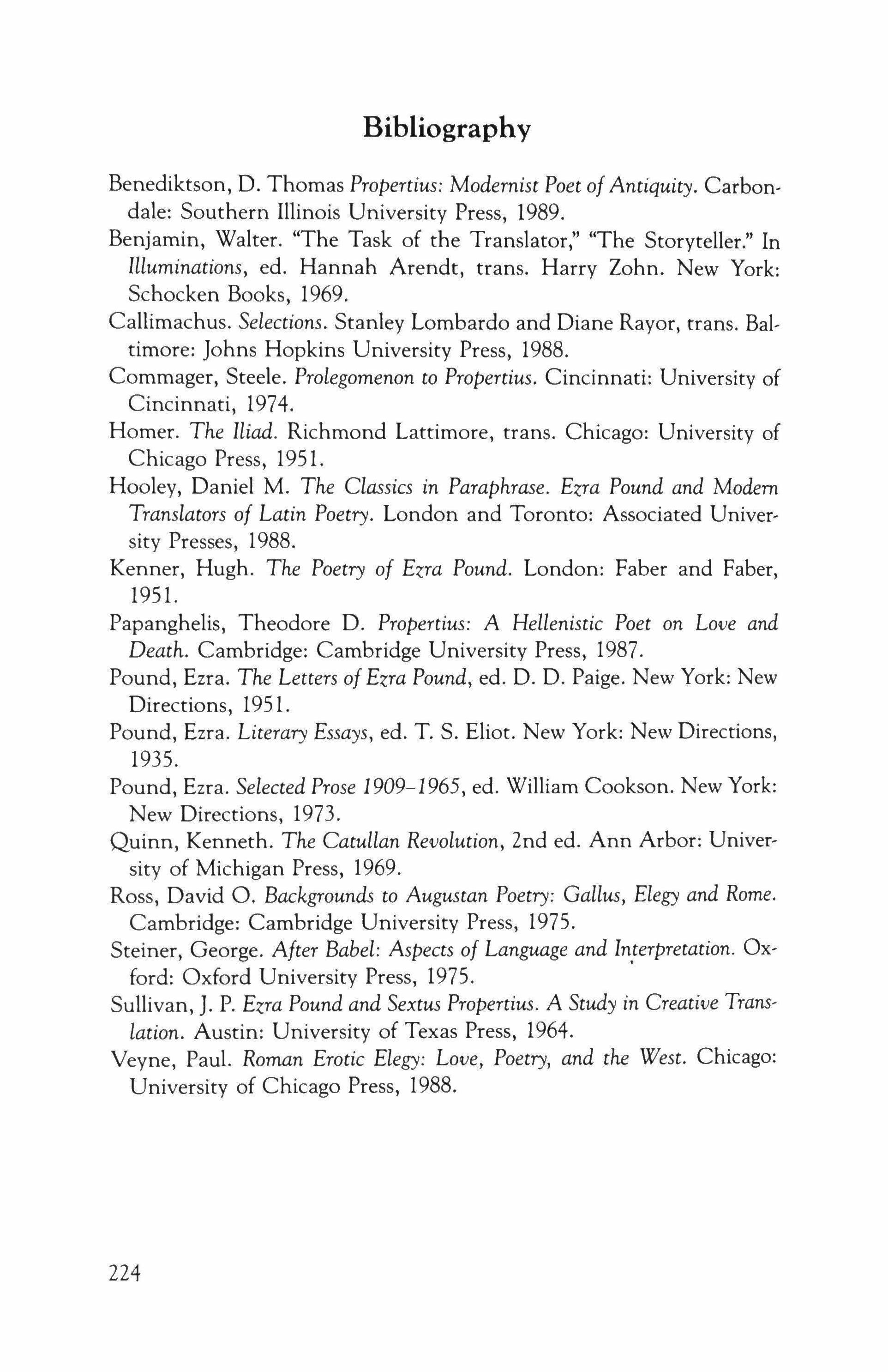
Bibliography
Benediktson, D. Thomas Propertius: Modernist Poet ofAntiquity. Carbondale: Southern Illinois University Press, 1989.
Benjamin, Walter. "The Task of the Translator," "The Storyteller." In Illuminations, ed. Hannah Arendt, trans. Harry Zohn. New York: Schocken Books, 1969.
Callimachus. Selections. Stanley Lombardo and Diane Rayor, trans. Baltimore: Johns Hopkins University Press, 1988.
Commager, Steele. Prolegomenon to Ptopettius. Cincinnati: University of Cincinnati, 1974.
Homer. The Iliad. Richmond Lattimore, trans. Chicago: University of Chicago Press, 1951.
Hooley, Daniel M. The Classics in Paraphrase. Ezra Pound and Modem Translators of Latin Poetry. London and Toronto: Associated University Presses, 1988.
Kenner, Hugh. The Poetry of Ezra Pound. London: Faber and Faber, 1951.
Papanghelis, Theodore D. Propertius: A Hellenistic Poet on Love and Death. Cambridge: Cambridge University Press, 1987.
Pound, Ezra. The Letters of Ezra Pound, ed. D. D. Paige. New York: New Directions, 1951.
Pound, Ezra. Literary Essays, ed. T. S. Eliot. New York: New Directions, 1935.
Pound, Ezra. Selected Prose 1909-1965, ed. William Cookson. New York: New Directions, 1973.
Quinn, Kenneth. The Catullan Revolution, 2nd ed. Ann Arbor: University of Michigan Press, 1969.
Ross, David O. Backgrounds to Augustan Poetry: Gallus, Elegy and Rome. Cambridge: Cambridge University Press, 1975.
Steiner, George. After Babel: Aspects of Language and In,terpretation. Oxford: Oxford University Press, 1975.
Sullivan, J. P. Ezra Pound and Sextus Propertius. A Study in Creative Translation. Austin: University of Texas Press, 1964.
Veyne, Paul. Roman Erotic Elegy: Love, Poetry, and the West. Chicago: University of Chicago Press, 1988.
224
Propertius: Four Poems*
Translated by Helen Deutsch
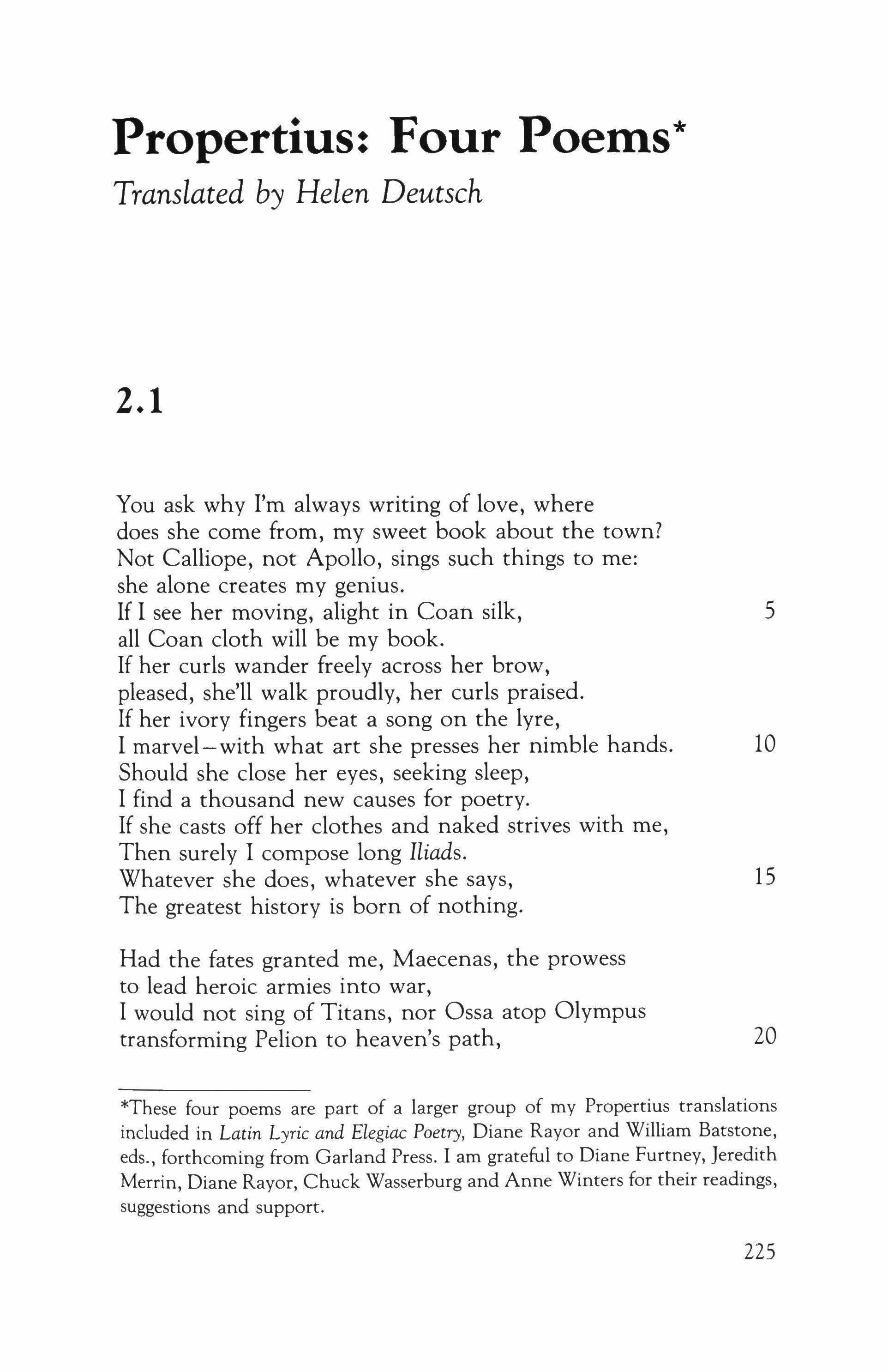
2.1
You ask why I'm always writing of love, where does she come from, my sweet book about the town? Not Calliope, not Apollo, sings such things to me: she alone creates my genius. If I see her moving, alight in Coan silk, 5 all Coan cloth will be my book. If her curls wander freely across her brow, pleased, she'll walk proudly, her curls praised. If her ivory fingers beat a song on the lyre, I marvel-with what art she presses her nimble hands. 10 Should she close her eyes, seeking sleep, I find a thousand new causes for poetry. If she casts off her clothes and naked strives with me, Then surely I compose long Iliads. Whatever she does, whatever she says, 15 The greatest history is born of nothing.
Had the fates granted me, Maecenas, the prowess to lead heroic armies into war, I would not sing of Titans, nor Ossa atop Olympus transforming Pelion to heaven's path, 20
*These four poems are part of a larger group of my Propertius translations included in Latin Lyric and Elegiac Poetry, Diane Rayor and William Batstone, eds., forthcoming from Garland Press. I am grateful to Diane Furtney, jeredith Merrin, Diane Rayor, Chuck Wasserburg and Anne Winters for their readings, suggestions and support. 225
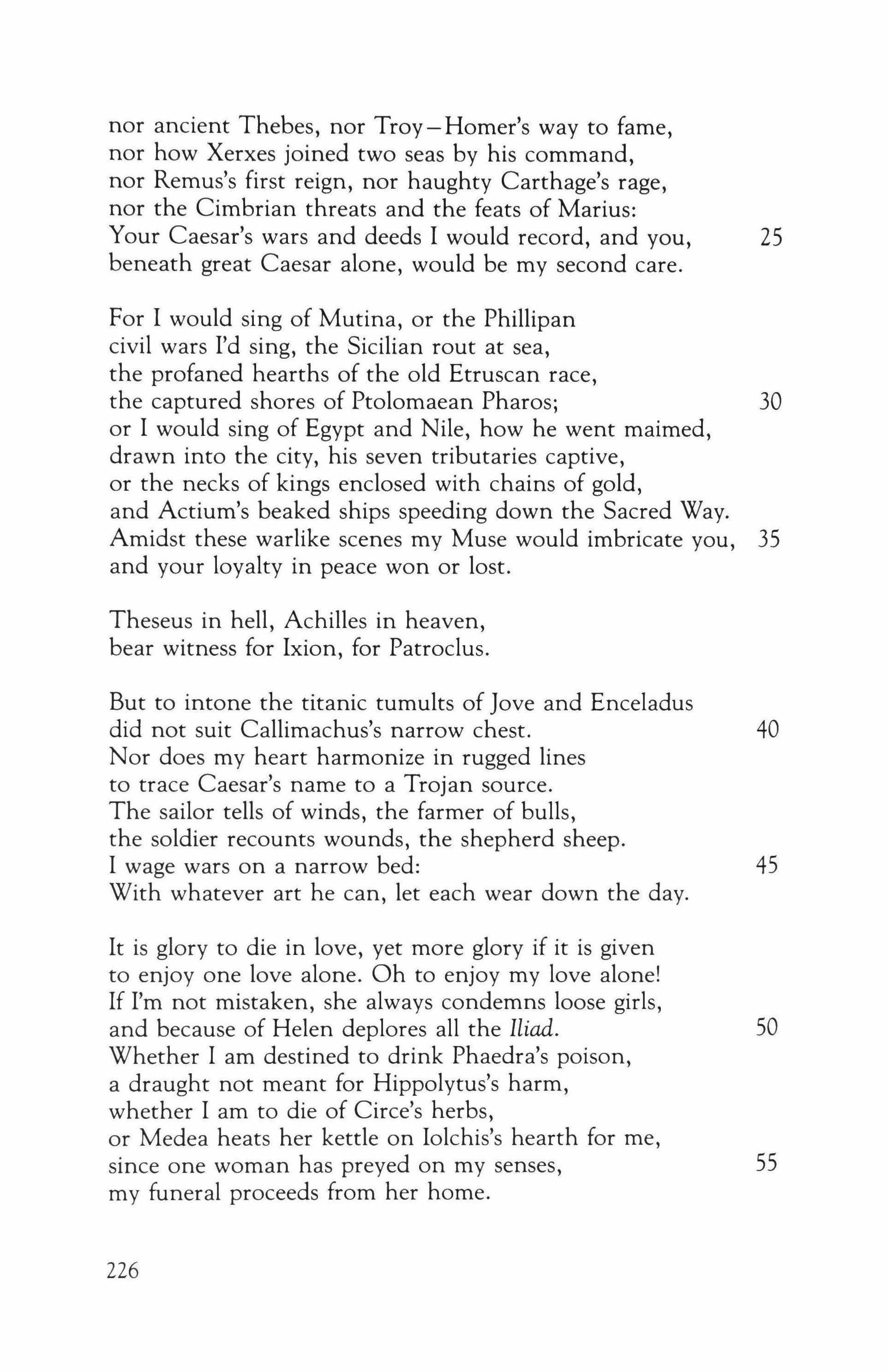
nor ancient Thebes, nor Troy - Homer's way to fame, nor how Xerxes joined two seas by his command, nor Remus's first reign, nor haughty Carthage's rage, nor the Cimbrian threats and the feats of Marius: Your Caesar's wars and deeds I would record, and you, 25 beneath great Caesar alone, would be my second care.
For I would sing of Mutina, or the Phillipan civil wars I'd sing, the Sicilian rout at sea, the profaned hearths of the old Etruscan race, the captured shores of Ptolomaean Pharos;
30 or I would sing of Egypt and Nile, how he went maimed, drawn into the city, his seven tributaries captive, or the necks of kings enclosed with chains of gold, and Actium's beaked ships speeding down the Sacred Way. Amidst these warlike scenes my Muse would imbricate you, 35 and your loyalty in peace won or lost.
Theseus in hell, Achilles in heaven, bear witness for Ixion, for Patroclus.
But to intone the titanic tumults of Jove and Enceladus did not suit Callimachus's narrow chest.
40 Nor does my heart harmonize in rugged lines to trace Caesar's name to a Trojan source. The sailor tells of winds, the farmer of bulls, the soldier recounts wounds, the shepherd sheep. I wage wars on a narrow bed:
45 With whatever art he can, let each wear down the day.
It is glory to die in love, yet more glory if it is given to enjoy one love alone. Oh to enjoy my love alone! If I'm not mistaken, she always condemns loose girls, and because of Helen deplores all the Iliad.
50 Whether I am destined to drink Phaedra's poison, a draught not meant for Hippolytus's harm, whether I am to die of Circe's herbs, or Medea heats her kettle on Iolchis's hearth for me, since one woman has preyed on my senses,
55 my funeral proceeds from her home.
226
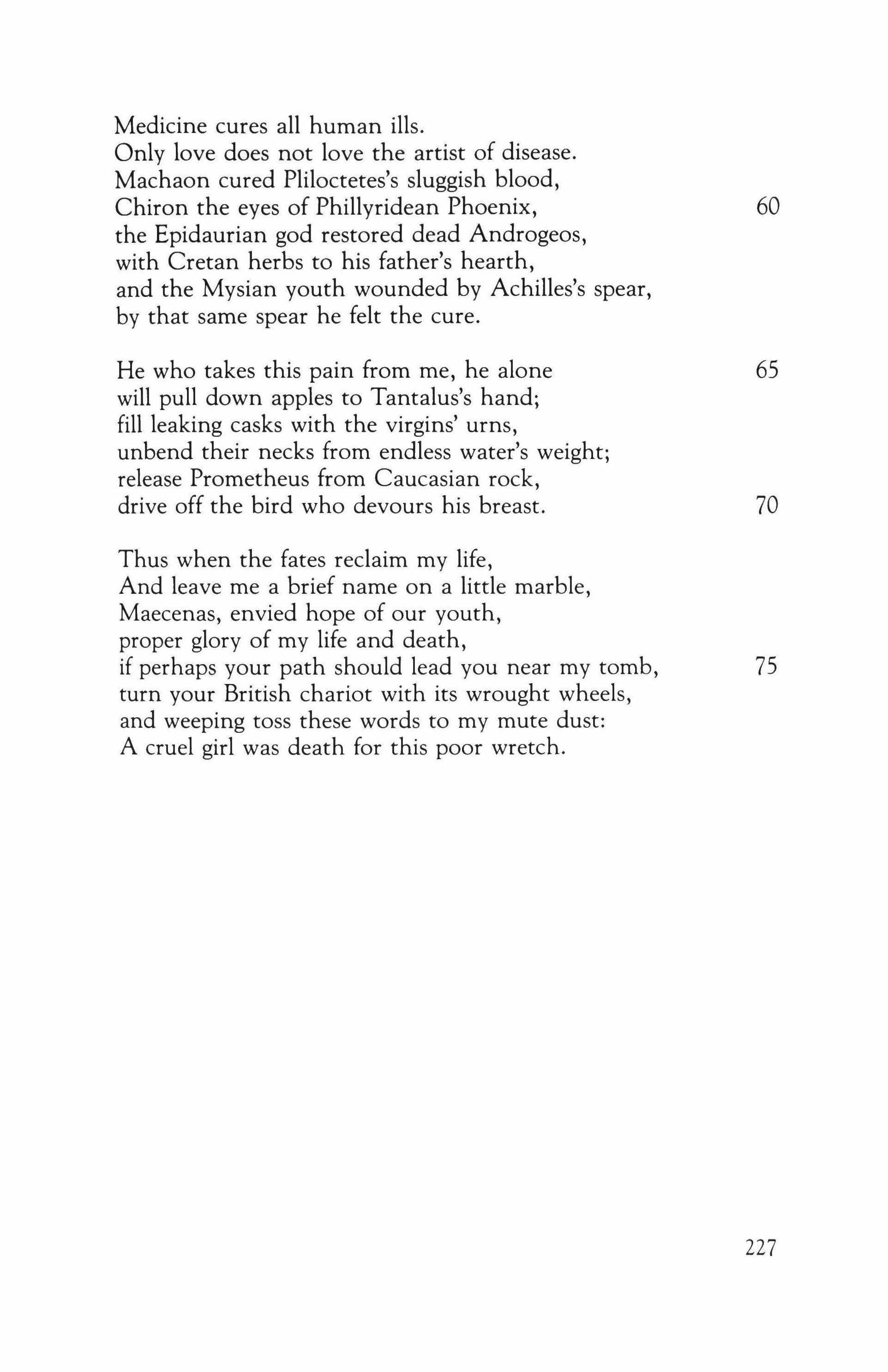
Medicine cures all human ills. Only love does not love the artist of disease. Machaon cured Pliloctetes's sluggish blood, Chiron the eyes of Phillyridean Phoenix, 60 the Epidaurian god restored dead Androgeos, with Cretan herbs to his father's hearth, and the Mysian youth wounded by Achilles's spear, by that same spear he felt the cure.
He who takes this pain from me, he alone
65 will pull down apples to Tantalus's hand; fill leaking casks with the virgins' urns, unbend their necks from endless water's weight; release Prometheus from Caucasian rock, drive off the bird who devours his breast.
Thus when the fates reclaim my life, And leave me a brief name on a little marble, Maecenas, envied hope of our youth, proper glory of my life and death, if perhaps your path should lead you near my tomb,
70
75 turn your British chariot with its wrought wheels, and weeping toss these words to my mute dust: A cruel girl was death for this poor wretch.
227
2.5
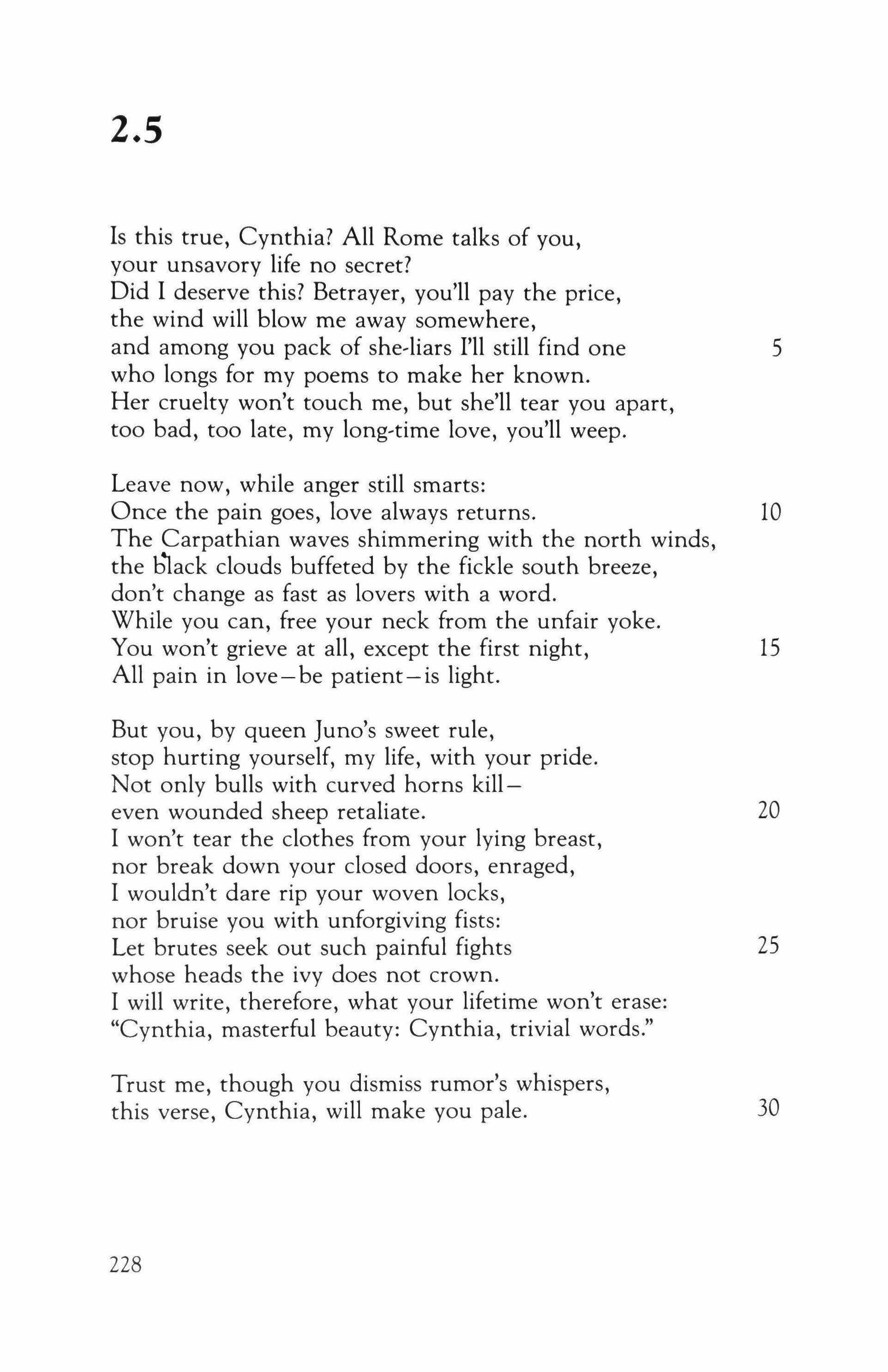
Is this true, Cynthia? All Rome talks of you, your unsavory life no secret? Did I deserve this? Betrayer, you'll pay the price, the wind will blow me away somewhere, and among you pack of she-liars I'll still find one 5 who longs for my poems to make her known. Her cruelty won't touch me, but she'll tear you apart, too bad, too late, my long-time love, you'll weep.
Leave now, while anger still smarts: Once the pain goes, love always returns.
10 The Carpathian waves shimmering with the north winds, the black clouds buffeted by the fickle south breeze, don't change as fast as lovers with a word. While you can, free your neck from the unfair yoke. You won't grieve at all, except the first night, 15 All pain in love - be patient - is light.
But you, by queen Juno's sweet rule, stop hurting yourself, my life, with your pride. Not only bulls with curved horns killeven wounded sheep retaliate. 20 I won't tear the clothes from your lying breast, nor break down your closed doors, enraged, I wouldn't dare rip your woven locks, nor bruise you with unforgiving fists: Let brutes seek out such painful fights 25 whose heads the ivy does not crown. I will write, therefore, what your lifetime won't erase: "Cynthia, masterful beauty: Cynthia, trivial words."
Trust me, though you dismiss rumor's whispers, this verse, Cynthia, will make you pale. 30
228
2.14
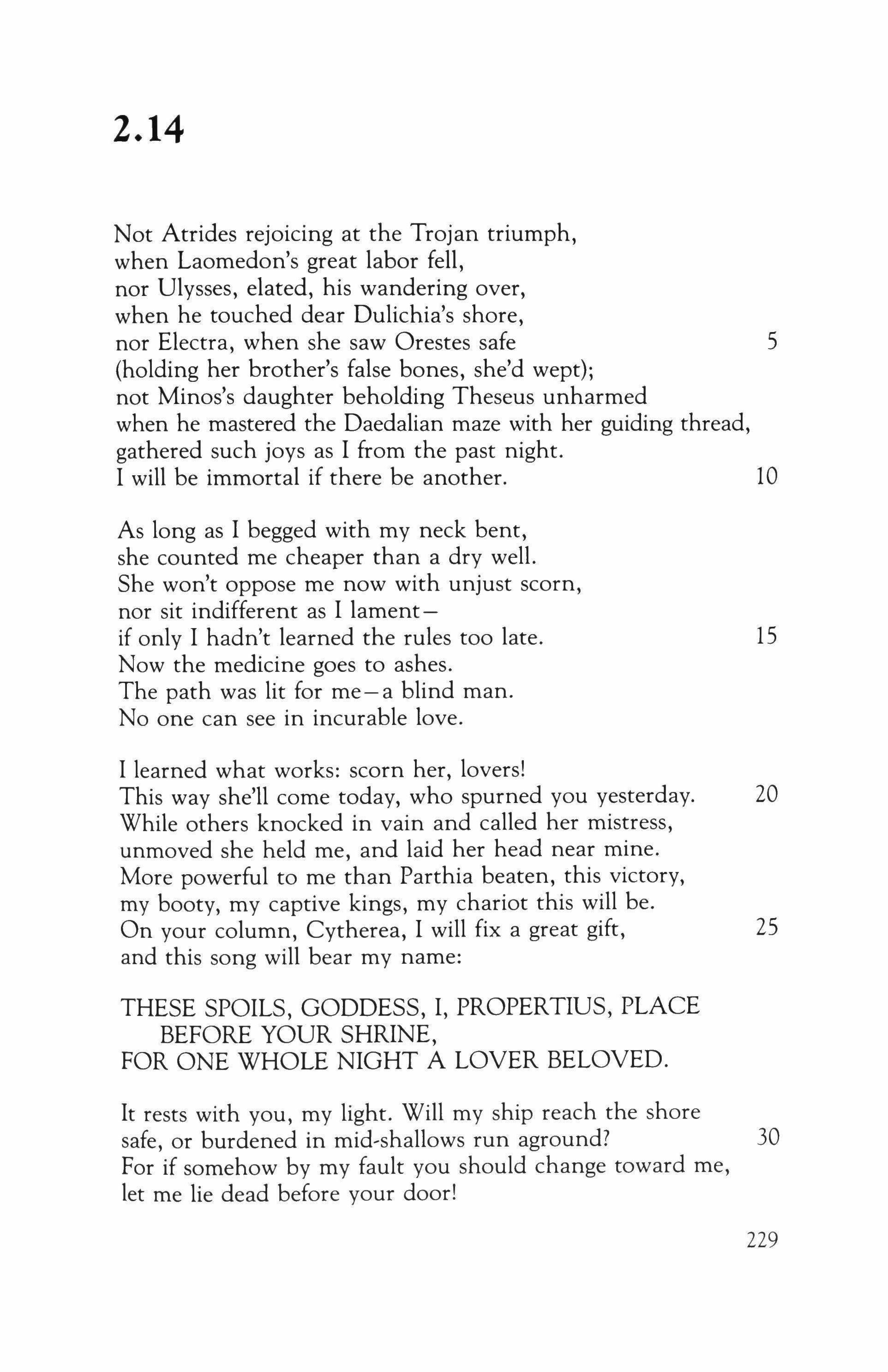
10
Not Atrides rejoicing at the Trojan triumph, when Laomedon's great labor fell, nor Ulysses, elated, his wandering over, when he touched dear Dulichia's shore, nor Electra, when she saw Orestes safe 5 (holding her brother's false bones, she'd wept); not Minos's daughter beholding Theseus unharmed when he mastered the Daedalian maze with her guiding thread, gathered such joys as I from the past night. I will be immortal if there be another.
As long as I begged with my neck bent, she counted me cheaper than a dry well. She won't oppose me now with unjust scorn, nor sit indifferent as I lamentif only I hadn't learned the rules too late. 15 Now the medicine goes to ashes. The path was lit for me-a blind man. No one can see in incurable love.
I learned what works: scorn her, lovers! This way she'll come today, who spurned you yesterday. 20 While others knocked in vain and called her mistress, unmoved she held me, and laid her head near mine. More powerful to me than Parthia beaten, this victory, my booty, my captive kings, my chariot this will be.
On your column, Cytherea, I will fix a great gift, 25 and this song will bear my name:
THESE SPOILS, GODDESS, I, PROPERTIUS, PLACE BEFORE YOUR SHRINE, FOR ONE WHOLE NIGHT A LOVER BELOVED.
It rests with you, my light. Will my ship reach the shore safe, or burdened in mid-shallows run aground? 30 For if somehow by my fault you should change toward me, let me lie dead before your door!
229
4.7
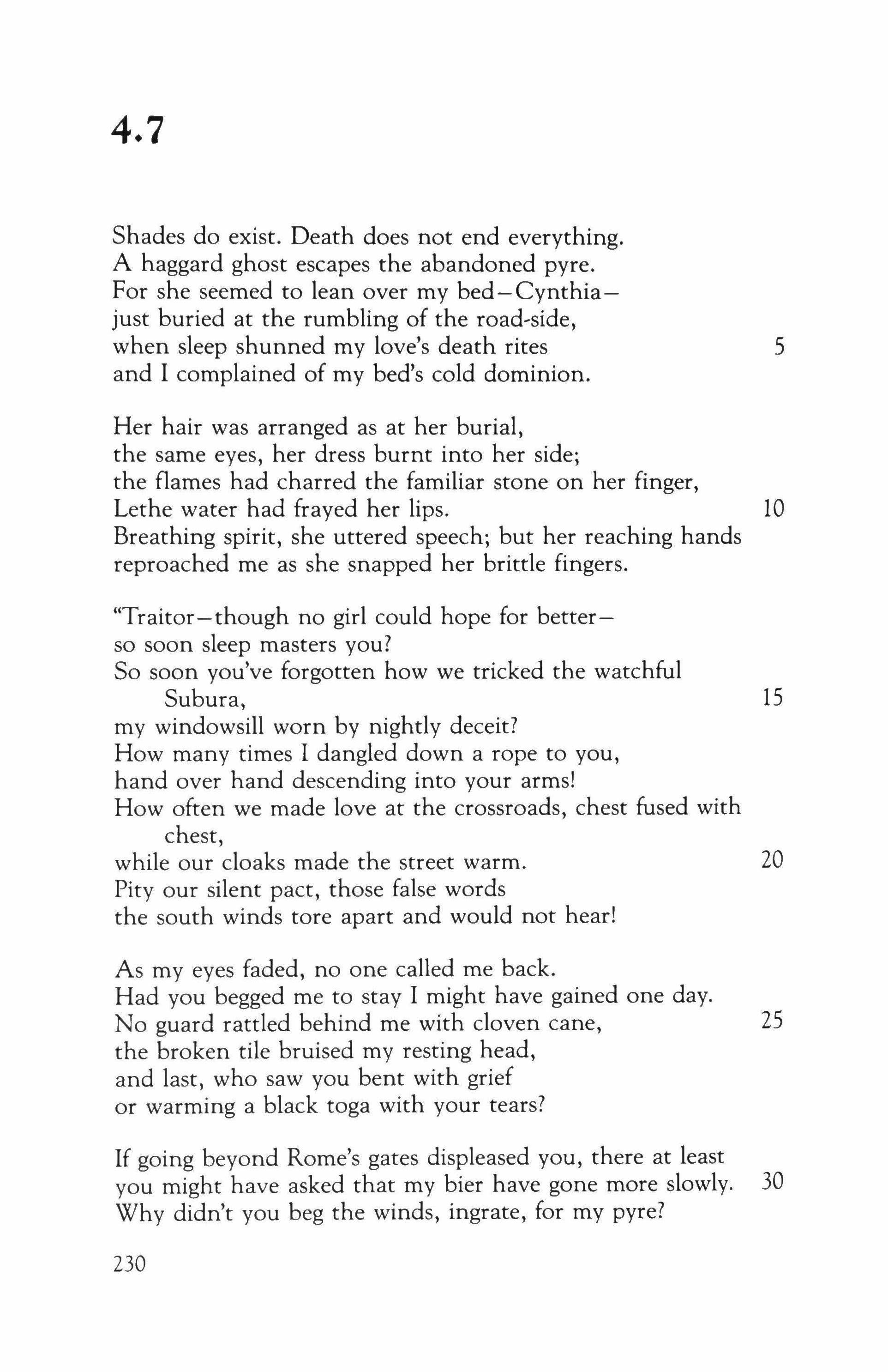
Shades do exist. Death does not end everything. A haggard ghost escapes the abandoned pyre. For she seemed to lean over my bed-Cynthiajust buried at the rumbling of the road-side, when sleep shunned my love's death rites 5 and I complained of my bed's cold dominion.
Her hair was arranged as at her burial, the same eyes, her dress burnt into her side; the flames had charred the familiar stone on her finger, Lethe water had frayed her lips. 10 Breathing spirit, she uttered speech; but her reaching hands reproached me as she snapped her brittle fingers.
"Traitor-though no girl could hope for betterso soon sleep masters you? So soon you've forgotten how we tricked the watchful Subura, 15 my windowsill worn by nightly deceit? How many times I dangled down a rope to you, hand over hand descending into your arms! How often we made love at the crossroads, chest fused with chest, while our cloaks made the street warm. 20
Pity our silent pact, those false words the south winds tore apart and would not hear!
As my eyes faded, no one called me back. Had you begged me to stay I might have gained one day. No guard rattled behind me with cloven cane, 25 the broken tile bruised my resting head, and last, who saw you bent with grief or warming a black toga with your tears?
If going beyond Rome's gates displeased you, there at least you might have asked that my bier have gone more slowly. 30 Why didn't you beg the winds, ingrate, for my pyre?
230
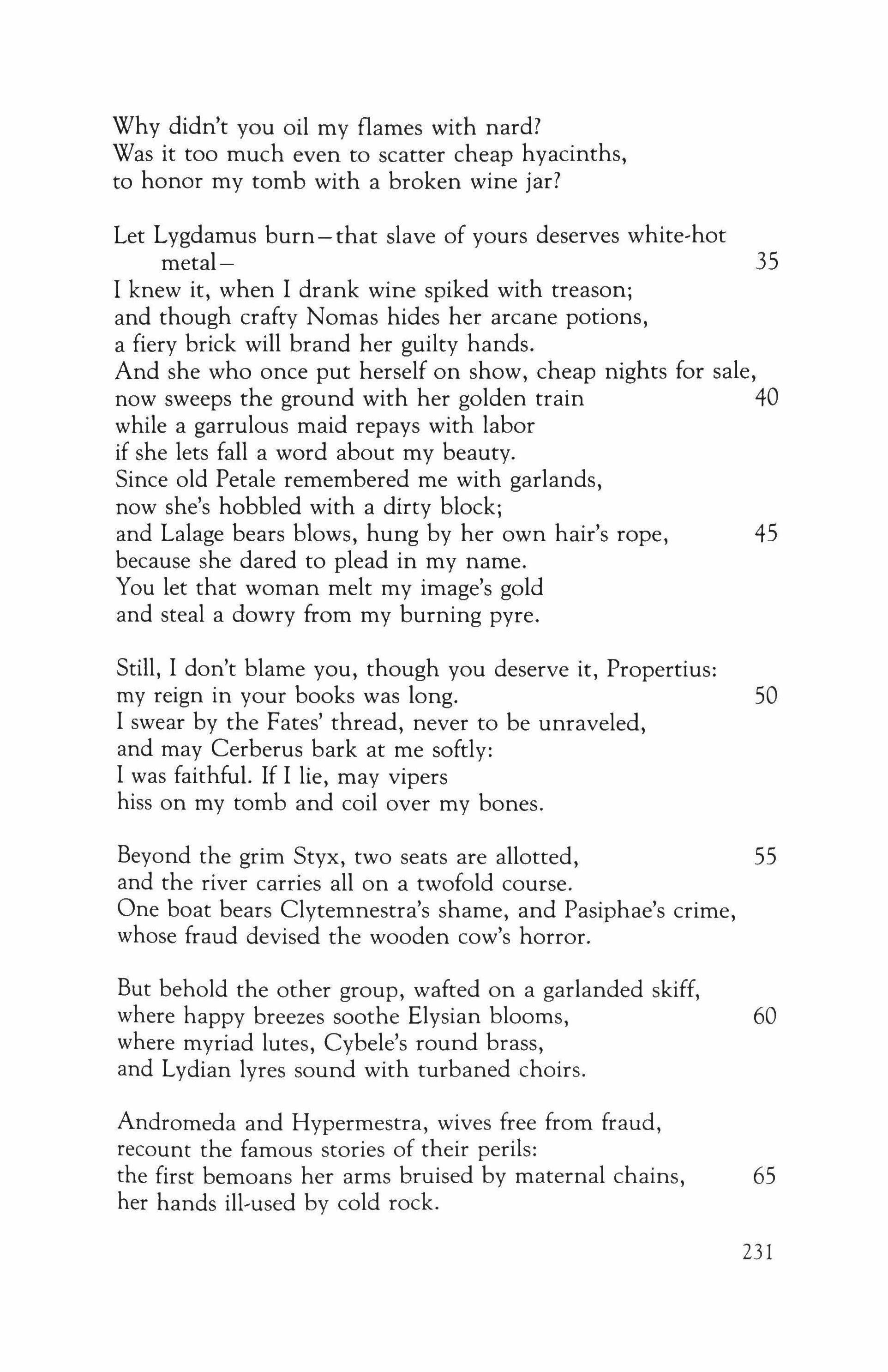
Why didn't you oil my flames with nard? Was it too much even to scatter cheap hyacinths, to honor my tomb with a broken wine jar?
Let Lygdamus burn-that slave of yours deserves white-hot metal-
35 I knew it, when I drank wine spiked with treason; and though crafty Nomas hides her arcane potions, a fiery brick will brand her guilty hands. And she who once put herself on show, cheap nights for sale, now sweeps the ground with her golden train
40 while a garrulous maid repays with labor if she lets fall a word about my beauty. Since old Petale remembered me with garlands, now she's hobbled with a dirty block; and Lalage bears blows, hung by her own hair's rope, 45 because she dared to plead in my name. You let that woman melt my image's gold and steal a dowry from my burning pyre.
Still, I don't blame you, though you deserve it, Propertius: my reign in your books was long. 50 I swear by the Fates' thread, never to be unraveled, and may Cerberus bark at me softly: I was faithful. If I lie, may vipers hiss on my tomb and coil over my bones.
Beyond the grim Styx, two seats are allotted,
55 and the river carries all on a twofold course. One boat bears Clytemnestra's shame, and Pasiphae's crime, whose fraud devised the wooden cow's horror.
But behold the other group, wafted on a garlanded skiff, where happy breezes soothe Elysian blooms, 60 where myriad lutes, Cybele's round brass, and Lydian lyres sound with turbaned choirs.
Andromeda and Hypermestra, wives free from fraud, recount the famous stories of their perils: the first bemoans her arms bruised by maternal chains, 65 her hands ill-used by cold rock.
231
Hypermestra tells of the great deed her sisters dared, though her soul lacked strength for the crime. So in death we heal life's loves with tears. I conceal your perfidies.
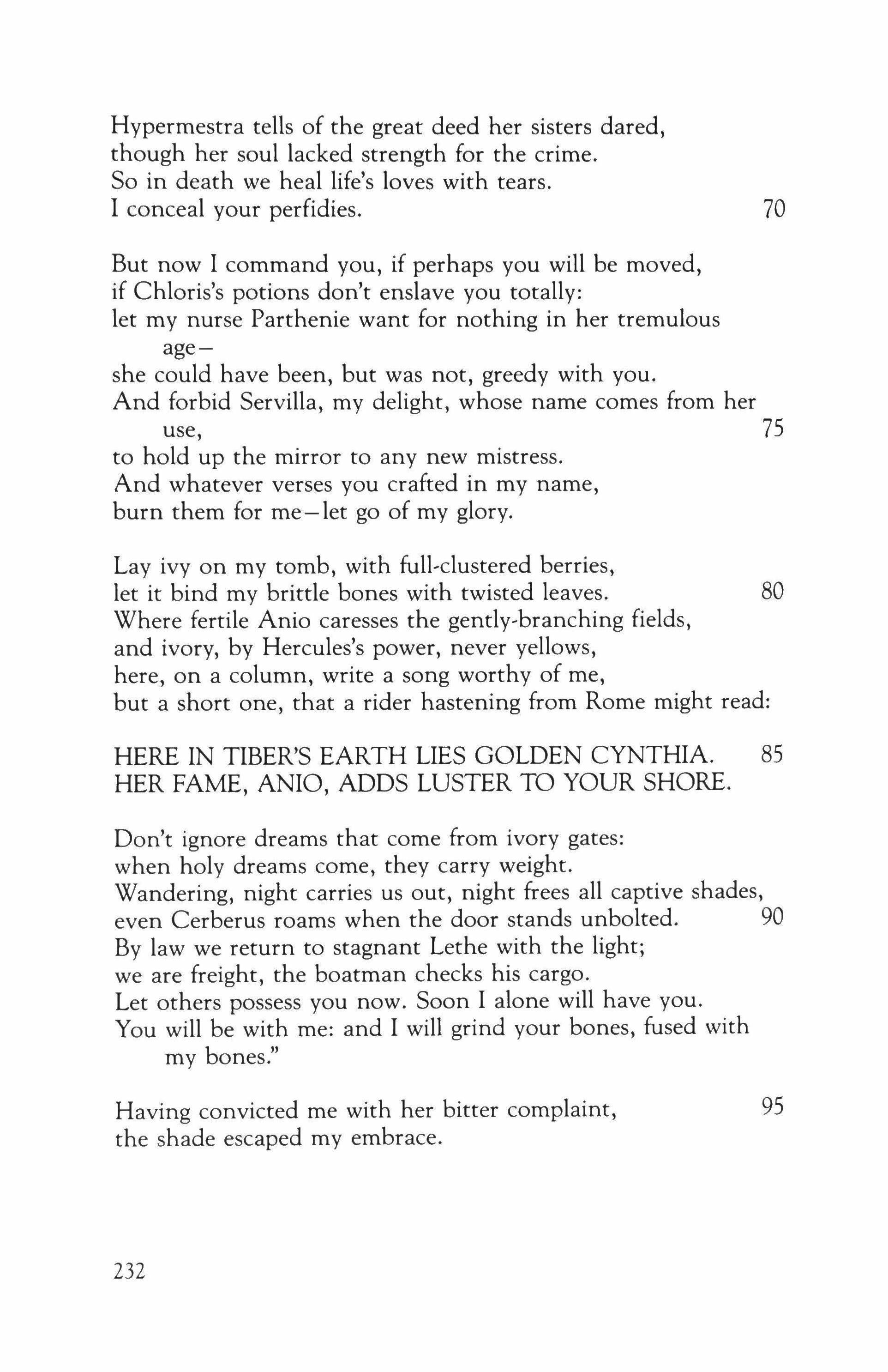
70
But now I command you, if perhaps you will be moved, if Chloris's potions don't enslave you totally: let my nurse Parthenie want for nothing in her tremulous ageshe could have been, but was not, greedy with you. And forbid Servilla, my delight, whose name comes from her use, 75 to hold up the mirror to any new mistress. And whatever verses you crafted in my name, burn them for me-let go of my glory.
Lay ivy on my tomb, with full-clustered berries, let it bind my brittle bones with twisted leaves.
80 Where fertile Anio caresses the gently-branching fields, and ivory, by Hercules's power, never yellows, here, on a column, write a song worthy of me, but a short one, that a rider hastening from Rome might read:
HERE IN TIBER'S EARTH LIES GOLDEN CYNTHIA. 85 HER FAME, ANIO, ADDS LUSTER TO YOUR SHORE.
Don't ignore dreams that come from ivory gates: when holy dreams come, they carry weight. Wandering, night carries us out, night frees all captive shades, even Cerberus roams when the door stands unbolted. 90 By law we return to stagnant Lethe with the light; we are freight, the boatman checks his cargo. Let others possess you now. Soon I alone will have you. You will be with me: and I will grind your bones, fused with my bones."
Having convicted me with her bitter complaint, the shade escaped my embrace.
95
232
Contributors
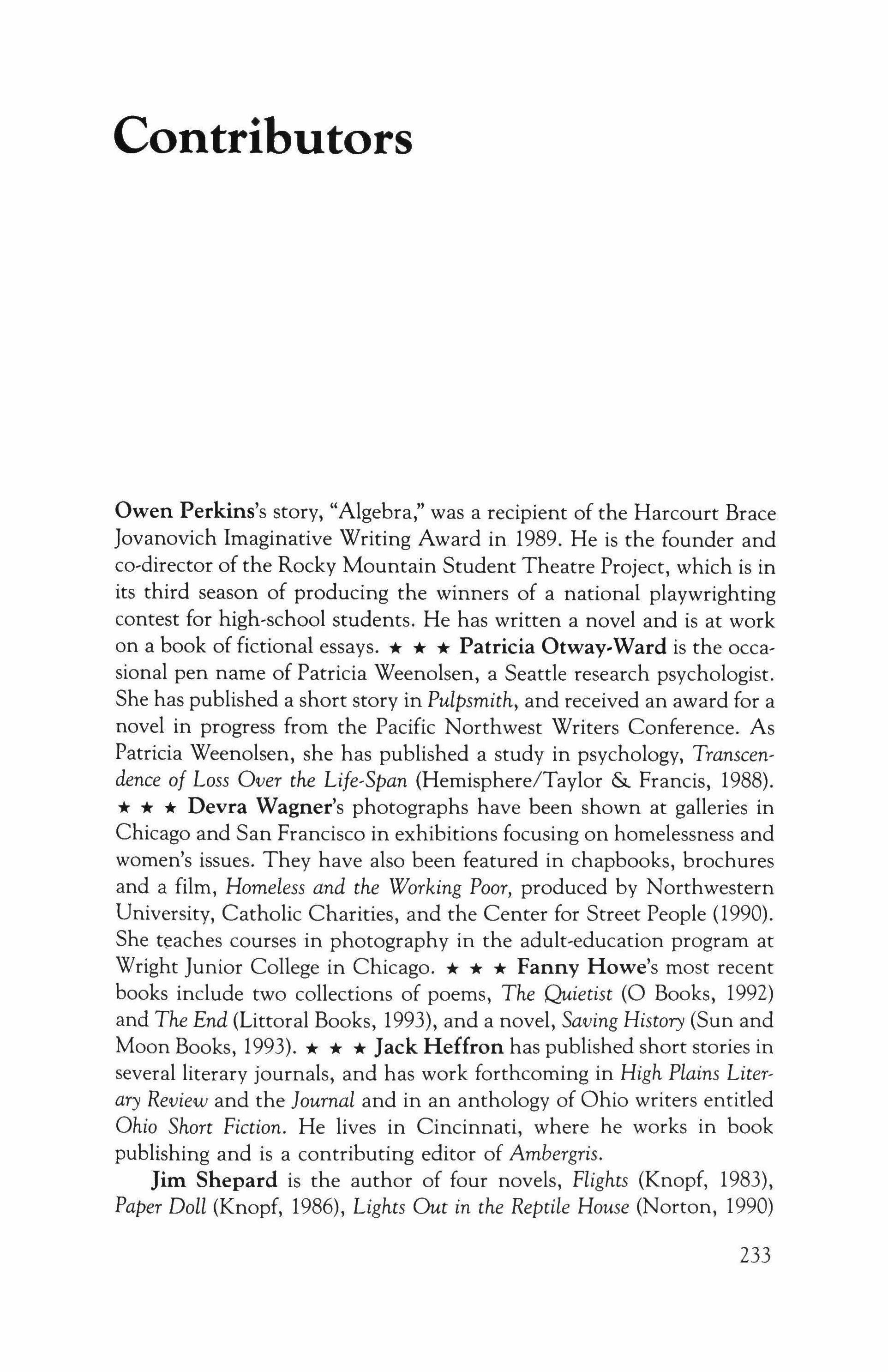
Owen Perkins's story, "Algebra," was a recipient of the Harcourt Brace Jovanovich Imaginative Writing Award in 1989. He is the founder and co-director of the Rocky Mountain Student Theatre Project, which is in its third season of producing the winners of a national playwrighting contest for high-school students. He has written a novel and is at work on a book offictional essays. * * * Patricia Otway-Ward is the occasional pen name of Patricia Weenolsen, a Seattle research psychologist. She has published a short story in Pulpsmith, and received an award for a novel in progress from the Pacific Northwest Writers Conference. As Patricia Weenolsen, she has published a study in psychology, Transcendence of Loss Over the Life-Span (Hemisphere/Taylor & Francis, 1988).
* * * Devra Wagner's photographs have been shown at galleries in Chicago and San Francisco in exhibitions focusing on homelessness and women's issues. They have also been featured in chapbooks, brochures and a film, Homeless and the Working Poor, produced by Northwestern University, Catholic Charities, and the Center for Street People (1990). She teaches courses in photography in the adult-education program at Wright Junior College in Chicago. * * * Fanny Howe's most recent books include two collections of poems, The Quietist (0 Books, 1992) and The End (Littoral Books, 1993), and a novel, Saving History (Sun and Moon Books, 1993). * * * Jack Heffron has published short stories in several literary journals, and has work forthcoming in High Plains Literary Review and the Journal and in an anthology of Ohio writers entitled Ohio Short Fiction. He lives in Cincinnati, where he works in book publishing and is a contributing editor of Ambergris.
Jim Shepard is the author of four novels, Flights (Knopf, 1983), Paper Doll (Knopf, 1986), Lights Out in the Reptile House (Norton, 1990)
233
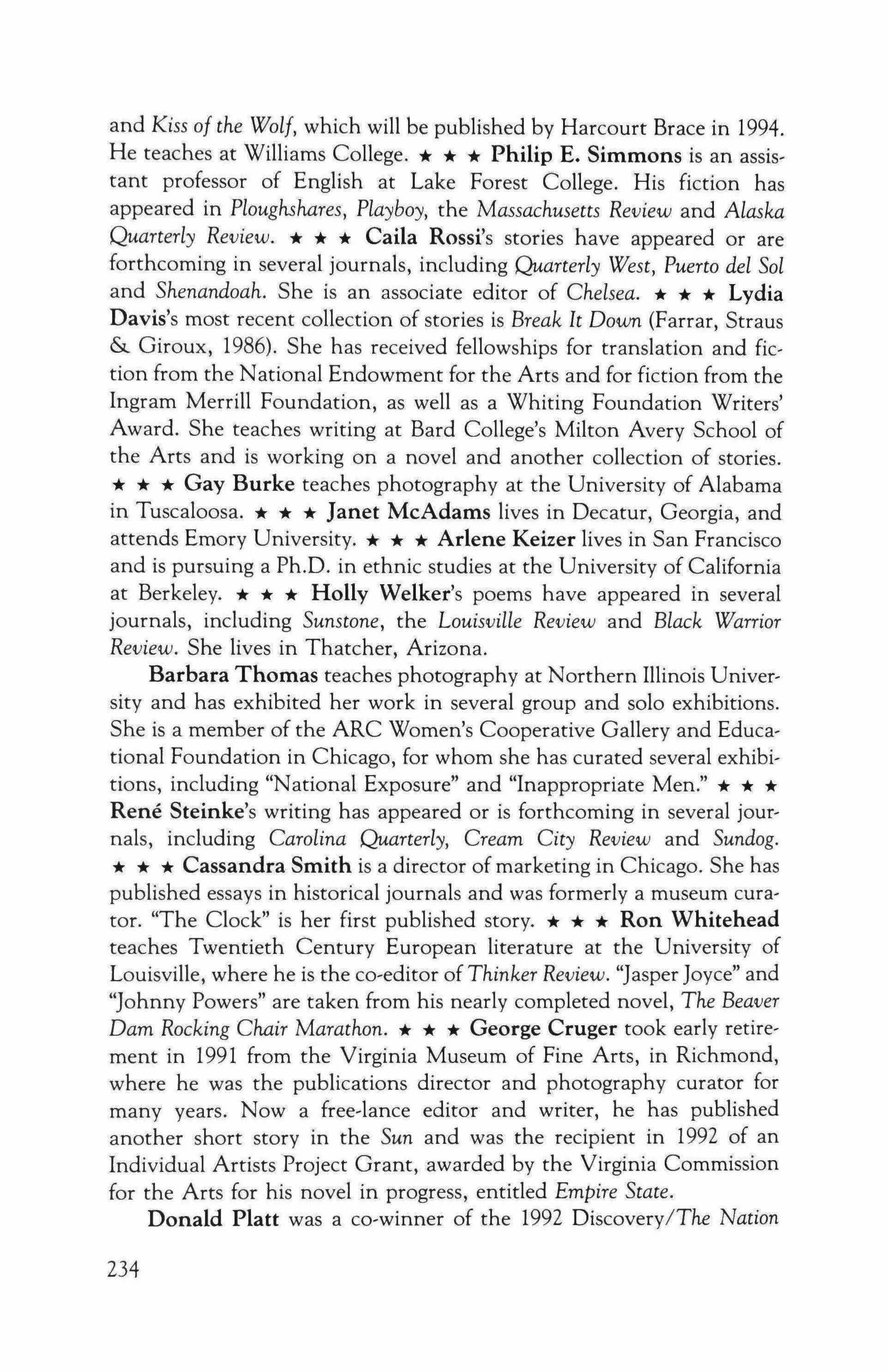
and Kiss of the Wolf, which will be published by Harcourt Brace in 1994. He teaches at Williams College. * * * Philip E. Simmons is an assistant professor of English at Lake Forest College. His fiction has appeared in Ploughshares, Playboy, the Massachusetts Review and Alaska Quarterly Review. * * * Caila Rossi's stories have appeared or are forthcoming in several journals, including Quarterly West, Puerto del Sol and Shenandoah. She is an associate editor of Chelsea. * * * Lydia Davis's most recent collection of stories is Break It Down (Farrar, Straus & Giroux, 1986). She has received fellowships for translation and fiction from the National Endowment for the Arts and for fiction from the Ingram Merrill Foundation, as well as a Whiting Foundation Writers' Award. She teaches writing at Bard College's Milton Avery School of the Arts and is working on a novel and another collection of stories. * * * Gay Burke teaches photography at the University of Alabama in Tuscaloosa. * * * Janet McAdams lives in Decatur, Georgia, and attends Emory University. * * * Arlene Keizer lives in San Francisco and is pursuing a Ph.D. in ethnic studies at the University of California at Berkeley. * * * Holly Welker's poems have appeared in several journals, including Sunstone, the Louisville Review and Black Warrior Review. She lives in Thatcher, Arizona.
Barbara Thomas teaches photography at Northern Illinois University and has exhibited her work in several group and solo exhibitions. She is a member of the ARC Women's Cooperative Gallery and Educational Foundation in Chicago, for whom she has curated several exhibitions, including "National Exposure" and "Inappropriate Men." * * * Rene Steinke's writing has appeared or is forthcoming in several journals, including Carolina Quarterly, Cream City Review and Sundog.
* * * Cassandra Smith is a director of marketing in Chicago. She has published essays in historical journals and was formerly a museum curator. "The Clock" is her first published story.
* * * Ron Whitehead teaches Twentieth Century European literature at the University of Louisville, where he is the co-editor of Thinker Review. "JasperJoyce" and "Johnny Powers" are taken from his nearly completed novel, The Beaver Dam Rocking Chair Marathon. * * * George Cruger took early retirement in 1991 from the Virginia Museum of Fine Arts, in Richmond, where he was the publications director and photography curator for many years. Now a free-lance editor and writer, he has published another short story in the Sun and was the recipient in 1992 of an Individual Artists Project Grant, awarded by the Virginia Commission for the Arts for his novel in progress, entitled Empire State.
Donald Platt was a co-winner of the 1992 Discovery/The Nation
234
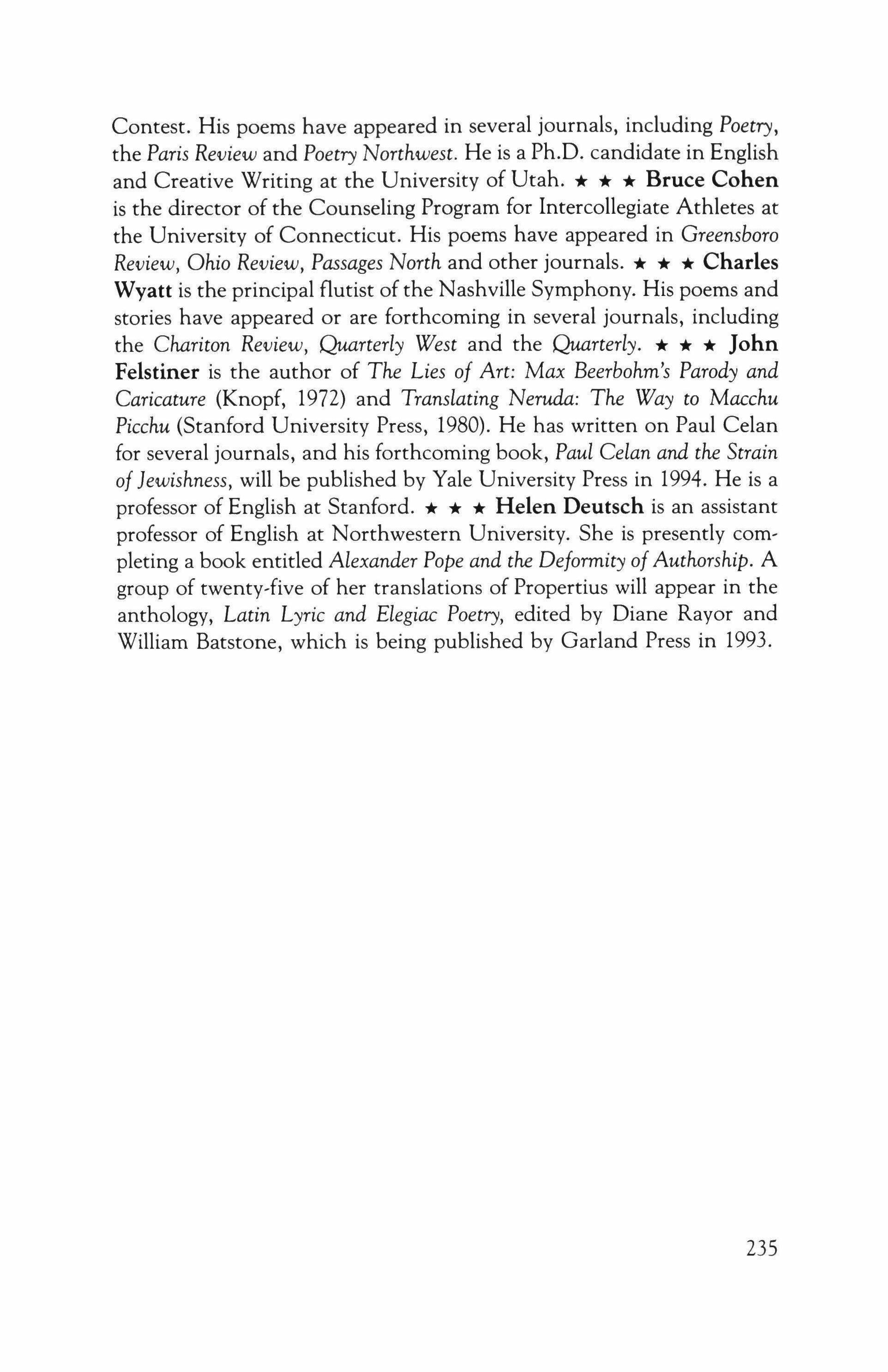
Contest. His poems have appeared in several journals, including Poetry, the Paris Review and Poetry Northwest. He is a Ph.D. candidate in English and Creative Writing at the University of Utah. * * * Bruce Cohen is the director of the Counseling Program for Intercollegiate Athletes at the University of Connecticut. His poems have appeared in Greensboro Review, Ohio Review, Passages North and other journals. * * * Charles Wyatt is the principal flutist of the Nashville Symphony. His poems and stories have appeared or are forthcoming in several journals, including the Chariton Review, Quarterly West and the Quarterly. * * * John Felstiner is the author of The Lies of Art: Max Beerbohm's Parody and Caricature (Knopf, 1972) and Translating Neruda: The Way to Macchu Picchu (Stanford University Press, 1980). He has written on Paul Celan for several journals, and his forthcoming book, Paul Celan and the Strain of ]ewishness, will be published by Yale University Press in 1994. He is a professor of English at Stanford. * * * Helen Deutsch is an assistant professor of English at Northwestern University. She is presently completing a book entitled Alexander Pope and the Deformity ofAuthorship. A group of twenty-five of her translations of Propertius will appear in the anthology, Latin Lyric and Elegiac Poetry, edited by Diane Rayor and William Batstone, which is being published by Garland Press in 1993.
235
Notes on illustrations with Jim Shepard's "Nosferatu"
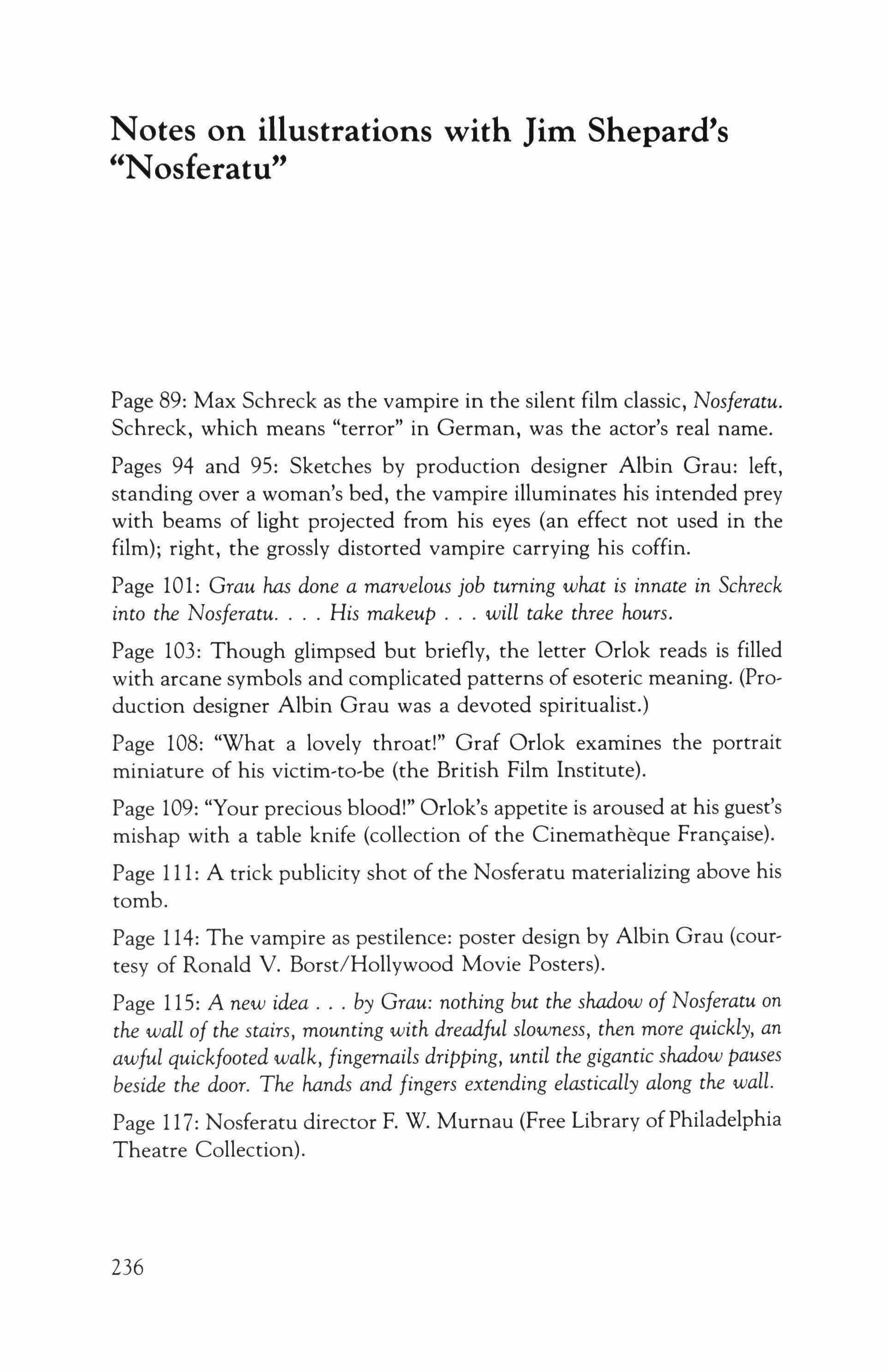
Page 89: Max Schreck as the vampire in the silent film classic, Nosferatu. Schreck, which means "terror" in German, was the actor's real name.
Pages 94 and 95: Sketches by production designer Albin Grau: left, standing over a woman's bed, the vampire illuminates his intended prey with beams of light projected from his eyes (an effect not used in the film); right, the grossly distorted vampire carrying his coffin.
Page 101: Grau has done a marvelous job turning what is innate in Schreck into the Nosferatu His makeup will take three hours.
Page 103: Though glimpsed but briefly, the letter Orlok reads is filled with arcane symbols and complicated patterns of esoteric meaning. (Production designer Albin Grau was a devoted spiritualist.)
Page 108: "What a lovely throat!" Graf Orlok examines the portrait miniature of his victim-to-be (the British Film Institute).
Page 109: "Your precious blood!" Odok's appetite is aroused at his guest's mishap with a table knife (collection of the Cinematheque Francaise).
Page 111: A trick publicity shot of the Nosferatu materializing above his tomb.
Page 114: The vampire as pestilence: poster design by Albin Grau (courtesy of Ronald V. Borsr/Hollvwood Movie Posters).
Page 115: A new idea by Grau: nothing but the shadow of Nosferatu on the wall of the stairs, mounting with dreadful slowness, then more quickly, an awful quickfooted walk, fingernails dripping, until the gigantic shadow pauses beside the door. The hands and fingers extending elastically along the wall.
Page 117: Nosferatu director F. W. Murnau (Free Library of Philadelphia Theatre Collection).
236
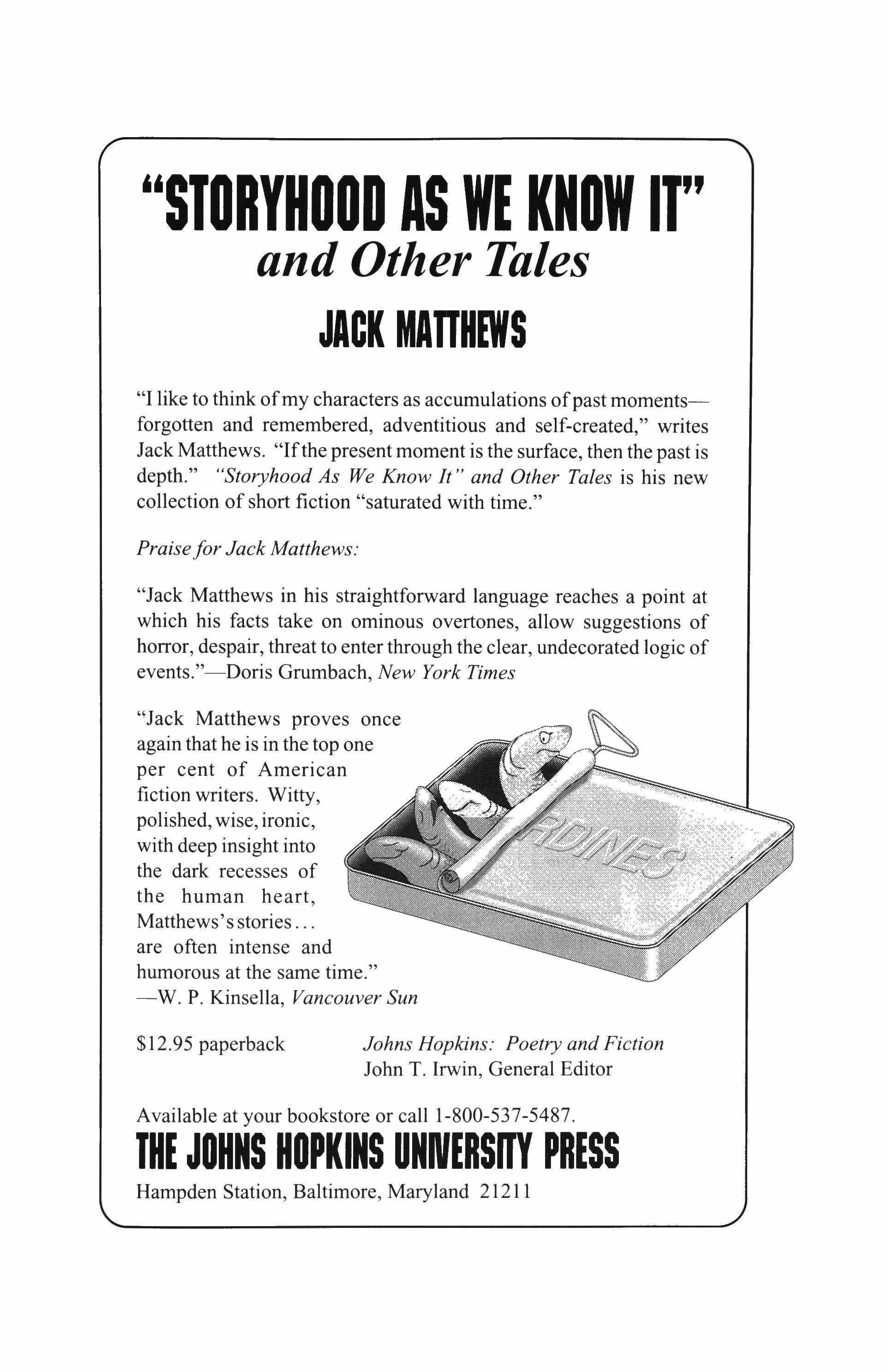
"SI08YHOOO AS WE KNOW II" and Other Tales
JACK MATTHEWS
"I like to think ofmy characters as accumulations ofpast momentsforgotten and remembered, adventitious and self-created," writes Jack Matthews. "Ifthe present moment is the surface, then the past is depth." "Storyhood As We Know It" and Other Tales is his new collection of short fiction "saturated with time."
Praisefor Jack Matthews:
"Jack Matthews in his straightforward language reaches a point at which his facts take on ominous overtones, allow suggestions of horror, despair, threat to enter through the clear, undecorated logic of events."-Doris Grumbach, New York Times
"Jack Matthews proves once again that he is in the top one per cent of American fiction writers. Witty, polished,wise, ironic, with deep insight into the dark recesses of the human heart, Matthews's stories are often intense and humorous at the same time."
-W. P. Kinsella, Vancouver Sun
$12.95 paperback Johns Hopkins: Poetry and Fiction
John T. Irwin, General Editor
Available at your bookstore or call1-800-537-5487. THE JOHNS HOPKINS UNIVERSITY PRESS Hampden Station, Baltimore, Maryland 21211
the modern writer as witness
111111111111
Sflttlall�lt Autobiography
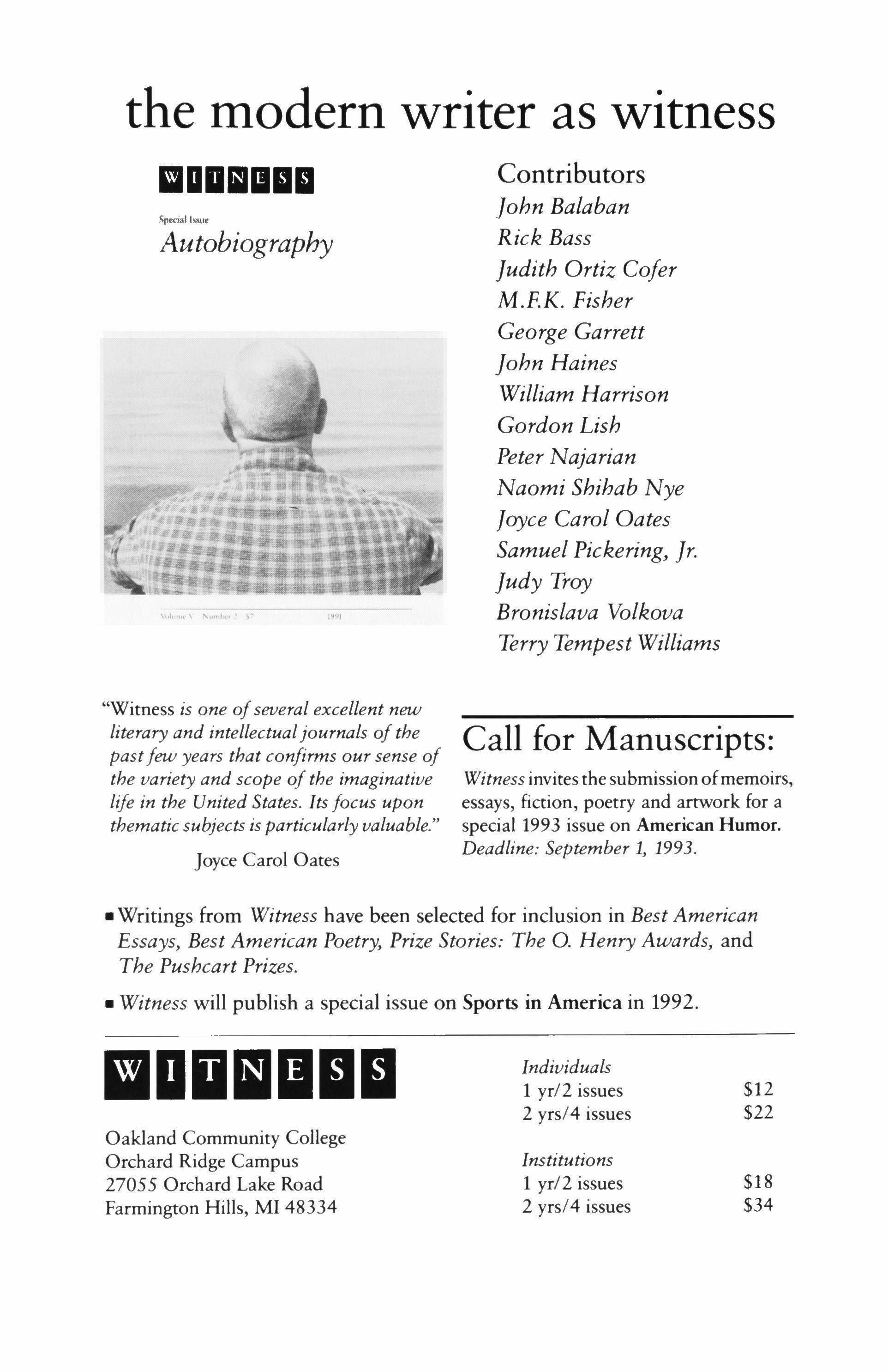
"Witness is one ofseveral excellent new literary and intellectualjournals of the pastfew years that confirms our sense of the variety and scope of the imaginative life in the United States. Its focus upon thematic subjects is particularly valuable."
Joyce Carol Oates
Contributors
John Balaban
Rick Bass
Judith Ortiz Cofer
M.F.K. Fisher
George Garrett
John Haines
William Harrison
Gordon Lish
Peter Najarian
Naomi Shihab Nye
[oyce Carol Oates
Samuel Pickering, Jr.
Judy Tray
Bronislava Valkava
Terry Tempest Williams
Call for Manuscripts:
Witness invites the submission ofmemoirs, essays, fiction, poetry and artwork for a special 1993 issue on American Humor. Deadline: September 1, 1993.
Writings from Witness have been selected for inclusion in Best American Essays, Best American Poetry, Prize Stories: The 0. Henry Awards, and The Pushcart Prizes
• Witness will publish a special issue on Sports in America in 1992.
IIlallill Oakland Community College Orchard Ridge Campus 27055 Orchard Lake Road Farmington Hills, MI 48334 Individuals 1 yr/2 issues 2 yrs/4 issues $12 $22 Institutions 1 yrl2 issues 2 yrs/4 issues $18 $34
Featuring work by:
Alice
Adams
John Ashbery
Madison Smartt Bell
Amy Clampitt Tom Disch
Marilyn Hacker
Donald Hall
Phillip Lopate
Clarence Major David Mamet
Joyce Carol Oates
Francine Prose
Isaac Bashcvis Singer
Gilbert Sorrentino
Elizabeth Spencer
John Updike
Peter Viereck

BOULEVARD
"One of the best literary magazines in America" The Philadelphia Inquirer
"Among scores of literary titles, one of the most innovative is Boulevard." Library Journal
"Boulevard is the kind of magazine that publishes not just good fiction and poetry but works of compelling fact." The Washington Post
"Boulevard is what a literary magazine should be."
Literary Magazine Review
"A literary delight. A treasure trove." USA Today
"This is a consistently outstanding publication, perhaps the best of the recently founded literary reviews." Magazines for Libraries
Subscribe now at these special prices!
Three issues $12 Six issues $20 Nine issues $25 For subscription outside the Ll.S; add $3.00.
NAME
ADDRESS
CITY/STATE/ZIP CODE
Make checks payable to Opojaz, Inc. c/o Richard Burgin, P.O. Box 30386, Phila., Pa 19103
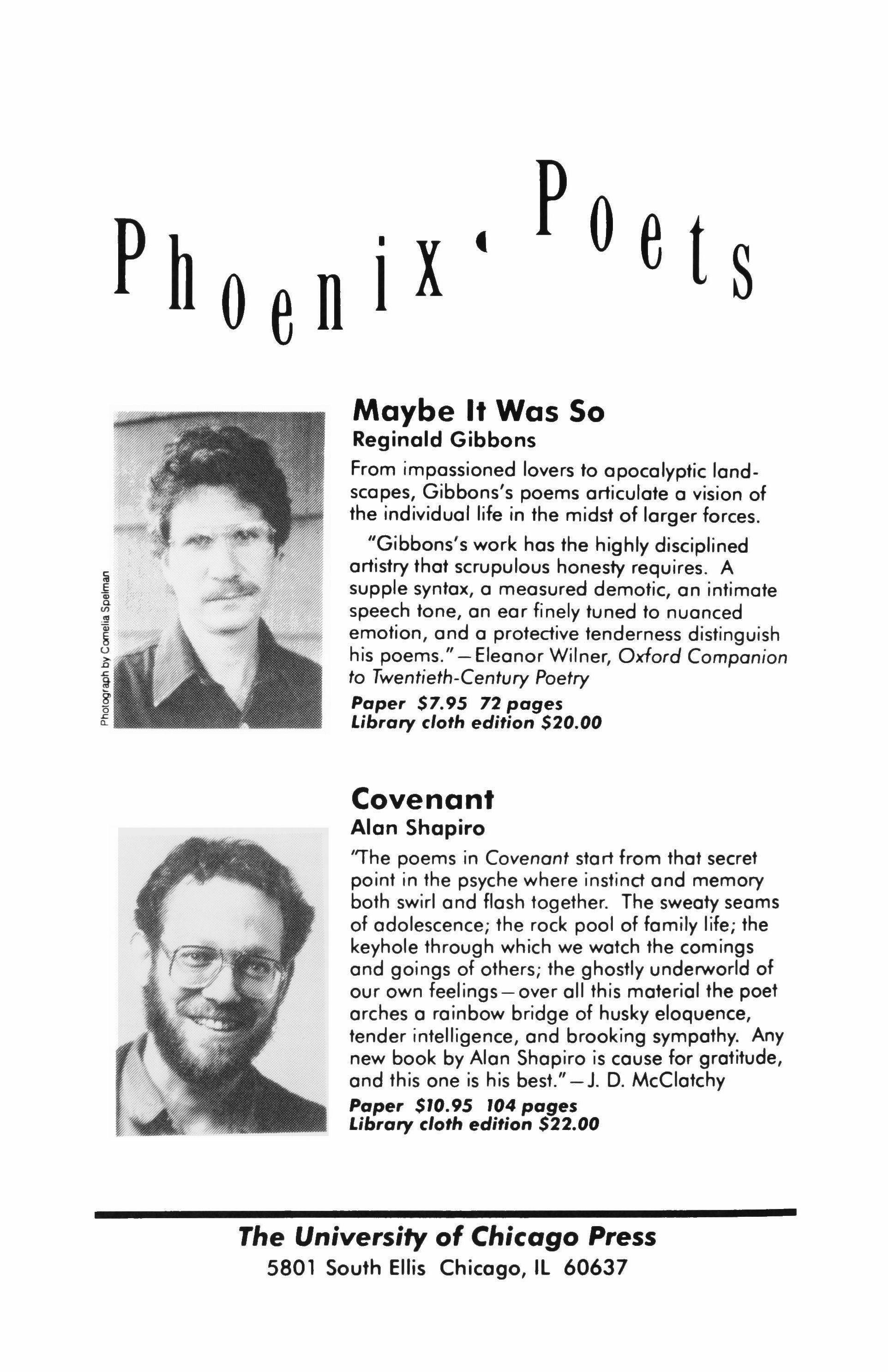
Maybe It Was So Reginald Gibbons
From impassioned lovers to apocalyptic landscapes, Gibbons's poems articulate a vision of the individual life in the midst of larger forces.
"Gibbons's work has the highly disciplined artistry that scrupulous honesty requires. A supple syntax, a measured demotic, an intimate speech tone, an ear finely tuned to nuanced emotion, and a protective tenderness distinguish his poems." -Eleanor Wilner, Cxiord Companion to Twentieth-Century Poetry
Paper $7.95 72 pages Library cloth edition $20.00
Covenant
Alan Shapiro
"The poems in Covenant start from that secret point in the psyche where instinct and memory both swirl and flash together. The sweaty seams of adolescence; the rock pool of family life; the keyhole through which we watch the comings and goings of others; the ghostly underworld of our own feelings-over all this material the poet arches a rainbow bridge of husky eloquence, tender intelligence, and brooking sympathy. Any new book by Alan Shapiro is cause for gratitude, and this one is his best." -J. D. McClatchy
Paper $JO.95 J04 pages Library cloth edition $22.00
The University of Chicago Press 5801 South Ellis Chicago, IL 60637
THE 1992 1993 PUSHCART PRZE
BEST OFTHE SMALL PRESSES
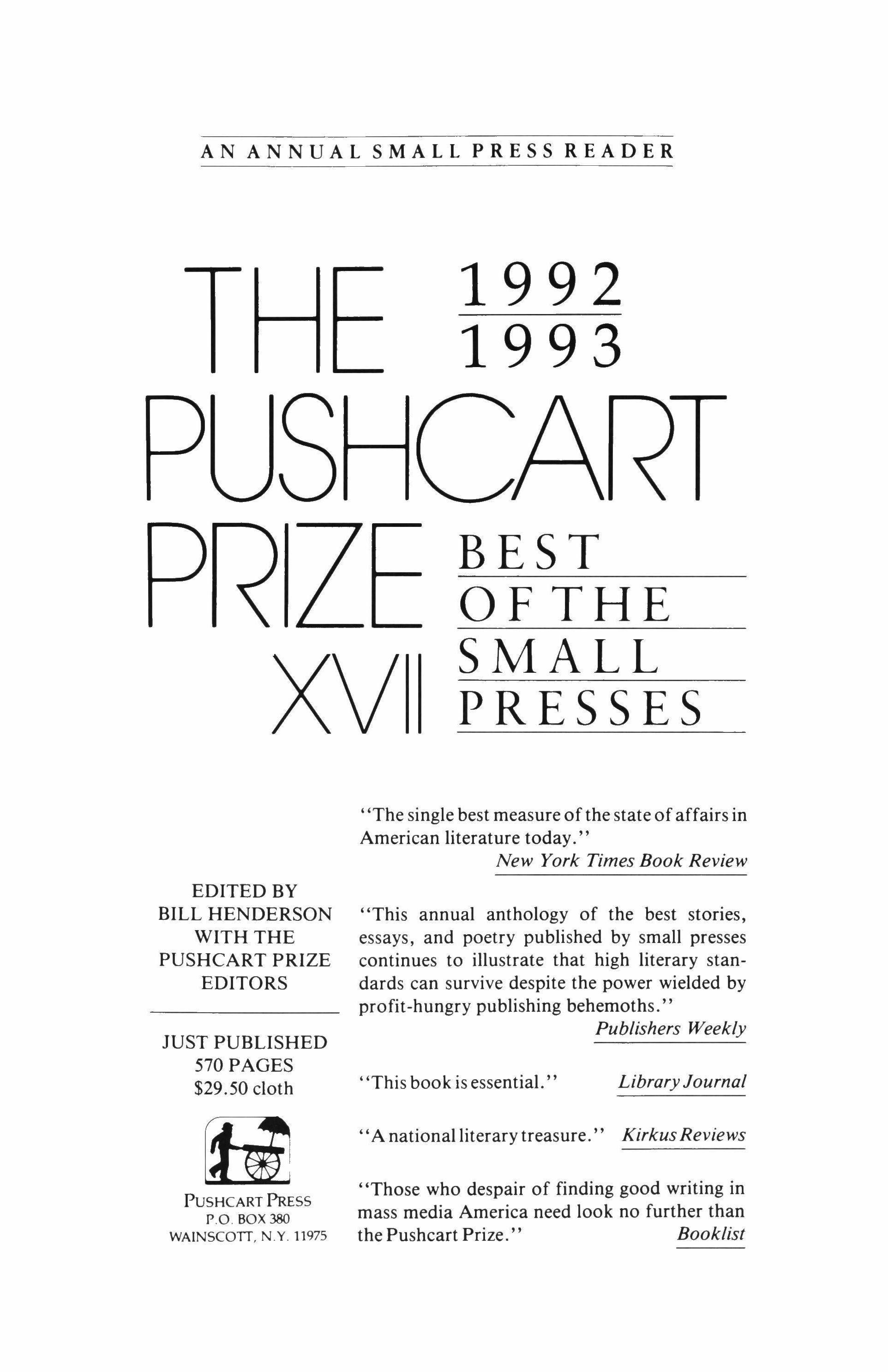
EDITED BY BILL HENDERSON WITH THE PUSHCART PRIZE
EDITORS
JUST PUBLISHED 570 PAGES
$29.50 cloth
PUSHCART PRESS
P.O. BOX 380 WAINSCOTT, N.Y. 11975
"The single best measure of the state of affairs in American literature today." New York Times Book Review
"This annual anthology of the best stories, essays, and poetry published by small presses continues to illustrate that high literary standards can survive despite the power wielded by profit-hungry publishing behemoths." Publishers Weekly
"This book is essential." Library Journal
"A national literary treasure." KirkusReviews
"Those who despair of finding good writing in mass media America need look no further than the Pushcart Prize." Booklist
AN
SMALL PRESS READER
xv
ANNUAL
HEAD ON OUT WITH CNtw£ttttrs
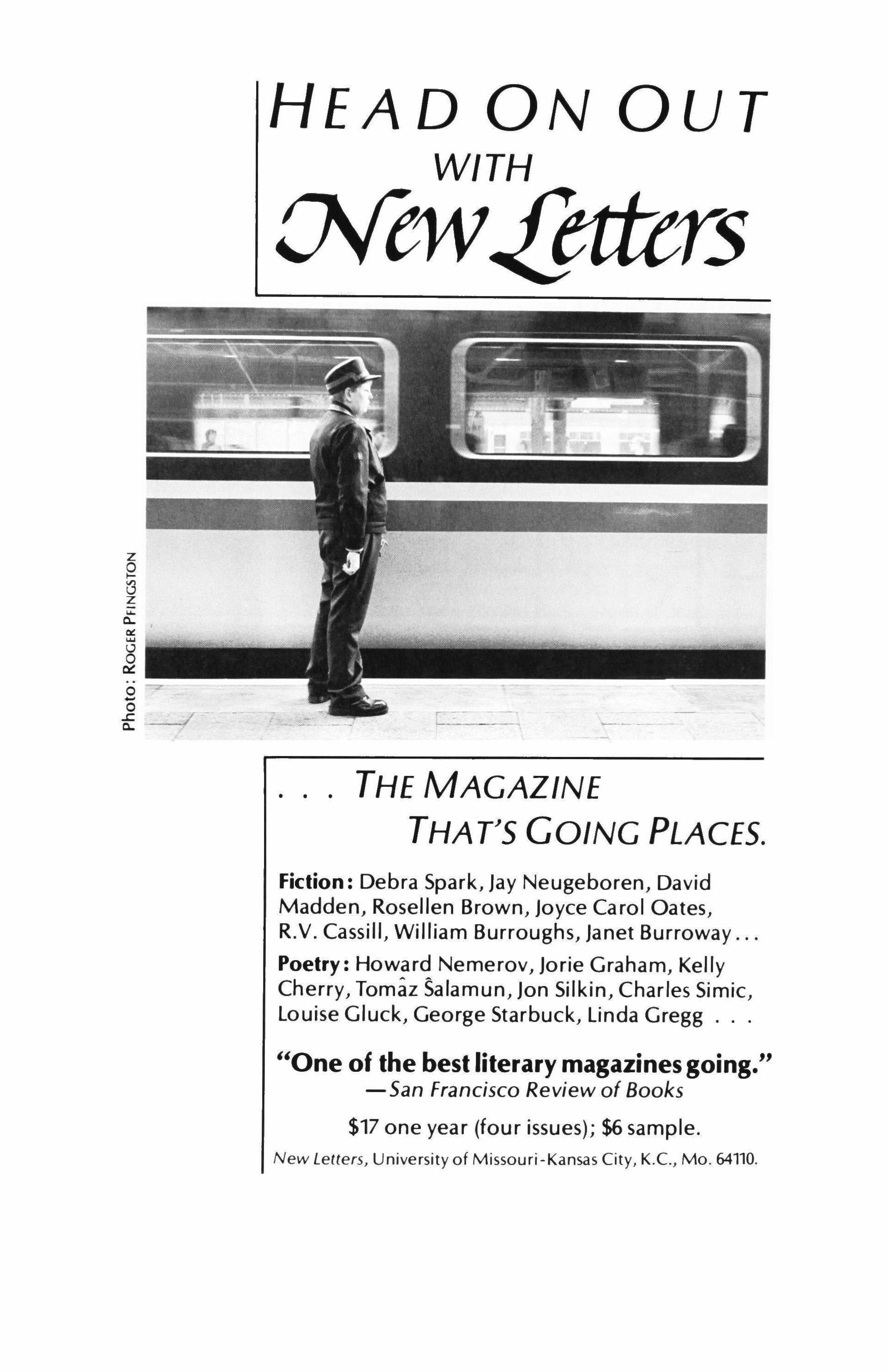
THE MAGAZINE THAT�S GOING PLACES.
Fiction: Debra Spark, Jay Neugeboren, David Madden, Rosellen Brown, Joyce Carol Oates, R.V. Cassill, William Burroughs, Janet Burroway
Poetry: Howard Nemerov, lorie Graham, Kelly Cherry, Tornaz Salamun, Jon Silkin, Charles Simic, Louise Gluck, George Starbuck, Linda Gregg
"One of the best literarymagazinesgoing." -San Francisco Review of Books
$17 one year (four issues); $6 sample.
New Letters, University of Missouri -Kansas City, K.C., Mo. 64110.
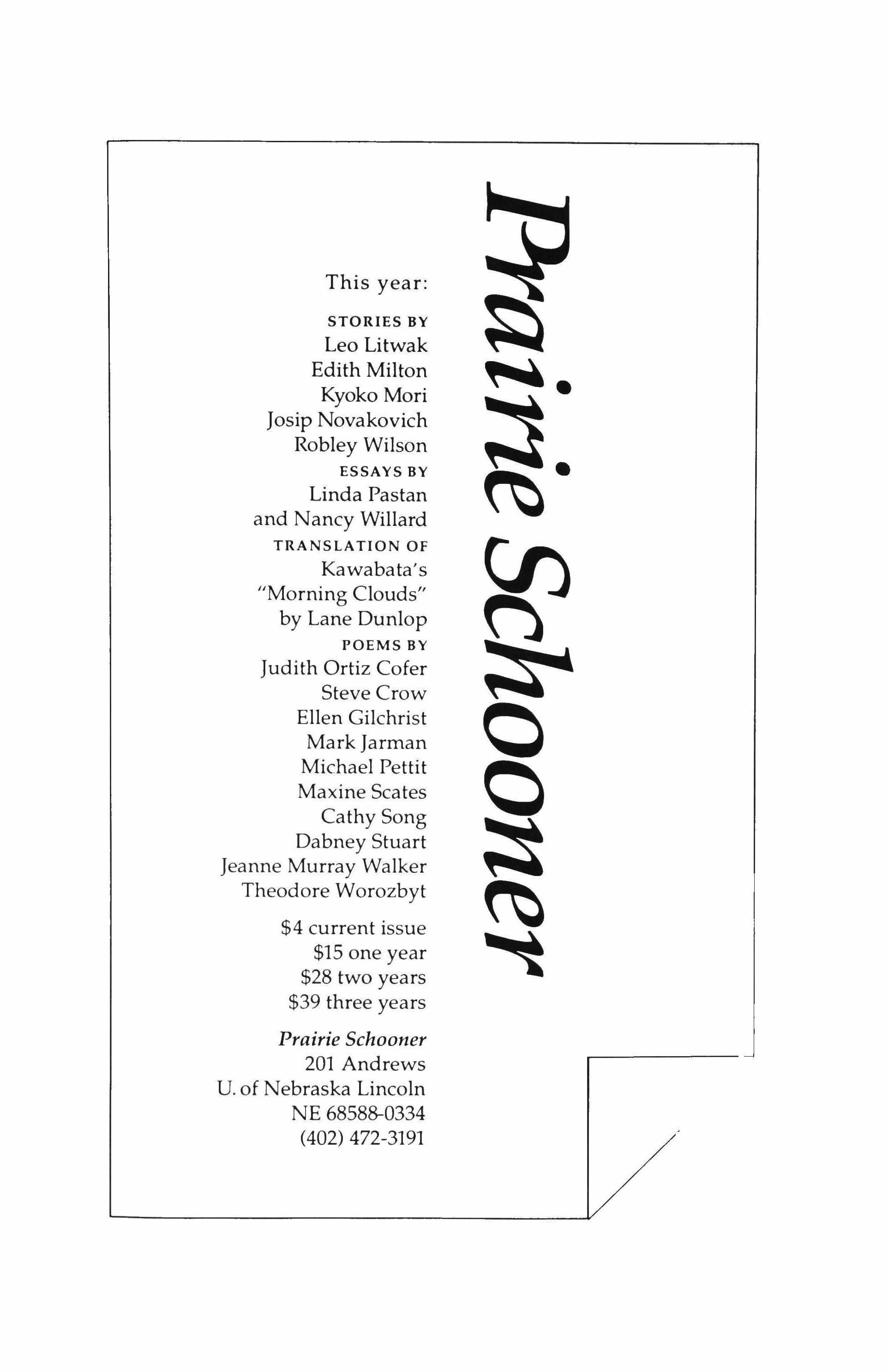
This year:
STORIES BY
Leo Litwak
Edith Milton
Kyoko Mori
[osip Novakovich
Robley Wilson
ESSAYS BY
Linda Pastan and Nancy Willard
TRANSLATION OF
Kawabata's "Morning Clouds" by Lane Dunlop
POEMS BY
Judith Ortiz Cofer
Steve Crow
Ellen Gilchrist
Mark Jarman
Michael Pettit
Maxine Scates
Cathy Song
Dabney Stuart
Jeanne Murray Walker
Theodore Worozbyt
$4 current issue
$15 one year
$28 two years
$39 three years
Prairie Schooner
201 Andrews
U. of Nebraska Lincoln NE 68588-0334
(402) 472-3191
�
•
;:t
� •
�
�
0
0
;::
�
�
/
Harriet Rubin's Mother's Wooden Hand
Susan Hahn
Harriet Rubins Mothers Wooden Hand is a superb book, passionate and moving, yet put together with considerable elegance and control. I found it gripping and consistently involving. A very remarkable first book."-Frank Bidort
Paper $8.95 96 pages
Cloth $22.00
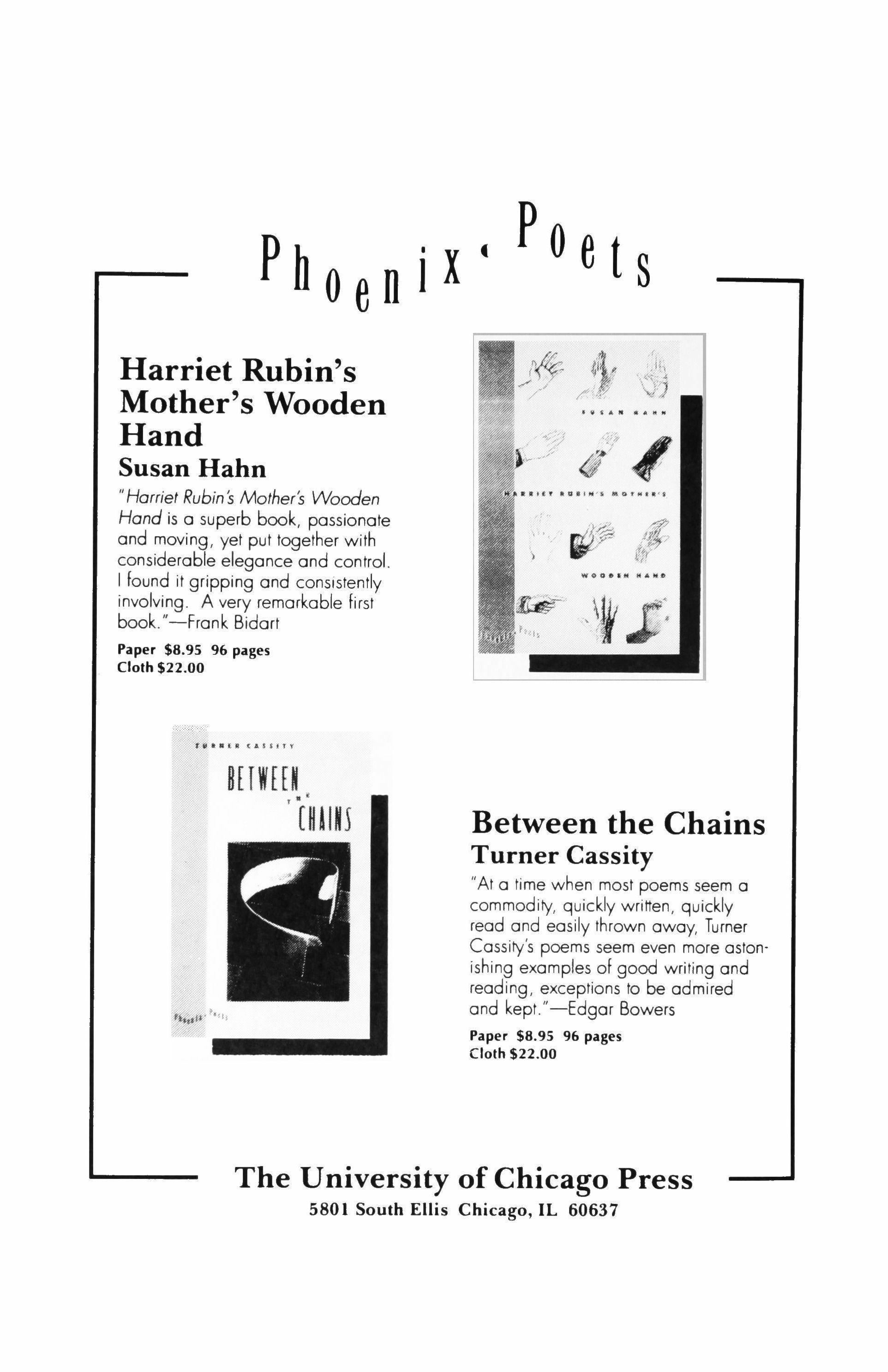
Between the Chains
Turner Cassity
"At a time when most poems seem a commodity, quickly written, quickly read and easily thrown away, Turner Cassity's poems seem even more astonishing examples of good writing and reading, exceptions to be admired and kept."-Edgar Bowers
Paper $8.95 9& pages
Cloth $22.00
I[lW[[� 'r�m)
University of Chicago Press 580 I South Ellis Chicago, IL 60637
The
THE THREEPENNY REVIEW
"The Threepenny Review, launched in 1980, has built up a healthy national prestige, attracting contributions from authors such as Susan Sontag and Gore Vidal Published quarterly, The Threepenny Review is ample and handsome, in appearance not unlike the New York Review ofBooks. But its contents are those of an oldstyle little magazine-short stories mingled with poetry, memoirs and discursive essays spanning the culture gamut-and the paper has little of the Anglophilia which has always characterized the NYRB: this is another America speaking."
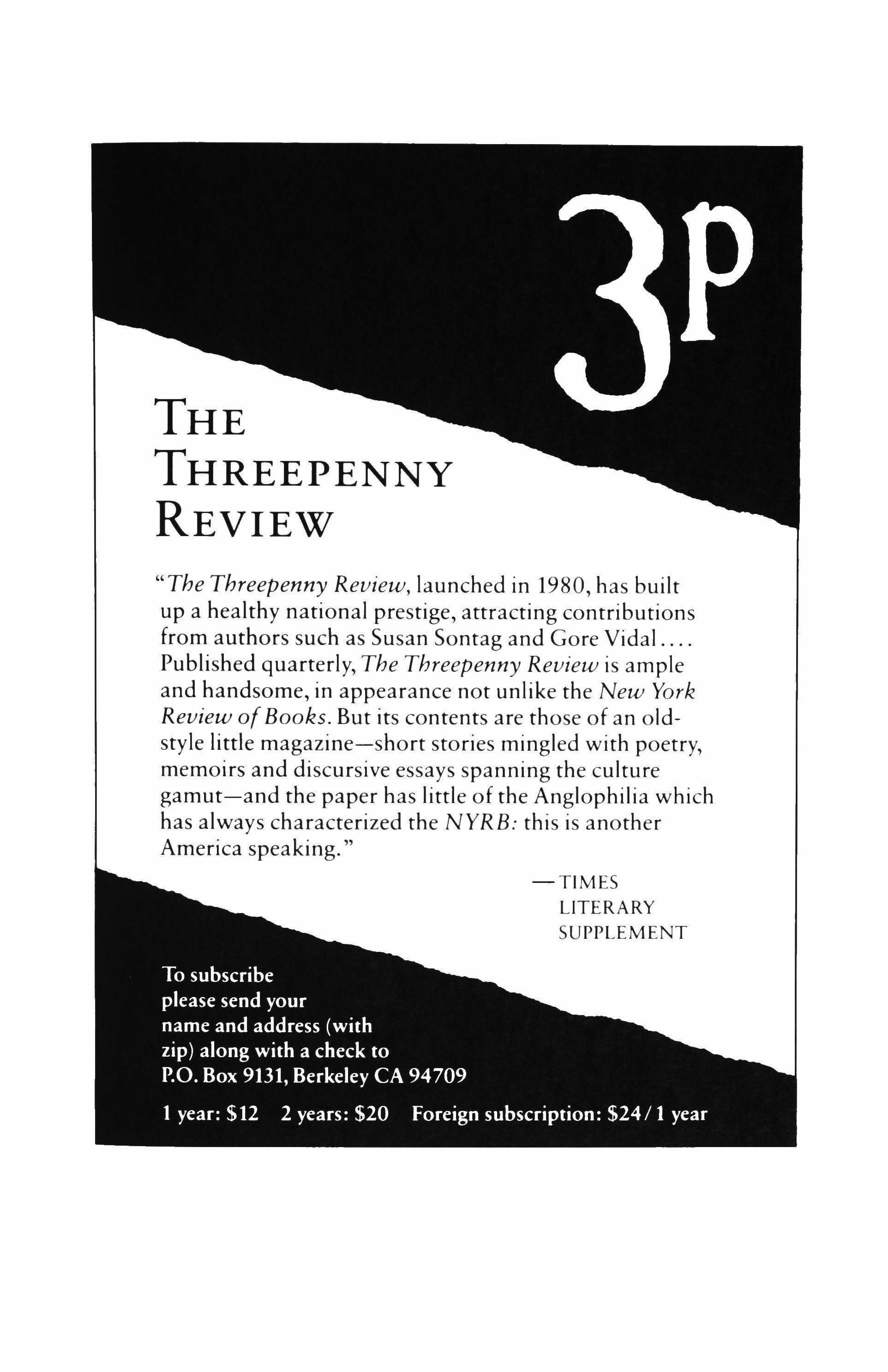
To subscribe please send your name and address (with zip) along with a check to P.O. Box 9131, Berkeley CA 94709
1 year: $12 2 years: $20 Foreign subscription: $2411 year
-TIMES LITERARY SUPPLEMENT
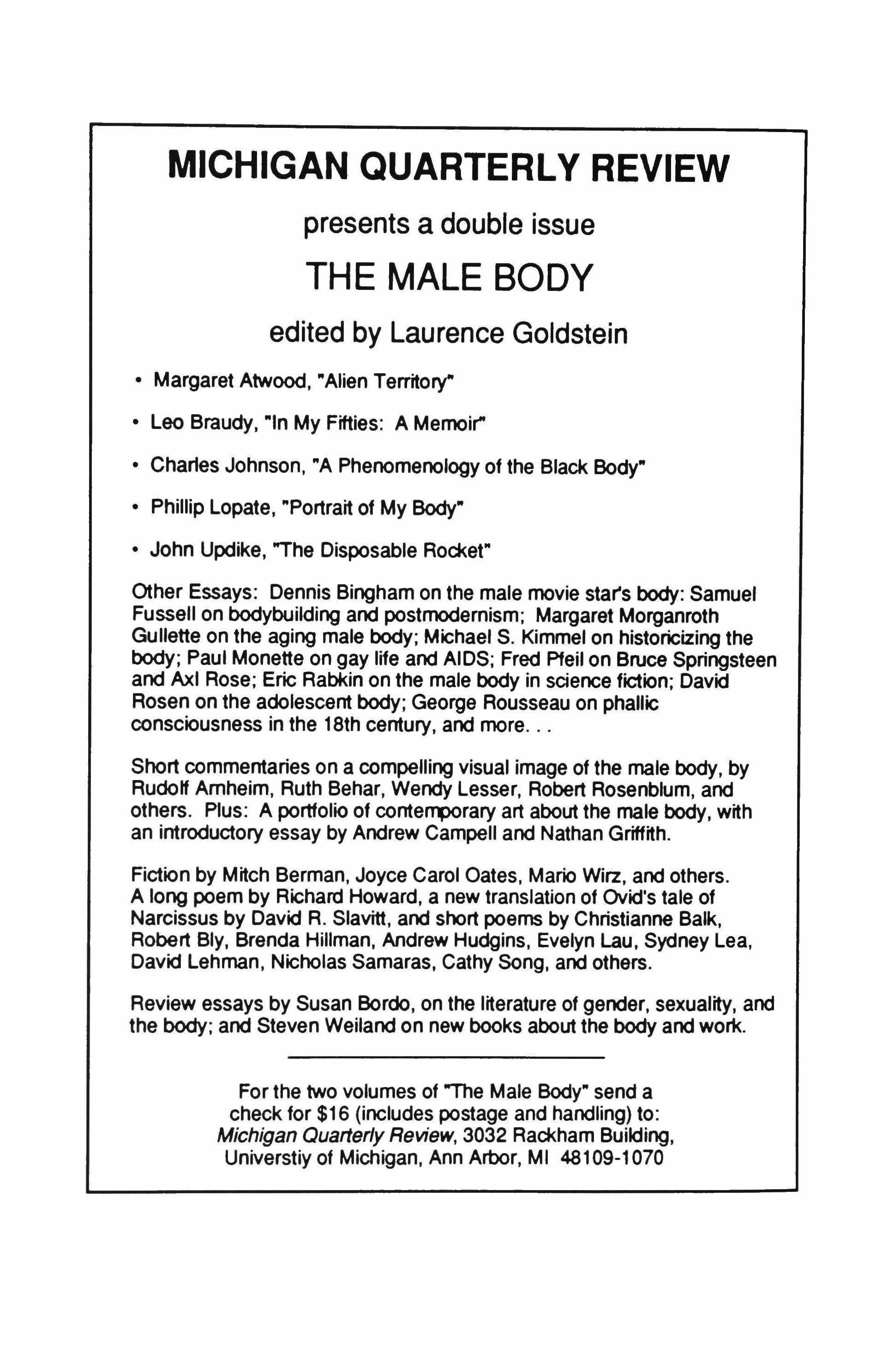
MICHIGAN QUARTERLY REVIEW
presents a double issue THE
MALE BODY
edited by Laurence Goldstein
Margaret Atwood, "Alien Territory"
Leo Braudy, "In My Fifties: A Memoir"
Charles Johnson, "A Phenomenology of the Black Body"
Phillip Lopate, "Portrait of My Body"
John Updike, "The Disposable Rocket"
Other Essays: Dennis Bingham on the male movie star's body: Samuel Fussell on bodybuilding and postmodemism; Margaret Morganroth Gullette on the aging male body; Michael S. Kimmel on historicizing the body; Paul Monette on gay life and AIDS; Fred Pfeil on Bruce Springsteen and Axl Rose; Eric Rabkin on the male body in science fiction; David Rosen on the adolescent body; George Rousseau on phallic consciousness in the 18th century, and more
Short commentaries on a compelling visual image of the male body, by Rudolf Amheim, Ruth Behar, Wendy Lesser, Robert Rosenblum, and others. Plus: A portfolio of contemporary art about the male body, with an introductory essay by Andrew Campell and Nathan Griffith.
Fiction by Mitch Berman, Joyce Carol Oates, Mario Wirz, and others.
A long poem by Richard Howard, a new translation of Ovid's tale of Narcissus by David R. Siavitt, and short poems by Christianne Balk, Robert Bly, Brenda Hillman, Andrew Hudgins, Evelyn Lau, Sydney Lea, David Lehman, Nicholas Samaras, Cathy Song, and others.
Review essays by Susan Bordo, on the literature of gender, sexuality, and the body; and Steven Weiland on new books about the body and work.
For the two volumes of "The Male Body" send a check for $16 (includes postage and handling) to: Michigan Quarterly Review, 3032 Rackham Building, Universtiyof Michigan, Ann Arbor, MI 48109-1070
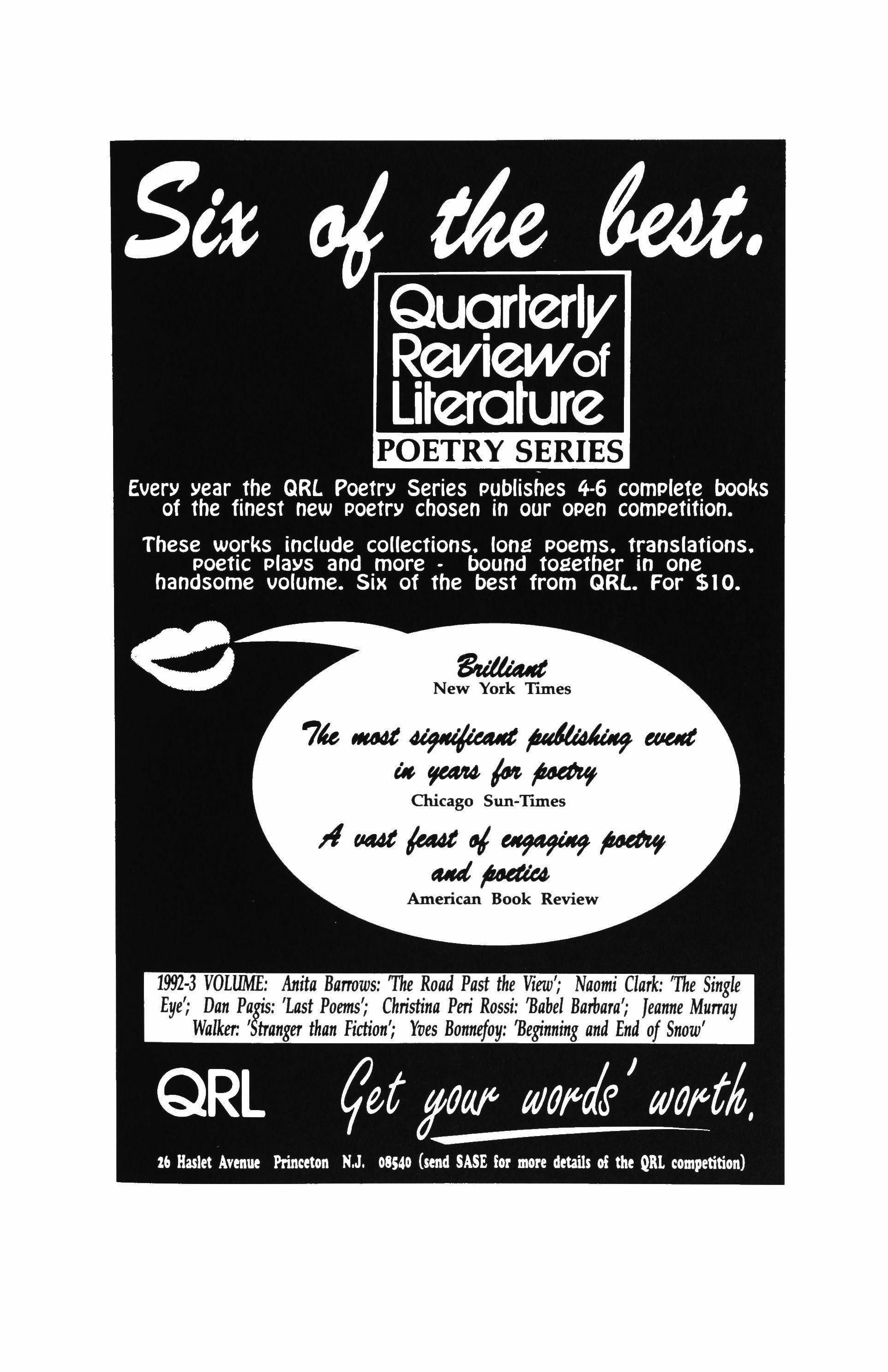
� New York Times 71e IIUI4t 4W�1It �"'" etJeIIt fit, �/M� Chicago Sun-Times II fI44t /eMt " eM94fJli19 � 4IIfJ fl,e/ie4 American Book Review
IT WAS FEVER THAT MADE THE WORLD
Jim Powell
"His title burns away everywhere in the volume, in the fevers of eros, divination, memory, destruction, and grief. "Page for page, there is more sheer fine, clear, yet syntactically subtle and metaphorically gorgeous writing in Powell than 1 have seen in some time."
- Mary Kinzie
Paper $8.95 88 pages Cloth $20.00
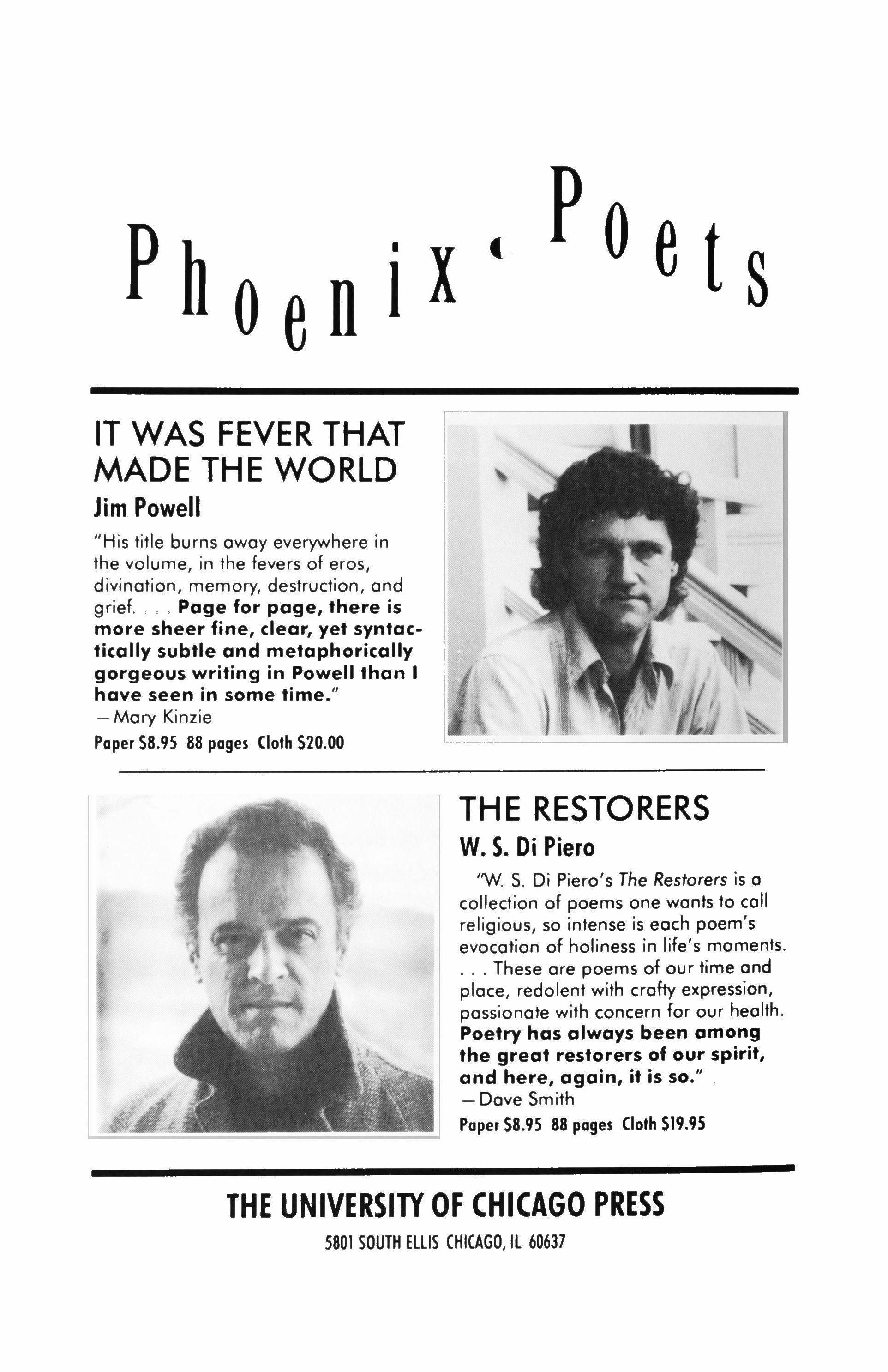
THE RESTORERS
w. S. Di Piero
'W. S. Di Piero's The Restorers is a collection of poems one wonts to call religious, so intense is each poem's evocation of holiness in life's moments
These are poems of our time and place, redolent with crafty expression, passionate with concern for our health. Poetry has always been among the great restorers of our spirit, and here, again, it is so."
- Dove Smith
Paper $8.95 88 pages Cloth $19.95
(
THE UNIVERSITY OF CHICAGO PRESS 5801 SOUTH ELLIS CHICAGO,ll 60637
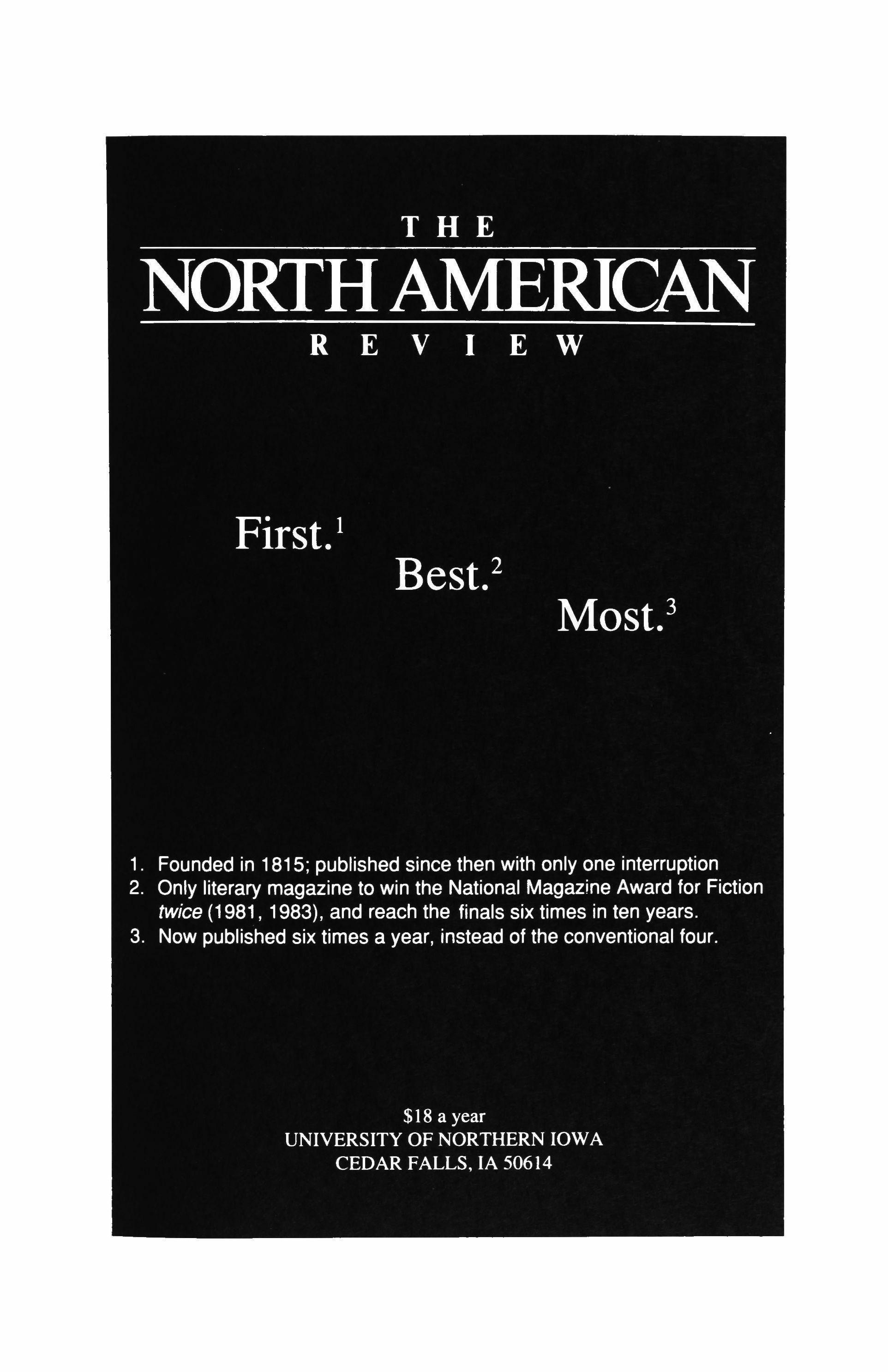
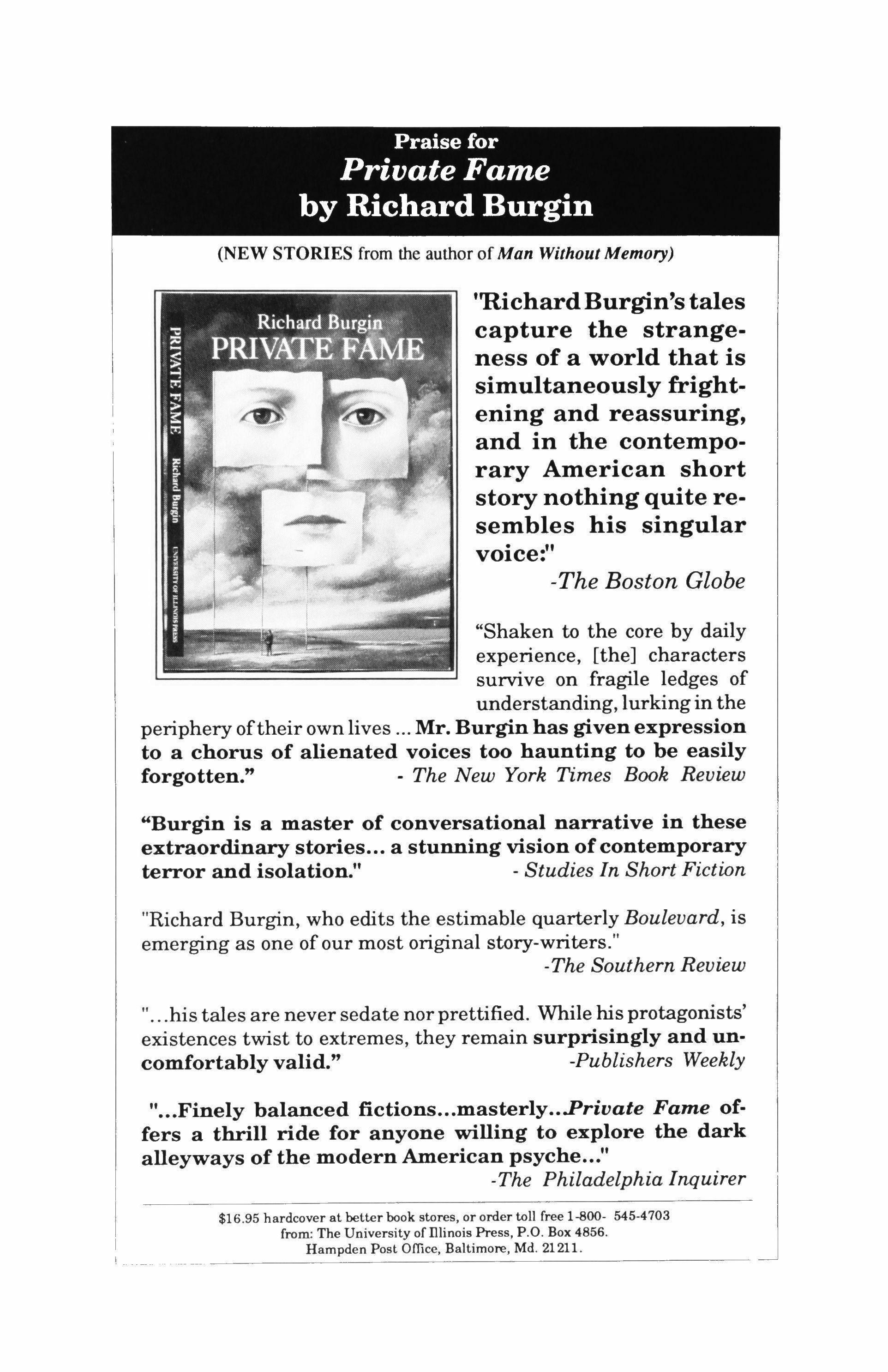
Praise for Private Fame
by Richard Burgin
(NEW STORIES from the author of Man Without Memory)
''Richard Burgin's tales capture the strangeness of a world that is simultaneously frightening and reassuring, and in the contemporary American short story nothing quite resembles his singular voice:"
- The Boston Globe
"Shaken to the core by daily experience, [the] characters survive on fragile ledges of understanding, lurking in the periphery oftheir own lives Mr. Burgin has given expression to a chorus of alienated voices too haunting to be easily forgotten."
- The New York Times Book Review
"Burgin is a master of conversational narrative in these extraordinary stories a stunning vision of contemporary terror and isolation."
- Studies In Short Fiction
"Richard Burgin, who edits the estimable quarterly Boulevard, is emerging as one of our most original story-writers."
- The Southern Review
his tales are never sedate nor prettified. While his protagonists' existences twist to extremes, they remain surprisingly and uncomfortably valid." -Publishers Weekly
Finely balanced fictions masterly .Private Fame offers a thrill ride for anyone willing to explore the dark alleyways of the modern American psyche
-The Philadelphia Inquirer
$16.95 hardcover at better book stores, or order toll free 1-800- 545-4703 from: The University of Dlinois Press, P.O. Box 4856. Hampden Post Office, Baltimore, Md. 21211.
"Fresh news from old geographies "
-Voice Literary Supplement
Meena Alexander Agha Shahid Ali
CHICAGO REVIEW
Urmila Banerjee
Vinay Dharwadker
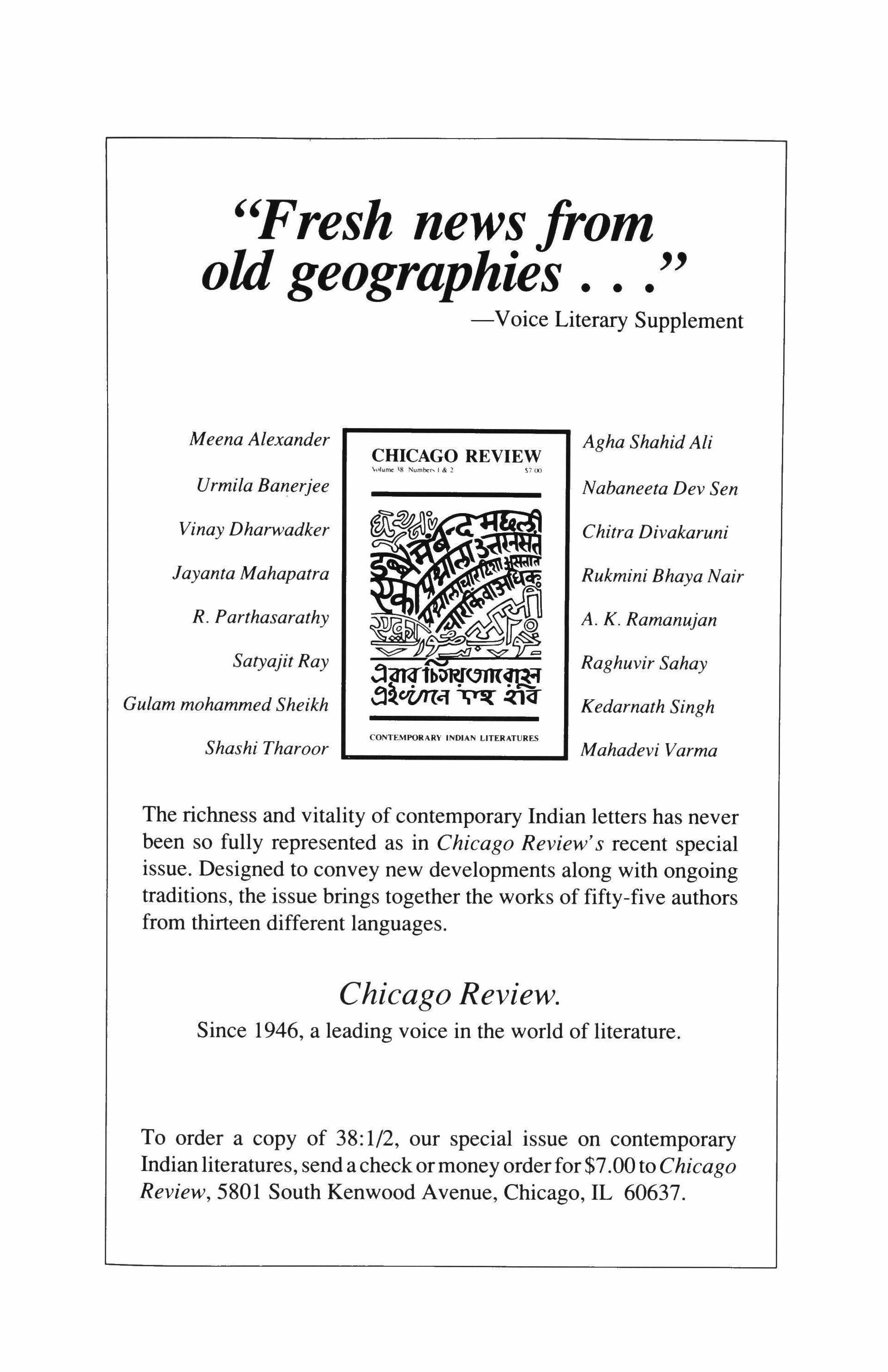
Nabaneeta Dev Sen
Chitra Divakaruni
Jayanta Mahapatra Rukmini Bhaya Nair
R. Parthasarathy
Satyajit Ray
Gulam mohammed Sheikh
Shashi Tharoor
A. K. Ramanujan
Raghuvir Sahay
Kedarnath Singh
Mahadevi Varma
The richness and vitality of contemporary Indian letters has never been so fully represented as in Chicago Review's recent special issue. Designed to convey new developments along with ongoing traditions, the issue brings together the works of fifty-five authors from thirteen different languages.
Chicago Review.
Since 1946, a leading voice in the world of literature.
To order a copy of 38: 1/2, our special issue on contemporary Indian literatures, send a check or money orderfor $7.00 to Chicago Review, 5801 South Kenwood Avenue, Chicago, IL 60637.
""Iume Number-. & 2
CONTEMPORARY INDIAN LITERATURES

ZYZZYVA
puts West Coast writers on the map
Bill BWh Dick Bunes David Bu1h lUmDn C.
Benmn Bill BelkIOD Lucia IIedi.n OlD Bem Ailn Bemhtimcr
BH ChuIes Bocadoro Cum Bloch Bill Bruid KriI Bnnd"'inuzer JUDe! M Brmti,,1wn
Bnwly Kate Bnvemun SIDIIIIIU Brmner Peter Brett JUDe! Brwghton Peter Browni" Debonh Bruner
Do¥ Bullia Lollll Dee Cemntcs Marilyn CbmIIcr Neeli CherkoYlki Marilyn Chin ED( Cbod: Thom» CIuiIttoIeD Tom Cluk Anthony Cllrvoe MicbeIlc T. Clinton BenjIJllin E. Colby WlDda
Colarwt Gillian Conoley Denni& Cooper Alfn:d CoppeI Peter Coyote Alev Lytle Ctuutitr Bevtrly
Ihllen John DlIIiel Miduel DaYldaon Jean Day Deniae Dee Gene Demus W.s. Di Pi= Cnig L Dill
WJ.!lilDl Dickey Sharon DoubiJgo Ailn Dundcs Stephen £Melllln Gtolle Evw Lawrence Fcrlinghetti
MF.K. Fisher Claudia Sti!hmn Fnnb Lym Freed Judith Fn:emm JoUlIl Freiwald BenjlJllin Fnedhnder
Gloria Frym Blair Fuller G.G. Gach Teu Gllhgbu Abnm Geo'F Amy G� Mudu Gia Bmy GiB'onl Molly Giles Reno Ginn! Robert GlUck ChWs Shelby Goerlitz Rodty GOmez Guillermo GOmez·Pela Jill Gonet ChWs Goodrich Philip Km Gotanda Judy Gnhn SlDIuel Green Ridwd Grom"er Thom GUllI John
IUiIa SlDI Hamill Joseph HlDIeD awlbnlirun Katharin, Ibn:r David HuN CuI. Hmymm Robert HlII
Robert IUult Floile Klem He2ly Lyo Htjini1n Dale Herd Junes Herndon.Jum Felipe HmmP. Htyoen BItIUIa Hillmm Jme Ibhfield Gurett Ho"&'l Junes D. HoUlton Fmny HoWl: Andrew Hoyem In. S. Omnia Joyce
Jenkim BudJom. CharlesJolllllon Aliu JonesJoe IUru: IUn:n Kubo Lmy Keamey Lawn:nu Keel SIIWI Kennedy
Stephen Kaaler Morpn K.sttr Kevin Killim � Mi Kim Carolyn Kim Edwvd Kleimclmidt August
Khnuhlcr Peter Koch Aroold Koder John Kmh JlDItI Klwoe C.H Kwod: John L'Heureux SalYatore La I'IIm1
Philip Lammtia DlIIiel J. LangtonJeremy Lamer Carolyn
Lw Dorilnne Lwx Urbi LayaclU Ursula LeGuin J� Laii, DeniIe I.tverto, David Levi StnUII Pbilip Levine
GClby Lim Leo Litw3k Sanh LiuBmy Lopez WIDI Tei I..cpclary '1' 1 Caul wtilcn Dol yel ill ZYZZWA:
Lwn Sandy Lydon NlIIwtiel Mackey Oum:e Mljo, Ali:e Adan DmI AllIin Jean M AIld lUy �
Devonh Majo, Tom Mandel WillWn M Mmdel Morton T.CBoyle Ray Bndluy 0mIrs BuknwIki Etlran Cmin
Mln:w SttUnie MlrliI Jack Mlnhill Vu:to, L. M1Itinot fkrb c..n Mi:Iuel Caban Pat Comuy Pete DcII!er]om
Miclael Mo:C1un: Bnan MMrmidt Rutiwtru: Lum Mo:Cwm omm Dim: Di Ptima HmieU Doerr .JoIa Gn:gory
Robert Mo:DowelJ Jolm M�ally Smdn M�OOson Leotwd Dume W_ &.non CW Fdd LIa:y I'oIIug Mory
Mtdaels Ja= Miller Cr.emw Mil [mice Miritibni Jolm GlitJkill Leorwd G3nlM W_ Gillon Herbert Gokl
Mitchell Step� Mild!ell Chmic Monp Wright Moms Wb Goldmm Beih GUidteon Olkley Ibll Muk
JOII Mowry Mo:liou Myti"er Nuha Nilil Pete( N�UWl HdJllll 0- jobtJon Ken Kcsey "-. LaMott Ella
Leotwd Nathsn H.eruy Noya TIDl NlIIIIIllly JUDe! J. Wlml Armiste.d Mlupin Cyn Mtndden Terry OGndy John O'Keefe "-.gret Ogden Robert Onop' Mo:MilbnJesaMitimlJoae�BhmtiMlU!j= Miclud I'I.hw Walter Plvli� Derek Pell Nidlobs Ray � Kem NUll! Dima OHe!ir 1illi: ORo Perella Robert Peters Brenda Peterson WhinEy Quo Thaaus PyndIID JonaIhm Ibhut Join IUthleen pbeifer Fnnces Phillip' Cecile Pined, Rodty Tom Robbin. Ricltanl RocItigw:l Jerome Hury Pollinhom JlDIes PoUau Randall Pot" Rotltonbe!z Oville Sc:hdl David Sbields Kim Sl>fiDrd Arthur Quinn Leroy V. Quintam CuI Ihlo" Wt!6am Sdlrd g,dby Steelo Dlridle Steelo S. 0r1ml0 Ramirez S"P� Ratcliffe SIIWI Rawlins Wa!ba: �Amy T joy'" Thlll1jllll1 PlUp WlDlen
Adnerme Rj(h Rus Riviere M.C. Roberts Kit � "-. WIlUmJ • wa.m Sbzv.n Wq
Rolnnaon Stephen Rodefer Lawrence Rogm
Curullt Roy Vern Rulllh Kay Ryan Ann Marie SlDIP'"n Elba Sinclt<1 Ridurd Saunders T,d S,vimr Leslie Sc:ilipino Donald Scbenker Laun Schif Brenda Din Sc:hildgen R.Sc:hluter Dennis Sdunitz P�re
Fred Schowalter Ibrt SchulI Carolyn See Jolm T. SelaWlky Tom Sexton Lindsey Shere Jolm Shirley
Aaron Shurin Ron S'illillWlJohn Oliver Simon Jack Skelley Edwvd Snullfield Mark Smallwood Martin
Cruz Smith Guy Snyder DlIIiel Solomon C,thy Song Gilbert So"""tino Guy Soto Albert SpeD"" Mlnlyn Sllblein TImothy Sttde Lin M SIriI1llWl Jolm Sttpp� Fnnk Sttwvt Jwia Stone Ron Slrickhnd Colt Swenoen F.linbeth Tallent Mary TallMounllin Kttuili Twhuhi Jolm
ThOllW But Thurber s.J1ie T...w. Stephan To"" Mike Tugglt Jolm VlD dOl' Z= Nance Van WlDdtei Vi(1Dt E. VilhseJ1o, Step� Vm=t Genld V=our
WillWn T. Vollmm Muy Micluel Wagw Alice Walker David Rllns Wallace
ll'llll Wallem Christopher wudtn Buret! Watttn IUthleen W,aver Jolm V. Wdson John WIll< Michael Wolfe Terry Wolverton John Woodall ThoIDll Edwin Woodhowe Dwi&ht Yales Fci y, Guy Young
IUIhy Mer Opall'l.hw Adi&a Eed Admn FnncilEO X. AWaln CbriIlopbu AImndcr Peter Alwnder Sherman
AIJ.n Inbd AIlmL: Calhym Alper! Miclud Amn.aan Don Alber Joe BUlb
Alexio P.w. GUllI
Marvin Bell Miclud
BeD Dodie
Bwlilta
S.
Bdhmy SIm
Ben.1.ein
LiA
Gina Beriault DIwz
Leo
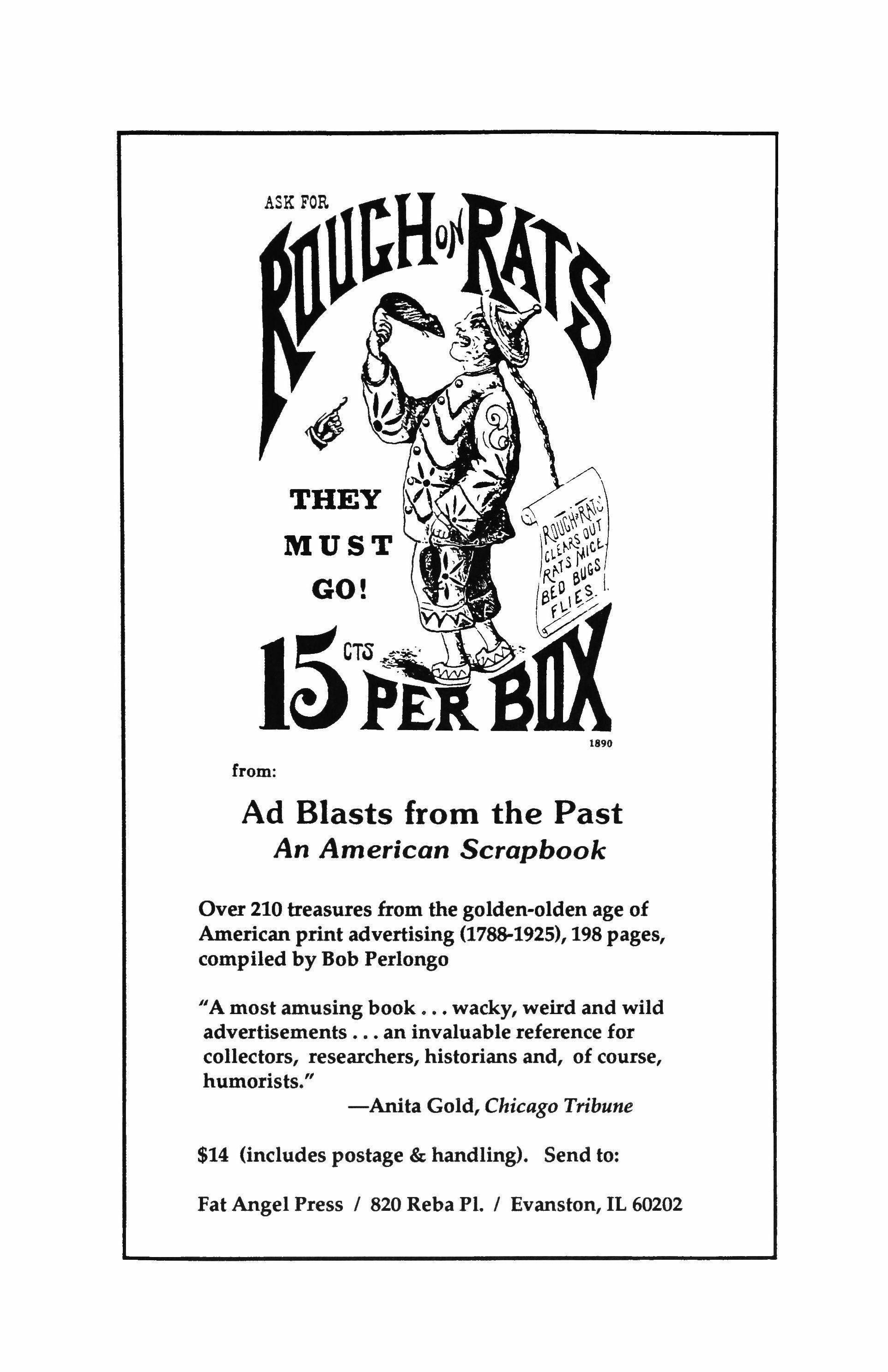
Over 210 treasures from the golden-olden age of American print advertising (1788-1925), 198 pages, compiled by Bob Perlongo IIA most amusing book •.• wacky, weird and wild advertisements an invaluable reference for collectors, researchers, historians and, of course, humorists." -Anita Gold, Chicago Tribune
$14 (includes postage & handling). Send to: Fat Angel Press I 820 Reba PI. I Evanston, IL 60202
1890 from: Ad Blasts from the Past An American Scrapbook
MILKWEED EDITIONS
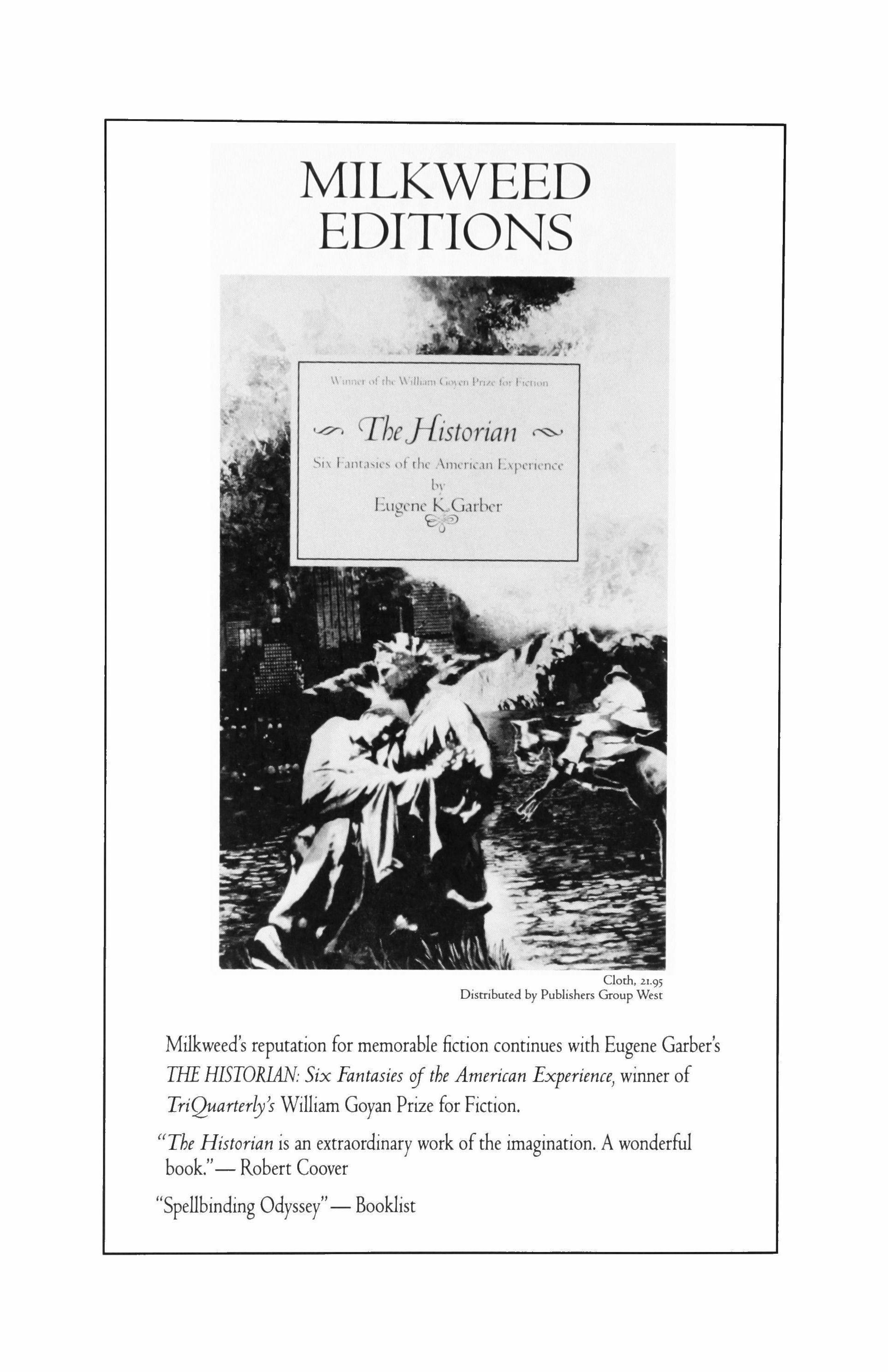
Cloth. 21.95
Distributed by Publishers Group West
Milkweed's reputation for memorable fiction continues with Eugene Garber's THE HISTORIAN: Six Fantasies oj the American Experience, winner of TriQJtarterly's William Goyan Prize for Fiction.
"The Historian is an extraordinary work ofthe imagination. A wonderful book." - Robert Coover
"Spellbinding Odyssey" - Booklist
'.J!7. TheJ-Dstorian � \,\ 1.1I1lrhll'\ nf rhc Arncric.in LXI-'\.'l'Icnc\.· l'l Eu\_'!l'nc K..Gathcr � -, \)
TriQuarterly thanks the following life subscribers:
David C. Abercrombie
Amin Alimard
Lois Ames
Richard H. Anderson
Roger Anderson
Sandy Anderson
I. N. C. Aniebo
Anonymous
University of Arizona Poetry Center
Gayle Arnzen
Michael Attas
Asa Baber
Tom G. Bell
Sandra Berris
Carol Blv
Susan DeWitt Bodemer
Kay Bonetti
Robert Boruch
Van K. Brock
Gwendolyn Brooks
Timothy Browne
Paul Bundy
Eric O. Cahn
David Cassak
Stephen Chapman
Anthony Chase
Michael Chwe
Andrew Cvr
Doreen Davie
Kenneth Day
Mark W. DeBree
Alan Distler
Anstiss Drake
J. A. Dufresne
John B. Elliott
Christopher English
Carol Erickson
Steven Finch
David R. Fine
Paul Fjelstad
Torrence Fossland
Jeffrey Franklin
Peter S. Fritz
Mrs. Angela M. Gannon
Kathy M. Garness
Lawrence J. Gorman
Maxine Groffsky
Rev. Dr. Elliott Hagle
Jack Hagstrom
Ross B. Heath
-Charles Hedde
Gene Helton
Donald Hey
Donald A. Hillel
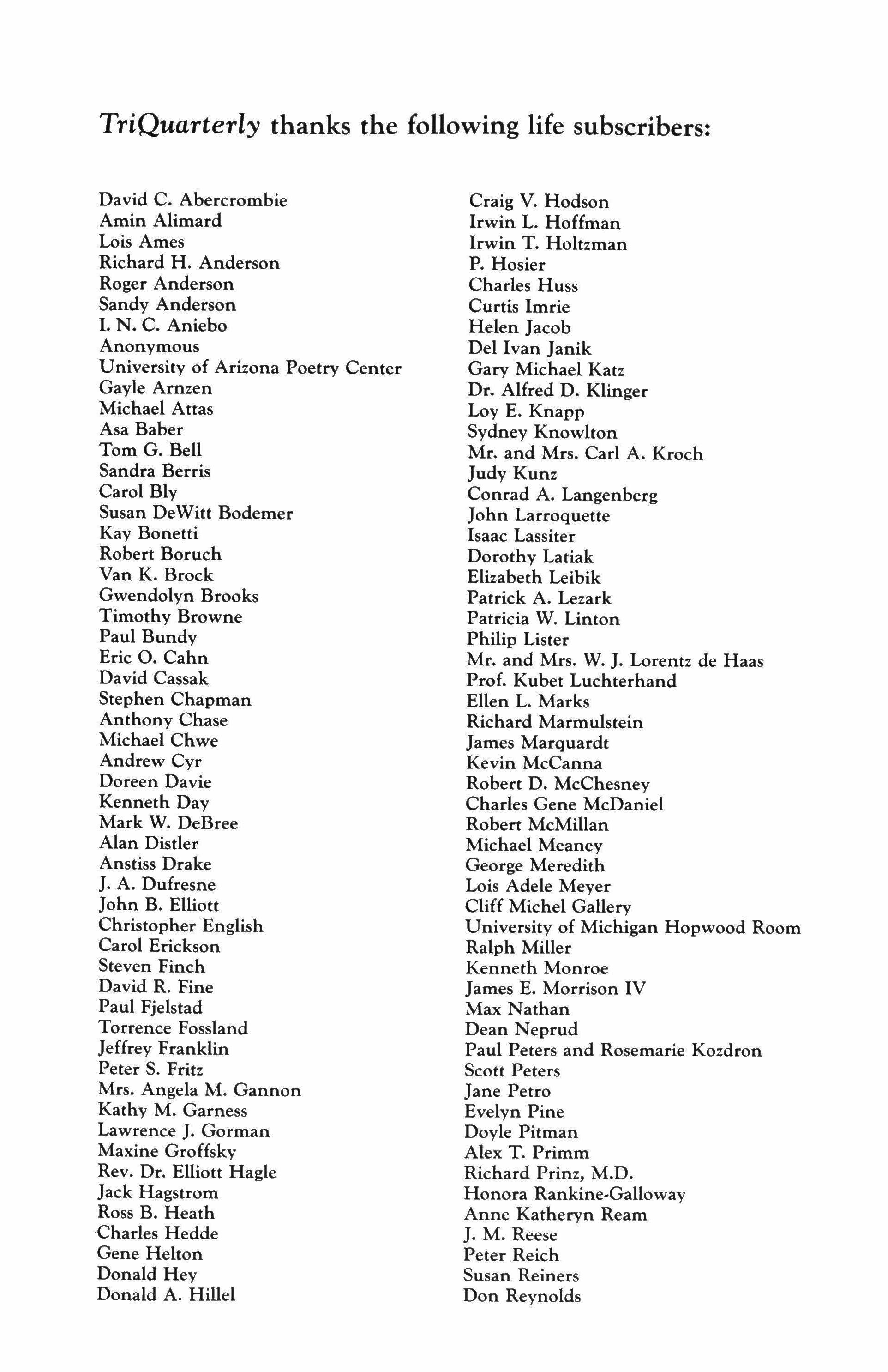
Craig V. Hodson
Irwin L. Hoffman
Irwin T. Holtzman
P. Hosier
Charles Huss
Curtis Imrie
Helen Jacob
Del Ivan Janik
Gary Michael Katz
Dr. Alfred D. Klinger
Loy E. Knapp
Sydney Knowlton
Mr. and Mrs. Carl A. Kroch
Judy Kunz
Conrad A. Langenberg
John Larroquette
Isaac Lassiter
Dorothy Latiak
Elizabeth Leibik
Patrick A. Lezark
Patricia W. Linton
Philip Lister
Mr. and Mrs. W. J. Lorentz de Haas
Prof. Kubet Luchterhand
Ellen L. Marks
Richard Marmulstein
James Marquardt
Kevin McCanna
Robert D. McChesney
Charles Gene McDaniel
Robert McMillan
Michael Meaney
George Meredith
Lois Adele Meyer
Cliff Michel Gallery
University of Michigan Hopwood Room
Ralph Miller
Kenneth Monroe
James E. Morrison IV
Max Nathan
Dean Neprud
Paul Peters and Rosemarie Kozdron
Scott Peters
Jane Petro
Evelyn Pine
Doyle Pitman
Alex T. Primm
Richard Prinz, M.D.
Honora Rankine-Galloway
Anne Katheryn Ream
J. M. Reese
Peter Reich
Susan Reiners
Don Reynolds
Christopher Richter
Diane Rider
Rivier College
Sam Rosenthal
Jim Rowe
Patricia Ruby
Joan Rybka
Joel Schilling, D.D.S.
Paul and June Schlueter, Ph.Dis
Mrs. H. C. Schmidt
Robert 1. Schneideman
Hart Frank Schulz
Koji Seki
David A. Selby
Herbert Shore
John Silbersack
Martin Silverman
Gregory F. Smolarek
Dr. Wanda Sorgente
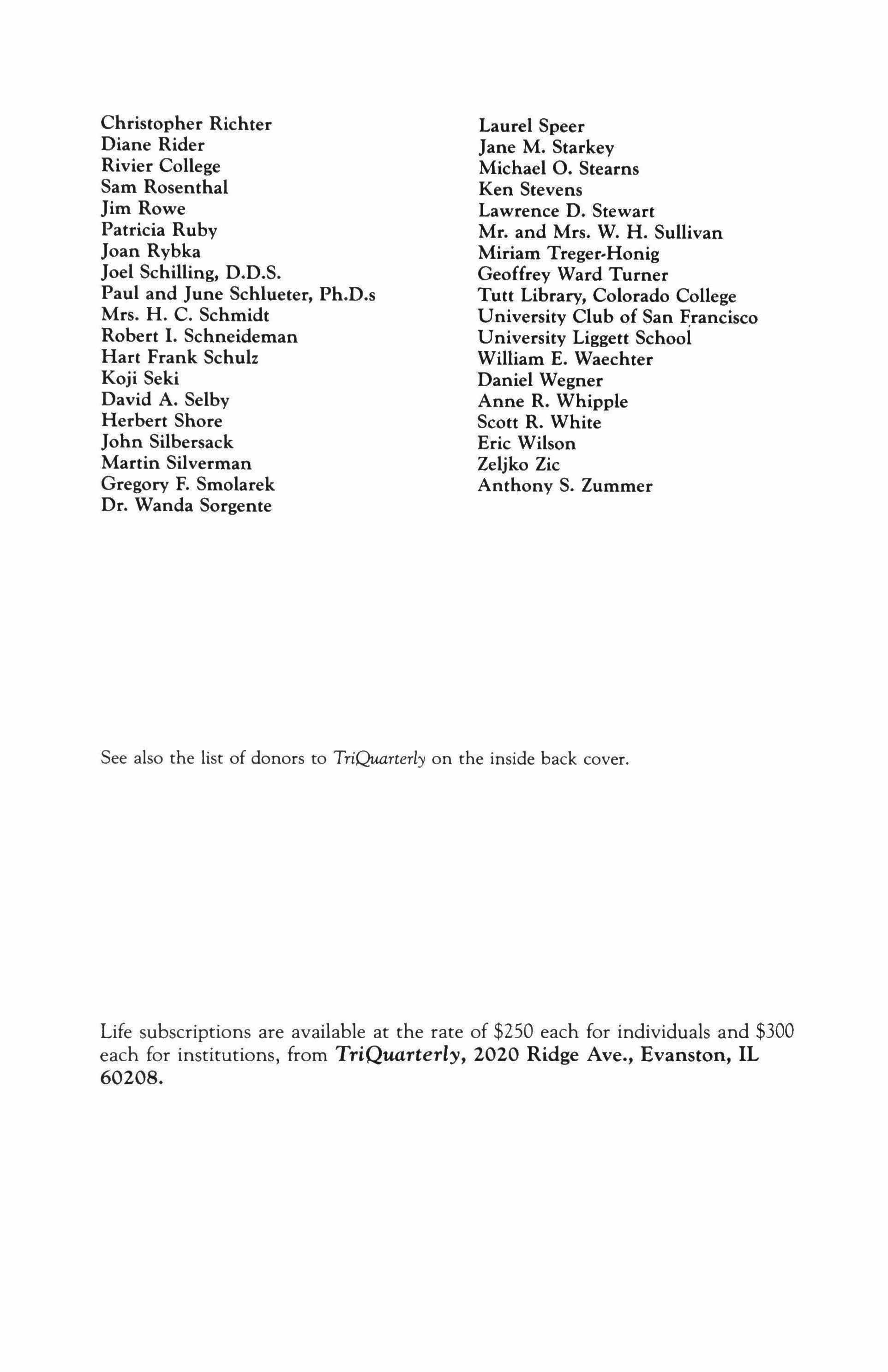
Laurel Speer
Jane M. Starkey
Michael O. Stearns
Ken Stevens
Lawrence D. Stewart
Mr. and Mrs. W. H. Sullivan
Miriam Treger-Honig
Geoffrey Ward Turner
Tutt Library, Colorado College
University Club of San Francisco
University Liggett School
William E. Waechter
Daniel Wegner
Anne R. Whipple
Scott R. White
Eric Wilson
Zeljko Zic
Anthony S. Zummer
See also the list of donors to TriQuarterly on the inside back cover.
Life subscriptions are available at the rate of $250 each for individuals and $300 each for institutions, from TriQuarterly, 2020 Ridge Ave., Evanston, IL 60208.
Donors to TriQuarterly
We wish to express our thanks to the following individual donors to TriQuarterly over the last several years:

Mr. and Mrs. Walter L. Adams
Anonymous
Hadassah Baskin
Lee Philip Bell
Sandra Berris
Simon J. Blattner, Jr.
Mr. and Mrs. Andrew K. Block
Mr. and Mrs. Richard S. Brennan
Willard Cook
Mr. and Mrs. William Cottle
Robert A. Creamer
Mr. and Mrs. James L. Currie
Elizabeth Des Pres
Mr. and Mrs. Donald Egan
Mr. and Mrs. H. Bernard Firestone
Melvin P. Firestone, M.D.
Mr. and Mrs. Solway Firestone
Mr. and Mrs. C. Dwight Foster
Martha Friedberg
Robert Gislason
Mr. and Mrs. Stanford J. Goldblatt
Mrs. Donald Haider
Mrs. Heidi Hall-Jones
Mrs. James E. Hayes
Joanna Hearne
Mr. and Mrs. David C. Hilliard
Mr. and Mrs. Thomas D. Hodgkins
Mary Gray Hughes
Kenneth J. James
Fran Katz
Mr. and Mrs. Martin Koldyke
Shelley Korshak
Charles T. Marin, Jr.
Ms. Jane Mayer
Mrs. Robert Mayer
Martin H. McGrath
Florence D. McMillan
Mr. and Mrs. Andrew McNally IV
Michal Miller
William T. Morgan
Fred S. Novy
Mrs. Marlene Welsh Phillips
Fran Podulka
Barbara Polikoff
Geraldine R. Pratt
Mary Ellen Reynolds
Mrs. Richard Rinella
Ms. Jennie Ritchie
Deborah N. Rosen
Roberta Rubin
Faye Schwimmer
Gilaine Shindelman
Lyn M. Sils
Mr. and Mrs. Raymond I. Skilling
Allen R. Smart
Ruth Smith
Mr. and Mrs. Jules N. Stiffel
Mrs. Robert Stuart
Mr. and Mrs. Raymond Suekoff
Geraldine Szymanski
Judith Thornburg
Scott Turow
Carol Upham
Eleanor Wilner
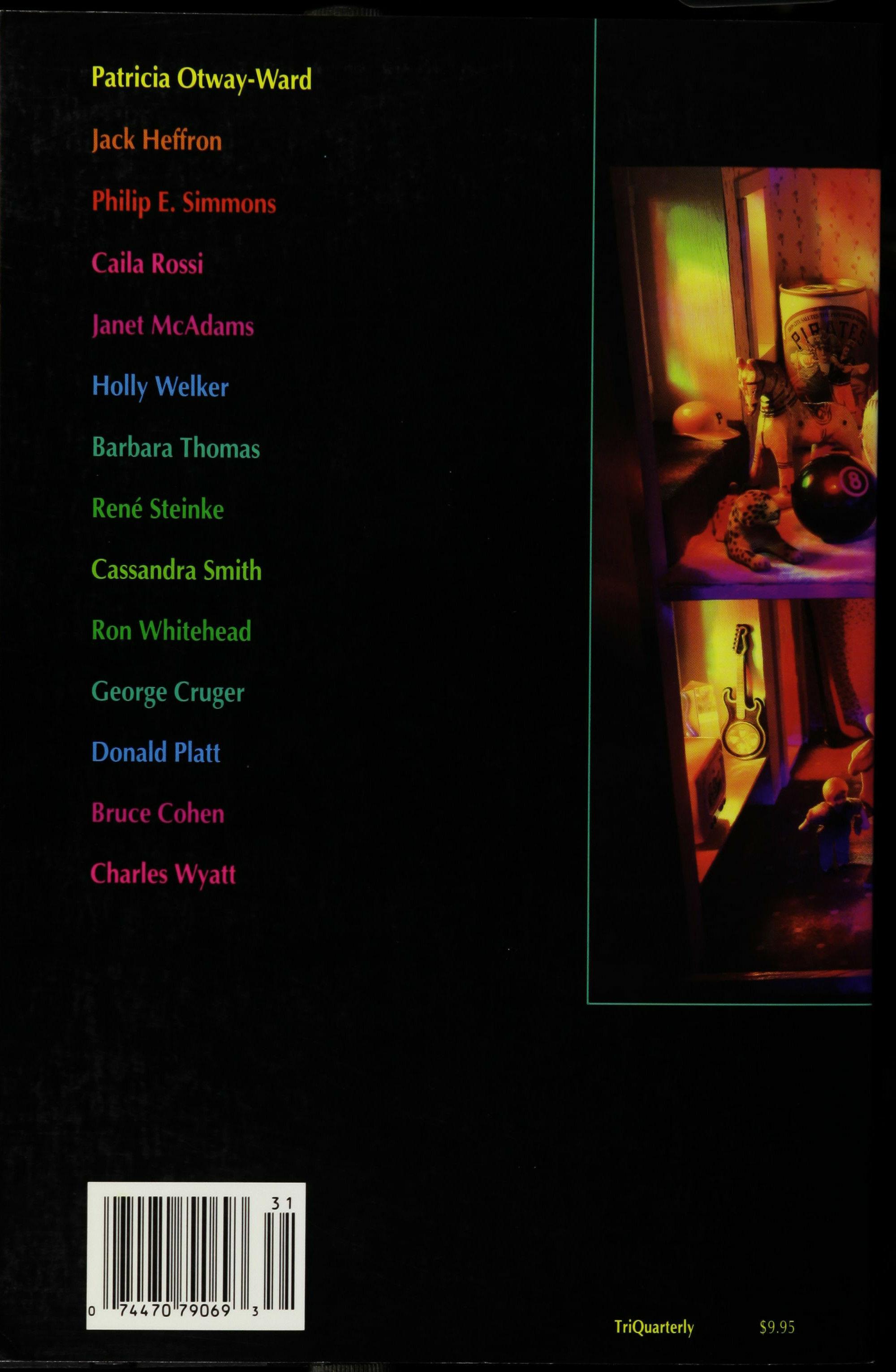




























































































































































 for Ida B. Wells
for Ida B. Wells











 for Joanne Tangorra
for Joanne Tangorra



























































































